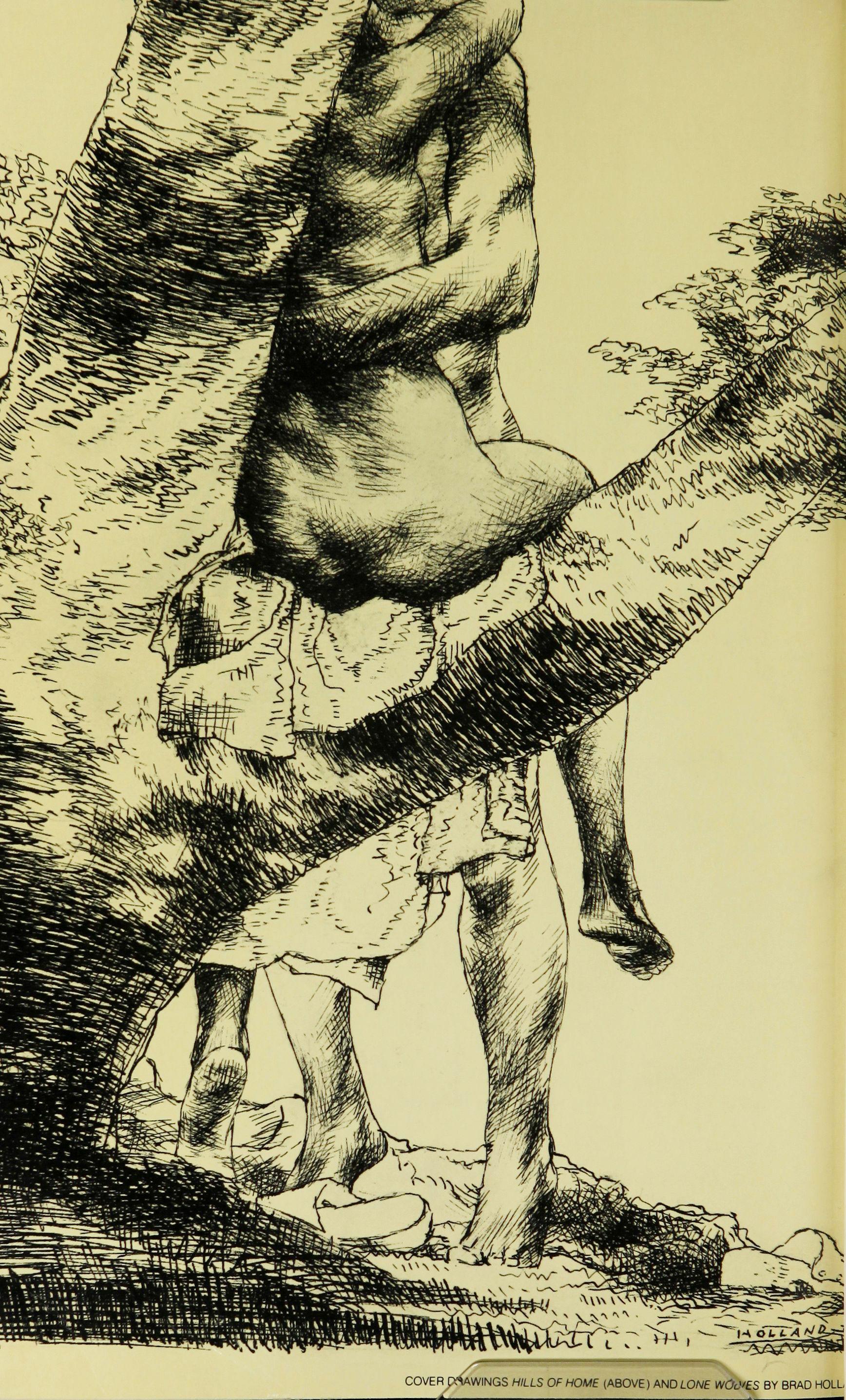
MEN & WOMEN






Editor: ELLIOTT ANDERSON
Executive Editor: MARY KINZIE
Art Director: CYNTHIA ANDERSON
Managing Editor: MICHAEL McDoNNELL
Associate Editors: MARIAM LEASE, SYLVIA MARTIN, MICHAEL SCHLEIF, MARY ELINORE SMITH, MITCHELL YORK
Advisory Editors: LAWRENCE LEVY, CHARLES NEWMAN
Fulfillment: LEIGH ALEXANDER, JOYCE BANG, JUDY MARRS, MARY M. ZAKRASEK
Contributing Editors: ROBERT ALTER, MICHAEL ANANIA, GERALD GRAFF, JOHN HAWKES, DAVID HAYMAN, JOSEPH McELROY, PETER MICHELSON, ROBERT ONOPA, TONY TANNER, NATHANIEL TARN
TrlQuarterly is an international journal of arts, letters, and opinion published in the fall, winter, and spring at Northwestern University, Evanston, Illinois 60201. Subscription rates: One year $12.00; two years $20.00; three years $30.00. Foreign SUbscriptions $1.00 per year additional. Single copies usually $4.25. Back issue prices on request. Contributions, correspondence, and subscriptions should be addressed to TrlQuarterly, 1735 Benson Avenue, Northwestern University, Evanston, Illinois 60201. The editors invite submissions, but queries are strongly suggested. No manuscripts will be returned unless accompanied by a stamped, self-addressed envelope. All manuscripts accepted for publication become the property of TrlQuarterly, unless otherwise indicated. Copyright © 1978 by TrlQuarteriy. All rights reserved. The views expressed in this magazine are to be attributed to the writers, not the editors or sponsors. Printed in the United States of America. Claims for missing numbers will be honored only within the four-month period after month of Issue.
NATIONAL DISTRIBUTOR TO RETAIL TRADE: B. DEBOER, 188 HIGH STREET, NUTLEY, NEW JERSEY 07110. DISTRIBUTOR FOR WEST COAST TRADE: BOOK PEOPLE, 2940 7TH STREET, BERKELEY, CALIFORNIA 94710.
REPRINTS OF BACK ISSUES OF TrlQuarterly ARE NOW AVAILABLE IN FULL FORMAT FROM KRAUS REPRINT COMPANY, ROUTE 100, MILLWOOD, NEW YORK ���:��N�8��6�ICROFORM FROM UMI, A XEROX COMPANY, ANN ARBOR,
MANUELPUIG
VIRGIL BURNETT
JONATHAN STRONG
PENELOPE GILLIATT
JOE ASHBY PORTER
JOSE PH MCELROY
WILLIAM GASS
NORMAN LAVERS
T. CORAGHESSAN BOYLE
JOY WILLIAMS
MAXINE KUMIN
DAVID HUDDLE
JAMES BALLARD
RICHARD STERN
CHUCK KINDER

ROBERT ALTER
RICHARD PEARCE
GERALD GRAFF
BRAD HOLLAND
Fiction from Kiss of the spider woman 3
Picaroon 41 from Doing and undoing 52
Twice lucky 65
A child of the heart 78
Larry, a story from Women and men 97
Susu, I approach you in my dreams 122
The island 143 Caye 148
Pearl and Phoebe 153
The missing person 162
Underwater spring 172
Early communion 181
Troubles 191
The silver ghost 203
Articles Mimesis and the motive for fiction 228
Bring back that line, bring back that time 250
The problematics of metacriticism 264
Editorial Art
Drawings
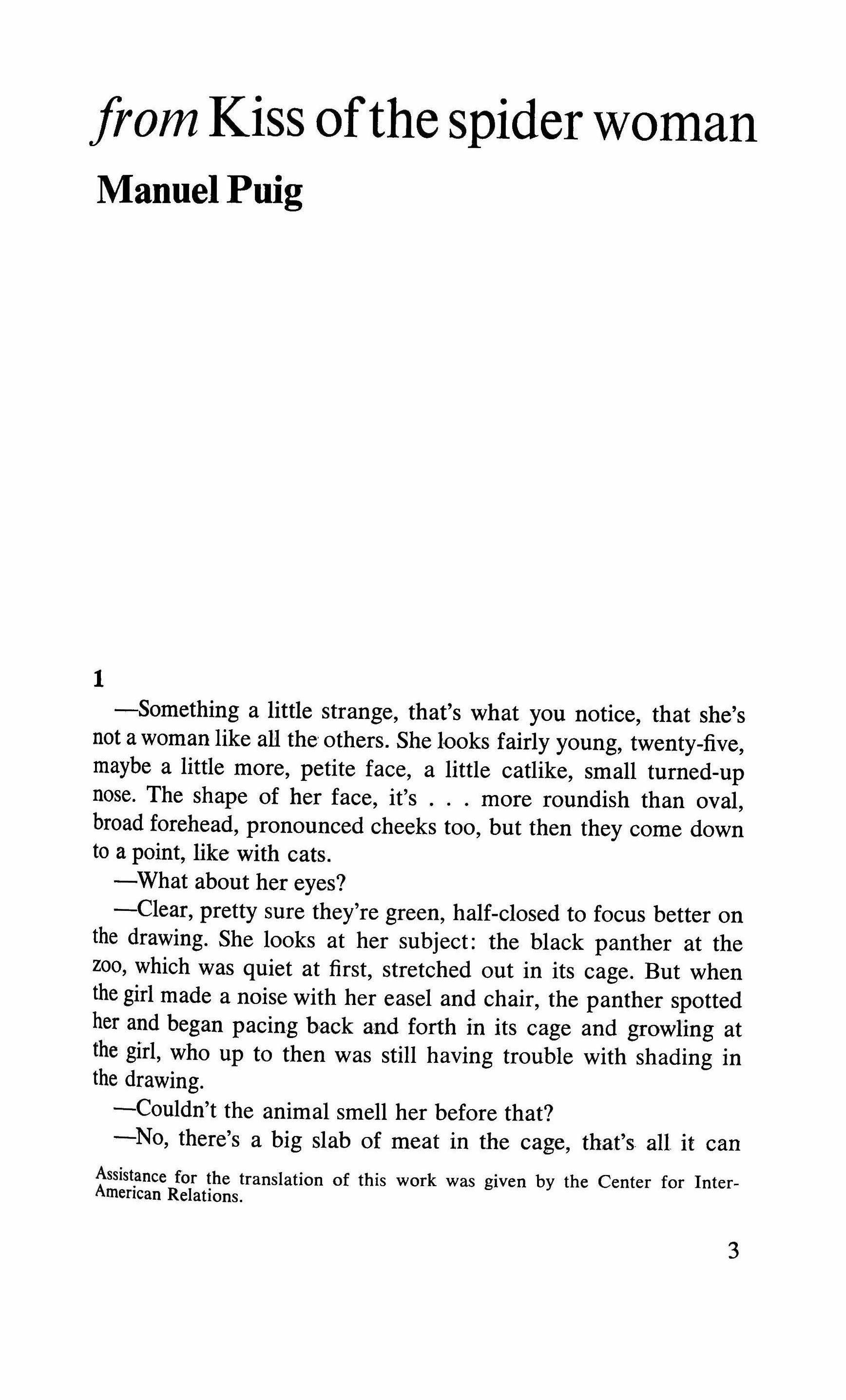
1
-Something a little strange, that's what you notice, that she's not a woman like all the others. She looks fairly young, twenty-five, maybe a little more, petite face, a little catlike, small turned-up nose. The shape of her face, it's more roundish than oval, broad forehead, pronounced cheeks too, but then they come down to a point, like with cats.
-What about her eyes?
-Clear, pretty sure they're green, half-closed to focus better on the drawing. She looks at her subject: the black panther at the zoo, which was quiet at first, stretched out in its cage. But when the girl made a noise with her easel and chair, the panther spotted her and began pacing back and forth in its cage and growling at the girl, who up to then was still having trouble with shading in the drawing.
-Couldn't the animal smell her before that?
-No, there's a big slab of meat in the cage, that's all it can Assistance for the translation of this work was given by the Center for Inter American Relations.
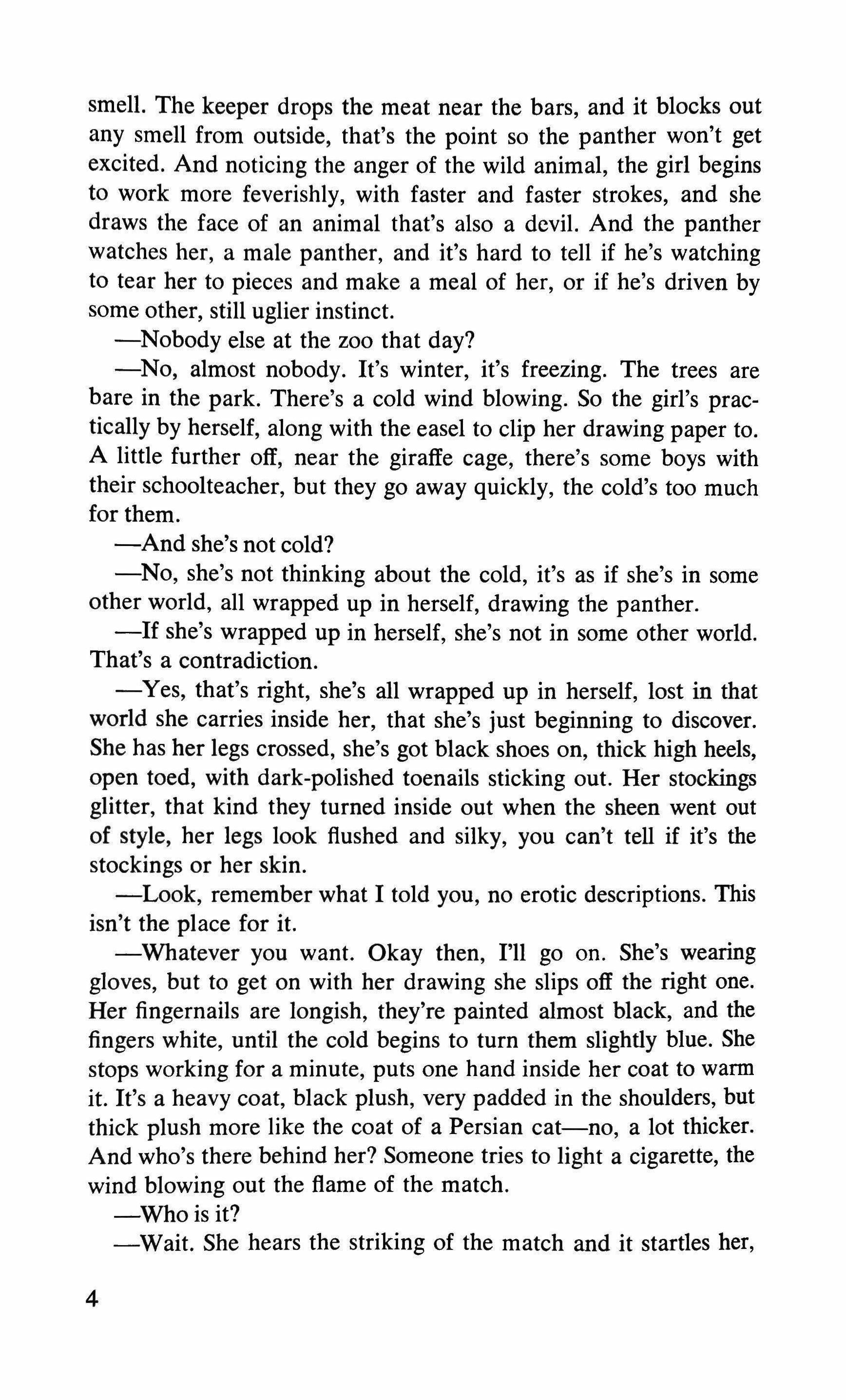
smell. The keeper drops the meat near the bars, and it blocks out any smell from outside, that's the point so the panther won't get excited. And noticing the anger of the wild animal, the girl begins to work more feverishly, with faster and faster strokes, and she draws the face of an animal that's also a devil. And the panther watches her, a male panther, and it's hard to tell if he's watching to tear her to pieces and make a meal of her, or if he's driven by some other, still uglier instinct.
-Nobody else at the zoo that day?
-No, almost nobody. It's winter, it's freezing. The trees are bare in the park. There's a cold wind blowing. So the girl's practically by herself, along with the easel to clip her drawing paper to. A little further off, near the giraffe cage, there's some boys with their schoolteacher, but they go away quickly, the cold's too much for them.
-And she's not cold?
-No, she's not thinking about the cold, it's as if she's in some other world, all wrapped up in herself, drawing the panther.
-If she's wrapped up in herself, she's not in some other world. That's a contradiction.
-Yes, that's right, she's all wrapped up in herself, lost in that world she carries inside her, that she's just beginning to discover. She has her legs crossed, she's got black shoes on, thick high heels, open toed, with dark-polished toenails sticking out. Her stockings glitter, that kind they turned inside out when the sheen went out of style, her legs look flushed and silky, you can't tell if it's the stockings or her skin.
-Look, remember what I told you, no erotic descriptions. This isn't the place for it.
-Whatever you want. Okay then, I'll go on. She's wearing gloves, but to get on with her drawing she slips off the right one. Her fingernails are longish, they're painted almost black, and the fingers white, until the cold begins to turn them slightly blue. She stops working for a minute, puts one hand inside her coat to warm it. It's a heavy coat, black plush, very padded in the shoulders, but thick plush more like the coat of a Persian cat-no, a lot thicker. And who's there behind her? Someone tries to light a cigarette, the wind blowing out the flame of the match.
-Who is it?
-Wait. She hears the striking of the match and it startles her,
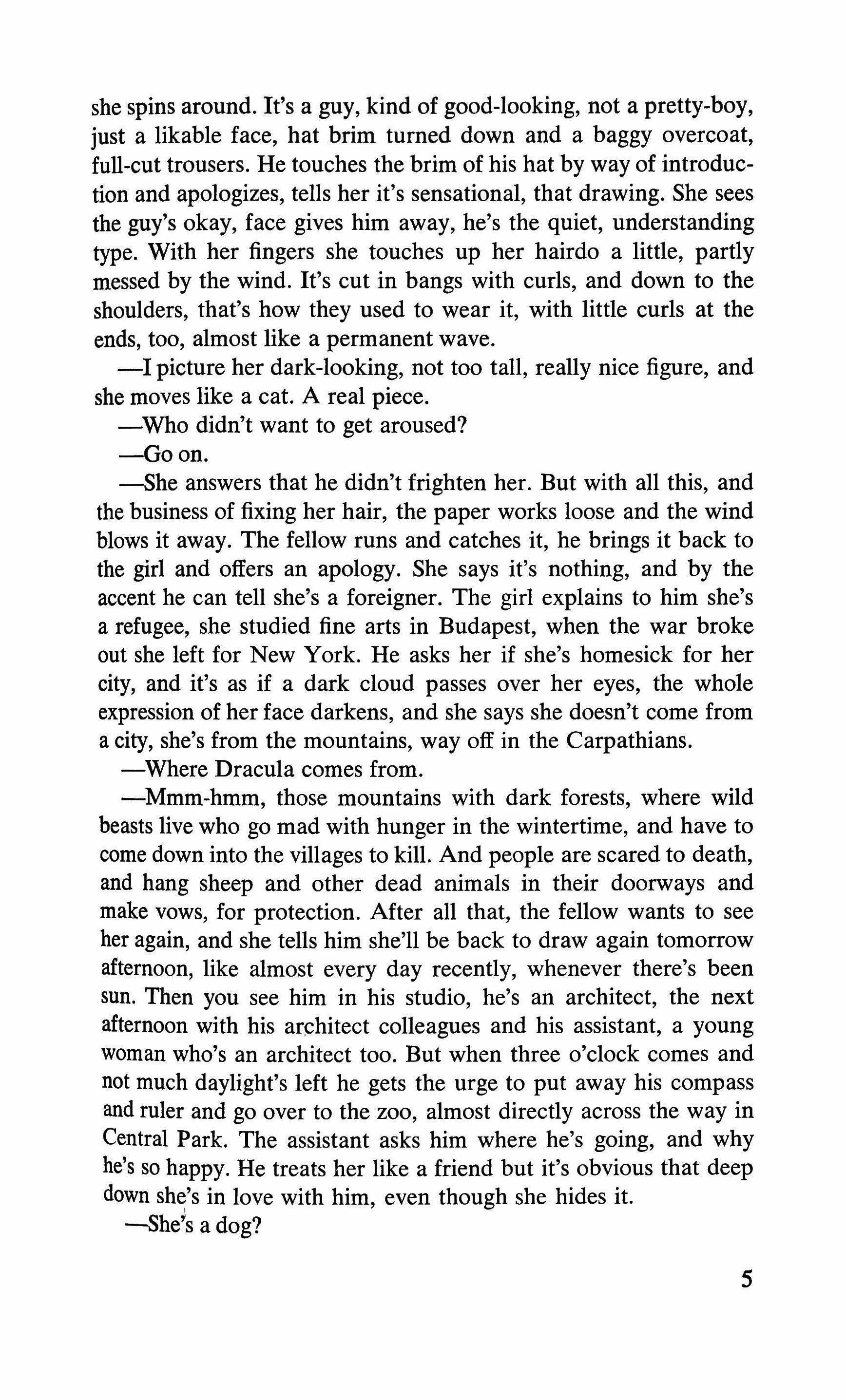
she spins around. It's a guy, kind of good-looking, not a pretty-boy, just a likable face, hat brim turned down and a baggy overcoat, full-cut trousers. He touches the brim of his hat by way of introduction and apologizes, tells her it's sensational, that drawing. She sees the guy's okay, face gives him away, he's the quiet, understanding type. With her fingers she touches up her hairdo a little, partly messed by the wind. It's cut in bangs with curls, and down to the shoulders, that's how they used to wear it, with little curls at the ends, too, almost like a permanent wave.
-I picture her dark-looking, not too tall, really nice figure, and she moves like a cat. A real piece.
-Who didn't want to get aroused?
-Goon.
-She answers that he didn't frighten her. But with all this, and the business of fixing her hair, the paper works loose and the wind blows it away. The fellow runs and catches it, he brings it back to the girl and offers an apology. She says it's nothing, and by the accent he can tell she's a foreigner. The girl explains to him she's a refugee, she studied fine arts in Budapest, when the war broke out she left for New York. He asks her if she's homesick for her city, and it's as if a dark cloud passes over her eyes, the whole expression of her face darkens, and she says she doesn't come from a city, she's from the mountains, way off in the Carpathians.
-Where Dracula comes from.
-Mmm-hmm, those mountains with dark forests, where wild beasts live who go mad with hunger in the wintertime, and have to come down into the villages to kill. And people are scared to death, and hang sheep and other dead animals in their doorways and make vows, for protection. After all that, the fellow wants to see her again, and she tells him she'll be back to draw again tomorrow afternoon, like almost every day recently, whenever there's been sun. Then you see him in his studio, he's an architect, the next afternoon with his architect colleagues and his assistant, a young woman who's an architect too. But when three o'clock comes and not much daylight's left he gets the urge to put away his compass and ruler and go over to the zoo, almost directly across the way in Central Park. The assistant asks him where he's going, and why he's so happy. He treats her like a friend but it's obvious that deep down she's in love with him, even though she hides it.
-She�s a dog?
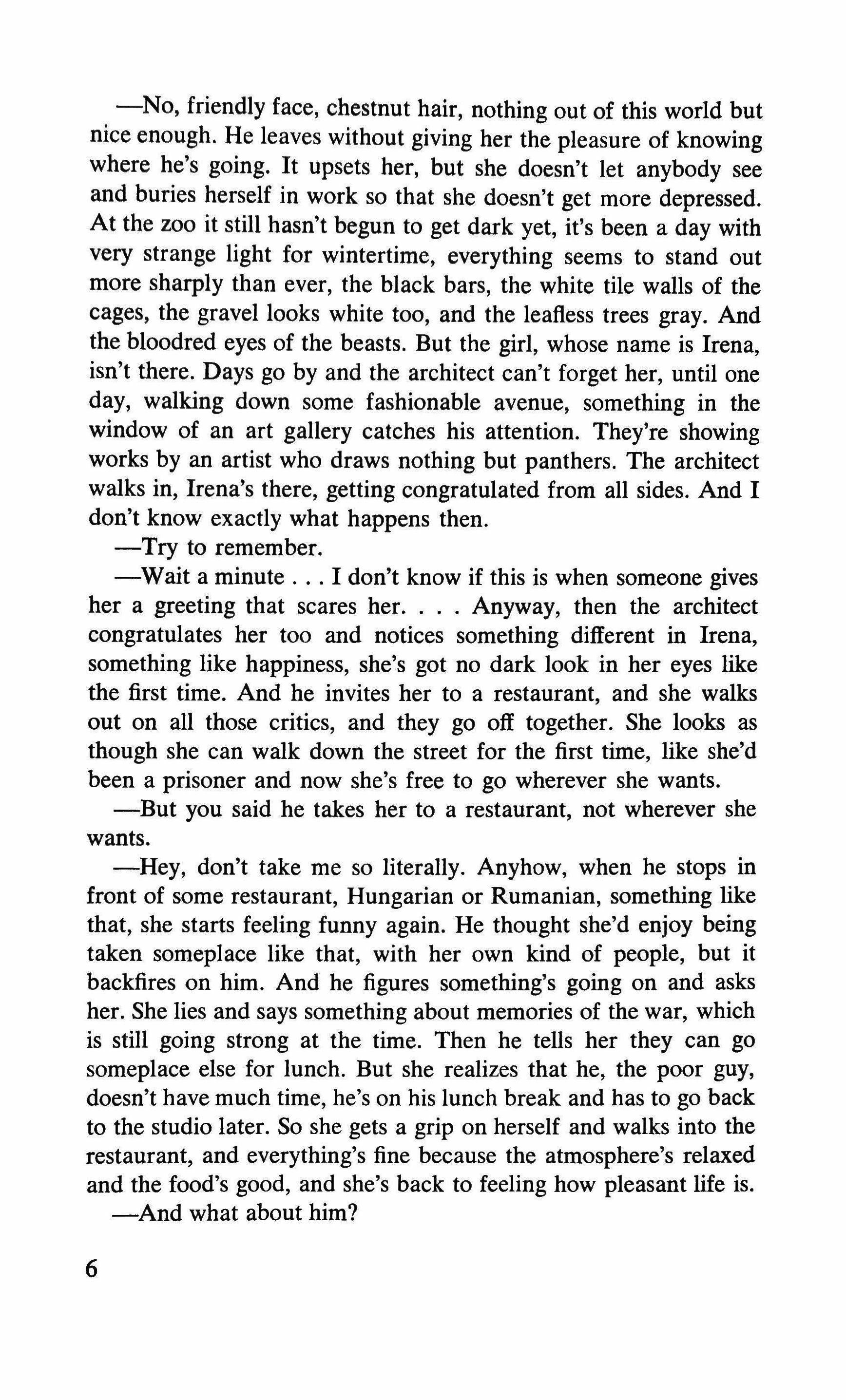
-No, friendly face, chestnut hair, nothing out of this world but nice enough. He leaves without giving her the pleasure of knowing where he's going. It upsets her, but she doesn't let anybody see and buries herself in work so that she doesn't get more depressed. At the zoo it still hasn't begun to get dark yet, it's been a day with very strange light for wintertime, everything seems to stand out more sharply than ever, the black bars, the white tile walls of the cages, the gravel looks white too, and the leafless trees gray. And the bloodred eyes of the beasts. But the girl, whose name is Irena, isn't there. Days go by and the architect can't forget her, until one day, walking down some fashionable avenue, something in the window of an art gallery catches his attention. They're showing works by an artist who draws nothing but panthers. The architect walks in, Irena's there, getting congratulated from all sides. And I don't know exactly what happens then.
-Try to remember.
-Wait a minute I don't know if this is when someone gives her a greeting that scares her Anyway, then the architect congratulates her too and notices something different in Irena, something like happiness, she's got no dark look in her eyes like the first time. And he invites her to a restaurant, and she walks out on all those critics, and they go off together. She looks as though she can walk down the street for the first time, like she'd been a prisoner and now she's free to go wherever she wants.
-But you said he takes her to a restaurant, not wherever she wants.
-Hey, don't take me so literally. Anyhow, when he stops in front of some restaurant, Hungarian or Rumanian, something like that, she starts feeling funny again. He thought she'd enjoy being taken someplace like that, with her own kind of people, but it backfires on him. And he figures something's going on and asks her. She lies and says something about memories of the war, which is still going strong at the time. Then he tells her they can go someplace else for lunch. But she realizes that he, the poor guy, doesn't have much time, he's on his lunch break and has to go back to the studio later. So she gets a grip on herself and walks into the restaurant, and everything's fine because the atmosphere's relaxed and the food's good, and she's back to feeling how pleasant life is.
-And what about him?
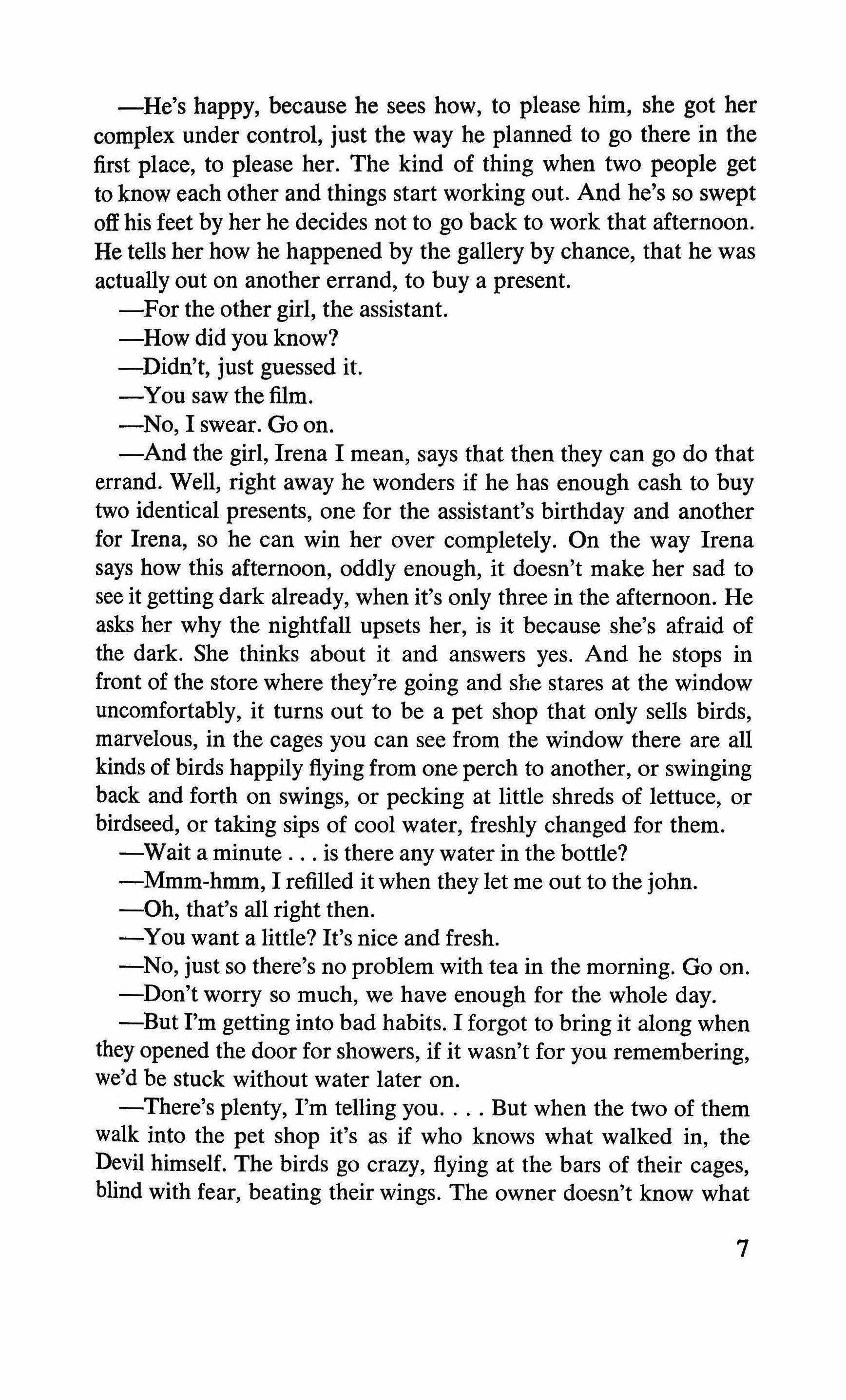
-He's happy, because he sees how, to please him, she got her complex under control, just the way he planned to go there in the first place, to please her. The kind of thing when two people get to know each other and things start working out. And he's so swept off his feet by her he decides not to go back to work that afternoon. He tells her how he happened by the gallery by chance, that he was actually out on another errand, to buy a present.
-For the other girl, the assistant.
-How did you know?
-Didn't, just guessed it.
-You saw the film.
-No, I swear. Go on.
-And the girl, Irena I mean, says that then they can go do that errand. Well, right away he wonders if he has enough cash to buy two identical presents, one for the assistant's birthday and another for Irena, so he can win her over completely. On the way Irena says how this afternoon, oddly enough, it doesn't make her sad to see it getting dark already, when it's only three in the afternoon. He asks her why the nightfall upsets her, is it because she's afraid of the dark. She thinks about it and answers yes. And he stops in front of the store where they're going and she stares at the window uncomfortably, it turns out to be a pet shop that only sells birds, marvelous, in the cages you can see from the window there are all kinds of birds happily flying from one perch to another, or swinging back and forth on swings, or pecking at little shreds of lettuce, or birdseed, or taking sips of cool water, freshly changed for them.
-Wait a minute is there any water in the bottle?
-Mmm-hmm, I refilled it when they let me out to the john.
-Oh, that's all right then.
-You want a little? It's nice and fresh.
-No, just so there's no problem with tea in the morning. Go on.
-Don't worry so much, we have enough for the whole day.
-But I'm getting into bad habits. I forgot to bring it along when they opened the door for showers, if it wasn't for you remembering, we'd be stuck without water later on.
-There's plenty, I'm telling you But when the two of them walk into the pet shop it's as if who knows what walked in, the Devil himself. The birds go crazy, flying at the bars of their cages, blind with fear, beating their wings. The owner doesn't know what
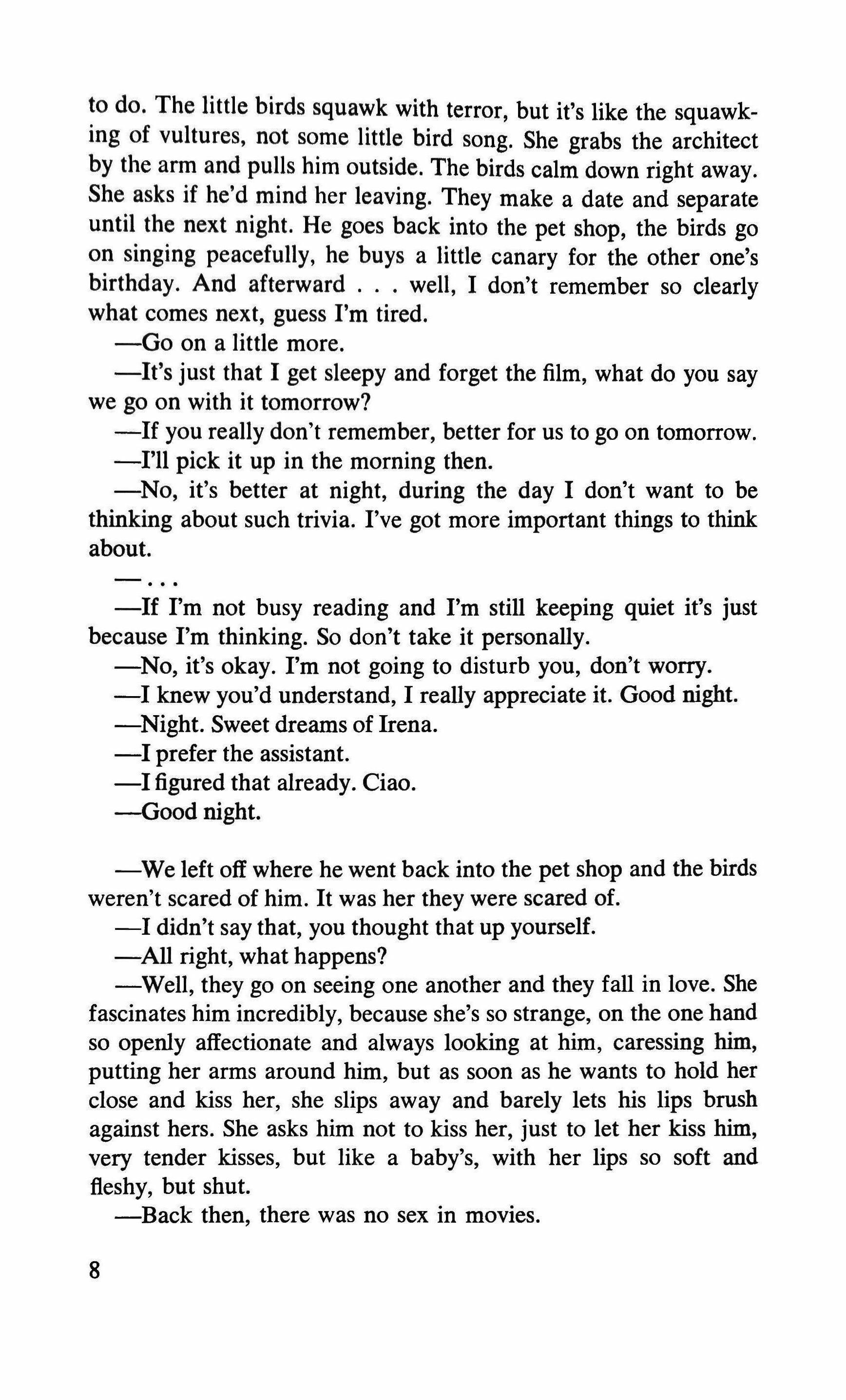
to do. The little birds squawk with terror, but it's like the squawking of vultures, not some little bird song. She grabs the architect by the arm and pulls him outside. The birds calm down right away. She asks if he'd mind her leaving. They make a date and separate until the next night. He goes back into the pet shop, the birds go on singing peacefully, he buys a little canary for the other one's birthday. And afterward well, I don't remember so clearly what comes next, guess I'm tired.
-Go on a little more.
-It's just that I get sleepy and forget the film, what do you say we go on with it tomorrow?
-If you really don't remember, better for us to go on tomorrow.
-I'll pick it up in the morning then.
-No, it's better at night, during the day I don't want to be thinking about such trivia. I've got more important things to think about.
-If I'm not busy reading and I'm still keeping quiet it's just because I'm thinking. So don't take it personally.
-No, it's okay. I'm not going to disturb you, don't worry.
-I knew you'd understand, I really appreciate it. Good night.
-Night. Sweet dreams of Irena.
-I prefer the assistant.
-I figured that already. Ciao.
-Good night.
-We left off where he went back into the pet shop and the birds weren't scared of him. It was her they were scared of.
-I didn't say that, you thought that up yourself.
-All right, what happens?
-Well, they go on seeing one another and they fall in love. She fascinates him incredibly, because she's so strange, on the one hand so openly affectionate and always looking at him, caressing him, putting her arms around him, but as soon as he wants to hold her close and kiss her, she slips away and barely lets his lips brush against hers. She asks him not to kiss her, just to let her kiss him, very tender kisses, but like a baby's, with her lips so soft and fleshy, but shut.
-Back then, there was no sex in movies.
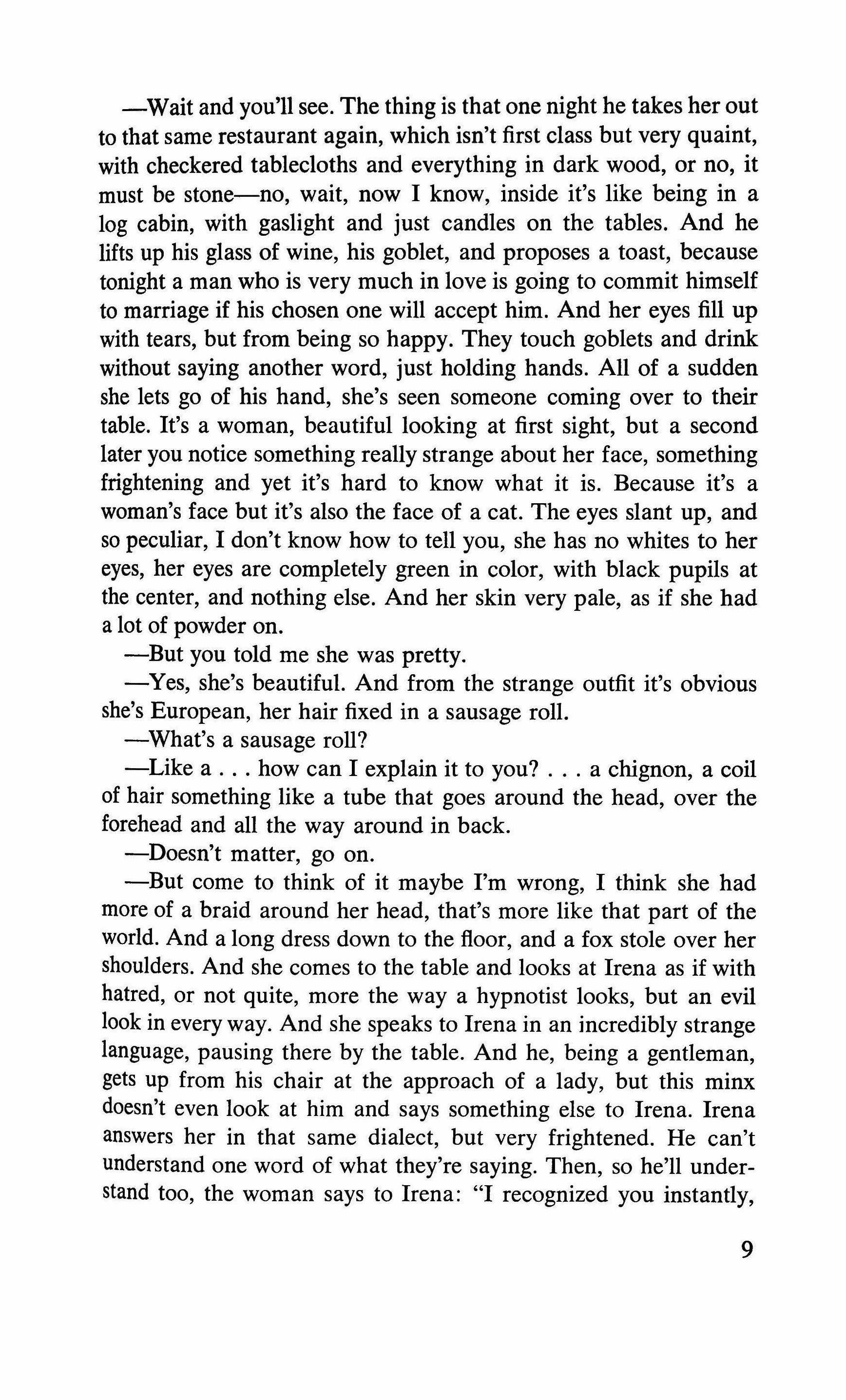
-Wait and you'll see. The thing is that one night he takes her out to that same restaurant again, which isn't first class but very quaint, with checkered tablecloths and everything in dark wood, or no, it must be stone-no, wait, now I know, inside it's like being in a log cabin, with gaslight and just candles on the tables. And he lifts up his glass of wine, his goblet, and proposes a toast, because tonight a man who is very much in love is going to commit himself to marriage if his chosen one will accept him. And her eyes fill up with tears, but from being so happy. They touch goblets and drink without saying another word, just holding hands. All of a sudden she lets go of his hand, she's seen someone coming over to their table. It's a woman, beautiful looking at first sight, but a second later you notice something really strange about her face, something frightening and yet it's hard to know what it is. Because it's a woman's face but it's also the face of a cat. The eyes slant up, and so peculiar, I don't know how to tell you, she has no whites to her eyes, her eyes are completely green in color, with black pupils at the center, and nothing else. And her skin very pale, as if she had a lot of powder on.
-But you told me she was pretty.
-Yes, she's beautiful. And from the strange outfit it's obvious she's European, her hair fixed in a sausage roll.
-What's a sausage roll?
-Like a how can I explain it to you? a chignon, a coil of hair something like a tube that goes around the head, over the forehead and all the way around in back.
-Doesn't matter, go on.
-But come to think of it maybe I'm wrong, I think she had more of a braid around her head, that's more like that part of the world. And a long dress down to the floor, and a fox stole over her shoulders. And she comes to the table and looks at Irena as if with hatred, or not quite, more the way a hypnotist looks, but an evil look in every way. And she speaks to Irena in an incredibly strange language, pausing there by the table. And he, being a gentleman, gets up from his chair at the approach of a lady, but this minx doesn't even look at him and says something else to Irena. Irena answers her in that same dialect, but very frightened. He can't understand one word of what they're saying. Then, so he'll understand too, the woman says to Irena: "I recognized you instantly,
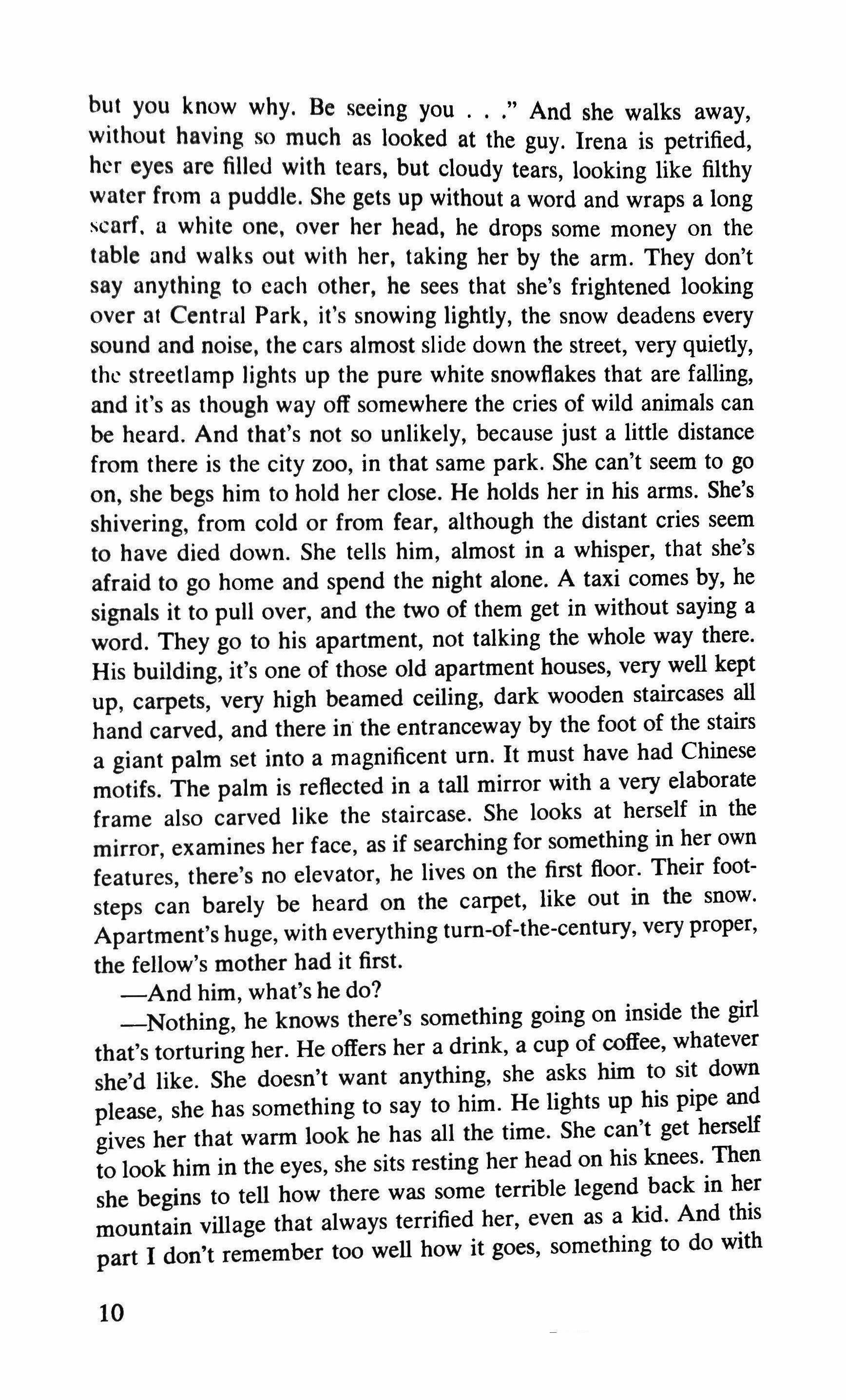
but you know why. Be seeing you And she walks away without having so much as looked at the guy. Irena is petrified: her eyes are filled with tears, but cloudy tears, looking like filthy water from .a puddle. She gets up without a word and wraps a long scarf. a white one, over her head, he drops some money on the table and walks out with her, taking her by the arm. They don't say anything to each other, he sees that she's frightened looking over at Central Park, it's snowing lightly, the snow deadens every sound and noise, the cars almost slide down the street, very quietly, the streetlamp lights up the pure white snowflakes that are falling, and it's as though way off somewhere the cries of wild animals can be heard. And that's not so unlikely, because just a little distance from there is the city zoo, in that same park. She can't seem to go on, she begs him to hold her close. He holds her in his arms. She's shivering, from cold or from fear, although the distant cries seem to have died down. She tells him, almost in a whisper, that she's afraid to go home and spend the night alone. A taxi comes by, he signals it to pull over, and the two of them get in without saying a word. They go to his apartment, not talking the whole way there. His building, it's one of those old apartment houses, very well kept up, carpets, very high beamed ceiling, dark wooden staircases all hand carved, and there in the entranceway by the foot of the stairs a giant palm set into a magnificent urn. It must have had Chinese motifs. The palm is reflected in a tall mirror with a very elaborate frame also carved like the staircase. She looks at herself in the mirror, examines her face, as if searching for something in her own features, there's no elevator, he lives on the first floor. Their footsteps can barely be heard on the carpet, like out in the snow. Apartment's huge, with everything turn-of-the-century, very proper, the fellow's mother had it first.
-And him, what's he do?
-Nothing, he knows there's something going on inside the girl that's torturing her. He offers her a drink, a cup of coffee, whatever she'd like. She doesn't want anything, she asks him to sit down please, she has something to say to him. He lights up his pipe and gives her that warm look he has all the time. She can't get herself to look him in the eyes, she sits resting her head on his knees. Then she begins to tell how there was some terrible legend back in her mountain village that always terrified her, even as a kid. And this part I don't remember too well how it goes, something to do with
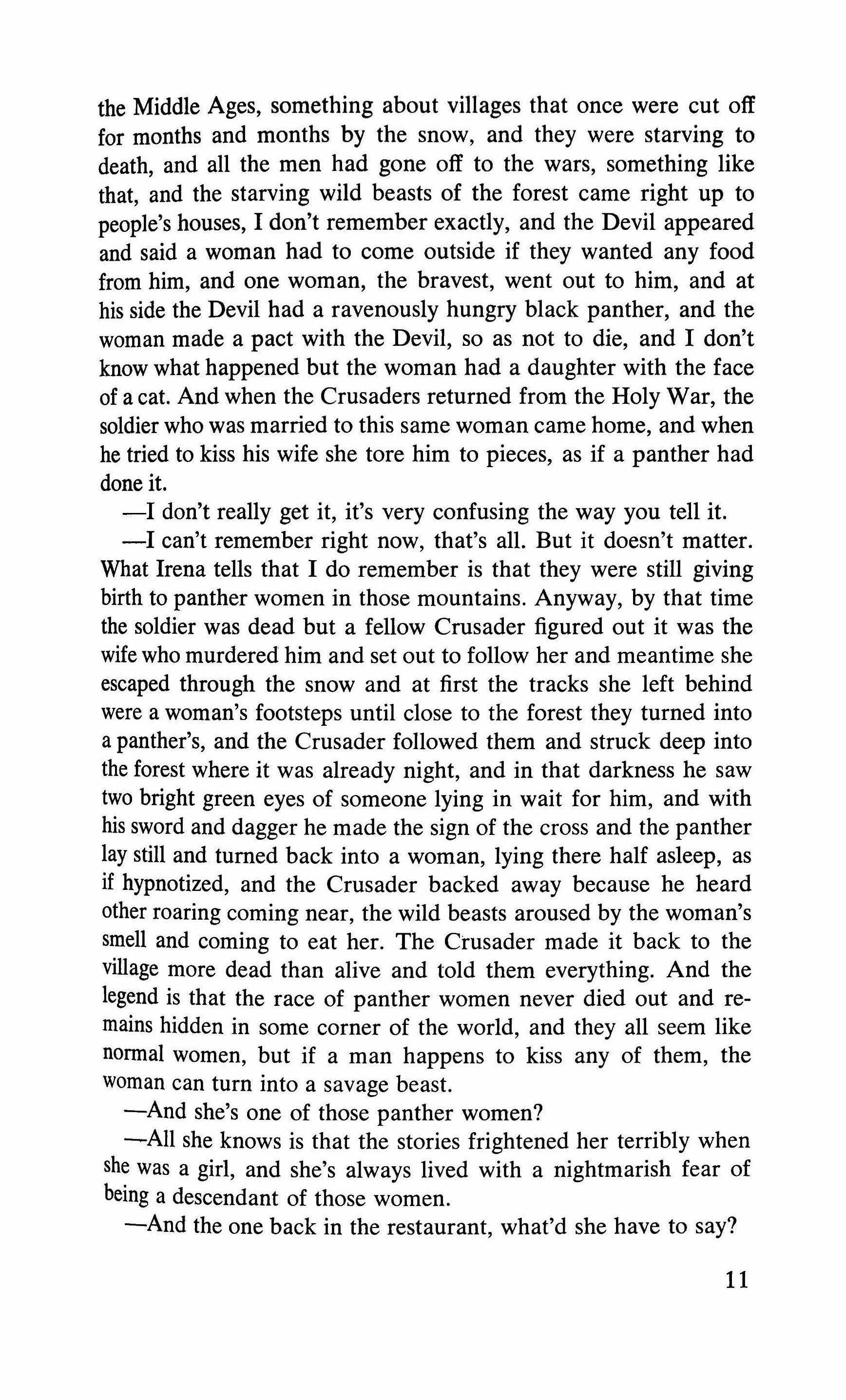
the Middle Ages, something about villages that once were cut off for months and months by the snow, and they were starving to death, and all the men had gone off to the wars, something like that, and the starving wild beasts of the forest came right up to people's houses, I don't remember exactly, and the Devil appeared and said a woman had to come outside if they wanted any food from him, and one woman, the bravest, went out to him, and at his side the Devil had a ravenously hungry black panther, and the woman made a pact with the Devil, so as not to die, and I don't know what happened but the woman had a daughter with the face of a cat. And when the Crusaders returned from the Holy War, the soldier who was married to this same woman came home, and when he tried to kiss his wife she tore him to pieces, as if a panther had done it.
-I don't really get it, it's very confusing the way you tell it.
-I can't remember right now, that's all. But it doesn't matter. What Irena tells that I do remember is that they were still giving birth to panther women in those mountains. Anyway, by that time the soldier was dead but a fellow Crusader figured out it was the wife who murdered him and set out to follow her and meantime she escaped through the snow and at first the tracks she left behind were a woman's footsteps until close to the forest they turned into a panther's, and the Crusader followed them and struck deep into the forest where it was already night, and in that darkness he saw two bright green eyes of someone lying in wait for him, and with his sword and dagger he made the sign of the cross and the panther lay still and turned back into a woman, lying there half asleep, as if hypnotized, and the Crusader backed away because he heard other roaring coming near, the wild beasts aroused by the woman's smell and coming to eat her. The Crusader made it back to the village more dead than alive and told them everything. And the legend is that the race of panther women never died out and remains hidden in some corner of the world, and they all seem like normal women, but if a man happens to kiss any of them, the woman can turn into a savage beast.
-And she's one of those panther women?
+-All she knows is that the stories frightened her terribly when she was a girl, and she's always lived with a nightmarish fear of being a descendant of those women.
-And the one back in the restaurant, what'd she have to say?
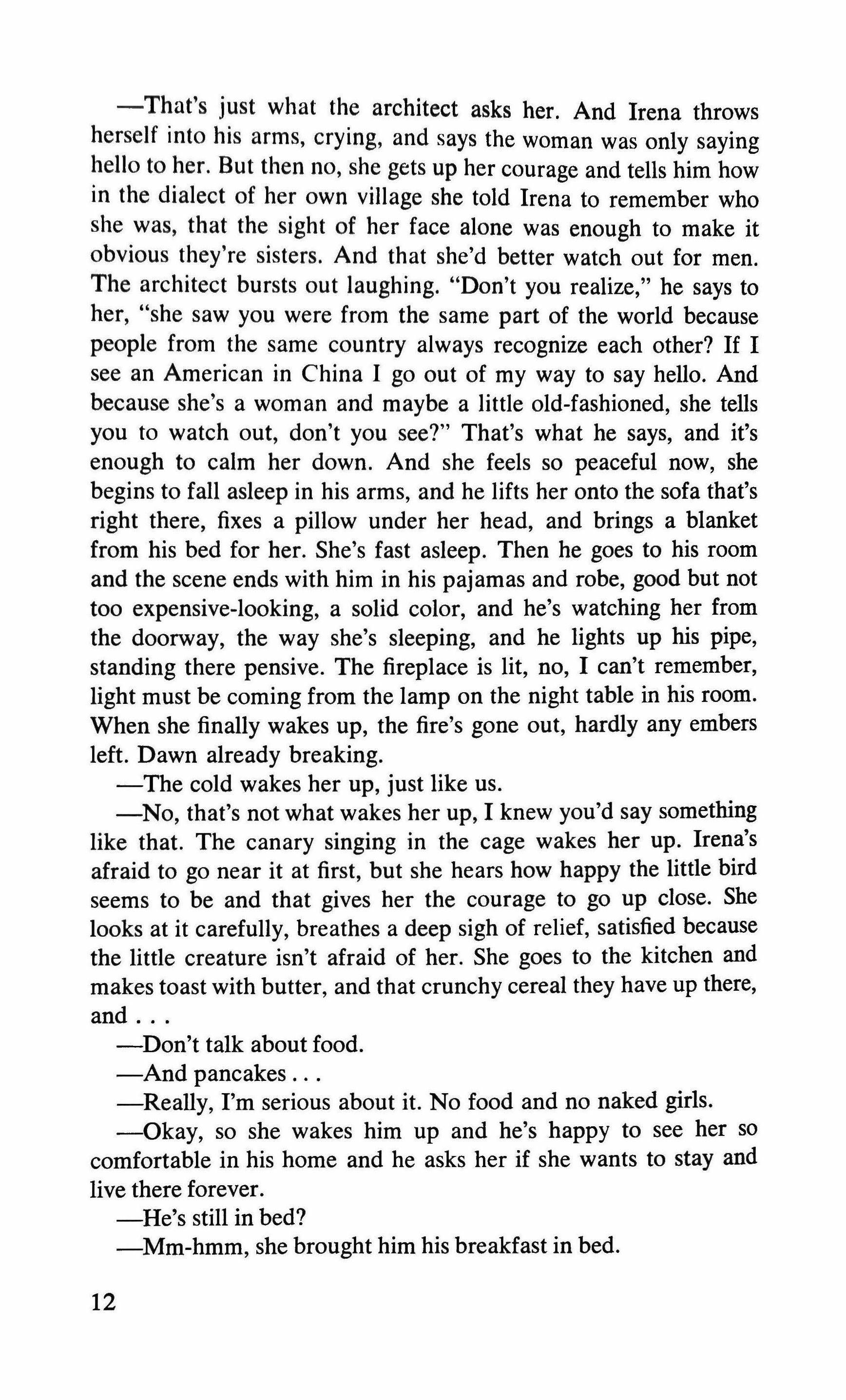
-That's just what the architect asks her. And Irena throws herself into his arms, crying, and says the woman was only saying hello to her. But then no, she gets up her courage and tells him how in the dialect of her own village she told Irena to remember who she was, that the sight of her face alone was enough to make it obvious they're sisters. And that she'd better watch out for men. The architect bursts out laughing. "Don't you realize," he says to her, "she saw you were from the same part of the world because people from the same country always recognize each other? If I see an American in China I go out of my way to say hello. And because she's a woman and maybe a little old-fashioned, she tells you to watch out, don't you see?" That's what he says, and it's enough to calm her down. And she feels so peaceful now, she begins to fall asleep in his arms, and he lifts her onto the sofa that's right there, fixes a pillow under her head, and brings a blanket from his bed for her. She's fast asleep. Then he goes to his room and the scene ends with him in his pajamas and robe, good but not too expensive-looking, a solid color, and he's watching her from the doorway, the way she's sleeping, and he lights up his pipe, standing there pensive. The fireplace is lit, no, I can't remember, light must be coming from the lamp on the night table in his room. When she finally wakes up, the fire's gone out, hardly any embers left. Dawn already breaking.
-The cold wakes her up, just like us.
-No, that's not what wakes her up, I knew you'd say something like that. The canary singing in the cage wakes her up. Irena's afraid to go near it at first, but she hears how happy the little bird seems to be and that gives her the courage to go up close. She looks at it carefully, breathes a deep sigh of relief, satisfied because the little creature isn't afraid of her. She goes to the kitchen and makes toast with butter, and that crunchy cereal they have up there, and
-Don't talk about food.
-And pancakes
-Really, I'm serious about it. No food and no naked girls.
-Okay, so she wakes him up and he's happy to see her so comfortable in his home and he asks her if she wants to stay and live there forever.
-He's still in bed?
-Mm-hmm, she brought him his breakfast in bed.

-Me, I never liked to have breakfast right away, the first thing I have to do is brush my teeth. Sorry, go ahead.
-Okay, so then he wants to kiss her. And she won't let him get close.
-He must have bad breath, he didn't brush his teeth yet.
-If you're going to make fun, there's no reason to tell you anything more.
-No, please, I'm listening.
-He asks her again if she wants to marry him. She answers yes she wants to with all her heart, and she doesn't want to ever have to leave that house again, she feels so at home there, and she looks all around and the drapes are dark velvet to block the light out, and so to let the light in she draws them open and behind them there's another set of lacy curtains. Then you get to see the whole turn-of-the-century decor. She asks who picked out all the lovely things and I think he tells her how much his mother had to do with all that, every piece of furniture, how she was such a good mother and how much she would have loved Irena, like her own daugl 'cr. Irena goes over to him and kisses him almost with adoration, the way one kisses a holy saint, you know? On the forehead. And she begs him please never to leave her, she wants to be together with him always, all she could ever ask for is to wake up each morning to see him again, always by her side But to become a real wife to him, she asks him to give her a little time, until all those fears have a chance to subside
-You get what's going on, don't you?
-That she's afraid she'll turn into a panther.
-Well, I think she's frigid, she's afraid of men, either that or she has some idea about sex that's really violent, and so she invents things.
-Wait, will you? He says okay, and they marry. And when the wedding night comes, she sleeps in the bed, and he's on the sofa.
-Keeping an eye on his mother's furniture.
-If you're going to laugh I won't go on, I'm telling you this in all seriousness, because I really like it. And besides there's something else I can't tell you, that makes me really like this film a lot.
-Tell me what, what is it?
-No, I was about to bring it up but now I see you're laughing, and, to tell you the truth, it makes me angry.
-No, I like the picture, but you have the fun of telling it and
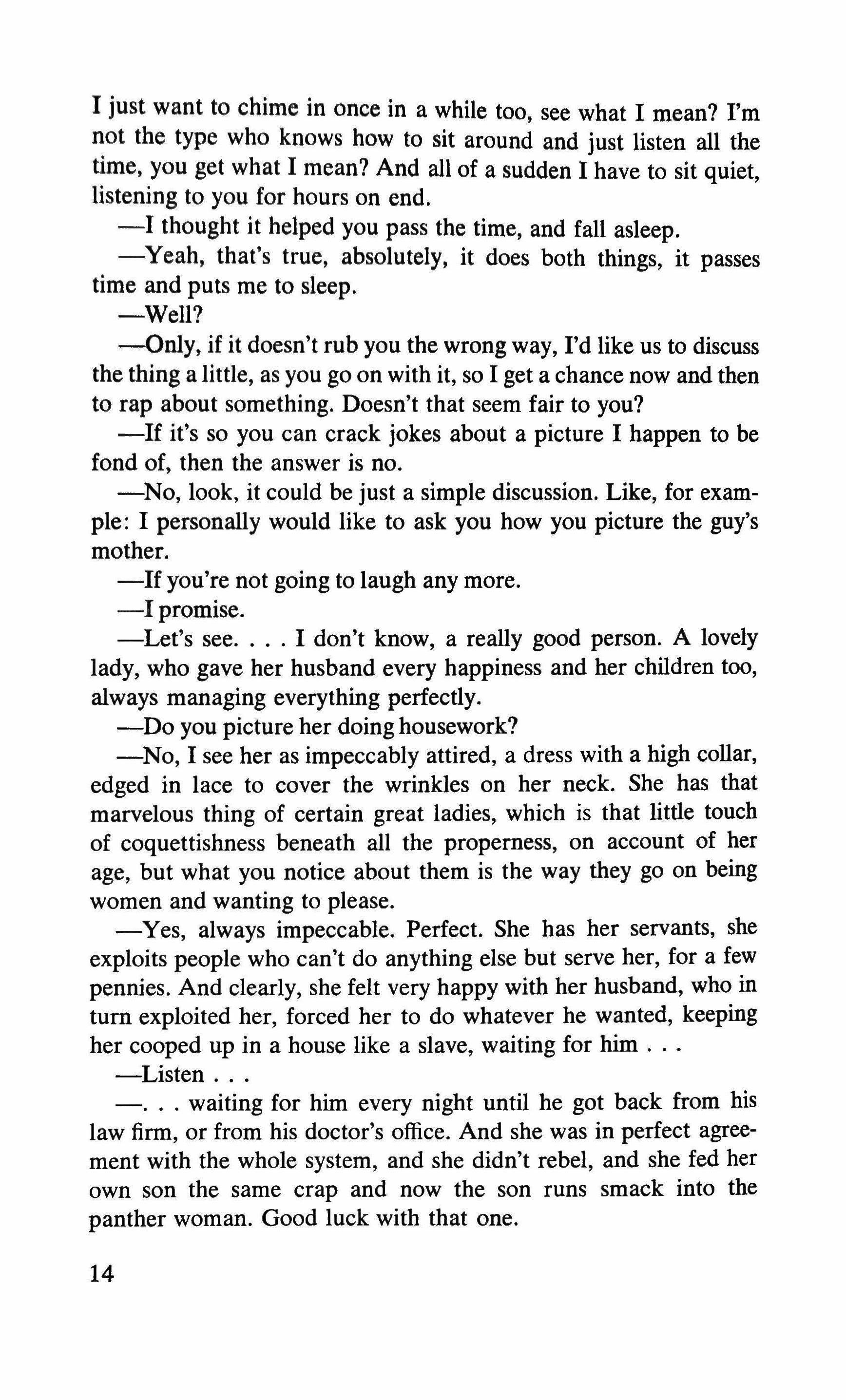
I just want to chime in once in a while too, see what I mean? I'm not the type who knows how to sit around and just listen all the time, you get what 1 mean? And all of a sudden 1 have to sit quiet, listening to you for hours on end.
-I thought it helped you pass the time, and fall asleep.
-Yeah, that's true, absolutely, it does both things, it passes time and puts me to sleep.
-Well?
-Only, if it doesn't rub you the wrong way, I'd like us to discuss the thing a little, as you go on with it, so 1 get a chance now and then to rap about something. Doesn't that seem fair to you?
-If it's so you can crack jokes about a picture 1 happen to be fond of, then the answer is no.
-No, look, it could be just a simple discussion. Like, for exampie: I personally would like to ask you how you picture the guy's mother.
-If you're not going to laugh any more.
-I promise.
-Let's see I don't know, a really good person. A lovely lady, who gave her husband every happiness and her children too, always managing everything perfectly.
-Do you picture her doing housework?
-No, I see her as impeccably attired, a dress with a high collar, edged in lace to cover the wrinkles on her neck. She has that marvelous thing of certain great ladies, which is that little touch of coquettishness beneath all the properness, on account of her age, but what you notice about them is the way they go on being women and wanting to please.
-Yes, always impeccable. Perfect. She has her servants, she exploits people who can't do anything else but serve her, for a few pennies. And clearly, she felt very happy with her husband, who in tum exploited her, forced her to do whatever he wanted, keeping her cooped up in a house like a slave, waiting for him
-Listen waiting for him every night until he got back from his law firm, or from his doctor's office. And she was in perfect agreement with the whole system, and she didn't rebel, and she fed her own son the same crap and now the son runs smack into the panther woman. Good luck with that one.
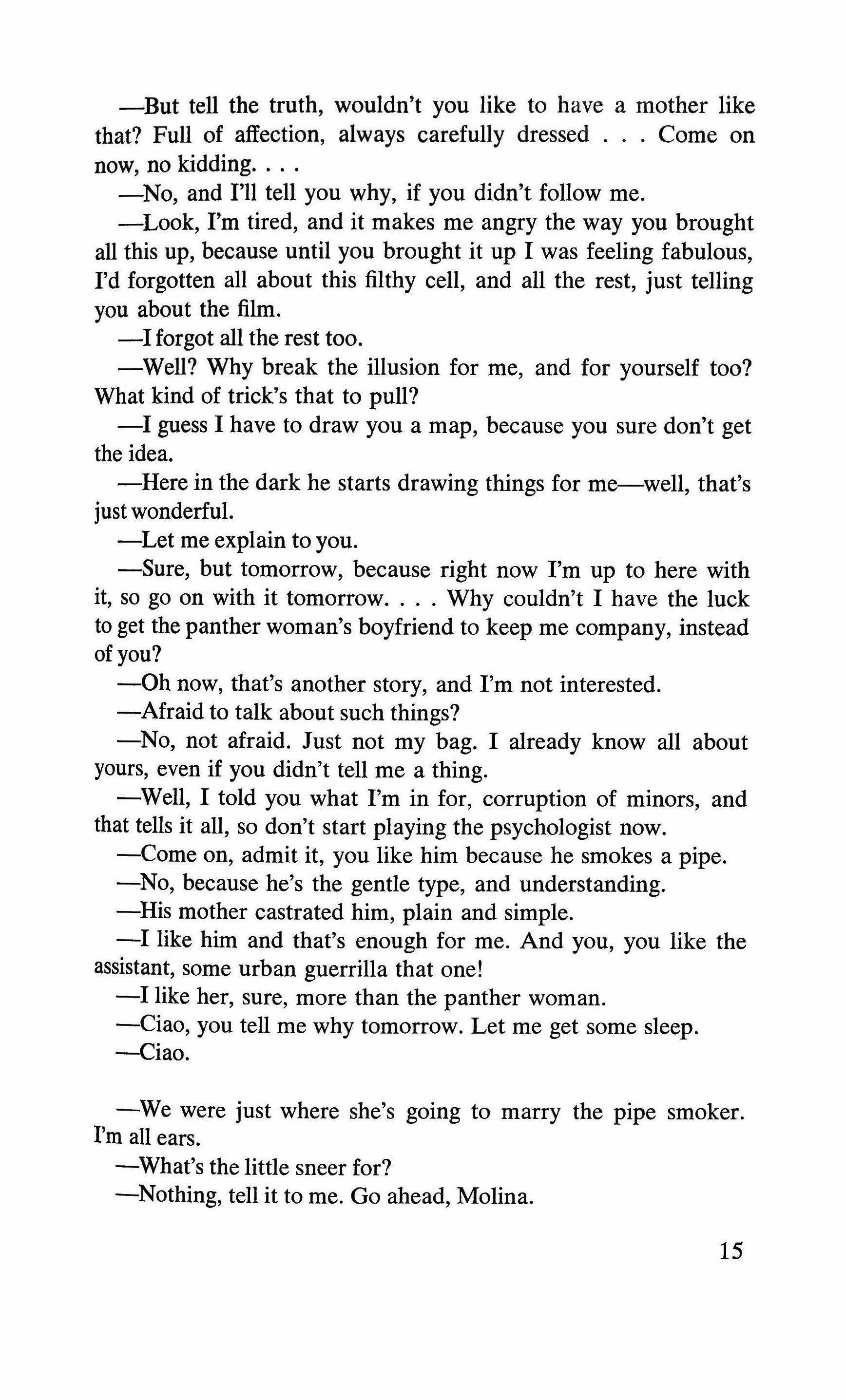
-But tell the truth, wouldn't you like to have a mother like that? Full of affection, always carefully dressed Come on now, no kidding
-No, and I'll tell you why, if you didn't follow me.
-Look, I'm tired, and it makes me angry the way you brought all this up, because until you brought it up I was feeling fabulous, I'd forgotten all about this filthy cell, and all the rest, just telling you about the film.
-I forgot all the rest too.
-Well? Why break the illusion for me, and for yourself too? What kind of trick's that to pull?
-I guess I have to draw you a map, because you sure don't get the idea.
-Here in the dark he starts drawing things for me-well, that's justwonderful.
-Let me explain to you.
-Sure, but tomorrow, because right now I'm up to here with it, so go on with it tomorrow Why couldn't I have the luck to get the panther woman's boyfriend to keep me company, instead of you?
-Oh now, that's another story, and I'm not interested.
-Afraid to talk about such things?
-No, not afraid. Just not my bag. I already know all about yours, even if you didn't tell me a thing.
-Well, I told you what I'm in for, corruption of minors, and that tells it all, so don't start playing the psychologist now.
-Come on, admit it, you like him because he smokes a pipe.
-No, because he's the gentle type, and understanding.
-His mother castrated him, plain and simple.
-I like him and that's enough for me. And you, you like the assistant, some urban guerrilla that one!
-I like her, sure, more than the panther woman.
-Ciao, you tell me why tomorrow. Let me get some sleep.
-Ciao.
-We were just where she's going to marry the pipe smoker. I'm all ears.
-What's the little sneer for?
-Nothing, tell it to me. Go ahead, Molina.

-No, you go ahead, you tell me about the pipe smoker since you know him so much better than me, I only saw the film.
-The pipe smoker's no good for you.
-Why not?
-Because what you have in mind's not strictly platonic, right? Admit it.
-Obviously.
-Okay, the reason he likes Irena is because she's frigid and he doesn't have to make her, that's why he looks after her and takes her home where the mother's all over the place. Even if she's dead she's there, in every stick of furniture, and the curtains and all that junk, didn't you say so yourself?
-Go on.
-If he's left all his mother's stuff in the house just the way it was, it's because he still wants to be a little boy, back in his mama's house, and what he brings home with him isn't a woman, it's a little playmate.
-But that's all your own concoction. How do I know if the house was the mother's? I told you that because I liked the apartment a lot, and since it was decorated with antiques I said it could be the mother's, but that's all. Maybe he rents the place furnished.
-Then you're inventing half the picture.
-No, I'm not inventing, I swear, but some things, to round them out for you, so you can see them the way I'm seeing them, well, to some extent I have to embroider a little. Like with the house, for example.
-Admit that it's the house you'd like to live in yourself.
-Yes, obviously. And now I have to put up with you while you tell me the same old thing everybody tells me.
-Is that so? What is it exactly I'm supposed to tell you?
-You're all alike, always coming to me with the same business, always!
-What?
-How they spoiled me too much as a kid, and that's why I'm the way I am, how I was tied to my mother's apron strings and now I'm this way, and how a person can always straighten out, though, and what I really need is a woman, because a woman's the best there is.
-That's what they tell you?
-Yes, and my answer is this Great! I agree! and since a
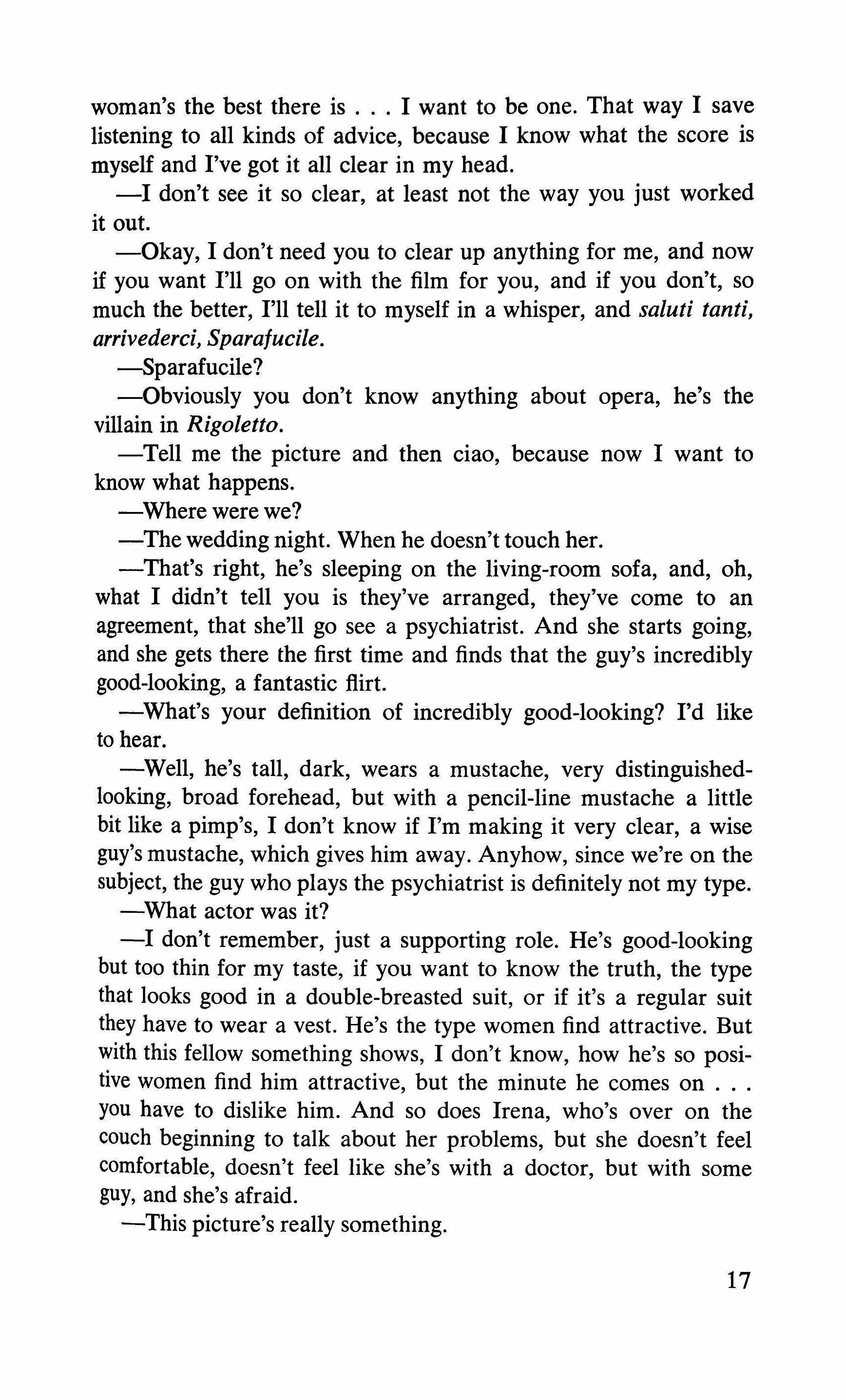
woman's the best there is I want to be one. That way I save listening to all kinds of advice, because I know what the score is myself and I've got it all clear in my head.
-I don't see it so clear, at least not the way you just worked it out.
-Okay, I don't need you to clear up anything for me, and now if you want I'll go on with the film for you, and if you don't, so much the better, I'll tell it to myself in a whisper, and saluti tanti, arrivederci, Sparafucile.
-Sparafucile?
-Obviously you don't know anything about opera, he's the villain in Rigoletto.
-Tell me the picture and then ciao, because now I want to know what happens.
-Where were we?
-The wedding night. When he doesn't touch her.
-That's right, he's sleeping on the living-room sofa, and, oh, what I didn't tell you is they've arranged, they've come to an agreement, that she'll go see a psychiatrist. And she starts going, and she gets there the first time and finds that the guy's incredibly good-looking, a fantastic flirt.
-What's your definition of incredibly good-looking? I'd like to hear.
-Well, he's tall, dark, wears a mustache, very distinguishedlooking, broad forehead, but with a pencil-line mustache a little bit like a pimp's, I don't know if I'm making it very clear, a wise guy's mustache, which gives him away. Anyhow, since we're on the subject, the guy who plays the psychiatrist is definitely not my type.
-What actor was it?
-I don't remember, just a supporting role. He's good-looking but too thin for my taste, if you want to know the truth, the type that looks good in a double-breasted suit, or if it's a regular suit they have to wear a vest. He's the type women find attractive. But with this fellow something shows, I don't know, how he's so positive women find him attractive, but the minute he comes on you have to dislike him. And so does Irena, who's over on the couch beginning to talk about her problems, but she doesn't feel comfortable, doesn't feel like she's with a doctor, but with some guy, and she's afraid.
-This picture's really something.
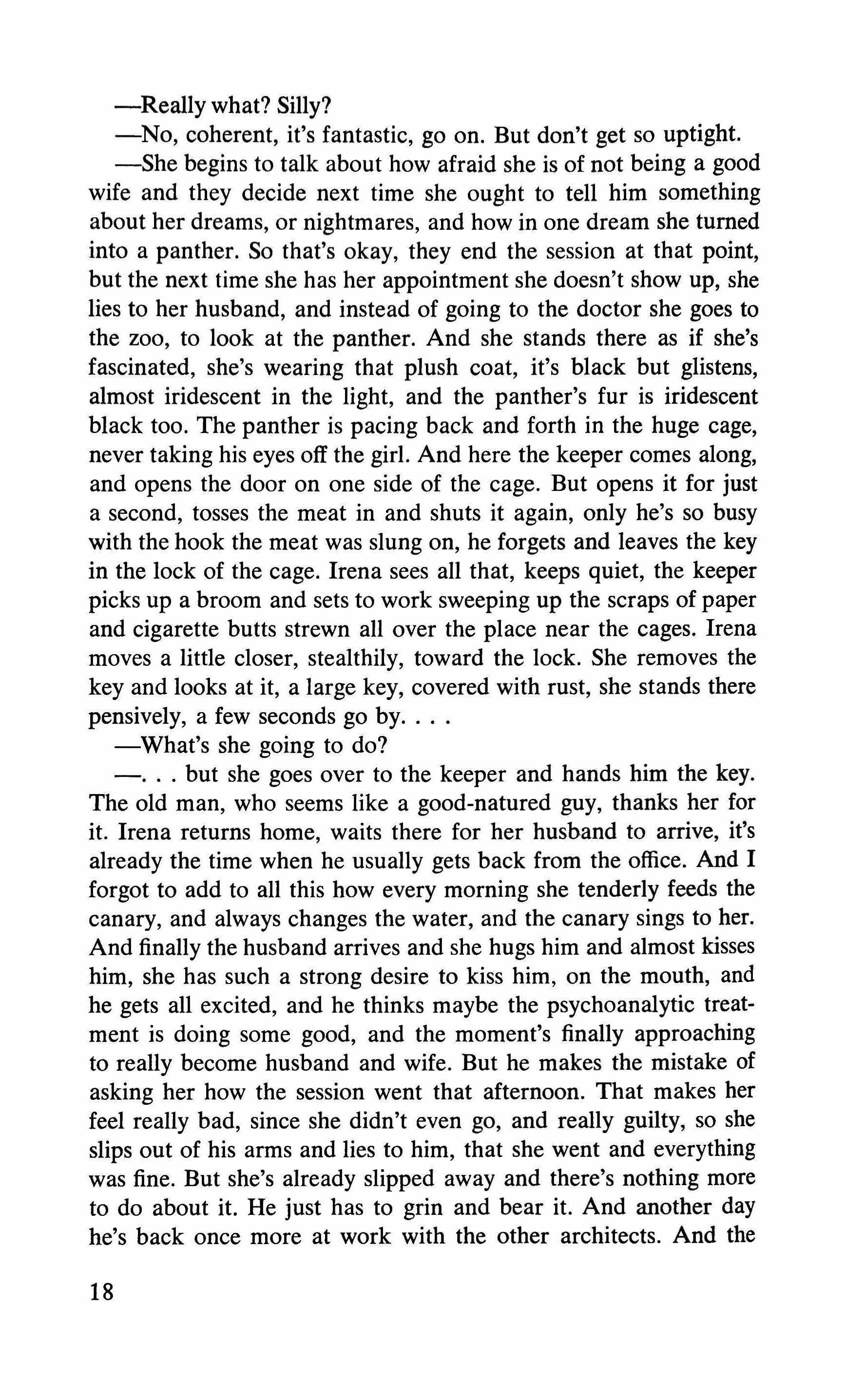
-Really what? Silly?
-No, coherent, it's fantastic, go on. But don't get so uptight.
-She begins to talk about how afraid she is of not being a good wife and they decide next time she ought to tell him something about her dreams, or nightmares, and how in one dream she turned into a panther. So that's okay, they end the session at that point, but the next time she has her appointment she doesn't show up, she lies to her husband, and instead of going to the doctor she goes to the zoo, to look at the panther. And she stands there as if she's fascinated, she's wearing that plush coat, it's black but glistens, almost iridescent in the light, and the panther's fur is iridescent black too. The panther is pacing back and forth in the huge cage, never taking his eyes off the girl. And here the keeper comes along, and opens the door on one side of the cage. But opens it for just a second, tosses the meat in and shuts it again, only he's so busy with the hook the meat was slung on, he forgets and leaves the key in the lock of the cage. Irena sees all that, keeps quiet, the keeper picks up a broom and sets to work sweeping up the scraps of paper and cigarette butts strewn all over the place near the cages. Irena moves a little closer, stealthily, toward the lock. She removes the key and looks at it, a large key, covered with rust, she stands there pensively, a few seconds go by
-What's she going to do?
- but she goes over to the keeper and hands him the key. The old man, who seems like a good-natured guy, thanks her for it. Irena returns home, waits there for her husband to arrive, it's already the time when he usually gets back from the office. And I forgot to add to all this how every morning she tenderly feeds the canary, and always changes the water, and the canary sings to her. And finally the husband arrives and she hugs him and almost kisses him, she has such a strong desire to kiss him, on the mouth, and he gets all excited, and he thinks maybe the psychoanalytic treatment is doing some good, and the moment's finally approaching to really become husband and wife. But he makes the mistake of asking her how the session went that afternoon. That makes her feel really bad, since she didn't even go, and really guilty, so she slips out of his arms and lies to him, that she went and everything was fine. But she's already slipped away and there's nothing more to do about it. He just has to grin and bear it. And another day he's back once more at work with the other architects. And the
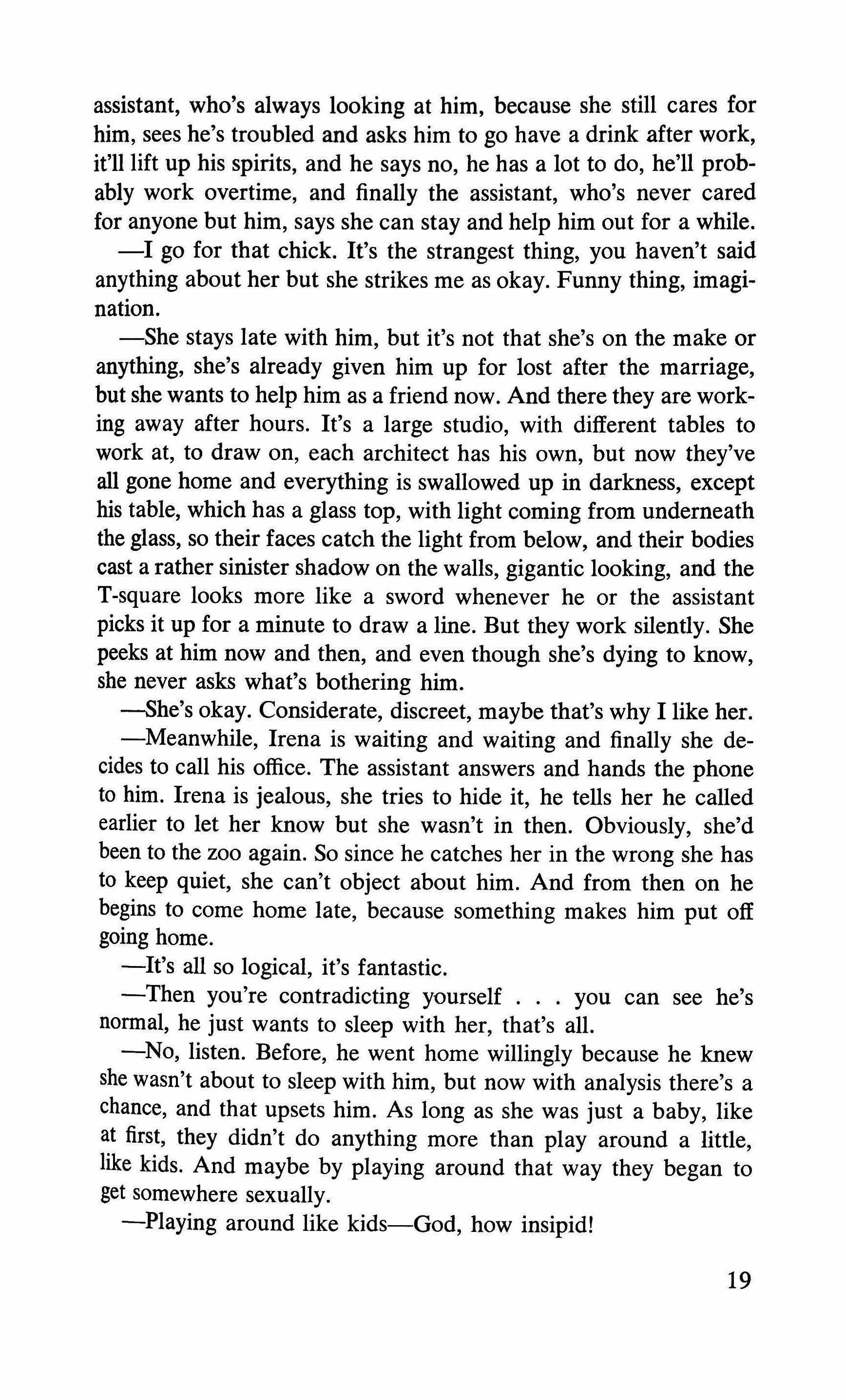
assistant, who's always looking at him, because she still cares for him, sees he's troubled and asks him to go have a drink after work, it'll lift up his spirits, and he says no, he has a lot to do, he'll probably work overtime, and finally the assistant, who's never cared for anyone but him, says she can stay and help him out for a while.
-I go for that chick. It's the strangest thing, you haven't said anything about her but she strikes me as okay. Funny thing, imagination.
-She stays late with him, but it's not that she's on the make or anything, she's already given him up for lost after the marriage, but she wants to help him as a friend now. And there they are working away after hours. It's a large studio, with different tables to work at, to draw on, each architect has his own, but now they've all gone home and everything is swallowed up in darkness, except his table, which has a glass top, with light coming from underneath the glass, so their faces catch the light from below, and their bodies cast a rather sinister shadow on the walls, gigantic looking, and the T-square looks more like a sword whenever he or the assistant picks it up for a minute to draw a line. But they work silently. She peeks at him now and then, and even though she's dying to know, she never asks what's bothering him.
--She's okay. Considerate, discreet, maybe that's why I like her.
-Meanwhile, Irena is waiting and waiting and finally she decides to call his office. The assistant answers and hands the phone to him. Irena is jealous, she tries to hide it, he tells her he called earlier to let her know but she wasn't in then. Obviously, she'd been to the zoo again. So since he catches her in the wrong she has to keep quiet, she can't object about him. And from then on he begins to come home late, because something makes him put off going home.
-It's all so logical, it's fantastic.
-Then you're contradicting yourself you can see he's normal, he just wants to sleep with her, that's all.
-No, listen. Before, he went home willingly because he knew she wasn't about to sleep with him, but now with analysis there's a chance, and that upsets him. As long as she was just a baby, like at first, they didn't do anything more than play around a little, like kids. And maybe by playing around that way they began to get somewhere sexually.
-Playing around like kids-God, how insipid!
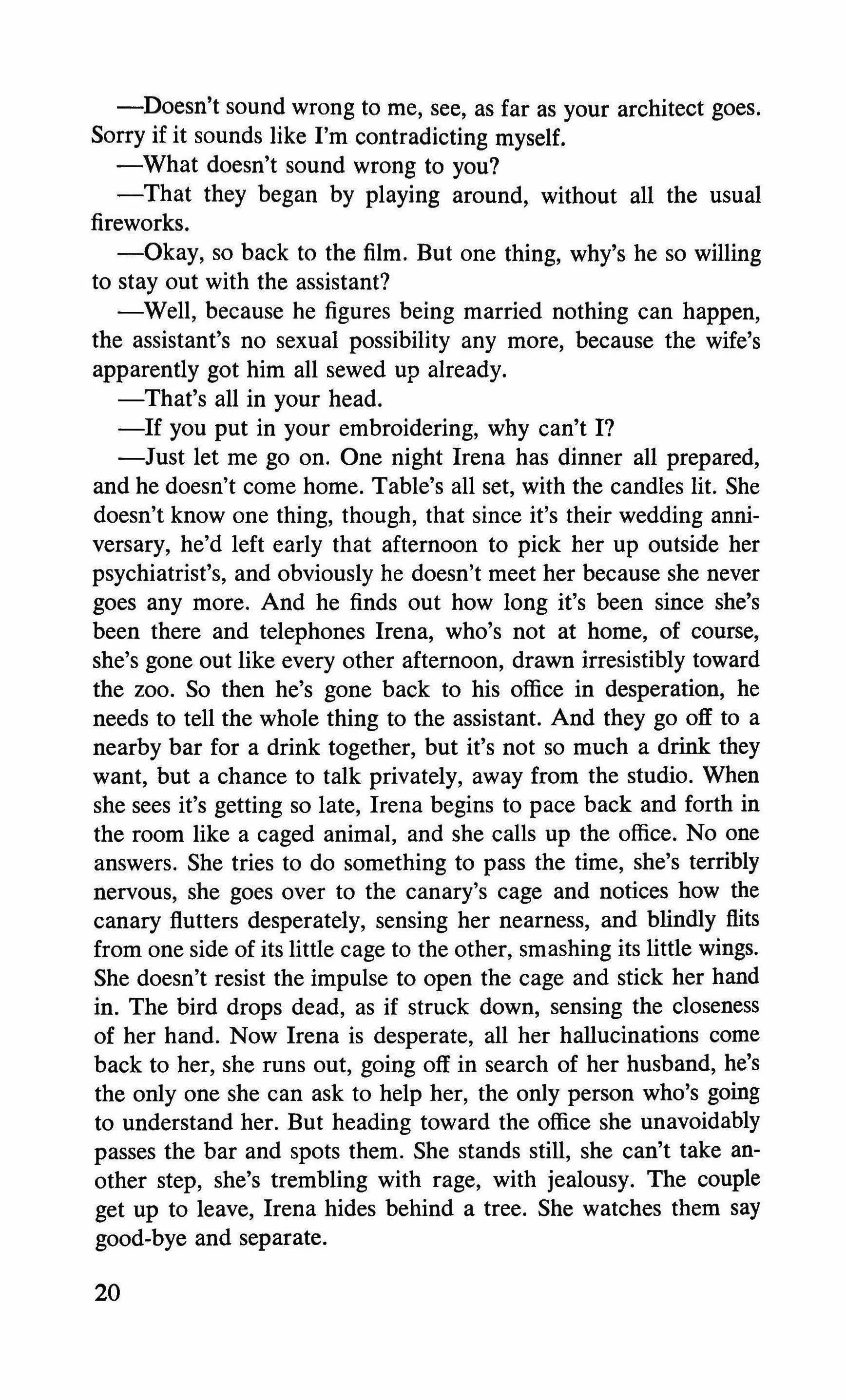
-Doesn't sound wrong to me, see, as far as your architect goes. Sorry if it sounds like I'm contradicting myself.
-What doesn't sound wrong to you?
-That they began by playing around, without all the usual fireworks.
-Okay, so back to the film. But one thing, why's he so willing to stay out with the assistant?
-Well, because he figures being married nothing can happen, the assistant's no sexual possibility any more, because the wife's apparently got him all sewed up already.
-That's all in your head.
-If you put in your embroidering, why can't I?
-Just let me go on. One night Irena has dinner all prepared, and he doesn't come home. Table's all set, with the candles lit. She doesn't know one thing, though, that since it's their wedding anniversary, he'd left early that afternoon to pick her up outside her psychiatrist's, and obviously he doesn't meet her because she never goes any more. And he finds out how long it's been since she's been there and telephones Irena, who's not at home, of course, she's gone out like every other afternoon, drawn irresistibly toward the zoo. So then he's gone back to his office in desperation, he needs to tell the whole thing to the assistant. And they go off to a nearby bar for a drink together, but it's not so much a drink they want, but a chance to talk privately, away from the studio. When she sees it's getting so late, Irena begins to pace back and forth in the room like a caged animal, and she calls up the office. No one answers. She tries to do something to pass the time, she's terribly nervous, she goes over to the canary's cage and notices how the canary flutters desperately, sensing her nearness, and blindly flits from one side of its little cage to the other, smashing its little wings. She doesn't resist the impulse to open the cage and stick her hand in. The bird drops dead, as if struck down, sensing the closeness of her hand. Now Irena is desperate, all her hallucinations come back to her, she runs out, going off in search of her husband, he's the only one she can ask to help her, the only person who's going to understand her. But heading toward the office she unavoidably passes the bar and spots them. She stands still, she can't take another step, she's trembling with rage, with jealousy. The couple get up to leave, Irena hides behind a tree. She watches them say good-bye and separate.
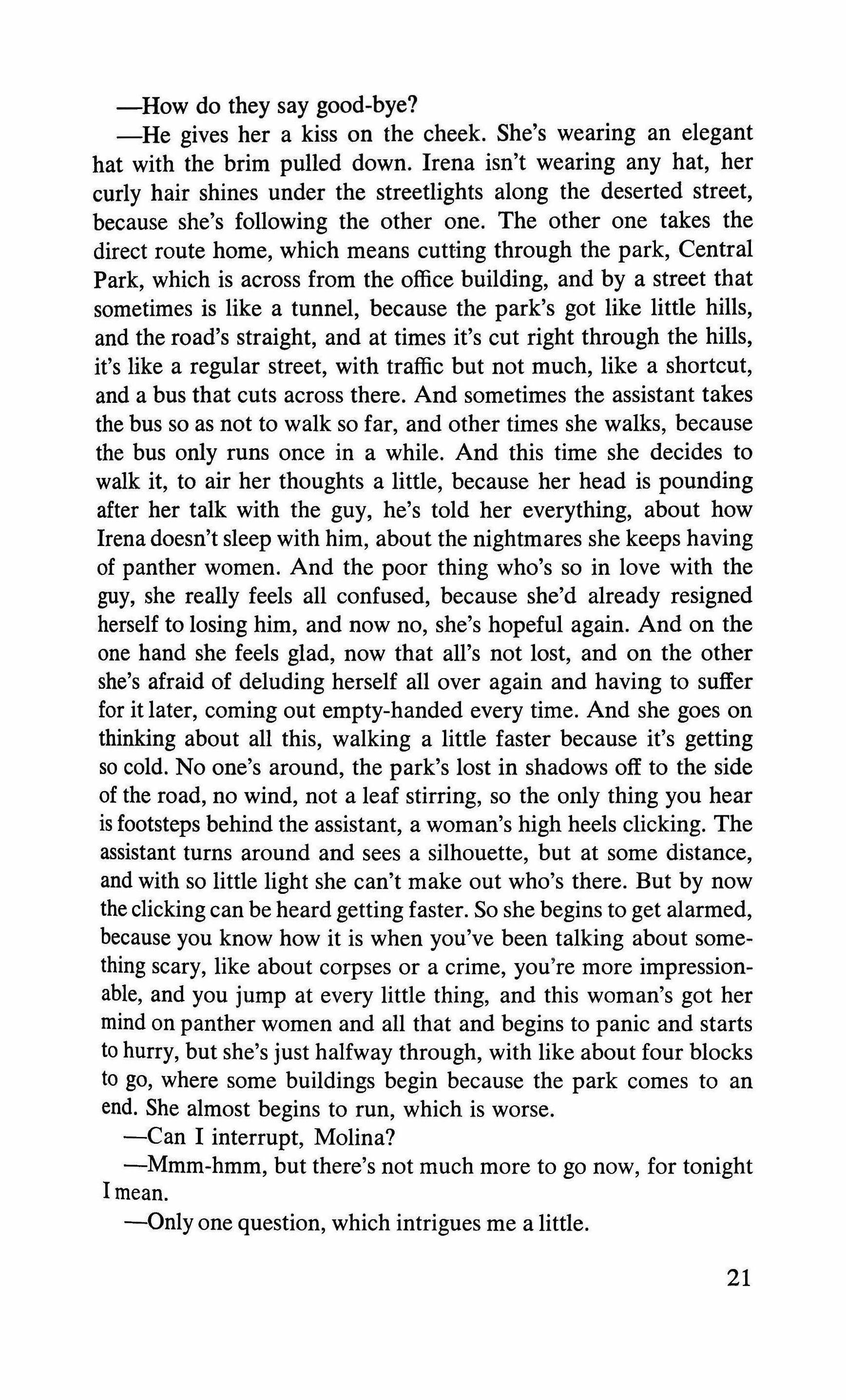
-How do they say good-bye?
-He gives her a kiss on the cheek. She's wearing an elegant hat with the brim pulled down. Irena isn't wearing any hat, her curly hair shines under the streetlights along the deserted street, because she's following the other one. The other one takes the direct route home, which means cutting through the park, Central Park, which is across from the office building, and by a street that sometimes is like a tunnel, because the park's got like little hills, and the road's straight, and at times it's cut right through the hills, it's like a regular street, with traffic but not much, like a shortcut, and a bus that cuts across there. And sometimes the assistant takes the bus so as not to walk so far, and other times she walks, because the bus only runs once in a while. And this time she decides to walk it, to air her thoughts a little, because her head is pounding after her talk with the guy, he's told her everything, about how Irena doesn't sleep with him, about the nightmares she keeps having of panther women. And the poor thing who's so in love with the guy, she really feels all confused, because she'd already resigned herself to losing him, and now no, she's hopeful again. And on the one hand she feels glad, now that all's not lost, and on the other she's afraid of deluding herself all over again and having to suffer for it later, coming out empty-handed every time. And she goes on thinking about all this, walking a little faster because it's getting so cold. No one's around, the park's lost in shadows off to the side of the road, no wind, not a leaf stirring, so the only thing you hear is footsteps behind the assistant, a woman's high heels clicking. The assistant turns around and sees a silhouette, but at some distance, and with so little light she can't make out who's there. But by now the clicking can be heard getting faster. So she begins to get alarmed, because you know how it is when you've been talking about something scary, like about corpses or a crime, you're more impressionable, and you jump at every little thing, and this woman's got her mind on panther women and all that and begins to panic and starts to hurry, but she's just halfway through, with like about four blocks to go, where some buildings begin because the park comes to an end. She almost begins to run, which is worse.
-Can I interrupt, Molina?
-Mmm-hmm, but there's not much more to go now, for tonight I mean.
-Only one question, which intrigues me a little.
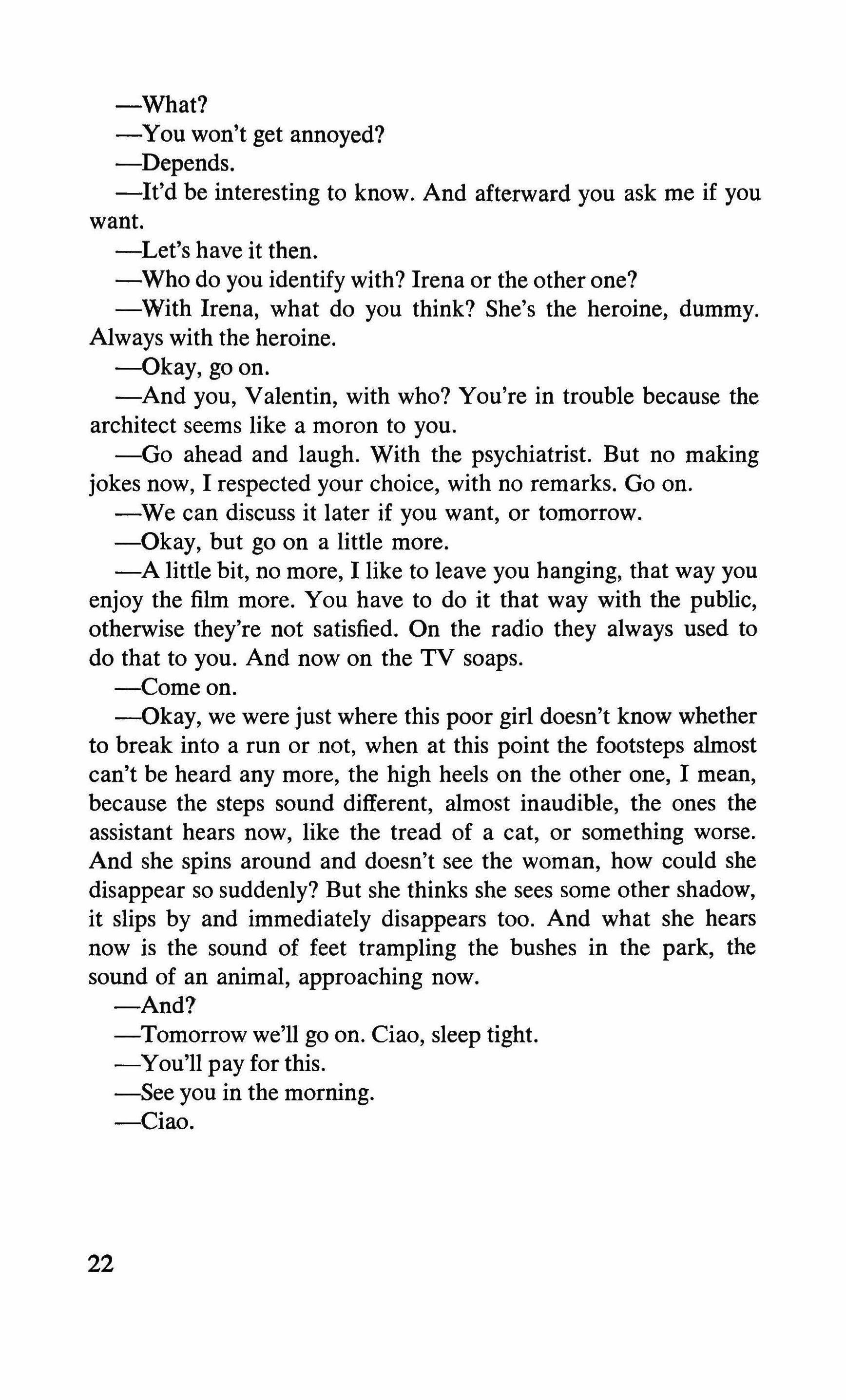
-What?
-You won't get annoyed?
-Depends.
-It'd be interesting to know. And afterward you ask me if you want.
-Let's have it then.
-Who do you identify with? Irena or the other one?
-With Irena, what do you think? She's the heroine, dummy. Always with the heroine.
-Okay, go on.
-And you, Valentin, with who? You're in trouble because the architect seems like a moron to you.
-Go ahead and laugh. With the psychiatrist. But no making jokes now, I respected your choice, with no remarks. Go on.
-We can discuss it later if you want, or tomorrow.
-Okay, but go on a little more.
-A little bit, no more, I like to leave you hanging, that way you enjoy the film more. You have to do it that way with the public, otherwise they're not satisfied. On the radio they always used to do that to you. And now on the TV soaps.
-Come on.
-Okay, we were just where this poor girl doesn't know whether to break into a run or not, when at this point the footsteps almost can't be heard any more, the high heels on the other one, I mean, because the steps sound different, almost inaudible, the ones the assistant hears now, like the tread of a cat, or something worse. And she spins around and doesn't see the woman, how could she disappear so suddenly? But she thinks she sees some other shadow, it slips by and immediately disappears too. And what she hears now is the sound of feet trampling the bushes in the park, the sound of an animal, approaching now.
-And?
-Tomorrow we'll go on. Ciao, sleep tight.
-You'll pay for this.
-See you in the morning.
-Ciao.
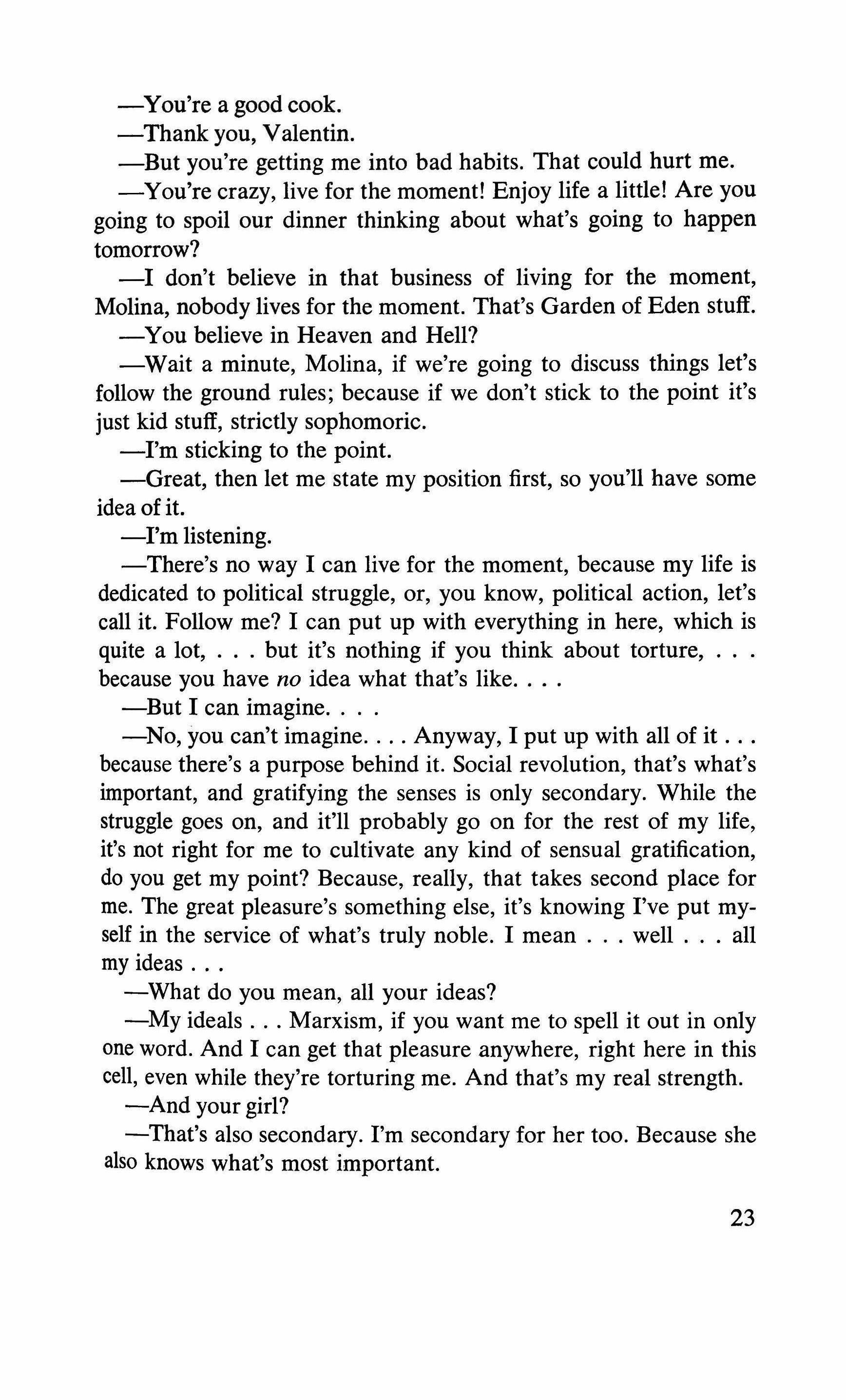
-You're a good cook.
-Thank you, Valentin.
-But you're getting me into bad habits. That could hurt me.
-You're crazy, live for the moment! Enjoy life a little! Are you going to spoil our dinner thinking about what's going to happen tomorrow?
-I don't believe in that business of living for the moment, Molina, nobody lives for the moment. That's Garden of Eden stuff.
-You believe in Heaven and Hell?
-Wait a minute, Molina, if we're going to discuss things let's follow the ground rules; because if we don't stick to the point it's just kid stuff, strictly sophomoric.
-I'm sticking to the point.
-Great, then let me state my position first, so you'll have some idea of it.
-I'm listening.
-There's no way 1 can live for the moment, because my life is dedicated to political struggle, or, you know, political action, let's call it. Follow me? 1 can put up with everything in here, which is quite a lot, but it's nothing if you think about torture, because you have no idea what that's like
-But 1 can imagine.
-No, you can't imagine Anyway, 1 put up with all of it because there's a purpose behind it. Social revolution, that's what's important, and gratifying the senses is only secondary. While the struggle goes on, and it'll probably go on for the rest of my life, it's not right for me to cultivate any kind of sensual gratification, do you get my point? Because, really, that takes second place for me. The great pleasure's something else, it's knowing I've put myself in the service of what's truly noble. 1 mean well all my ideas
-What do you mean, all your ideas?
-My ideals Marxism, if you want me to spell it out in only one word. And 1 can get that pleasure anywhere, right here in this cell, even while they're torturing me. And that's my real strength.
-And your girl?
-That's also secondary. I'm secondary for her too. Because she also knows what's most important.
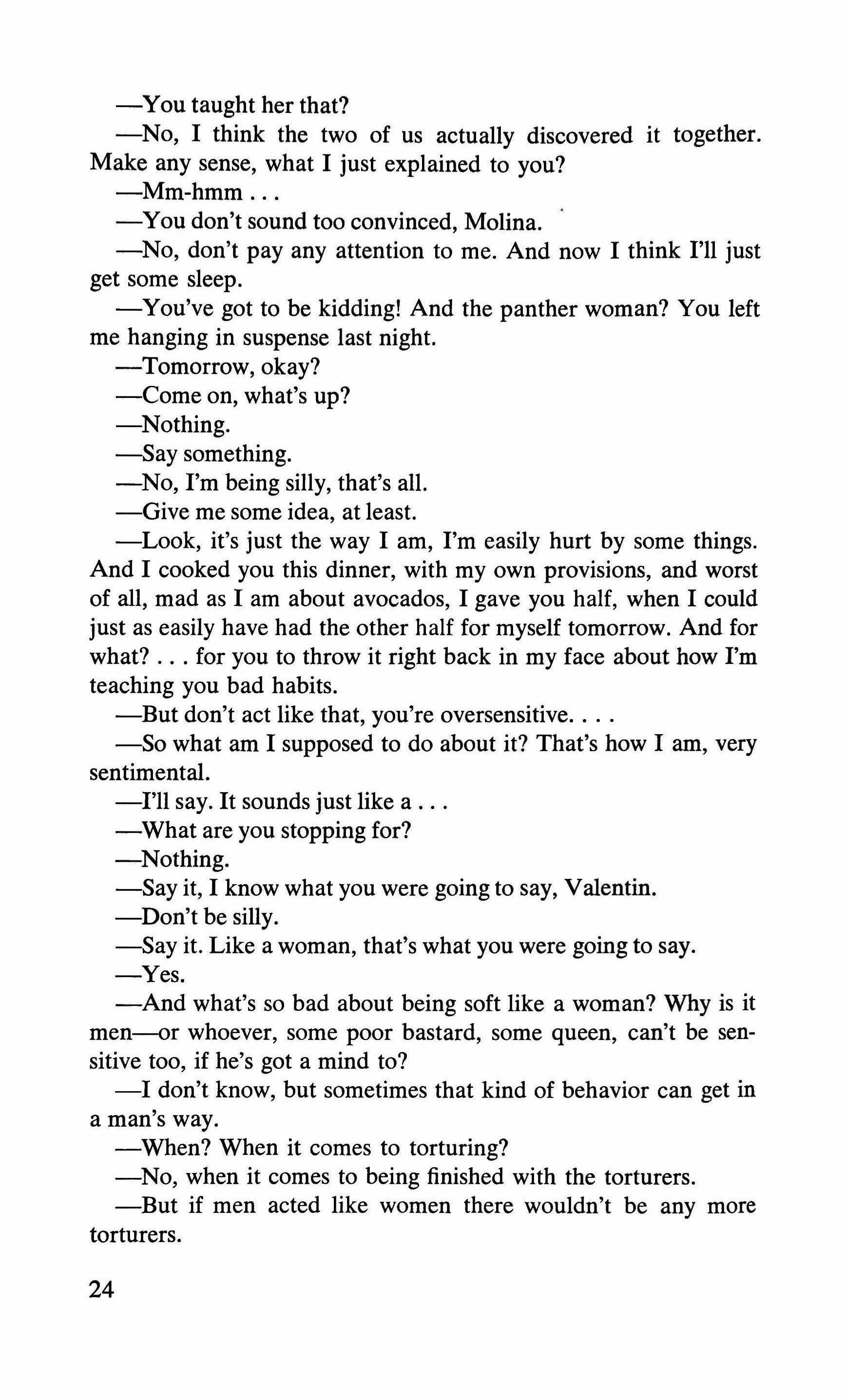
-You taught her that?
-No, 1 think the two of us actually discovered it together. Make any sense, what 1 just explained to you?
-Mm-hmm
-You don't sound too convinced, Molina..
-No, don't pay any attention to me. And now 1 think I'll just get some sleep.
-You've got to be kidding! And the panther woman? You left me hanging in suspense last night.
-Tomorrow, okay?
-Come on, what's up?
-Nothing.
-Say something.
-No, I'm being silly, that's all.
-Give me some idea, at least.
-Look, it's just the way 1 am, I'm easily hurt by some things. And 1 cooked you this dinner, with my own provisions, and worst of all, mad as 1 am about avocados, 1 gave you half, when 1 could just as easily have had the other half for myself tomorrow. And for what? for you to throw it right back in my face about how I'm teaching you bad habits.
-But don't act like that, you're oversensitive
-So what am 1 supposed to do about it? That's how 1 am, very sentimental.
-I'll say. It sounds just like a
-What are you stopping for?
-Nothing.
-Say it, 1 know what you were going to say, Valentin.
-Don't be silly.
-Say it. Like a woman, that's what you were going to say.
-Yes.
-And what's so bad about being soft like a woman? Why is it men-or whoever, some poor bastard, some queen, can't be sensitive too, if he's got a mind to?
-I don't know, but sometimes that kind of behavior can get in a man's way.
-When? When it comes to torturing?
-No, when it comes to being finished with the torturers.
-But if men acted like women there wouldn't be any more torturers.
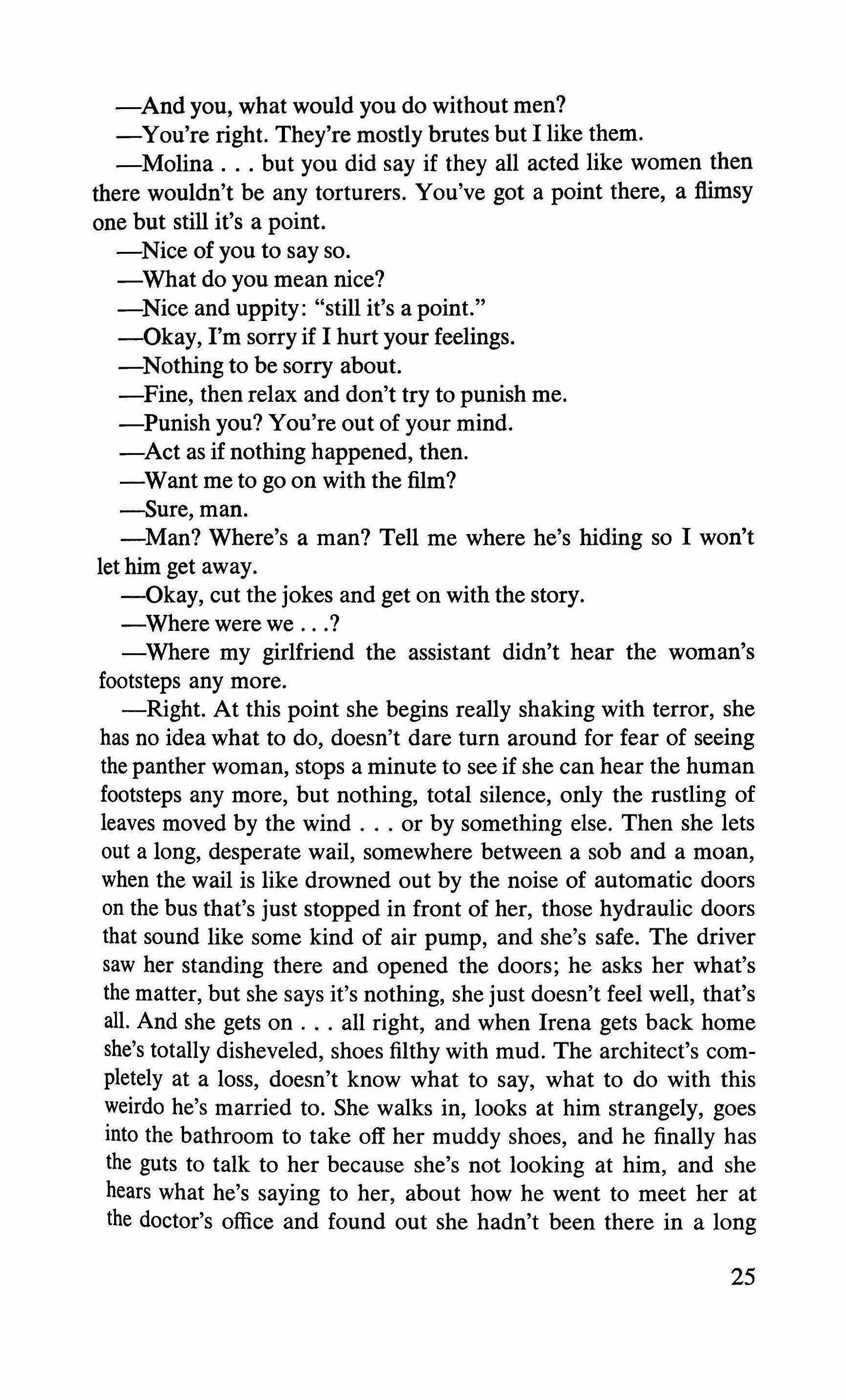
-And you, what would you do without men?
-You're right. They're mostly brutes but I like them.
-Molina but you did say if they all acted like women then there wouldn't be any torturers. You've got a point there, a flimsy one but still it's a point.
-Nice of you to say so.
-What do you mean nice?
-Nice and uppity: "still it's a point."
-Okay, I'm sorry if I hurt your feelings.
-Nothing to be sorry about.
-Fine, then relax and don't try to punish me.
-Punish you? You're out of your mind.
-Act as if nothing happened, then.
-Want me to go on with the film?
-Sure, man.
-Man? Where's a man? Tell me where he's hiding so I won't let him get away.
-Okay, cut the jokes and get on with the story.
-Where were we ?
-Where my girlfriend the assistant didn't hear the woman's footsteps any more.
-Right. At this point she begins really shaking with terror, she has no idea what to do, doesn't dare turn around for fear of seeing the panther woman, stops a minute to see if she can hear the human footsteps any more, but nothing, total silence, only the rustling of leaves moved by the wind or by something else. Then she lets out a long, desperate wail, somewhere between a sob and a moan, when the wail is like drowned out by the noise of automatic doors on the bus that's just stopped in front of her, those hydraulic doors that sound like some kind of air pump, and she's safe. The driver saw her standing there and opened the doors; he asks her what's the matter, but she says it's nothing, she just doesn't feel well, that's all. And she gets on all right, and when Irena gets back home she's totally disheveled, shoes filthy with mud. The architect's completely at a loss, doesn't know what to say, what to do with this weirdo he's married to. She walks in, looks at him strangely, goes into the bathroom to take off her muddy shoes, and he finally has the guts to talk to her because she's not looking at him, and she hears what he's saying to her, about how he went to meet her at the doctor's office and found out she hadn't been there in a long
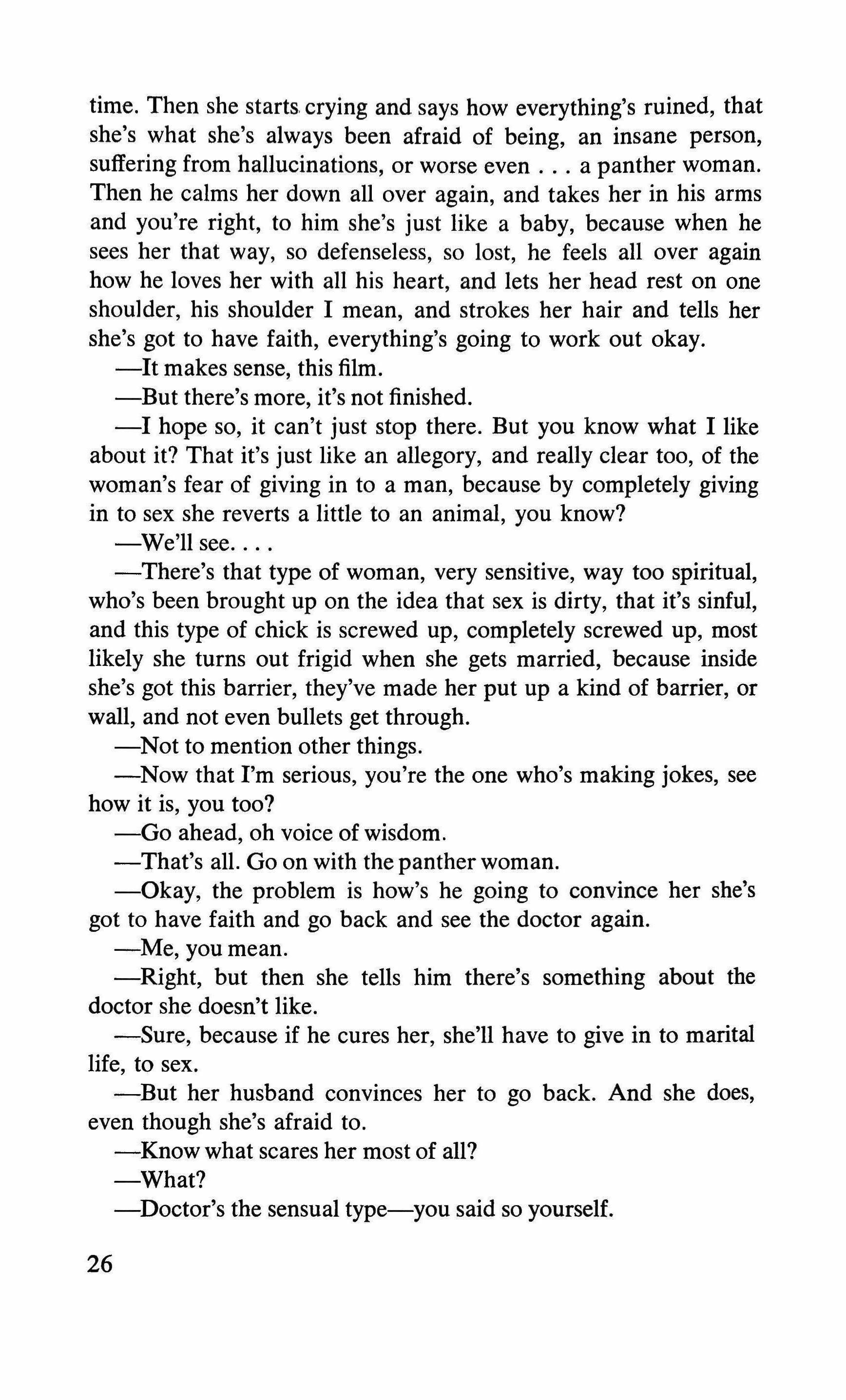
time. Then she starts, crying and says how everything's ruined, that she's what she's always been afraid of being, an insane person, suffering from hallucinations, or worse even a panther woman. Then he calms her down all over again, and takes her in his arms and you're right, to him she's just like a baby, because when he sees her that way, so defenseless, so lost, he feels all over again how he loves her with all his heart, and lets her head rest on one shou1der, his shoulder I mean, and strokes her hair and tells her she's got to have faith, everything's going to work out okay.
-It makes sense, this film.
-But there's more, it's not finished.
-I hope so, it can't just stop there. But you know what I like about it? That it's just like an allegory, and really clear too, of the woman's fear of giving in to a man, because by completely giving in to sex she reverts a little to an animal, you know?
-We'll see.
-There's that type of woman, very sensitive, way too spiritual, who's been brought up on the idea that sex is dirty, that it's sinful, and this type of chick is screwed up, completely screwed up, most likely she turns out frigid when she gets married, because inside she's got this barrier, they've made her put up a kind of barrier, or wall, and not even bullets get through.
-Not to mention other things.
-Now that I'm serious, you're the one who's making jokes, see how it is, you too?
-Go ahead, oh voice of wisdom.
-That's all. Go on with the panther woman.
-Okay, the problem is how's he going to convince her she's got to have faith and go back and see the doctor again.
-Me, you mean.
-Right, but then she tells him there's something about the doctor she doesn't like.
-Sure, because if he cures her, she'll have to give in to marital life, to sex.
-But her husband convinces her to go back. And she does, even though she's afraid to.
-Know what scares her most of all?
-What?
-Doctor's the sensual type-you said so yourself.

-Mmm-hmm.
-And that's just the problem, because he turns her on, and on account of that she won't give in to any treatment.
-Fine, so she goes to the doctor's office. And she confides to him in all sincerity, tells him her greatest fear is of kissing a man and turning into a panther. And here's where the doctor makes a mistake and tries to remove her fear by showing how unafraid he is himself, how sure he is she's an enchanting woman, an adorable woman, and that's all, 1 mean the guy chooses a slightly fishy treatment, letting his desires get the best of him because he's actually looking for some way to kiss her, that's what he's looking for. But she doesn't fall for it, she has just the opposite response, that yes, the doctor's right and she's normal and so she leaves his office right then and goes away satisfied, goes straight to the architect's studio, as if with the intention, the decision already made, of giving herself to her husband that very night. She's happy, and runs all the way, and gets there almost out of breath. But in the doorway she's suddenly paralyzed. It's late already and everyone's gone home, except her husband and the assistant, and they seem to be talking, holding hands, but you can't tell if it's a friendly gesture or what. He's talking, with his eyes lowered, while the assistant listens to him knowingly. They have no idea someone's walked in. And here my memory's foggy.
-Wait a second, it'll come back to you.
-I remember there's a scene in a swimming pool, and another right there in the architect's studio, and still another, the last, with the psychiatrist.
-Don't tell me that at the end the panther woman winds up with me.
-No. Don't rush. Anyway, 1 can tell you this whole last part in a very sketchy way, if you want, as much as 1 remember of it.
-Sure.
-So, he and the other one are busy talking there in the studio, and they stop talking because they hear a door creak. They look up and nobody's there, it's dark in the studio, no other light than the table they're at, with that slightly sinister glare coming from below. And you hear an animal's footsteps, rustling papers underfoot, and, yes, now 1 remember, there's a wastepaper basket in a dark corner and the basket tumbles over and footsteps crumple
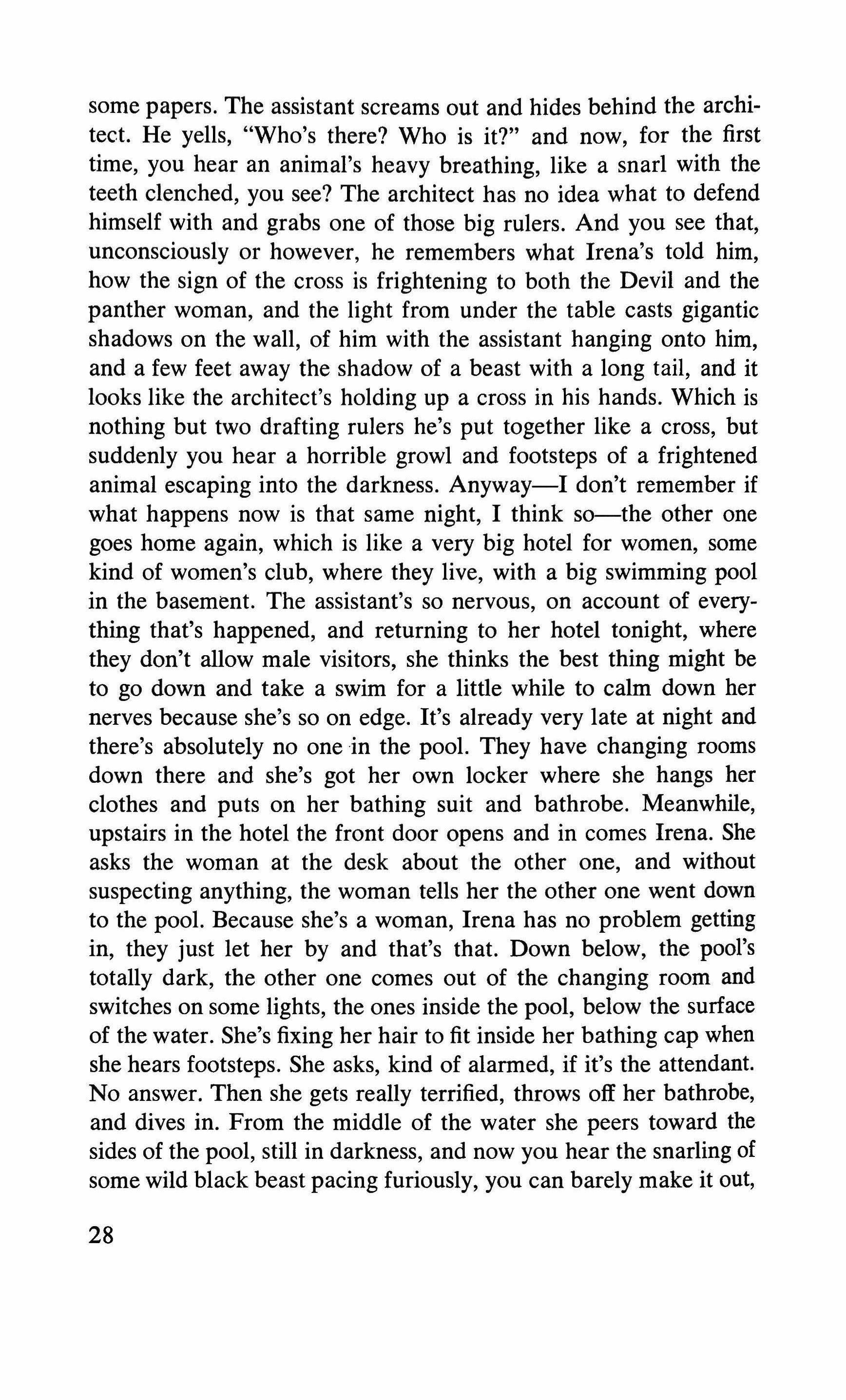
some papers. The assistant screams out and hides behind the architect. He yells, "Who's there? Who is it?" and now, for the first time, you hear an animal's heavy breathing, like a snarl with the teeth clenched, you see? The architect has no idea what to defend himself with and grabs one of those big rulers. And you see that, unconsciously or however, he remembers what Irena's told him, how the sign of the cross is frightening to both the Devil and the panther woman, and the light from under the table casts gigantic shadows on the wall, of him with the assistant hanging onto him, and a few feet away the shadow of a beast with a long tail, and it looks like the architect's holding up a cross in his hands. Which is nothing but two drafting rulers he's put together like a cross, but suddenly you hear a horrible growl and footsteps of a frightened animal escaping into the darkness. Anyway-I don't remember if what happens now is that same night, I think so-the other one goes home again, which is like a very big hotel for women, some kind of women's club, where they live, with a big swimming pool in the basement. The assistant's so nervous, on account of everything that's happened, and returning to her hotel tonight, where they don't allow male visitors, she thinks the best thing might be to go down and take a swim for a little while to calm down her nerves because she's so on edge. It's already very late at night and there's absolutely no one in the pool. They have changing rooms down there and she's got her own locker where she hangs her clothes and puts on her bathing suit and bathrobe. Meanwhile, upstairs in the hotel the front door opens and in comes Irena. She asks the woman at the desk about the other one, and without suspecting anything, the woman tells her the other one went down to the pool. Because she's a woman, Irena has no problem getting in, they just let her by and that's that. Down below, the pool's totally dark, the other one comes out of the changing room and switches on some lights, the ones inside the pool, below the surface of the water. She's fixing her hair to fit inside her bathing cap when she hears footsteps. She asks, kind of alarmed, if it's the attendant. No answer. Then she gets really terrified, throws off her bathrobe, and dives in. From the middle of the water she peers toward the sides of the pool, still in darkness, and now you hear the snarling of some wild black beast pacing furiously, you can barely make it out,
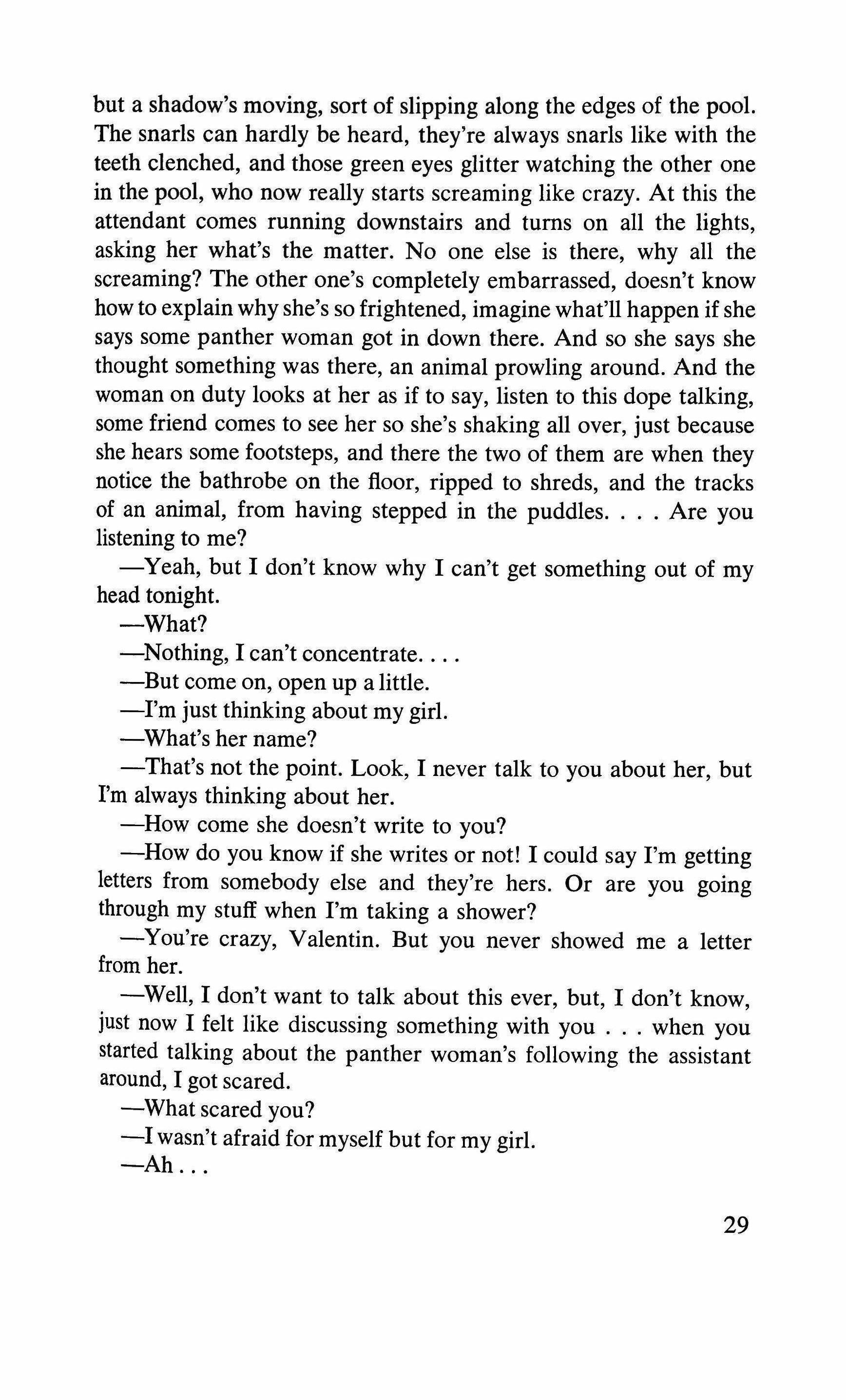
but a shadow's moving, sort of slipping along the edges of the pool. The snarls can hardly be heard, they're always snarls like with the teeth clenched, and those green eyes glitter watching the other one in the pool, who now really starts screaming like crazy. At this the attendant comes running downstairs and turns on all the lights, asking her what's the matter. No one else is there, why all the screaming? The other one's completely embarrassed, doesn't know how to explain why she's so frightened, imagine what'll happen if she says some panther woman got in down there. And so she says she thought something was there, an animal prowling around. And the woman on duty looks at her as if to say, listen to this dope talking, some friend comes to see her so she's shaking all over, just because she hears some footsteps, and there the two of them are when they notice the bathrobe on the floor, ripped to shreds, and the tracks of an animal, from having stepped in the puddles. Are you listening to me?
-Yeah, but I don't know why I can't get something out of my head tonight.
-What?
-Nothing, I can't concentrate
-But come on, open up a little.
-I'm just thinking about my girl.
-What's her name?
-That's not the point. Look, I never talk to you about her, but I'm always thinking about her.
-How come she doesn't write to you?
-How do you know if she writes or not! I could say I'm getting letters from somebody else and they're hers. Or are you going through my stuff when I'm taking a shower?
-You're crazy, Valentin. But you never showed me a letter from her.
-Well, 1 don't want to talk about this ever, but, 1 don't know, just now I felt like discussing something with you when you started talking about the panther woman's following the assistant around, I got scared.
-What scared you?
-I wasn't afraid for myself but for my girl.
-Ah

-I must be nuts, bringing this subject up.
-Why? Talk if you feel like it.
-When you started telling how the girl was being followed by the panther woman, I pictured that it was my woman who was in danger. And I feel so helpless here, about warning her to be careful, about not taking too many risks.
-I understand.
-Well, you can imagine, if she's my girl, it's because she's in the struggle too. Although I shouldn't be telling you, Molina.
-Don't worry.
-Just that I don't want to saddle you with any information you're better off not having. It's a burden, and you've already got enough of your own.
-Me too, you know, I have that sensation, from being in here, of not being able to do anything; but in my case it's not a woman, not a girl I mean, it's my mother.
-Your mother's not all alone, or is she?
-Well, she's with an aunt of mine, my father's sister. But it's just that she's so sick. She's got high blood pressure and her heart's weak.
-But, you know, with that kind of thing they can still go on, sometimes for years and years.
-But you still have to avoid upsetting them, Valentin.
-What can you do?
-Right, I can't make it any worse for her than I already have.
-Why do you say that?
-Imagine, the shame of having a son in prison. And the reason.
-Don't think about it. The worst's over, right now she's got to accept it, that's all.
-But she misses me so much. We've always been very close.
-Try not to think about it. Or if not accept the fact that she's not in any danger, like the person I love.
-But she's got the danger inside, she carries the enemy around inside, it's that weak heart of hers.
-She's waiting for you, she knows you're going to get out of here, eight years go by, and with the hope of good conduct and all. That gives her the strength to wait for you, think of it that way.
-Mm-hmm, you're right.
-Otherwise you'll go crazy.
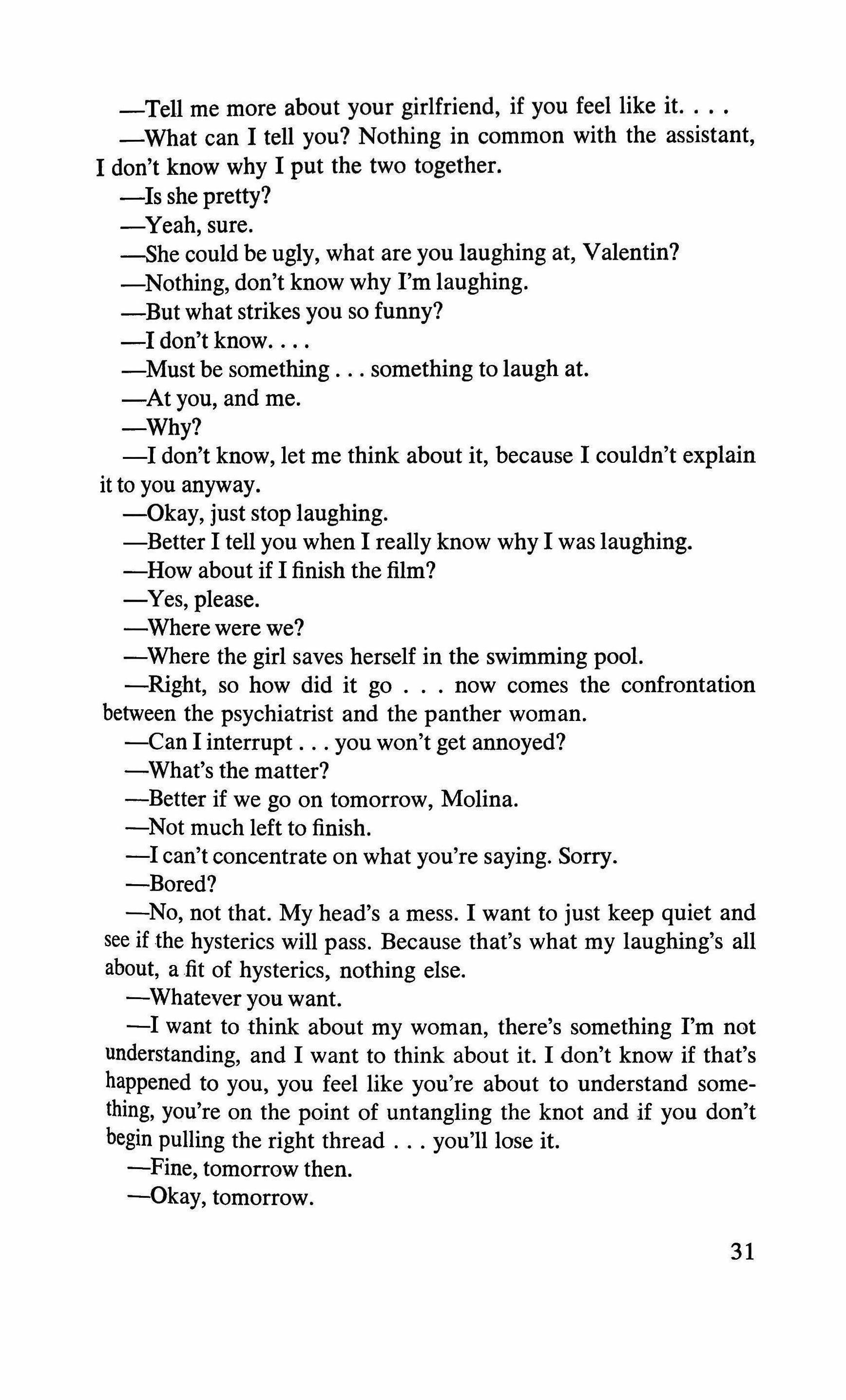
-Tell me more about your girlfriend, if you feel like it
-What can 1 tell you? Nothing in common with the assistant, 1 don't know why 1 put the two together.
-Is she pretty?
-Yeah, sure.
-She could be ugly, what are you laughing at, Valentin?
-Nothing, don't know why I'm laughing.
-But what strikes you so funny?
-I don't know
-Must be something something to laugh at.
-At you, and me.
-Why?
-I don't know, let me think about it, because 1 couldn't explain it to you anyway.
-Okay, just stop laughing.
-Better 1 tell you when 1 really know why 1 was laughing.
-How about if 1 finish the film?
-Yes, please.
-Where were we?
-Where the girl saves herself in the swimming pool.
-Right, so how did it go now comes the confrontation between the psychiatrist and the panther woman.
-Can 1 interrupt you won't get annoyed?
-What's the matter?
-Better if we go on tomorrow, Molina.
-Not much left to finish.
-I can't concentrate on what you're saying. Sorry.
-Bored?
-No, not that. My head's a mess. I want to just keep quiet and see if the hysterics will pass. Because that's what my laughing's all about, a fit of hysterics, nothing else.
-Whatever you want.
-I want to think about my woman, there's something I'm not understanding, and I want to think about it. I don't know if that's happened to you, you feel like you're about to understand something, you're on the point of untangling the knot and if you don't begin pulling the right thread you'll lose it.
-Fine, tomorrow then.
-Okay, tomorrow.
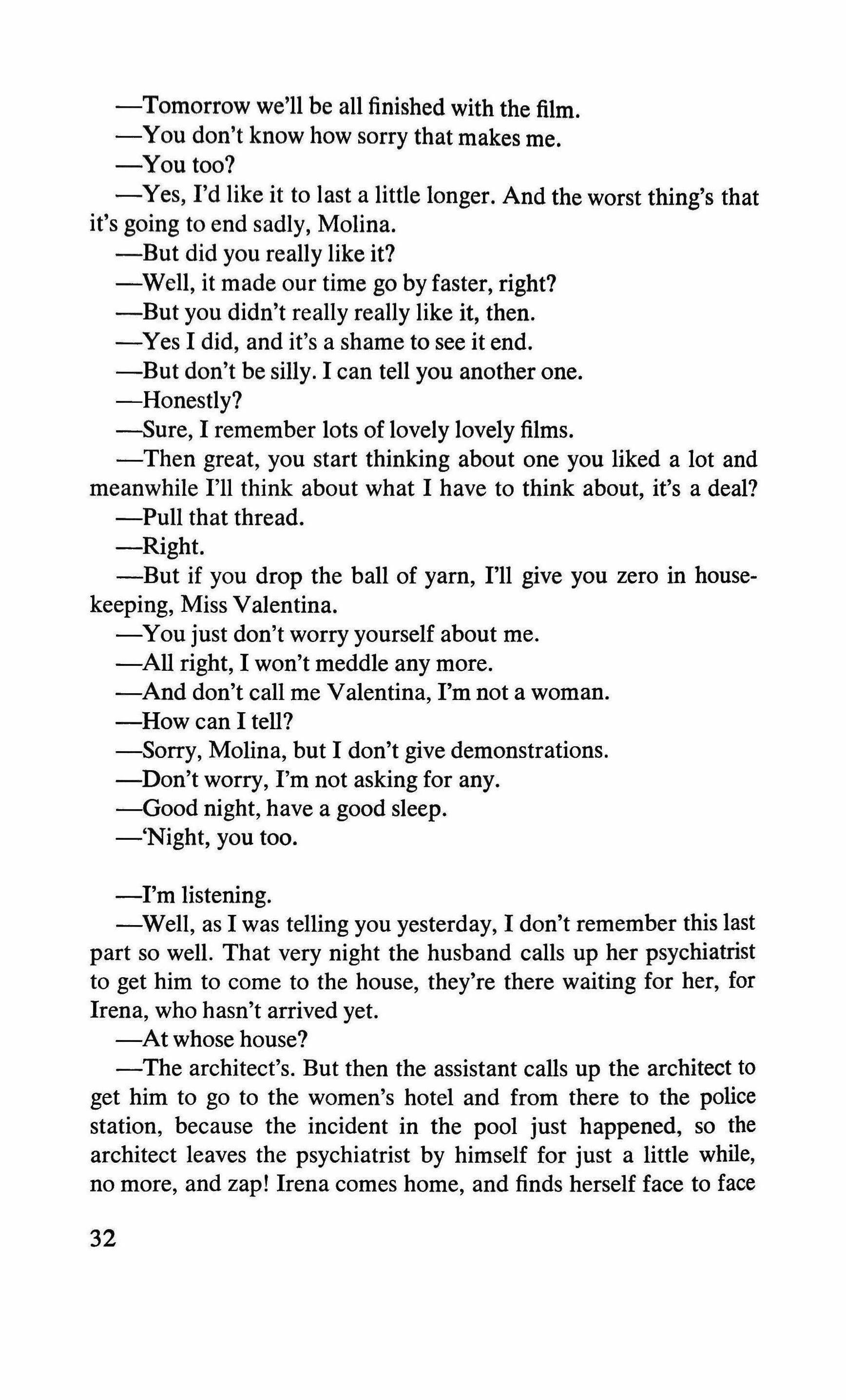
-Tomorrow we'll be all finished with the film.
-You don't know how sorry that makes me.
-You too?
-Yes, I'd like it to last a little longer. And the worst thing's that it's going to end sadly, Molina.
-But did you really like it?
-Well, it made our time go by faster, right?
-But you didn't really really like it, then.
-Yes I did, and it's a shame to see it end.
-But don't be silly. I can tell you another one.
-Honestly?
-Sure, I remember lots of lovely lovely films.
-Then great, you start thinking about one you liked a lot and meanwhile I'll think about what I have to think about, it's a deal?
-Pull that thread.
-Right.
-But if you drop the ball of yarn, I'll give you zero in housekeeping, Miss Valentina.
-You just don't worry yourself about me.
-All right, I won't meddle any more.
-And don't call me Valentina, I'm not a woman.
-How can I tell?
-Sorry, Molina, but I don't give demonstrations.
-Don't worry, I'm not asking for any.
-Good night, have a good sleep.
-'Night, you too.
-I'm listening.
-Well, as I was telling you yesterday, I don't remember this last part so well. That very night the husband calls up her psychiatrist to get him to come to the house, they're there waiting for her, for Irena, who hasn't arrived yet.
-At whose house?
-The architect's. But then the assistant calls up the architect to get him to go to the women's hotel and from there to the police station, because the incident in the pool just happened, so the architect leaves the psychiatrist by himself for just a little while, no more, and zap! Irena comes home, and finds herself face to face
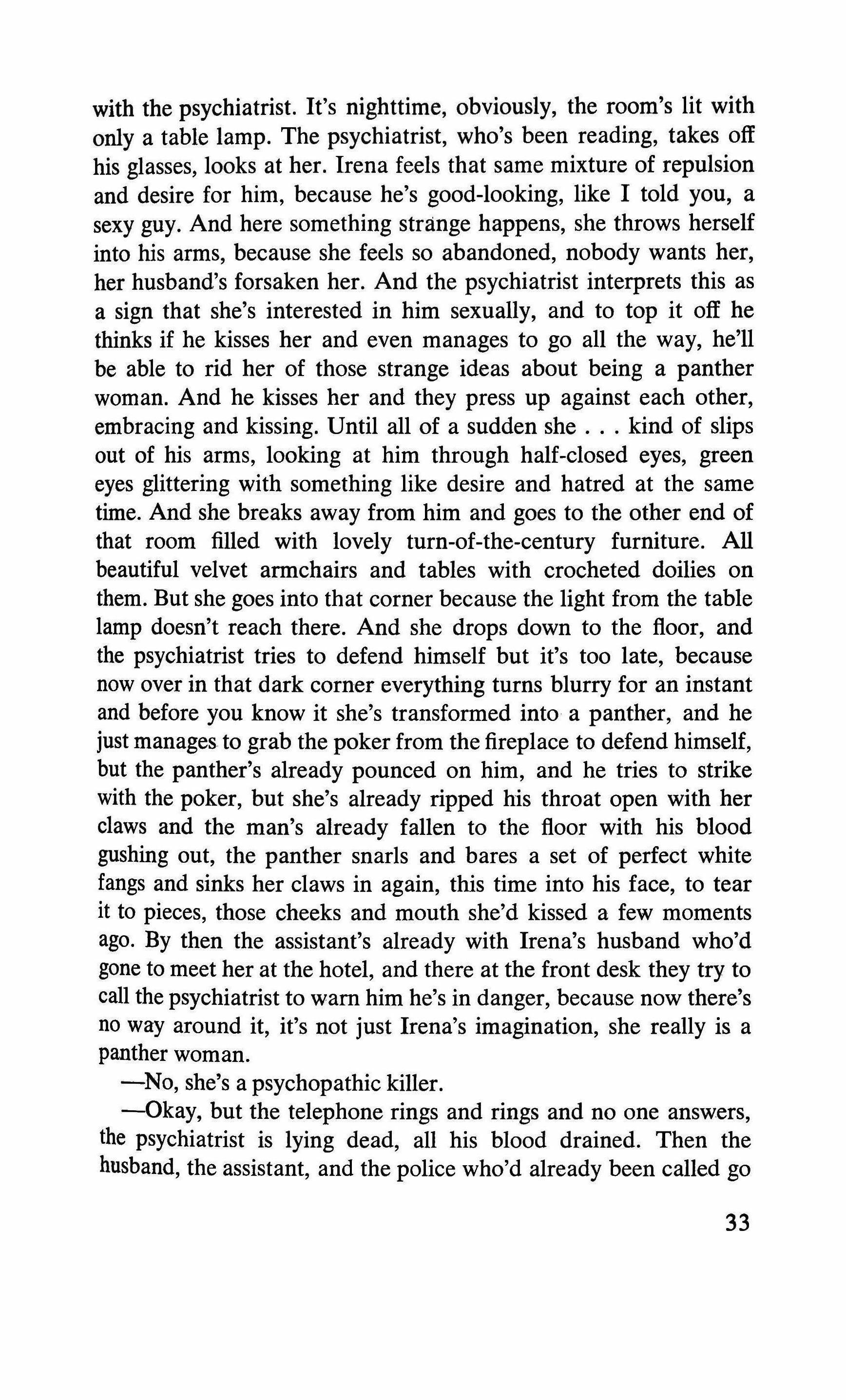
with the psychiatrist. It's nighttime, obviously, the room's lit with only a table lamp. The psychiatrist, who's been reading, takes off his glasses, looks at her. Irena feels that same mixture of repulsion and desire for him, because he's good-looking, like I told you, a sexy guy. And here something strange happens, she throws herself into his arms, because she feels so abandoned, nobody wants her, her husband's forsaken her. And the psychiatrist interprets this as a sign that she's interested in him sexually, and to top it off he thinks if he kisses her and even manages to go all the way, he'll be able to rid her of those strange ideas about being a panther woman. And he kisses her and they press up against each other, embracing and kissing. Until all of a sudden she kind of slips out of his arms, looking at him through half-closed eyes, green eyes glittering with something like desire and hatred at the same time. And she breaks away from him and goes to the other end of that room filled with lovely turn-of-the-century furniture. All beautiful velvet armchairs and tables with crocheted doilies on them. But she goes into that corner because the light from the table lamp doesn't reach there. And she drops down to the floor, and the psychiatrist tries to defend himself but it's too late, because now over in that dark corner everything turns blurry for an instant and before you know it she's transformed into a panther, and he just manages to grab the poker from the fireplace to defend himself, but the panther's already pounced on him, and he tries to strike with the poker, but she's already ripped his throat open with her claws and the man's already fallen to the floor with his blood gushing out, the panther snarls and bares a set of perfect white fangs and sinks her claws in again, this time into his face, to tear it to pieces, those cheeks and mouth she'd kissed a few moments ago. By then the assistant's already with Irena's husband who'd gone to meet her at the hotel, and there at the front desk they try to call the psychiatrist to warn him he's in danger, because now there's no way around it, it's not just Irena's imagination, she really is a panther woman.
-No, she's a psychopathic killer.
-Okay, but the telephone rings and rings and no one answers, the psychiatrist is lying dead, all his blood drained. Then the husband, the assistant, and the police who'd already been called go
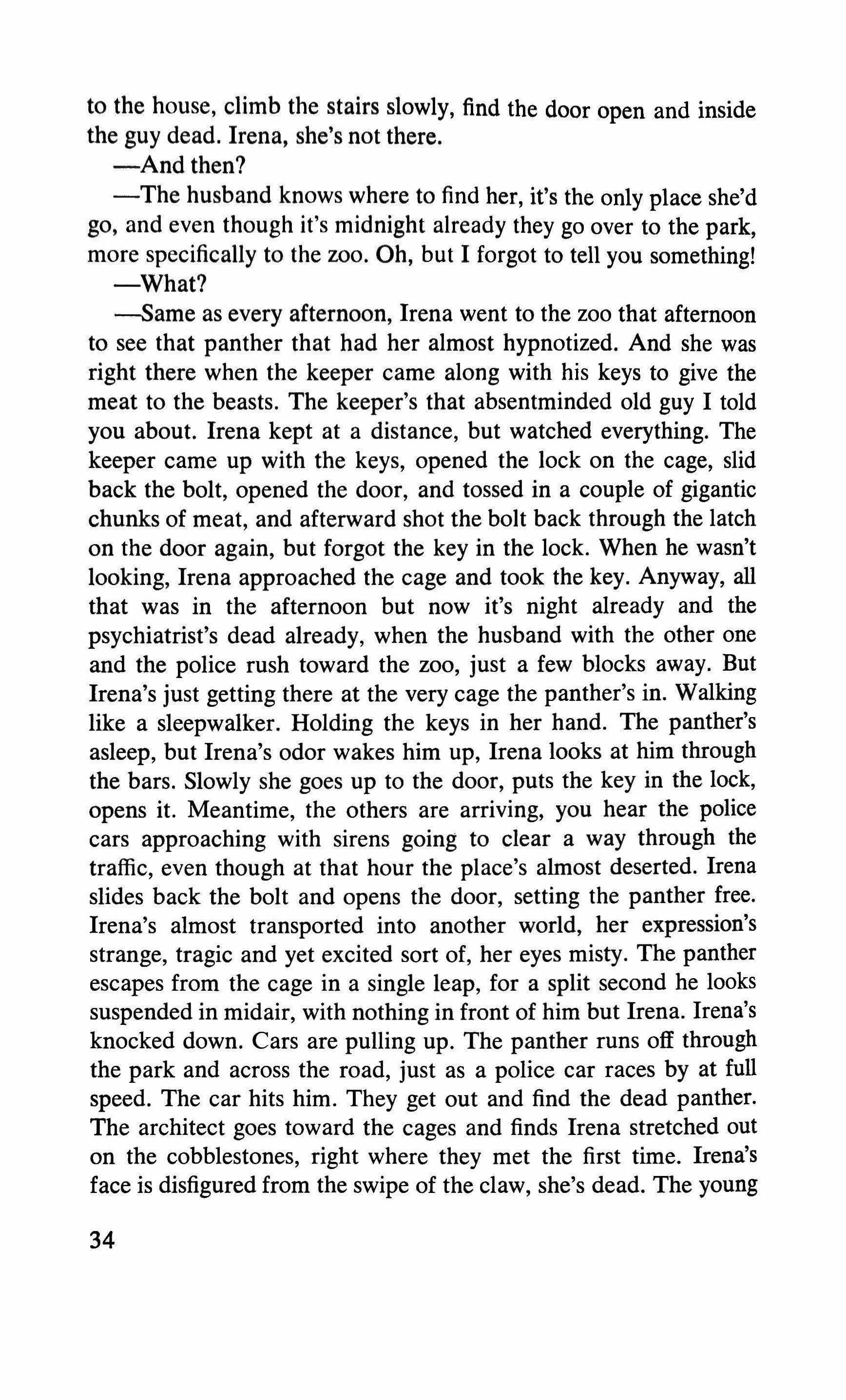
to the house, climb the stairs slowly, find the door open and inside the guy dead. Irena, she's not there.
-And then?
-The husband knows where to find her, it's the only place she'd go, and even though it's midnight already they go over to the park, more specifically to the zoo. Oh, but I forgot to tell you something!
-What?
--Same as every afternoon, Irena went to the zoo that afternoon to see that panther that had her almost hypnotized. And she was right there when the keeper came along with his keys to give the meat to the beasts. The keeper's that absentminded old guy I told you about. Irena kept at a distance, but watched everything. The keeper came up with the keys, opened the lock on the cage, slid back the bolt, opened the door, and tossed in a couple of gigantic chunks of meat, and afterward shot the bolt back through the latch on the door again, but forgot the key in the lock. When he wasn't looking, Irena approached the cage and took the key. Anyway, all that was in the afternoon but now it's night already and the psychiatrist's dead already, when the husband with the other one and the police rush toward the zoo, just a few blocks away. But Irena's just getting there at the very cage the panther's in. Walking like a sleepwalker. Holding the keys in her hand. The panther's asleep, but Irena's odor wakes him up, Irena looks at him through the bars. Slowly she goes up to the door, puts the key in the lock, opens it. Meantime, the others are arriving, you hear the police cars approaching with sirens going to clear a way through the traffic, even though at that hour the place's almost deserted. Irena slides back the bolt and opens the door, setting the panther free. Irena's almost transported into another world, her expression's strange, tragic and yet excited sort of, her eyes misty. The panther escapes from the cage in a single leap, for a split second he looks suspended in midair, with nothing in front of him but Irena. Irena's knocked down. Cars are pulling up. The panther runs off through the park and across the road, just as a police car races by at full speed. The car hits him. They get out and find the dead panther. The architect goes toward the cages and finds Irena stretched out on the cobblestones, right where they met the first time. Irena's face is disfigured from the swipe of the claw, she's dead. The young
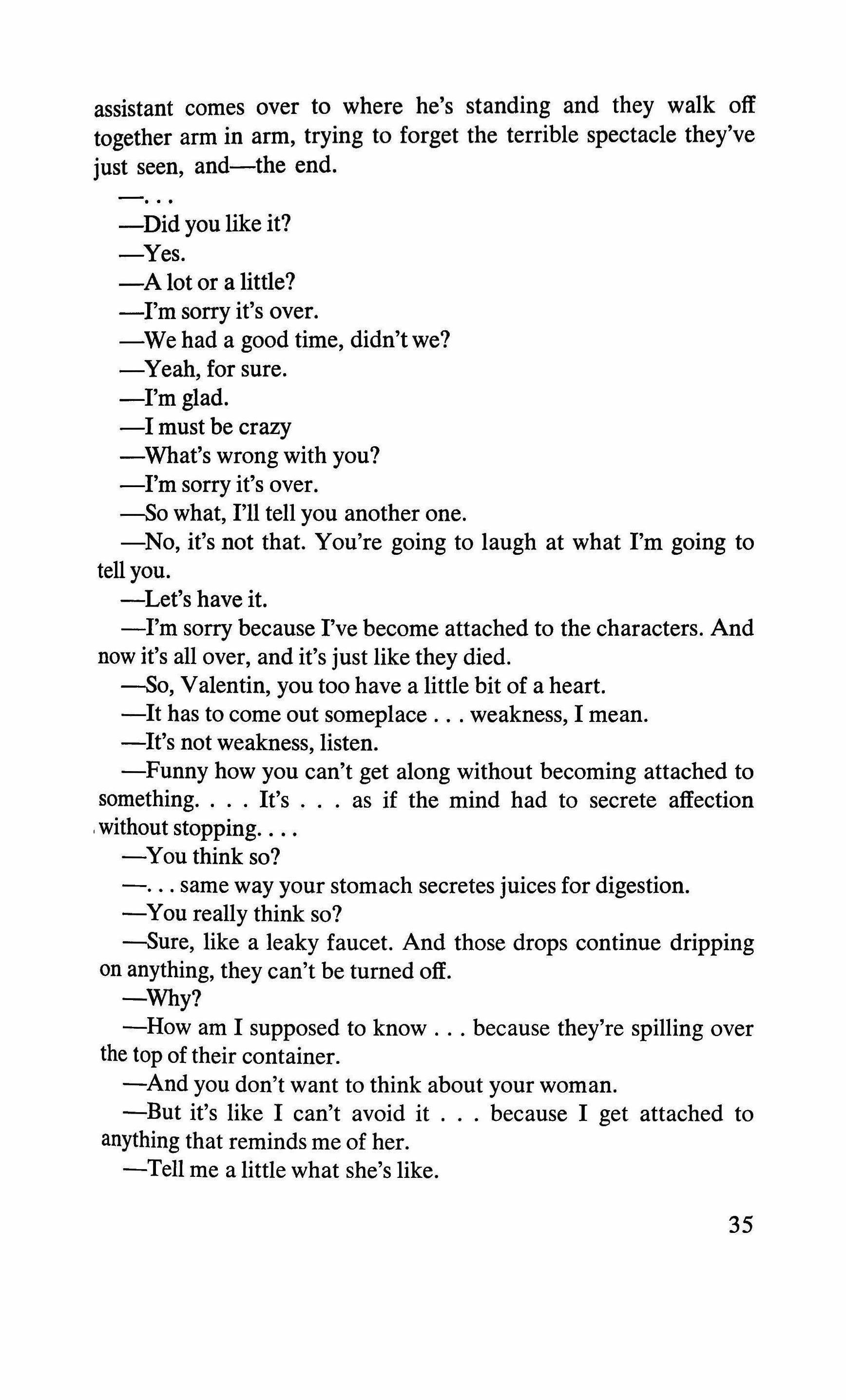
assistant comes over to where he's standing and they walk off together arm in arm, trying to forget the terrible spectacle they've just seen, and-the end.
-
-Did you like it?
-Yes.
-A lot or a little?
-I'm sorry it's over.
-We had a good time, didn't we?
-Yeah, for sure.
-I'm glad.
-I must be crazy
-What's wrong with you?
-I'm sorry it's over.
-So what, I'll tell you another one.
-No, it's not that. You're going to laugh at what I'm going to tell you.
-Let's have it.
-I'm sorry because I've become attached to the characters. And now it's all over, and it's just like they died.
-So, Valentin, you too have a little bit of a heart.
-It has to come out someplace weakness, I mean.
-It's not weakness, listen.
-Funny how you can't get along without becoming attached to something. It's as if the mind had to secrete affection without stopping
-You think so?
- same way your stomach secretes juices for digestion.
-You really think so?
-Sure, like a leaky faucet. And those drops continue dripping on anything, they can't be turned off.
-Why?
-How am I supposed to know because they're spilling over the top of their container.
-And you don't want to think about your woman.
-But it's like I can't avoid it because I get attached to anything that reminds me of her.
-Tell me a little what she's like.
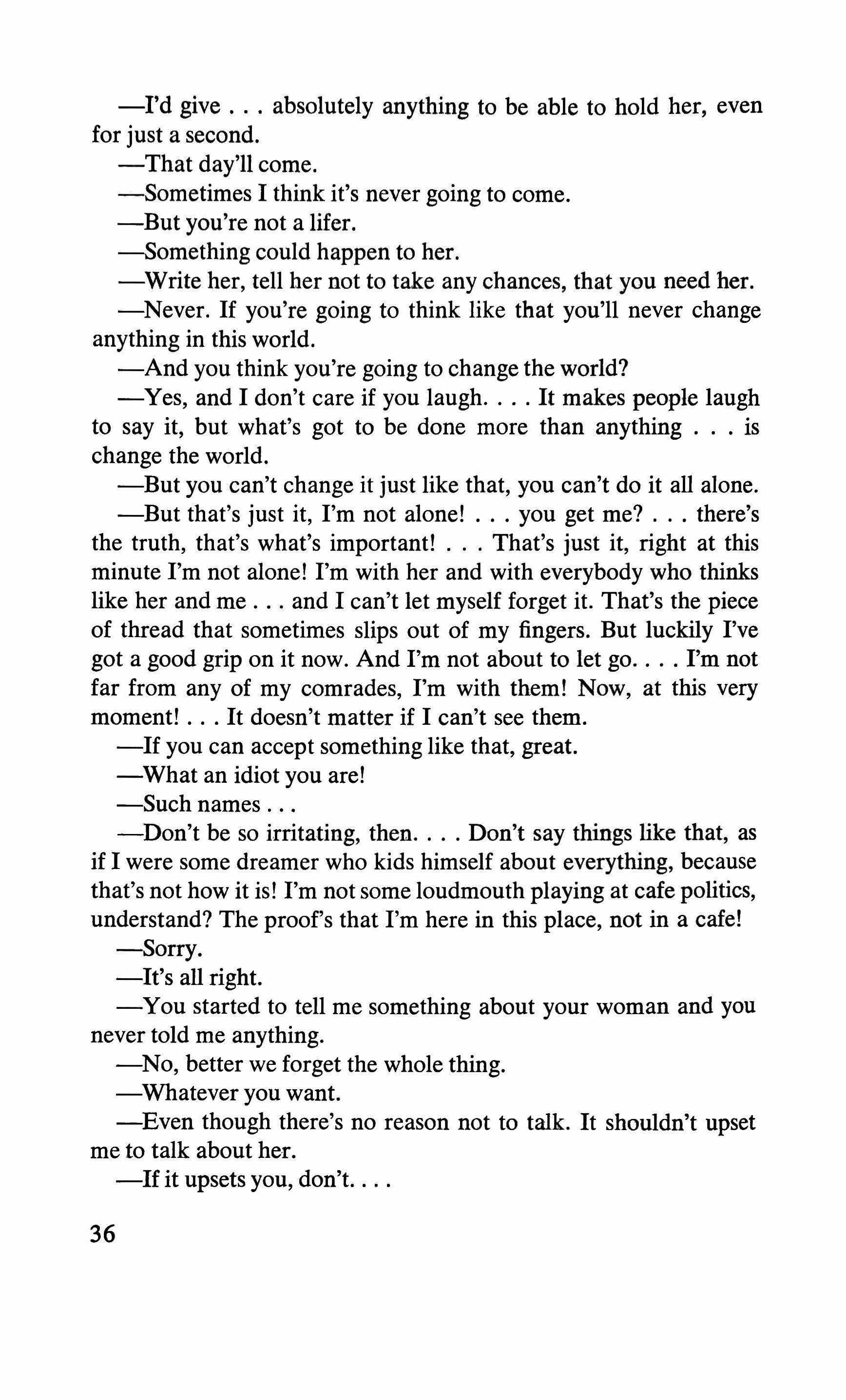
-I'd give absolutely anything to be able to hold her, even for just a second.
-That day'll come.
-Sometimes I think it's never going to come.
-But you're not a lifer.
-Something could happen to her.
-Write her, tell her not to take any chances, that you need her.
-Never. If you're going to think like that you'll never change anything in this world.
-And you think you're going to change the world?
-Yes, and I don't care if you laugh It makes people laugh to say it, but what's got to be done more than anything is change the world.
-But you can't change it just like that, you can't do it all alone.
-But that's just it, I'm not alone! you get me? there's the truth, that's what's important! That's just it, right at this minute I'm not alone! I'm with her and with everybody who thinks like her and me and I can't let myself forget it. That's the piece of thread that sometimes slips out of my fingers. But luckily I've got a good grip on it now. And I'm not about to let go I'm not far from any of my comrades, I'm with them! Now, at this very moment! It doesn't matter if I can't see them.
-If you can accept something like that, great.
-What an idiot you are!
-Such names
-Don't be so irritating, then Don't say things like that, as if I were some dreamer who kids himself about everything, because that's not how it is! I'm not some loudmouth playing at cafe politics, understand? The proofs that I'm here in this place, not in a cafe!
-Sorry.
-It's all right.
-You started to tell me something about your woman and you never told me anything.
-No, better we forget the whole thing.
-Whatever you want.
-Even though there's no reason not to talk. It shouldn't upset me to talk about her.
-If it upsets you, don't
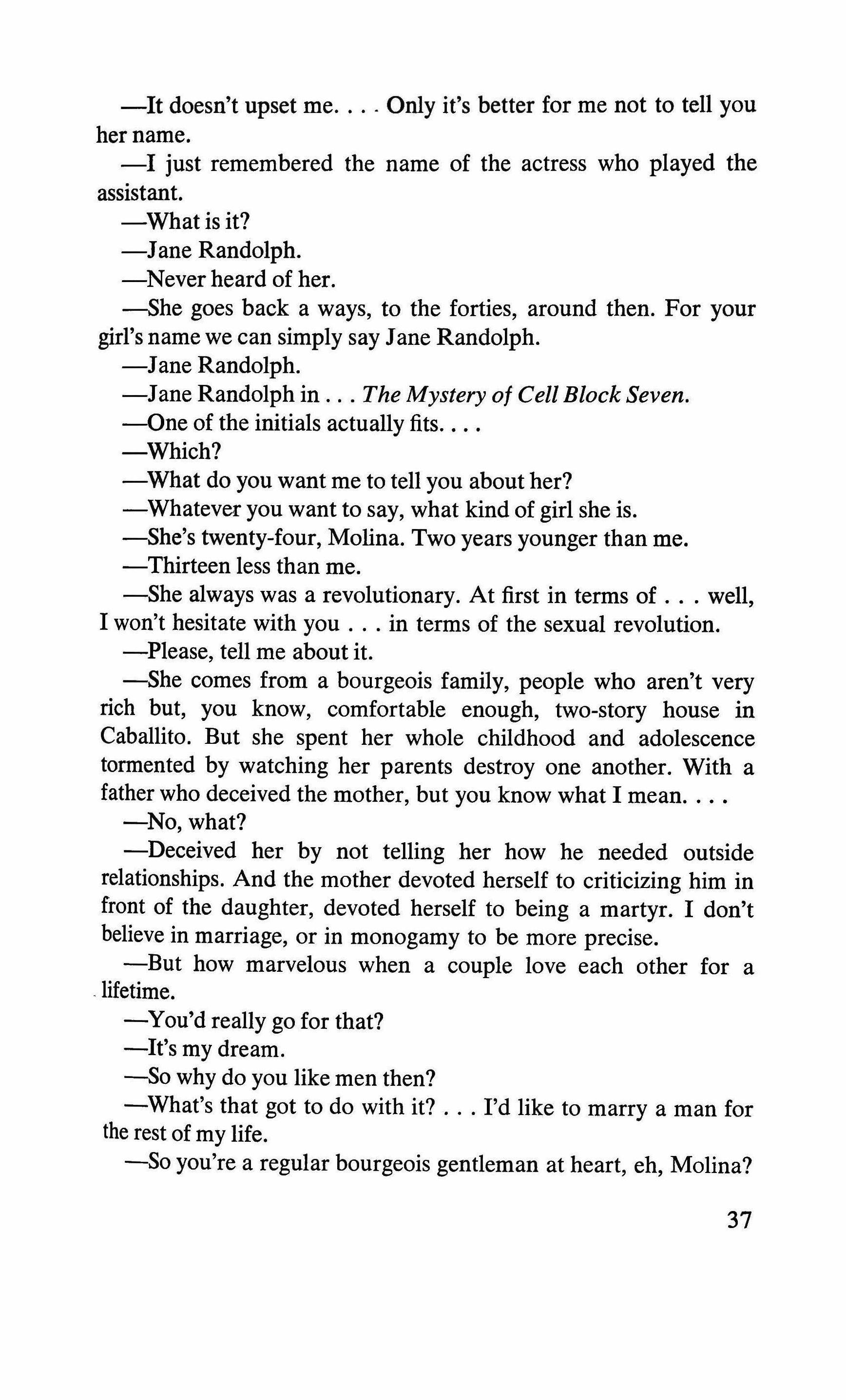
-It doesn't upset me Only it's better for me not to tell you her name.
-I just remembered the name of the actress who played the assistant.
-What is it?
-Jane Randolph.
-Never heard of her.
-She goes back a ways, to the forties, around then. For your girl's name we can simply say Jane Randolph.
-Jane Randolph.
-Jane Randolph in The Mystery of Cell Block Seven.
-One of the initials actually fits
-Which?
-What do you want me to tell you about her?
-Whatever you want to say, what kind of girl she is.
-She's twenty-four, Molina. Two years younger than me.
-Thirteen less than me.
-She always was a revolutionary. At first in terms of well, I won't hesitate with you in terms of the sexual revolution.
-Please, tell me about it.
-She comes from a bourgeois family, people who aren't very rich but, you know, comfortable enough, two-story house in Caballito. But she spent her whole childhood and adolescence tormented by watching her parents destroy one another. With a father who deceived the mother, but you know what I mean
-No, what?
-Deceived her by not telling her how he needed outside relationships. And the mother devoted herself to criticizing him in front of the daughter, devoted herself to being a martyr. I don't believe in marriage, or in monogamy to be more precise.
-But how marvelous when a couple love each other for a lifetime.
-You'd really go for that?
-It's my dream.
-So why do you like men then?
-What's that got to do with it? I'd like to marry a man for the rest of my life.
-So you're a regular bourgeois gentleman at heart, eh, Molina?

-Bourgeois lady, thank you.
-But don't you see how all that's nothing but a deception? If you were a woman you wouldn't want that.
-I'm in love with a wonderful guy and all I ask is to live by his side for the rest of my life.
-And since that's impossible, because if he's a guy he wants a woman, well, you're never going to undeceive yourself.
-Go on about your girl, I don't feel like talking about me.
-Well okay, as I was telling you, they what's the name?
-Jane. Jane Randolph.
-They raised Jane Randolph to be a proper lady. Piano lessons, French, and painting, and after the lycee the Catholic University.
-Architecture! That's why you connected the two.
-No, sociology. And that was when the mess began at home. She wanted to go to the state university but they made her register at Catholic. There she got to know some college kid, they fell in love and had an affair. The boy was also living with his parents but he left home, got a night job as a telephone operator, and rented a small apartment, and they started spending days there.
-And didn't study any more.
-That year they did less studying, at first, but then later on she began to study more.
-But not him.
-Exactly, because he was working. And a year later Jane moved in with him. There was friction at home in the beginning but afterward they accepted it. They hoped that since the kids were so much in love they'd eventually get married. And the student wanted to marry her. But Jane didn't want to repeat any part of the same old story, so she had her doubts.
-Abortions?
-Yes, one. But that strengthened her determination instead of depressing her. She saw clearly that if she had a child she'd never mature, never be able to pursue her own development. Her freedom would be limited. She took a reporting job on some magazine, snooping really.
-Snooping?
-Right.
-What an ugly word.
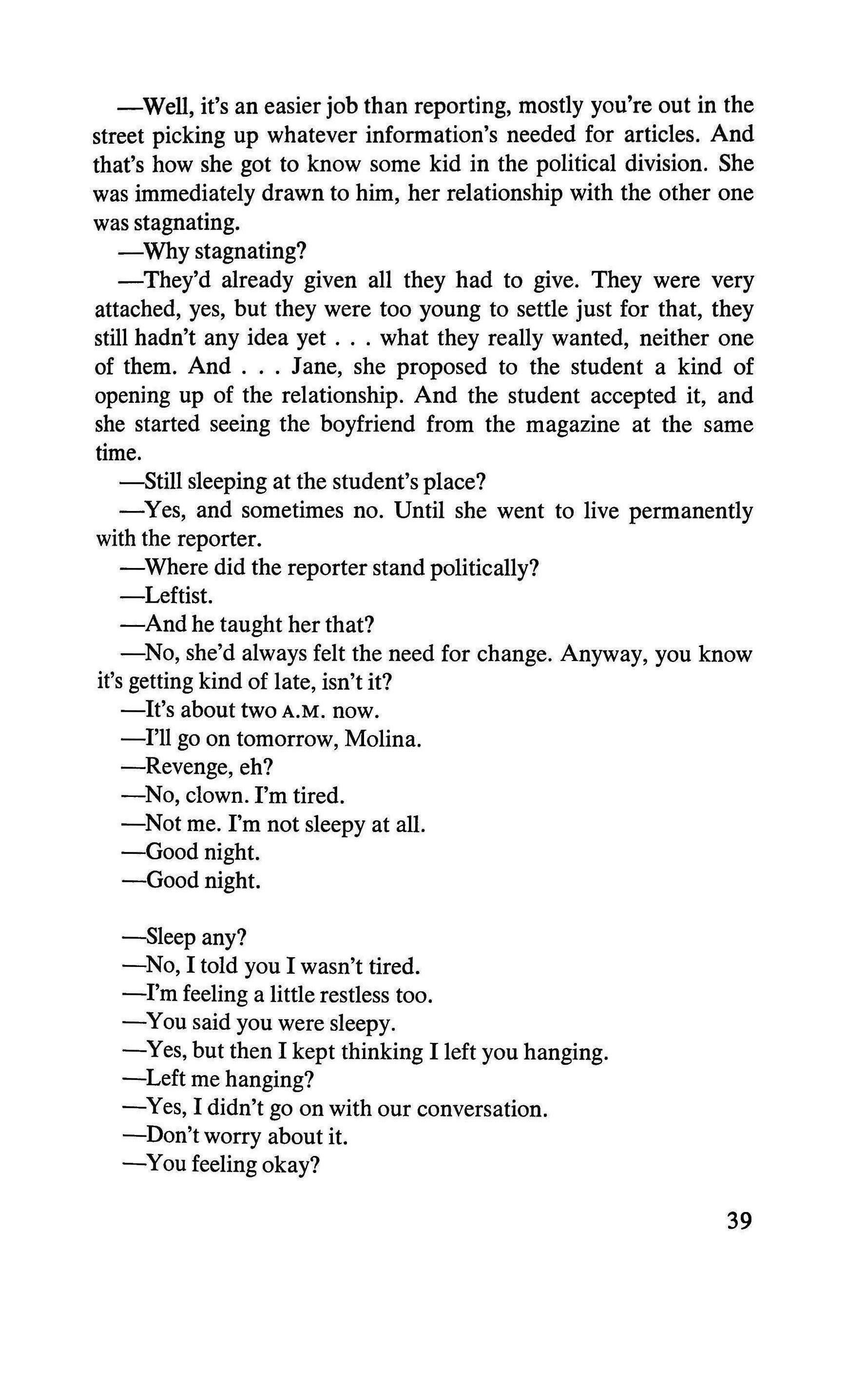
-Well, it's an easier job than reporting, mostly you're out in the street picking up whatever information's needed for articles. And that's how she got to know some kid in the political division. She was immediately drawn to him, her relationship with the other one was stagnating.
-Why stagnating?
-They'd already given all they had to give. They were very attached, yes, but they were too young to settle just for that, they still hadn't any idea yet what they really wanted, neither one of them. And Jane, she proposed to the student a kind of opening up of the relationship. And the student accepted it, and she started seeing the boyfriend from the magazine at the same time.
-Still sleeping at the student's place?
-Yes, and sometimes no. Until she went to live permanently with the reporter.
-Where did the reporter stand politically?
-Leftist.
-And he taught her that?
-No, she'd always felt the need for change. Anyway, you know it's getting kind of late, isn't it?
-It's about two A.M. now.
-I'll go on tomorrow, Molina.
-Revenge, eh?
-No, clown. I'm tired.
-Not me. I'm not sleepy at all.
-Good night.
-Good night.
-Sleep any?
-No, I told you I wasn't tired.
-I'm feeling a little restless too.
-You said you were sleepy.
-Yes, but then I kept thinking I left you hanging.
-Left me hanging?
-Yes, I didn't go on with our conversation.
-Don't worry about it.
-You feeling okay?

-Mmm-hmm.
-So why not go to sleep?
-I don't know, Valentin.
-Look, 1 really am a little sleepy, and I'm about to drop off any minute now. And I've got a way for you to get some sleep too.
-What?
-Think about the picture you're going to tell me next.
-Great idea.
-But it better be a good one, like the panther woman. Choose carefully, Molina.
-And you, you'll tell me more about Jane.
-No, 1 don't know about that. Let's do something: whenever 1 feel 1 can tell you something I'll go ahead and do it gladly. But don't ask me about it, I'll bring it up when it's right for me. A deal?
-A deal.
-And now think about the picture.
-Okay.
-Ciao.
-Ciao.

I was born in Labhouat or some other damned desert town, hot and dry, often dark at midday because of blowing dust. My father was an itinerant tinsmith, a man with no particular aim in life but a great talent for dealing with animals. He was one of those rare humans who could catch fish with his bare hands in any kind of water. Marmots and raccoons followed him in the woods. He knew the language of birds so well that he could call them to his shoulder. My mother, on the contrary, was ambitious. All her life she wanted something without quite knowing what. My father's aimlessness and my mother's longing combined to make nomads of the whole family.
Of my early education I remember little, but one afternoon I will never forget. In Constantine, when I was six or seven, I was taken with other schoolchildren to a museum of natural history. It did not interest me much, and after an hour of tedious trudging, made still more tedious by the droning voice of the guide, I was inspired by boredom to lag behind my comrades, and when they entered a suite of rooms consecrated to ores and mining, I slipped unseen down another corridor. A short, stealthy walk brought me, dangerously and deliciously alone, to a stairwell. Without a

moment's hesitation I dove down the steps and found myself in a dim hall of fishes.
The light in the place was marvelously subaquatic, and through it swam on nearly invisible wires a whole nation of weird, fantastical creatures, a large collection of what are called, as I learned in subsequent adolescent reading, denizens of the deep. Just above my head was a great blue shark, and beyond him his cousin the hammerhead, both caught and held in attitudes of vicious sport. Farther along was a narwhal, that rude allegory on virginity, and farther still a marlin, an elegant, composite Cyrano with sword arm and proboscis made one. Yonder hung a manatee with, for a boy my age, terrifying teats. Here was an aerodynamical ray and there a giant obscenity of squid. Dogfish mobbed me, and catfish, cuttlefish, tarpon, barracuda. I wandered as in a dream, holding my breath half in wonder, half in fear of drowning. All thought of my school companions was annihilated by this silent world of watery possibility.
I came to a halt at last before the vast articulated skeleton of a right whale. One third of the monster was skull and jaw. Behind the enormous head dangled a grotesque pair of hands that seemed, however large in fact, perversely small in the immense scheme of the beast's other bones. Along the colossal spine an arcade of ribs descended, as if in false perspective, to the flat, ten-toed tail. I stared, eyes bulging, mouth gaping, mesmerized by this prodigy, and as I stared the museum's lights went out. Absolute darkness swept from the air like a cloak. Past and future began to resemble each other, dark, close, and timeless. I waited, appalled and hopeless in the black void. It occurred to me that I might have already died, but my heart was beating thunderously and I knew dead hearts were still. I tried to call, but no sound came. Instead, the effort it took to try to scream stirred something in a part of me that seemed remote, caused something to twitch or stutter toward a kind of illumination known only to the spirit. In the brilliance of this new and barely glimpsed light, I found an explanation for my plight: I had come too close to the monster's jaws and been swallowed alive and whole. I was inside the mystical whale. When light was restored some time later-I never knew how long it took-I was discovered standing motionless beneath the
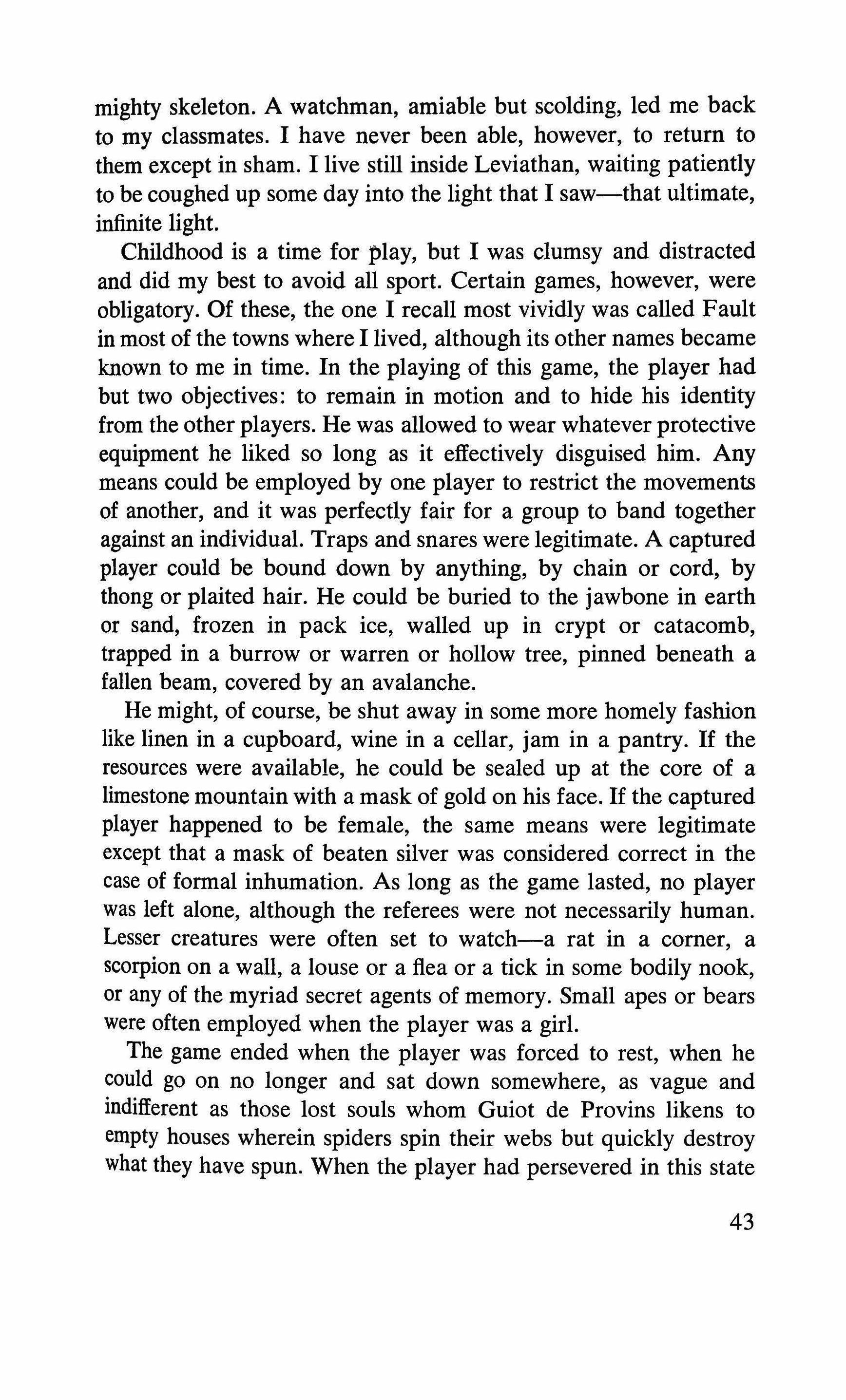
mighty skeleton. A watchman, amiable but scolding, led me back to my classmates. I have never been able, however, to return to them except in sham. I live still inside Leviathan, waiting patiently to be coughed up some day into the light that I saw-that ultimate, infinite light.
Childhood is a time for play, but I was clumsy and distracted and did my best to avoid all sport. Certain games, however, were obligatory. Of these, the one I recall most vividly was called Fault in most of the towns where I lived, although its other names became known to me in time. In the playing of this game, the player had but two objectives: to remain in motion and to hide his identity from the other players. He was allowed to wear whatever protective equipment he liked so long as it effectively disguised him. Any means could be employed by one player to restrict the movements of another, and it was perfectly fair for a group to band together against an individual. Traps and snares were legitimate. A captured player could be bound down by anything, by chain or cord, by thong or plaited hair. He could be buried to the jawbone in earth or sand, frozen in pack ice, walled up in crypt or catacomb, trapped in a burrow or warren or hollow tree, pinned beneath a fallen beam, covered by an avalanche.
He might, of course, be shut away in some more homely fashion like linen in a cupboard, wine in a cellar, jam in a pantry. If the resources were available, he could be sealed up at the core of a limestone mountain with a mask of gold on his face. If the captured player happened to be female, the same means were legitimate except that a mask of beaten silver was considered correct in the case of formal inhumation. As long as the game lasted, no player was left alone, although the referees were not necessarily human. Lesser creatures were often set to watch-a rat in a comer, a scorpion on a wall, a louse or a flea or a tick in some bodily nook, or any of the myriad secret agents of memory. Small apes or bears were often employed when the player was a girl.
The game ended when the player was forced to rest, when he could go on no longer and sat down somewhere, as vague and indifferent as those lost souls whom Guiot de Provins likens to empty houses wherein spiders spin their webs but quickly destroy what they have spun. When the player had persevered in this state
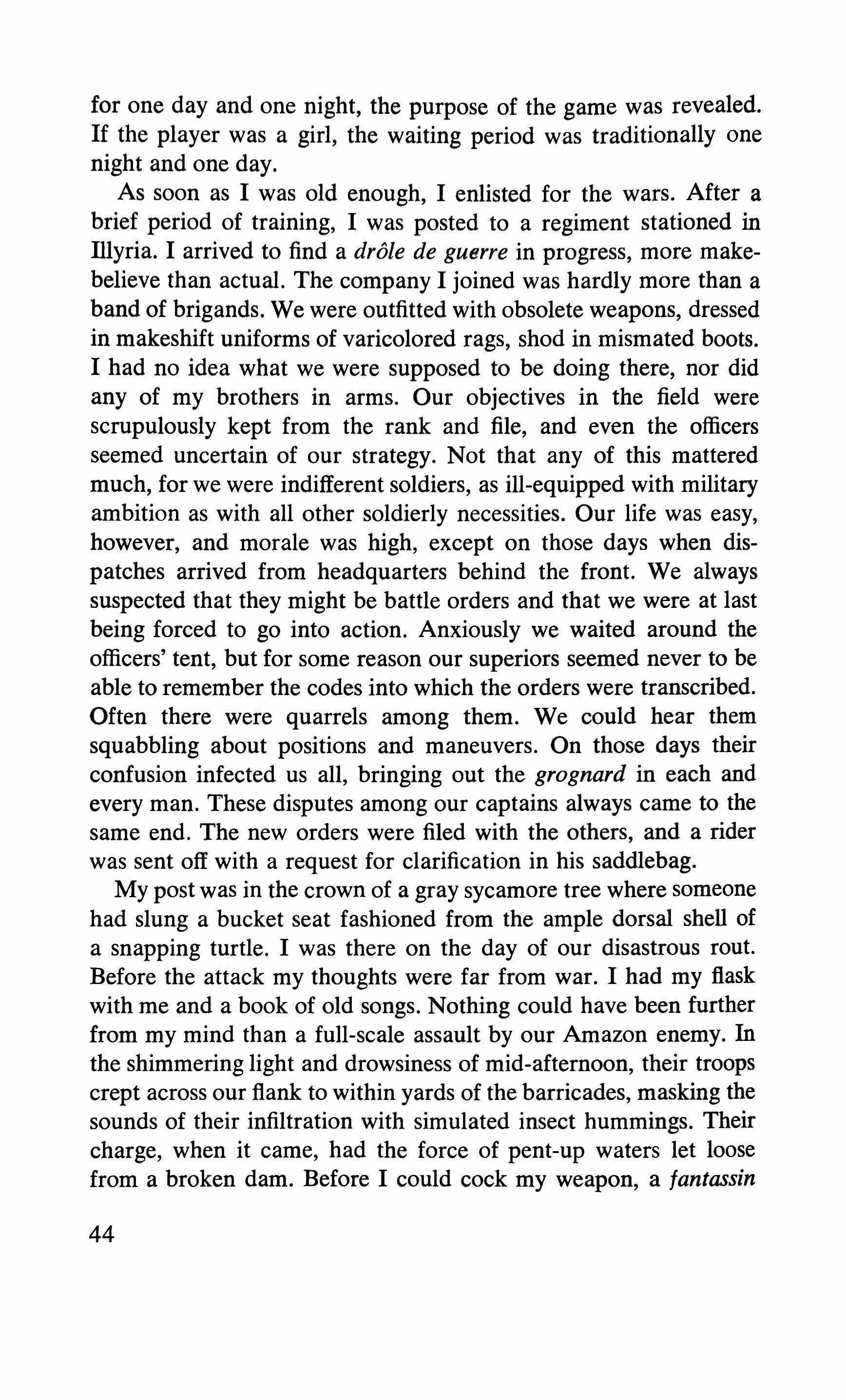
for one day and one night, the purpose of the game was revealed. If the player was a girl, the waiting period was traditionally one night and one day.
As soon as I was old enough, I enlisted for the wars. After a brief period of training, I was posted to a regiment stationed in Illyria. I arrived to find a drole de guerre in progress, more makebelieve than actual. The company I joined was hardly more than a band of brigands. We were outfitted with obsolete weapons, dressed in makeshift uniforms of varicolored rags, shod in mismated boots. I had no idea what we were supposed to be doing there, nor did any of my brothers in arms. Our objectives in the field were scrupulously kept from the rank and file, and even the officers seemed uncertain of our strategy. Not that any of this mattered much, for we were indifferent soldiers, as ill-equipped with military ambition as with all other soldierly necessities. Our life was easy, however, and morale was high, except on those days when dispatches arrived from headquarters behind the front. We always suspected that they might be battle orders and that we were at last being forced to go into action. Anxiously we waited around the officers' tent, but for some reason our superiors seemed never to be able to remember the codes into which the orders were transcribed. Often there were quarrels among them. We could hear them squabbling about positions and maneuvers. On those days their confusion infected us all, bringing out the grognard in each and every man. These disputes among our captains always came to the same end. The new orders were filed with the others, and a rider was sent off with a request for clarification in his saddlebag.
My post was in the crown of a gray sycamore tree where someone had slung a bucket seat fashioned from the ample dorsal shell of a snapping turtle. I was there on the day of our disastrous rout. Before the attack my thoughts were far from war. I had my flask with me and a book of old songs. Nothing could have been further from my mind than a full-scale assault by our Amazon enemy. In the shimmering light and drowsiness of mid-afternoon, their troops crept across our flank to within yards of the barricades, masking the sounds of their infiltration with simulated insect hummings. Their charge, when it came, had the force of pent-up waters let loose from a broken dam. Before I could cock my weapon, a fantassin

clad in a leopard skin swarmed up my sycamore tree and fired a charge from her pistol point-blank at my astonished face. Her gun was charged with pink crustaceans, and a langoustine caught me full in the cheek. The wound it made was not serious, but the force of the blow unbalanced me and tumbled me off my perch. I plunged to the ground and would have broken my neck except for a thorny cushion of bramble bushes. Bleeding from a dozen gashes and held fast by the cruel thorns, I lay completely at the Amazon's mercy, expecting at any moment the coup de grace. She took her time about it. There was grace in her body truly enough, but very little in her character as she swung slowly down the tree, branch by branch. I shall never forget the malice in her eye, nor the tune that she whistled between her small bright teeth as she came, recharging her pistol on the way with spiny sea urchins and blueblack, razor-edged mussel shells.
After the fight and our withdrawal, I was taken to recover from my wounds to Finisterre, where the coast slopes down to meet America beneath the sea. A number of cures were tried unsuccessfully on me, until finally one of the medics hit on the scheme of having me imitate a dogwood tree to rid myself of the poisons and humors of campaigning. I had known the plant in childhood and was able to recall quite accurately the gestures of a potted specimen that had moved about with us during our migrations. After several awkward attempts I managed to coax myself into something like its attitude. In time I relaxed sufficiently to respond more or less naturally to the elements, until I was able without much effort to tremble in the wind, swell in the rain, and twist to follow the passage of the sun. My first nesting finch unnerved me, but I soon became accustomed to her complicated flutterings and to those of many other songbirds. The caterpillars, too, were troublesome until I learned how soothing their furry strolls across my flesh could be. My greatest trial came the day a schoolboy carved some excruciating initials in my trunk, the letters G.G.L.B. Hurt as I was, I succeeded in covering my agonized sobs with a rush of rattling leaves and did not betray my green disguise. These visitations were rare, however, and usually I stood unmolested, quite free to meditate and to watch the tender hermit crabs moving about the shingle in search of larger shell homes to trade for their small
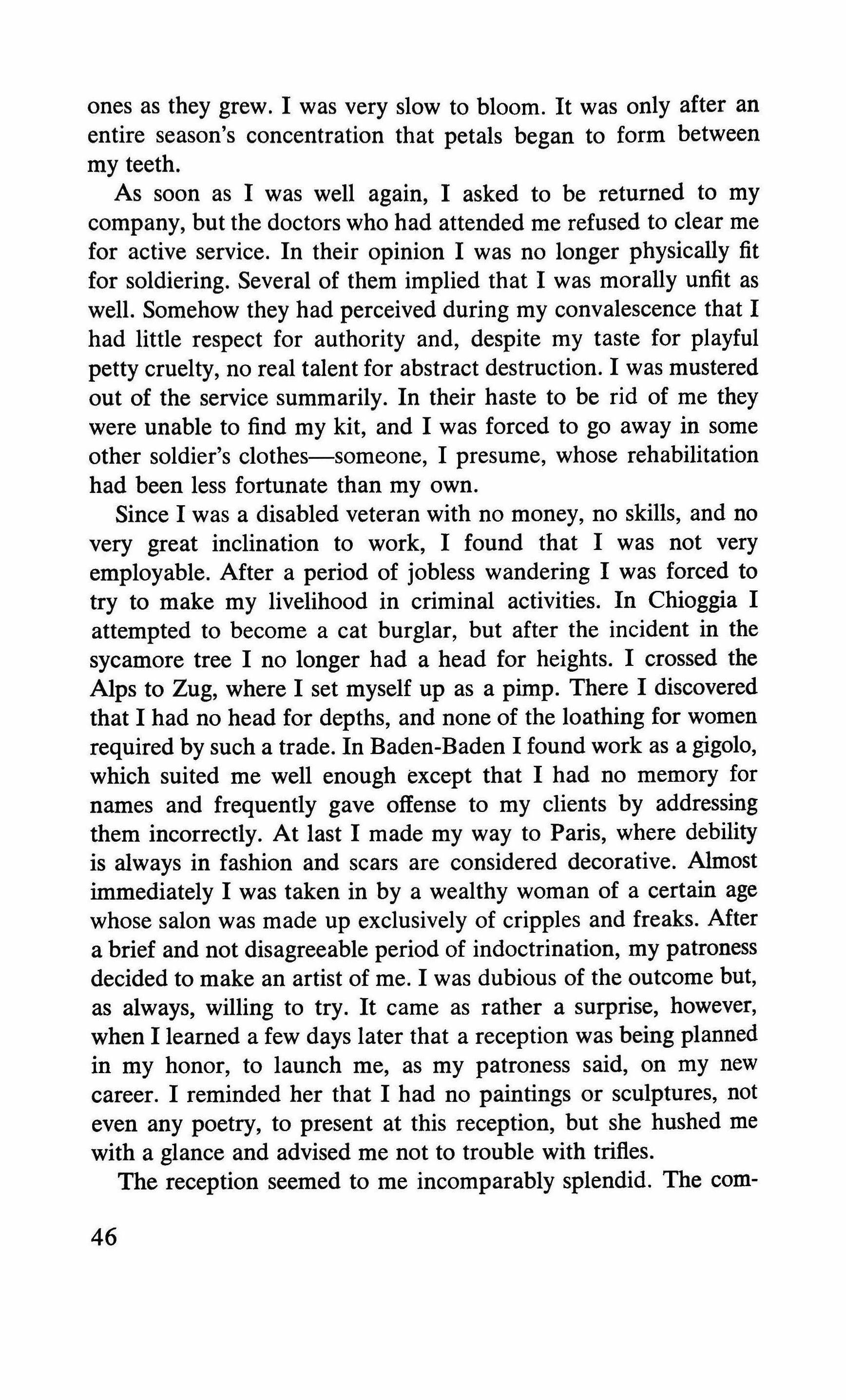
ones as they grew. I was very slow to bloom. It was only after an entire season's concentration that petals began to form between my teeth.
As soon as I was well again, I asked to be returned to my company, but the doctors who had attended me refused to clear me for active service. In their opinion I was no longer physically fit for soldiering. Several of them implied that I was morally unfit as well. Somehow they had perceived during my convalescence that I had little respect for authority and, despite my taste for playful petty cruelty, no real talent for abstract destruction. I was mustered out of the service summarily. In their haste to be rid of me they were unable to find my kit, and I was forced to go away in some other soldier's clothes-someone, I presume, whose rehabilitation had been less fortunate than my own.
Since I was a disabled veteran with no money, no skills, and no very great inclination to work, I found that I was not very employable. After a period of jobless wandering I was forced to try to make my livelihood in criminal activities. In Chioggia I attempted to become a cat burglar, but after the incident in the sycamore tree I no longer had a head for heights. I crossed the Alps to Zug, where I set myself up as a pimp. There I discovered that I had no head for depths, and none of the loathing for women required by such a trade. In Baden-Baden I found work as a gigolo, which suited me well enough except that I had no memory for names and frequently gave offense to my clients by addressing them incorrectly. At last I made my way to Paris, where debility is always in fashion and scars are considered decorative. Almost immediately I was taken in by a wealthy woman of a certain age whose salon was made up exclusively of cripples and freaks. After a brief and not disagreeable period of indoctrination, my patroness decided to make an artist of me. I was dubious of the outcome but, as always, willing to try. It came as rather a surprise, however, when I learned a few days later that a reception was being planned in my honor, to launch me, as my patroness said, on my new career. I reminded her that I had no paintings or sculptures, not even any poetry, to present at this reception, but she hushed me with a glance and advised me not to trouble with trifles. The reception seemed to me incomparably splendid. The com-
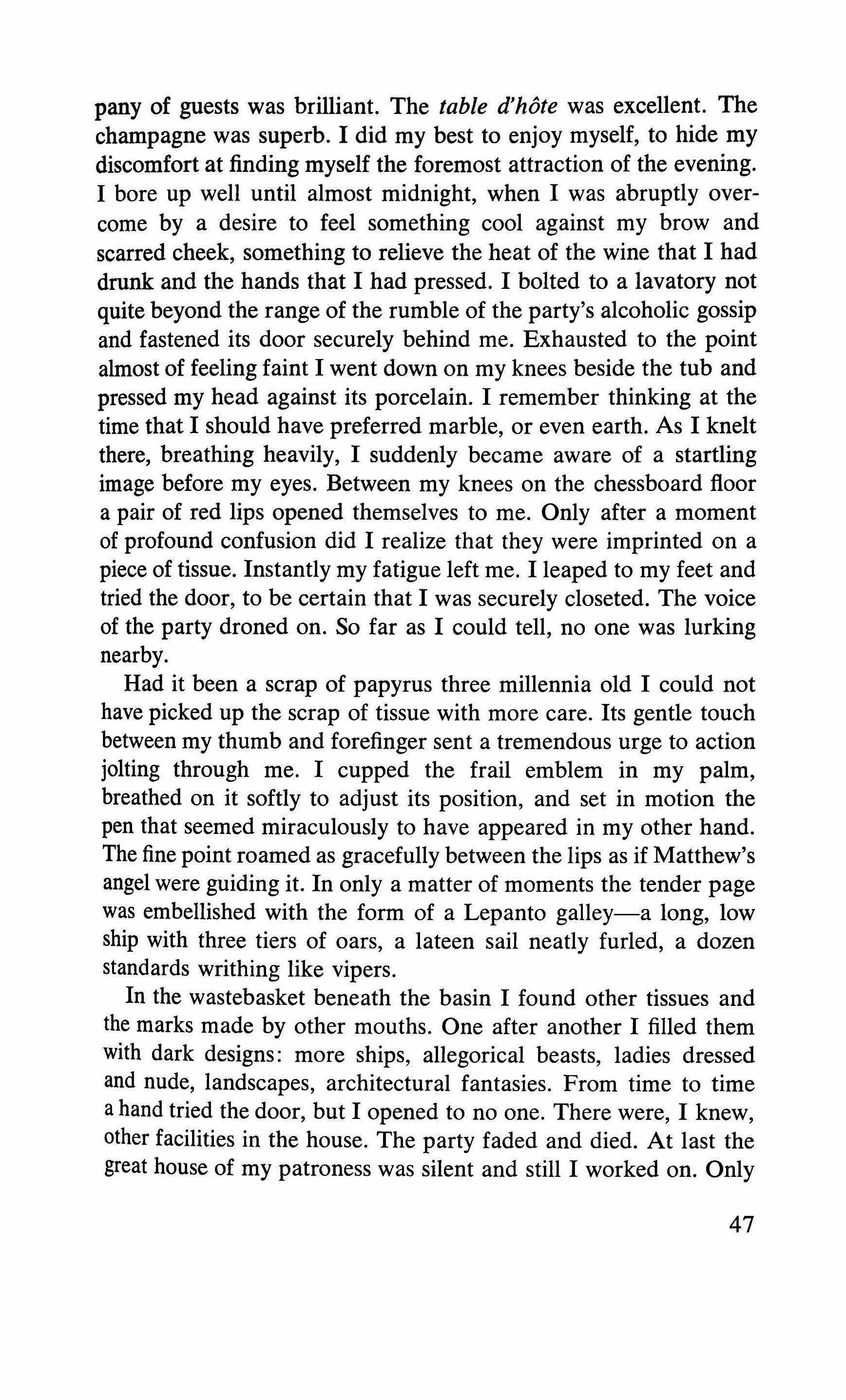
pany of guests was brilliant. The table d'hote was excellent. The champagne was superb. I did my best to enjoy myself, to hide my discomfort at finding myself the foremost attraction of the evening. I bore up well until almost midnight, when I was abruptly overcome by a desire to feel something cool against my brow and scarred cheek, something to relieve the heat of the wine that I had drunk and the hands that I had pressed. I bolted to a lavatory not quite beyond the range of the rumble of the party's alcoholic gossip and fastened its door securely behind me. Exhausted to the point almost of feeling faint I went down on my knees beside the tub and pressed my head against its porcelain. I remember thinking at the time that I should have preferred marble, or even earth. As I knelt there, breathing heavily, I suddenly became aware of a startling image before my eyes. Between my knees on the chessboard floor a pair of red lips opened themselves to me. Only after a moment of profound confusion did I realize that they were imprinted on a piece of tissue. Instantly my fatigue left me. I leaped to my feet and tried the door, to be certain that I was securely closeted. The voice of the party droned on. So far as I could tell, no one was lurking nearby.
Had it been a scrap of papyrus three millennia old I could not have picked up the scrap of tissue with more care. Its gentle touch between my thumb and forefinger sent a tremendous urge to action jolting through me. I cupped the frail emblem in my palm, breathed on it softly to adjust its position, and set in motion the pen that seemed miraculously to have appeared in my other hand. The fine point roamed as gracefully between the lips as if Matthew's angel were guiding it. In only a matter of moments the tender page was embellished with the form of a Lepanto galley-a long, low ship with three tiers of oars, a lateen sail neatly furled, a dozen standards writhing like vipers.
In the wastebasket beneath the basin I found other tissues and the marks made by other mouths. One after another I filled them with dark designs: more ships, allegorical beasts, ladies dressed and nude, landscapes, architectural fantasies. From time to time a hand tried the door, but I opened to no one. There were, I knew, other facilities in the house. The party faded and died. At last the great house of my patroness was silent and still I worked on. Only

when my pen ran out of ink did I abandon my task. Then, and only then, did I unlatch the door and let myself out of the lavatory. Carefully stowed in an envelope in my breast pocket were the materials for my first exhibition.
I grew old in the service of art-suddenly old, it seemed to me. As the years passed, the tempo of my life and work gradually slowed until I produced almost nothing. Not that it mattered much; by that time I was so well established and powerful that my wealth and reputation continued to increase regardless of what I did. My health remained robust. Most of the time I felt as vigorous as when I was in the army, or nearly so. Nevertheless time worked on me. Creases, pouches, and warts worried my skin. Sagging musculature and tightening blood vessels troubled my deeper flesh. I tried to pretend that all these signs of decay were really no more disturbing than the weathering of some favorite old facade, the patina on a building that I admired. Most of the time this pretense comforted me sufficiently, and I was able to accept the erosion of the years with stoical good temper.
When a wen appeared on my forehead, however, all my bravado abandoned me. The very thought of a disfigurement of this nature disgusted me. Finding such an obscenity clinging to my own face filled me with horror. As the growth increased in size and complexity of form, my revulsion grew apace, burgeoned into obsession. I consulted physicians, of course. None of them had actually dealt with anything quite like this wen, but they quickly discovered in their archives cases similar to mine. All of them were convinced that surgery was necessary, but they could not agree on procedure. The wen's odd shape puzzled them. Certain cases of the sort were known to medical history-but imperfectly, through the superstitious, almost legendary archives of backward communities distant in both place and time, in Calabria and Quebec and Oxiana. They found nothing resembling my deformity in the records of our own century. As one doctor pointed out, this fact in no way indicated certainly that the deformity had not occurred in modern times; information about such irregularities was often suppressed, scientific pridebeing what it was, until some explanation for these phenomena could be devised.
Lacking a well-documented precedent, the surgeons were slow to agree on a surgical method. At last they came to a decision-
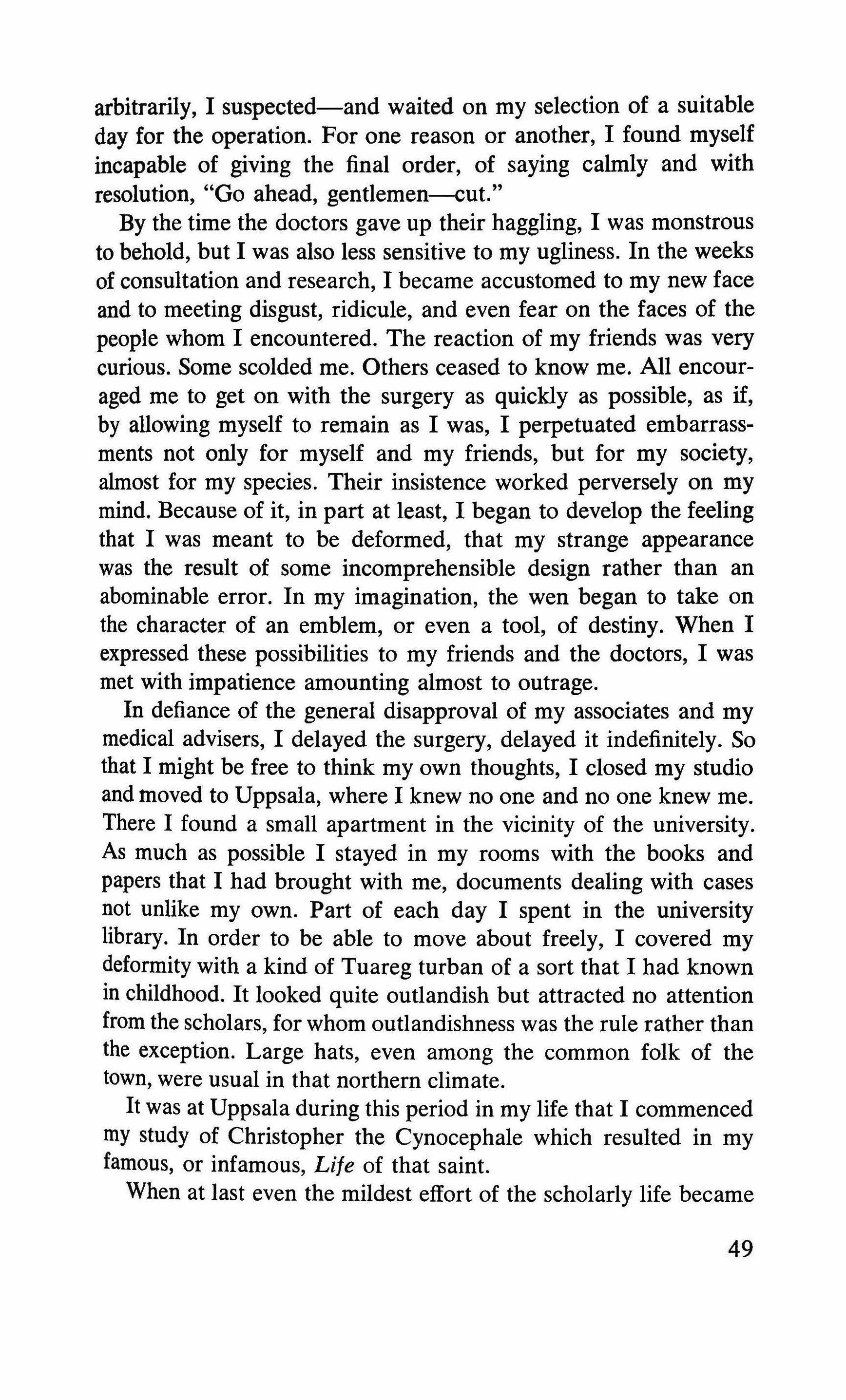
arbitrarily, I suspected-and waited on my selection of a suitable day for the operation. For one reason or another, I found myself incapable of giving the final order, of saying calmly and with resolution, "Go ahead, gentlemen--cut."
By the time the doctors gave up their haggling, I was monstrous to behold, but I was also less sensitive to my ugliness. In the weeks of consultation and research, I became accustomed to my new face and to meeting disgust, ridicule, and even fear on the faces of the people whom I encountered. The reaction of my friends was very curious. Some scolded me. Others ceased to know me. All encouraged me to get on with the surgery as quickly as possible, as if, by allowing myself to remain as I was, I perpetuated embarrassments not only for myself and my friends, but for my society, almost for my species. Their insistence worked perversely on my mind. Because of it, in part at least, I began to develop the feeling that I was meant to be deformed, that my strange appearance was the result of some incomprehensible design rather than an abominable error. In my imagination, the wen began to take on the character of an emblem, or even a tool, of destiny. When I expressed these possibilities to my friends and the doctors, I was met with impatience amounting almost to outrage. In defiance of the general disapproval of my associates and my medical advisers, I delayed the surgery, delayed it indefinitely. So that I might be free to think my own thoughts, I closed my studio and moved to Uppsala, where I knew no one and no one knew me. There I found a small apartment in the vicinity of the university. As much as possible I stayed in my rooms with the books and papers that I had brought with me, documents dealing with cases not unlike my own. Part of each day I spent in the university library. In order to be able to move about freely, I covered my deformity with a kind of Tuareg turban of a sort that I had known in childhood. It looked quite outlandish but attracted no attention from the scholars, for whom outlandishness was the rule rather than the exception. Large hats, even among the common folk of the town, were usual in that northern climate.
It was at Uppsala during this period in my life that I commenced my study of Christopher the Cynocephale which resulted in my famous, or infamous, Life of that saint. When at last even the mildest effort of the scholarly life became
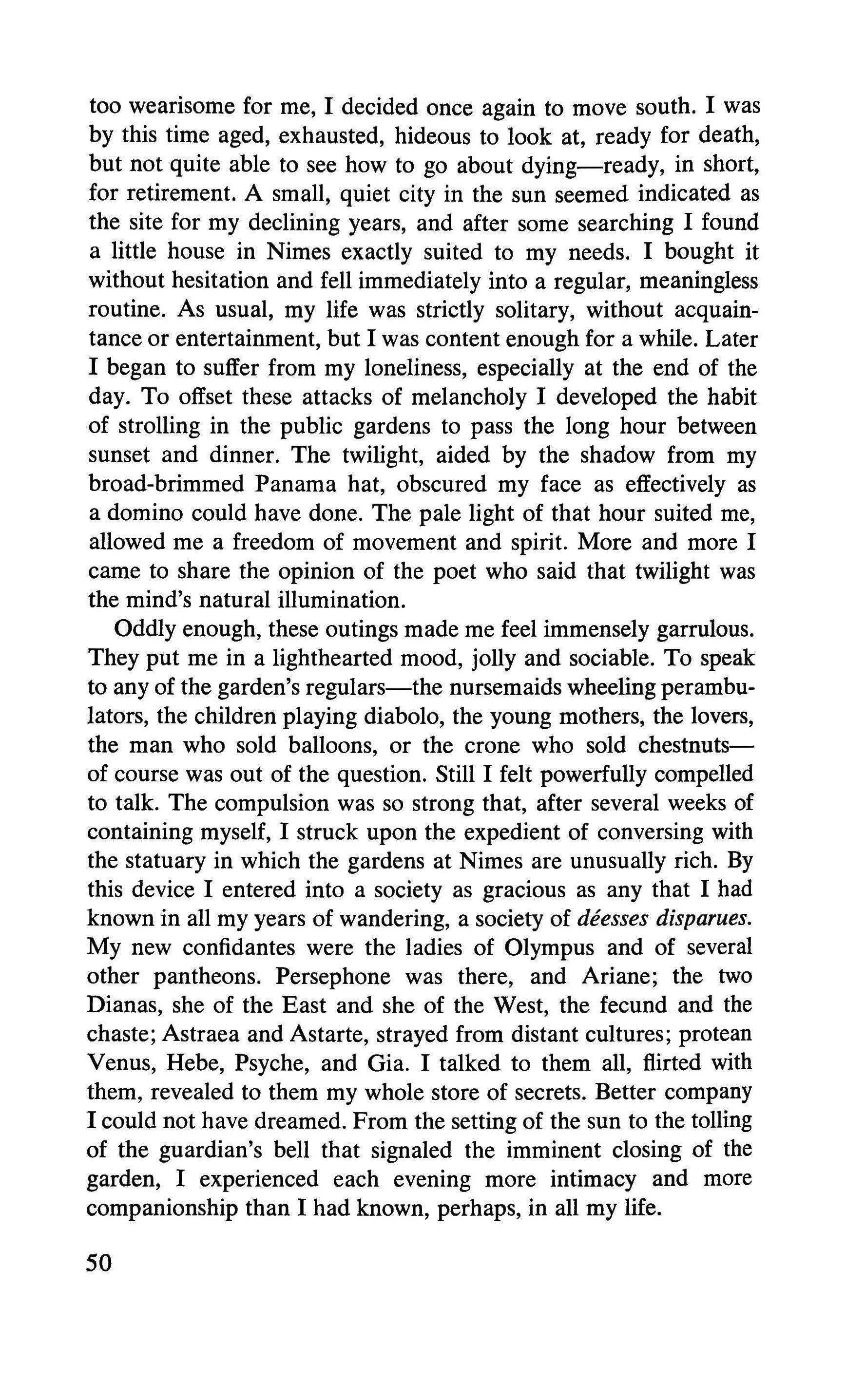
too wearisome for me, I decided once again to move south. I was by this time aged, exhausted, hideous to look at, ready for death, but not quite able to see how to go about dying-ready, in short, for retirement. A small, quiet city in the sun seemed indicated as the site for my declining years, and after some searching I found a little house in Nimes exactly suited to my needs. I bought it without hesitation and fell immediately into a regular, meaningless routine. As usual, my life was strictly solitary, without acquaintance or entertainment, but I was content enough for a while. Later I began to suffer from my loneliness, especially at the end of the day. To offset these attacks of melancholy I developed the habit of strolling in the public gardens to pass the long hour between sunset and dinner. The twilight, aided by the shadow from my broad-brimmed Panama hat, obscured my face as effectively as a domino could have done. The pale light of that hour suited me, allowed me a freedom of movement and spirit. More and more I came to share the opinion of the poet who said that twilight was the mind's natural illumination.
Oddly enough, these outings made me feel immensely garrulous. They put me in a lighthearted mood, jolly and sociable. To speak to any of the garden's regulars-the nursemaids wheeling perambulators, the children playing diabolo, the young mothers, the lovers, the man who sold balloons, or the crone who sold chestnutsof course was out of the question. Still I felt powerfully compelled to talk. The compulsion was so strong that, after several weeks of containing myself, I struck upon the expedient of conversing with the statuary in which the gardens at Nimes are unusually rich. By this device I entered into a society as gracious as any that I had known in all my years of wandering, a society of deesses disparues. My new confidantes were the ladies of Olympus and of several other pantheons. Persephone was there, and Ariane; the two Dianas, she of the East and she of the West, the fecund and the chaste; Astraea and Astarte, strayed from distant cultures; protean Venus, Hebe, Psyche, and Gia. I talked to them all, flirted with them, revealed to them my whole store of secrets. Better company I could not have dreamed. From the setting of the sun to the tolling of the guardian's bell that signaled the imminent closing of the garden, I experienced each evening more intimacy and more companionship than I had known, perhaps, in all my life.
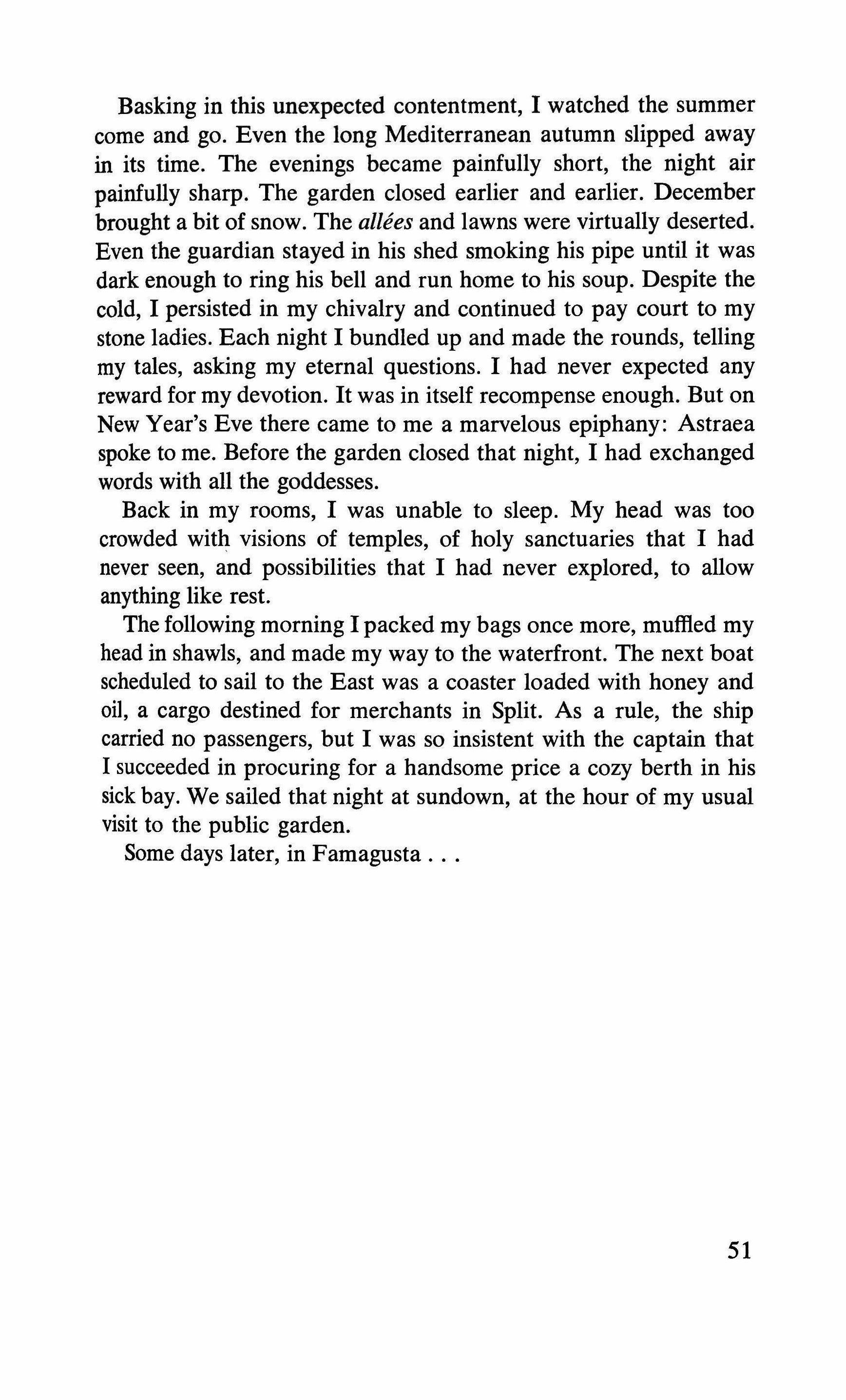
Basking in this unexpected contentment, I watched the summer come and go. Even the long Mediterranean autumn slipped away in its time. The evenings became painfully short, the night air painfully sharp. The garden closed earlier and earlier. December brought a bit of snow. The allees and lawns were virtually deserted. Even the guardian stayed in his shed smoking his pipe until it was dark enough to ring his bell and run home to his soup. Despite the cold, I persisted in my chivalry and continued to pay court to my stone ladies. Each night I bundled up and made the rounds, telling my tales, asking my eternal questions. I had never expected any reward for my devotion. It was in itself recompense enough. But on New Year's Eve there came to me a marvelous epiphany: Astraea spoke to me. Before the garden closed that night, I had exchanged words with all the goddesses.
Back in my rooms, I was unable to sleep. My head was too crowded with visions of temples, of holy sanctuaries that I had never seen, and possibilities that I had never explored, to allow anything like rest.
The following morning I packed my bags once more, muffled my head in shawls, and made my way to the waterfront. The next boat scheduled to sail to the East was a coaster loaded with honey and oil, a cargo destined for merchants in Split. As a rule, the ship carried no passengers, but I was so insistent with the captain that I succeeded in procuring for a handsome price a cozy berth in his sick bay. We sailed that night at sundown, at the hour of my usual visit to the public garden.
Some days later, in Famagusta
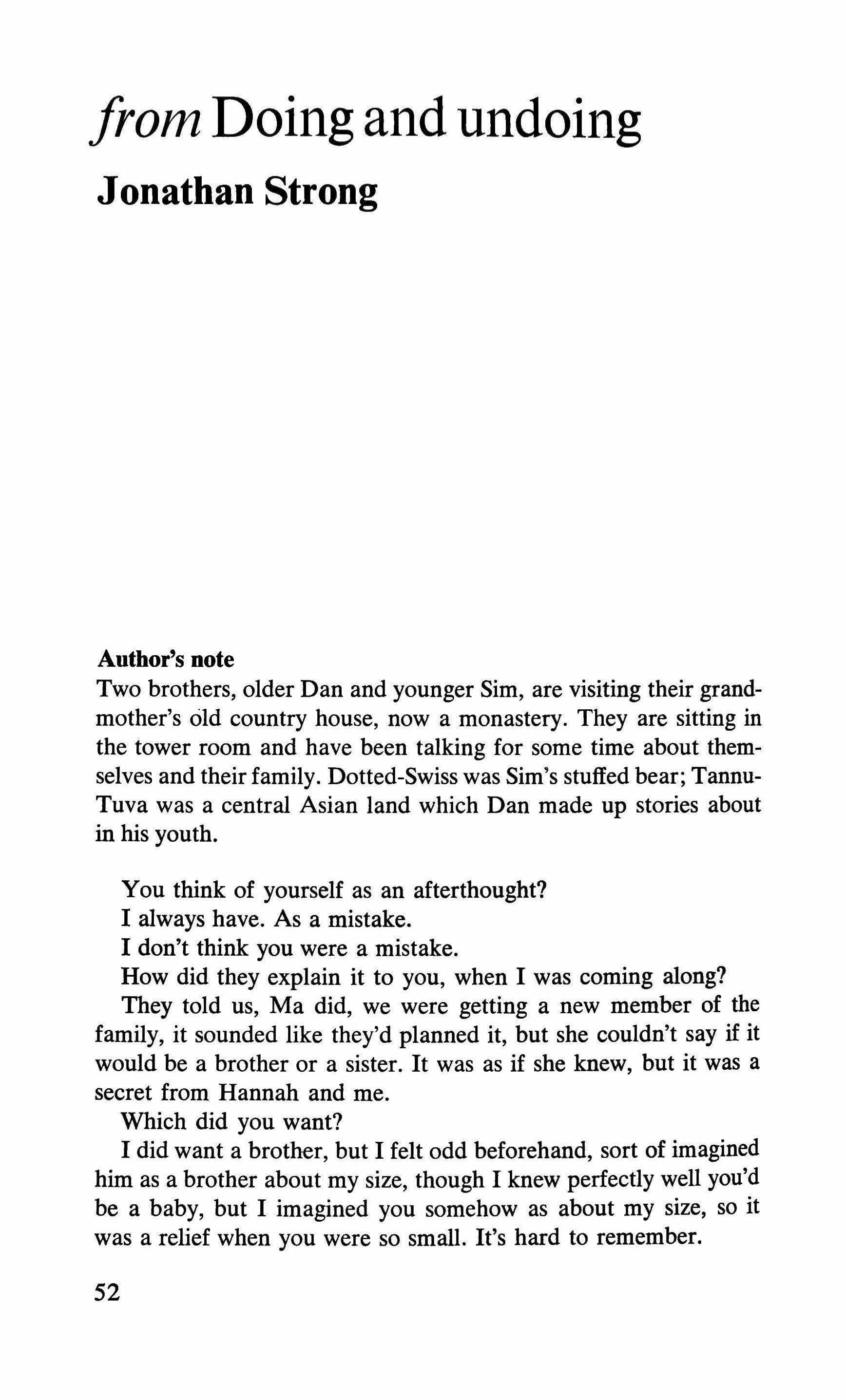
Two brothers, older Dan and younger Sim, are visiting their grandmother's old country house, now a monastery. They are sitting in the tower room and have been talking for some time about themselves and their family. Dotted-Swiss was Sim's stuffed bear; TannuTuva was a central Asian land which Dan made up stories about in his youth.
You think of yourself as an afterthought?
I always have. As a mistake. I don't think you were a mistake. How did they explain it to you, when I was coming along?
They told us, Ma did, we were getting a new member of the family, it sounded like they'd planned it, but she couldn't say if it would be a brother or a sister. It was as if she knew, but it was a secret from Hannah and me.
Which did you want?
I did want a brother, but I felt odd beforehand, sort of imagined him as a brother about my size, though I knew perfectly well you'd be a baby, but I imagined you somehow as about my size, so it was a relief when you were so small. It's hard to remember.
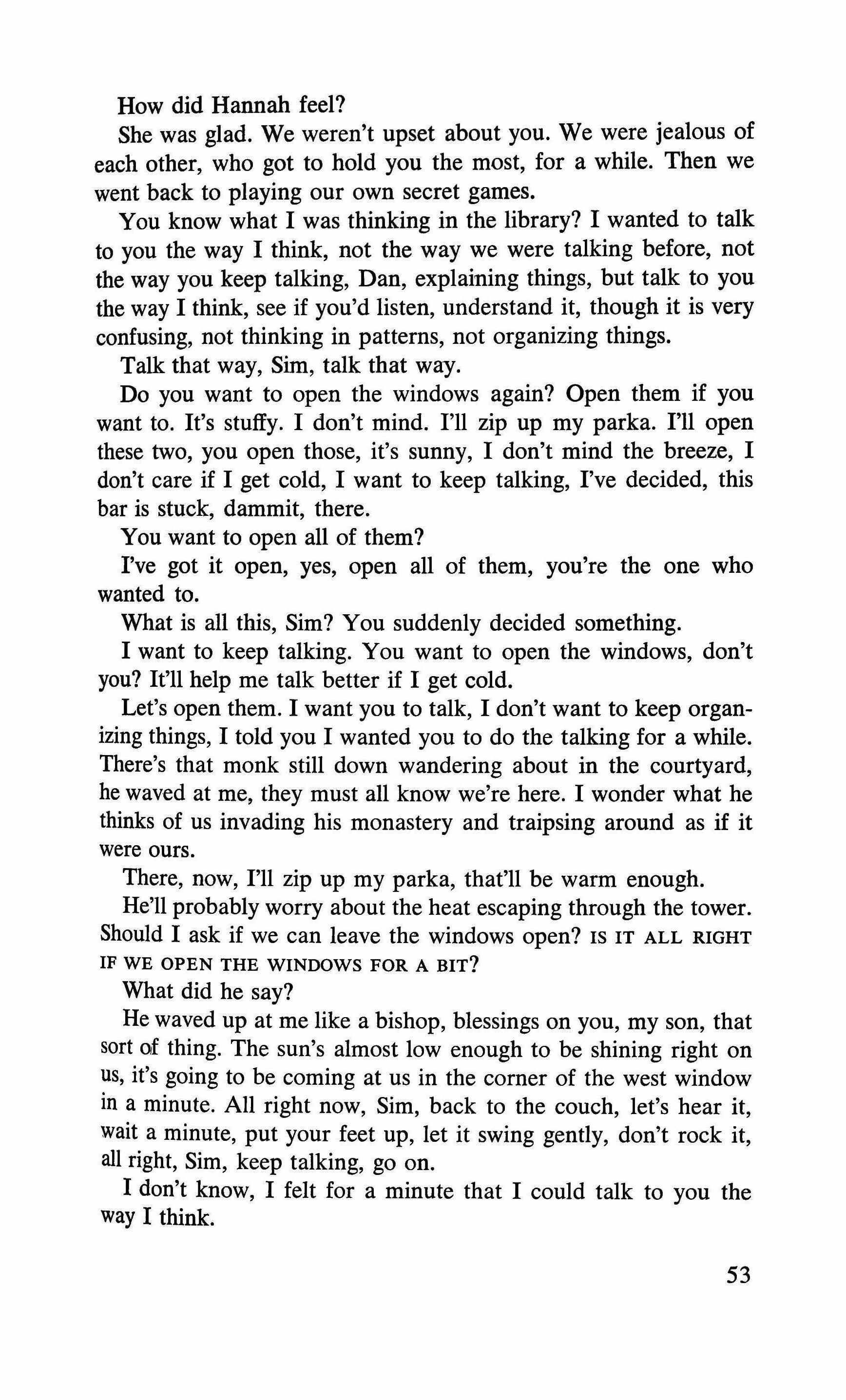
How did Hannah feel?
She was glad. We weren't upset about you. We were jealous of each other, who got to hold you the most, for a while. Then we went back to playing our own secret games.
You know what I was thinking in the library? I wanted to talk to you the way I think, not the way we were talking before, not the way you keep talking, Dan, explaining things, but talk to you the way I think, see if you'd listen, understand it, though it is very confusing, not thinking in patterns, not organizing things.
Talk that way, Sim, talk that way.
Do you want to open the windows again? Open them if you want to. It's stuffy. I don't mind. I'll zip up my parka. I'll open these two, you open those, it's sunny, I don't mind the breeze, I don't care if I get cold, I want to keep talking, I've decided, this bar is stuck, dammit, there.
You want to open all of them?
I've got it open, yes, open all of them, you're the one who wanted to.
What is all this, Sim? You suddenly decided something. I want to keep talking. You want to open the windows, don't you? It'll help me talk better if I get cold.
Let's open them. I want you to talk, I don't want to keep organizing things, I told you I wanted you to do the talking for a while. There's that monk still down wandering about in the courtyard, he waved at me, they must all know we're here. I wonder what he thinks of us invading his monastery and traipsing around as if it were ours.
There, now, I'll zip up my parka, that'll be warm enough. He'll probably worry about the heat escaping through the tower. Should I ask if we can leave the windows open? IS IT ALL RIGHT IF WE OPEN THE WINDOWS FOR A BIT?
What did he say?
He waved up at me like a bishop, blessings on you, my son, that sort of thing. The sun's almost low enough to be shining right on us, it's going to be coming at us in the corner of the west window in a minute. All right now, Sim, back to the couch, let's hear it, wait a minute, put your feet up, let it swing gently, don't rock it, all right, Sim, keep talking, go on.
I don't know, I felt for a minute that I could talk to you the way I think.
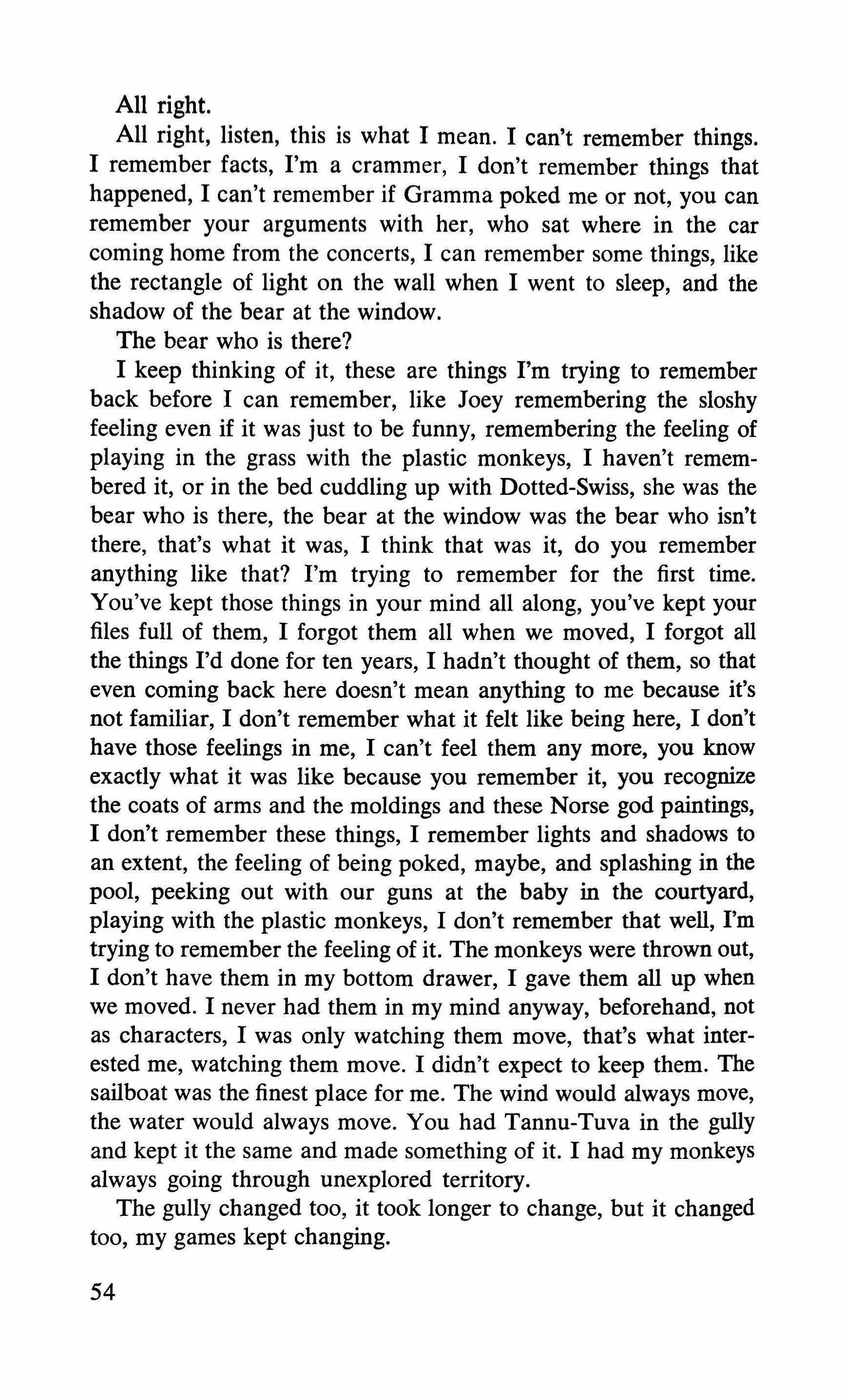
All right.
All right, listen, this is what I mean. I can't remember things. I remember facts, I'm a crammer, I don't remember things that happened, I can't remember if Gramma poked me or not, you can remember your arguments with her, who sat where in the car coming home from the concerts, I can remember some things, like the rectangle of light on the wall when I went to sleep, and the shadow of the bear at the window.
The bear who is there?
I keep thinking of it, these are things I'm trying to remember back before I can remember, like Joey remembering the sloshy feeling even if it was just to be funny, remembering the feeling of playing in the grass with the plastic monkeys, I haven't remembered it, or in the bed cuddling up with Dotted-Swiss, she was the bear who is there, the bear at the window was the bear who isn't there, that's what it was, I think that was it, do you remember anything like that? I'm trying to remember for the first time. You've kept those things in your mind all along, you've kept your files full of them, I forgot them all when we moved, I forgot all the things I'd done for ten years, I hadn't thought of them, so that even coming back here doesn't mean anything to me because it's not familiar, I don't remember what it felt like being here, I don't have those feelings in me, I can't feel them any more, you know exactly what it was like because you remember it, you recognize the coats of arms and the moldings and these Norse god paintings, I don't remember these things, I remember lights and shadows to an extent, the feeling of being poked, maybe, and splashing in the pool, peeking out with our guns at the baby in the courtyard, playing with the plastic monkeys, I don't remember that well, I'm trying to remember the feeling of it. The monkeys were thrown out, I don't have them in my bottom drawer, I gave them all up when we moved. I never had them in my mind anyway, beforehand, not as characters, I was only watching them move, that's what interested me, watching them move. I didn't expect to keep them. The sailboat was the finest place for me. The wind would always move, the water would always move. You had Tannu-Tuva in the gully and kept it the same and made something of it. I had my monkeys always going through unexplored territory. The gully changed too, it took longer to change, but it changed too, my games kept changing.
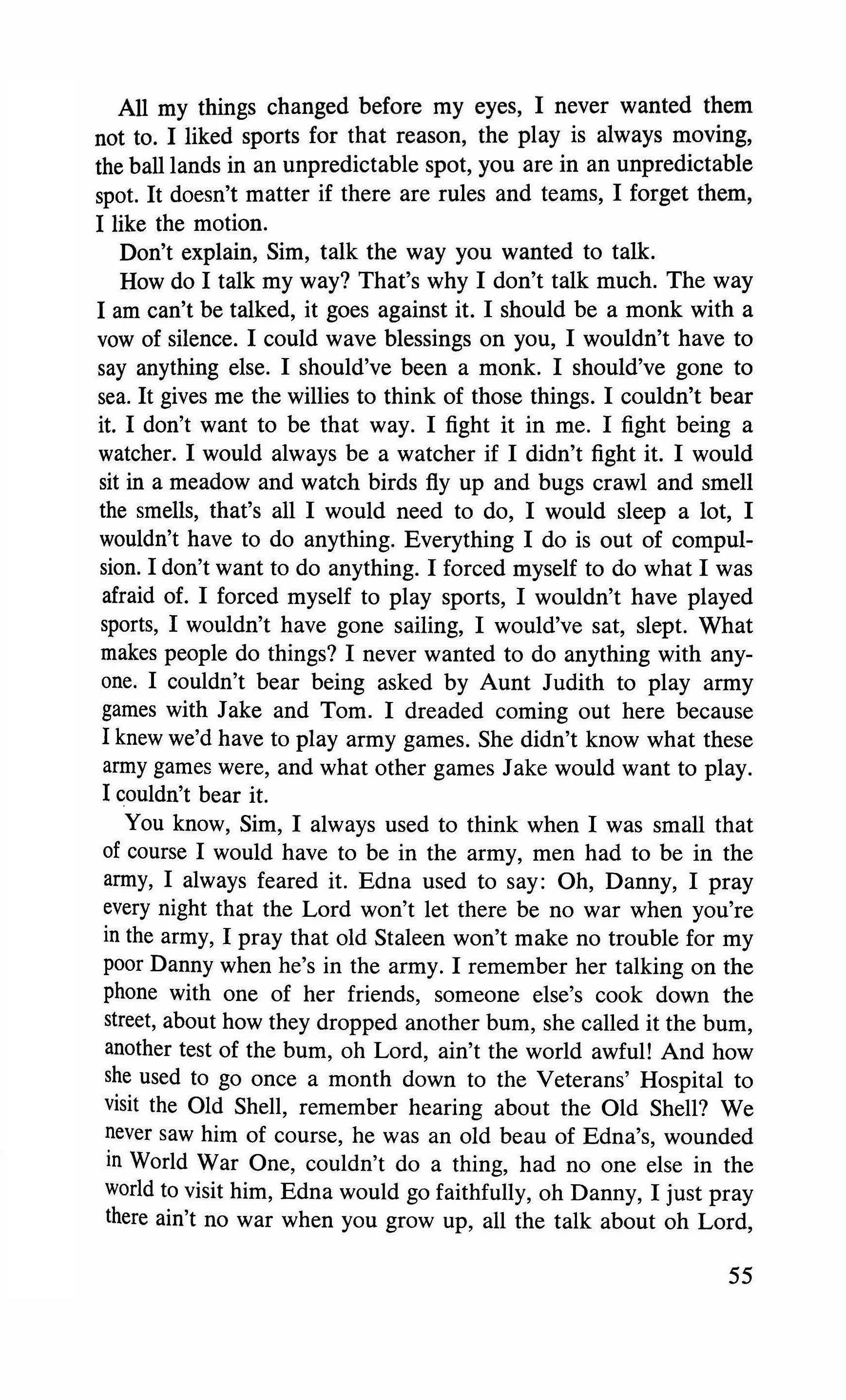
All my things changed before my eyes, I never wanted them not to. I liked sports for that reason, the play is always moving, the ball lands in an unpredictable spot, you are in an unpredictable spot. It doesn't matter if there are rules and teams, I forget them, I like the motion.
Don't explain, Sim, talk the way you wanted to talk. How do I talk my way? That's why I don't talk much. The way I am can't be talked, it goes against it. I should be a monk with a vow of silence. I could wave blessings on you, I wouldn't have to say anything else. I should've been a monk. I should've gone to sea. It gives me the willies to think of those things. I couldn't bear it. I don't want to be that way. I fight it in me. I fight being a watcher. I would always be a watcher if I didn't fight it. I would sit in a meadow and watch birds fly up and bugs crawl and smell the smells, that's all I would need to do, I would sleep a lot, I wouldn't have to do anything. Everything I do is out of compulsion. I don't want to do anything. I forced myself to do what I was afraid of. I forced myself to play sports, I wouldn't have played sports, I wouldn't have gone sailing, I would've sat, slept. What makes people do things? I never wanted to do anything with anyone. I couldn't bear being asked by Aunt Judith to play army games with Jake and Tom. I dreaded coming out here because I knew we'd have to play army games. She didn't know what these army games were, and what other games Jake would want to play. I couldn't bear it.
You know, Sim, I always used to think when I was small that of course I would have to be in the army, men had to be in the army, I always feared it. Edna used to say: Oh, Danny, I pray every night that the Lord won't let there be no war when you're in the army, I pray that old Staleen won't make no trouble for my poor Danny when he's in the army. I remember her talking on the phone with one of her friends, someone else's cook down the street, about how they dropped another bum, she called it the bum, another test of the bum, oh Lord, ain't the world awful! And how she used to go once a month down to the Veterans' Hospital to visit the Old Shell, remember hearing about the Old Shell? We never saw him of course, he was an old beau of Edna's, wounded in World War One, couldn't do a thing, had no one else in the world to visit him, Edna would go faithfully, oh Danny, I just pray there ain't no war when you grow up, all the talk about oh Lord,
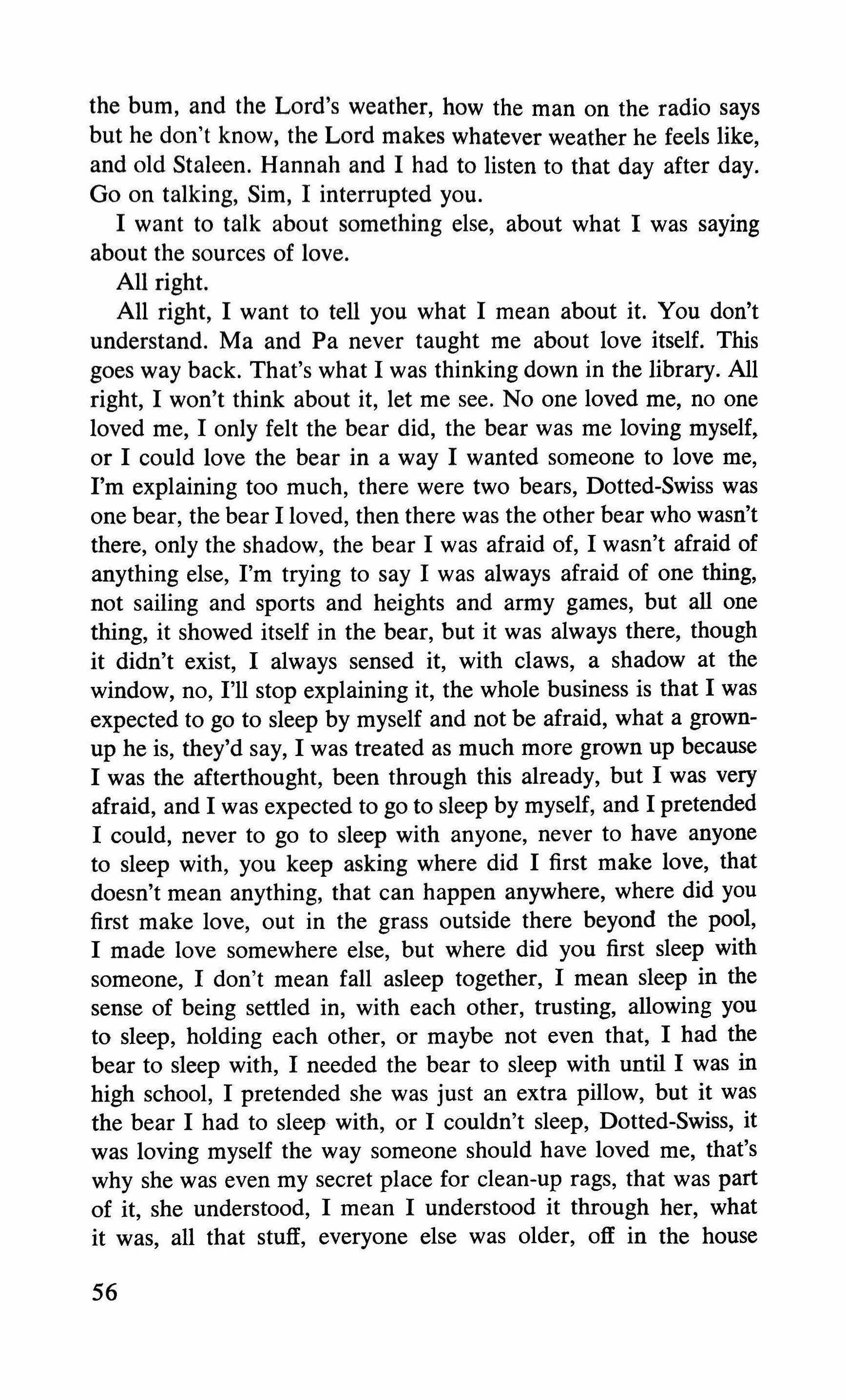
the bum, and the Lord's weather, how the man on the radio says but he don't know, the Lord makes whatever weather he feels like, and old Staleen. Hannah and I had to listen to that day after day. Go on talking, Sim, I interrupted you.
I want to talk about something else, about what I was saying about the sources of love.
All right.
All right, I want to tell you what I mean about it. You don't understand. Ma and Pa never taught me about love itself. This goes way back. That's what I was thinking down in the library. All right, I won't think about it, let me see. No one loved me, no one loved me, I only felt the bear did, the bear was me loving myself, or I could love the bear in a way I wanted someone to love me, I'm explaining too much, there were two bears, Dotted-Swiss was one bear, the bear I loved, then there was the other bear who wasn't there, only the shadow, the bear I was afraid of, I wasn't afraid of anything else, I'm trying to say I was always afraid of one thing, not sailing and sports and heights and army games, but all one thing, it showed itself in the bear, but it was always there, though it didn't exist, I always sensed it, with claws, a shadow at the window, no, I'll stop explaining it, the whole business is that I was expected to go to sleep by myself and not be afraid, what a grownup he is, they'd say, I was treated as much more grown up because I was the afterthought, been through this already, but I was very afraid, and I was expected to go to sleep by myself, and I pretended I could, never to go to sleep with anyone, never to have anyone to sleep with, you keep asking where did I first make love, that doesn't mean anything, that can happen anywhere, where did you first make love, out in the grass outside there beyond the pool, I made love somewhere else, but where did you first sleep with someone, I don't mean fall asleep together, I mean sleep in the sense of being settled in, with each other, trusting, allowing you to sleep, holding each other, or maybe not even that, I had the bear to sleep with, I needed the bear to sleep with until I was in high school, I pretended she was just an extra pillow, but it was the bear I had to sleep with, or I couldn't sleep, Dotted-Swiss, it was loving myself the way someone should have loved me, that's why she was even my secret place for clean-up rags, that was part of it, she understood, I mean I understood it through her, what it was, all that stuff, everyone else was older, off in the house

asleep, Ma and Pa, and soon Hannah off sleeping with Peter, I sensed it, then Matt, and you off with Sarah and then Mir, I was the only one who didn't sleep with anyone, I think Ma and Pa made it so I never would, I still have not, that's what you don't understand, you're just curious about my facts, what I don't understand is the things I can't say, why I don't listen to music, I don't understand it, don't care, I don't understand how you talk about the feelings of it, how you talk about politics, why you care, I don't even understand how you talk about even Mir, you feel something, where does it come from, who gave it to you, I don't have the feeling, there is no source, do you know that everyone I knew always got up and left, walked home, got up and left, you can't imagine it, I am very romantic, it doesn't sound like me, because I am quiet and don't have feelings, only wishes, can wishes be feelings, they don't exist yet, you can't have feelings if you haven't had them yet, wishes are things you haven't had, why do I trust you now, Dan, I never trusted you before, you are the person in the world I trust, the only person who can make me feel better by talking, I don't think I can hold onto anyone else, since this trip, maybe it's that you are different from me and it doesn't matter, it's what amazes me, I don't want you to be the same as me, it's much happier for me that you aren't, it's that you are here and talk to me, specifically, even though I did get mad because you talk on and on explaining things and may only want to hear me say back the same things, but it is to me, I'm beginning to feel it is specifically to me, no one else talks specifically to me, Ma and Pa never talk specifically to me, I don't expect them to, I'm making no sense, someone listening to me would think I was very confused.
I'm confused, it doesn't matter, Sim, I understand some of it. Whenever I've spent the night with someone I've not been able to sleep, I have a terrible nervous restless night, I've never slept with someone more than one night in a row, never two, I'm too tired, I can't, Ma and Pa wanted me always to sleep alone, still want me to, would prefer it, made no provisions in their minds for me otherwise, as far as they know I never have, at twenty-three, slept with anyone, they're secretly relieved by it.
They didn't want me to sleep with anyone either, they didn't want Mir, or anyone else.
But you did, but you did, and they knew about it. With me they

don't know about anyone, never have, no names, neither do you, just assuming, doesn't it puzzle you?
Why do you think I asked about it before? I want to find out these things. You're puzzling. I don't know your secrets. I told you I wouldn't shake them out, as long as you know I want to know and you can tell me if you want to. Do you want Ma and Pa to want to know?
I don't expect it. But you want it. You want them to change, I don't expect it, why want it?
Why do you feel you can't sleep with anyone? You do want to. It's their doing. Don't you expect anything from them, Sim? I expect too much, I don't do well with less. I'm a perfectionist. That's what Pa said to me. I don't think it's true now, it used to be. He gave me a long talk about my perfectionism a couple days before Christmas when I was there, before you got down. I didn't tell you about it, I wouldn't have told you. We didn't talk to each other much even three months ago.
What did he tell you?
My idea was to tell him, tell them both, Ma too, she kept going back and forth to the kitchen baking cookies, kept coming back and saying: What did I miss? What did I miss? My idea was to tell them that Mir and I wouldn't be living together after the tum of the year. I felt lowed them a discussion of it, I'd not discussed it with them for years because I knew they didn't like us living together, that's why I wanted to talk to them, to keep them from gloating privately over it, feeling they'd won at last, it wasn't that lowed them a discussion, I wanted to explain exactly what had happened, so they'd not be able to take comfort in it, I wanted them to know that if it hadn't worked out it wasn't Mir's doing, as they assumed it was, but it was my doing, and if it was my doing, it was their doing too. Is that a terrible thing to have done to them? I didn't want them to feel they'd won, they had to understand it as a defeat for them, not a victory. They felt she had taken advantage of me, I was supporting her through grad school, and what I'd worked at hadn't been anything I might eventually make myself of, it was temporary, to get Mir through, they hated her, when they gave me presents of money, you know, it was earmarked, Danny, just spend this on yourself, clothes, books, what-
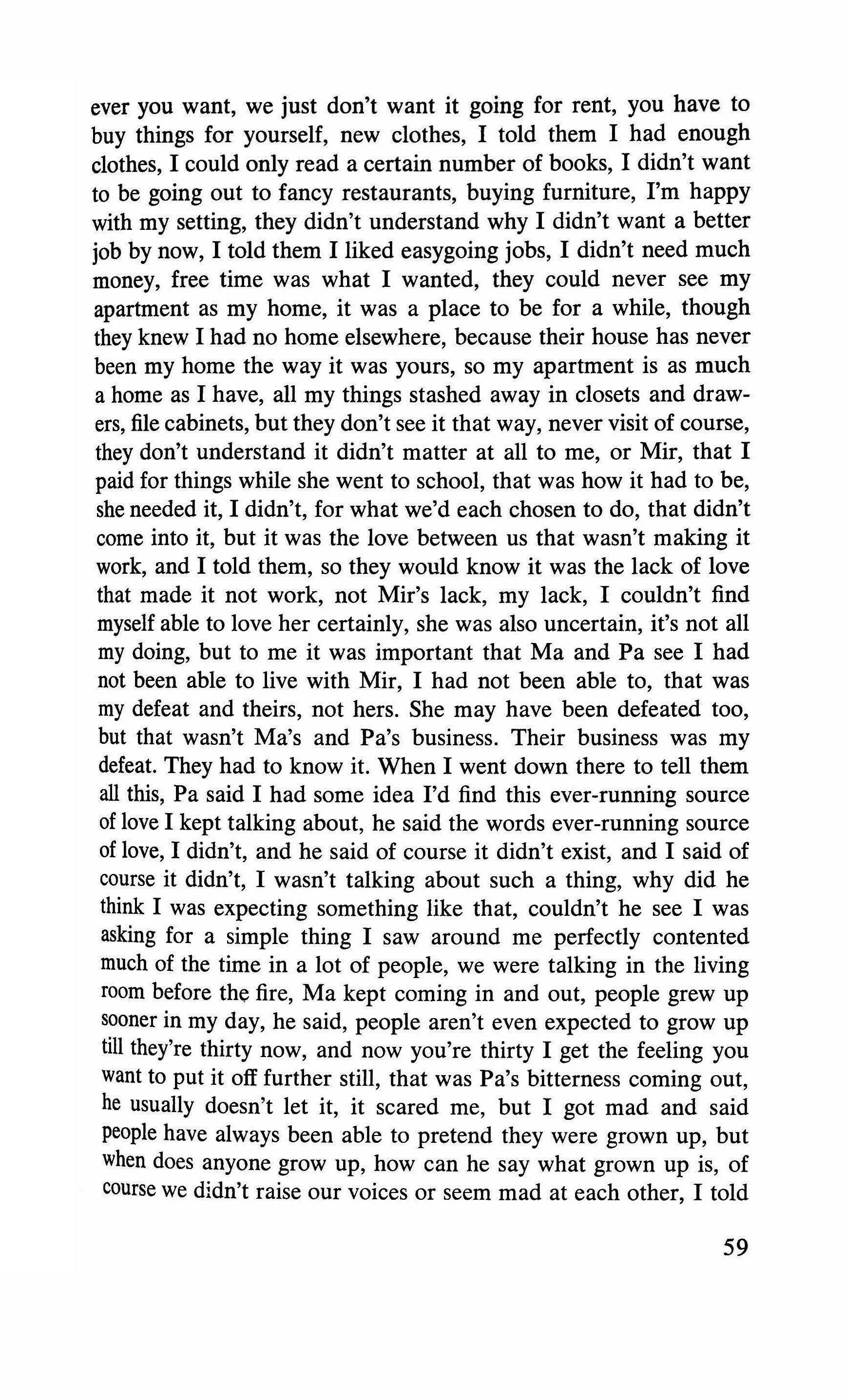
ever you want, we just don't want it going for rent, you have to buy things for yourself, new clothes, I told them I had enough clothes, I could only read a certain number of books, I didn't want to be going out to fancy restaurants, buying furniture, I'm happy with my setting, they didn't understand why I didn't want a better job by now, I told them I liked easygoing jobs, I didn't need much money, free time was what I wanted, they could never see my apartment as my home, it was a place to be for a while, though they knew I had no home elsewhere, because their house has never been my home the way it was yours, so my apartment is as much a home as I have, all my things stashed away in closets and drawers, file cabinets, but they don't see it that way, never visit of course, they don't understand it didn't matter at all to me, or Mir, that I paid for things while she went to school, that was how it had to be, she needed it, I didn't, for what we'd each chosen to do, that didn't come into it, but it was the love between us that wasn't making it work, and I told them, so they would know it was the lack of love that made it not work, not Mir's lack, my lack, I couldn't find myself able to love her certainly, she was also uncertain, it's not all my doing, but to me it was important that Ma and Pa see I had not been able to live with Mir, I had not been able to, that was my defeat and theirs, not hers. She may have been defeated too, but that wasn't Ma's and Pa's business. Their business was my defeat. They had to know it. When I went down there to tell them all this, Pa said I had some idea I'd find this ever-running source of love I kept talking about, he said the words ever-running source of love, I didn't, and he said of course it didn't exist, and I said of course it didn't, I wasn't talking about such a thing, why did he think I was expecting something like that, couldn't he see I was asking for a simple thing I saw around me perfectly contented much of the time in a lot of people, we were talking in the living room before the fire, Ma kept coming in and out, people grew up sooner in my day, he said, people aren't even expected to grow up till they're thirty now, and now you're thirty I get the feeling you want to put it off further still, that was Pa's bitterness coming out, he usually doesn't let it, it scared me, but I got mad and said people have always been able to pretend they were grown up, but When does anyone grow up, how can he say what grown up is, of Course we didn't raise our voices or seem mad at each other, I told
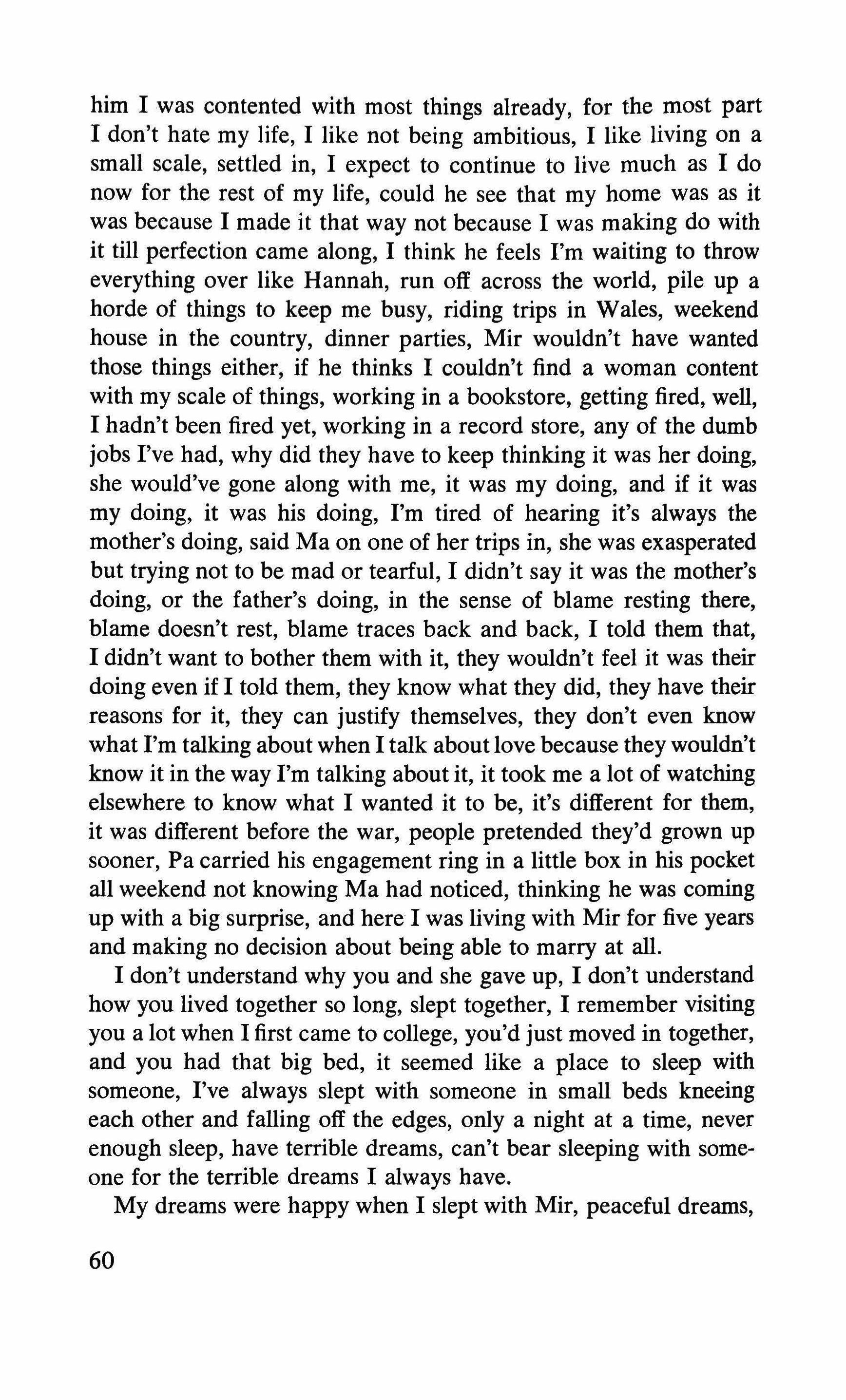
him I was contented with most things already, for the most part I don't hate my life, I like not being ambitious, I like living on a small scale, settled in, I expect to continue to live much as I do now for the rest of my life, could he see that my home was as it was because I made it that way not because I was making do with it till perfection came along, I think he feels I'm waiting to throw everything over like Hannah, run off across the world, pile up a horde of things to keep me busy, riding trips in Wales, weekend house in the country, dinner parties, Mir wouldn't have wanted those things either, if he thinks I couldn't find a woman content with my scale of things, working in a bookstore, getting fired, well, I hadn't been fired yet, working in a record store, any of the dumb jobs I've had, why did they have to keep thinking it was her doing, she would've gone along with me, it was my doing, and if it was my doing, it was his doing, I'm tired of hearing it's always the mother's doing, said Ma on one of her trips in, she was exasperated but trying not to be mad or tearful, I didn't say it was the mother's doing, or the father's doing, in the sense of blame resting there, blame doesn't rest, blame traces back and back, I told them that, I didn't want to bother them with it, they wouldn't feel it was their doing even if I told them, they know what they did, they have their reasons for it, they can justify themselves, they don't even know what I'm talking about when I talk about love because they wouldn't know it in the way I'm talking about it, it took me a lot of watching elsewhere to know what I wanted it to be, it's different for them, it was different before the war, people pretended they'd grown up sooner, Pa carried his engagement ring in a little box in his pocket all weekend not knowing Ma had noticed, thinking he was coming up with a big surprise, and here I was living with Mir for five years and making no decision about being able to marry at all.
I don't understand why you and she gave up, I don't understand how you lived together so long, slept together, I remember visiting you a lot when I first came to college, you'd just moved in together, and you had that big bed, it seemed like a place to sleep with someone, I've always slept with someone in small beds kneeing each other and falling off the edges, only a night at a time, never enough sleep, have terrible dreams, can't bear sleeping with someone for the terrible dreams I always have.
My dreams were happy when I slept with Mir, peaceful dreams,
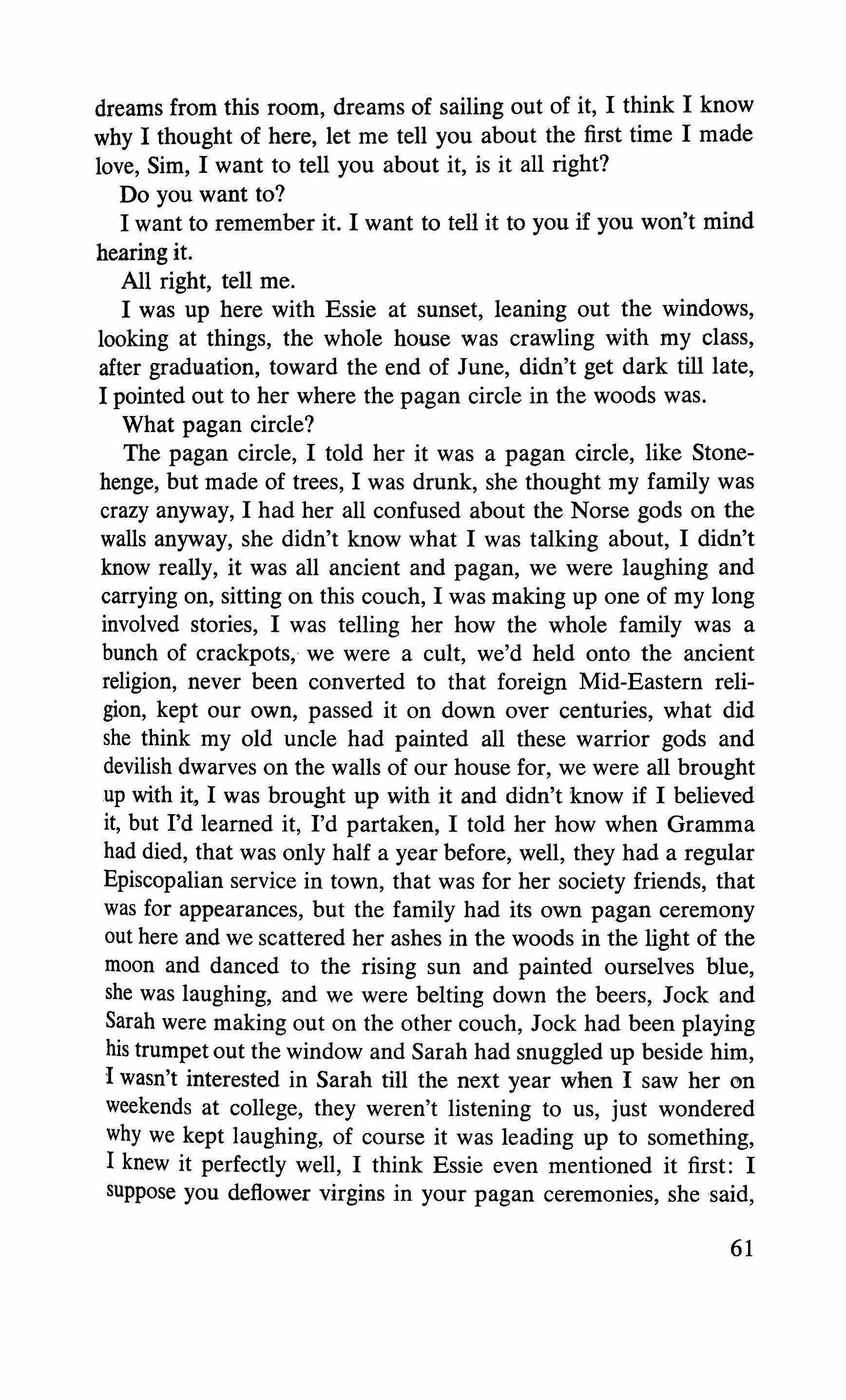
dreams from this room, dreams of sailing out of it, I think I know why I thought of here, let me tell you about the first time I made love, Sim, I want to tell you about it, is it all right?
Do you want to?
I want to remember it. I want to tell it to you if you won't mind hearing it.
All right, tell me.
I was up here with Essie at sunset, leaning out the windows, looking at things, the whole house was crawling with my class, after graduation, toward the end of June, didn't get dark till late, I pointed out to her where the pagan circle in the woods was.
What pagan circle?
The pagan circle, I told her it was a pagan circle, like Stonehenge, but made of trees, I was drunk, she thought my family was crazy anyway, I had her all confused about the Norse gods on the walls anyway, she didn't know what I was talking about, I didn't know really, it was all ancient and pagan, we were laughing and carrying on, sitting on this couch, I was making up one of my long involved stories, I was telling her how the whole family was a bunch of crackpots, we were a cult, we'd held onto the ancient religion, never been converted to that foreign Mid-Eastern religion, kept our own, passed it on down over centuries, what did she think myoid uncle had painted all these warrior gods and devilish dwarves on the walls of our house for, we were all brought up with it. I was brought up with it and didn't know if I believed it, but I'd learned it, I'd partaken, I told her how when Gramma had died, that was only half a year before, well, they had a regular Episcopalian service in town, that was for her society friends, that was for appearances, but the family had its own pagan ceremony out here and we scattered her ashes in the woods in the light of the moon and danced to the rising sun and painted ourselves blue, she was laughing, and we were belting down the beers, Jock and Sarah were making out on the other couch, Jock had been playing his trumpet out the window and Sarah had snuggled up beside him, I wasn't interested in Sarah till the next year when I saw her em weekends at college, they weren't listening to us, just wondered why we kept laughing, of course it was leading up to something, I knew it perfectly well, I think Essie even mentioned it first: I suppose you deflower virgins in your pagan ceremonies, she said,
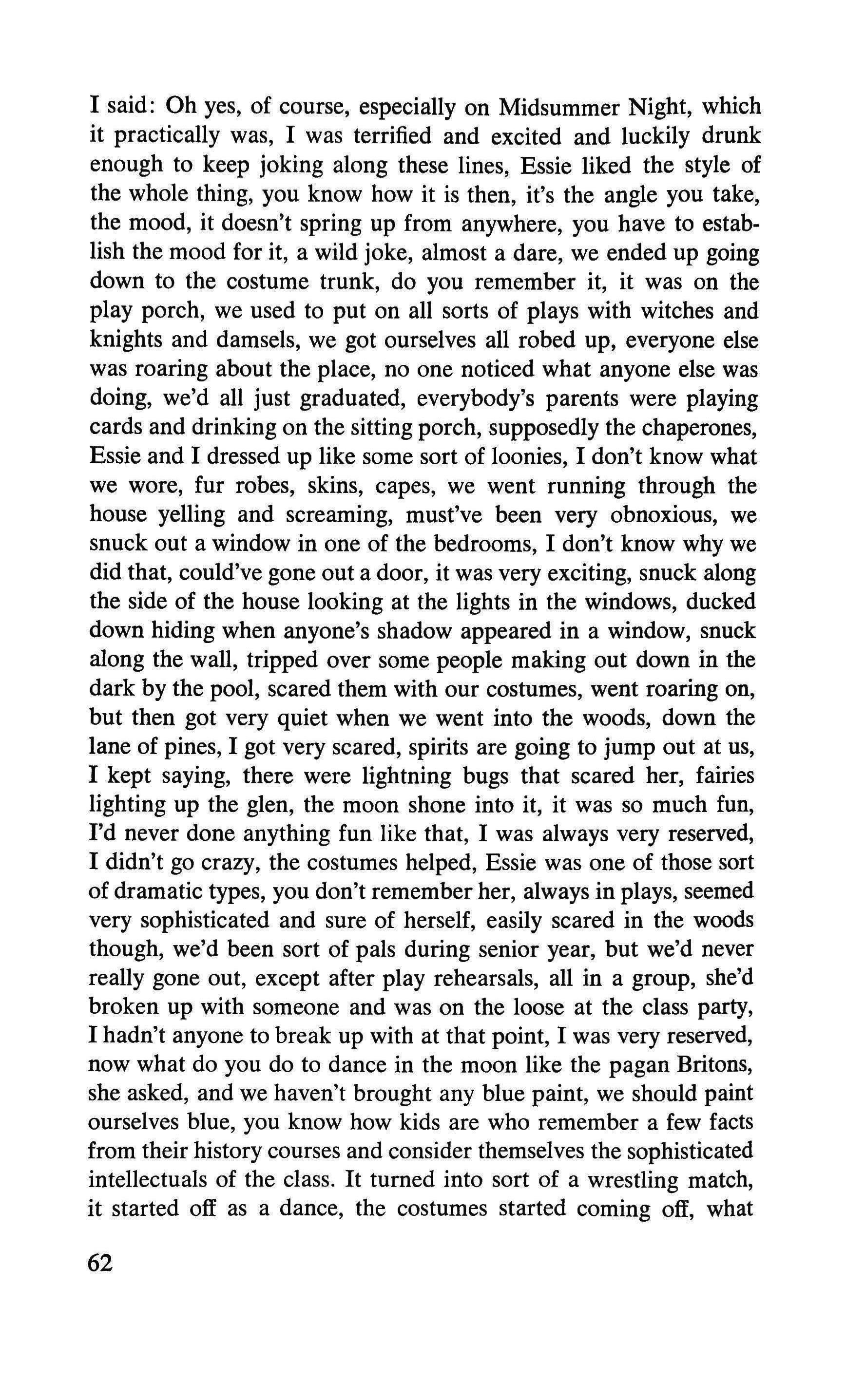
I said: Oh yes, of course, especially on Midsummer Night, which it practically was, I was terrified and excited and luckily drunk enough to keep joking along these lines, Essie liked the style of the whole thing, you know how it is then, it's the angle you take, the mood, it doesn't spring up from anywhere, you have to establish the mood for it, a wild joke, almost a dare, we ended up going down to the costume trunk, do you remember it, it was on the play porch, we used to put on all sorts of plays with witches and knights and damsels, we got ourselves all robed up, everyone else was roaring about the place, no one noticed what anyone else was doing, we'd all just graduated, everybody's parents were playing cards and drinking on the sitting porch, supposedly the chaperones, Essie and I dressed up like some sort of loonies, I don't know what we wore, fur robes, skins, capes, we went running through the house yelling and screaming, must've been very obnoxious, we snuck out a window in one of the bedrooms, I don't know why we did that, could've gone out a door, it was very exciting, snuck along the side of the house looking at the lights in the windows, ducked down hiding when anyone's shadow appeared in a window, snuck along the wall, tripped over some people making out down in the dark by the pool, scared them with our costumes, went roaring on, but then got very quiet when we went into the woods, down the lane of pines, I got very scared, spirits are going to jump out at us, I kept saying, there were lightning bugs that scared her, fairies lighting up the glen, the moon shone into it, it was so much fun, I'd never done anything fun like that, I was always very reserved, I didn't go crazy, the costumes helped, Essie was one of those sort of dramatic types, you don't remember her, always in plays, seemed very sophisticated and sure of herself, easily scared in the woods though, we'd been sort of pals during senior year, but we'd never really gone out, except after play rehearsals, all in a group, she'd broken up with someone and was on the loose at the class party, I hadn't anyone to break up with at that point, I was very reserved, now what do you do to dance in the moon like the pagan Britons, she asked, and we haven't brought any blue paint, we should paint ourselves blue, you know how kids are who remember a few facts from their history courses and consider themselves the sophisticated intellectuals of the class. It turned into sort of a wrestling match, it started off as a dance, the costumes started coming off, what
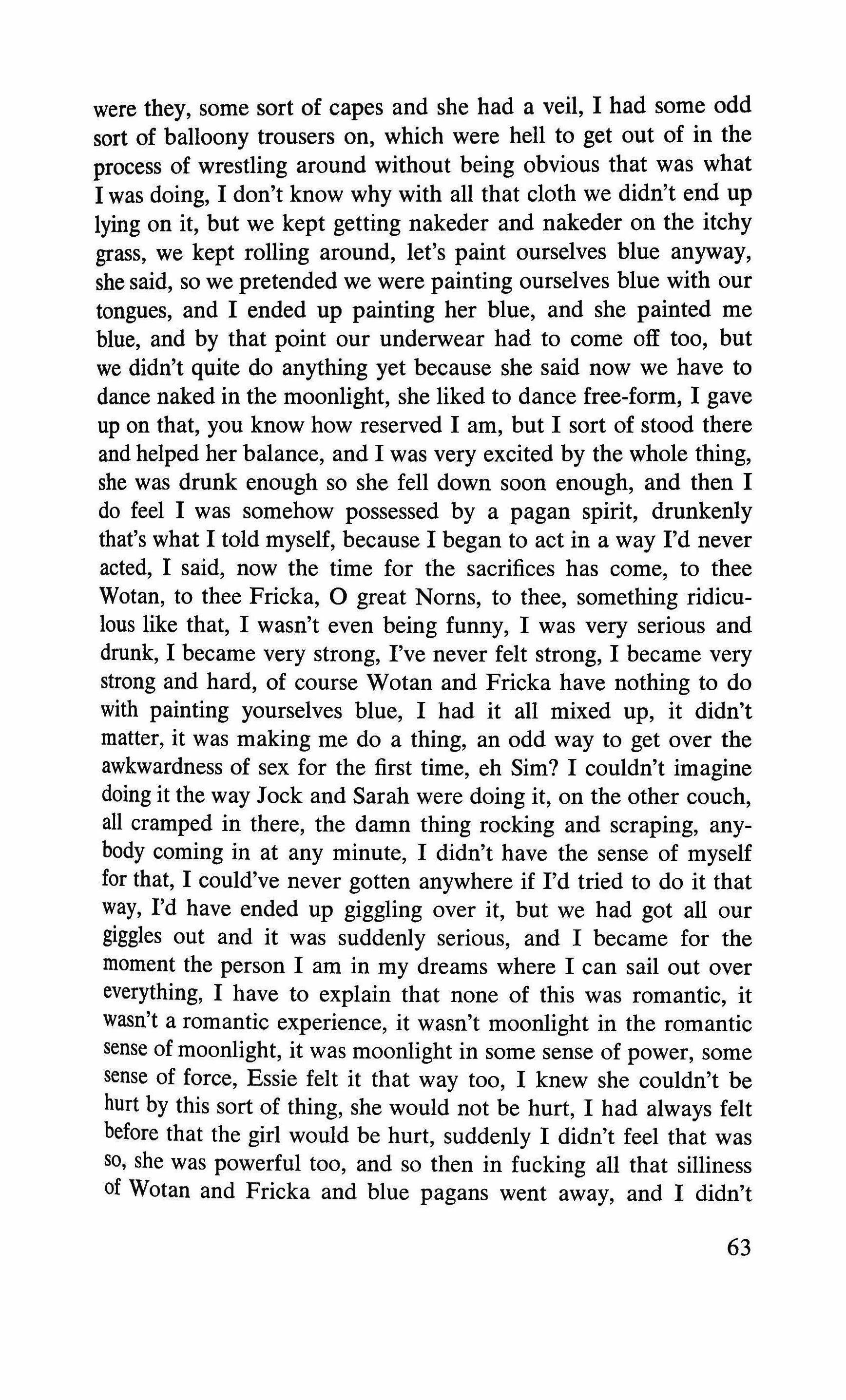
were they, some sort of capes and she had a veil, I had some odd sort of balloony trousers on, which were hell to get out of in the process of wrestling around without being obvious that was what I was doing, I don't know why with all that cloth we didn't end up lying on it, but we kept getting nakeder and nakeder on the itchy grass, we kept rolling around, let's paint ourselves blue anyway, she said, so we pretended we were painting ourselves blue with our tongues, and I ended up painting her blue, and she painted me blue, and by that point our underwear had to come off too, but we didn't quite do anything yet because she said now we have to dance naked in the moonlight, she liked to dance free-form, I gave up on that, you know how reserved I am, but I sort of stood there and helped her balance, and I was very excited by the whole thing, she was drunk enough so she fell down soon enough, and then I do feel I was somehow possessed by a pagan spirit, drunkenly that's what I told myself, because I began to act in a way I'd never acted, I said, now the time for the sacrifices has come, to thee Wotan, to thee Fricka, 0 great Norns, to thee, something ridiculous like that, I wasn't even being funny, I was very serious and drunk, I became very strong, I've never felt strong, I became very strong and hard, of course Wotan and Fricka have nothing to do with painting yourselves blue, I had it all mixed up, it didn't matter, it was making me do a thing, an odd way to get over the awkwardness of sex for the first time, eh Sim? I couldn't imagine doing it the way Jock and Sarah were doing it, on the other couch, all cramped in there, the damn thing rocking and scraping, anybody coming in at any minute, I didn't have the sense of myself for that, I could've never gotten anywhere if I'd tried to do it that way, I'd have ended up giggling over it, but we had got all our giggles out and it was suddenly serious, and I became for the moment the person I am in my dreams where I can sail out over everything, I have to explain that none of this was romantic, it wasn't a romantic experience, it wasn't moonlight in the romantic sense of moonlight, it was moonlight in some sense of power, some sense of force, Essie felt it that way too, I knew she couldn't be hurt by this sort of thing, she would not be hurt, I had always felt before that the girl would be hurt, suddenly I didn't feel that was so, she was powerful too, and so then in fucking all that silliness of Wotan and Fricka and blue pagans went away, and I didn't
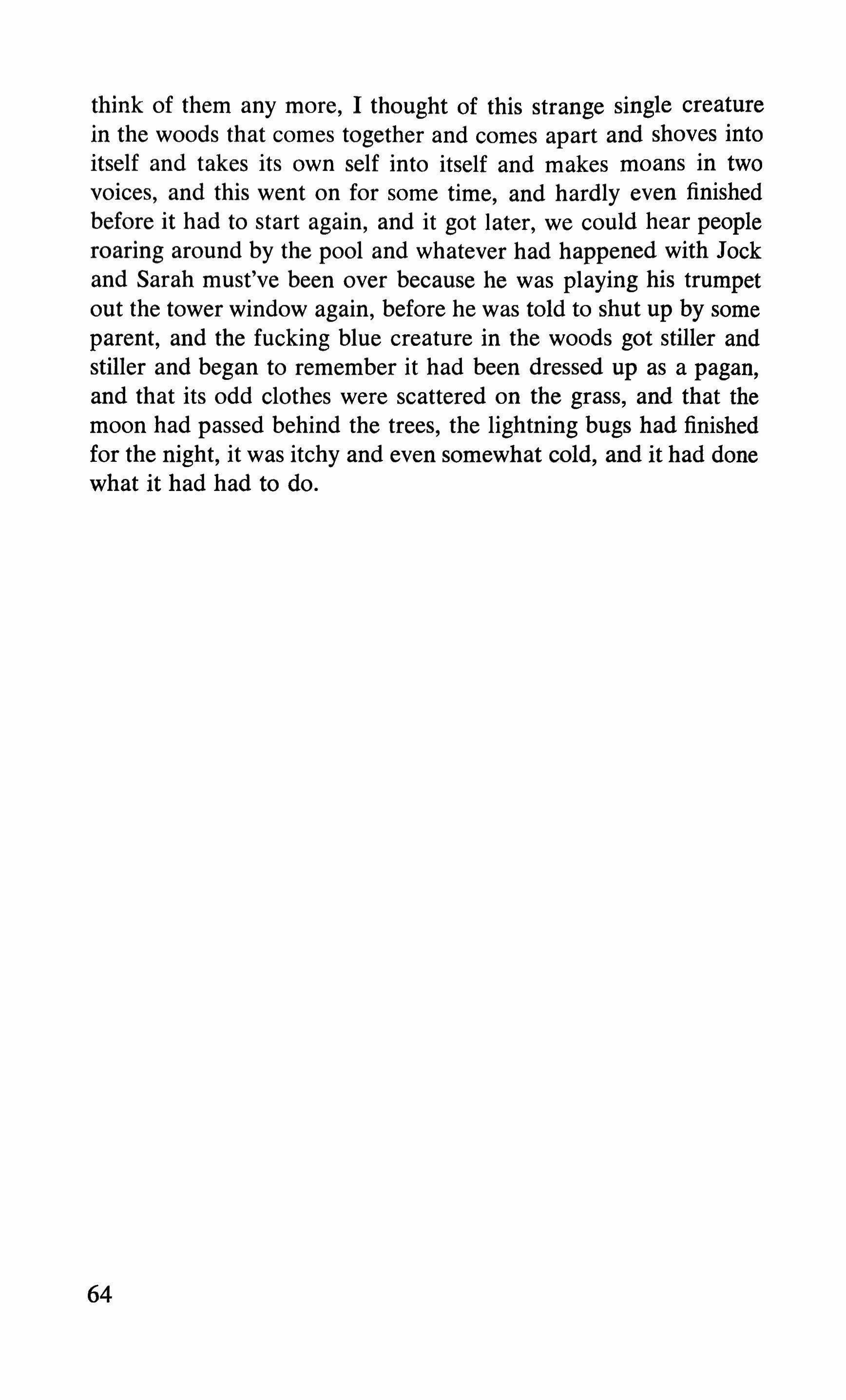
think of them any more, I thought of this strange single creature in the woods that comes together and comes apart and shoves into itself and takes its own self into itself and makes moans in two voices, and this went on for some time, and hardly even finished before it had to start again, and it got later, we could hear people roaring around by the pool and whatever had happened with Jock and Sarah must've been over because he was playing his trumpet out the tower window again, before he was told to shut up by some parent, and the fucking blue creature in the woods got stiller and stiller and began to remember it had been dressed up as a pagan, and that its odd clothes were scattered on the grass, and that the moon had passed behind the trees, the lightning bugs had finished for the night, it was itchy and even somewhat cold, and it had done what it had had to do.
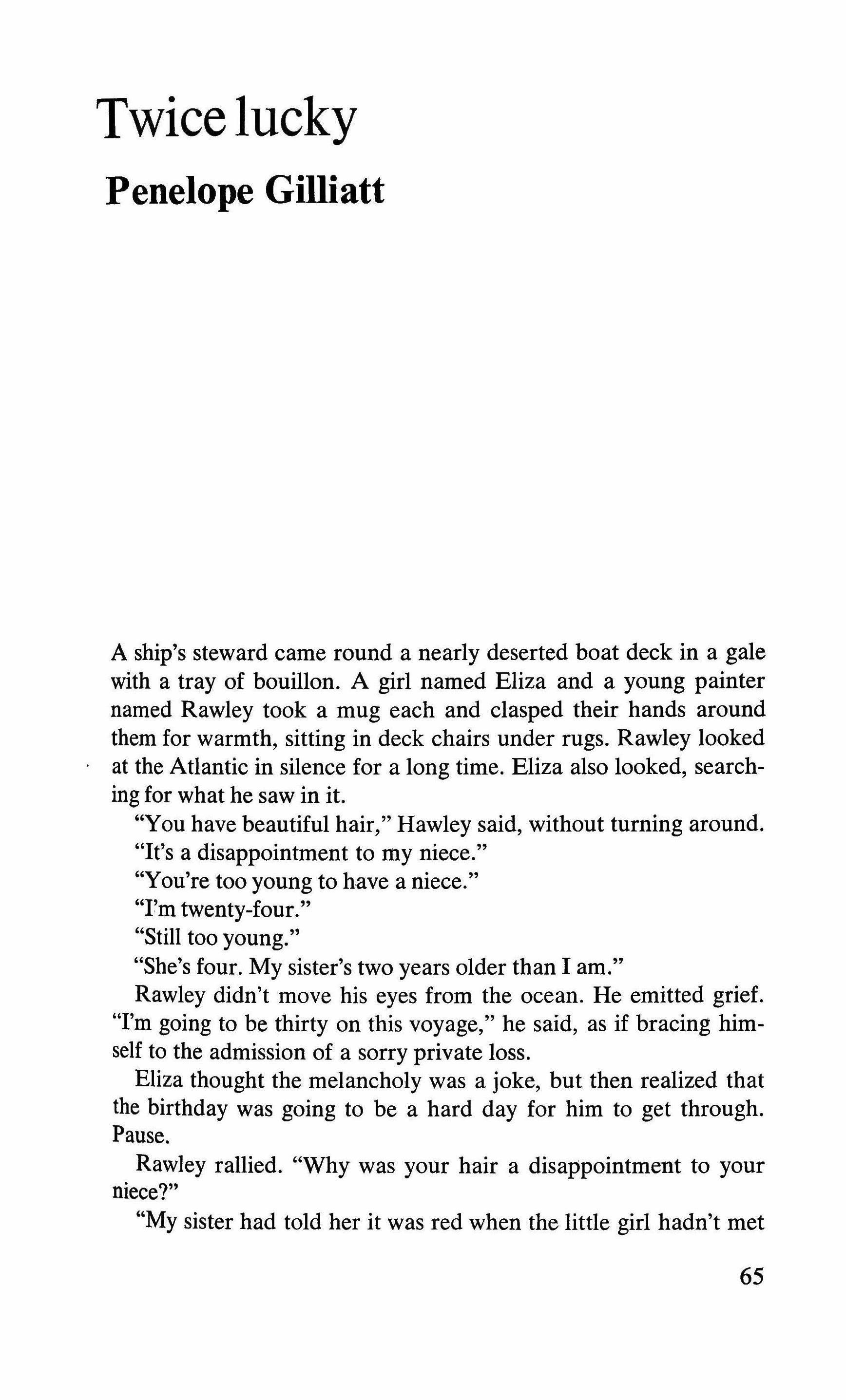
A ship's steward came round a nearly deserted boat deck in a gale with a tray of bouillon. A girl named Eliza and a young painter named Rawley took a mug each and clasped their hands around them for warmth, sitting in deck chairs under rugs. Rawley looked at the Atlantic in silence for a long time. Eliza also looked, searching for what he saw in it.
"You have beautiful hair," Hawley said, without turning around.
"It's a disappointment to my niece."
"You're too young to have a niece."
"I'm twenty-four."
"Still too young."
"She's four. My sister's two years older than I am."
Rawley didn't move his eyes from the ocean. He emitted grief. "I'm going to be thirty on this voyage," he said, as if bracing himself to the admission of a sorry private loss.
Eliza thought the melancholy was a joke, but then realized that the birthday was going to be a hard day for him to get through. Pause.
Rawley rallied. "Why was your hair a disappointment to your niece?"
"My sister had told her it was red when the little girl hadn't met
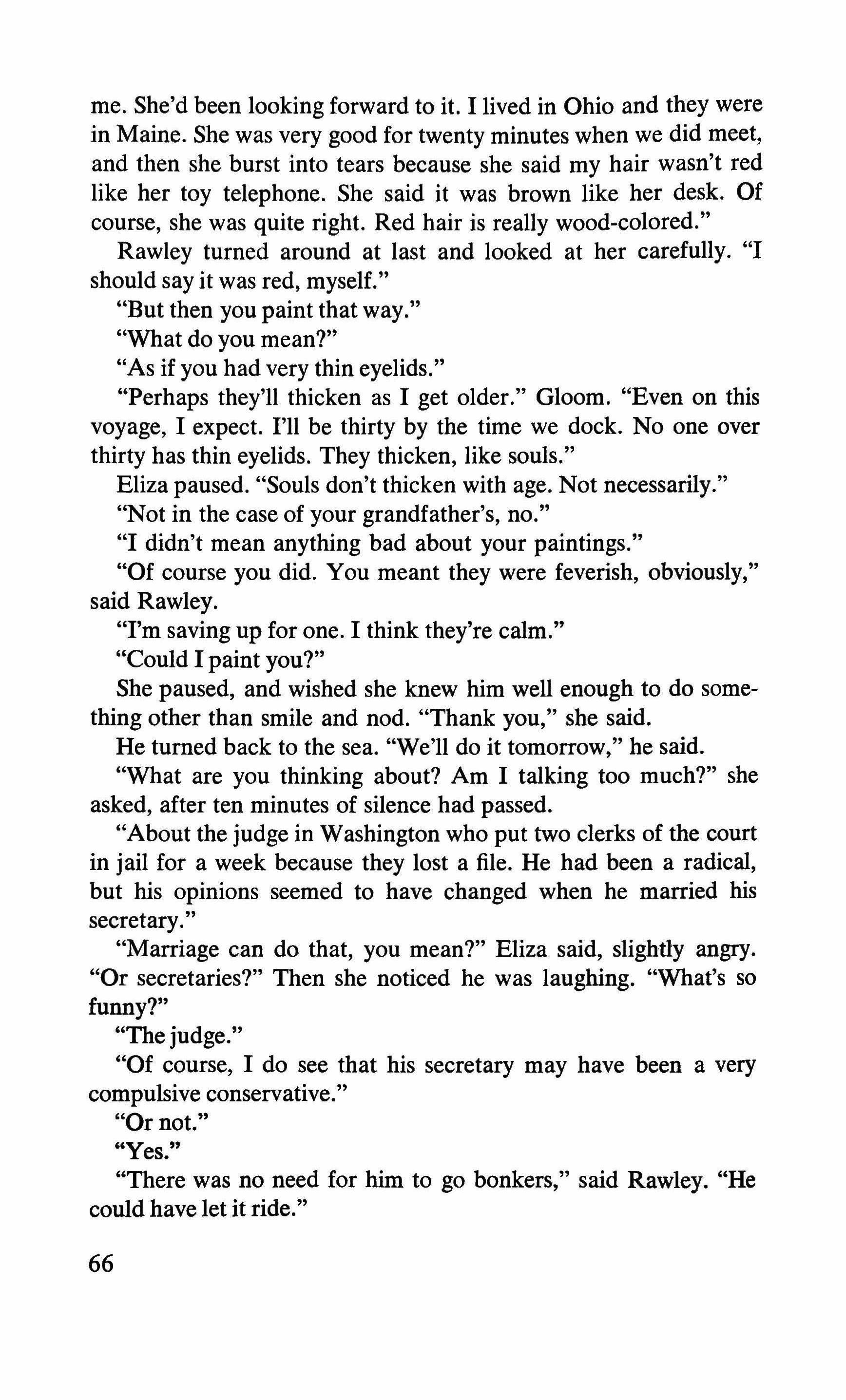
me. She'd been looking forward to it. 1 lived in Ohio and they were in Maine. She was very good for twenty minutes when we did meet, and then she burst into tears because she said my hair wasn't red like her toy telephone. She said it was brown like her desk. Of course, she was quite right. Red hair is really wood-colored."
Rawley turned around at last and looked at her carefully. "1 should say it was red, myself."
"But then you paint that way."
"What do you mean?"
"As if you had very thin eyelids."
"Perhaps they'll thicken as 1 get older." Gloom. "Even on this voyage, 1 expect. I'll be thirty by the time we dock. No one over thirty has thin eyelids. They thicken, like souls."
Eliza paused. "Souls don't thicken with age. Not necessarily."
"Not in the case of your grandfather's, no."
"I didn't mean anything bad about your paintings."
"Of course you did. You meant they were feverish, obviously," said Rawley.
"I'm saving up for one. 1 think they're calm."
"Could 1 paint you?"
She paused, and wished she knew him well enough to do something other than smile and nod. "Thank you," she said.
He turned back to the sea. "We'll do it tomorrow," he said.
"What are you thinking about? Am 1 talking too much?" she asked, after ten minutes of silence had passed.
"About the judge in Washington who put two clerks of the court in jail for a week because they lost a file. He had been a radical, but his opinions seemed to have changed when he married his secretary. "
"Marriage can do that, you mean?" Eliza said, slightly angry. "Or secretaries?" Then she noticed he was laughing. "What's so funny?"
"The judge."
"Of course, 1 do see that his secretary may have been a very compulsive conservative."
"Or not."
"Yes."
"There was no need for him to go bonkers," said Rawley. "He could have let it ride."
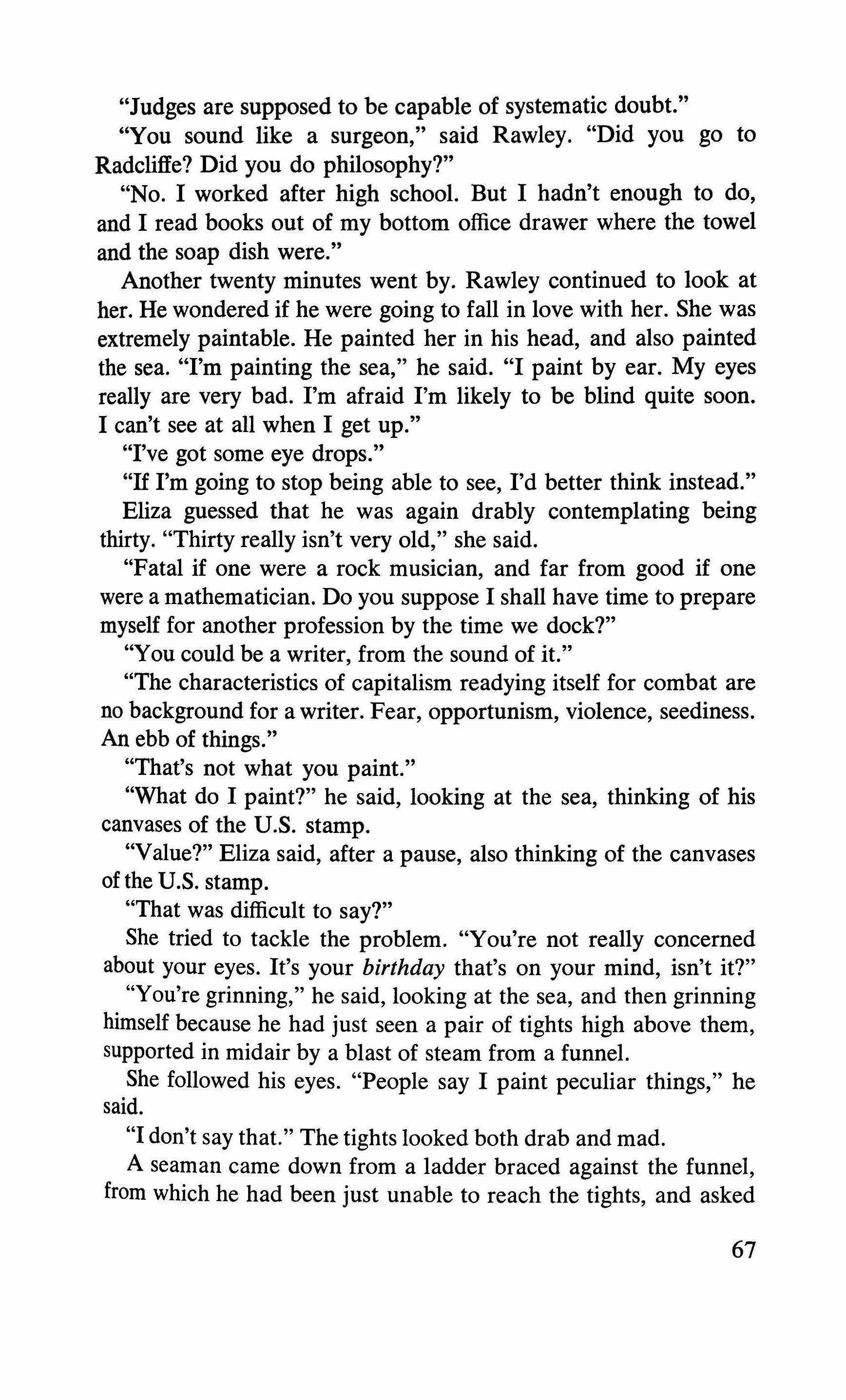
"Judges are supposed to be capable of systematic doubt."
"You sound like a surgeon," said Rawley. "Did you go to Radcliffe? Did you do philosophy?"
"No. I worked after high school. But I hadn't enough to do, and I read books out of my bottom office drawer where the towel and the soap dish were."
Another twenty minutes went by. Rawley continued to look at her. He wondered if he were going to fall in love with her. She was extremely paintable. He painted her in his head, and also painted the sea. "I'm painting the sea," he said. "I paint by ear. My eyes really are very bad. I'm afraid I'm likely to be blind quite soon. I can't see at all when I get up."
"I've got some eye drops."
"If I'm going to stop being able to see, I'd better think instead."
Eliza guessed that he was again drably contemplating being thirty. "Thirty really isn't very old," she said.
"Fatal if one were a rock musician, and far from good if one were a mathematician. Do you suppose I shall have time to prepare myself for another profession by the time we dock?"
"You could be a writer, from the sound of it."
"The characteristics of capitalism readying itself for combat are no background for a writer. Fear, opportunism, violence, seediness. An ebb of things."
"That's not what you paint."
"What do I paint?" he said, looking at the sea, thinking of his canvases of the U.S. stamp.
"Value?" Eliza said, after a pause, also thinking of the canvases of the U.S. stamp.
"That was difficult to say?"
She tried to tackle the problem. "You're not really concerned about your eyes. It's your birthday that's on your mind, isn't it?"
"You're grinning," he said, looking at the sea, and then grinning himself because he had just seen a pair of tights high above them, supported in midair by a blast of steam from a funnel.
She followed his eyes. "People say I paint peculiar things," he said.
"I don't say that." The tights looked both drab and mad.
A seaman came down from a ladder braced against the funnel, from which he had been just unable to reach the tights, and asked
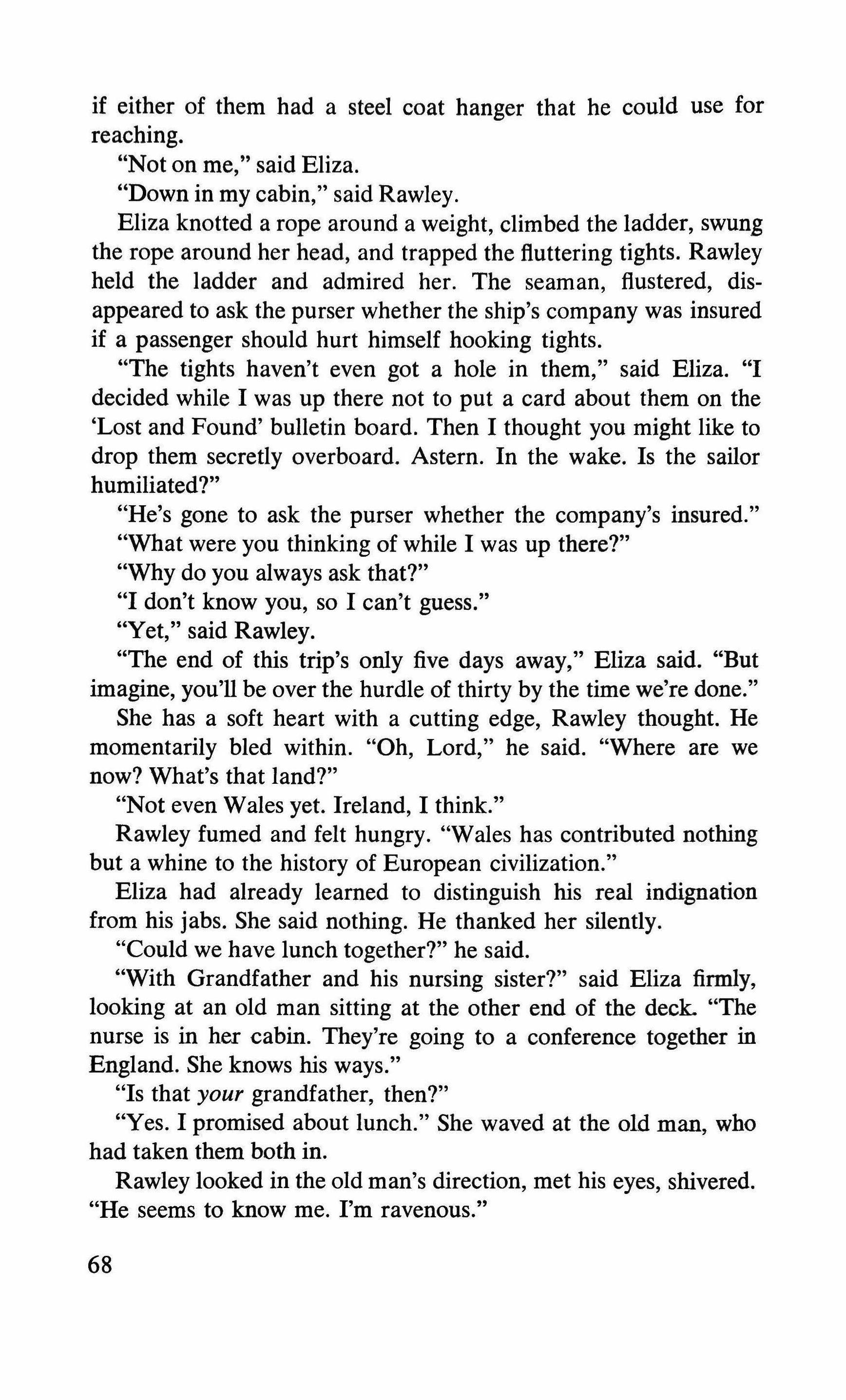
if either of them had a steel coat hanger that he could use for reaching.
"Not on me," said Eliza.
"Down in my cabin," said Rawley.
Eliza knotted a rope around a weight, climbed the ladder, swung the rope around her head, and trapped the fluttering tights. Rawley held the ladder and admired her. The seaman, flustered, disappeared to ask the purser whether the ship's company was insured if a passenger should hurt himself hooking tights.
"The tights haven't even got a hole in them," said Eliza. "I decided while I was up there not to put a card about them on the 'Lost and Found' bulletin board. Then I thought you might like to drop them secretly overboard. Astern. In the wake. Is the sailor humiliated?"
"He's gone to ask the purser whether the company's insured."
"What were you thinking of while I was up there?"
"Why do you always ask that?"
"I don't know you, so I can't guess."
"Yet," said Rawley.
"The end of this trip's only five days away," Eliza said. "But imagine, you'll be over the hurdle of thirty by the time we're done."
She has a soft heart with a cutting edge, Rawley thought. He momentarily bled within. "Oh, Lord," he said. "Where are we now? What's that land?"
"Not even Wales yet. Ireland, I think."
Rawley fumed and felt hungry. "Wales has contributed nothing but a whine to the history of European civilization."
Eliza had already learned to distinguish his real indignation from his jabs. She said nothing. He thanked her silently.
"Could we have lunch together?" he said.
"With Grandfather and his nursing sister?" said Eliza firmly, looking at an old man sitting at the other end of the deck. "The nurse is in her cabin. They're going to a conference together in England. She knows his ways."
"Is that your grandfather, then?"
"Yes. I promised about lunch." She waved at the old man, who had taken them both in.
Rawley looked in the old man's direction, met his eyes, shivered. "He seems to know me. I'm ravenous."
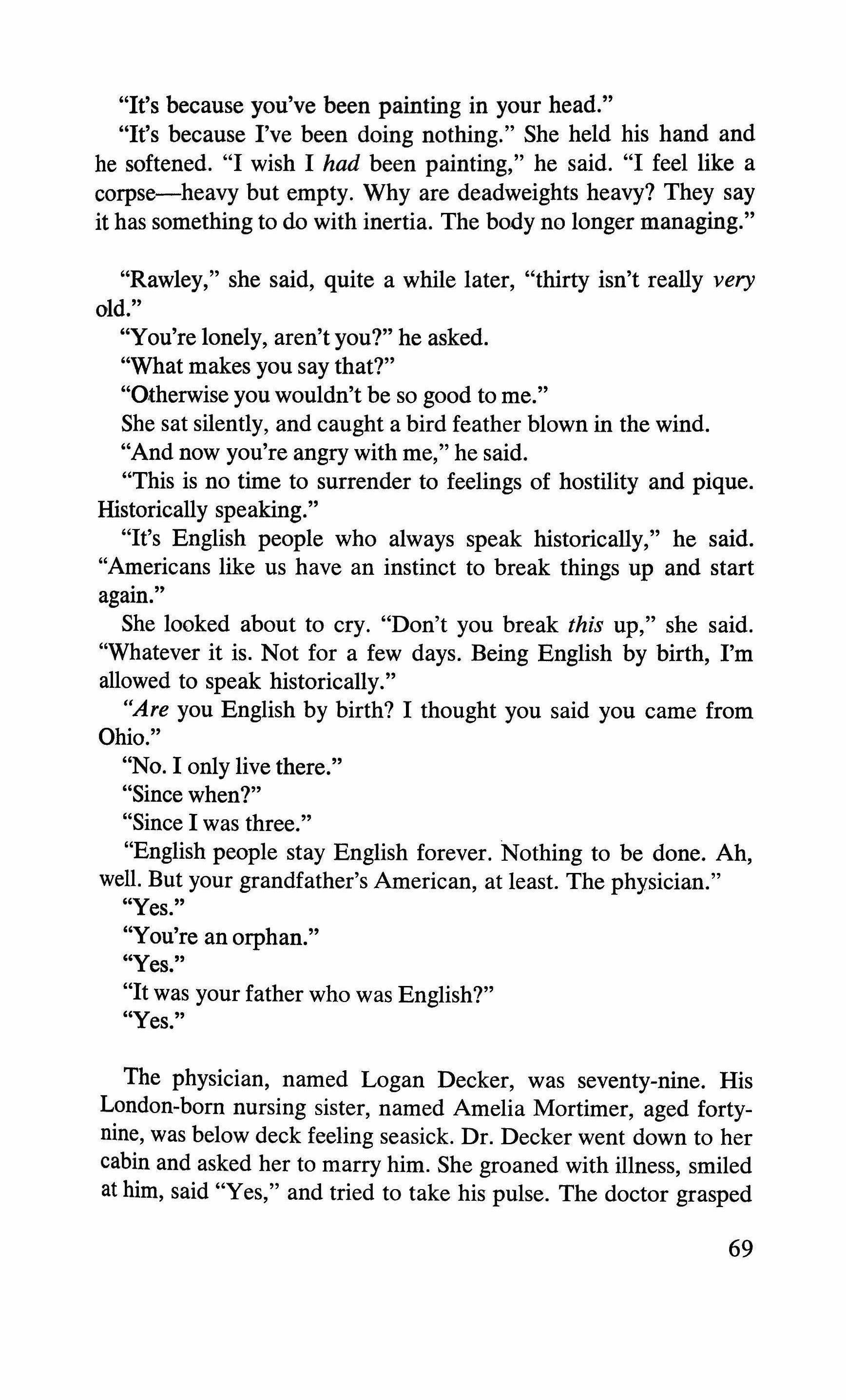
"It's because you've been painting in your head."
"It's because I've been doing nothing." She held his hand and he softened. "I wish I had been painting," he said. "I feel like a corpse-heavy but empty. Why are deadweights heavy? They say it has something to do with inertia. The body no longer managing."
"Rawley," she said, quite a while later, "thirty isn't really very old."
"You're lonely, aren't you?" he asked.
"What makes you say that?"
"Otherwise you wouldn't be so good to me."
She sat silently, and caught a bird feather blown in the wind.
"And now you're angry with me," he said.
"This is no time to surrender to feelings of hostility and pique.
Historically speaking."
"It's English people who always speak historically," he said. "Americans like us have an instinct to break things up and start again."
She looked about to cry. "Don't you break this up," she said. "Whatever it is. Not for a few days. Being English by birth, I'm allowed to speak historically."
"Are you English by birth? I thought you said you came from Ohio."
"No. I only live there."
"Since when?"
"Since I was three."
"English people stay English forever. Nothing to be done. Ah, well. But your grandfather's American, at least. The physician." "Yes."
"You're an orphan."
"Yes."
"It was your father who was English?" "Yes."
The physician, named Logan Decker, was seventy-nine. His London-born nursing sister, named Amelia Mortimer, aged fortynine, was below deck feeling seasick. Dr. Decker went down to her cabin and asked her to marry him. She groaned with illness, smiled at him, said "Yes," and tried to take his pulse. The doctor grasped
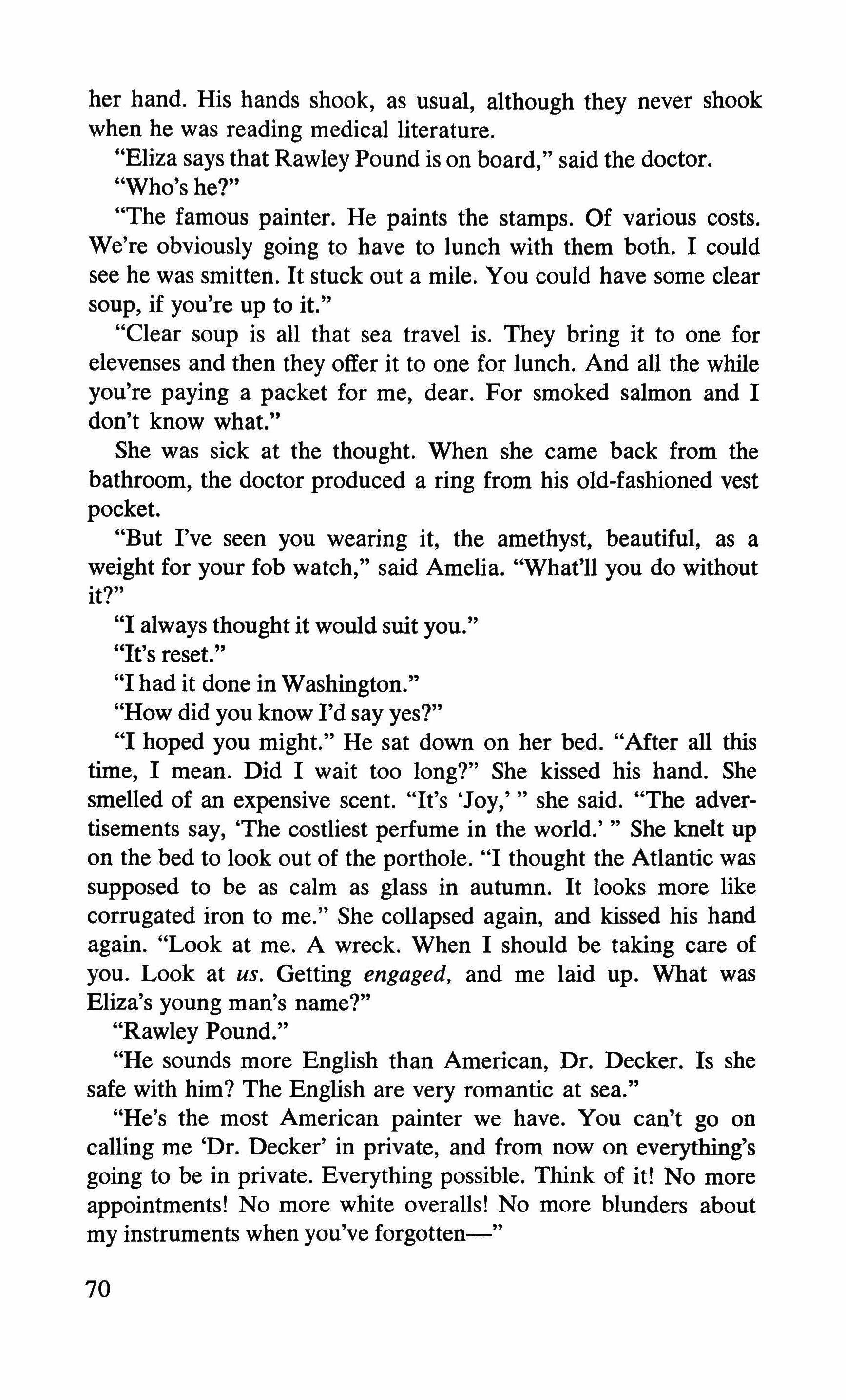
her hand. His hands shook, as usual, although they never shook when he was reading medical literature.
"Eliza says that Rawley Pound is on board," said the doctor. "Who's he?"
"The famous painter. He paints the stamps. Of various costs. We're obviously going to have to lunch with them both. I could see he was smitten. It stuck out a mile. You could have some clear soup, if you're up to it."
"Clear soup is all that sea travel is. They bring it to one for elevenses and then they offer it to one for lunch. And all the while you're paying a packet for me, dear. For smoked salmon and I don't know what."
She was sick at the thought. When she came back from the bathroom, the doctor produced a ring from his old-fashioned vest pocket.
"But I've seen you wearing it, the amethyst, beautiful, as a weight for your fob watch," said Amelia. "What'll you do without it?"
"I always thought it would suit you."
"It's reset."
"I had it done in Washington."
"How did you know I'd say yes?"
"I hoped you might." He sat down on her bed. "After all this time, I mean. Did I wait too long?" She kissed his hand. She smelled of an expensive scent. "It's 'Joy,' she said. "The advertisements say, 'The costliest perfume in the world.' " She knelt up on the bed to look out of the porthole. "I thought the Atlantic was supposed to be as calm as glass in autumn. It looks more like corrugated iron to me." She collapsed again, and kissed his hand again. "Look at me. A wreck. When I should be taking care of you. Look at us. Getting engaged, and me laid up. What was Eliza's young man's name?"
"Rawley Pound."
"He sounds more English than American, Dr. Decker. Is she safe with him? The English are very romantic at sea."
"He's the most American painter we have. You can't go on calling me 'Dr. Decker' in private, and from now on everything's going to be in private. Everything possible. Think of it! No more appointments! No more white overalls! No more blunders about my instruments when you've forgotten-"
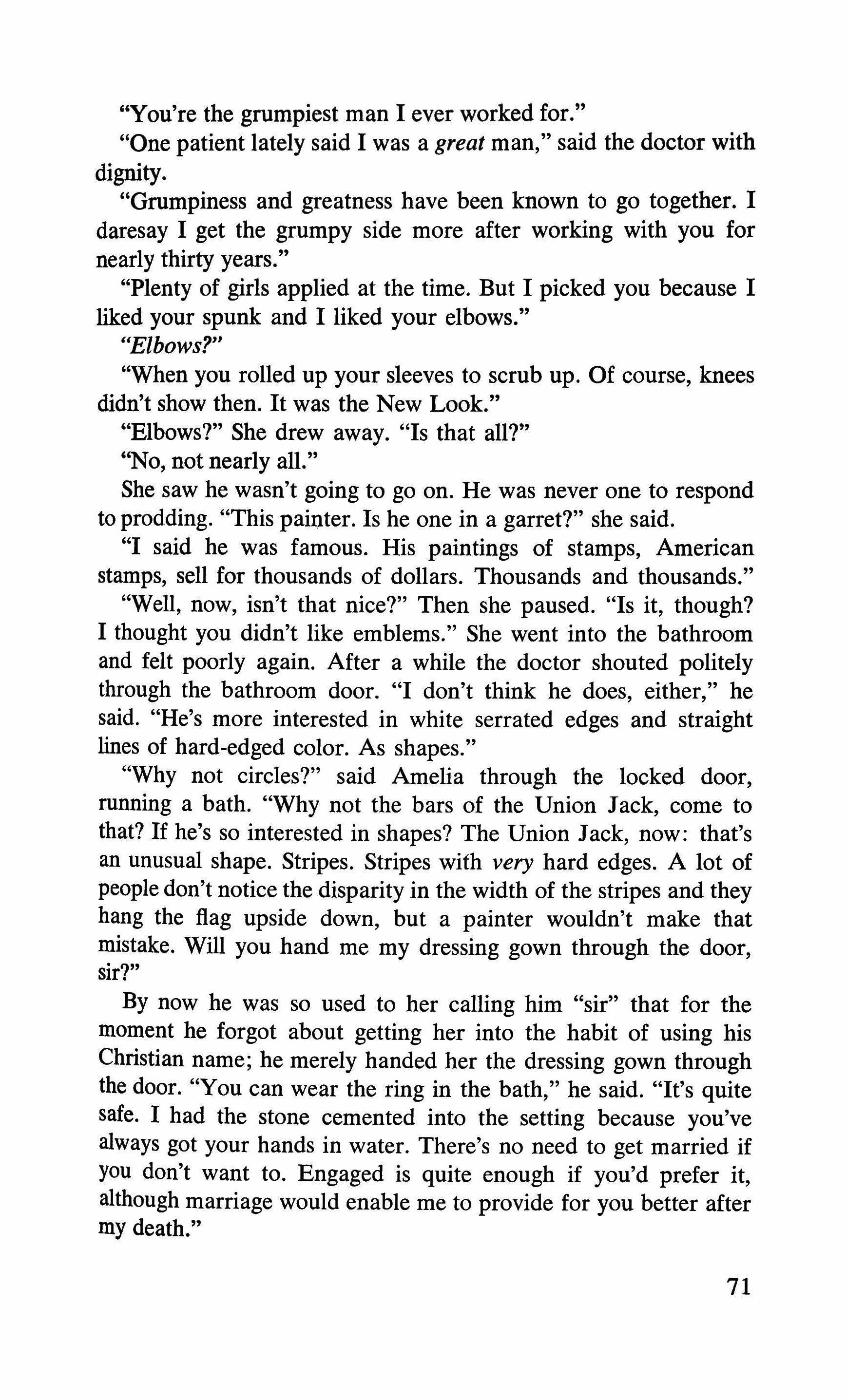
"You're the grumpiest man I ever worked for."
"One patient lately said I was a great man," said the doctor with dignity.
"Grumpiness and greatness have been known to go together. I daresay I get the grumpy side more after working with you for nearly thirty years."
"Plenty of girls applied at the time. But I picked you because I liked your spunk and I liked your elbows."
"Elbows?"
"When you rolled up your sleeves to scrub up. Of course, knees didn't show then. It was the New Look."
"Elbows?" She drew away. "Is that all?"
"No, not nearly all."
She saw he wasn't going to go on. He was never one to respond to prodding. "This painter. Is he one in a garret?" she said.
"I said he was famous. His paintings of stamps, American stamps, sell for thousands of dollars. Thousands and thousands."
"Well, now, isn't that nice?" Then she paused. "Is it, though? I thought you didn't like emblems." She went into the bathroom and felt poorly again. After a while the doctor shouted politely through the bathroom door. "I don't think he does, either," he said. "He's more interested in white serrated edges and straight lines of hard-edged color. As shapes."
"Why not circles?" said Amelia through the locked door, running a bath. "Why not the bars of the Union Jack, come to that? If he's so interested in shapes? The Union Jack, now: that's an unusual shape. Stripes. Stripes with very hard edges. A lot of people don't notice the disparity in the width of the stripes and they hang the flag upside down, but a painter wouldn't make that mistake. Will you hand me my dressing gown through the door, sir?"
By now he was so used to her calling him "sir" that for the moment he forgot about getting her into the habit of using his Christian name; he merely handed her the dressing gown through the door. "You can wear the ring in the bath," he said. "It's quite safe. I had the stone cemented into the setting because you've always got your hands in water. There's no need to get married if you don't want to. Engaged is quite enough if you'd prefer it, although marriage would enable me to provide for you better after my death."
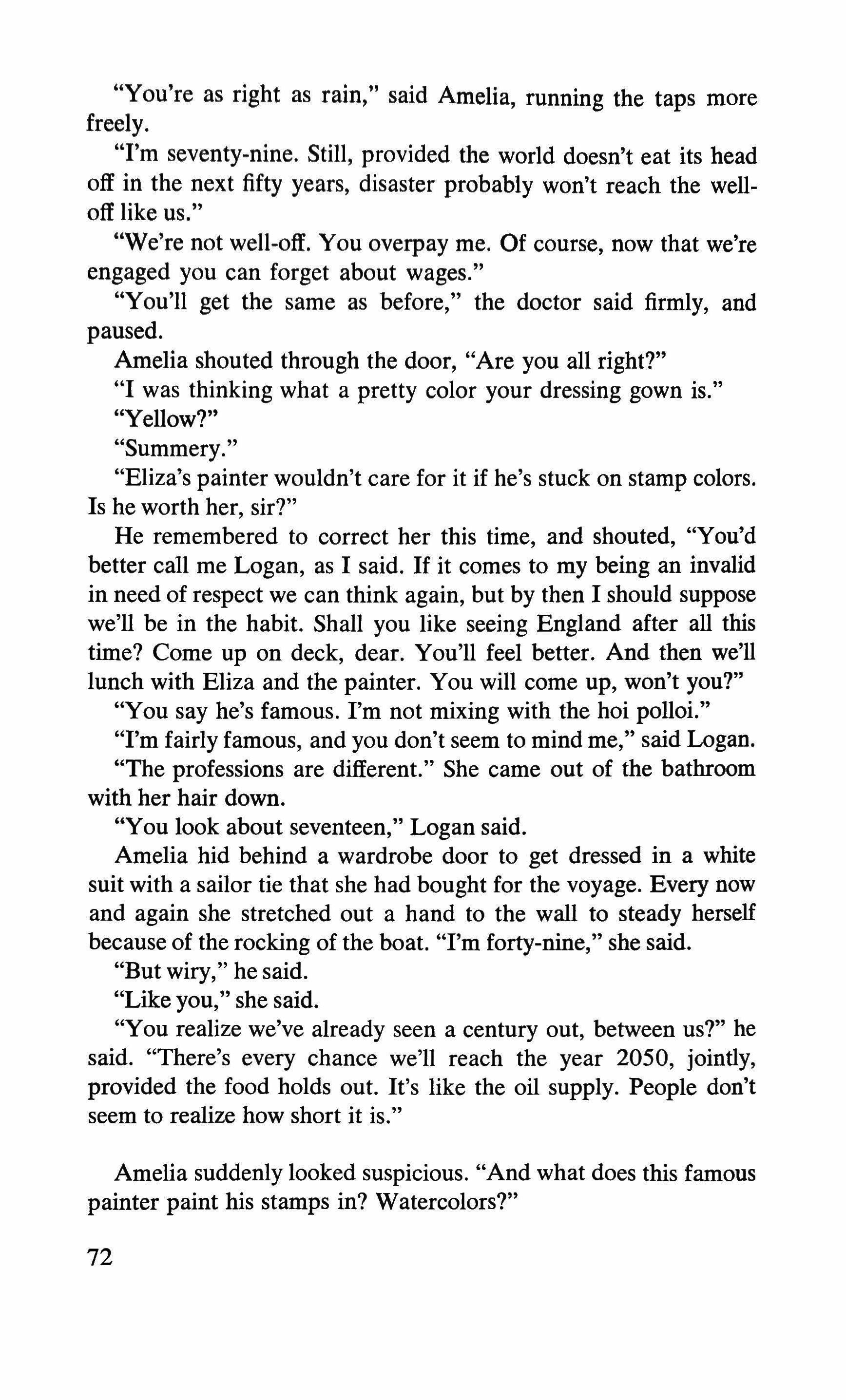
"You're as right as rain," said Amelia, running the taps more freely.
"I'm seventy-nine. Still, provided the world doesn't eat its head off in the next fifty years, disaster probably won't reach the welloff like us."
"We're not well-off. You overpay me. Of course, now that we're engaged you can forget about wages."
"You'll get the same as before," the doctor said firmly, and paused.
Amelia shouted through the door, "Are you all right?"
"I was thinking what a pretty color your dressing gown is." "Yellow?"
"Eliza's painter wouldn't care for it if he's stuck on stamp colors. Is he worth her, sir?"
He remembered to correct her this time, and shouted, "You'd better call me Logan, as I said. If it comes to my being an invalid in need of respect we can think again, but by then I should suppose we'll be in the habit. Shall you like seeing England after all this time? Come up on deck, dear. You'll feel better. And then we'll lunch with Eliza and the painter. You will come up, won't you?"
"You say he's famous. I'm not mixing with the hoi polloi."
"I'm fairly famous, and you don't seem to mind me," said Logan.
"The professions are different." She came out of the bathroom with her hair down.
"You look about seventeen," Logan said.
Amelia hid behind a wardrobe door to get dressed in a white suit with a sailor tie that she had bought for the voyage. Every now and again she stretched out a hand to the wall to steady herself because of the rocking of the boat. "I'm forty-nine," she said.
"But wiry," he said.
"Like you," she said.
"You realize we've already seen a century out, between us?" he said. "There's every chance we'll reach the year 2050, jointly, provided the food holds out. It's like the oil supply. People don't seem to realize how short it is."
Amelia suddenly looked suspicious. "And what does this famous painter paint his stamps in? Watercolors?"
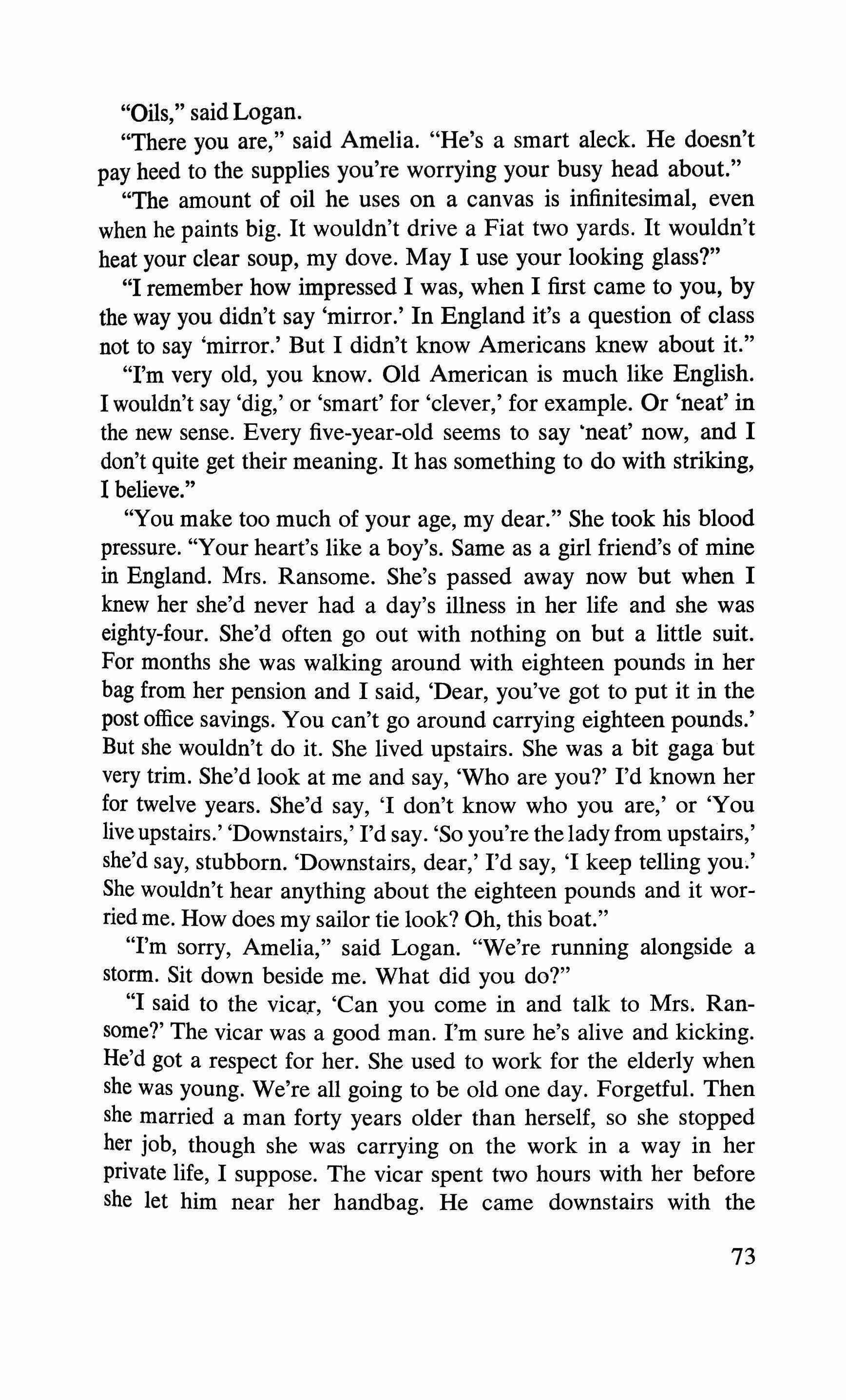
"Oils," said Logan.
"There you are," said Amelia. "He's a smart aleck. He doesn't pay heed to the supplies you're worrying your busy head about."
"The amount of oil he uses on a canvas is infinitesimal, even when he paints big. It wouldn't drive a Fiat two yards. It wouldn't heat your clear soup, my dove. May I use your looking glass?"
"I remember how impressed I was, when I first came to you, by the way you didn't say 'mirror.' In England it's a question of class not to say 'mirror.' But I didn't know Americans knew about it."
"I'm very old, you know. Old American is much like English. I wouldn't say 'dig,' or 'smart' for 'clever,' for example. Or 'neat' in the new sense. Every five-year-old seems to say 'neat' now, and I don't quite get their meaning. It has something to do with striking, I believe."
"You make too much of your age, my dear." She took his blood pressure. "Your heart's like a boy's. Same as a girl friend's of mine in England. Mrs. Ransome. She's passed away now but when I knew her she'd never had a day's illness in her life and she was eighty-four. She'd often go out with nothing on but a little suit. For months she was walking around with eighteen pounds in her bag from her pension and I said, 'Dear, you've got to put it in the post office savings. You can't go around carrying eighteen pounds.' But she wouldn't do it. She lived upstairs. She was a bit gaga but very trim. She'd look at me and say, 'Who are you?' I'd known her for twelve years. She'd say, 'I don't know who you are,' or 'You live upstairs.' 'Downstairs,' I'd say. 'So you're the lady from upstairs,' she'd say, stubborn. 'Downstairs, dear,' I'd say, 'I keep telling you.' She wouldn't hear anything about the eighteen pounds and it worried me. How does my sailor tie look? Oh, this boat."
"I'm sorry, Amelia," said Logan. "We're running alongside a storm. Sit down beside me. What did you do?"
"I said to the vicar, 'Can you come in and talk to Mrs. Ransome?' The vicar was a good man. I'm sure he's alive and kicking. He'd got a respect for her. She used to work for the elderly when she was young. We're all going to be old one day. Forgetful. Then she married a man forty years older than herself, so she stopped her job, though she was carrying on the work in a way in her private life, 1 suppose. The vicar spent two hours with her before she let him near her handbag. He came downstairs with the
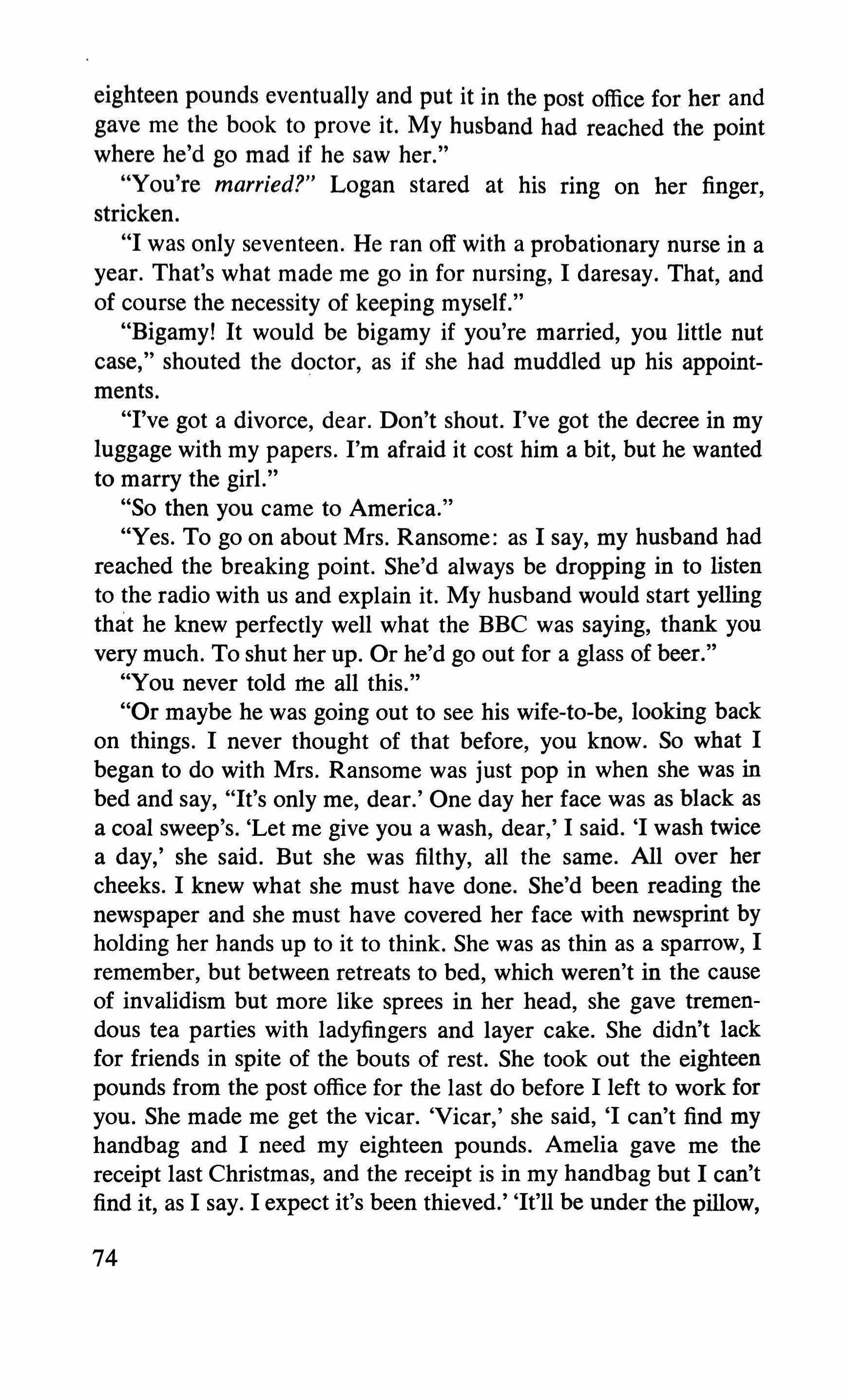
eighteen pounds eventually and put it in the post office for her and gave me the book to prove it. My husband had reached the point where he'd go mad if he saw her."
"You're married?" Logan stared at his ring on her finger, stricken.
"I was only seventeen. He ran off with a probationary nurse in a year. That's what made me go in for nursing, 1 daresay. That, and of course the necessity of keeping myself."
"Bigamy! It would be bigamy if you're married, you little nut case," shouted the doctor, as if she had muddled up his appointments.
"I've got a divorce, dear. Don't shout. I've got the decree in my luggage with my papers. I'm afraid it cost him a bit, but he wanted to marry the girl."
"So then you came to America."
"Yes. To go on about Mrs. Ransome: as I say, my husband had reached the breaking point. She'd always be dropping in to listen to the radio with us and explain it. My husband would start yelling that he knew perfectly well what the BBC was saying, thank you very much. To shut her up. Or he'd go out for a glass of beer."
"You never told me all this."
"Or maybe he was going out to see his wife-to-be, looking back on things. 1 never thought of that before, you know. So what 1 began to do with Mrs. Ransome was just pop in when she was in bed and say, "It's only me, dear.' One day her face was as black as a coal sweep's. 'Let me give you a wash, dear,' 1 said. 'I wash twice a day,' she said. But she was filthy, all the same. All over her cheeks. 1 knew what she must have done. She'd been reading the newspaper and she must have covered her face with newsprint by holding her hands up to it to think. She was as thin as a sparrow, I remember, but between retreats to bed, which weren't in the cause of invalidism but more like sprees in her head, she gave tremendous tea parties with ladyfingers and layer cake. She didn't lack for friends in spite of the bouts of rest. She took out the eighteen pounds from the post office for the last do before 1 left to work for you. She made me get the vicar. 'Vicar,' she said, 'I can't find my handbag and 1 need my eighteen pounds. Amelia gave me the receipt last Christmas, and the receipt is in my handbag but 1 can't find it, as I say. 1 expect it's been thieved.' 'It'll be under the pillow,
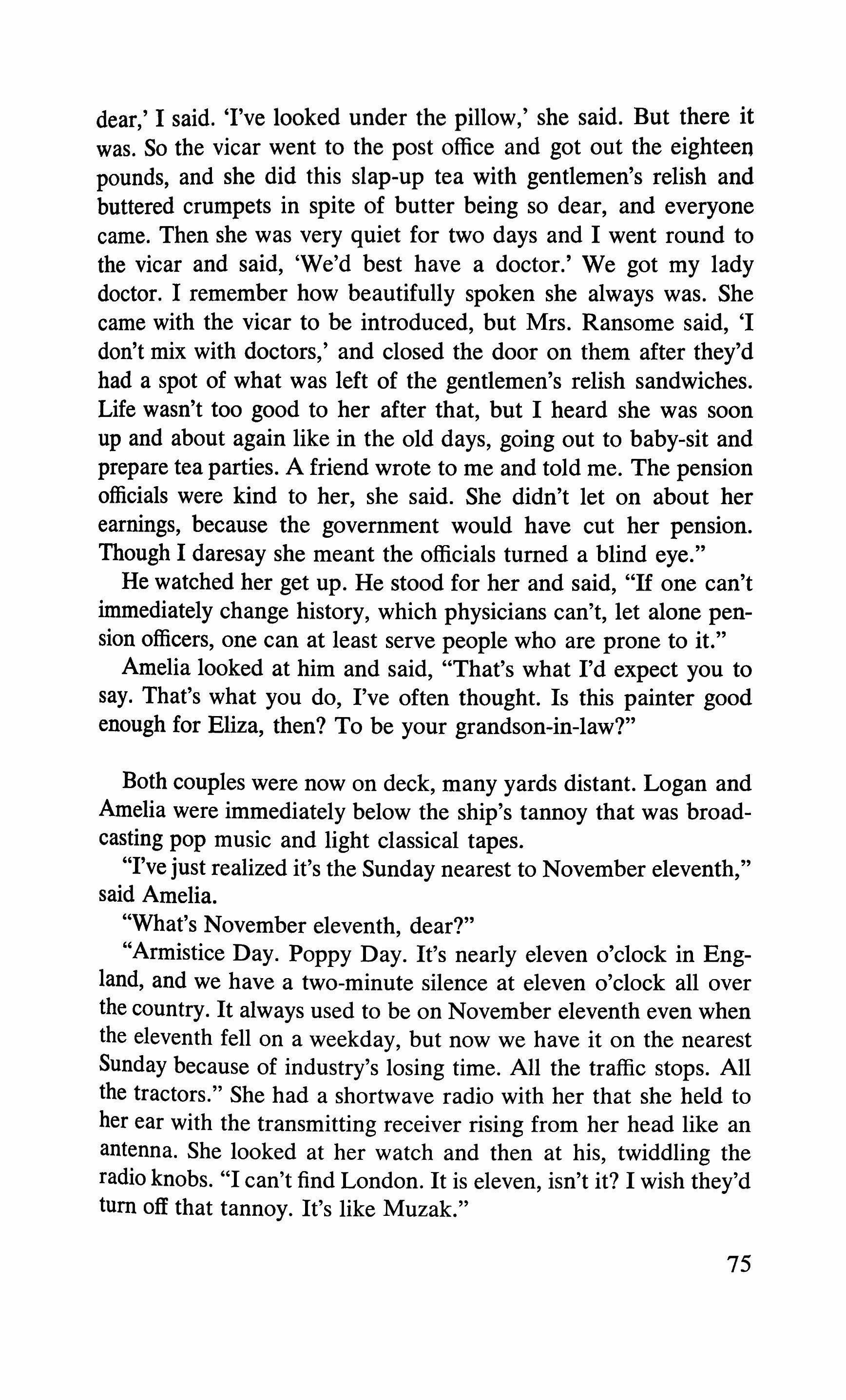
dear,' I said. 'I've looked under the pillow,' she said. But there it was. So the vicar went to the post office and got out the eighteen pounds, and she did this slap-up tea with gentlemen's relish and buttered crumpets in spite of butter being so dear, and everyone came. Then she was very quiet for two days and I went round to the vicar and said, 'We'd best have a doctor.' We got my lady doctor. I remember how beautifully spoken she always was. She came with the vicar to be introduced, but Mrs. Ransome said, 'I don't mix with doctors,' and closed the door on them after they'd had a spot of what was left of the gentlemen's relish sandwiches. Life wasn't too good to her after that, but I heard she was soon up and about again like in the old days, going out to baby-sit and prepare tea parties. A friend wrote to me and told me. The pension officials were kind to her, she said. She didn't let on about her earnings, because the government would have cut her pension. Though I daresay she meant the officials turned a blind eye."
He watched her get up. He stood for her and said, "If one can't immediately change history, which physicians can't, let alone pension officers, one can at least serve people who are prone to it."
Amelia looked at him and said, "That's what I'd expect you to say. That's what you do, I've often thought. Is this painter good enough for Eliza, then? To be your grandson-in-law?"
Both couples were now on deck, many yards distant. Logan and Amelia were immediately below the ship's tannoy that was broadcasting pop music and light classical tapes.
"I've just realized it's the Sunday nearest to November eleventh," said Amelia.
"What's November eleventh, dear?"
"Armistice Day. Poppy Day. It's nearly eleven o'clock in England, and we have a two-minute silence at eleven o'clock all over the country. It always used to be on November eleventh even when the eleventh fell on a weekday, but now we have it on the nearest Sunday because of industry's losing time. All the traffic stops. All the tractors." She had a shortwave radio with her that she held to her ear with the transmitting receiver rising from her head like an antenna. She looked at her watch and then at his, twiddling the radio knobs. "I can't find London. It is eleven, isn't it? I wish they'd tum off that tannoy. It's like Muzak."
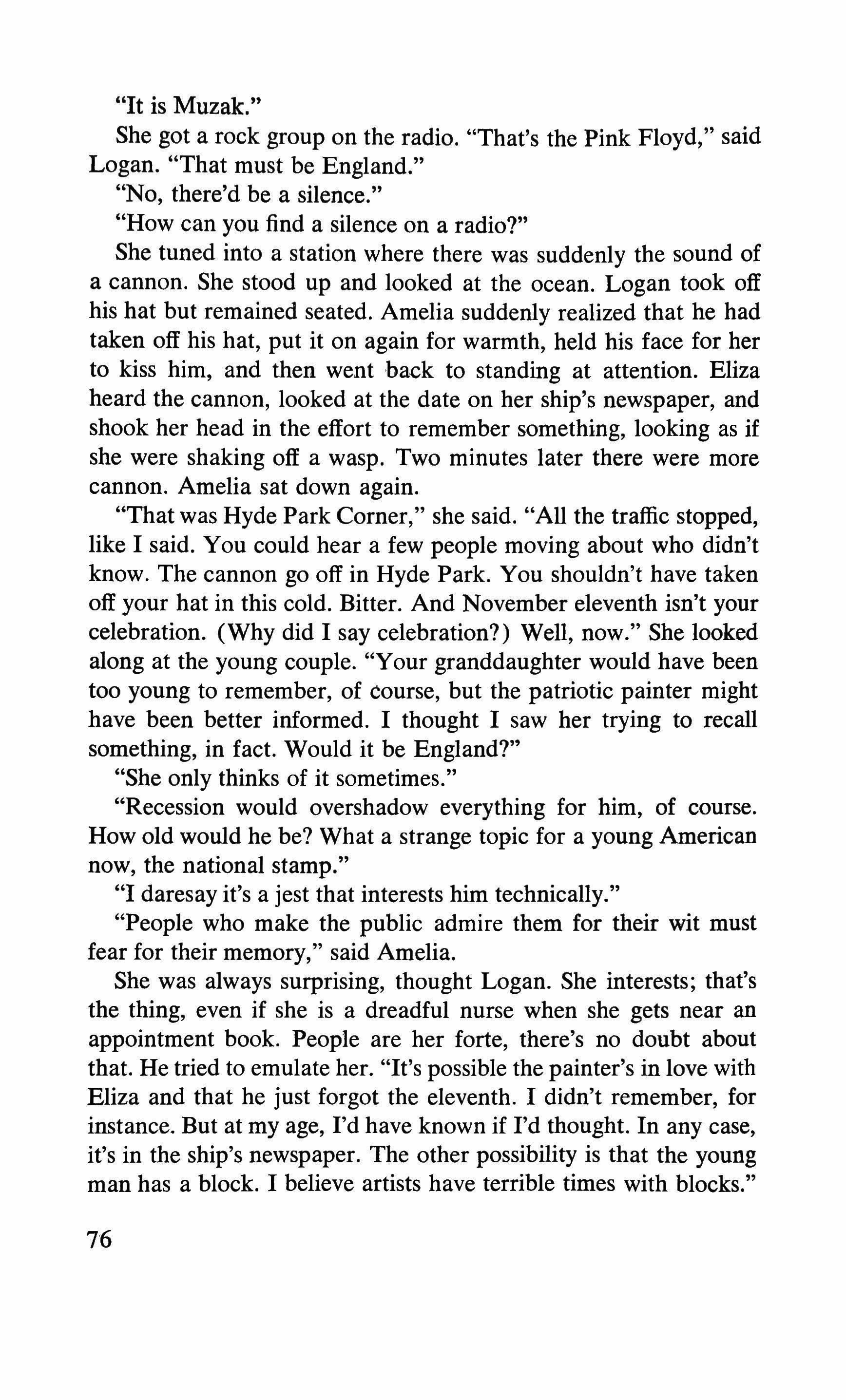
"It is Muzak."
She got a rock group on the radio. "That's the Pink Floyd," said Logan. "That must be England."
"No, there'd be a silence."
"How can you find a silence on a radio?"
She tuned into a station where there was suddenly the sound of a cannon. She stood up and looked at the ocean. Logan took off his hat but remained seated. Amelia suddenly realized that he had taken off his hat, put it on again for warmth, held his face for her to kiss him, and then went back to standing at attention. Eliza heard the cannon, looked at the date on her ship's newspaper, and shook her head in the effort to remember something, looking as if she were shaking off a wasp. Two minutes later there were more cannon. Amelia sat down again.
"That was Hyde Park Corner," she said. "All the traffic stopped, like I said. You could hear a few people moving about who didn't know. The cannon go off in Hyde Park. You shouldn't have taken off your hat in this cold. Bitter. And November eleventh isn't your celebration. (Why did I say celebration?) Well, now." She looked along at the young couple. "Your granddaughter would have been too young to remember, of course, but the patriotic painter might have been better informed. I thought I saw her trying to recall something, in fact. Would it be England?"
"She only thinks of it sometimes."
"Recession would overshadow everything for him, of course. How old would he be? What a strange topic for a young American now, the national stamp."
"I daresay it's a jest that interests him technically."
"People who make the public admire them for their wit must fear for their memory," said Amelia.
She was always surprising, thought Logan. She interests; that's the thing, even if she is a dreadful nurse when she gets near an appointment book. People are her forte, there's no doubt about that. He tried to emulate her. "It's possible the painter's in love with Eliza and that he just forgot the eleventh. I didn't remember, for instance. But at my age, I'd have known if I'd thought. In any case, it's in the ship's newspaper. The other possibility is that the young man has a block. I believe artists have terrible times with blocks."
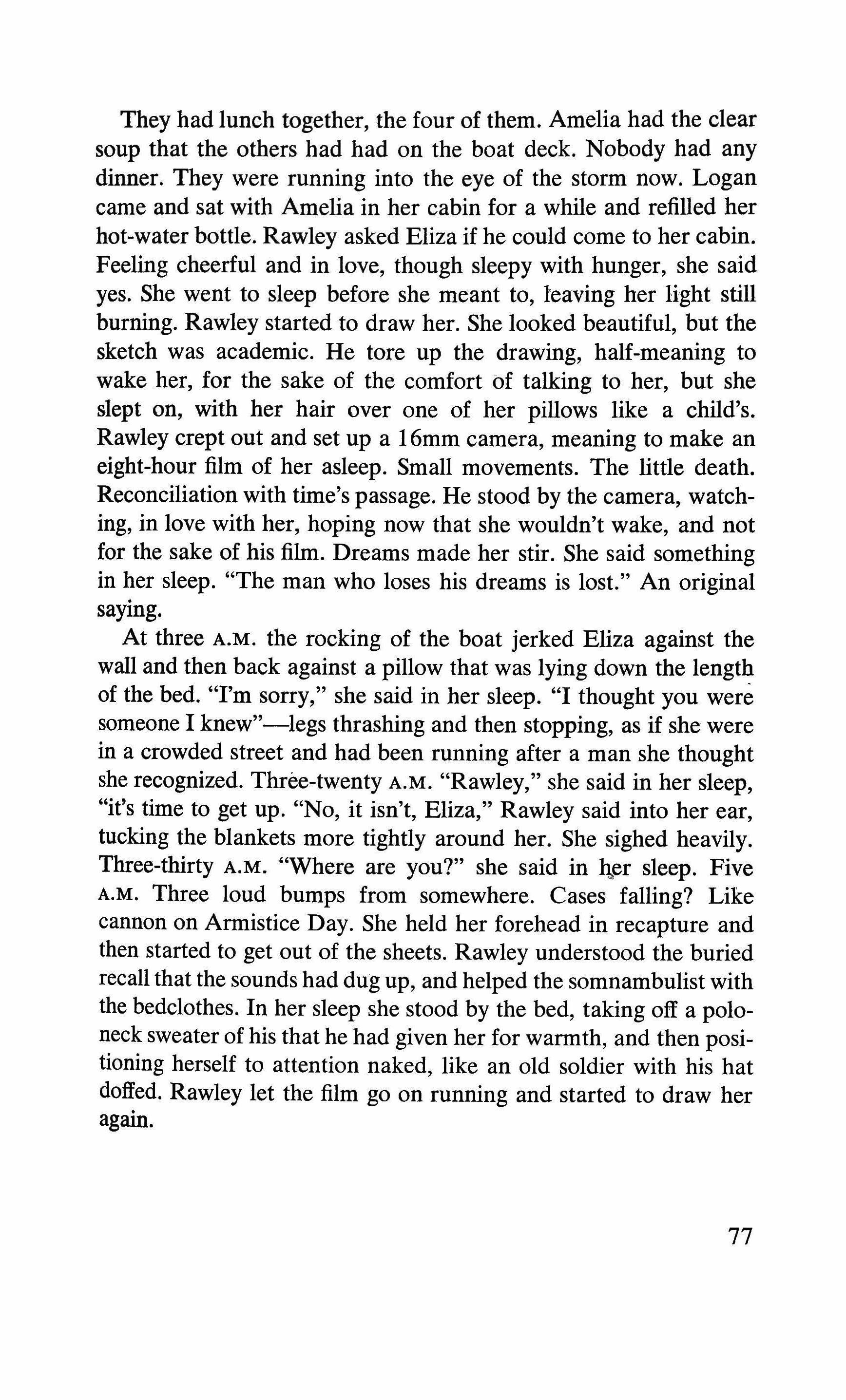
They had lunch together, the four of them. Amelia had the clear soup that the others had had on the boat deck. Nobody had any dinner. They were running into the eye of the storm now. Logan came and sat with Amelia in her cabin for a while and refilled her hot-water bottle. Rawley asked Eliza if he could come to her cabin. Feeling cheerful and in love, though sleepy with hunger, she said yes. She went to sleep before she meant to, leaving her light still burning. Rawley started to draw her. She looked beautiful, but the sketch was academic. He tore up the drawing, half-meaning to wake her, for the sake of the comfort of talking to her, but she slept on, with her hair over one of her pillows like a child's. Rawley crept out and set up a 16mm camera, meaning to make an eight-hour film of her asleep. Small movements. The little death. Reconciliation with time's passage. He stood by the camera, watching, in love with her, hoping now that she wouldn't wake, and not for the sake of his film. Dreams made her stir. She said something in her sleep. "The man who loses his dreams is lost." An original saying.
At three A.M. the rocking of the boat jerked Eliza against the wall and then back against a pillow that was lying down the lengt� of the bed. "I'm sorry," she said in her sleep. "I thought you were someone I knew"-legs thrashing and then stopping, as if she were in a crowded street and had been running after a man she thought she recognized. Three-twenty A.M. "Rawley," she said in her sleep, "it's time to get up. "No, it isn't, Eliza," Rawley said into her ear, tucking the blankets more tightly around her. She sighed heavily. Three-thirty A.M. "Where are you?" she said in It.,er sleep. Five A.M. Three loud bumps from somewhere. Cases falling? Like cannon on Armistice Day. She held her forehead in recapture and then started to get out of the sheets. Rawley understood the buried recall that the sounds had dug up, and helped the somnambulist with the bedclothes. In her sleep she stood by the bed, taking off a poloneck sweater of his that he had given her for warmth, and then positioning herself to attention naked, like an old soldier with his hat doffed. Rawley let the film go on running and started to draw her again.
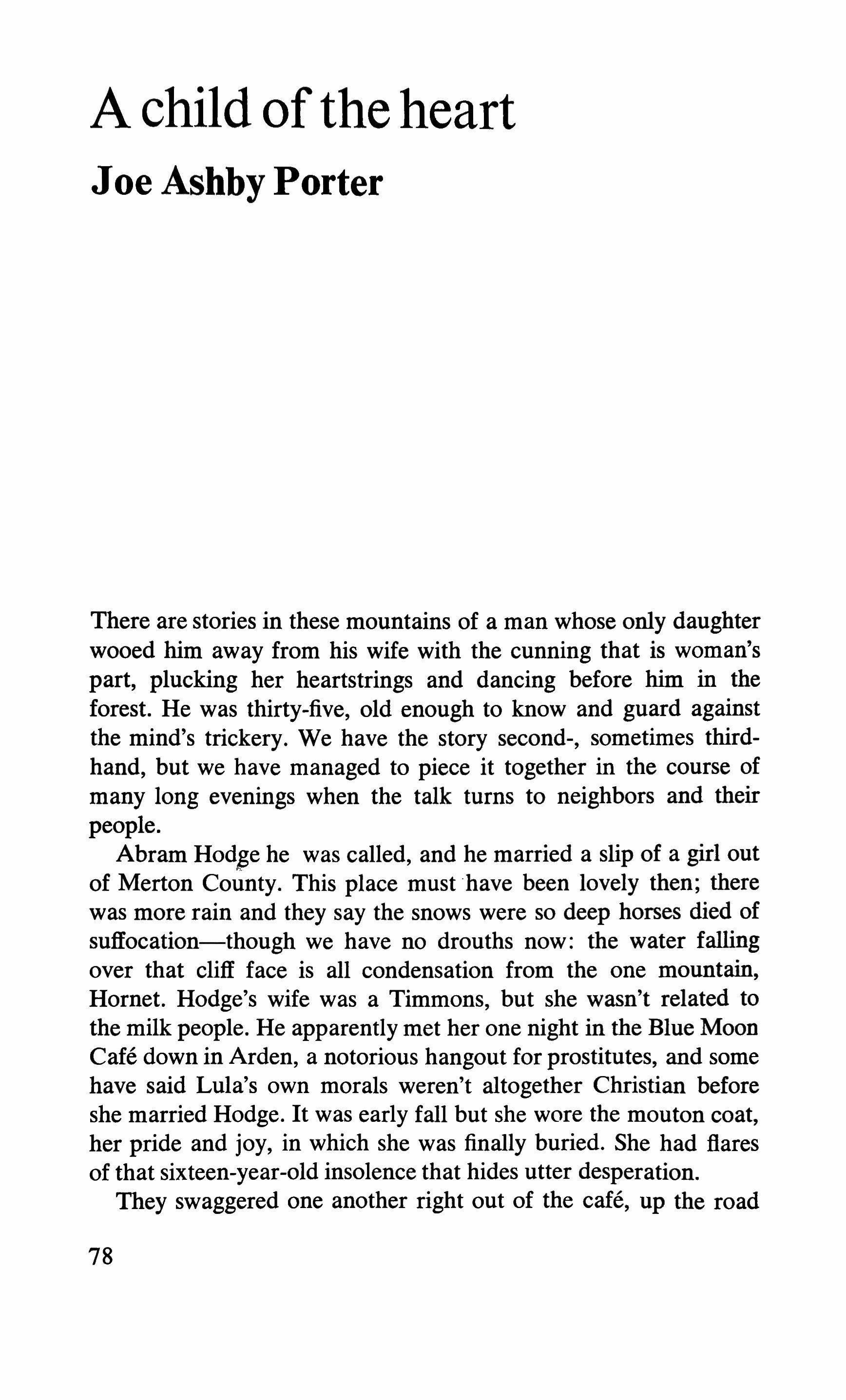
There are stories in these mountains of a man whose only daughter wooed him away from his wife with the cunning that is woman's part, plucking her heartstrings and dancing before him in the forest. He was thirty-five, old enough to know and guard against the mind's trickery. We have the story second-, sometimes thirdhand, but we have managed to piece it together in the course of many long evenings when the talk turns to neighbors and their people.
Abram Hodge he was called, and he married a slip of a girl out of Merton County. This place must have been lovely then; there was more rain and they say the snows were so deep horses died of suffocation-though we have no drouths now: the water falling over that cliff face is all condensation from the one mountain, Hornet. Hodge's wife was a Timmons, but she wasn't related to the milk people. He apparently met her one night in the Blue Moon Cafe down in Arden, a notorious hangout for prostitutes, and some have said Lula's own morals weren't altogether Christian before she married Hodge. It was early fall but she wore the mouton coat, her pride and joy, in which she was finally buried. She had flares of that sixteen-year-old insolence that hides utter desperation. They swaggered one another right out of the cafe, up the road
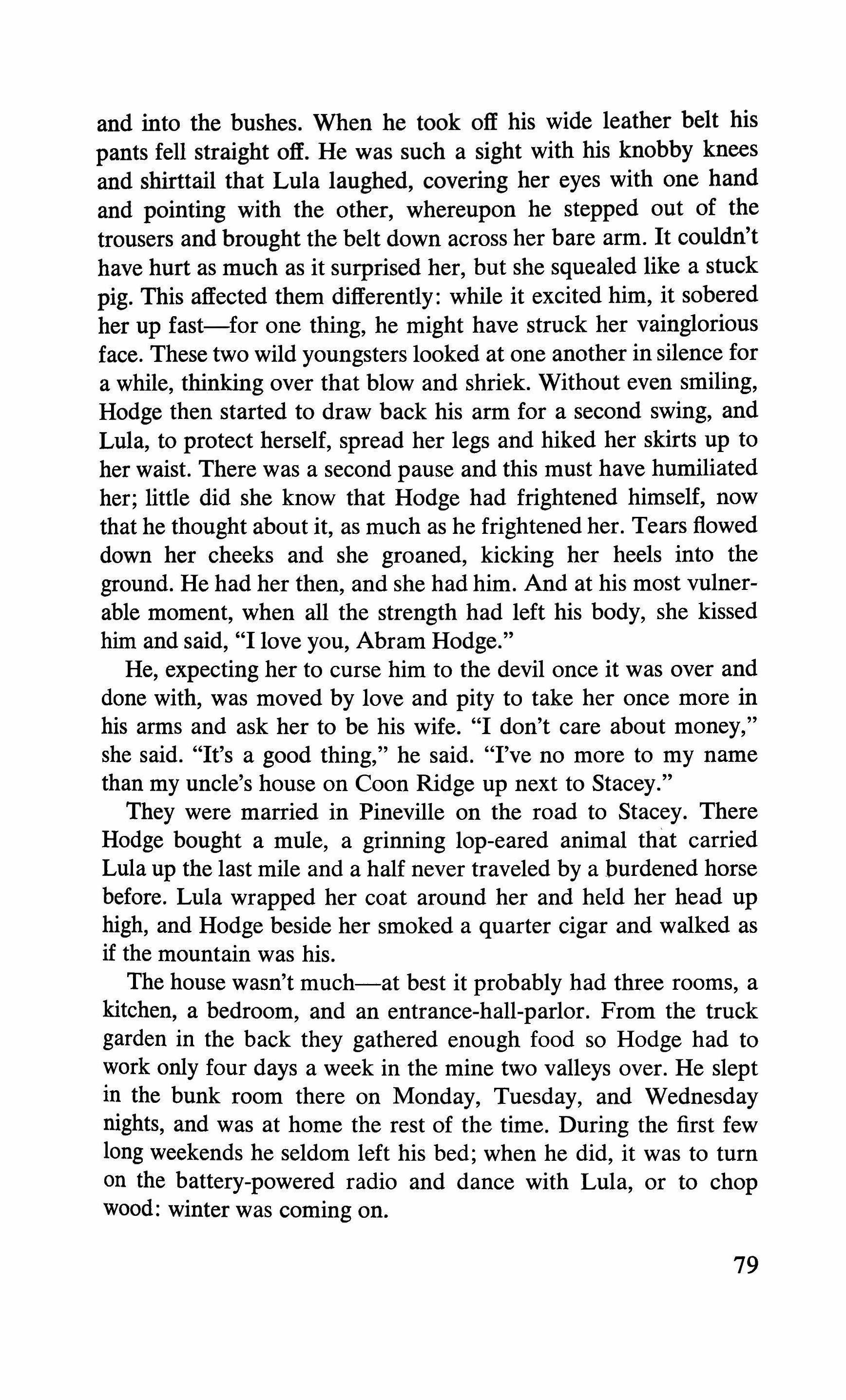
and into the bushes. When he took off his wide leather belt his pants fell straight off. He was such a sight with his knobby knees and shirttail that Lula laughed, covering her eyes with one hand and pointing with the other, whereupon he stepped out of the trousers and brought the belt down across her bare arm. It couldn't have hurt as much as it surprised her, but she squealed like a stuck pig. This affected them differently: while it excited him, it sobered her up fast-for one thing, he might have struck her vainglorious face. These two wild youngsters looked at one another in silence for a while, thinking over that blow and shriek. Without even smiling, Hodge then started to draw back his arm for a second swing, and Lula, to protect herself, spread her legs and hiked her skirts up to her waist. There was a second pause and this must have humiliated her; little did she know that Hodge had frightened himself, now that he thought about it, as much as he frightened her. Tears flowed down her cheeks and she groaned, kicking her heels into the ground. He had her then, and she had him. And at his most vulnerable moment, when all the strength had left his body, she kissed him and said, "I love you, Abram Hodge."
He, expecting her to curse him to the devil once it was over and done with, was moved by love and pity to take her once more in his arms and ask her to be his wife. "I don't care about money," she said. "It's a good thing," he said. "I've no more to my name than my uncle's house on Coon Ridge up next to Stacey."
They were married in Pineville on the road to Stacey. There Hodge bought a mule, a grinning lop-eared animal that carried Lula up the last mile and a half never traveled by a burdened horse before. Lula wrapped her coat around her and held her head up high, and Hodge beside her smoked a quarter cigar and walked as if the mountain was his.
The house wasn't much-at best it probably had three rooms, a kitchen, a bedroom, and an entrance-haIl-parlor. From the truck garden in the back they gathered enough food so Hodge had to work only four days a week in the mine two valleys over. He slept in the bunk room there on Monday, Tuesday, and Wednesday nights, and was at home the rest of the time. During the first few long weekends he seldom left his bed; when he did, it was to turn on the battery-powered radio and dance with Lula, or to chop wood: winter was coming on.
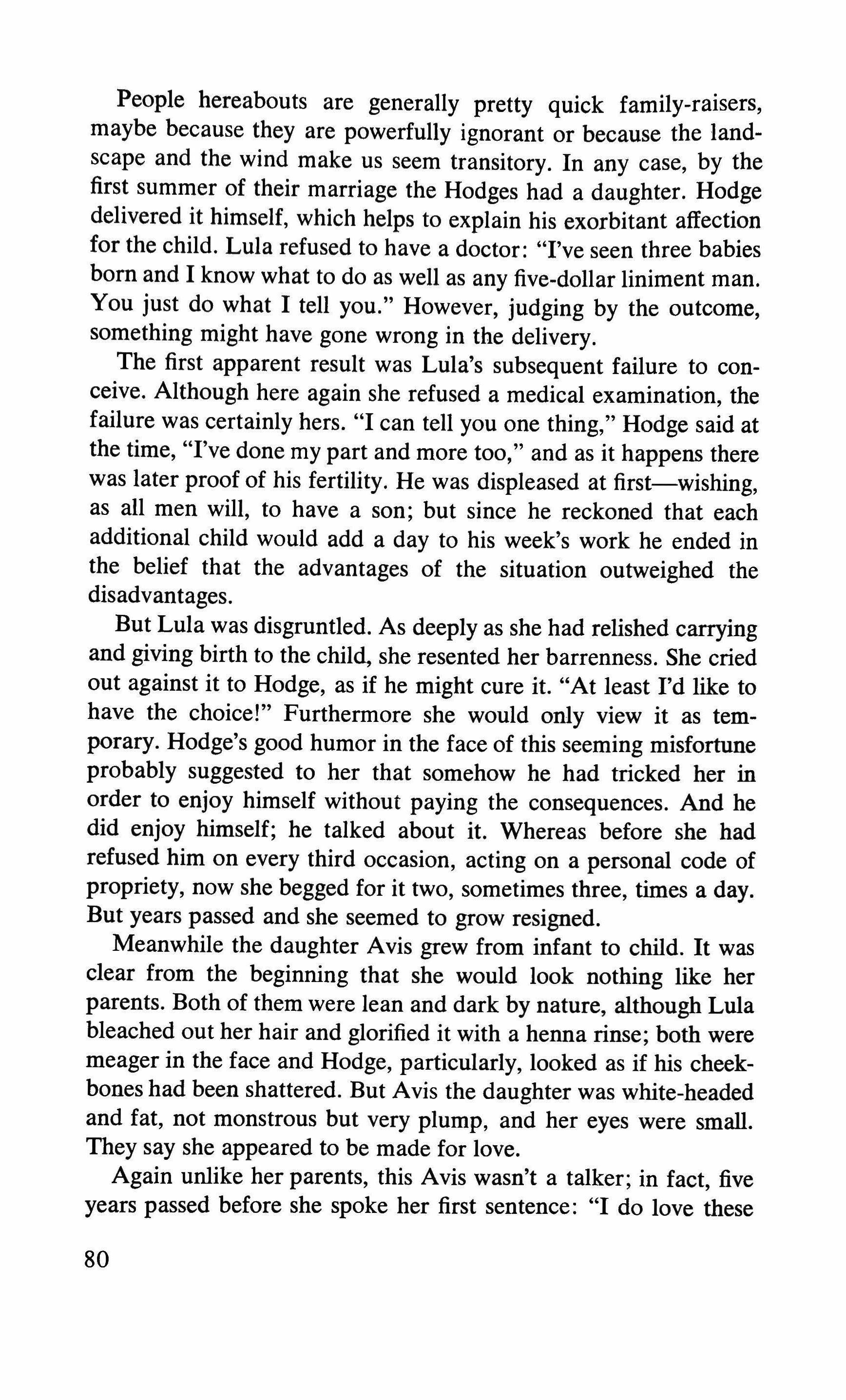
People hereabouts are generally pretty quick family-raisers, maybe because they are powerfully ignorant or because the landscape and the wind make us seem transitory. In any case, by the first summer of their marriage the Hodges had a daughter. Hodge delivered it himself, which helps to explain his exorbitant affection for the child. Lula refused to have a doctor: "I've seen three babies born and I know what to do as well as any five-dollar liniment man. You just do what I tell you." However, judging by the outcome, something might have gone wrong in the delivery.
The first apparent result was Lula's subsequent failure to conceive. Although here again she refused a medical examination, the failure was certainly hers. "I can tell you one thing," Hodge said at the time, "I've done my part and more too," and as it happens there was later proof of his fertility. He was displeased at first-wishing, as all men will, to have a son; but since he reckoned that each additional child would add a day to his week's work he ended in the belief that the advantages of the situation outweighed the disadvantages.
But Lula was disgruntled. As deeply as she had relished carrying and giving birth to the child, she resented her barrenness. She cried out against it to Hodge, as if he might cure it. "At least I'd like to have the choice!" Furthermore she would only view it as temporary. Hodge's good humor in the face of this seeming misfortune probably suggested to her that somehow he had tricked her in order to enjoy himself without paying the consequences. And he did enjoy himself; he talked about it. Whereas before she had refused him on every third occasion, acting on a personal code of propriety, now she begged for it two, sometimes three, times a day. But years passed and she seemed to grow resigned.
Meanwhile the daughter Avis grew from infant to child. It was clear from the beginning that she would look nothing like her parents. Both of them were lean and dark by nature, although Lilla bleached out her hair and glorified it with a henna rinse; both were meager in the face and Hodge, particularly, looked as if his cheekbones had been shattered. But Avis the daughter was white-headed and fat, not monstrous but very plump, and her eyes were small. They say she appeared to be made for love.
Again unlike her parents, this Avis wasn't a talker; in fact, five years passed before she spoke her first sentence: "I do love these
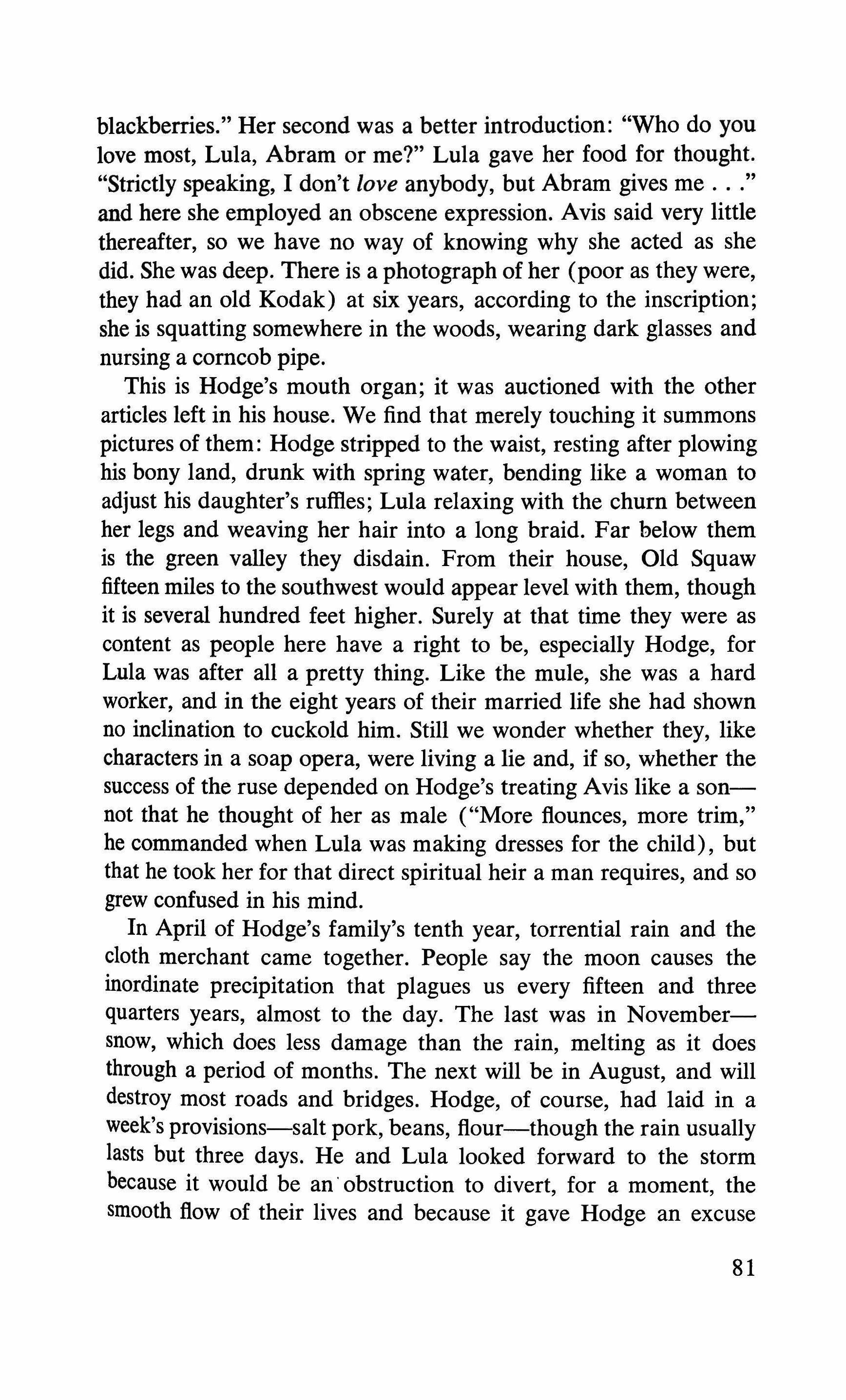
blackberries." Her second was a better introduction: "Who do you love most, Lula, Abram or me?" Lula gave her food for thought. "Strictly speaking, I don't love anybody, but Abram gives me " and here she employed an obscene expression. Avis said very little thereafter, so we have no way of knowing why she acted as she did. She was deep. There is a photograph of her (poor as they were, they had an old Kodak) at six years, according to the inscription; she is squatting somewhere in the woods, wearing dark glasses and nursing a corncob pipe.
This is Hodge's mouth organ; it was auctioned with the other articles left in his house. We find that merely touching it summons pictures of them: Hodge stripped to the waist, resting after plowing his bony land, drunk with spring water, bending like a woman to adjust his daughter's ruffles; Lula relaxing with the churn between her legs and weaving her hair into a long braid. Far below them is the green valley they disdain. From their house, Old Squaw fifteen miles to the southwest would appear level with them, though it is several hundred feet higher. Surely at that time they were as content as people here have a right to be, especially Hodge, for Lula was after all a pretty thing. Like the mule, she was a hard worker, and in the eight years of their married life she had shown no inclination to cuckold him. Still we wonder whether they, like characters in a soap opera, were living a lie and, if so, whether the success of the ruse depended on Hodge's treating Avis like a sonnot that he thought of her as male ("More flounces, more trim," he commanded when Lula was making dresses for the child), but that he took her for that direct spiritual heir a man requires, and so grew confused in his mind.
In April of Hodge's family's tenth year, torrential rain and the cloth merchant came together. People say the moon causes the inordinate precipitation that plagues us every fifteen and three quarters years, almost to the day. The last was in Novembersnow, which does less damage than the rain, melting as it does through a period of months. The next will be in August, and will destroy most roads and bridges. Hodge, of course, had laid in a week's provisions-salt pork, beans, flour-though the rain usually lasts but three days. He and Lula looked forward to the storm because it would be an' obstruction to divert, for a moment, the smooth flow of their lives and because it gave Hodge an excuse
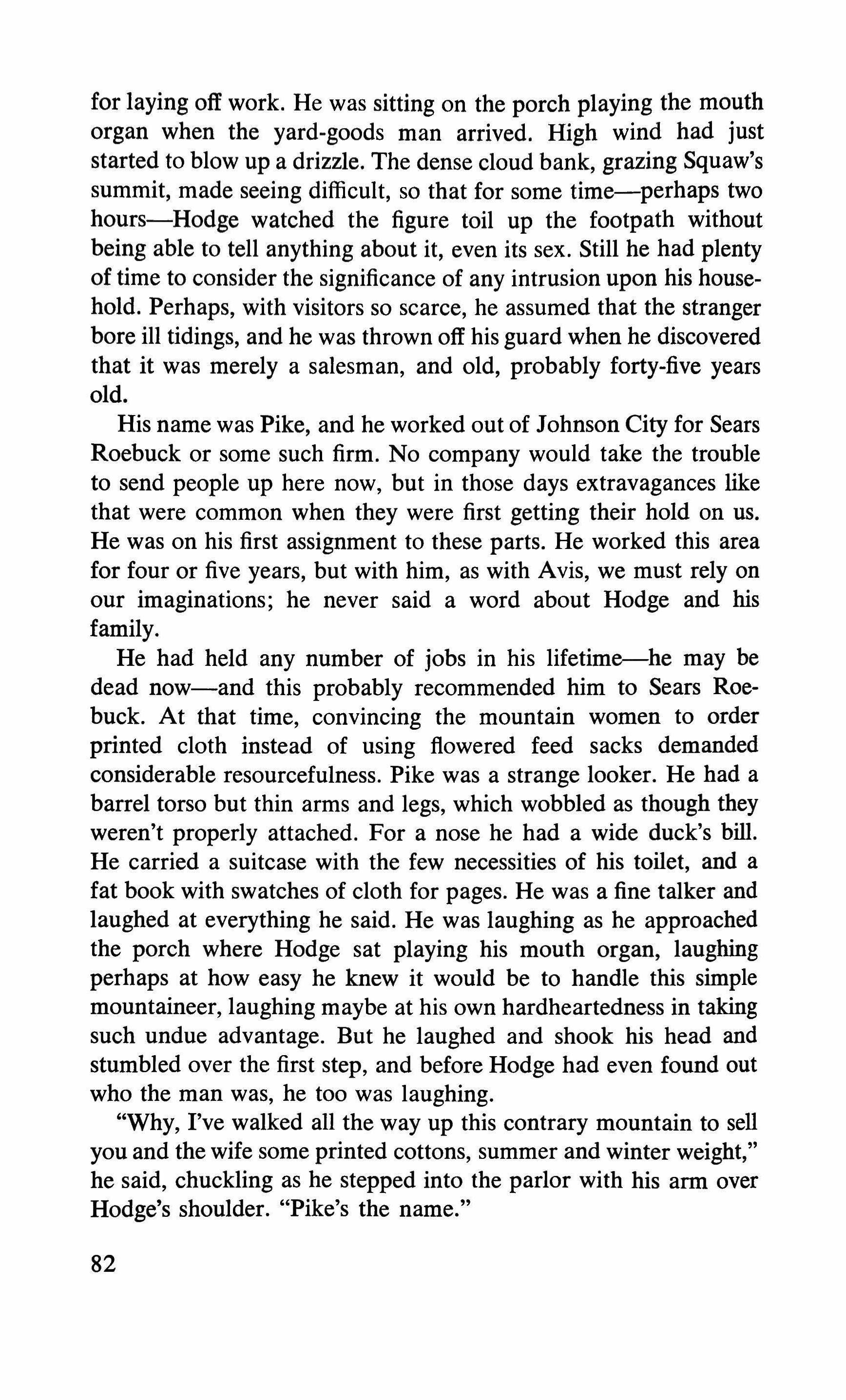
for laying off work. He was sitting on the porch playing the mouth organ when the yard-goods man arrived. High wind had just started to blow up a drizzle. The dense cloud bank, grazing Squaw's summit, made seeing difficult, so that for some time-perhaps two hours-Hodge watched the figure toil up the footpath without being able to tell anything about it, even its sex. Still he had plenty of time to consider the significance of any intrusion upon his household. Perhaps, with visitors so scarce, he assumed that the stranger bore ill tidings, and he was thrown off his guard when he discovered that it was merely a salesman, and old, probably forty-five years old.
His name was Pike, and he worked out of Johnson City for Sears Roebuck or some such firm. No company would take the trouble to send people up here now, but in those days extravagances like that were common when they were first getting their hold on us. He was on his first assignment to these parts. He worked this area for four or five years, but with him, as with Avis, we must rely on our imaginations; he never said a word about Hodge and his family.
He had held any number of jobs in his lifetime-he may be dead now-and this probably recommended him to Sears Roebuck. At that time, convincing the mountain women to order printed cloth instead of using flowered feed sacks demanded considerable resourcefulness. Pike was a strange looker. He had a barrel torso but thin arms and legs, which wobbled as though they weren't properly attached. For a nose he had a wide duck's bill. He carried a suitcase with the few necessities of his toilet, and a fat book with swatches of cloth for pages. He was a fine talker and laughed at everything he said. He was laughing as he approached the porch where Hodge sat playing his mouth organ, laughing perhaps at how easy he knew it would be to handle this simple mountaineer, laughing maybe at his own hardheartedness in taking such undue advantage. But he laughed and shook his head and stumbled over the first step, and before Hodge had even found out who the man was, he too was laughing.
"Why, I've walked all the way up this contrary mountain to sell you and the wife some printed cottons, summer and winter weight," he said, chuckling as he stepped into the parlor with his arm over Hodge's shoulder. "Pike's the name."
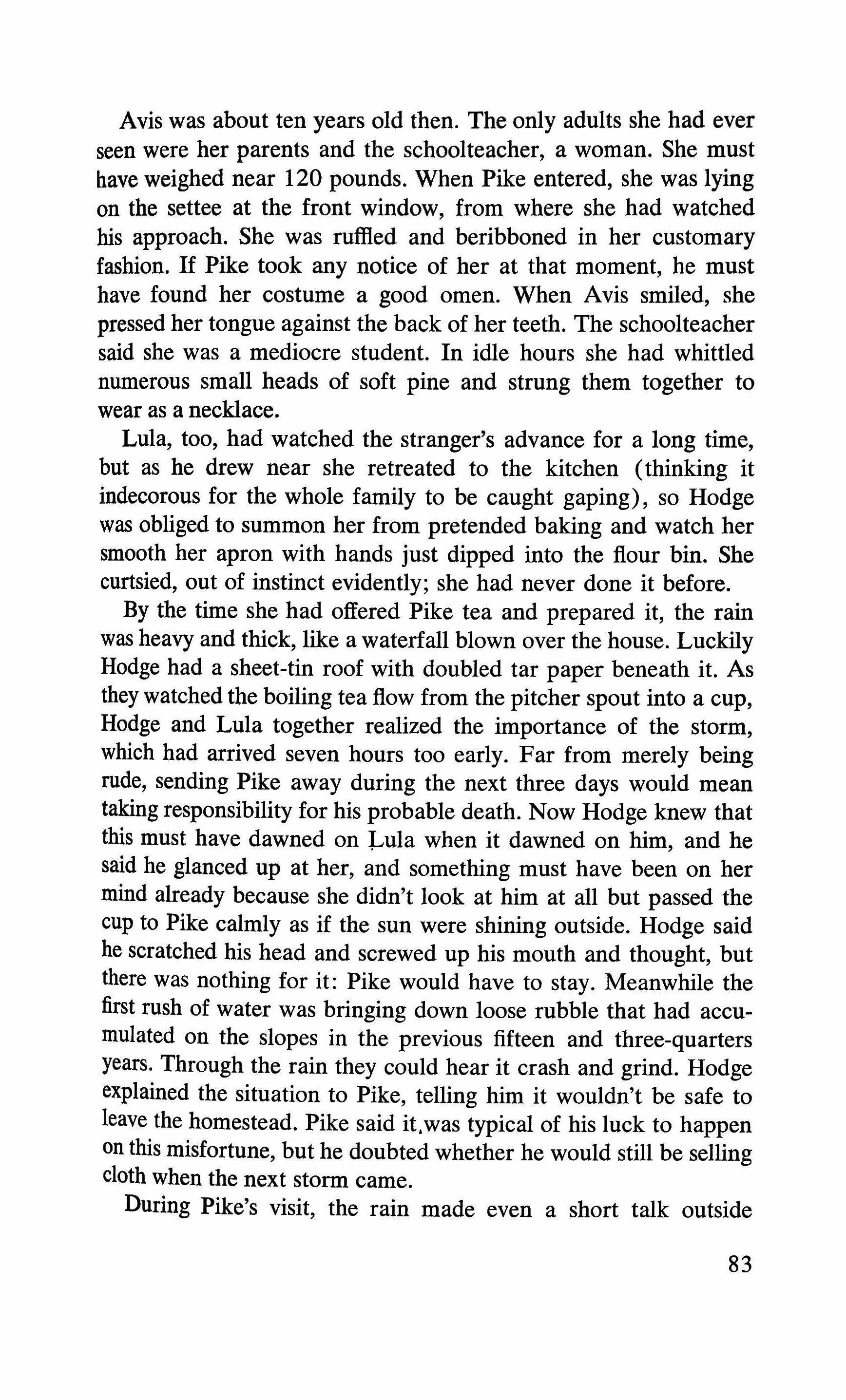
Avis was about ten years old then. The only adults she had ever seen were her parents and the schoolteacher, a woman. She must have weighed near 120 pounds. When Pike entered, she was lying on the settee at the front window, from where she had watched his approach. She was ruffled and beribboned in her customary fashion. If Pike took any notice of her at that moment, he must have found her costume a good omen. When Avis smiled, she pressed her tongue against the back of her teeth. The schoolteacher said she was a mediocre student. In idle hours she had whittled numerous small heads of soft pine and strung them together to wear as a necklace.
Lula, too, had watched the stranger's advance for a long time, but as he drew near she retreated to the kitchen (thinking it indecorous for the whole family to be caught gaping), so Hodge was obliged to summon her from pretended baking and watch her smooth her apron with hands just dipped into the flour bin. She curtsied, out of instinct evidently; she had never done it before. By the time she had offered Pike tea and prepared it, the rain was heavy and thick, like a waterfall blown over the house. Luckily Hodge had a sheet-tin roof with doubled tar paper beneath it. As they watched the boiling tea flow from the pitcher spout into a cup, Hodge and Lula together realized the importance of the storm, which had arrived seven hours too early. Far from merely being rude, sending Pike away during the next three days would mean taking responsibility for his probable death. Now Hodge knew that this must have dawned on Lula when it dawned on him, and he said he glanced up at her, and something must have been on her mind already because she didn't look at him at all but passed the cup to Pike calmly as if the sun were shining outside. Hodge said he scratched his head and screwed up his mouth and thought, but there was nothing for it: Pike would have to stay. Meanwhile the first rush of water was bringing down loose rubble that had accumulated on the slopes in the previous fifteen and three-quarters years. Through the rain they could hear it crash and grind. Hodge explained the situation to Pike, telling him it wouldn't be safe to leave the homestead. Pike said it.was typical of his luck to happen on this misfortune, but he doubted whether he would still be selling cloth when the next storm came.
DUring Pike's visit, the rain made even a short talk outside
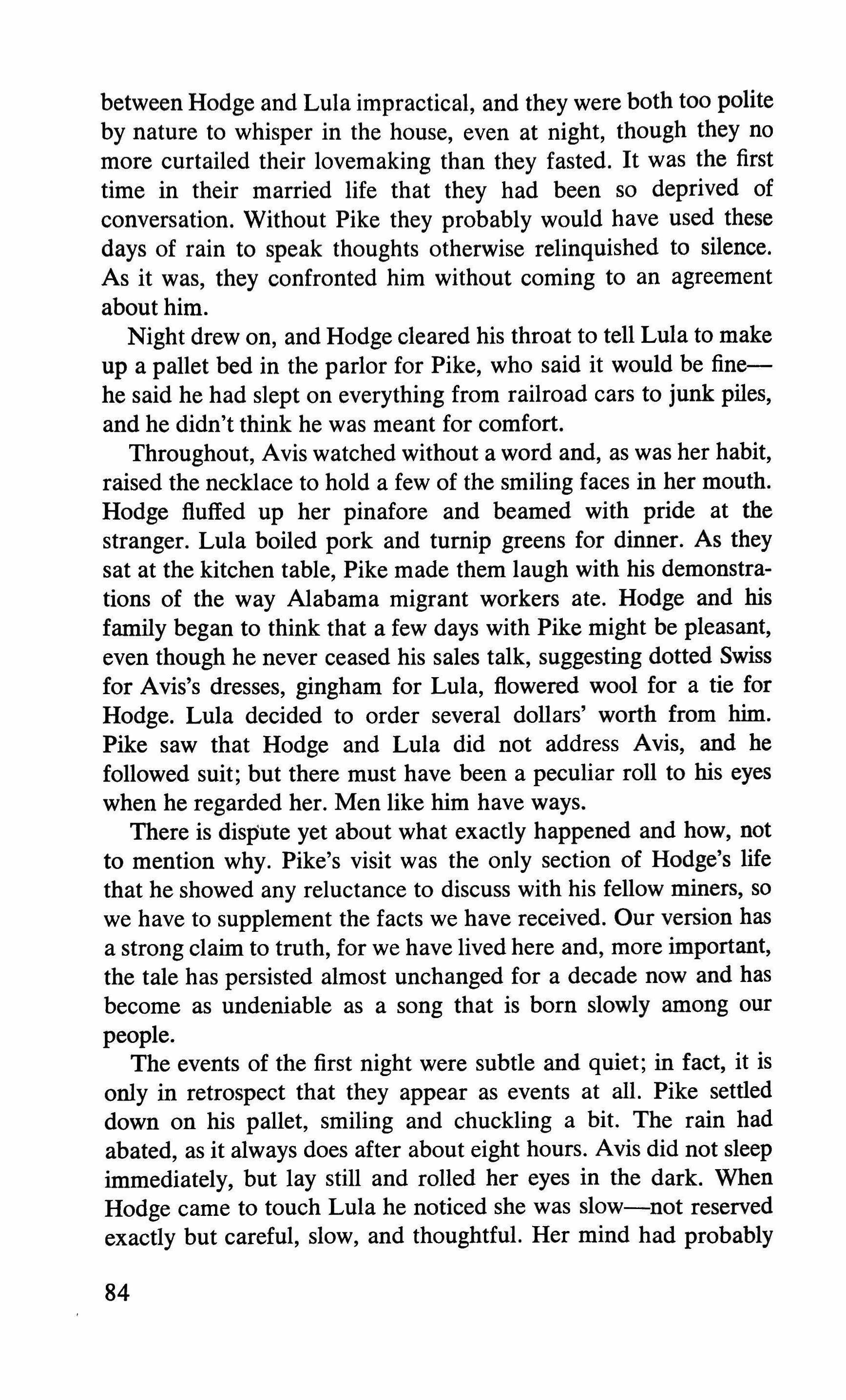
between Hodge and Lula impractical, and they were both too polite by nature to whisper in the house, even at night, though they no more curtailed their lovemaking than they fasted. It was the first time in their married life that they had been so deprived of conversation. Without Pike they probably would have used these days of rain to speak thoughts otherwise relinquished to silence. As it was, they confronted him without coming to an agreement about him.
Night drew on, and Hodge cleared his throat to tell Lula to make up a pallet bed in the parlor for Pike, who said it would be finehe said he had slept on everything from railroad cars to junk piles, and he didn't think he was meant for comfort.
Throughout, Avis watched without a word and, as was her habit, raised the necklace to hold a few of the smiling faces in her mouth. Hodge fluffed up her pinafore and beamed with pride at the stranger. Lula boiled pork and turnip greens for dinner. As they sat at the kitchen table, Pike made them laugh with his demonstrations of the way Alabama migrant workers ate. Hodge and his family began to think that a few days with Pike might be pleasant, even though he never ceased his sales talk, suggesting dotted Swiss for Avis's dresses, gingham for Lula, flowered wool for a tie for Hodge. Lula decided to order several dollars' worth from him. Pike saw that Hodge and Lula did not address Avis, and he followed suit; but there must have been a peculiar roll to his eyes when he regarded her. Men like him have ways.
There is dispute yet about what exactly happened and how, not to mention why. Pike's visit was the only section of Hodge's life that he showed any reluctance to discuss with his fellow miners, so we have to supplement the facts we have received. Our version has a strong claim to truth, for we have lived here and, more important, the tale has persisted almost unchanged for a decade now and has become as undeniable as a song that is born slowly among our people.
The events of the first night were subtle and quiet; in fact, it is only in retrospect that they appear as events at all. Pike settled down on his pallet, smiling and chuckling a bit. The rain had abated, as it always does after about eight hours. Avis did not sleep immediately, but lay still and rolled her eyes in the dark. When Hodge came to touch Lula he noticed she was slow-not reserved exactly but careful, slow, and thoughtful. Her mind had probably

turned again to the birth of her daughter and the subsequent barrenness.
The second day's confinement made everyone fidgety. They had absorbed the novelty of the situation, which now seemed to require a festivity as commemoration, and so Hodge played a wild jig and Lula danced with Pike, flushed and laughing. Her loins would have shown their contours through her meager cotton dress. It was not cold, and a fire kept the damp off. Avis sat on the floor in the comer and snapped her fingers, bouncing her corkscrew curls. The dimples in her cheeks were deep and large as navels. Then after a time Pike played the mouth organ-indifferently, Hodge said-and Lula danced with Hodge. This was in the morning; the afternoon was quieter, though Avis continued to snap her fingers and perform little dances with her hands. The lull would have lasted through supper had Pike not roused himself to draw on his fund of tall tales. Lula watched the floor. Hodge said that it occurred to him Pike might have had a courting urge toward her, but that he never suspected her of thoughts of infidelity.
Hodge was tired and went to sleep soon. Pike, Lula, and Avis lay wide awake and very quiet. After two hours, Lula rose from her bed and wrapped a mackintosh around her to go outside to the outhouse. It was in the backyard, but to reach it she had to go through the parlor out the front. Pike heard the bedroom door open, and the hesitant tread of bare feet. The darkness was so intense that he could not distinguish the silhouette of the figure. He breathed as if he were asleep, and kept watch so that as Lula opened the outer door he recognized her against the dim cloud bank. When she ran out through the rain he smiled to himself and passed his hand over his face. She had done nothing definite yet to betray herself, but he was the sort of man who can predict what a woman will do, and he laughed quietly.
Lula waited in the outhouse for a time, hearing only the rain, feeling it drip slowly, much like tears, through the leak in the roof. It was during these minutes that she considered, if at all, the morality of what she was about to do. She had reason to believe she was right, but she was not one to mind much if she was wrong. When she returned to the house she came softly to Pike's pallet and stood listening to him, trying to see him. She knew from Hodge's snore that he was asleep. She didn't give a thought to Avis. After a while she realized that Pike was feigning sleep. There
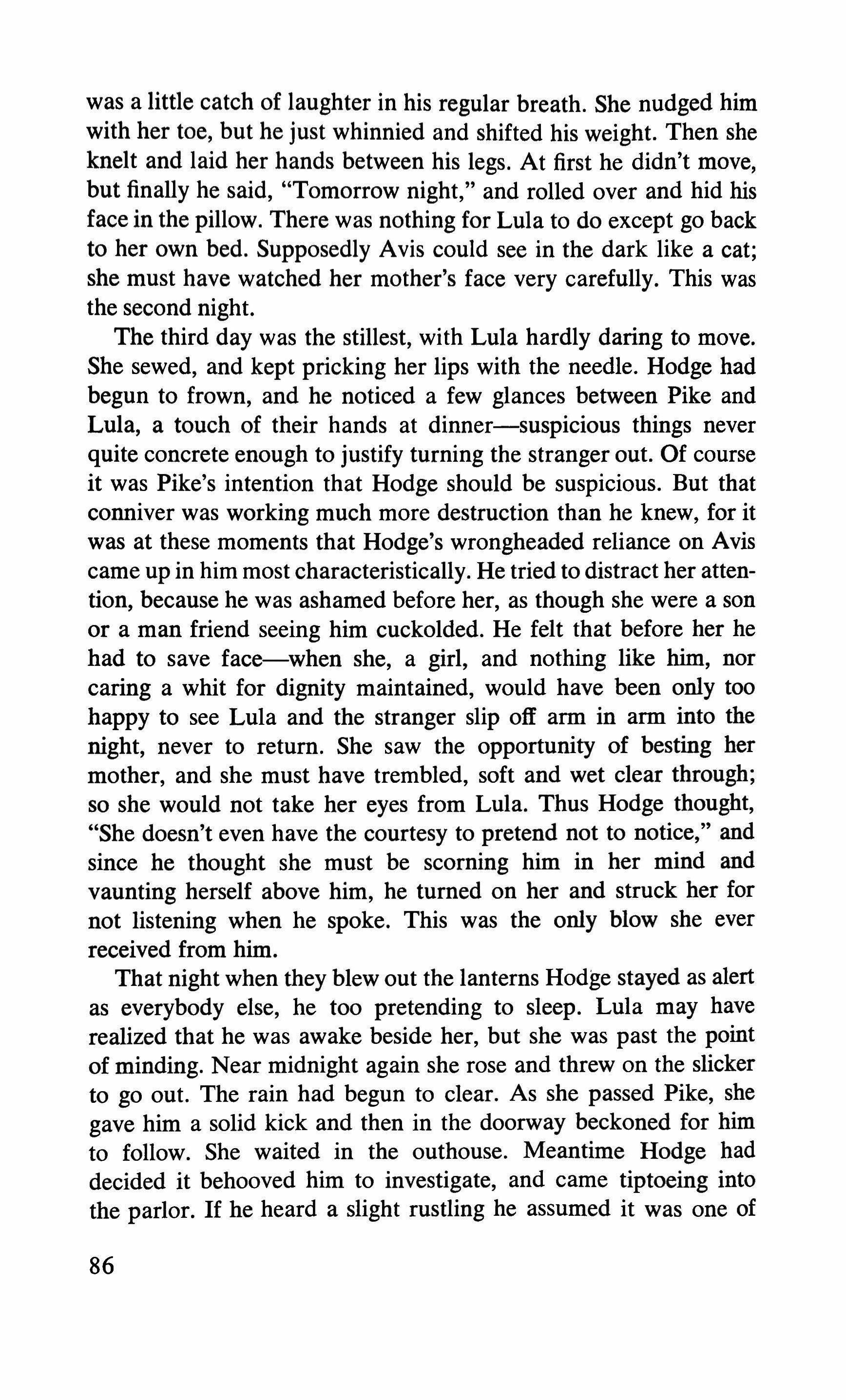
was a little catch of laughter in his regular breath. She nudged him with her toe, but he just whinnied and shifted his weight. Then she knelt and laid her hands between his legs. At first he didn't move, but finally he said, "Tomorrow night," and rolled over and hid his face in the pillow. There was nothing for Lula to do except go back to her own bed. Supposedly Avis could see in the dark like a cat; she must have watched her mother's face very carefully. This was the second night.
The third day was the stillest, with Lula hardly daring to move. She sewed, and kept pricking her lips with the needle. Hodge had begun to frown, and he noticed a few glances between Pike and Lula, a touch of their hands at dinner-suspicious things never quite concrete enough to justify turning the stranger out. Of course it was Pike's intention that Hodge should be suspicious. But that conniver was working much more destruction than he knew, for it was at these moments that Hodge's wrongheaded reliance on Avis came up in him most characteristically. He tried to distract her attention, because he was ashamed before her, as though she were a son or a man friend seeing him cuckolded. He felt that before her he had to save face-when she, a girl, and nothing like him, nor caring a whit for dignity maintained, would have been only too happy to see Lula and the stranger slip off arm in arm into the night, never to return. She saw the opportunity of besting her mother, and she must have trembled, soft and wet clear through; so she would not take her eyes from Lula. Thus Hodge thought, "She doesn't even have the courtesy to pretend not to notice," and since he thought she must be scorning him in her mind and vaunting herself above him, he turned on her and struck her for not listening when he spoke. This was the only blow she ever received from him.
That night when they blew out the lanterns Hodge stayed as alert as everybody else, he too pretending to sleep. Lula may have realized that he was awake beside her, but she was past the point of minding. Near midnight again she rose and threw on the slicker to go out. The rain had begun to clear. As she passed Pike, she gave him a solid kick and then in the doorway beckoned for him to follow. She waited in the outhouse. Meantime Hodge had decided it behooved him to investigate, and came tiptoeing into the parlor. If he heard a slight rustling he assumed it was one of
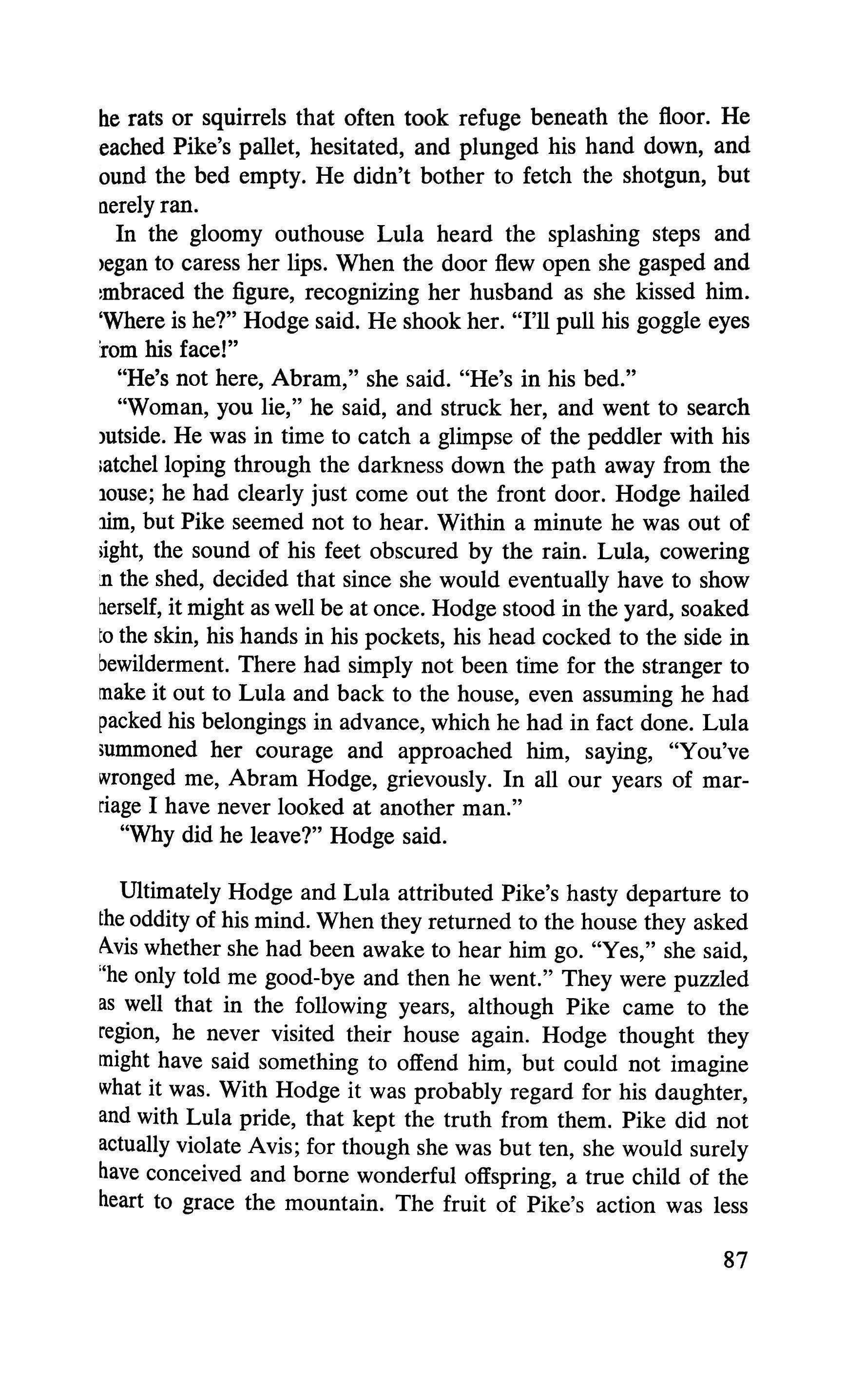
he rats or squirrels that often took refuge beneath the floor. He eached Pike's pallet, hesitated, and plunged his hand down, and ound the bed empty. He didn't bother to fetch the shotgun, but nerely ran.
In the gloomy outhouse Lula heard the splashing steps and iegan to caress her lips. When the door flew open she gasped and mbraced the figure, recognizing her husband as she kissed him. 'Where is he?" Hodge said. He shook her. "I'll pull his goggle eyes 'rom his face!"
"He's not here, Abram," she said. "He's in his bed."
"Woman, you lie," he said, and struck her, and went to search mtside. He was in time to catch a glimpse of the peddler with his .atchel loping through the darkness down the path away from the louse; he had clearly just come out the front door. Hodge hailed lim, but Pike seemed not to hear. Within a minute he was out of light, the sound of his feet obscured by the rain. Lula, cowering n the shed, decided that since she would eventually have to show herself, it might as well be at once. Hodge stood in the yard, soaked to the skin, his hands in his pockets, his head cocked to the side in bewilderment. There had simply not been time for the stranger to make it out to Lula and back to the house, even assuming he had packed his belongings in advance, which he had in fact done. Lula summoned her courage and approached him, saying, "You've wronged me, Abram Hodge, grievously. In all our years of marriage I have never looked at another man."
"Why did he leave?" Hodge said.
Ultimately Hodge and Lula attributed Pike's hasty departure to the oddity of his mind. When they returned to the house they asked Avis whether she had been awake to hear him go. "Yes," she said, "he only told me good-bye and then he went." They were puzzled as well that in the following years, although Pike came to the region, he never visited their house again. Hodge thought they might have said something to offend him, but could not imagine what it was. With Hodge it was probably regard for his daughter, and with Lula pride, that kept the truth from them. Pike did not actually violate Avis; for though she was but ten, she would surely have conceived and borne wonderful offspring, a true child of the heart to grace the mountain. The fruit of Pike's action was less
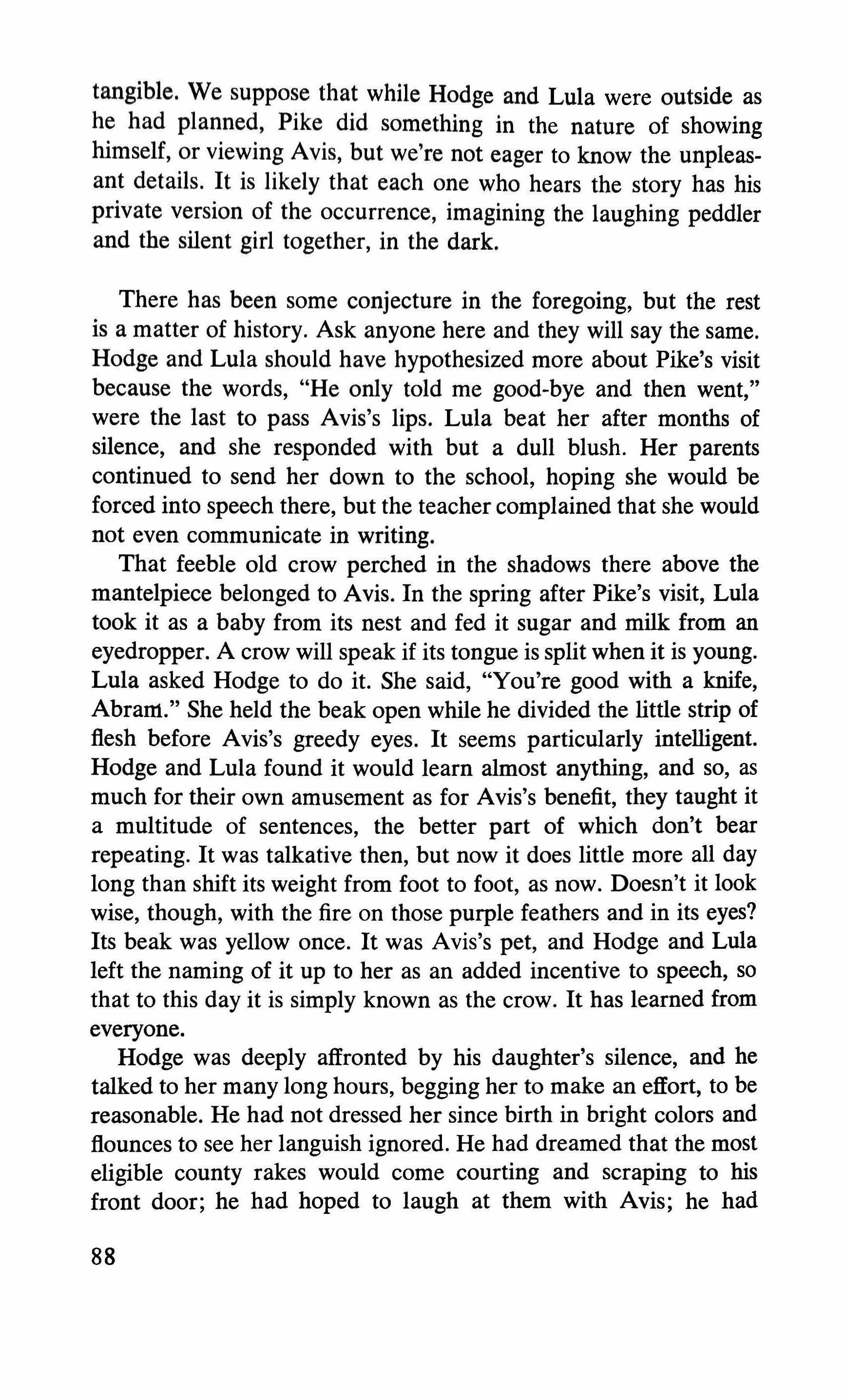
tangible. We suppose that while Hodge and Lula were outside as he had planned, Pike did something in the nature of showing himself, or viewing Avis, but we're not eager to know the unpleasant details. It is likely that each one who hears the story has his private version of the occurrence, imagining the laughing peddler and the silent girl together, in the dark.
There has been some conjecture in the foregoing, but the rest is a matter of history. Ask anyone here and they will say the same. Hodge and Lula should have hypothesized more about Pike's visit because the words, "He only told me good-bye and then went," were the last to pass Avis's lips. Lula beat her after months of silence, and she responded with but a dull blush. Her parents continued to send her down to the school, hoping she would be forced into speech there, but the teacher complained that she would not even communicate in writing.
That feeble old crow perched in the shadows there above the mantelpiece belonged to Avis. In the spring after Pike's visit, Lula took it as a baby from its nest and fed it sugar and milk from an eyedropper. A crow will speak if its tongue is split when it is young. Lula asked Hodge to do it. She said, "You're good with a knife, Abram." She held the beak open while he divided the little strip of flesh before Avis's greedy eyes. It seems particularly intelligent. Hodge and Lula found it would learn almost anything, and so, as much for their own amusement as for Avis's benefit, they taught it a multitude of sentences, the better part of which don't bear repeating. It was talkative then, but now it does little more all day long than shift its weight from foot to foot, as now. Doesn't it look wise, though, with the fire on those purple feathers and in its eyes? Its beak was yellow once. It was Avis's pet, and Hodge and Lula left the naming of it up to her as an added incentive to speech, so that to this day it is simply known as the crow. It has learned from everyone.
Hodge was deeply affronted by his daughter's silence, and he talked to her many long hours, begging her to make an effort, to be reasonable. He had not dressed her since birth in bright colors and flounces to see her languish ignored. He had dreamed that the most eligible county rakes would come courting and scraping to his front door; he had hoped to laugh at them with Avis; he had
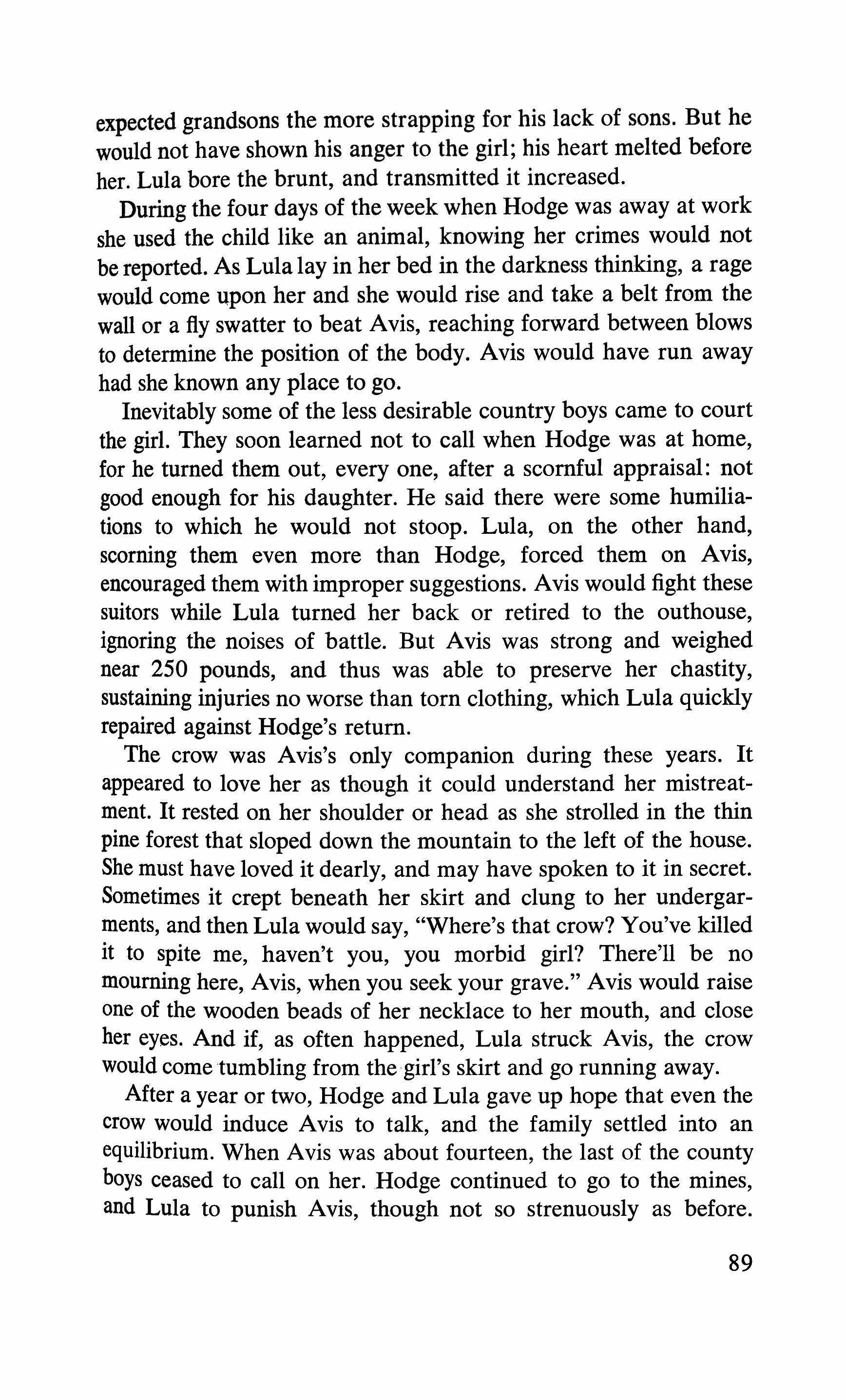
expected grandsons the more strapping for his lack of sons. But he would not have shown his anger to the girl; his heart melted before her. Lula bore the brunt, and transmitted it increased.
During the four days of the week when Hodge was away at work she used the child like an animal, knowing her crimes would not be reported. As Lula lay in her bed in the darkness thinking, a rage would come upon her and she would rise and take a belt from the wall or a fly swatter to beat Avis, reaching forward between blows to determine the position of the body. Avis would have run away had she known any place to go.
Inevitably some of the less desirable country boys came to court the girl. They soon learned not to call when Hodge was at home, for he turned them out, every one, after a scornful appraisal: not good enough for his daughter. He said there were some humiliations to which he would not stoop. Luia, on the other hand, scorning them even more than Hodge, forced them on Avis, encouraged them with improper suggestions. Avis would fight these suitors while Lula turned her back or retired to the outhouse, ignoring the noises of battle. But Avis was strong and weighed near 250 pounds, and thus was able to preserve her chastity, sustaining injuries no worse than torn clothing, which Lula quickly repaired against Hodge's return.
The crow was Avis's only companion during these years. It appeared to love her as though it could understand her mistreatment. It rested on her shoulder or head as she strolled in the thin pine forest that sloped down the mountain to the left of the house. She must have loved it dearly, and may have spoken to it in secret. Sometimes it crept beneath her skirt and clung to her undergarments, and then Lula would say, "Where's that crow? You've killed it to spite me, haven't you, you morbid girl? There'll be no mourning here, Avis, when you seek your grave." Avis would raise one of the wooden beads of her necklace to her mouth, and close her eyes. And if, as often happened, Lula struck Avis, the crow would come tumbling from the girl's skirt and go running away.
After a year or two, Hodge and Lula gave up hope that even the crow would induce Avis to talk, and the family settled into an equilibrium. When Avis was about fourteen, the last of the county boys ceased to call on her. Hodge continued to go to the mines, and Lula to punish Avis, though not so strenuously as before.
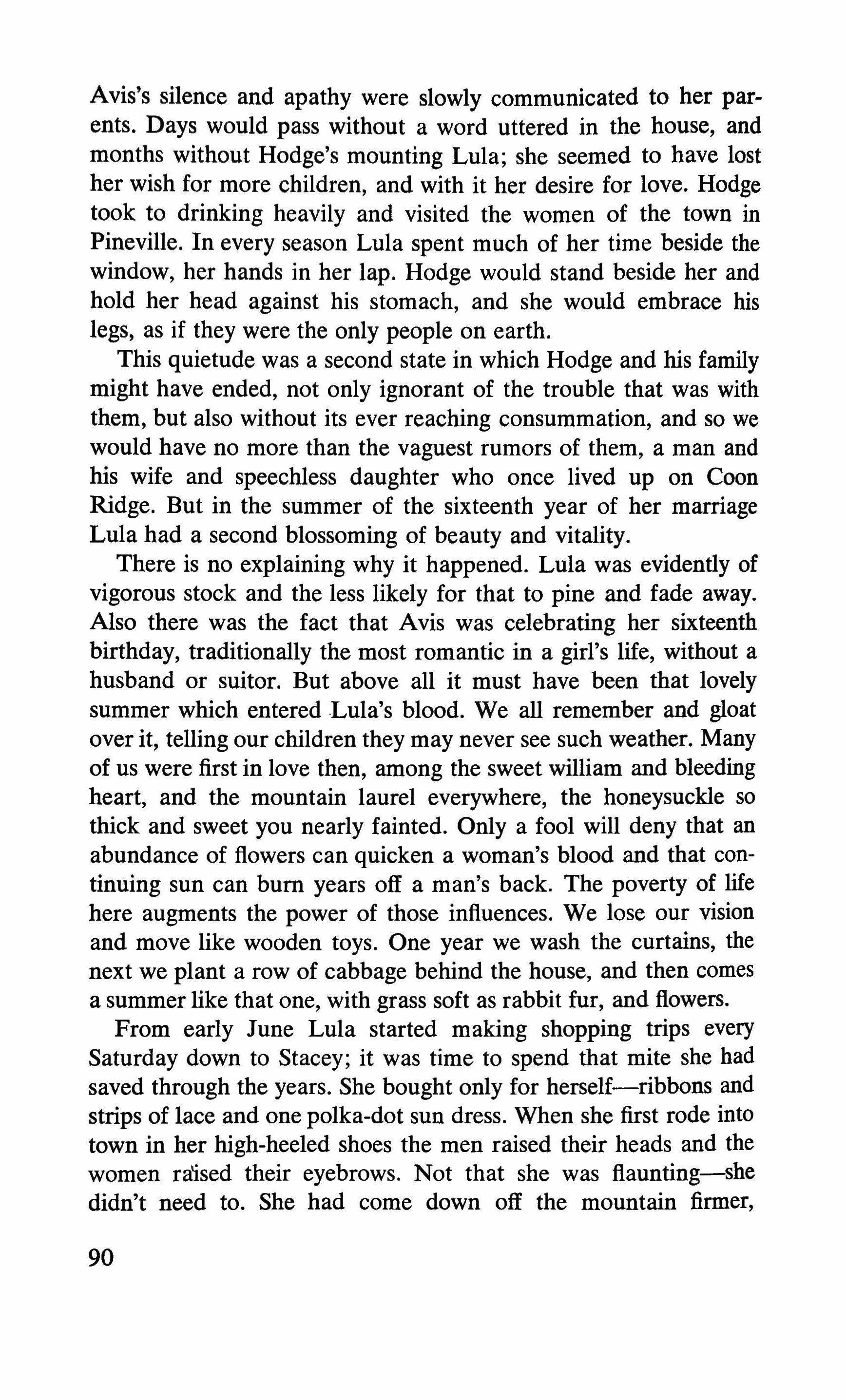
Avis's silence and apathy were slowly communicated to her parents. Days would pass without a word uttered in the house, and months without Hodge's mounting Lula; she seemed to have lost her wish for more children, and with it her desire for love. Hodge took to drinking heavily and visited the women of the town in Pineville. In every season Lula spent much of her time beside the window, her hands in her lap. Hodge would stand beside her and hold her head against his stomach, and she would embrace his legs, as if they were the only people on earth.
This quietude was a second state in which Hodge and his family might have ended, not only ignorant of the trouble that was with them, but also without its ever reaching consummation, and so we would have no more than the vaguest rumors of them, a man and his wife and speechless daughter who once lived up on Coon Ridge. But in the summer of the sixteenth year of her marriage Lula had a second blossoming of beauty and vitality.
There is no explaining why it happened. Lula was evidently of vigorous stock and the less likely for that to pine and fade away. Also there was the fact that Avis was celebrating her sixteenth birthday, traditionally the most romantic in a girl's life, without a husband or suitor. But above all it must have been that lovely summer which entered Lula's blood. We all remember and gloat over it, telling our children they may never see such weather. Many of us were first in love then, among the sweet william and bleeding heart, and the mountain laurel everywhere, the honeysuckle so thick and sweet you nearly fainted. Only a fool will deny that an abundance of flowers can quicken a woman's blood and that continuing sun can bum years off a man's back. The poverty of life here augments the power of those influences. We lose our vision and move like wooden toys. One year we wash the curtains, the next we plant a row of cabbage behind the house, and then comes a summer like that one, with grass soft as rabbit fur, and flowers. From early June Lula started making shopping trips every Saturday down to Stacey; it was time to spend that mite she had saved through the years. She bought only for herself-ribbons and strips of lace and one polka-dot sun dress. When she first rode into town in her high-heeled shoes the men raised their heads and the women ra'ised their eyebrows. Not that she was flaunting-she didn't need to. She had come down off the mountain firmer,
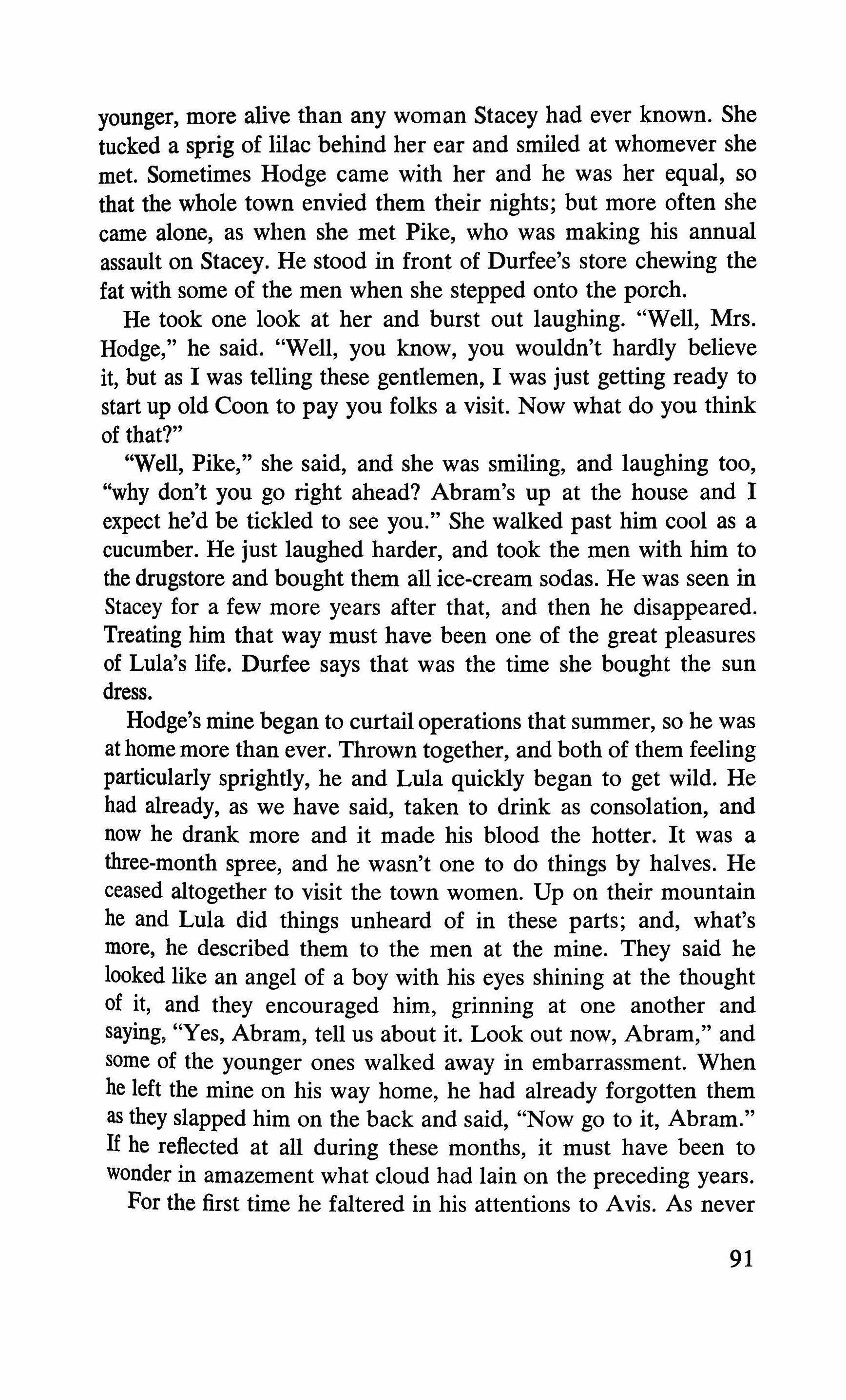
younger, more alive than any woman Stacey had ever known. She tucked a sprig of lilac behind her ear and smiled at whomever she met. Sometimes Hodge came with her and he was her equal, so that the whole town envied them their nights; but more often she came alone, as when she met Pike, who was making his annual assault on Stacey. He stood in front of Durfee's store chewing the fat with some of the men when she stepped onto the porch.
He took one look at her and burst out laughing. "Well, Mrs. Hodge," he said. "Well, you know, you wouldn't hardly believe it, but as I was telling these gentlemen, I was just getting ready to start up old Coon to pay you folks a visit. Now what do you think of that?"
"Well, Pike," she said, and she was smiling, and laughing too, "why don't you go right ahead? Abram's up at the house and I expect he'd be tickled to see you." She walked past him cool as a cucumber. He just laughed harder, and took the men with him to the drugstore and bought them all ice-cream sodas. He was seen in Stacey for a few more years after that, and then he disappeared. Treating him that way must have been one of the great pleasures of Lula's life. Durfee says that was the time she bought the sun dress.
Hodge's mine began to curtail operations that summer, so he was at home more than ever. Thrown together, and both of them feeling particularly sprightly, he and Lula quickly began to get wild. He had already, as we have said, taken to drink as consolation, and now he drank more and it made his blood the hotter. It was a three-month spree, and he wasn't one to do things by halves. He ceased altogether to visit the town women. Up on their mountain he and Lula did things unheard of in these parts; and, what's more, he described them to the men at the mine. They said he looked like an angel of a boy with his eyes shining at the thought of it, and they encouraged him, grinning at one another and saying, "Yes, Abram, tell us about it. Look out now, Abram," and some of the younger ones walked away in embarrassment. When he left the mine on his way home, he had already forgotten them as they slapped him on the back and said, "Now go to it, Abram." H he reflected at all during these months, it must have been to wonder in amazement what cloud had lain on the preceding years. For the first time he faltered in his attentions to Avis. As never
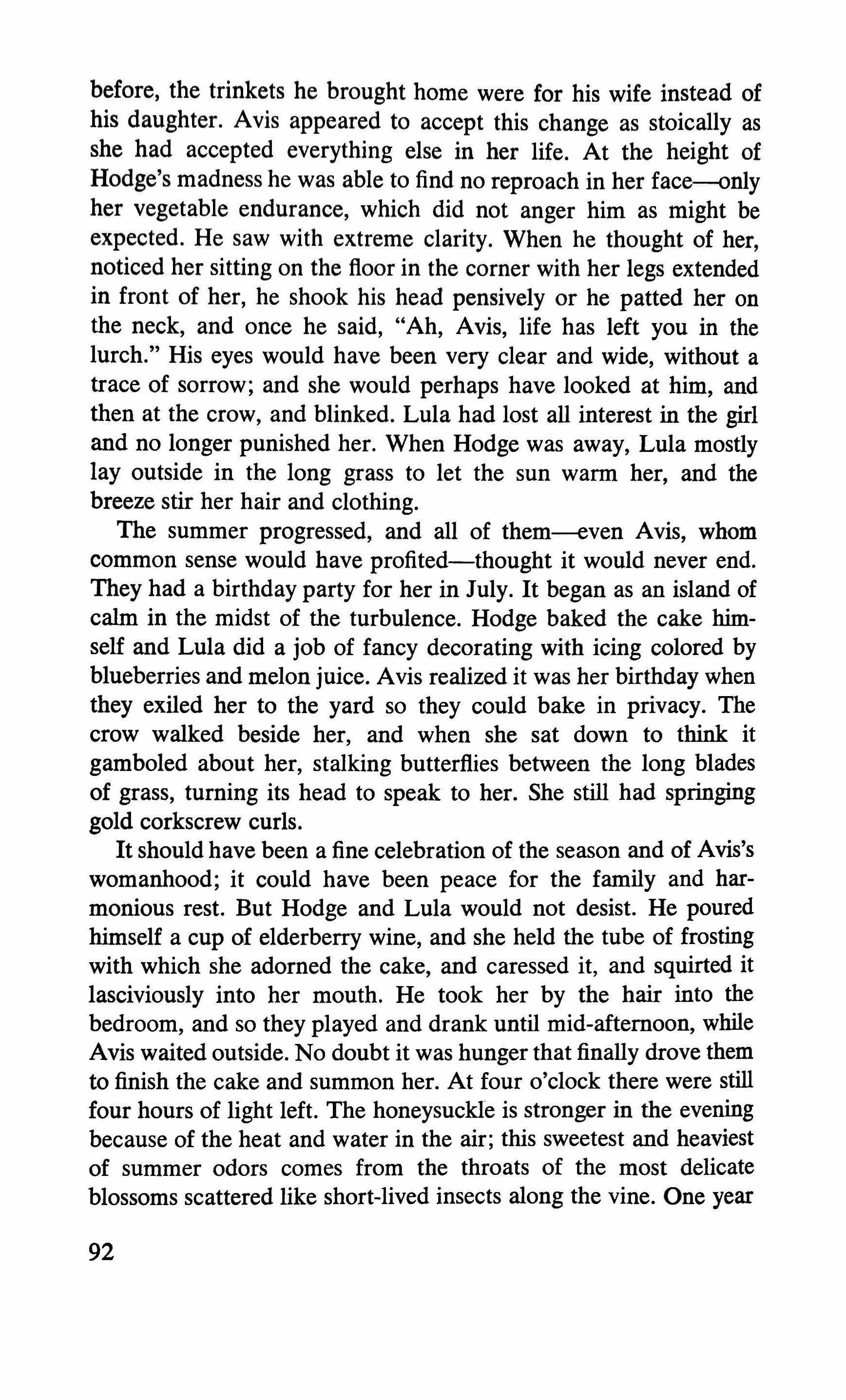
before, the trinkets he brought home were for his wife instead of his daughter. Avis appeared to accept this change as stoically as she had accepted everything else in her life. At the height of Hodge's madness he was able to find no reproach in her face--only her vegetable endurance, which did not anger him as might be expected. He saw with extreme clarity. When he thought of her, noticed her sitting on the floor in the corner with her legs extended in front of her, he shook his head pensively or he patted her on the neck, and once he said, "Ah, Avis, life has left you in the lurch." His eyes would have been very clear and wide, without a trace of sorrow; and she would perhaps have looked at him, and then at the crow, and blinked. Lula had lost all interest in the girl and no longer punished her. When Hodge was away, Lula mostly lay outside in the long grass to let the sun warm her, and the breeze stir her hair and clothing.
The summer progressed, and all of them--even Avis, whom common sense would have profited-thought it would never end. They had a birthday party for her in July. It began as an island of calm in the midst of the turbulence. Hodge baked the cake himself and Lula did a job of fancy decorating with icing colored by blueberries and melon juice. Avis realized it was her birthday when they exiled her to the yard so they could bake in privacy. The crow walked beside her, and when she sat down to think it gamboled about her, stalking butterflies between the long blades of grass, turning its head to speak to her. She still had springing gold corkscrew curls.
It should have been a fine celebration of the season and of Avis's womanhood; it could have been peace for the family and harmonious rest. But Hodge and Lula would not desist. He poured himself a cup of elderberry wine, and she held the tube of frosting with which she adorned the cake, and caressed it, and squirted it lasciviously into her mouth. He took her by the hair into the bedroom, and so they played and drank until mid-afternoon, while Avis waited outside. No doubt it was hunger that finally drove them to finish the cake and summon her. At four o'clock there were still four hours of light left. The honeysuckle is stronger in the evening because of the heat and water in the air; this sweetest and heaviest of summer odors comes from the throats of the most delicate blossoms scattered like short-lived insects along the vine. One year

none of our animals reproduced because a blight had destroyed the honeysuckle.
We suppose that Hodge made a final commitment to his illusion that afternoon. Impelled by alcohol and the weather, and his splendid manhood, he closed his eyes to the fact that Avis was his, and that she was female and therefore demanded at least the pretense of attention, without which (again because she was assuredly a woman, that fat girl) she would grow devious and perhaps vindictive-that like all women, good and bad, she had an instinct to discover a man's vulnerable place and strike him there.
They lit the candles in broad daylight and called Avis in, laughing and beaming, expecting her to be overjoyed to find the cake and a ribbon or two for her hair, Hodge ready to cut, and Lula standing behind him disheveled and shining with sweat. Hodgeplayed Happy Birthday, Avis blew out the candles, and they each ate a slice of cake. Then Lula just wandered out onto the porch, and Hodge took a jug of hard cider and followed her, leaving Avis alone. She sat at the table and fed the crow tidbits of icing, and doubtless the seeds of her idea came to her then.
She could little predict how favorable the circumstances would be. On the porch Hodge began playing some of the slower melancholy songs. Lula sang with him, resting her head on his shoulder. The sun slipped down the cleft between Squaw and the more distant Brame; the air cooled and stirred a bit; there is usually a whippoorwill, even so high, that calls before dusk. Hodge finished the cider and fetched a fifth of bourbon from the kitchen, twice passing Avis without a sign of recognition. Only her eyes moved, watching him lurch and stumble against the furniture. "Damn fool," the crow screamed as he returned to the porch, and Hodge laughed a loud free laugh that seemed to travel in a spiral up to the evening's first stars. He fell to the steps and began to play Turkey in the Straw or She'll Be Coming Round the Mountain, a lively air, interrupting himself to drink or shout. Wisteria hung from the porch roof. Lula snapped her fingers, tossed her head, then held her hair away from the back of her neck; she leaned against one of the uprights. Her sighs became her, and the moonlight. Hodge's brain was spinning when he felt her hand on his thigh, and looked up at her drawn lovely face descending; he reached out for her, but she smiled and was away, rolling across

the lawn with her arms entwined above her head. He ran and sank to cover her, and found only the sweet grass. She knelt beside him, moving her hand in his hair as though it were water, and then fled, before he could catch her, laughing, into the wood.
That stand of pine on Coon is no more than a mile square and sparsely settled, but it served for mischief. Mountain pines are almost as large as those in the valleys, because of the snow that lingers later here, often into May. They are fragrant and shadowy, in moonlight a blue, black green. Rain washes away the mat of needles every year, so that thick grass grows beneath the trees. Hodge followed Lula, tripping, falling into the pine boughs, calling her, shouting what he would do when he caught her. At first she kept within his sight, and then she completely lost herself, for she was delirious.
A spray of needles crossed Hodge's face and he stopped and held them in one hand, kissing them and saying words of love as he undressed. Of course the air was still warm. A fine sight he must have been, dancing and singing stark naked between the trees, his bottle of bourbon wreathing him in its own scent. He circled and backtracked, hallooed and cursed, and soon had lost his clothes as well as Lula. Now and again he heard footsteps, and then the fire in him grew unbearable, and he charged after the sound, tearing himself against branches and bark. He would have taken anything, human or animal, but most of all he wanted Lula because the season and the woods put him in mind of their first meeting. The same idea may have been in her head as she followed him, guided by his cries, intending to stay away from him until it was no longer possible and then reveal herself, surrender; it must have seemed to her that she had the power of miracles. When Hodge's calls stopped, she thought he had heard her coming behind him and was now stalking her, so she turned and crept away from him, smiling, trembling.
But Hodge had forgotten her. Who knows what he thought he saw in the clearing before him, if he thought at all for the briefest moment-a mountain nymph, a gift from the Lord to requite his trials, some rare and thankful creation of the alcohol? But she was real and she was his daughter, and mad as he was he should have known it, but he didn't. She stood tiptoe with her back to him, in full moonlight, swaying. She too was naked, naked all that flesh the sun had never touched, white as snow. She had graced herself

with flowers, sweet peas and columbine woven in a coronet, chains of red clover slung from her neck and waist-she wore only flowers.
Knowing he wanted her, she rolled her hips, slapping them with her open palms. Hodge stepped forward, and then halted as she turned slowly, exposing the wealth of her body. She had painted her face so that it was hardly recognizable, should he notice it. Apparently it surprised her to find him naked and so ready for love, for her swaying stopped and she covered herself with the demure gesture of a pagan statue. This was irresistible incitement, and Hodge forced her to her back and violated her. We see this outrage from above, through the eyes of the crow, who watched in the shadows of one of the surrounding pines. Naturally we do not dwell long or often on the hateful embrace, lapped in the long grass, Avis all white and Hodge white below the waist, the eyes of each searching those of the other. Avis seems to have had fits and spasms of conscience: one minute she participated wholeheartedly, and the next she tried feebly to slide from beneath him, but he followed close on her. Lula either found them there, or surmised the truth when she returned to the empty house. She fell on her bed and slept.
Hodge was a long time having done with Avis-he left her, drank some bourbon to refresh himself, and returned for more. When he was finally finished for good he departed, bowing and blowing kisses, to find his clothes. A little later Avis entered the house looking calm as you please, and took her own bed without a glance at her mother. Hodge could not find his clothes; in the course of his search he came again to the place where he had seen the vision of loveliness and, seized with desire, he spent most of the night searching for her until, near dawn, he fell from exhaustion and slept till noon.
This was the night, then, that was Abram Hodge's undoing. When he awoke he could remember the body but not the face of the creature he had met in the moonlight. He assumed it was an alcoholic mirage, and told his friends at the mine, from whom we have the facts. Some of them suspected the truth behind his blithe revelations; and they, as we, yearned to see the daughter, merely to see the perpetrator of such a monstrosity, and perhaps then be able to guess what words she spoke in her mind during the act.
Then for two months Lula was the motive force in the family.
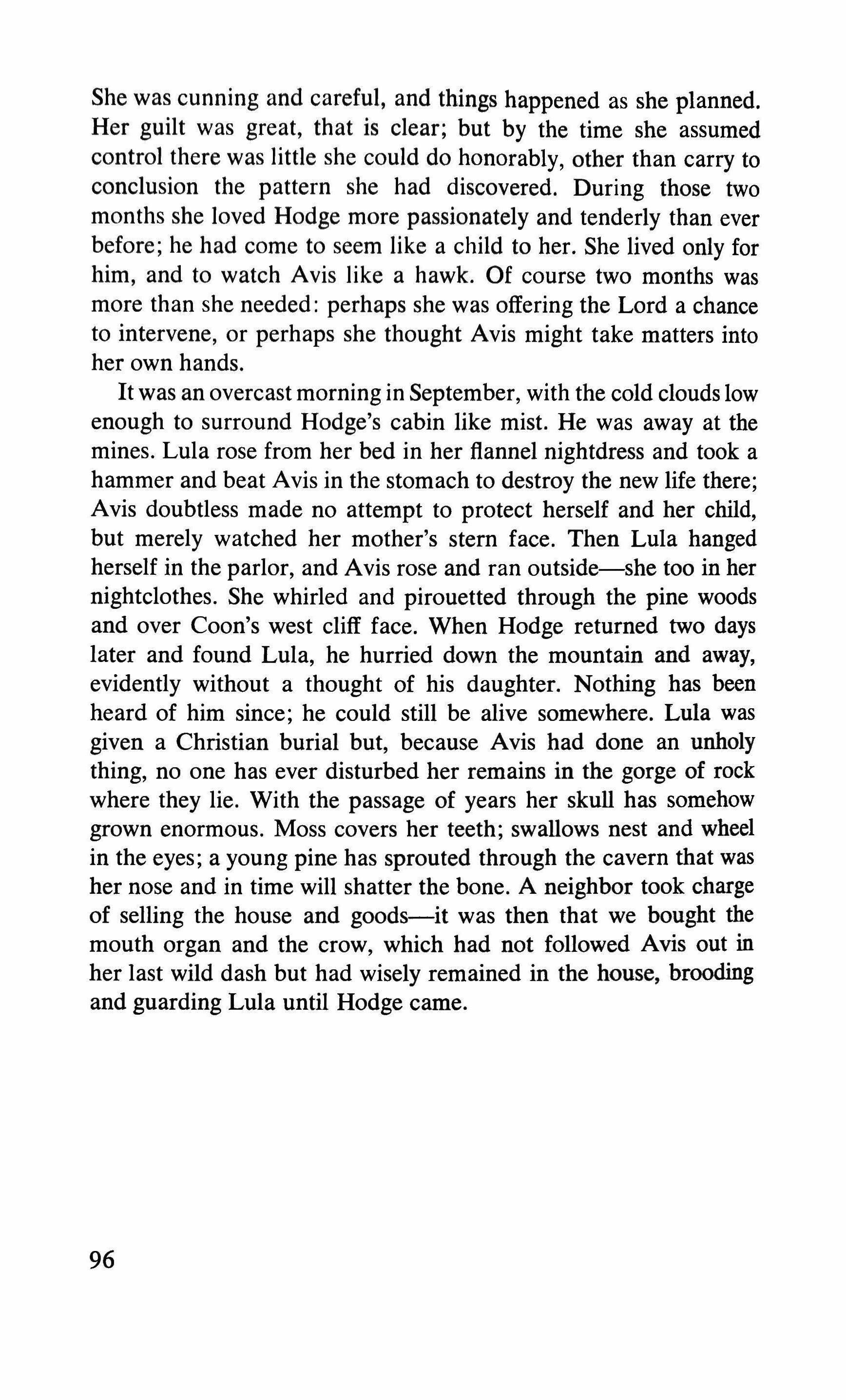
She was cunning and careful, and things happened as she planned. Her guilt was great, that is clear; but by the time she assumed control there was little she could do honorably, other than carry to conclusion the pattern she had discovered. During those two months she loved Hodge more passionately and tenderly than ever before; he had come to seem like a child to her. She lived only for him, and to watch Avis like a hawk. Of course two months was more than she needed: perhaps she was offering the Lord a chance to intervene, or perhaps she thought Avis might take matters into her own hands.
It was an overcast morning in September, with the cold clouds low enough to surround Hodge's cabin like mist. He was away at the mines. Lula rose from her bed in her flannel nightdress and took a hammer and beat Avis in the stomach to destroy the new life there; Avis doubtless made no attempt to protect herself and her child, but merely watched her mother's stern face. Then Lula hanged herself in the parlor, and Avis rose and ran outside-she too in her nightclothes. She whirled and pirouetted through the pine woods and over Coon's west cliff face. When Hodge returned two days later and found Lula, he hurried down the mountain and away, evidently without a thought of his daughter. Nothing has been heard of him since; he could still be alive somewhere. Lula was given a Christian burial but, because Avis had done an unholy thing, no one has ever disturbed her remains in the gorge of rock where they lie. With the passage of years her skull has somehow grown enormous. Moss covers her teeth; swallows nest and wheel in the eyes; a young pine has sprouted through the cavern that was her nose and in time will shatter the bone. A neighbor took charge of selling the house and goods-it was then that we bought the mouth organ and the crow, which had not followed Avis out in her last wild dash but had wisely remained in the house, brooding and guarding Lula until Hodge came.

THE OBSERVATION DECK
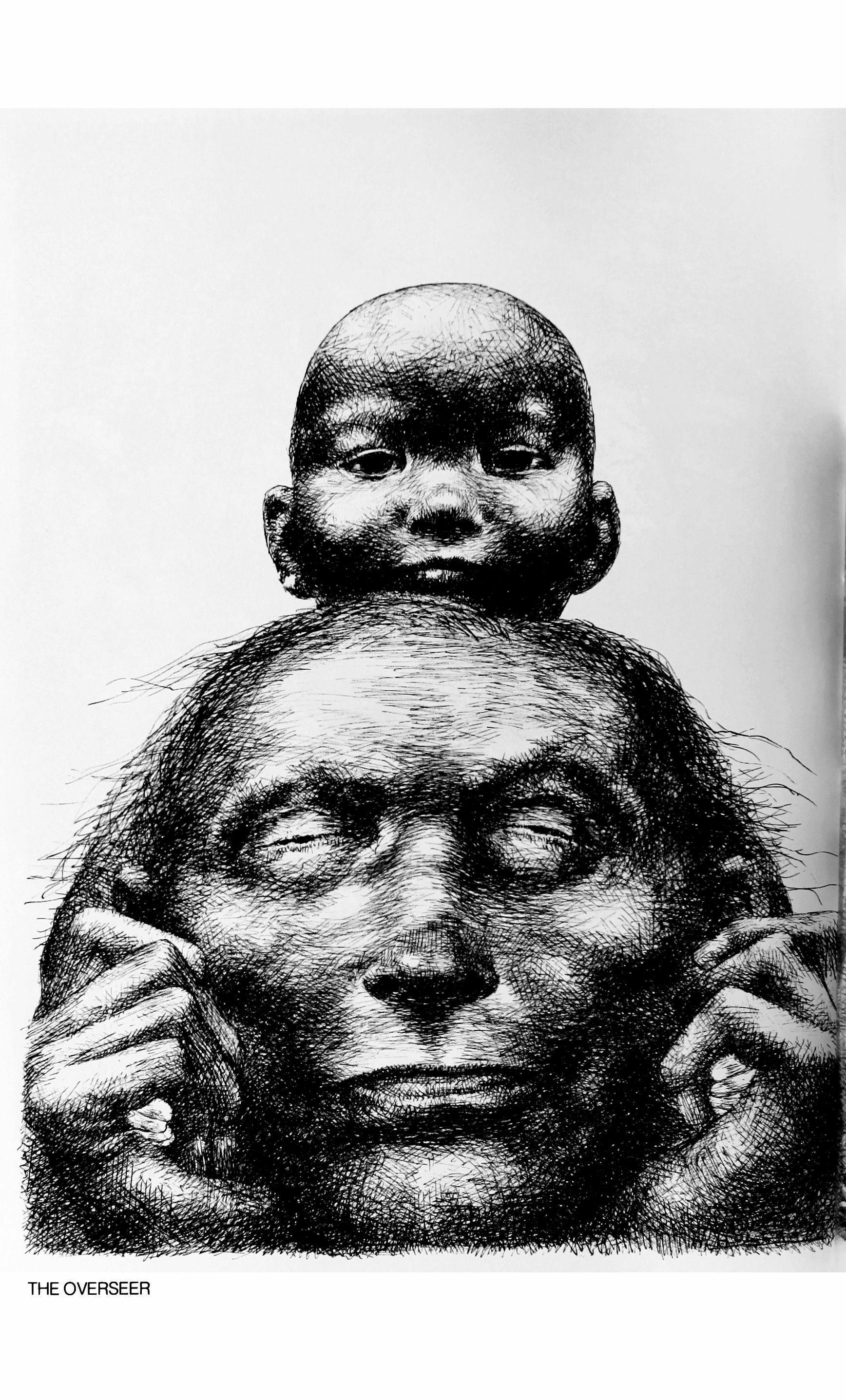
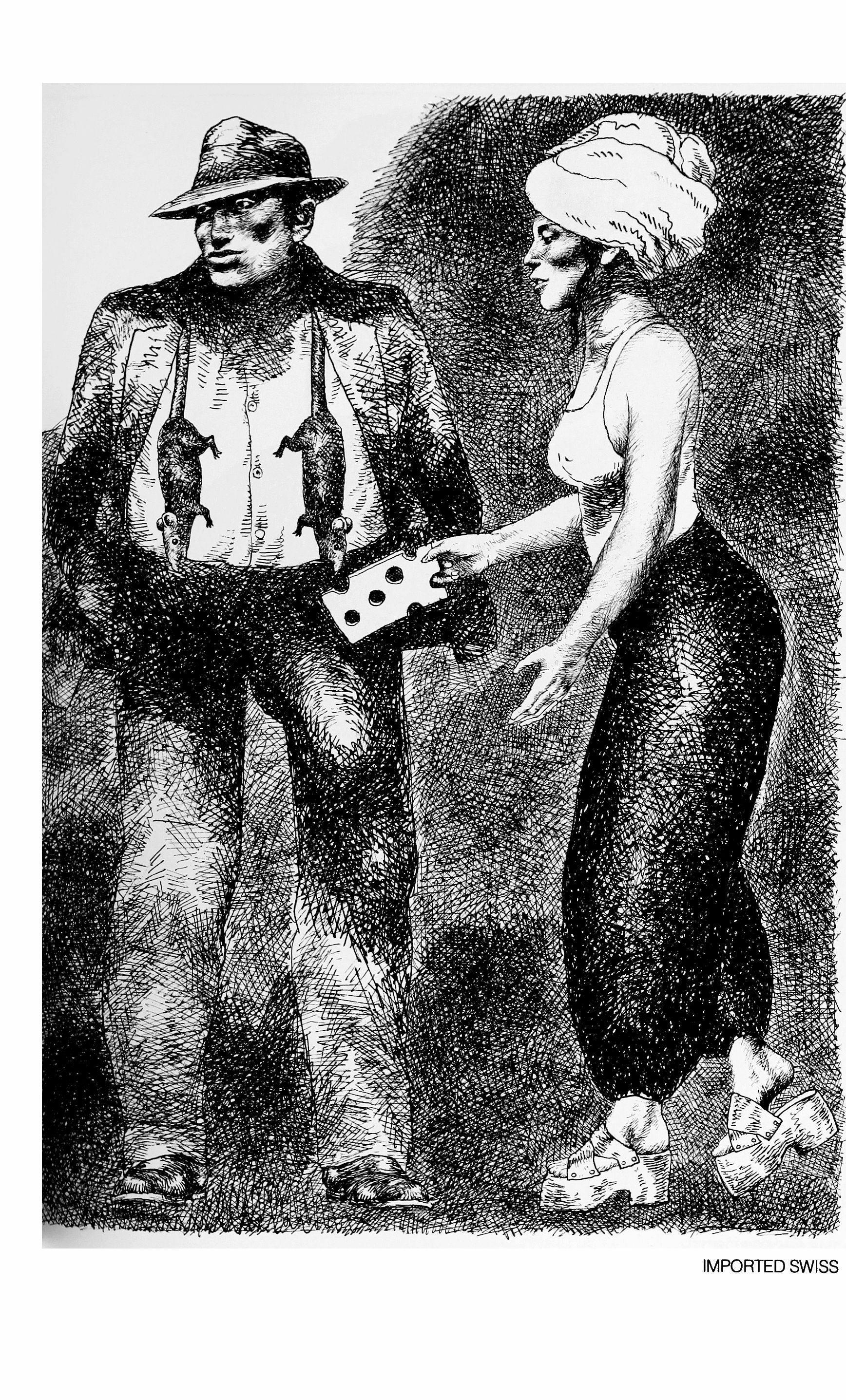
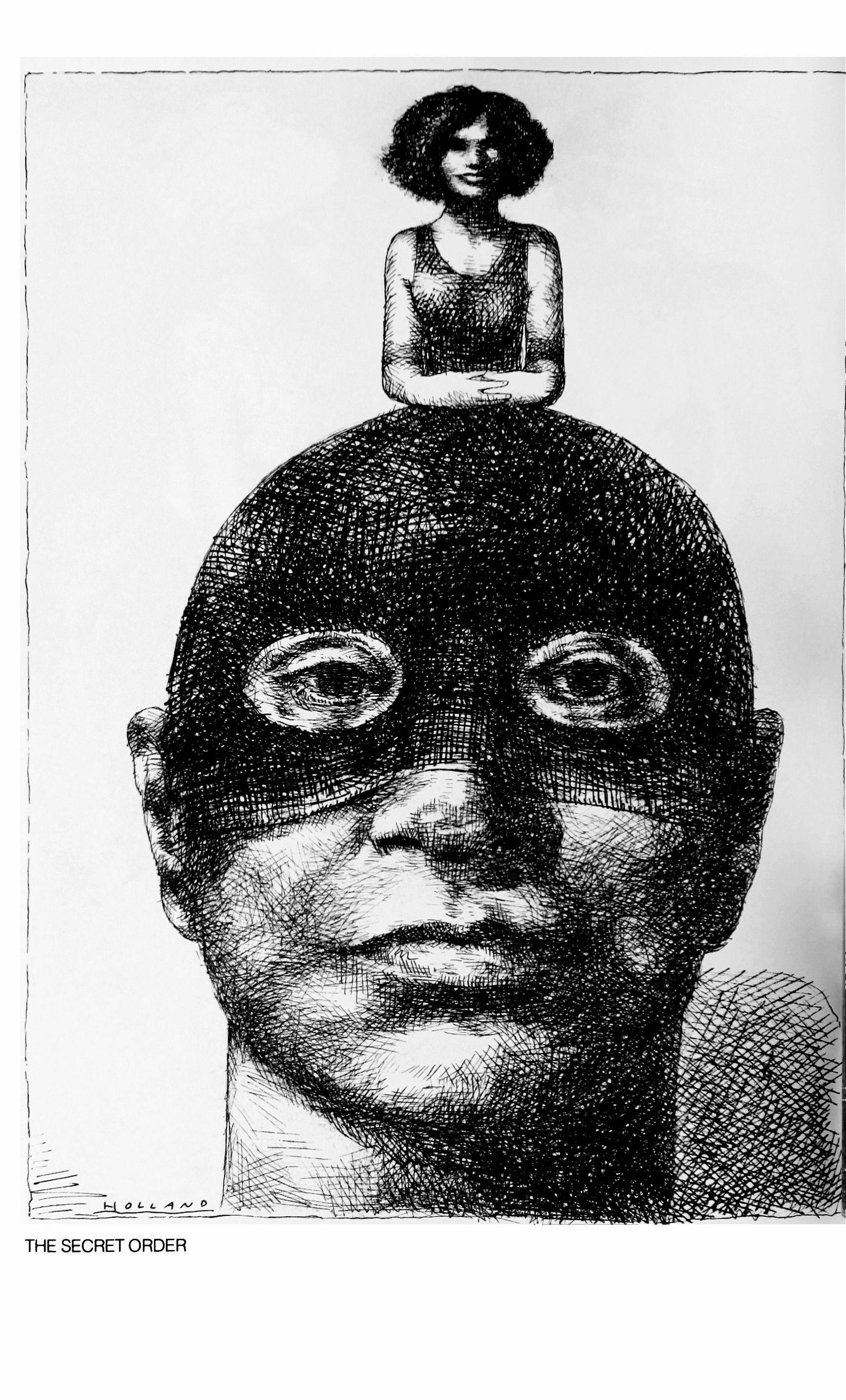
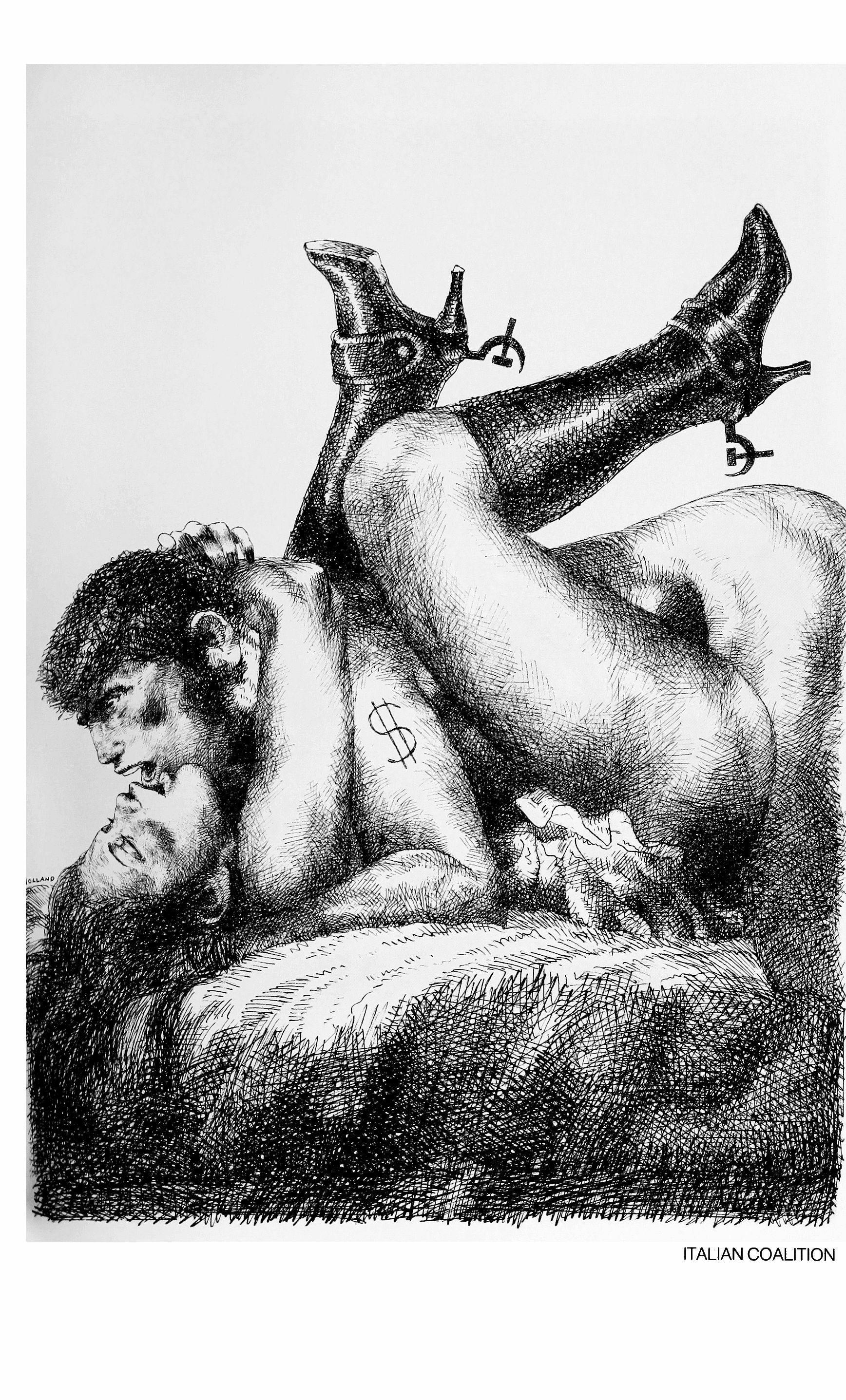
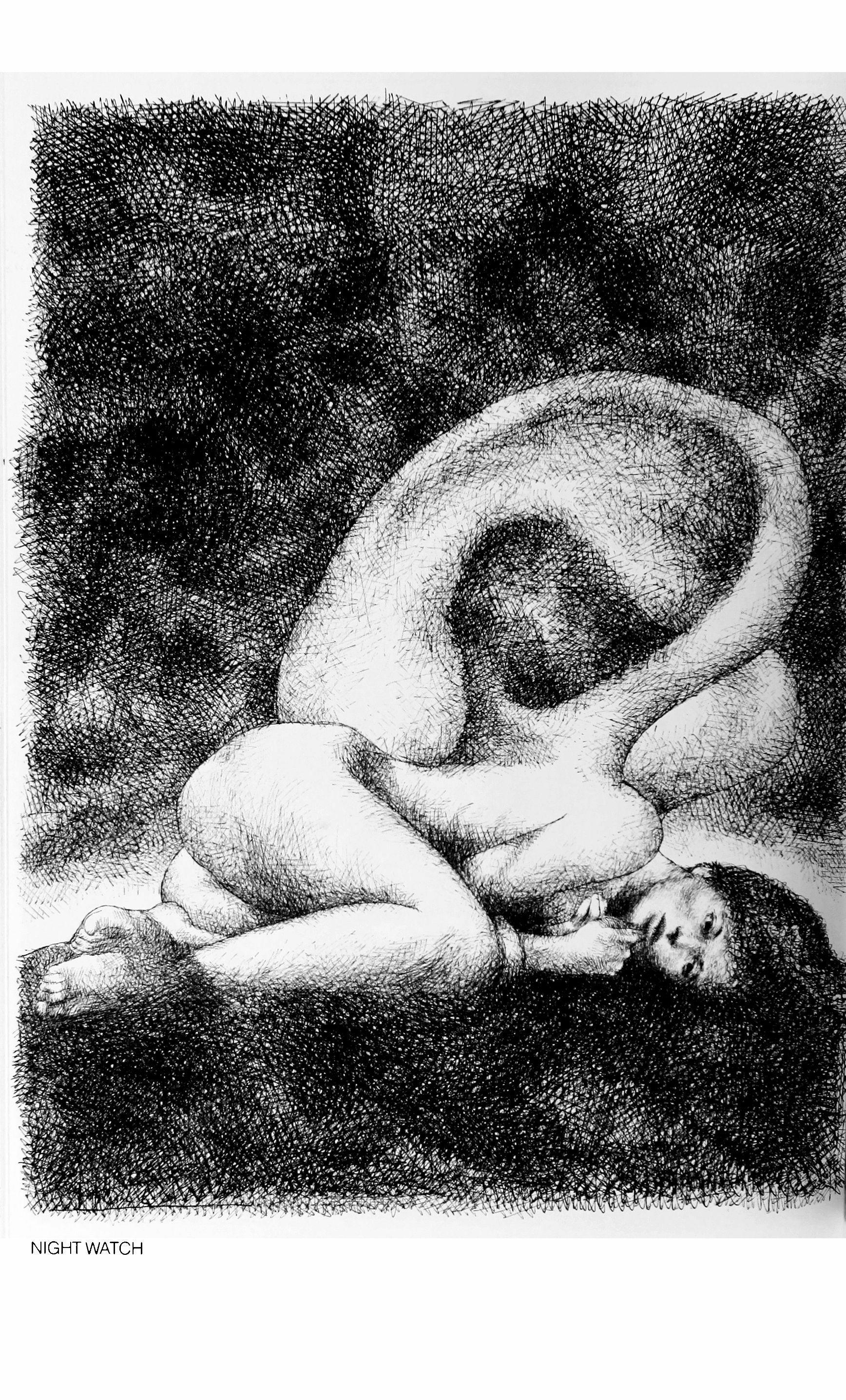
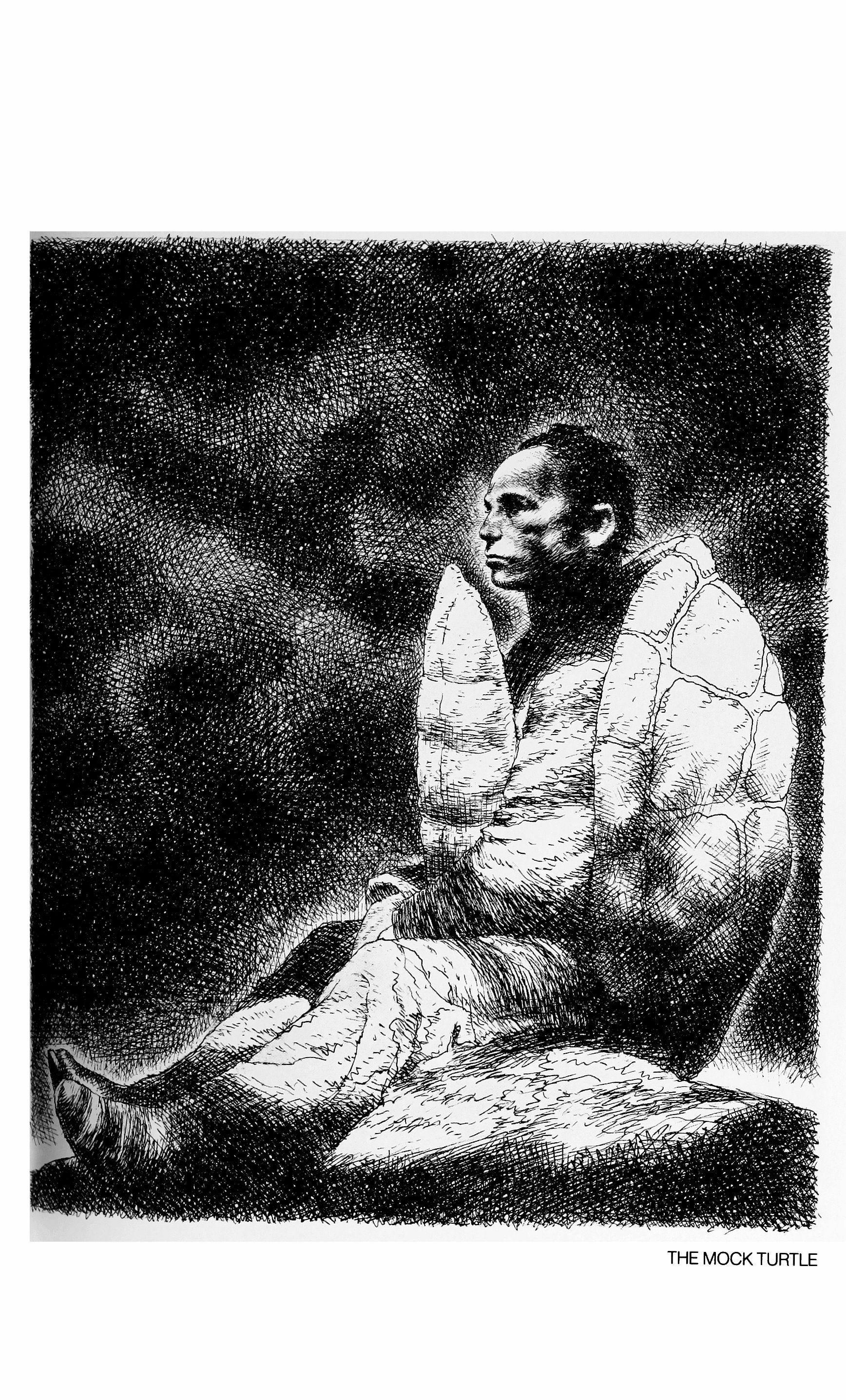
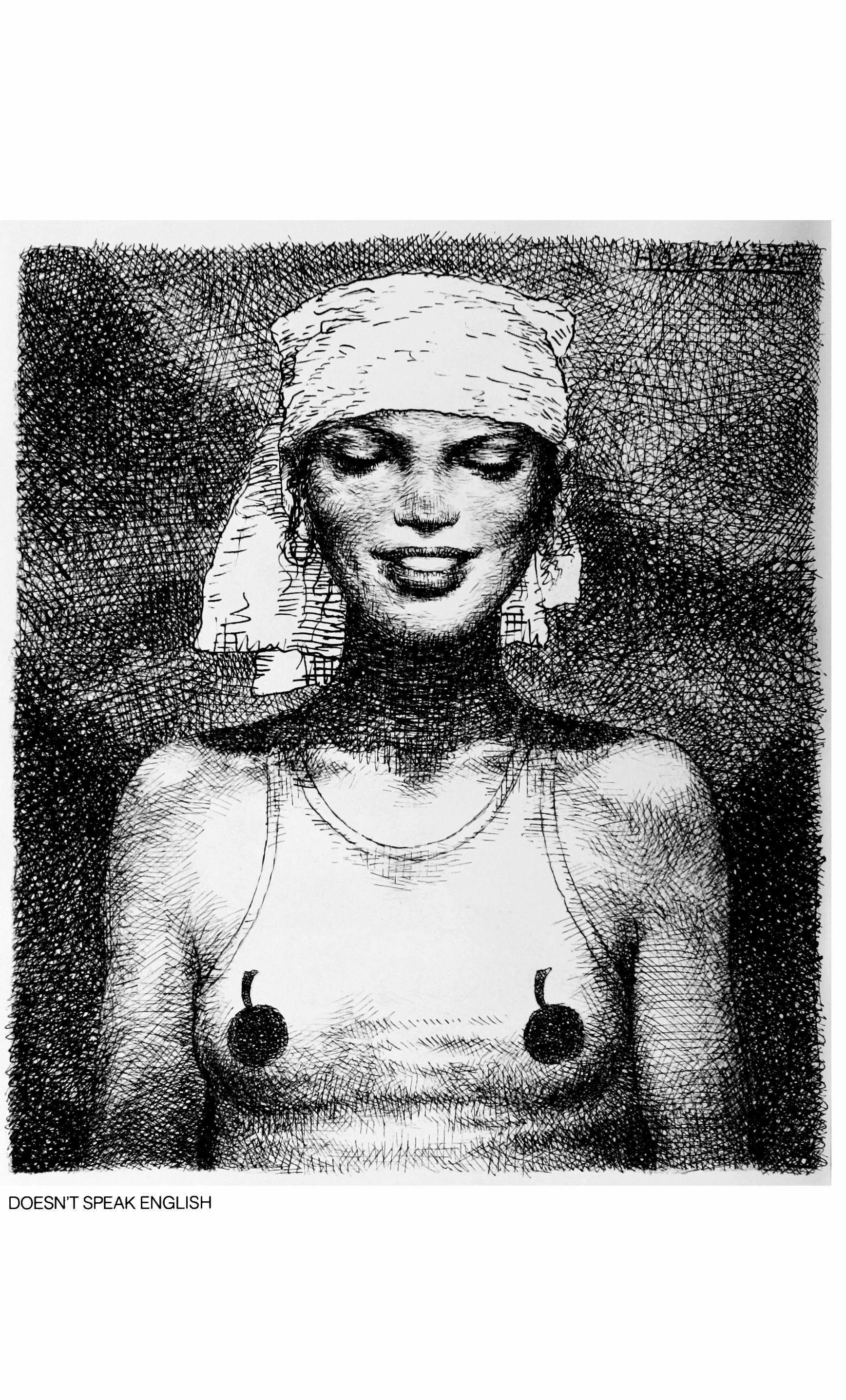
DOESN'T SPEAK ENGLISH

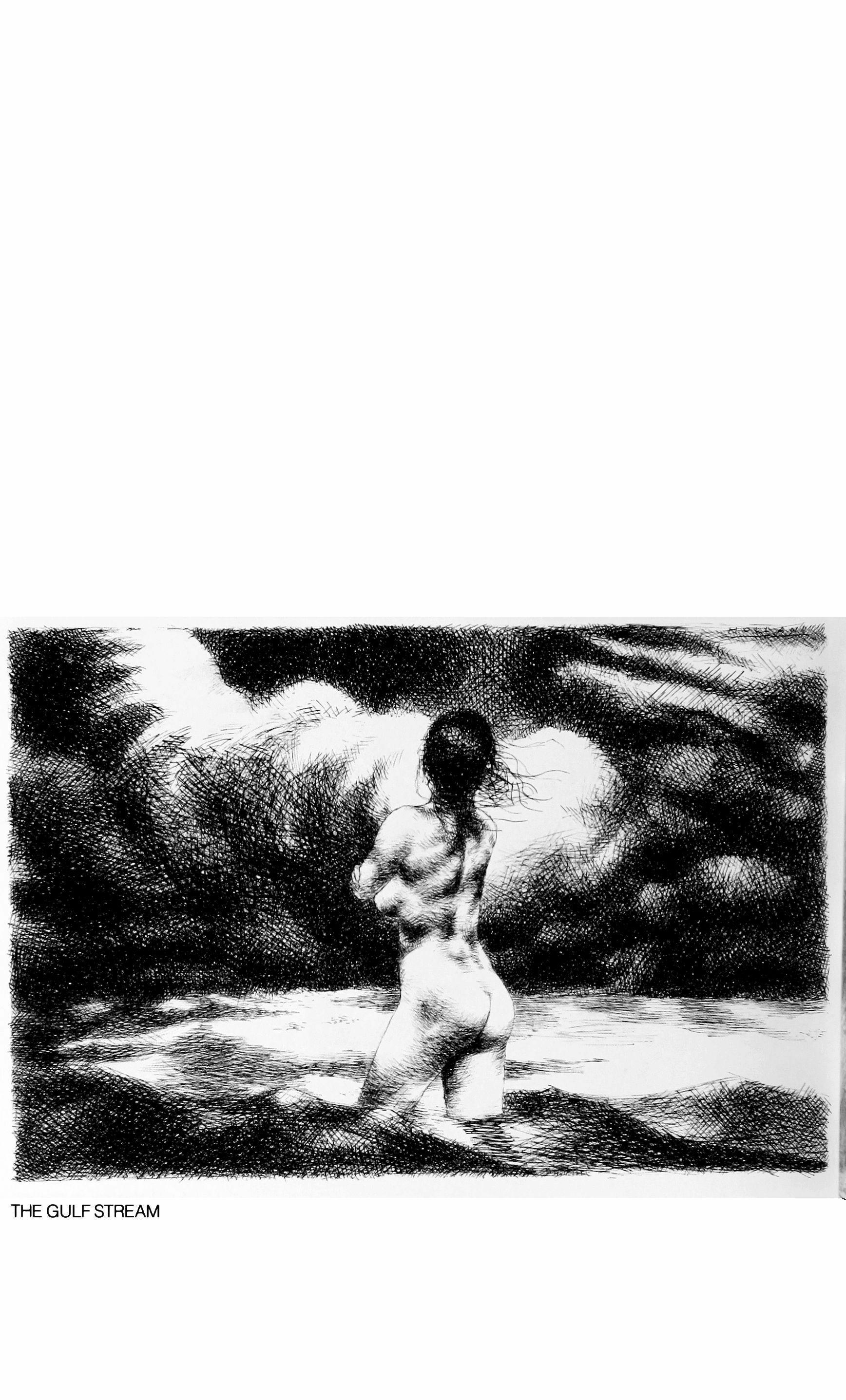
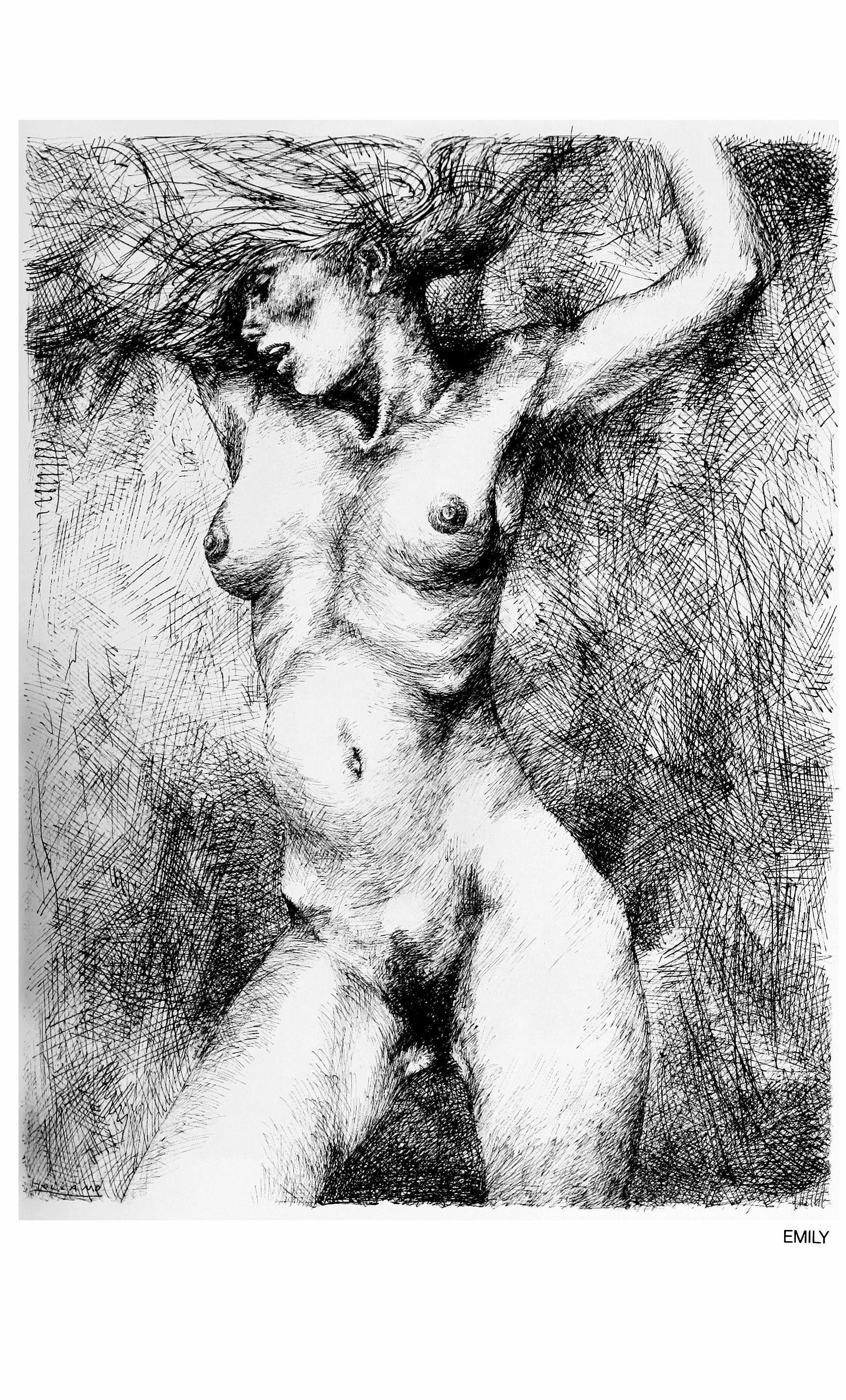
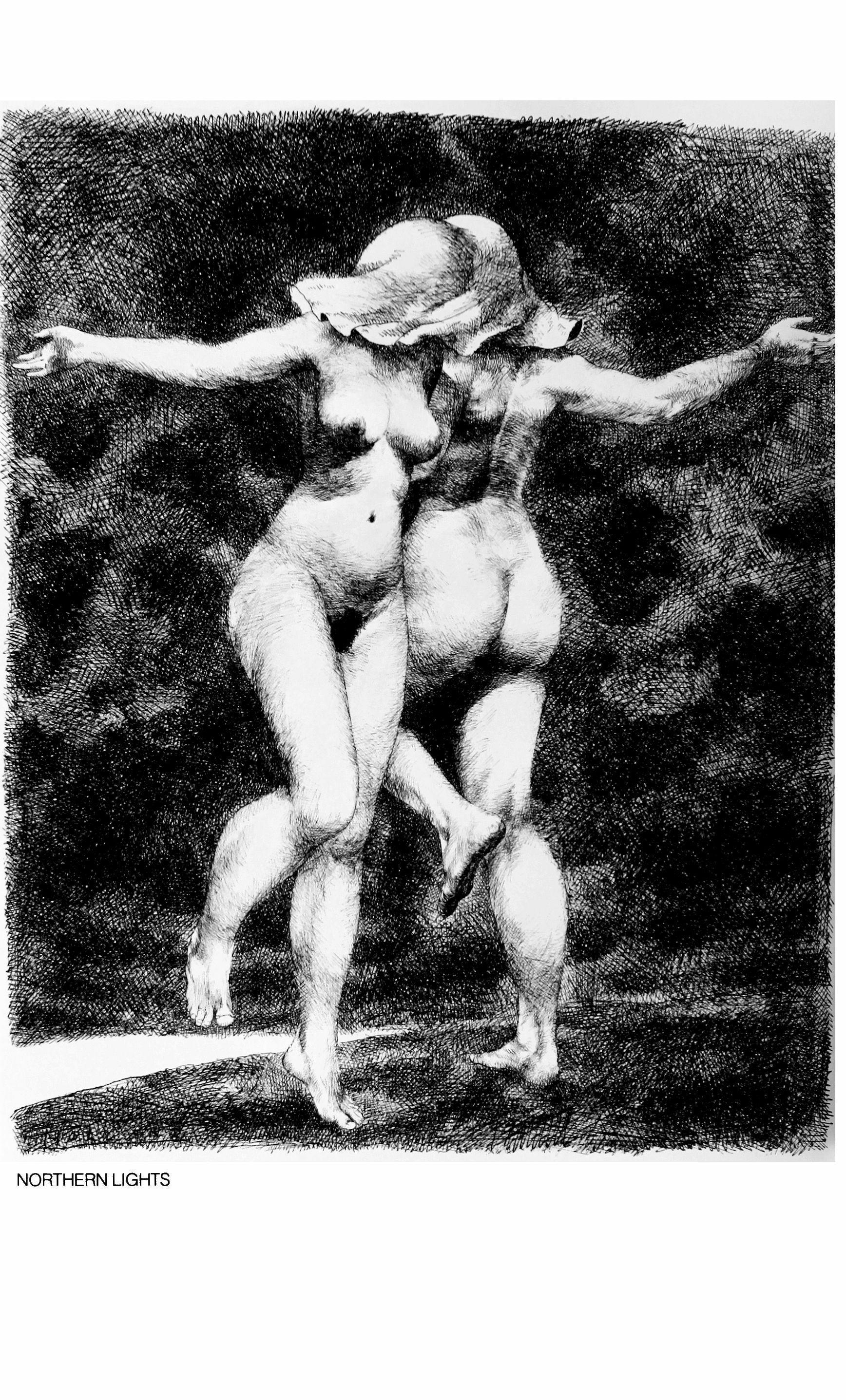
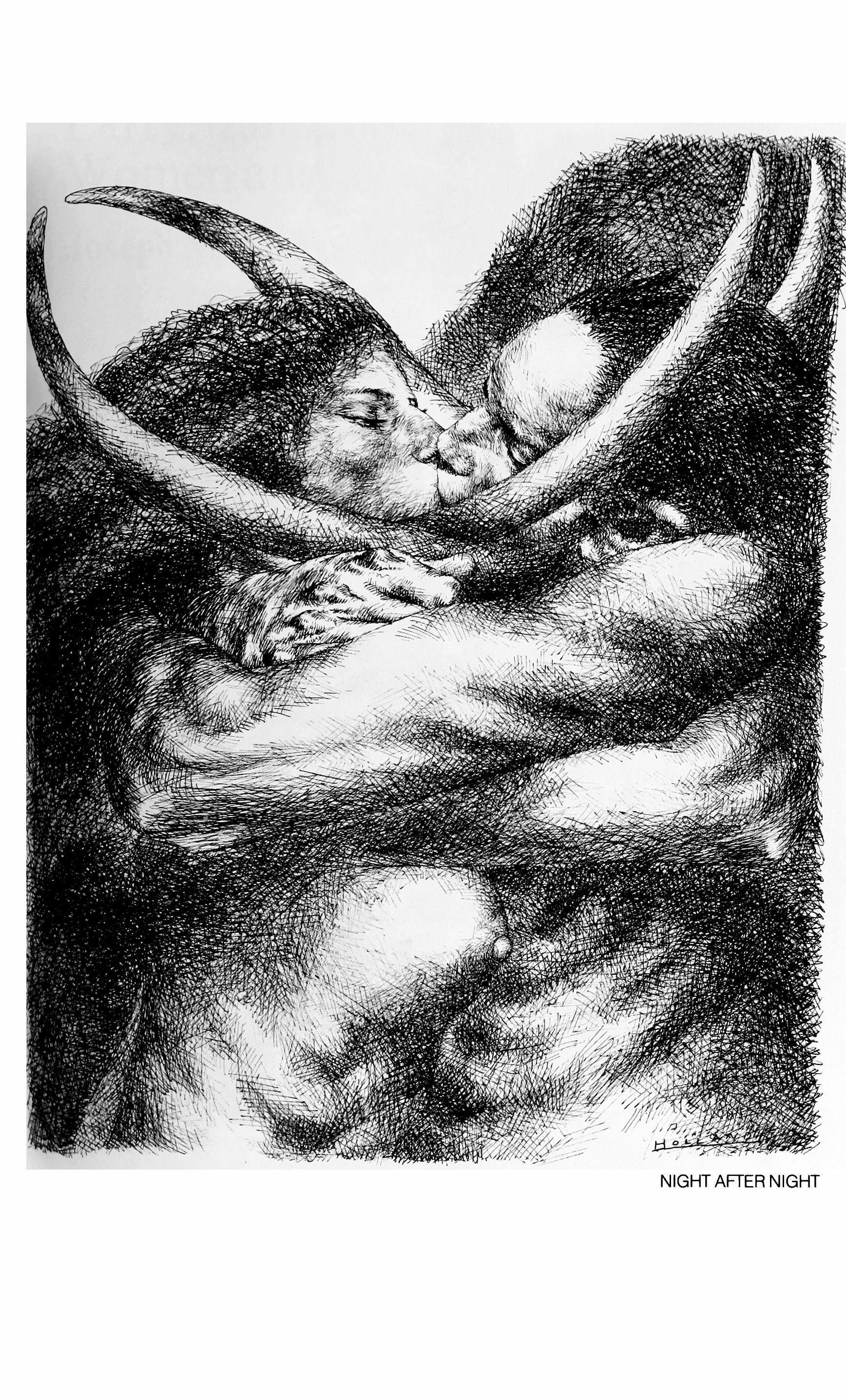
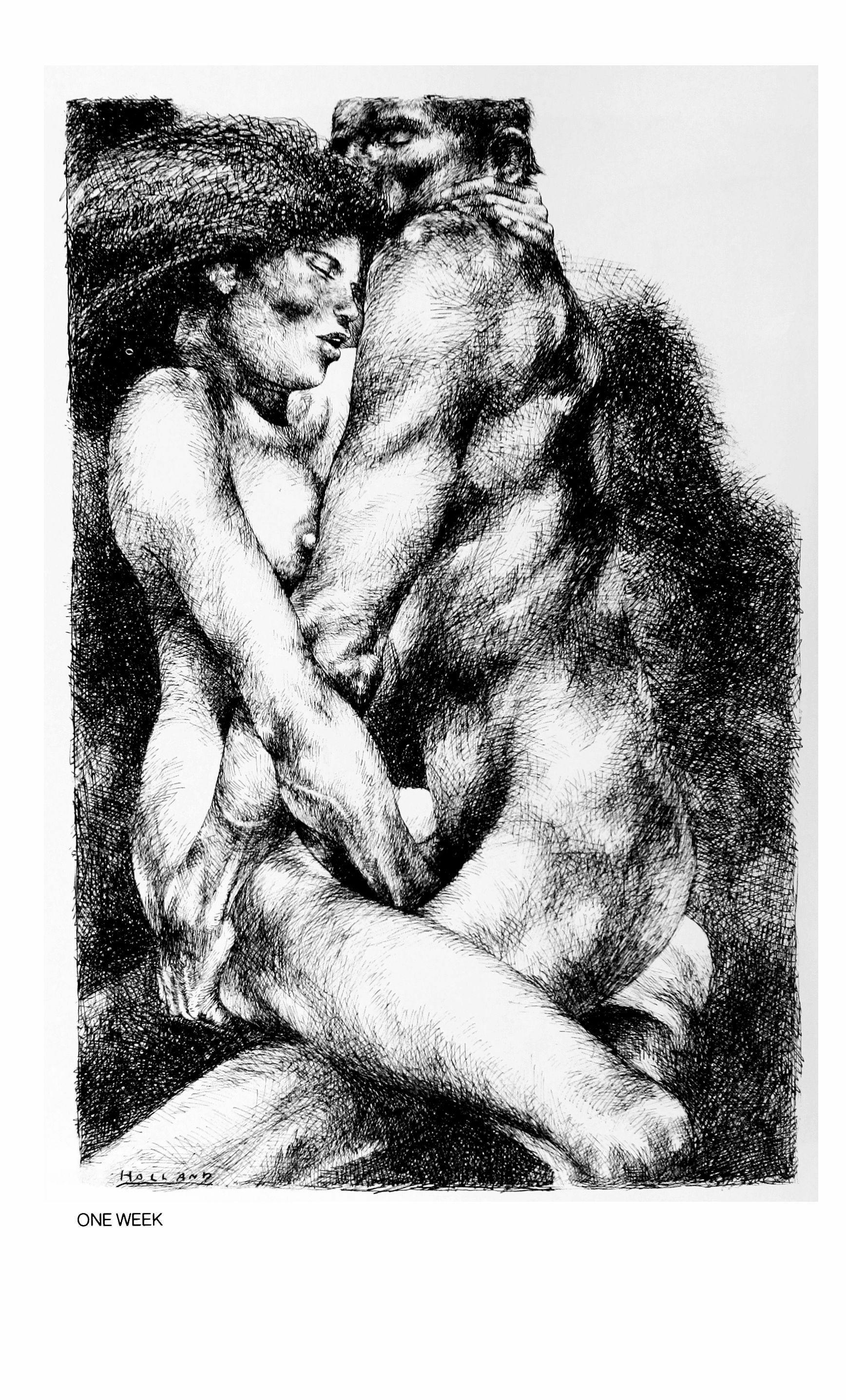
ONE WEEK
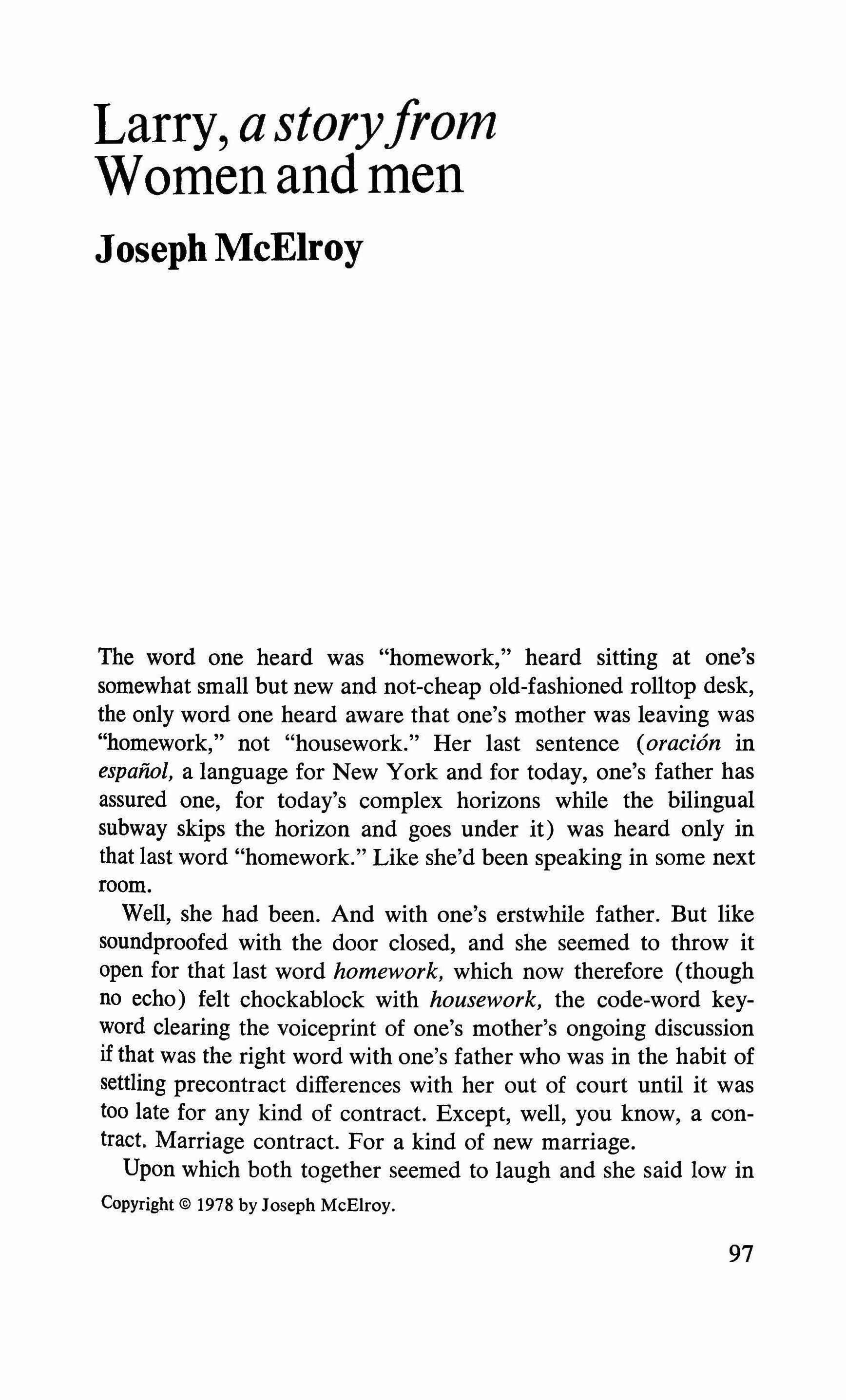
The word one heard was "homework," heard sitting at one's somewhat small but new and not-cheap old-fashioned rolltop desk, the only word one heard aware that one's mother was leaving was "homework," not "housework." Her last sentence (oraci6n in espaiiol, a language for New York and for today, one's father has assured one, for today's complex horizons while the bilingual subway skips the horizon and goes under it) was heard only in that last word "homework." Like she'd been speaking in some next room.
Well, she had been. And with one's erstwhile father. But like soundproofed with the door closed, and she seemed to throw it open for that last word homework, which now therefore (though no echo) felt chockablock with housework, the code-word keyword clearing the voiceprint of one's mother's ongoing discussion if that was the right word with one's father who was in the habit of settling precontract differences with her out of court until it was too late for any kind of contract. Except, well, you know, a contract. Marriage contract. For a kind of new marriage.
Upon which both together seemed to laugh and she said low in Copyright © 1978 by Joseph McElroy.

this direction not the phone's, "Oh Marv you know what I'd really" -succeeded by a murmur and murmur, and if not any more a liquor-snicker or a courting-snort at least a fickle chuckle and a pretty heavy sigh-"You look radiant!"-that came together into one untranstonguable impact in the next room the sincerity of which one did not wish to witness, having failed oneself to receive the incoming phone call (failed to make it one's own, failed to will that it be from Amy), while forced to witness one's parents in the next room in any case or along any curve clothed or unclothed, because one had acknowledged one's existence by answering the "homework"-ending sentence "Yeah" (the cornerstone of one's active vocabulary yet not one's private).
Well then, "Yeah," one answered, letting it slide off into the other things to be said to one's mother or for all that to one's father if one had found the thoughts to go with those things. Not "Yeah, Ma" or "Yeah, Mom," which she, naked or dressed, nude or unnude or denuded, objected to, but not "Yeah, Susan" (which she wants) either, because one does not feel right saying "Susan," which one's dad quite understands, and which one undertook to explain to him one Sunday morning amid much nodding of heads, first his, then one's, then his and his again and yet again, then out of pity one's own-out of pity or in time to Dad's rhythm, one's own head together or not quite, yet not with his then or now because often these days of raised consciousness he is too busy nodding, naked with one's mother nodding, nodding, naked together spooning yogurt together, spooning, dripping a blob of white-filmed apricot like it had a cottony mold on it off the end of his yogurt spoon, nodding so as to transcend one's own "Yeah" in answer to one's mother's mysterious oracion climaxed by the word homework, not assignment.
But one says assignment-one is in the big league if not big time, no longer in high school where assignment was also said, but college, for one is on the production-possibility frontier fully employed trading off guns and butter or highways and housing along all the points between no butter and all guns (dry) and no guns and all butter (sticky), the frontier (also called producttransformation curve) along whose arc are targeted all the points of well-oiled trade-off whereby one may surrender so many guns to get so much added butter or produce ten less butters to get two
more guns, and on this menu of choices, this curve of output-pairs -two million tons of food to fourteen million tractors, four million to twelve, six to ten--on this range of combinations, a week or more may be spent in the big time, the big league, firing one's rounds of animal fat (leading one's moving target) while spreading one's arms as widely as there's bread to spread them on, staying busy on the production-possibility frontier, not falling away inside it where

point U marks the warning flash for Unemployed Resources, big lag, let's say. For one is in college, one is in the flow now, one can split one's mind and for a second step outside the Gross National Product of which one is fast becoming a part and see that GNP equals Consumption plus Investment plus Government Expenditure, and see that if Net National Product is GNP less Depreciation, that's what one may also be joining, for, big time or not, one feels the onset of time's warp, and if one's tennis forehand is improving one yet feels a depreciation in, as one's father will say over his cocktail-hour joint, the quality of life, one sees this concretely and without bullshit in the cracked handball wall against which one lashes one's forehand or in the new distance from any such wall when one is at the Manhattan apartment of the revised junta and not in Port Adams though this has to do with the changed equation between one's married parents, and apparently not to do with what is no less true, that one is in college not high school any more with its occasional substitute teachers yet only in truth a potential continuum of substitute teachers, for one enjoyed modular classes in Port Adams, yes the school was often
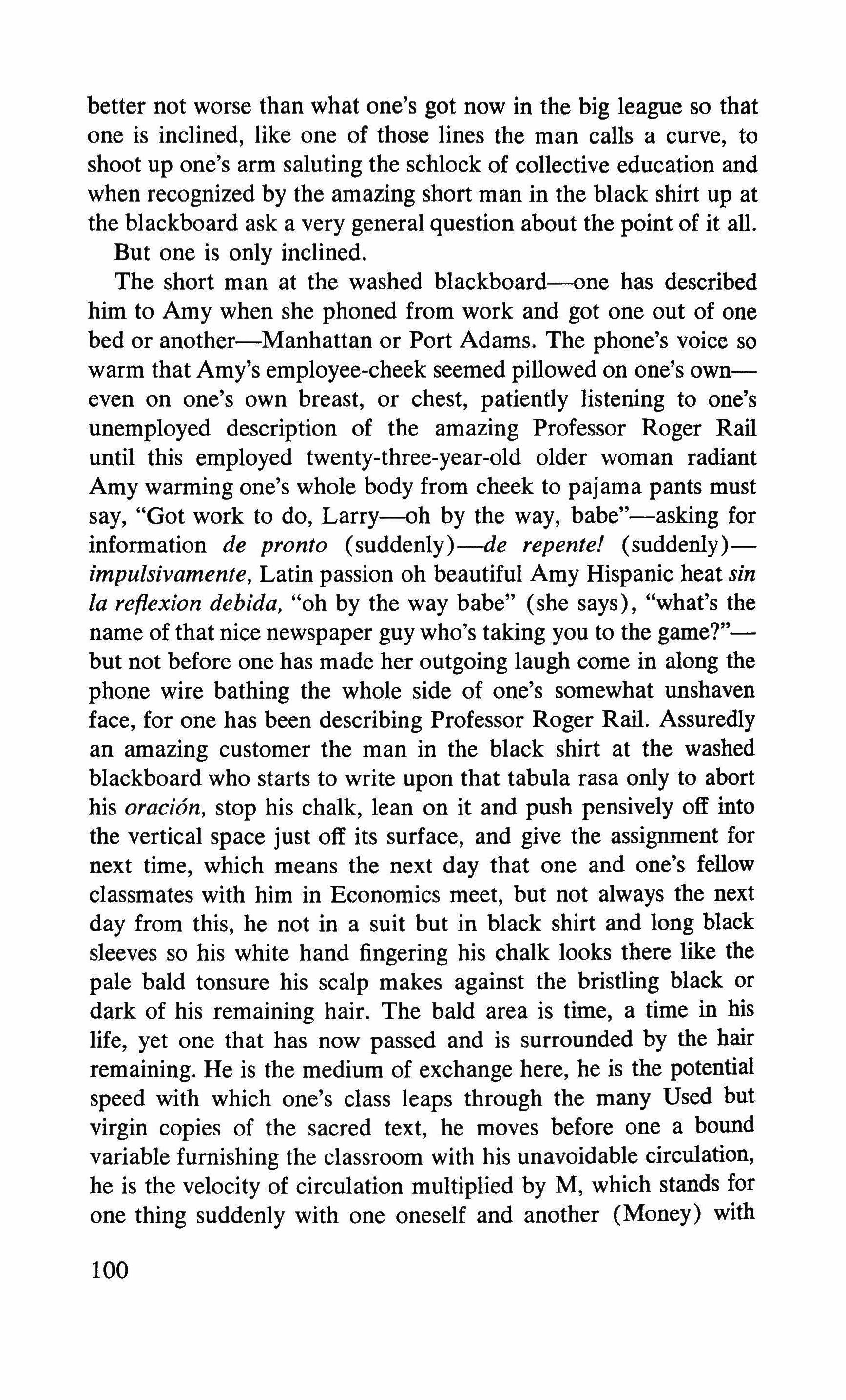
better not worse than what one's got now in the big league so that one is inclined, like one of those lines the man calls a curve, to shoot up one's arm saluting the schlock of collective education and when recognized by the amazing short man in the black shirt up at the blackboard ask a very general question about the point of it all.
But one is only inclined.
The short man at the washed blackboard-one has described him to Amy when she phoned from work and got one out of one bed or another-Manhattan or Port Adams. The phone's voice so warm that Amy's employee-cheek seemed pillowed on one's owneven on one's own breast, or chest, patiently listening to one's unemployed description of the amazing Professor Roger Rail until this employed twenty-three-year-old older woman radiant Amy warming one's whole body from cheek to pajama pants must say, "Got work to do, Larry-oh by the way, babe"-asking for information de pronto (suddenly)-de repente! (suddenly)impulsivamente, Latin passion oh beautiful Amy Hispanic heat sin la reflexion debida, "oh by the way babe" (she says), "what's the name of that nice newspaper guy who's taking you to the game?"but not before one has made her outgoing laugh come in along the phone wire bathing the whole side of one's somewhat unshaven face, for one has been describing Professor Roger Rail. Assuredly an amazing customer the man in the black shirt at the washed blackboard who starts to write upon that tabula rasa only to abort his oracion, stop his chalk, lean on it and push pensively off into the vertical space just off its surface, and give the assignment for next time, which means the next day that one and one's fellow classmates with him in Economics meet, but not always the next day from this, he not in a suit but in black shirt and long black sleeves so his white hand fingering his chalk looks there like the pale bald tonsure his scalp makes against the bristling black or dark of his remaining hair. The bald area is time, a time in his life, yet one that has now passed and is surrounded by the hair remaining. He is the medium of exchange here, he is the potential speed with which one's class leaps through the many Used but virgin copies of the sacred text, he moves before one a bound variable furnishing the classroom with his unavoidable circulation, he is the velocity of circulation multiplied by M, which stands for one thing suddenly with one oneself and another (Money) with 100
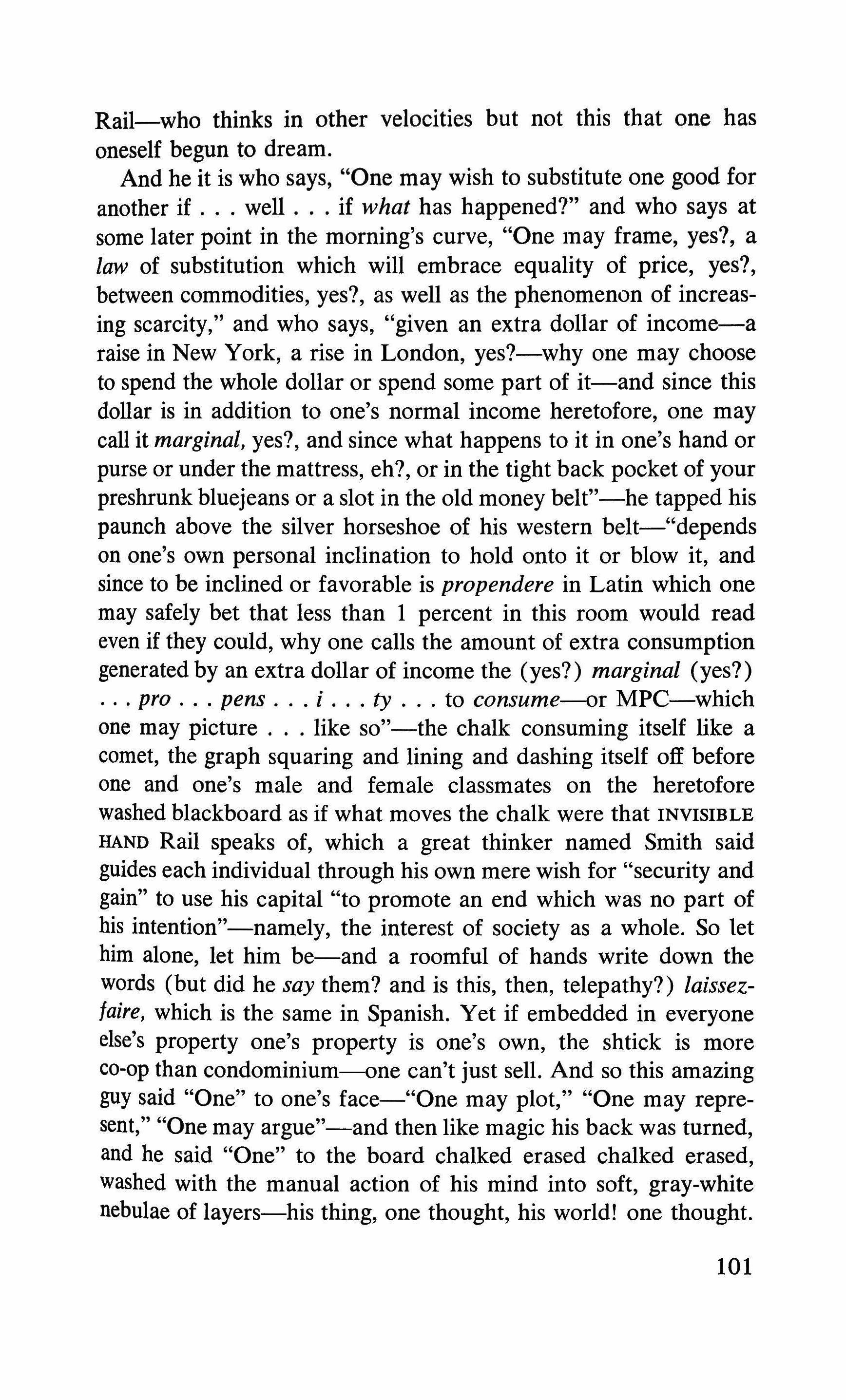
Rail-who thinks in other velocities but not this that one has oneself begun to dream.
And he it is who says, "One may wish to substitute one good for another if well if what has happened?" and who says at some later point in the morning's curve, "One may frame, yes?, a law of substitution which will embrace equality of price, yes?, between commodities, yes?, as well as the phenomenon of increasing scarcity," and who says, "given an extra dollar of income-a raise in New York, a rise in London, yes?-why one may choose to spend the whole dollar or spend some part of it-and since this dollar is in addition to one's normal income heretofore, one may call it marginal, yes?, and since what happens to it in one's hand or purse or under the mattress, eh?, or in the tight back pocket of your preshrunk bluejeans or a slot in the old money belt"-he tapped his paunch above the silver horseshoe of his western belt-"depends on one's own personal inclination to hold onto it or blow it, and since to be inclined or favorable is propendere in Latin which one may safely bet that less than 1 percent in this room would read even if they could, why one calls the amount of extra consumption generated by an extra dollar of income the (yes?) marginal (yes?) pro pens i ty to consume--or MPC-which one may picture like so"-the chalk consuming itself like a comet, the graph squaring and lining and dashing itself off before one and one's male and female classmates on the heretofore washed blackboard as if what moves the chalk were that INVISIBLE HAND Rail speaks of, which a great thinker named Smith said guides each individual through his own mere wish for "security and gain" to use his capital "to promote an end which was no part of his intention"-namely, the interest of society as a whole. So let him alone, let him be-and a roomful of hands write down the words (but did he say them? and is this, then, telepathy?) laissez[aire, which is the same in Spanish. Yet if embedded in everyone else's property one's property is one's own, the shtick is more co-op than condominium--one can't just sell. And so this amazing guy said "One" to one's face-"One may plot," "One may represent," "One may argue"-and then like magic his back was turned, and he said "One" to the board chalked erased chalked erased, washed with the manual action of his mind into soft, gray-white nebulae of layers-his thing, one thought, his world! one thought.
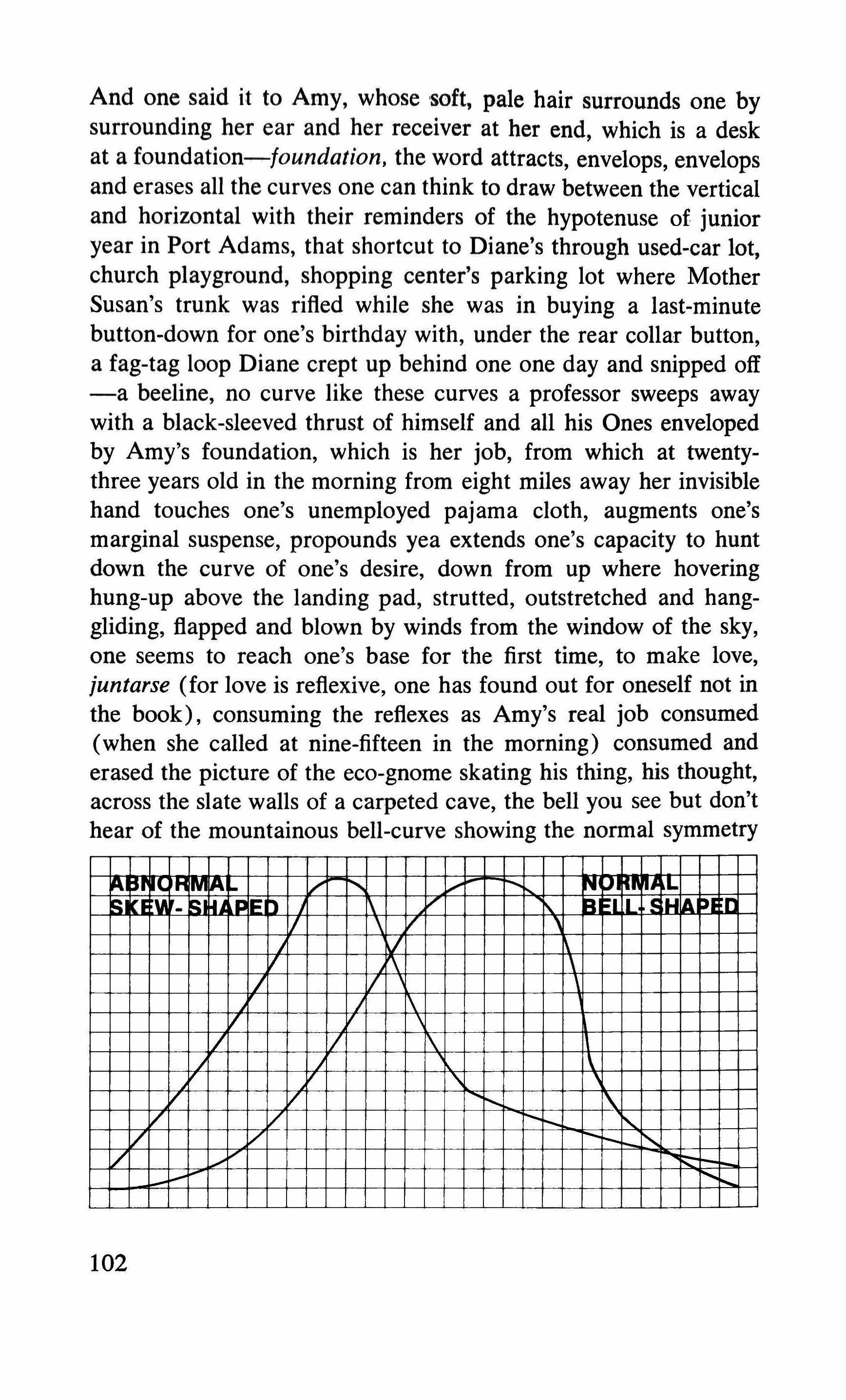
And one said it to Amy, whose 'soft, pale hair surrounds one by surrounding her ear and her receiver at her end, which is a desk at a foundation-foundation, the word attracts, envelops, envelops and erases all the curves one can think to draw between the vertical and horizontal with their reminders of the hypotenuse of junior year in Port Adams, that shortcut to Diane's through used-car lot, church playground, shopping center's parking lot where Mother Susan's trunk was rifled while she was in buying a last-minute button-down for one's birthday with, under the rear collar button, a fag-tag loop Diane crept up behind one one day and snipped off -a beeline, no curve like these curves a professor sweeps away with a black-sleeved thrust of himself and all his Ones enveloped by Amy's foundation, which is her job, from which at twentythree years old in the morning from eight miles away her invisible hand touches one's unemployed pajama cloth, augments one's marginal suspense, propounds yea extends one's capacity to hunt down the curve of one's desire, down from up where hovering hung-up above the landing pad, strutted, outstretched and hanggliding, flapped and blown by winds from the window of the sky, one seems to reach one's base for the first time, to make love, juntarse (for love is reflexive, one has found out for oneself not in the book), consuming the reflexes as Amy's real job consumed (when she called at nine-fifteen in the morning) consumed and erased the picture of the eco-gnome skating his thing, his thought, across the slate walls of a carpeted cave, the bell you see but don't hear of the mountainous bell-curve showing the normal symmetry
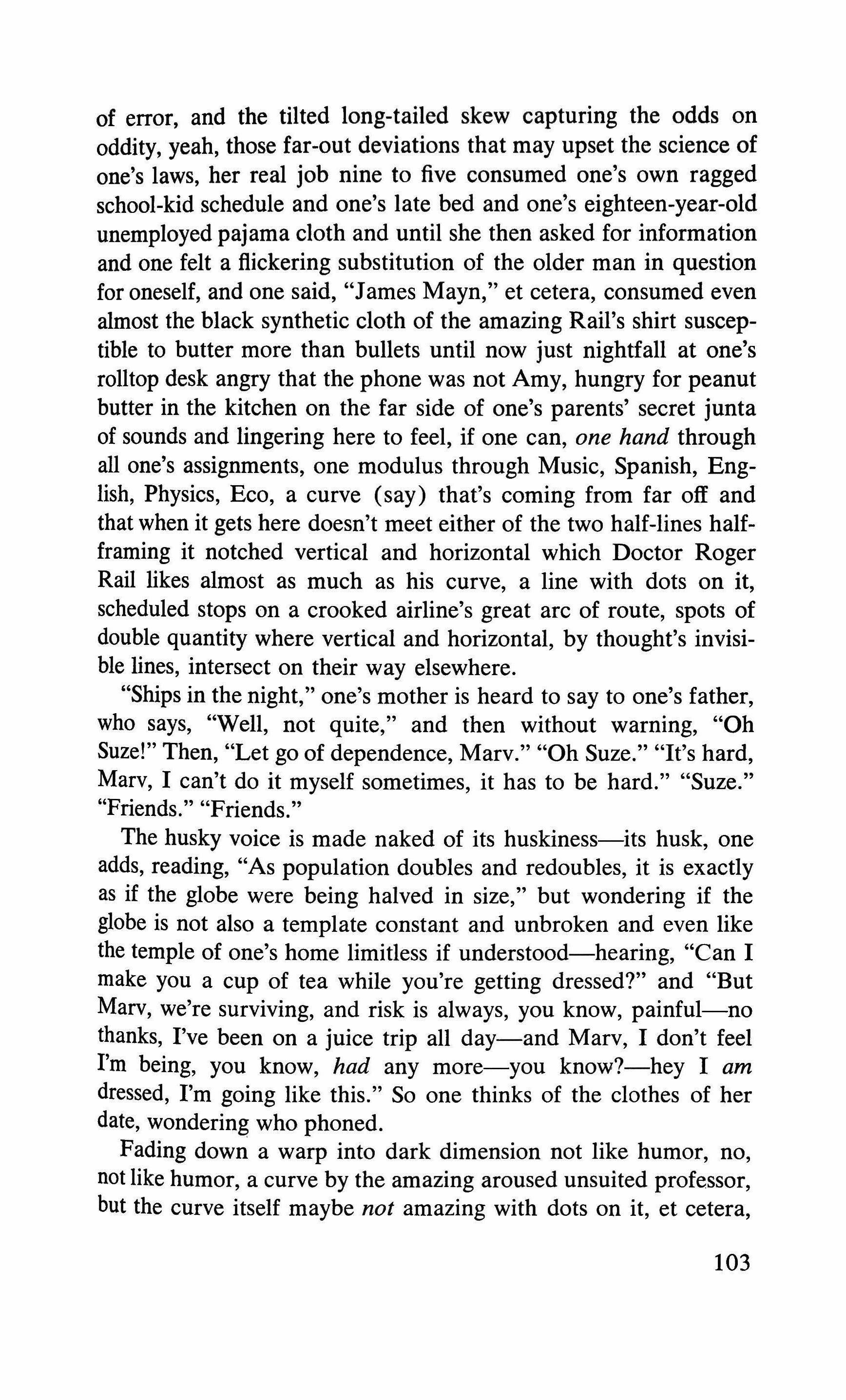
of error, and the tilted long-tailed skew capturing the odds on oddity, yeah, those far-out deviations that may upset the science of one's laws, her real job nine to five consumed one's own ragged school-kid schedule and one's late bed and one's eighteen-year-old unemployed pajama cloth and until she then asked for information and one felt a flickering substitution of the older man in question for oneself, and one said, "James Mayn," et cetera, consumed even almost the black synthetic cloth of the amazing Rail's shirt susceptible to butter more than bullets until now just nightfall at one's rolltop desk angry that the phone was not Amy, hungry for peanut butter in the kitchen on the far side of one's parents' secret junta of sounds and lingering here to feel, if one can, one hand through all one's assignments, one modulus through Music, Spanish, English, Physics, Eco, a curve (say) that's coming from far off and that when it gets here doesn't meet either of the two half-lines halfframing it notched vertical and horizontal which Doctor Roger Rail likes almost as much as his curve, a line with dots on it, scheduled stops on a crooked airline's great arc of route, spots of double quantity where vertical and horizontal, by thought's invisible lines, intersect on their way elsewhere.
"Ships in the night," one's mother is heard to say to one's father, who says, "Well, not quite," and then without warning, "Oh Suze!" Then, "Let go of dependence, Marv." "Oh Suze." "It's hard, Marv, I can't do it myself sometimes, it has to be hard." "Suze." "Friends." "Friends."
The husky voice is made naked of its huskiness-its husk, one adds, reading, "As population doubles and redoubles, it is exactly as if the globe were being halved in size," but wondering if the globe is not also a template constant and unbroken and even like the temple of one's home limitless if understood-hearing, "Can I make you a cup of tea while you're getting dressed?" and "But Marv, we're surviving, and risk is always, you know, painful-no thanks, I've been on a juice trip all day-and Marv, I don't feel I'm being, you know, had any more-you know?-hey I am dressed, I'm going like this." So one thinks of the clothes of her date, wondering who phoned.
Fading down a warp into dark dimension not like humor, no, not like humor, a curve by the amazing aroused unsuited professor, but the curve itself maybe not amazing with dots on it, et cetera,
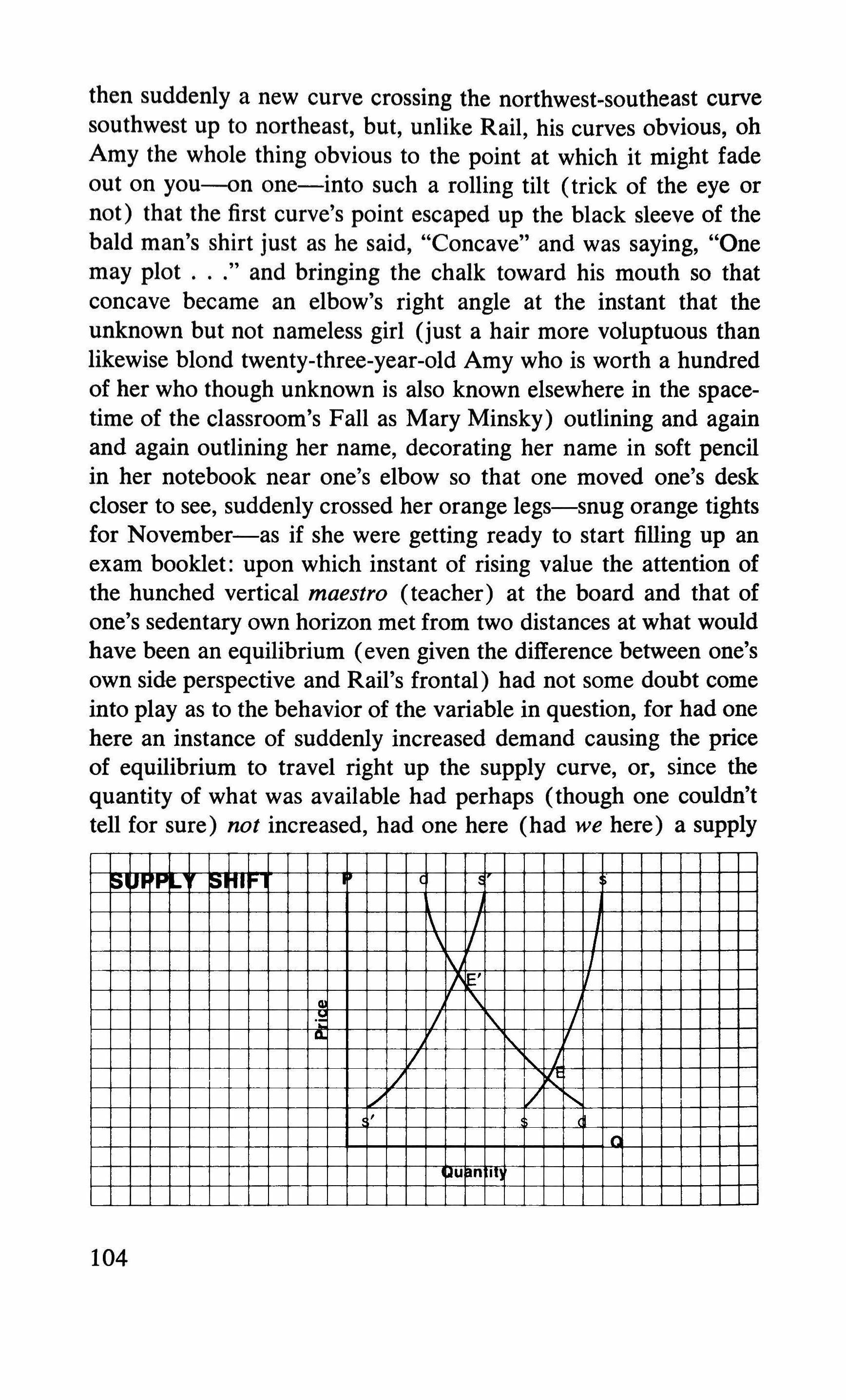
then suddenly a new curve crossing the northwest-southeast curve southwest up to northeast, but, unlike Rail, his curves obvious, oh Amy the whole thing obvious to the point at which it might fade out on you-on one-into such a rolling tilt (trick of the eye or not) that the first curve's point escaped up the black sleeve of the bald man's shirt just as he said, "Concave" and was saying, "One may plot ." and bringing the chalk toward his mouth so that concave became an elbow's right angle at the instant that the unknown but not nameless girl (just a hair more voluptuous than likewise blond twenty-three-year-old Amy who is worth a hundred of her who though unknown is also known elsewhere in the spacetime of the classroom's Fall as Mary Minsky) outlining and again and again outlining her name, decorating her name in soft pencil in her notebook near one's elbow so that one moved one's desk closer to see, suddenly crossed her orange legs-snug orange tights for November-as if she were getting ready to start filling up an exam booklet: upon which instant of rising value the attention of the hunched vertical maestro (teacher) at the board and that of one's sedentary own horizon met from two distances at what would have been an equilibrium (even given the difference between one's own side perspective and Rail's frontal) had not some doubt come into playas to the behavior of the variable in question, for had one here an instance of suddenly increased demand causing the price of equilibrium to travel right up the supply curve, or, since the quantity of what was available had perhaps (though one couldn't tell for sure) not increased, had one here (had we here) a supply

shift where the commodity or good becomes harder to get (whether really lessened or artificially lessened) so that equilibrium price now traveled leftward up the demand curve? Was she, in short, primarily more in demand or was there suddenly less of her available, as the eye ran neutrally landing here upon all her points curving always through the locus of all her possible points into the void of one's own surplus shortage opening around one a space of fifty-minute hours bound into an autumn of weeks during which the class's course deepened and was the same, was nothing next to all that came between each gradually numberless class-meeting, was also one room one went on in from one point to another, straight or around, until against the trips between two parents in one home, between two homes instead of one, two domiciles with one empty ceiling on what to expect, between two parents become one-at-a-time-in-their-lives, the points thrown out by the amazing Rail could sometimes seem one conscious curve of all historyresources, costs, alternatives, the menu of choices along the production-possibility frontier-at the same time that as one smiled at his salt and gusto and the pomp of his sheer brain, his One everlasting and his fractions fractured by fractions, the incestuous blackboard deepening from rasure to rasa (while cielo raso, ceiling, is now not above but adelante, before), and his secret yen (he said) to open up the Rockefellers, dissolve the mysteries of distribution and oligopoly pricing to see strange profits rise during recession like energy made of nothing, new pride out of depression, one might fall inertly or grow into the inner or under concavity described by Rail's waterfall contoured down the big blackboard with such allegria, such potencia, such Latin heat, and so repente that the snap of the chalk split in mid-course released from the class en conjunto a laugh of relief that, across the cosmic vacancy of the board he had been moved to saltar de gozo, leap with joyexaltacionarse if one's dictionary can hold such a word-pouring, precipitating, sending that curve down that slate sky to transcend, beat, swamp, wipe out points, and show concavity itself, that the maestro may muestre how a bowed-out, concave curvature of the production-possibility frontier depicts the "law of increasing relative costs." But the waterfall was due to retract its short life, for the red-faced, bearded student Donald-Donald Dooley-who came with knapsack crammed to the seams and topped by a tight-rolled
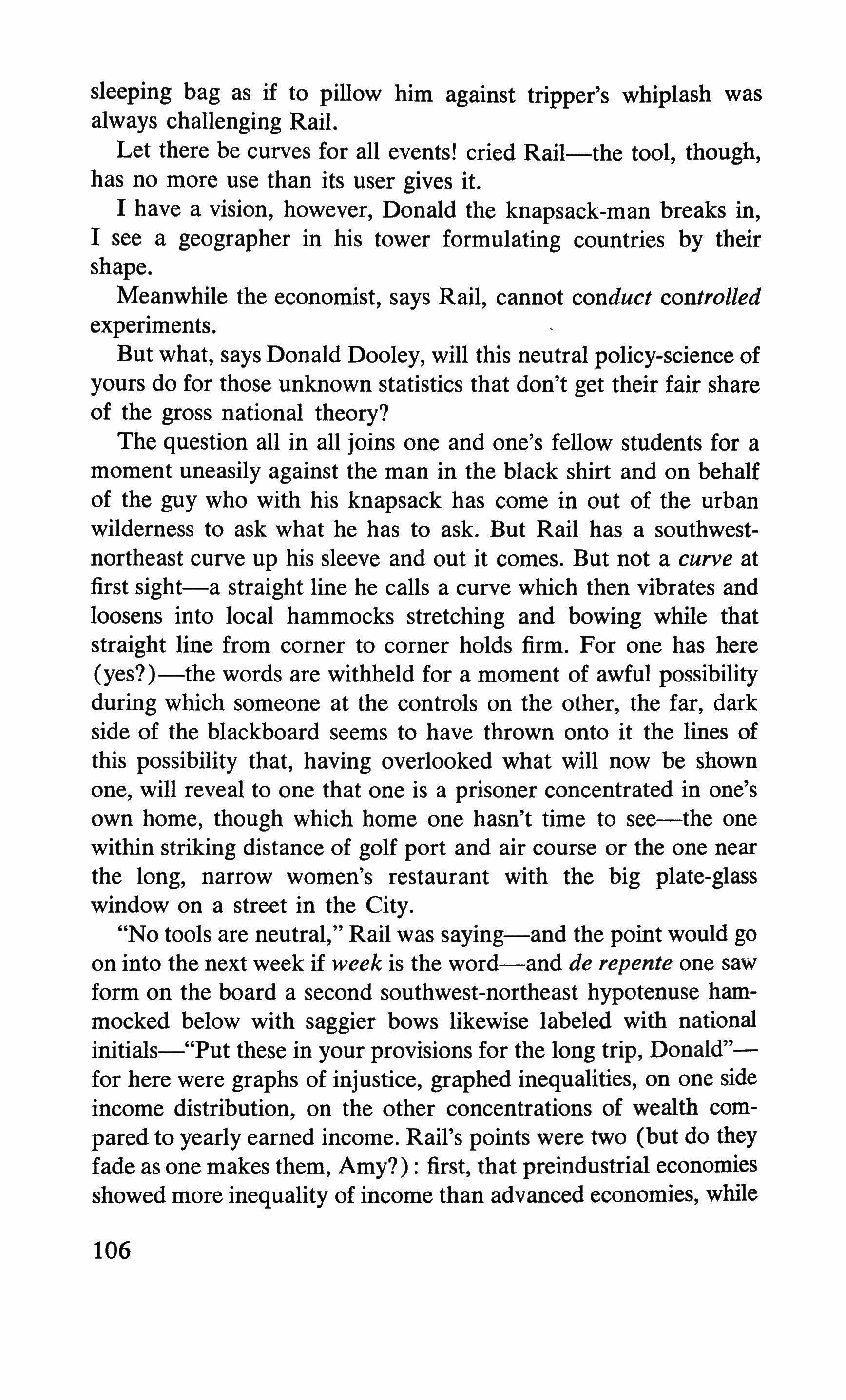
sleeping bag as if to pillow him against tripper's whiplash was always challenging Rail.
Let there be curves for all events! cried Rail-the tool, though, has no more use than its user gives it.
I have a vision, however, Donald the knapsack-man breaks in, I see a geographer in his tower formulating countries by their shape.
Meanwhile the economist, says Rail, cannot conduct controlled experiments.
But what, says Donald Dooley, will this neutral policy-science of yours do for those unknown statistics that don't get their fair share of the gross national theory?
The question all in all joins one and one's fellow students for a moment uneasily against the man in the black shirt and on behalf of the guy who with his knapsack has come in out of the urban wilderness to ask what he has to ask. But Rail has a southwestnortheast curve up his sleeve and out it comes. But not a curve at first sight-a straight line he calls a curve which then vibrates and loosens into local hammocks stretching and bowing while that straight line from corner to corner holds firm. For one has here (yes?)-the words are withheld for a moment of awful possibility during which someone at the controls on the other, the far, dark side of the blackboard seems to have thrown onto it the lines of this possibility that, having overlooked what will now be shown one, will reveal to one that one is a prisoner concentrated in one's own home, though which home one hasn't time to see-the one within striking distance of golf port and air course or the one near the long, narrow women's restaurant with the big plate-glass window on a street in the City.
"No tools are neutral," Rail was saying-and the point would go on into the next week if week is the word-and de repente one saw form on the board a second southwest-northeast hypotenuse hammocked below with saggier bows likewise labeled with national initials-"Put these in your provisions for the long trip, Donald"for here were graphs of injustice, graphed inequalities, on one side income distribution, on the other concentrations of wealth compared to yearly earned income. Rail's points were two (but do they fade as one makes them, Amy?) : first, that preindustrial economies showed more inequality of income than advanced economies, while

holdings of wealth were spread less equally in advanced economies than are annual earned incomes; second, that these inequality curves implied in advance a wish to guard against extreme inequali? ties, yes.
But while all eyes turned to Donald Dooley's quite electrifying "No!" and to his combed barba and his blue-eyed iron and the lumps and pricks and metal-looking edges packing the khaki knapsack occupying the desk seat beside his, one's own eyes found in the silver horseshoe bell-curve lying on its side buckling Rail's belt and half-hidden in the stress of his paunch, the making of new equals, like equations so weird that like digits on the same Invisible Hand their kinship was the void with which they threatened sight. Hey!
And while one heard the campus camper Donald the survivor al campo raso, the viajero yautostopista, retort in another medium but like a standard metal template laid down for pattern, "You're telling us those curves defend the workingman under capitalism but you know as well as I do except it doesn't freak you out that they secretly annihilate socialism, and those curves whatever you call them are next-door neighbor to that Italian Pareto whom you yourself would never call a Fascist maniac" (laughter set loose in the room, rising like hope, falling like breath, like eyes before staringpower), "yes that Fascist statistician who made those charts you know that show that income is distributed the same in all countries no matter what political institution and tax system you have, and as for no controlled experiment, Doctor Rail, what about the man in the big bank across the river-what's his name? you know?-who says O.K., guys, we raise the interest rate tomorrow morning, and Doctor Rail none of your equations is telling us that the workers spend what they get and the capitalists get what they spend and telling us that we own 75 percent of the world through multinationals and if you want the GNP of Iran your same old equation C plus I plus G ought to be divided by CIA-because the CIA rents Iran, Mon," one found Rail looking at one and saying what he then seemed to see that one knew (though perhaps not able to imagine one looking back to the night when one had leaped beyond, leaped ahead of, next day's assignment through the skewed and sacred text like a diviner celebrating chance), "Lorenz curve, Donald, Lorenz curve," but Dooley cried, "What is Economics,
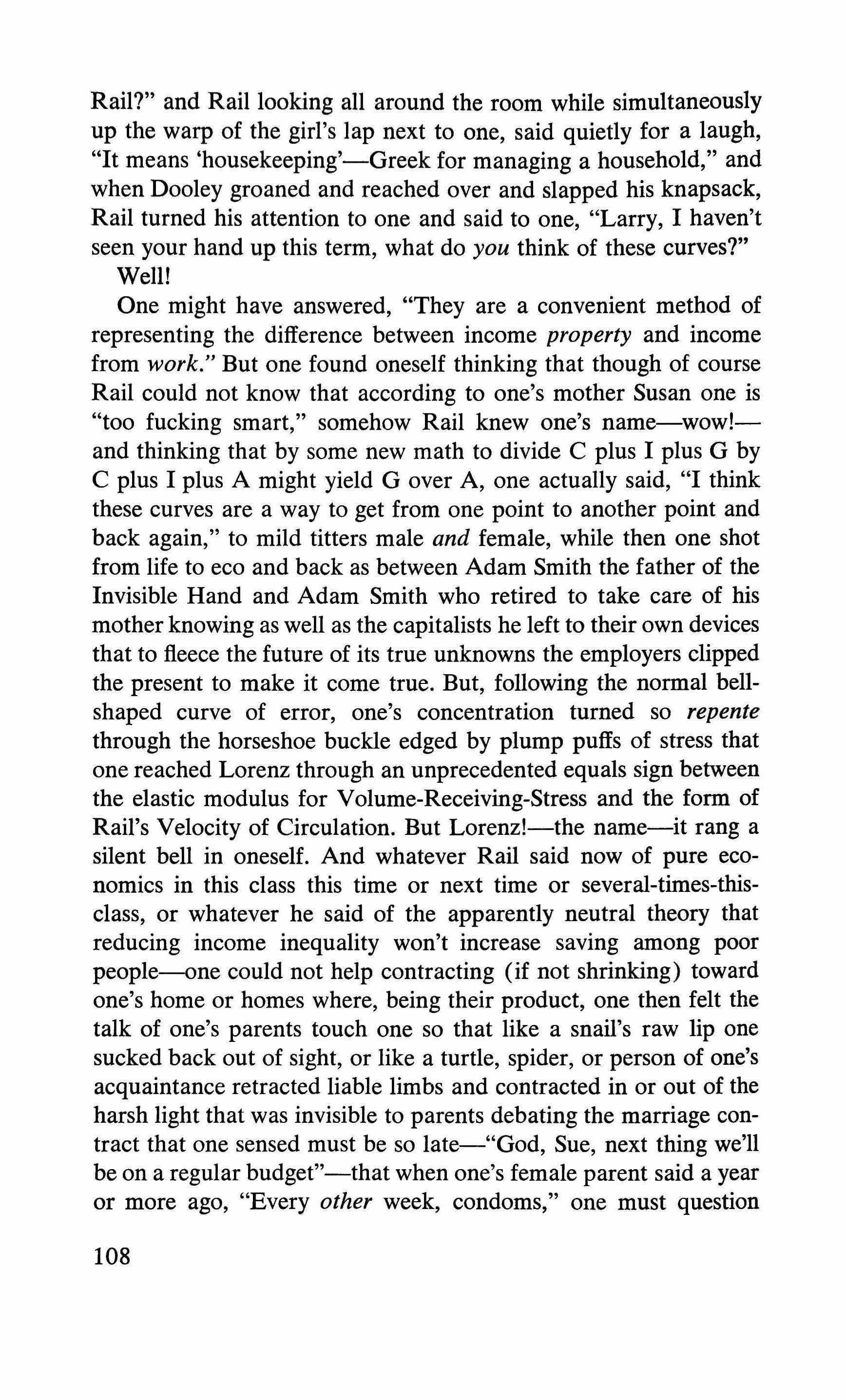
Rail?" and Rail looking all around the room while simultaneously up the warp of the girl's lap next to one, said quietly for a laugh, "It means 'housekeeping'-Greek for managing a household," and when Dooley groaned and reached over and slapped his knapsack, Rail turned his attention to one and said to one, "Larry, I haven't seen your hand up this term, what do you think of these curves?"
WeIll
One might have answered, "They are a convenient method of representing the difference between income property and income from work." But one found oneself thinking that though of course Rail could not know that according to one's mother Susan one is "too fucking smart," somehow Rail knew one's name-wowland thinking that by some new math to divide C plus I plus G by C plus I plus A might yield G over A, one actually said, "I think these curves are a way to get from one point to another point and back again," to mild titters male and female, while then one shot from life to eco and back as between Adam Smith the father of the Invisible Hand and Adam Smith who retired to take care of his mother knowing as well as the capitalists he left to their own devices that to fleece the future of its true unknowns the employers clipped the present to make it come true. But, following the normal bellshaped curve of error, one's concentration turned so repente through the horseshoe buckle edged by plump puffs of stress that one reached Lorenz through an unprecedented equals sign between the elastic modulus for Volume-Receiving-Stress and the form of Rail's Velocity of Circulation. But LorenzI-the name-it rang a silent bell in oneself. And whatever Rail said now of pure economics in this class this time or next time or several-times-thisclass, or whatever he said of the apparently neutral theory that reducing income inequality won't increase saving among poor people-one could not help contracting (if not shrinking) toward one's home or homes where, being their product, one then felt the talk of one's parents touch one so that like a snail's raw lip one sucked back out of sight, or like a turtle, spider, or person of one's acquaintance retracted liable limbs and contracted in or out of the harsh light that was invisible to parents debating the marriage contract that one sensed must be so late-"God, Sue, next thing we'll be on a regular budget"-that when one's female parent said a year or more ago, "Every other week, condoms," one must question
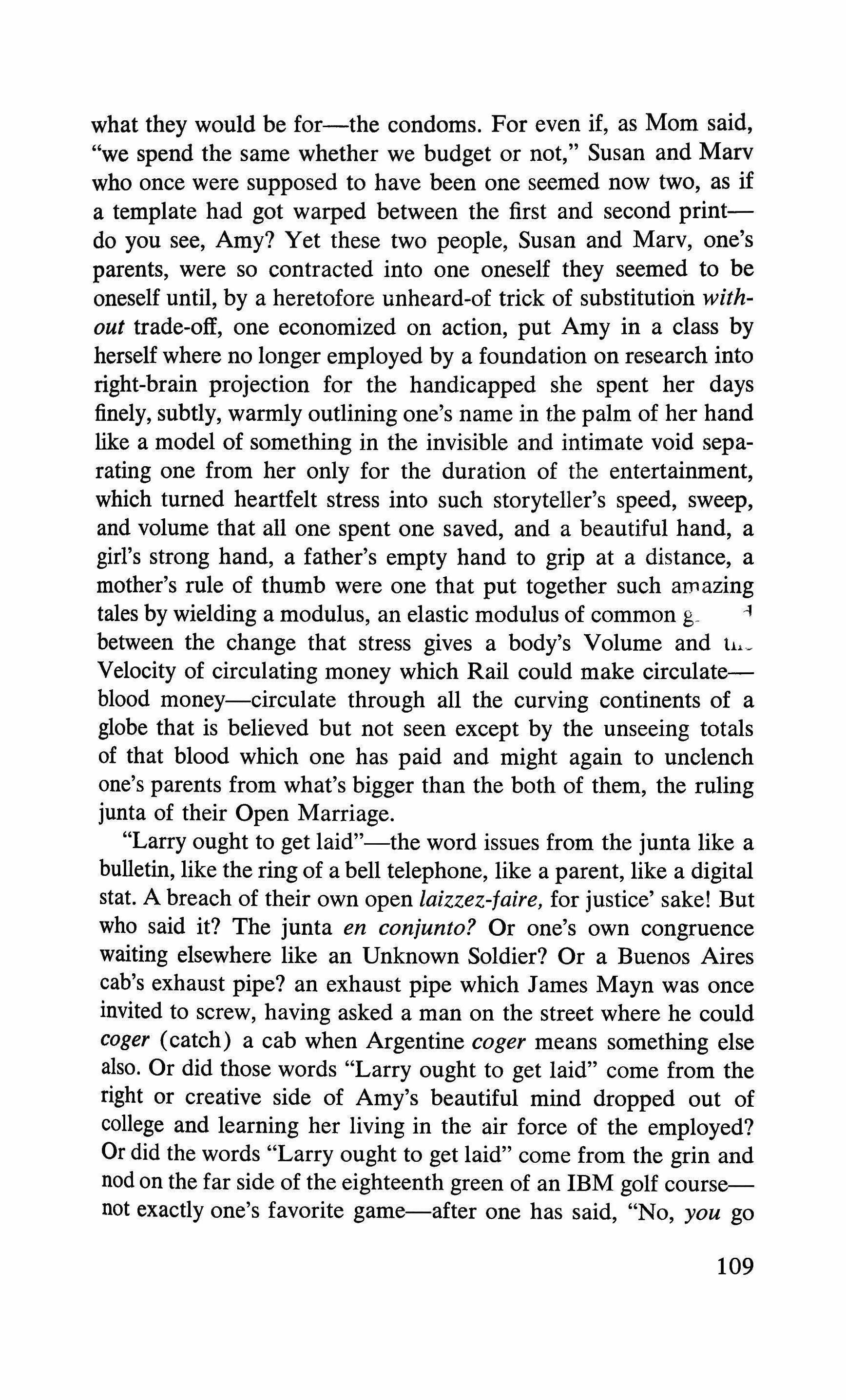
what they would be for-the condoms. For even if, as Mom said, "we spend the same whether we budget or not," Susan and Marv who once were supposed to have been one seemed now two, as if a template had got warped between the first and second printdo you see, Amy? Yet these two people, Susan and Marv, one's parents, were so contracted into one oneself they seemed to be oneself until, by a heretofore unheard-of trick of substitution without trade-off, one economized on action, put Amy in a class by herself where no longer employed by a foundation on research into right-brain projection for the handicapped she spent her days finely, subtly, warmly outlining one's name in the palm of her hand like a model of something in the invisible and intimate void separating one from her only for the duration of the entertainment, which turned heartfelt stress into such storyteller's speed, sweep, and volume that all one spent one saved, and a beautiful hand, a girl's strong hand, a father's empty hand to grip at a distance, a mother's rule of thumb were one that put together such amazing tales by wielding a modulus, an elastic modulus of common g. -l between the change that stress gives a body's Volume and 11._
Velocity of circulating money which Rail could make circulateblood money-circulate through all the curving continents of a globe that is believed but not seen except by the unseeing totals of that blood which one has paid and might again to unclench one's parents from what's bigger than the both of them, the ruling junta of their Open Marriage.
"Larry ought to get laid"-the word issues from the junta like a bulletin, like the ring of a bell telephone, like a parent, like a digital stat. A breach of their own open laizzez-iaire, for justice' sake! But who said it? The junta en conjunto? Or one's own congruence waiting elsewhere like an Unknown Soldier? Or a Buenos Aires cab's exhaust pipe? an exhaust pipe which James Mayn was once invited to screw, having asked a man on the street where he could coger (catch) a cab when Argentine coger means something else also. Or did those words "Larry ought to get laid" come from the right or creative side of Amy's beautiful mind dropped out of college and learning her living in the air force of the employed? Or did the words "Larry ought to get laid" come from the grin and nod on the far side of the eighteenth green of an IBM golf coursenot exactly one's favorite game-after one has said, "No, you go
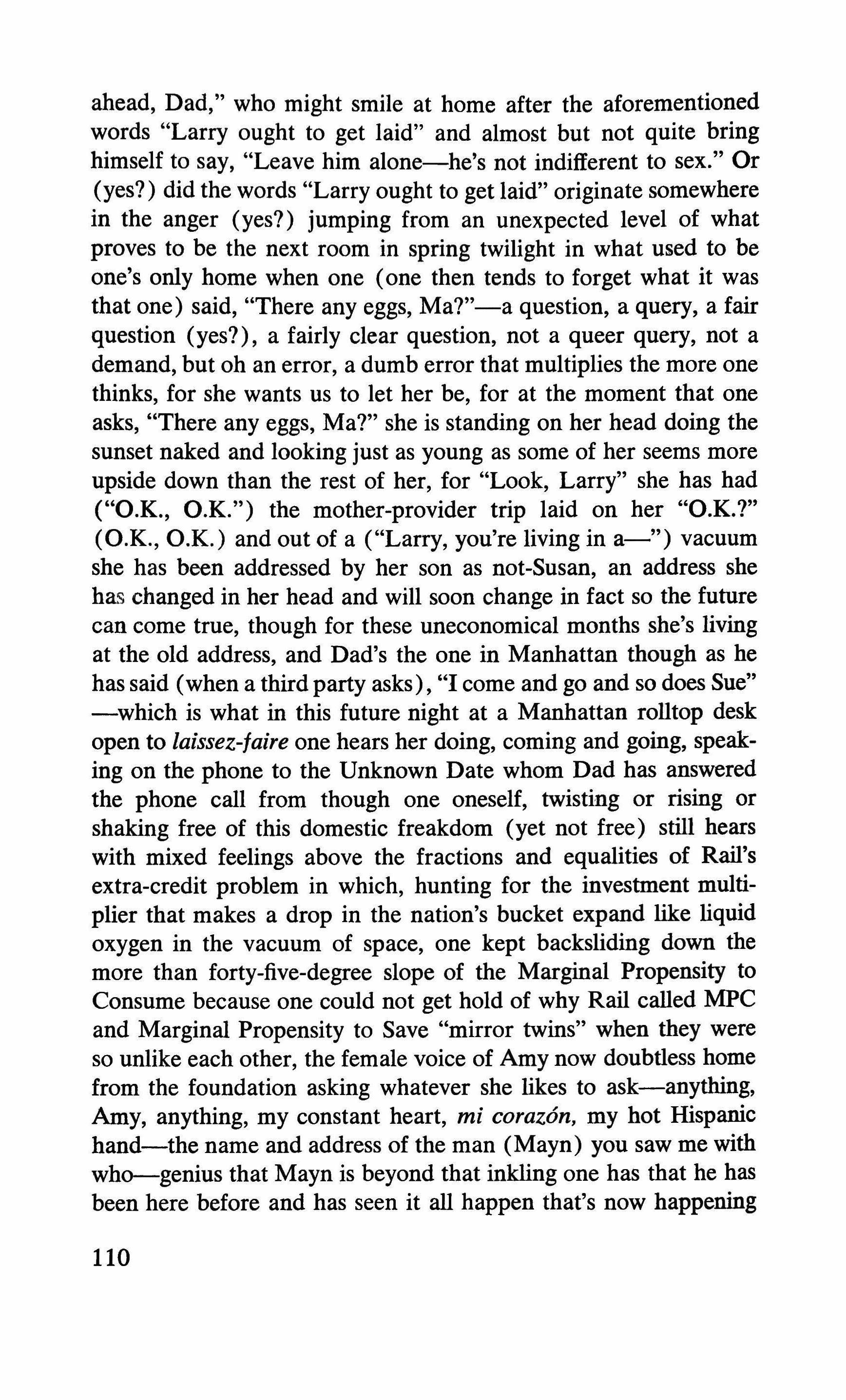
ahead, Dad," who might smile at home after the aforementioned words "Larry ought to get laid" and almost but not quite bring himself to say, "Leave him alone-he's not indifferent to sex." Or (yes?) did the words "Larry ought to get laid" originate somewhere in the anger (yes?) jumping from an unexpected level of what proves to be the next room in spring twilight in what used to be one's only home when one (one then tends to forget what it was that one) said, "There any eggs, Ma?,'-a question, a query, a fair question (yes?), a fairly clear question, not a queer query, not a demand, but oh an error, a dumb error that multiplies the more one thinks, for she wants us to let her be, for at the moment that one asks, "There any eggs, Ma?' she is standing on her head doing the sunset naked and looking just as young as some of her seems more upside down than the rest of her, for "Look, Larry" she has had ("O.K., O.K.") the mother-provider trip laid on her "O.K.?" (O.K., O.K.) and out of a ("Larry, you're living in a-") vacuum she has been addressed by her son as not-Susan, an address she has changed in her head and will soon change in fact so the future can come true, though for these uneconomical months she's living at the old address, and Dad's the one in Manhattan though as he has said (when a third party asks), "I come and go and so does Sue" -which is what in this future night at a Manhattan rolltop desk open to laissez-jaire one hears her doing, coming and going, speaking on the phone to the Unknown Date whom Dad has answered the phone call from though one oneself, twisting or rising or shaking free of this domestic freakdom (yet not free) still hears with mixed feelings above the fractions and equalities of Rail's extra-credit problem in which, hunting for the investment multiplier that makes a drop in the nation's bucket expand like liquid oxygen in the vacuum of space, one kept backsliding down the more than forty-five-degree slope of the Marginal Propensity to Consume because one could not get hold of why Rail called MPC and Marginal Propensity to Save "mirror twins" when they were so unlike each other, the female voice of Amy now doubtless home from the foundation asking whatever she likes to ask-anything, Amy, anything, my constant heart, mi corazon, my hot Hispanic hand-the name and address of the man (Mayn) you saw me with who-genius that Mayn is beyond that inkling one has that he has been here before and has seen it all happen that's now happening
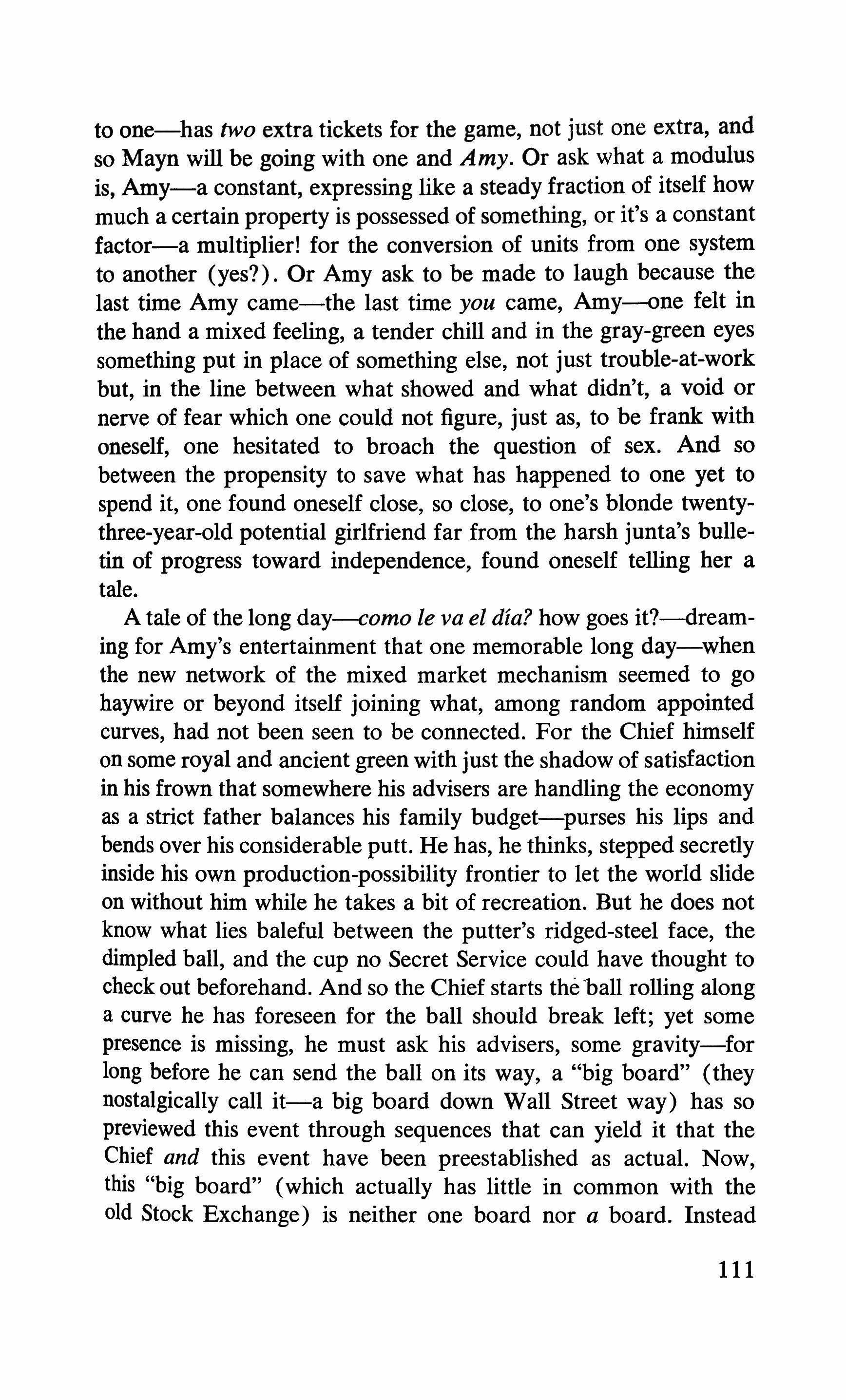
to one-has two extra tickets for the game, not just one extra, and so Mayn will be going with one and Amy. Or ask what a modulus is, Amy-a constant, expressing like a steady fraction of itself how much a certain property is possessed of something, or it's a constant factor-a multiplier! for the conversion of units from one system to another (yes?). Or Amy ask to be made to laugh because the last time Amy came-the last time you came, Amy--one felt in the hand a mixed feeling, a tender chill and in the gray-green eyes something put in place of something else, not just trouble-at-work but, in the line between what showed and what didn't, a void or nerve of fear which one could not figure, just as, to be frank with oneself, one hesitated to broach the question of sex. And so between the propensity to save what has happened to one yet to spend it, one found oneself close, so close, to one's blonde twentythree-year-old potential girlfriend far from the harsh junta's bulletin of progress toward independence, found oneself telling her a tale.
A tale of the long day--como le va el dia? how goes it?--dreaming for Amy's entertainment that one memorable long day-when the new network of the mixed market mechanism seemed to go haywire or beyond itself joining what, among random appointed curves, had not been seen to be connected. For the Chief himself on some royal and ancient green with just the shadow of satisfaction in his frown that somewhere his advisers are handling the economy as a strict father balances his family budget-purses his lips and bends over his considerable putt. He has, he thinks, stepped secretly inside his own production-possibility frontier to let the world slide on without him while he takes a bit of recreation. But he does not know what lies baleful between the putter's ridged-steel face, the dimpled ball, and the cup no Secret Service could have thought to check out beforehand. And so the Chief starts theball rolling along a curve he has foreseen for the ball should break left; yet some presence is missing, he must ask his advisers, some gravity-for long before he can send the ball on its way, a "big board" (they nostalgically call it-a big board down Wall Street way) has so previewed this event through sequences that can yield it that the Chief and this event have been preestablished as actual. Now, this "big board" (which actually has little in common with the old Stock Exchange) is neither one board nor a board. Instead
it is a new global network constantly creating itself in numbers, template curves, possible consequences, and desirable equilibriums, as the locus of all Congruences filling the mixed market mechanism. That onetime mystery which Smith had said to leave alone and Keynes had said to intervene in now by its mutual Mind constantly projects its own destined Congruence which at each "big board" center is all plugged in but actually more conceptual to the touch; do you see, Amy? Each misnamed "big board," then, is not at all two dimensional except in samples momentarily abstracted for experiment-say, the effect of womanpower relocation-andjob-training plans on the stubborn Phillips curve that ties decreasing unemployment to wage hikes-not two-d but a system that predicts and that is known by those who know it best as a field of all possible curves whose constant changes occupy like a position what roughly resembles a headless, torso-less human form, armed and legged, a four-d field of intersections always but secretly mindful both of the crossings of such old slopes as the Demand and Supply,
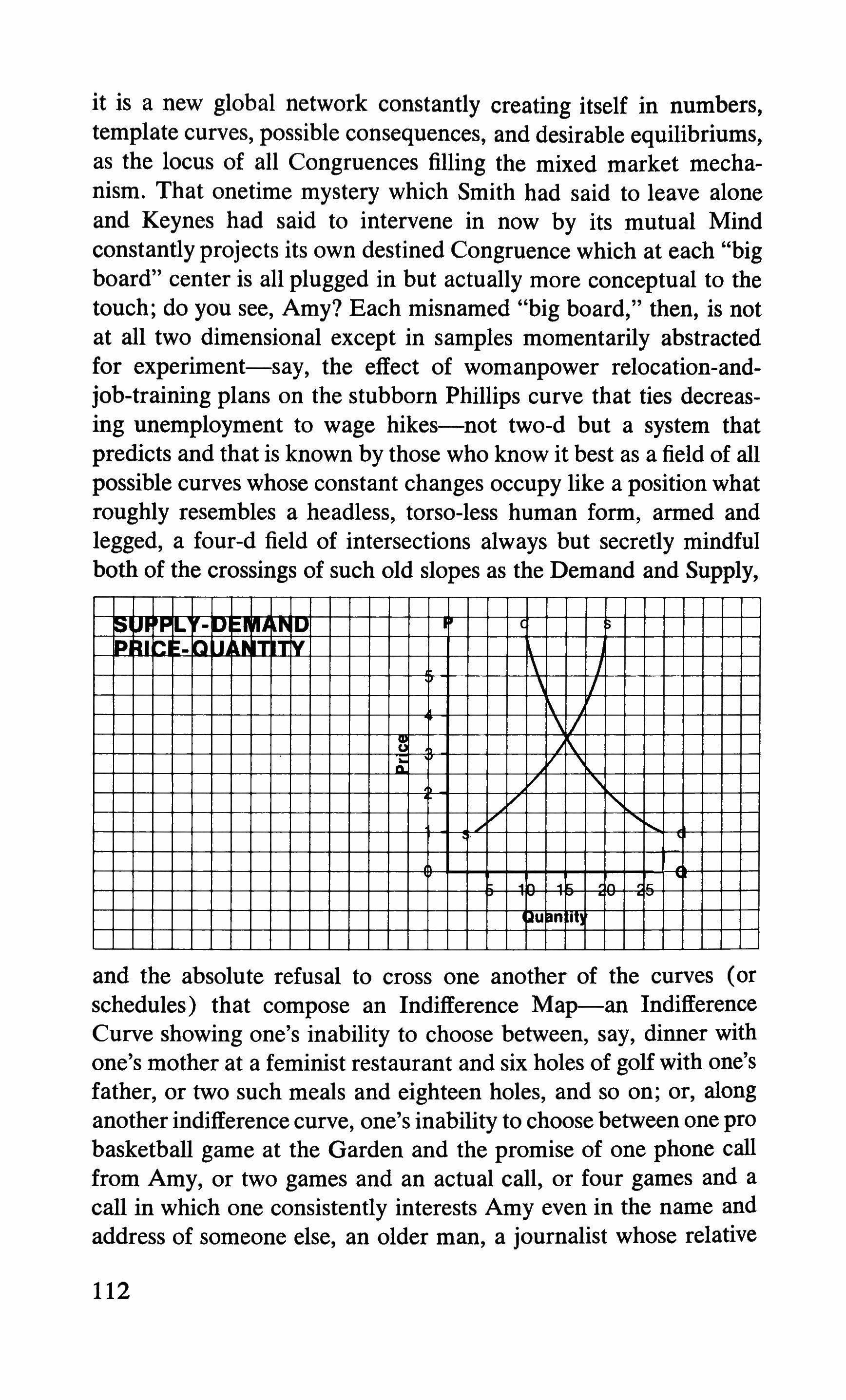
and the absolute refusal to cross one another of the curves (or schedules) that compose an Indifference Map-an Indifference Curve showing one's inability to choose between, say, dinner with one's mother at a feminist restaurant and six holes of golf with one's father, or two such meals and eighteen holes, and so on; or, along another indifference curve, one's inability to choose between one pro basketball game at the Garden and the promise of one phone call from Amy, or two games and an actual call, or four games and a call in which one consistently interests Amy even in the name and address of someone else, an older man, a journalist whose relative
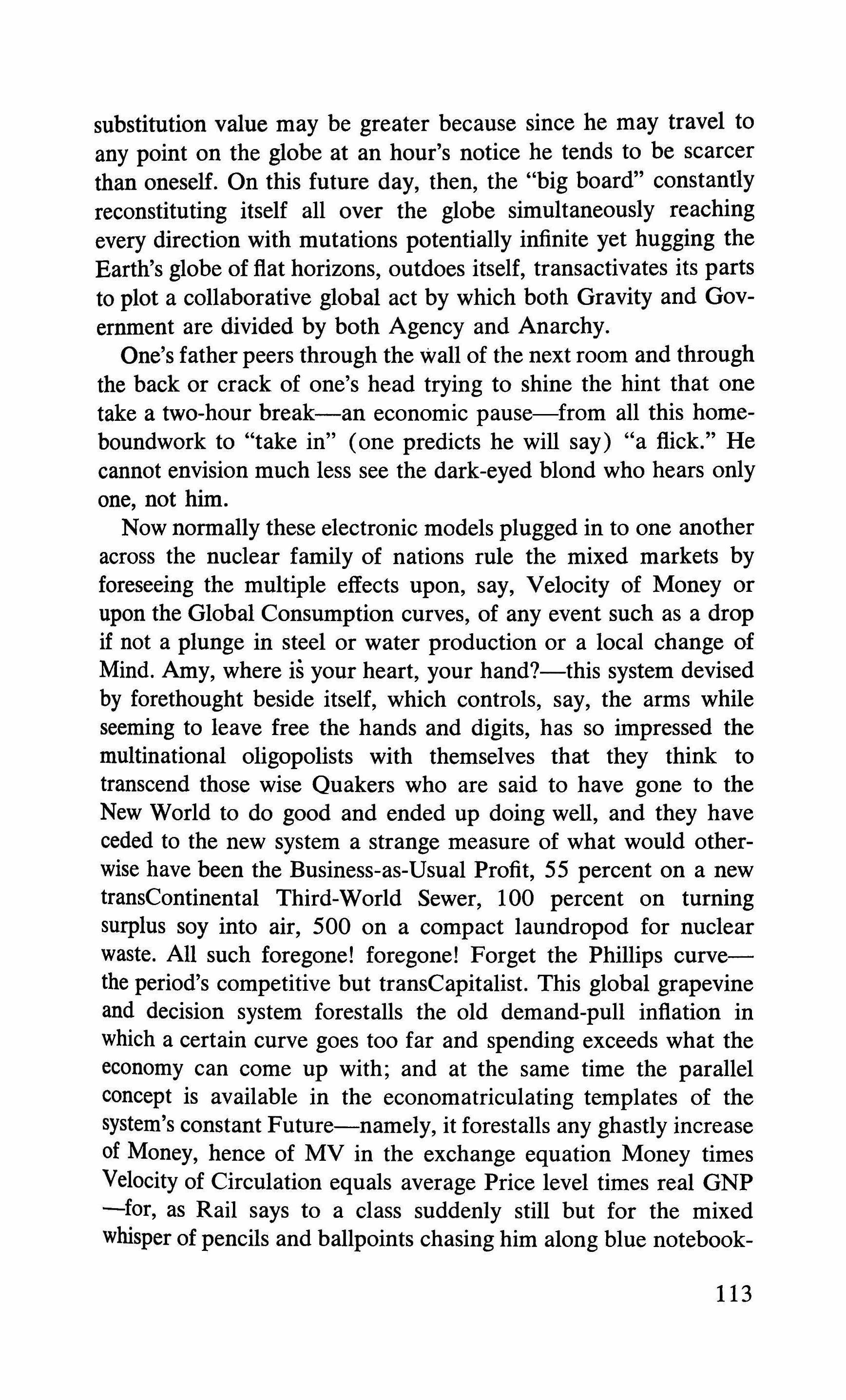
substitution value may be greater because since he may travel to any point on the globe at an hour's notice he tends to be scarcer than oneself. On this future day, then, the "big board" constantly reconstituting itself all over the globe simultaneously reaching every direction with mutations potentially infinite yet hugging the Earth's globe of flat horizons, outdoes itself, transactivates its parts to plot a collaborative global act by which both Gravity and Government are divided by both Agency and Anarchy.
One's father peers through the wall of the next room and through the back or crack of one's head trying to shine the hint that one take a two-hour break-an economic pause-from all this homeboundwork to "take in" (one predicts he will say) "a flick." He cannot envision much less see the dark-eyed blond who hears only one, not him.
Now normally these electronic models plugged in to one another across the nuclear family of nations rule the mixed markets by foreseeing the multiple effects upon, say, Velocity of Money or upon the Global Consumption curves, of any event such as a drop if not a plunge in steel or water production or a local change of Mind. Amy, where is your heart, your hand?-this system devised by forethought beside itself, which controls, say, the arms while seeming to leave free the hands and digits, has so impressed the multinational oligopolists with themselves that they think to transcend those wise Quakers who are said to have gone to the New World to do good and ended up doing well, and they have ceded to the new system a strange measure of what would otherwise have been the Business-as-Usual Profit, 55 percent on a new transContinental Third-World Sewer, 100 percent on turning surplus soy into air, 500 on a compact laundropod for nuclear waste. All such foregone! foregone! Forget the Phillips curvethe period's competitive but transCapitalist. This global grapevine and decision system forestalls the old demand-pull inflation in which a certain curve goes too far and spending exceeds what the economy can come up with; and at the same time the parallel concept is available in the economatriculating templates of the system's constant Future-namely, it forestalls any ghastly increase of Money, hence of MV in the exchange equation Money times Velocity of Circulation equals average Price level times real GNP -for, as Rail says to a class suddenly still but for the mixed whisper of pencils and ballpoints chasing him along blue notebook-
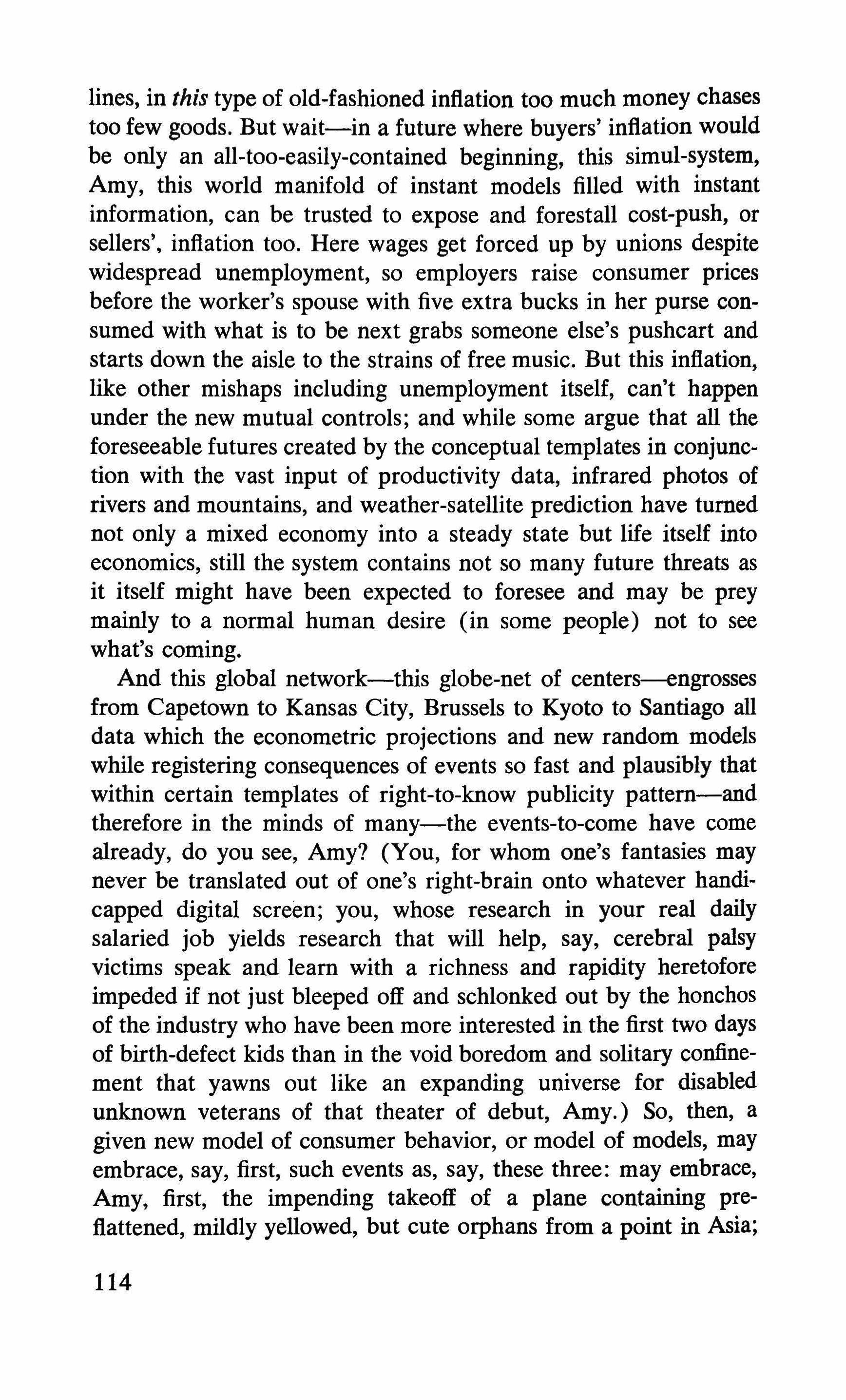
lines, in this type of old-fashioned inflation too much money chases too few goods. But wait-in a future where buyers' inflation would be only an all-too-easily-contained beginning, this simul-system, Amy, this world manifold of instant models filled with instant information, can be trusted to expose and forestall cost-push, or sellers', inflation too. Here wages get forced up by unions despite widespread unemployment, so employers raise consumer prices before the worker's spouse with five extra bucks in her purse consumed with what is to be next grabs someone else's pushcart and starts down the aisle to the strains of free music. But this inflation, like other mishaps including unemployment itself, can't happen under the new mutual controls; and while some argue that all the foreseeable futures created by the conceptual templates in conjunction with the vast input of productivity data, infrared photos of rivers and mountains, and weather-satellite prediction have turned not only a mixed economy into a steady state but life itself into economics, still the system contains not so many future threats as it itself might have been expected to foresee and may be prey mainly to a normal human desire (in some people) not to see what's coming.
And this global network-this globe-net of centers--engrosses from Capetown to Kansas City, Brussels to Kyoto to Santiago all data which the econometric projections and new random models while registering consequences of events so fast and plausibly that within certain templates of right-to-know publicity pattern-and therefore in the minds of many-the events-to-come have come already, do you see, Amy? (You, for whom one's fantasies may never be translated out of one's right-brain onto whatever handicapped digital screen; you, whose research in your real daily salaried job yields research that will help, say, cerebral palsy victims speak and learn with a richness and rapidity heretofore impeded if not just bleeped off and schlonked out by the honchos of the industry who have been more interested in the first two days of birth-defect kids than in the void boredom and solitary confinement that yawns out like an expanding universe for disabled unknown veterans of that theater of debut, Amy.) So, then, a given new model of consumer behavior, or model of models, may embrace, say, first, such events as, say, these three: may embrace, Amy, first, the impending takeoff of a plane containing preflattened, mildly yellowed, but cute orphans from a point in Asia;

second, may embrace the plane of plate glass fronting a long, narrow, moderately multinational feminist health-food restaurant where a lean and hungry, hard-to-read young man whose pale, jutting chin contains two subtle scar points of what the mujer with him abruptly calls acne, and whose thoughts (he is aware) undergo breathtaking transformations, sits eating his companion's sesame roll and butter and facing over his menu a depth of field which embraces both the glimmering plate glass twenty feet away like a lid upon the longish, noisy, aromatic restaurant room, the older woman opposite him who is asking him what he's having for dessert and is herself torn between two desserts, and on the other side of the glass as if in a next room furnished with an orange compact car, a parking meter, and a hydrant, three persons, two women and a man, who appear bent on destruction; and may embrace, third, meanwhile, hours away, the Chief, who, having lined up his putt, grins, shakes his head, estimates the slope and the break, and with a stylish rhythm that is all gentle secrecy, putts.
The jets of Operation Adoption somewhere in Asia whine down the curve foreshadowed by the rich click shared between presidential ball and club face, while for the multinational eatery about to be pressure-cooked by means of not sealing but breaching the gasket-bedded lid, what matters are the parallel, staggered trajectories of bomb and fire and bullet to be launched from the three outside, not that these curves actually come from the projections loomed template upon template by the housework of a system as if its thinking has rewired the world. But to take second things for a second first, where are these events coming from?
The system has surveyed Asiatic futures to see what best return can be had from the long-term but now terminated overseas investment there of machines, materiel, men, bombs, and, more vital, demolition know-how: what return will be suitable on such an investment? Friendship with those who have been ploughed has been run through the conceptual templates, likewise an agribusiness feedback and cultural exchange such as music and dance groups and Eastern theories of peace; but the only future seeming both to approach the desired congruence with the original input and simultaneously counteract certain domestic trends like guilt and the decline of marriage is a transfer of orphans which will fill a near-unquantifiable lag or gap "or absence. Yet the system's economy is to multiply consequences both in scatter-parallel and se-
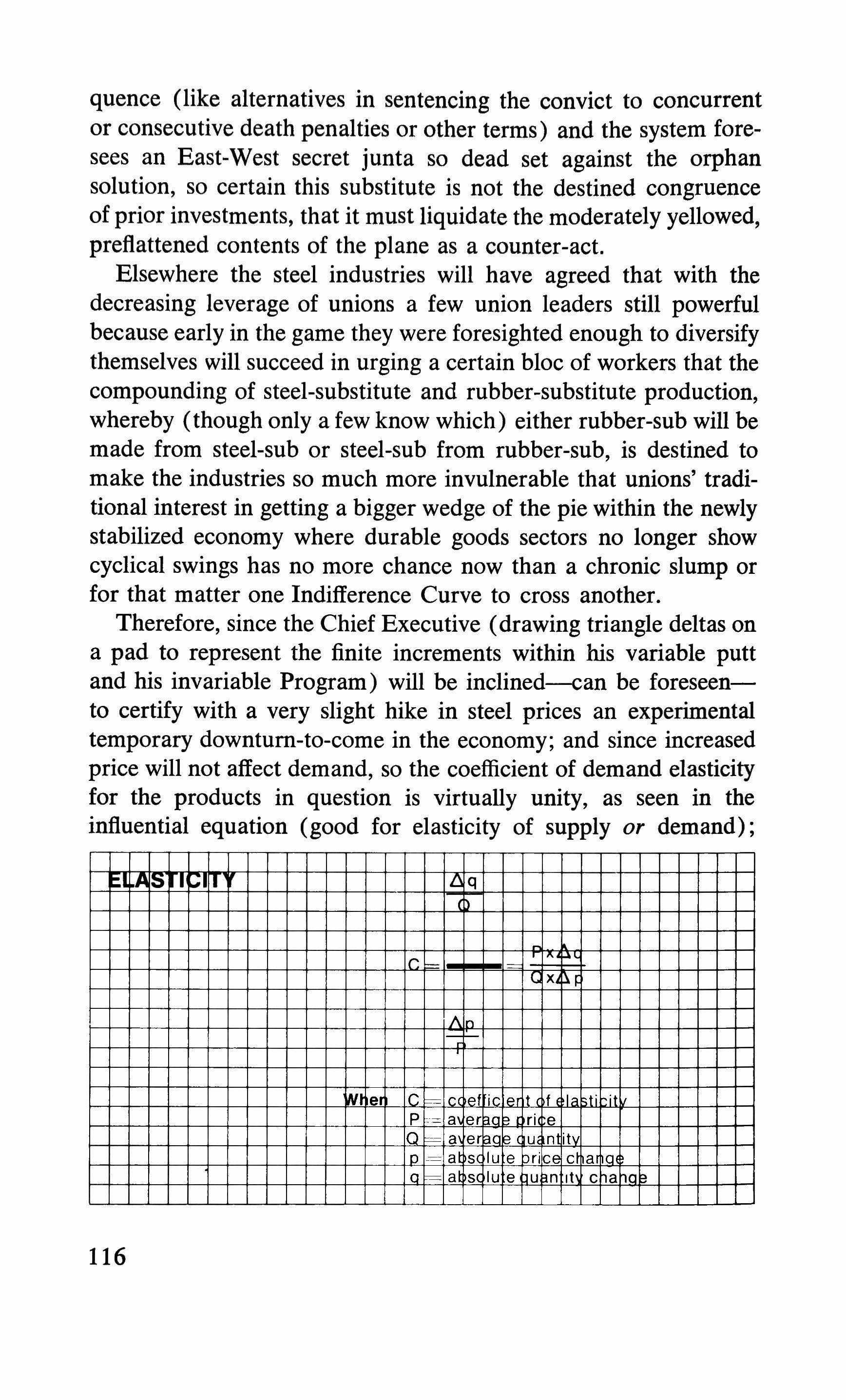
quence (like alternatives in sentencing the convict to concurrent or consecutive death penalties or other terms) and the system foresees an East-West secret junta so dead set against the orphan solution, so certain this substitute is not the destined congruence of prior investments, that it must liquidate the moderately yellowed, preflattened contents of the plane as a counter-act.
Elsewhere the steel industries will have agreed that with the decreasing leverage of unions a few union leaders still powerful because early in the game they were foresighted enough to diversify themselves will succeed in urging a certain bloc of workers that the compounding of steel-substitute and rubber-substitute production, whereby (though only a few know which) either rubber-sub will be made from steel-sub or steel-sub from rubber-sub, is destined to make the industries so much more invulnerable that unions' traditional interest in getting a bigger wedge of the pie within the newly stabilized economy where durable goods sectors no longer show cyclical swings has no more chance now than a chronic slump or for that matter one Indifference Curve to cross another.
Therefore, since the Chief Executive (drawing triangle deltas on a pad to represent the finite increments within his variable putt and his invariable Program) will be inclined--can be foreseento certify with a very slight hike in steel prices an experimental temporary downturn-to-come in the economy; and since increased price will not affect demand, so the coefficient of demand elasticity for the products in question is virtually unity, as seen in the influential equation (good for elasticity of supply or demand);
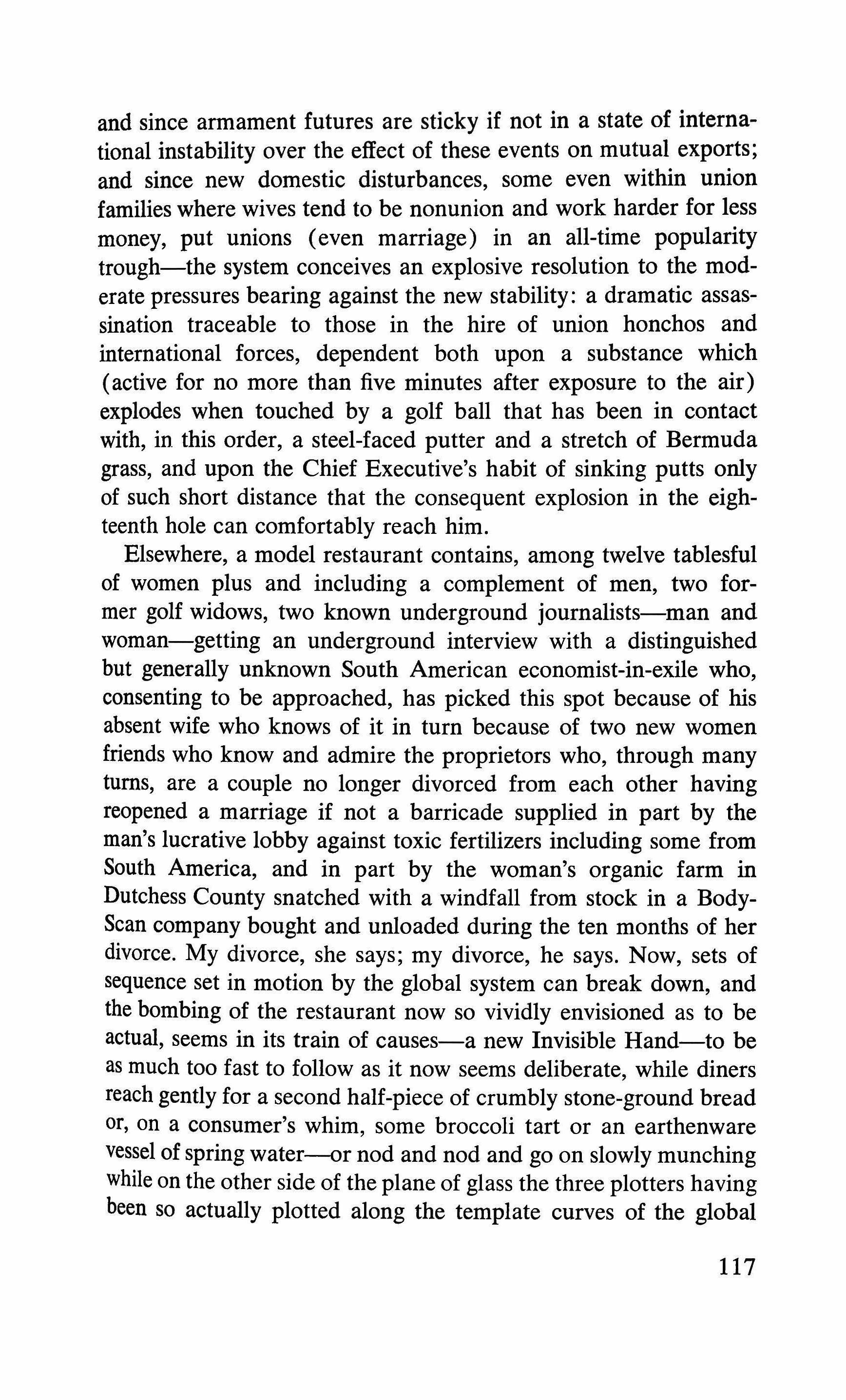
and since armament futures are sticky if not in a state of international instability over the effect of these events on mutual exports; and since new domestic disturbances, some even within union families where wives tend to be nonunion and work harder for less money, put unions (even marriage) in an all-time popularity trough-the system conceives an explosive resolution to the moderate pressures bearing against the new stability: a dramatic assassination traceable to those in the hire of union honchos and international forces, dependent both upon a substance which (active for no more than five minutes after exposure to the air) explodes when touched by a golf ball that has been in contact with, in this order, a steel-faced putter and a stretch of Bermuda grass, and upon the Chief Executive's habit of sinking putts only of such short distance that the consequent explosion in the eighteenth hole can comfortably reach him.
Elsewhere, a model restaurant contains, among twelve tablesful of women plus and including a complement of men, two former golf widows, two known underground journalists-man and woman-getting an underground interview with a distinguished but generally unknown South American economist-in-exile who, consenting to be approached, has picked this spot because of his absent wife who knows of it in turn because of two new women friends who know and admire the proprietors who, through many turns, are a couple no longer divorced from each other having reopened a marriage if not a barricade supplied in part by the man's lucrative lobby against toxic fertilizers including some from South America, and in part by the woman's organic farm in Dutchess County snatched with a windfall from stock in a BodyScan company bought and unloaded during the ten months of her divorce. My divorce, she says; my divorce, he says. Now, sets of sequence set in motion by the global system can break down, and the bombing of the restaurant now so vividly envisioned as to be actual, seems in its train of causes-a new Invisible Hand-to be as much too fast to follow as it now seems deliberate, while diners reach gently for a second half-piece of crumbly stone-ground bread or, on a consumer's whim, some broccoli tart or an earthenware vessel of spring water--or nod and nod and go on slowly munching While on the other side of the plane of glass the three plotters having been so actually plotted along the template curves of the global
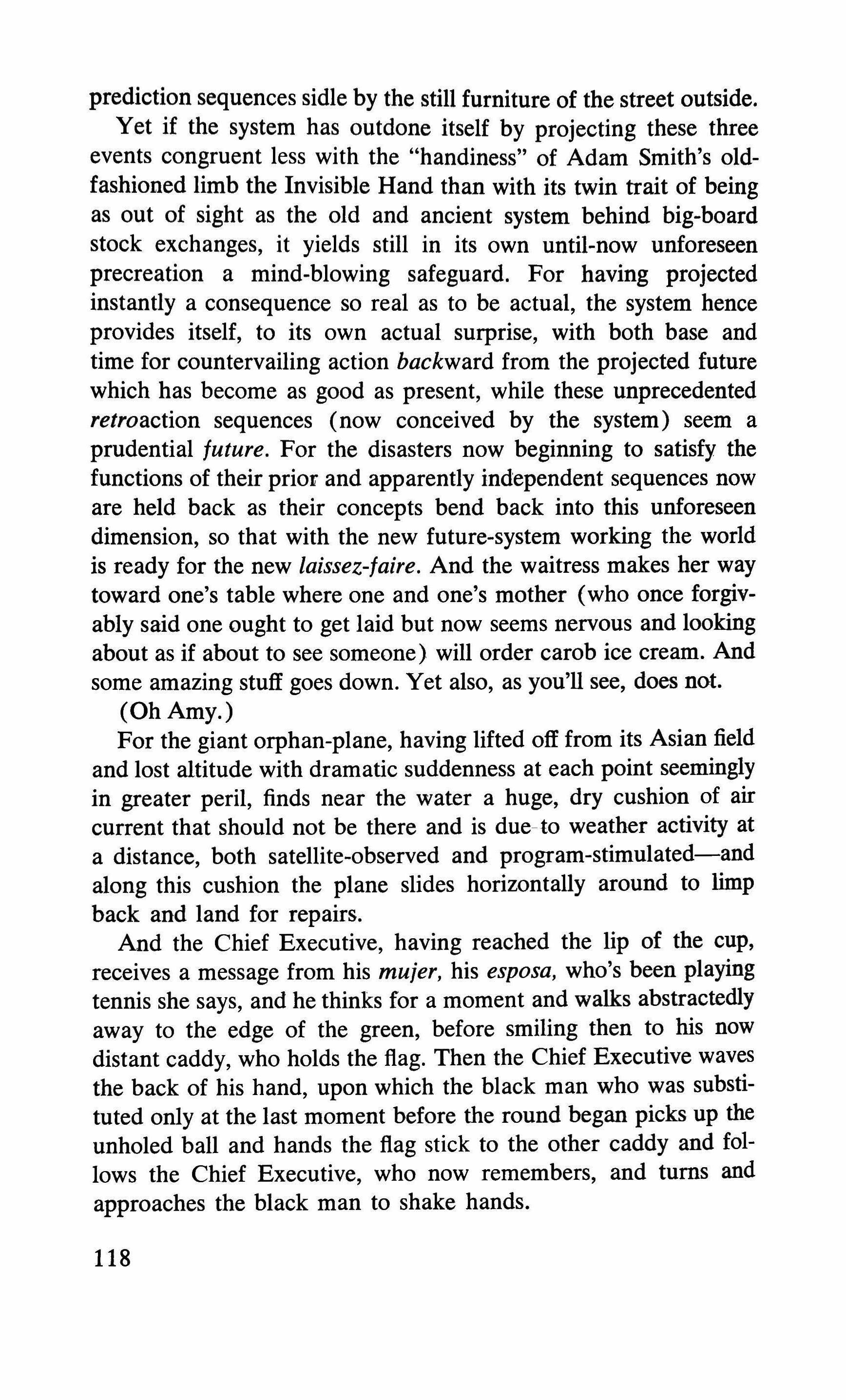
prediction sequences sidle by the still furniture of the street outside. Yet if the system has outdone itself by projecting these three events congruent less with the "handiness" of Adam Smith's oldfashioned limb the Invisible Hand than with its twin trait of being as out of sight as the old and ancient system behind big-board stock exchanges, it yields still in its own until-now unforeseen precreation a mind-blowing safeguard. For having projected instantly a consequence so real as to be actual, the system hence provides itself, to its own actual surprise, with both base and time for countervailing action backward from the projected future which has become as good as present, while these unprecedented retroaction sequences (now conceived by the system) seem a prudential future. For the disasters now beginning to satisfy the functions of their prior and apparently independent sequences now are held back as their concepts bend back into this unforeseen dimension, so that with the new future-system working the world is ready for the new laissez-jaire. And the waitress makes her way toward one's table where one and one's mother (who once forgivably said one ought to get laid but now seems nervous and looking about as if about to see someone) will order carob ice cream. And some amazing stuff goes down. Yet also, as you'll see, does not.
For the giant orphan-plane, having lifted off from its Asian field and lost altitude with dramatic suddenness at each point seemingly in greater peril, finds near the water a huge, dry cushion of air current that should not be there and is due-to weather activity at a distance, both satellite-observed and program-stimulated-and along this cushion the plane slides horizontally around to limp back and land for repairs.
And the Chief Executive, having reached the lip of the cup, receives a message from his mujer, his esposa, who's been playing tennis she says, and he thinks for a moment and walks abstractedly away to the edge of the green, before smiling then to his now distant caddy, who holds the flag. Then the Chief Executive waves the back of his hand, upon which the black man who was substituted only at the last moment before the round began picks up the unholed ball and hands the flag stick to the other caddy and follows the Chief Executive, who now remembers, and turns and approaches the black man to shake hands.
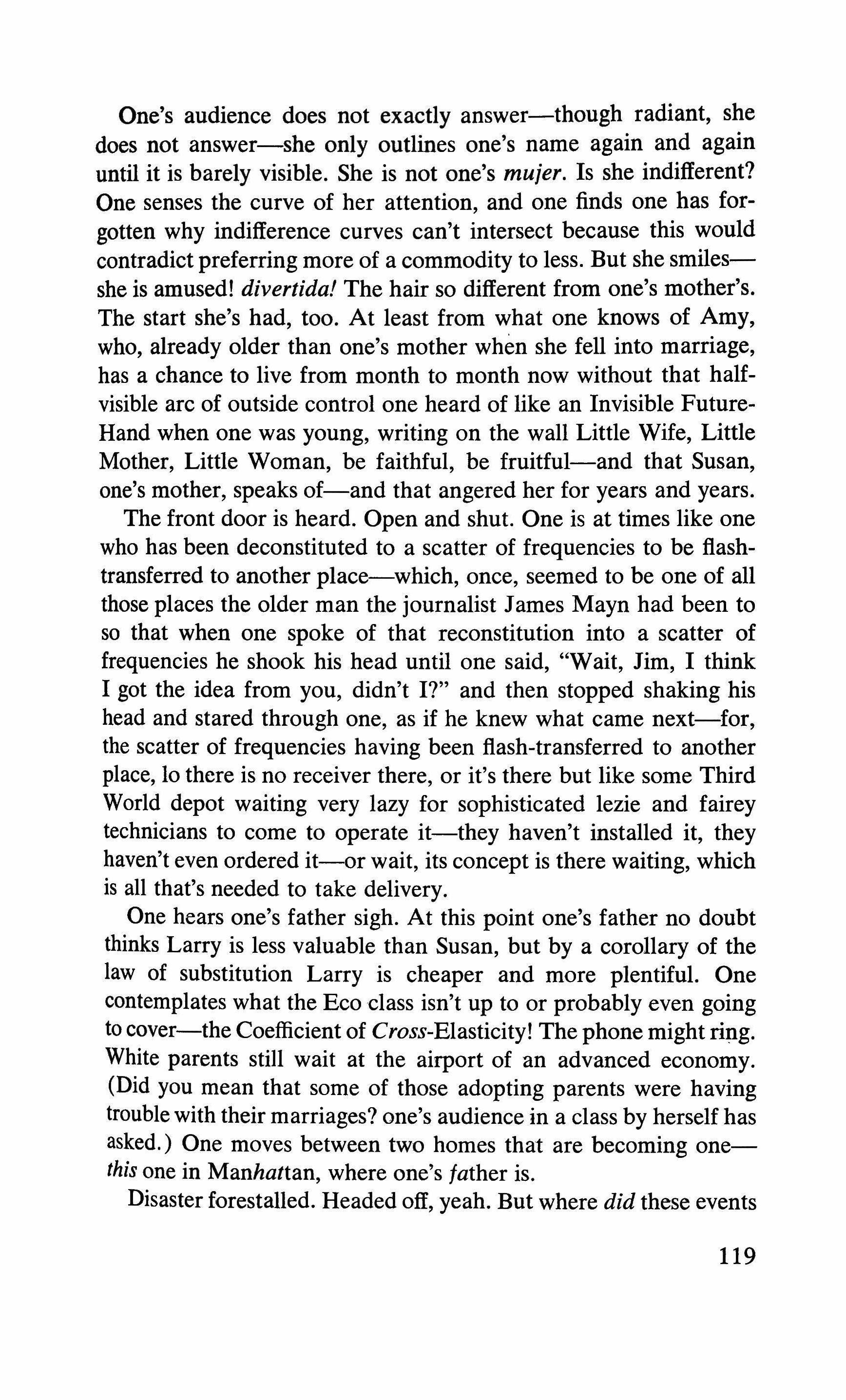
One's audience does not exactly answer-though radiant, she does not answer-she only outlines one's name again and again until it is barely visible. She is not one's mujer. Is she indifferent? One senses the curve of her attention, and one finds one has forgotten why indifference curves can't intersect because this would contradict preferring more of a commodity to less. But she smilesshe is amused! divertida! The hair so different from one's mother's.
The start she's had, too. At least from what one knows of Amy, who, already older than one's mother when she fell into marriage, has a chance to live from month to month now without that halfvisible arc of outside control one heard of like an Invisible FutureHand when one was young, writing on the wall Little Wife, Little Mother, Little Woman, be faithful, be fruitful-and that Susan, one's mother, speaks of-and that angered her for years and years.
The front door is heard. Open and shut. One is at times like one who has been deconstituted to a scatter of frequencies to be flashtransferred to another place-which, once, seemed to be one of all those places the older man the journalist James Mayn had been to so that when one spoke of that reconstitution into a scatter of frequencies he shook his head until one said, "Wait, Jim, I think 1 got the idea from you, didn't I?" and then stopped shaking his head and stared through one, as if he knew what came next-for, the scatter of frequencies having been flash-transferred to another place, 10 there is no receiver there, or it's there but like some Third World depot waiting very lazy for sophisticated lezie and fairey technicians to come to operate it-they haven't installed it, they haven't even ordered it-or wait, its concept is there waiting, which is all that's needed to take delivery.
One hears one's father sigh. At this point one's father no doubt thinks Larry is less valuable than Susan, but by a corollary of the law of substitution Larry is cheaper and more plentiful. One contemplates what the Eco class isn't up to or probably even going to cover-the Coefficient of Cross-Elasticity! The phone mightring. White parents still wait at the airport of an advanced economy. (Did you mean that some of those adopting parents were having trouble with their marriages? one's audience in a class by herself has asked.) One moves between two homes that are becoming onethis one in Manhattan, where one's father is. Disaster forestalled. Headed off, yeah. But where did these events
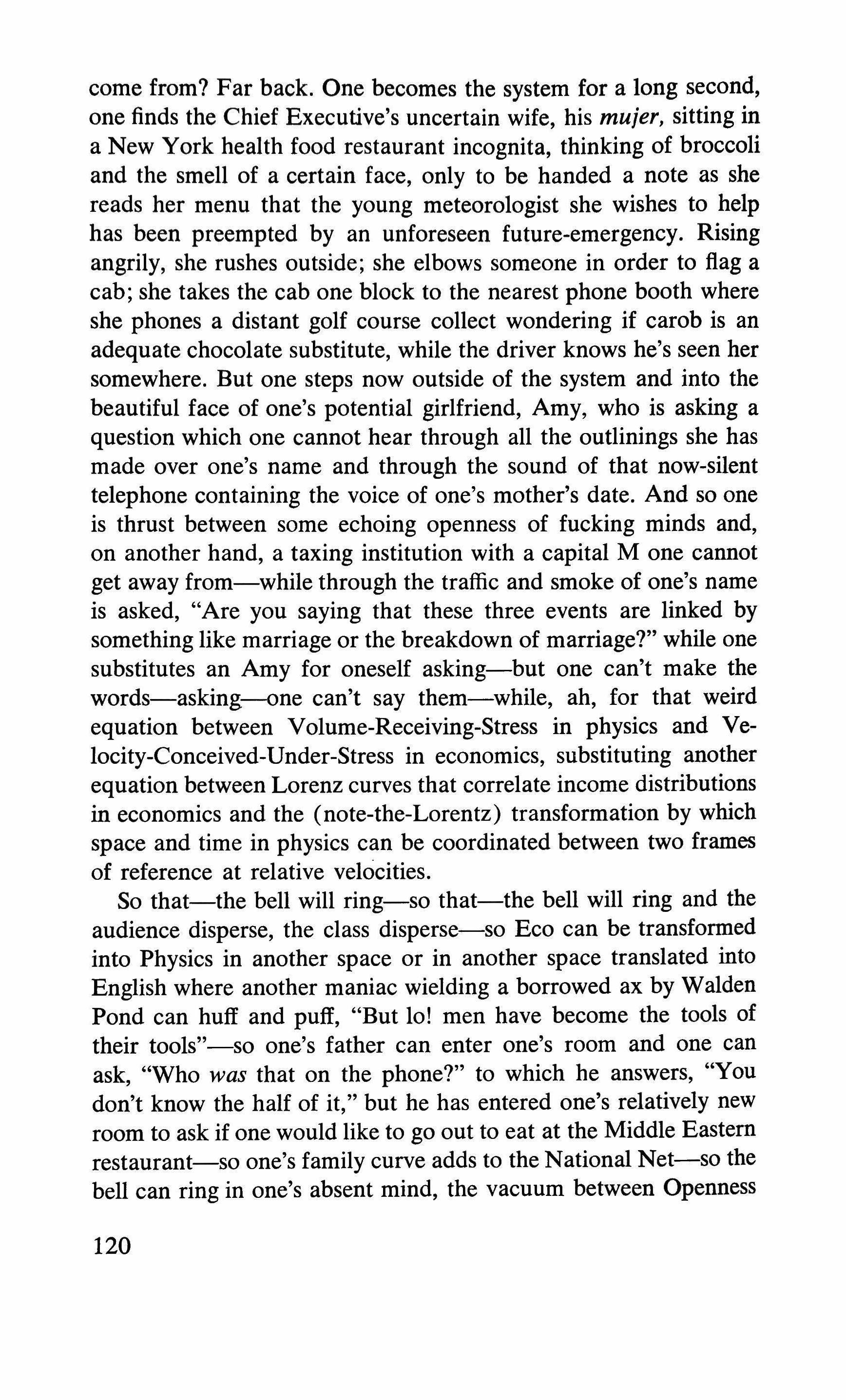
come from? Far back. One becomes the system for a long second, one finds the Chief Executive's uncertain wife, his mujer, sitting in a New York health food restaurant incognita, thinking of broccoli and the smell of a certain face, only to be handed a note as she reads her menu that the young meteorologist she wishes to help has been preempted by an unforeseen future-emergency. Rising angrily, she rushes outside; she elbows someone in order to flag a cab; she takes the cab one block to the nearest phone booth where she phones a distant golf course collect wondering if carob is an adequate chocolate substitute, while the driver knows he's seen her somewhere. But one steps now outside of the system and into the beautiful face of one's potential girlfriend, Amy, who is asking a question which one cannot hear through all the outlinings she has made over one's name and through the sound of that now-silent telephone containing the voice of one's mother's date. And so one is thrust between some echoing openness of fucking minds and, on another hand, a taxing institution with a capital M one cannot get away from-while through the traffic and smoke of one's name is asked, "Are you saying that these three events are linked by something like marriage or the breakdown of marriage?" while one substitutes an Amy for oneself asking-but one can't make the words-asking--one can't say them-while, ah, for that weird equation between Volume-Receiving-Stress in physics and Velocity-Conceived-Under-Stress in economics, substituting another equation between Lorenz curves that correlate income distributions in economics and the (note-the-Lorentz) transformation by which space and time in physics can be coordinated between two frames of reference at relative velocities.
So that-the bell will ring-so that-the bell will ring and the audience disperse, the class disperse-so Eco can be transformed into Physics in another space or in another space translated into English where another maniac wielding a borrowed ax by Walden Pond can huff and puff, "But lo! men have become the tools of their tools"-so one's father can enter one's room and one can ask, "Who was that on the phone?" to which he answers, "You don't know the half of it," but he has entered one's relatively new room to ask if one would like to go out to eat at the Middle Eastern restaurant-so one's family curve adds to the National Net-so the bell can ring in one's absent mind, the vacuum between Openness

and Marriage, two possibilities locused at the phone bell which may ring from Amy in one's absence if one goes out to dinner now with one's father who is not happy but is being reasonable, cool, yea scientific-about being open and married. So one makes an effort when he says, "What may I ask is this coefficient of cross-elasticity?" And one answers that it's the arithmetical relation, see, between a percentage change in the sales of a substitute like tea, and, yes?-while at the bell which in the silence of one's vacuum has saved one for the higher cross of Rail's science and his curves, one knows one must not be saved, even from the crazy tale one admits to an Amy who has not phoned except this morning to ask for James Mayn's name-and-address, to an Amy who is not present in one's room at one's rolltop escritorio bought by one's mothernot present, not here, as one's father looks down at one's textbook graphs and says, "Well maybe the bookkeeping stuff will help, but if you get a job in business you'll have to forget all this and learn some real economics"-to an Amy to whom one says almost but no longer with the scientific fiction of the impersonal "One" which one can't maintain any more than one is Rail or would wish one's first name to be Lawrence, "I think I am the reason my folks stuck together. lam.
But if they have not stuck together, what am I? lam.
If they have not stuck together I am not the reason. I am Larry. lam.

Susu, you are a slime of green down a wet wall. Susu, I approach you in my dreams. From my youth I followed a star like the Magi; like Germany, I had a destiny. Perhaps it was you who were Mad Meg-a basket of ballocks slung under one arm, a sharpened penis in your hand like a swordsman, your eye an eye like history'S, your mouth wide open for a cry, the whole of your sleep outside you in a landscape lit by heatless fires which random guns had set beneath previously spitted meats and placidly congealing stews. Susu, you sang none of the old songs, none of the new.
A spider has lidded my john with its web, lengths liftedfrom the record player, a dance with a fly in the center instead of shit's smooth seat and neighbor. The animals are taking over, midges and mosquitoeshover, and I shall be mad in a month.
Ants have organized the sugar; roaches have rifled the till; our woods are loud with crow and cougar; the moths are all drunk at my still.
Leopard, lion, come from cover, the animals are taking over, and I shall be mad in a month.
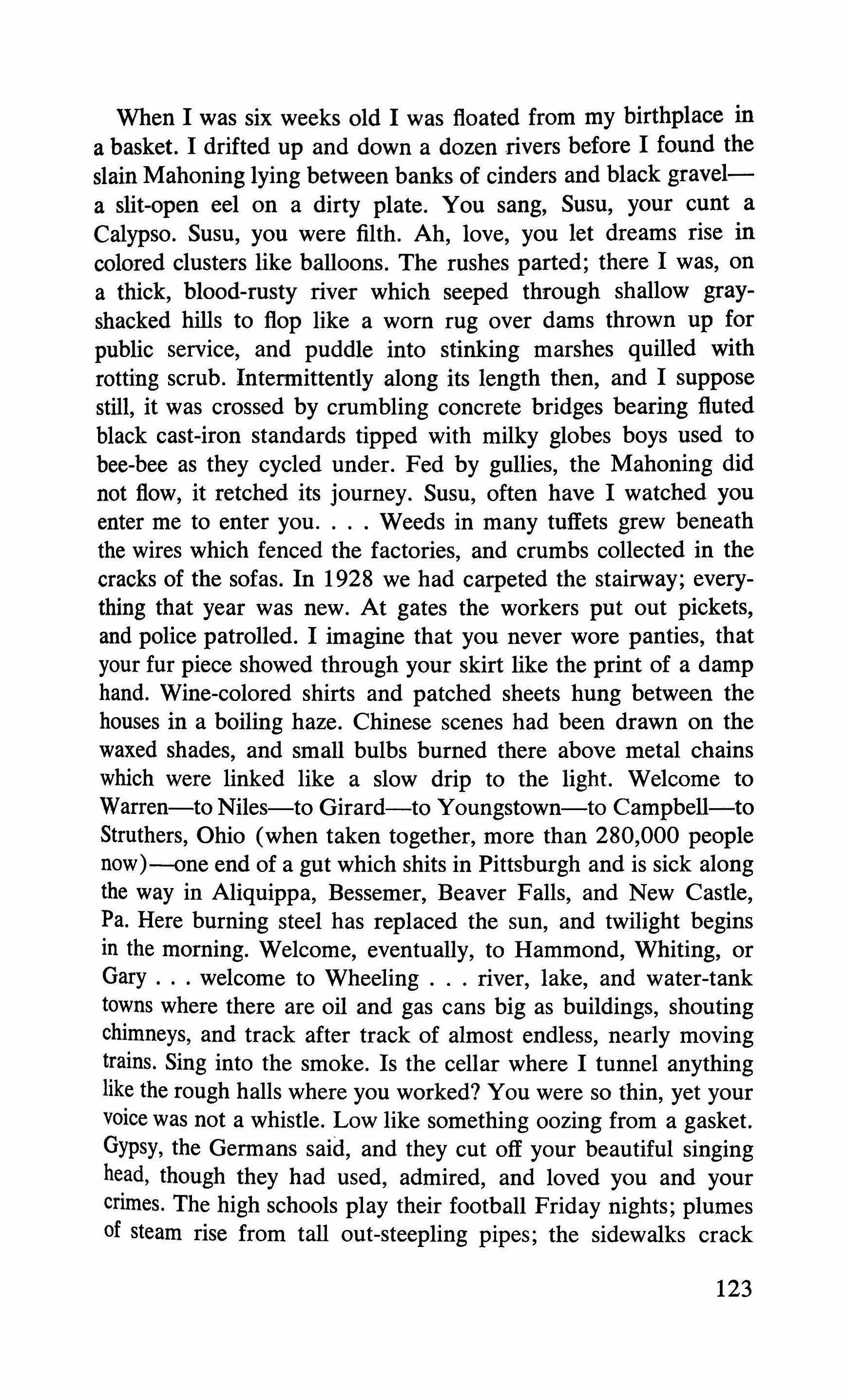
When I was six weeks old I was floated from my birthplace in a basket. I drifted up and down a dozen rivers before I found the slain Mahoning lying between banks of cinders and black gravela slit-open eel on a dirty plate. You sang, Susu, your cunt a Calypso. Susu, you were filth. Ah, love, you let dreams rise in colored clusters like balloons. The rushes parted; there I was, on a thick, blood-rusty river which seeped through shallow grayshacked hills to flop like a worn rug over dams thrown up for public service, and puddle into stinking marshes quilled with rotting scrub. Intermittently along its length then, and I suppose still, it was crossed by crumbling concrete bridges bearing fluted black cast-iron standards tipped with milky globes boys used to bee-bee as they cycled under. Fed by gullies, the Mahoning did not flow, it retched its journey. Susu, often have I watched you enter me to enter you. Weeds in many tuffets grew beneath the wires which fenced the factories, and crumbs collected in the cracks of the sofas. In 1928 we had carpeted the stairway; everything that year was new. At gates the workers put out pickets, and police patrolled. I imagine that you never wore panties, that your fur piece showed through your skirt like the print of a damp hand. Wine-colored shirts and patched sheets hung between the houses in a boiling haze. Chinese scenes had been drawn on the waxed shades, and small bulbs burned there above metal chains which were linked like a slow drip to the light. Welcome to Warren-to Niles-to Girard-to Youngstown-to Campbell-to Struthers, Ohio (when taken together, more than 280,000 people now)-one end of a gut which shits in Pittsburgh and is sick along the way in Aliquippa, Bessemer, Beaver Falls, and New Castle, Pa. Here burning steel has replaced the sun, and twilight begins in the morning. Welcome, eventually, to Hammond, Whiting, or Gary welcome to Wheeling river, lake, and water-tank towns where there are oil and gas cans big as buildings, shouting chimneys, and track after track of almost endless, nearly moving trains. Sing into the smoke. Is the cellar where I tunnel anything like the rough halls where you worked? You were so thin, yet your voice was not a whistle. Low like something oozing from a gasket. Gypsy, the Germans said, and they cut off your beautiful singing head, though they had used, admired, and loved you and your crimes. The high schools play their football Friday nights; plumes of steam rise from tall out-steepling pipes; the sidewalks crack

normally; fall trees lose their leaves as everywhere they do; and my mother opens the oven door to warm the kitchen in the morning. My father loved to paint bathrooms; he loved, especially, to do trim: fine black lines around the panels of the doors, lemon yellow baseboards, light blue walls with a hint of sunset in the ceilings. Such was the indifferent divinity of Susu's singing that she sang always out of her own earshot; no one was watching when she undressed, even her mirrors were empty; and on the medicine chests in a dozen houses where we lived, my father did, as he firmly said, a dandy job. When all the cracks had been covered with paint the landlord would sell the place, and then we'd move. Each of these towns has acrid, yellow-tasting cloud machines, ink-streaked, redly-echoing skies, and torches one hundred feet high, burning constantly like sacred flames, discrediting the phallus as a symbol. There are piles of crates and heaps of barrels, mountains of bent, corroding metal. And the bracelets on your slender arm slid, Susu, when your hand flew up to calm your hair. New streets fell across old meadows like a lash. The automobiles of the workers were pastured in gray grassless lots, while the houses of the workers, each the same, had been lured into straight unshuffiing lines like people on welfare waiting for their boons. I remember mostly litter, derelict cars, scarred signs, lost ground, high-tension towers which imprisoned the sky, pretending to lift vast units of electric across the valley like skiers on sagging wires and all the residues of combustion: I remember rust, grime, glaciers of gray slag, acres of cinders, coal smoke, acids, oiled earth. Everywhere, too, there were pits and gashes, scoopedout hollows and thrown-up works works-works, mills, plants -yes, by such names we invoked them. I don't know how many freight cars and cranes were occupied there; how many tons of coke and quenching oils and iron ore were daily needed; how much silicon, sulfur, and phosphorus were used to produce that thick, unbreathable, stench-stained, stinging, lung-eating yellow air-how many men, tools, trucks, and bales of wire--or by how many degrees the furnace fires raised the temperature in the valley to create a new climate. Close to coal and water, near the necessary limestone, the whole area was soon like an unwiped crack, crammed with ovens and machines for smelting metal, and men marched to them every day as docilely as Jews. (Youngstown

tripled in twenty years.) And the gray figures of the coons, like their shanties, misshapen, in toeless shoes and dyed sacking, their nigger-eyes globes the boys burst, were, whenever I saw them, grouped on sloping porches where they sat for photographs which Marxists might have taken had the shines on them been white. At gates the workers fought police and struck at scabs with sticks. I, a Kohler, grew my face and pit and prick hair in an open zoo of ghettos--yes, it was all free to the public. There were the wops, the Polacks, Bohunks, Greeks, the kikes, the subordinate nations, the micks and other anti-Semites--even then the heinies hated hebes (the Youngstown of the twenties was a quarter foreign-born) and the Greeks went to their restaurants, the Italians to crime and the wholesale grocery, the Jews to finance of lowly kinds, watches and jewelry, the blacks to their push brooms, and the Poles to the furnace. What was Herschel doing, Herschel the hushed and hidden, the little person who defends the little people? Come out of your office, Herschel, old friend and colleague. Face the multitude. Be a pope on a balcony. We would drive through the shanty and ramshackle sections-my father, my mother, and land I would sing hit songs in the back seat while we saw the sights: Republic Steel in eruption maybe, smoke orange as hair combed out in the sky, or suddenly the slick blue kind, thick and knotty, like bullet grease; and perhaps we'd see some pickaninnies, their heads spiked by tight braids tied with red bows (so cute, so sweet, my mother said), or underclothes roped out to dirty in the light-and I do try to remember my mother as something better than the dump of a hamper, but it's as though my father had enameled that part of my past--or while I sang Ain't Misbehavin' for the laughs there'd be a derelict shoveled like rubble against a fence or possibly something obscene scribbled on a grime-glazed window or a billboard peeling comically the way my father's scowls made my eyes sore and sickness flaked from the household walls like paint: what the hell is the use of such a life if you can't have mashed potatoes in the morning and a good fuck at night? At least I climbed out of the smoke, even though it gets so cold in Indiana sometimes snow spews up behind a car's wheels just like summer's dust. We went to see the sights where what one threw away in the street-an apple core or fist of paper, a bottle's brown bodybecame its only decoration, though now and then within a window
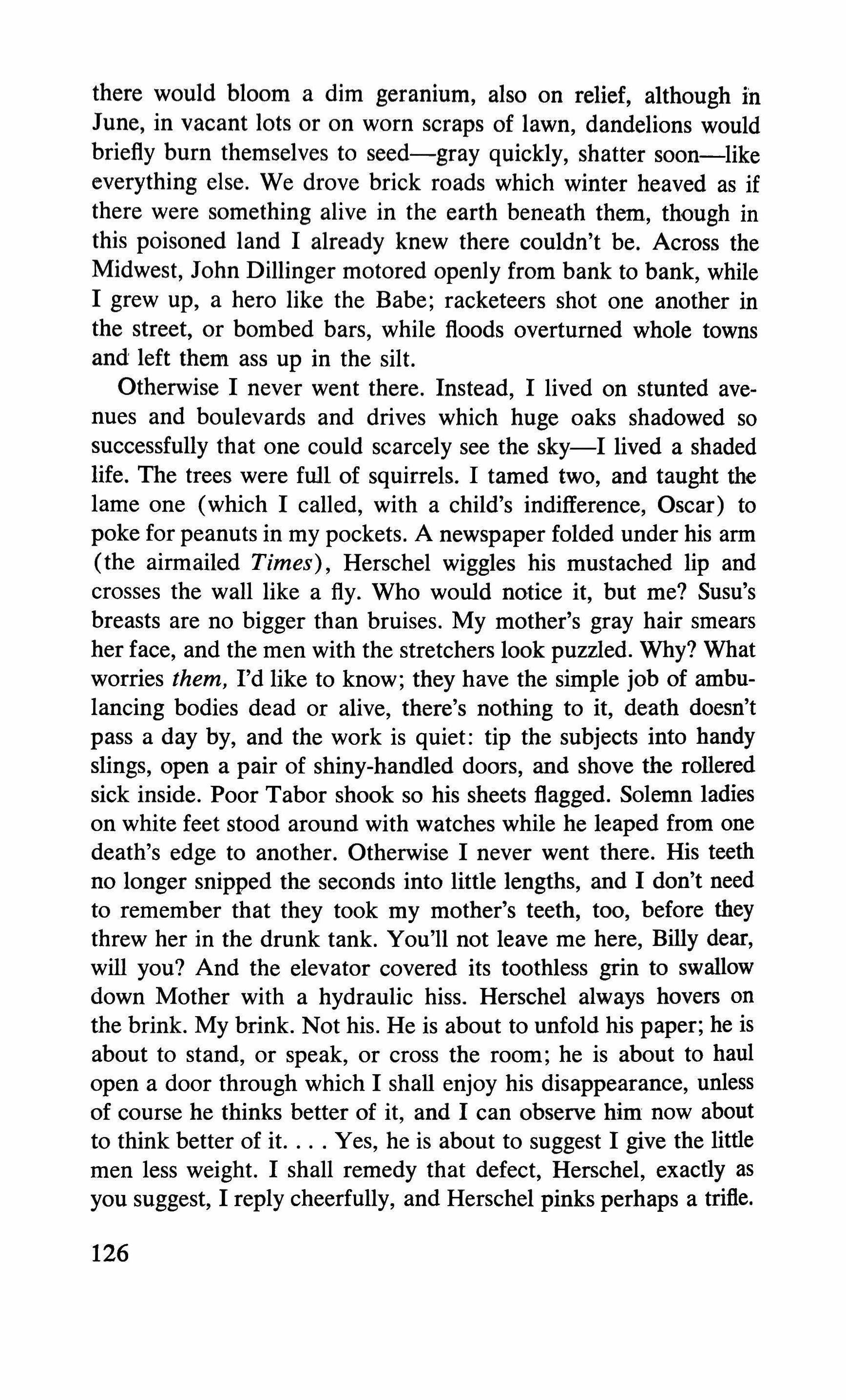
there would bloom a dim geranium, also on relief, although in June, in vacant lots or on worn scraps of lawn, dandelions would briefly burn themselves to seed-gray quickly, shatter soon-like everything else. We drove brick roads which winter heaved as if there were something alive in the earth beneath them, though in this poisoned land I already knew there couldn't be. Across the Midwest, John Dillinger motored openly from bank to bank, while I grew up, a hero like the Babe; racketeers shot one another in the street, or bombed bars, while floods overturned whole towns and left them ass up in the silt.
Otherwise I never went there. Instead, I lived on stunted avenues and boulevards and drives which huge oaks shadowed so successfully that one could scarcely see the sky-I lived a shaded life. The trees were full of squirrels. I tamed two, and taught the lame one (which I called, with a child's indifference, Oscar) to poke for peanuts in my pockets. A newspaper folded under his arm (the airmailed Times), Herschel wiggles his mustached lip and crosses the wall like a fly. Who would notice it, but me? Susu's breasts are no bigger than bruises. My mother's gray hair smears her face, and the men with the stretchers look puzzled. Why? What worries them, I'd like to know; they have the simple job of ambulancing bodies dead or alive, there's nothing to it, death doesn't pass a day by, and the work is quiet: tip the subjects into handy slings, open a pair of shiny-handled doors, and shove the rollered sick inside. Poor Tabor shook so his sheets flagged. Solemn ladies on white feet stood around with watches while he leaped from one death's edge to another. Otherwise I never went there. His teeth no longer snipped the seconds into little lengths, and I don't need to remember that they took my mother's teeth, too, before they threw her in the drunk tank. You'll not leave me here, Billy dear, will you? And the elevator covered its toothless grin to swallow down Mother with a hydraulic hiss. Herschel always hovers on the brink. My brink. Not his. He is about to unfold his paper; he is about to stand, or speak, or cross the room; he is about to haul open a door through which I shall enjoy his disappearance, unless of course he thinks better of it, and I can observe him now about to think better of it. Yes, he is about to suggest I give the little men less weight. I shall remedy that defect, Herschel, exactly as you suggest, I reply cheerfully, and Herschel pinks perhaps a trifle.
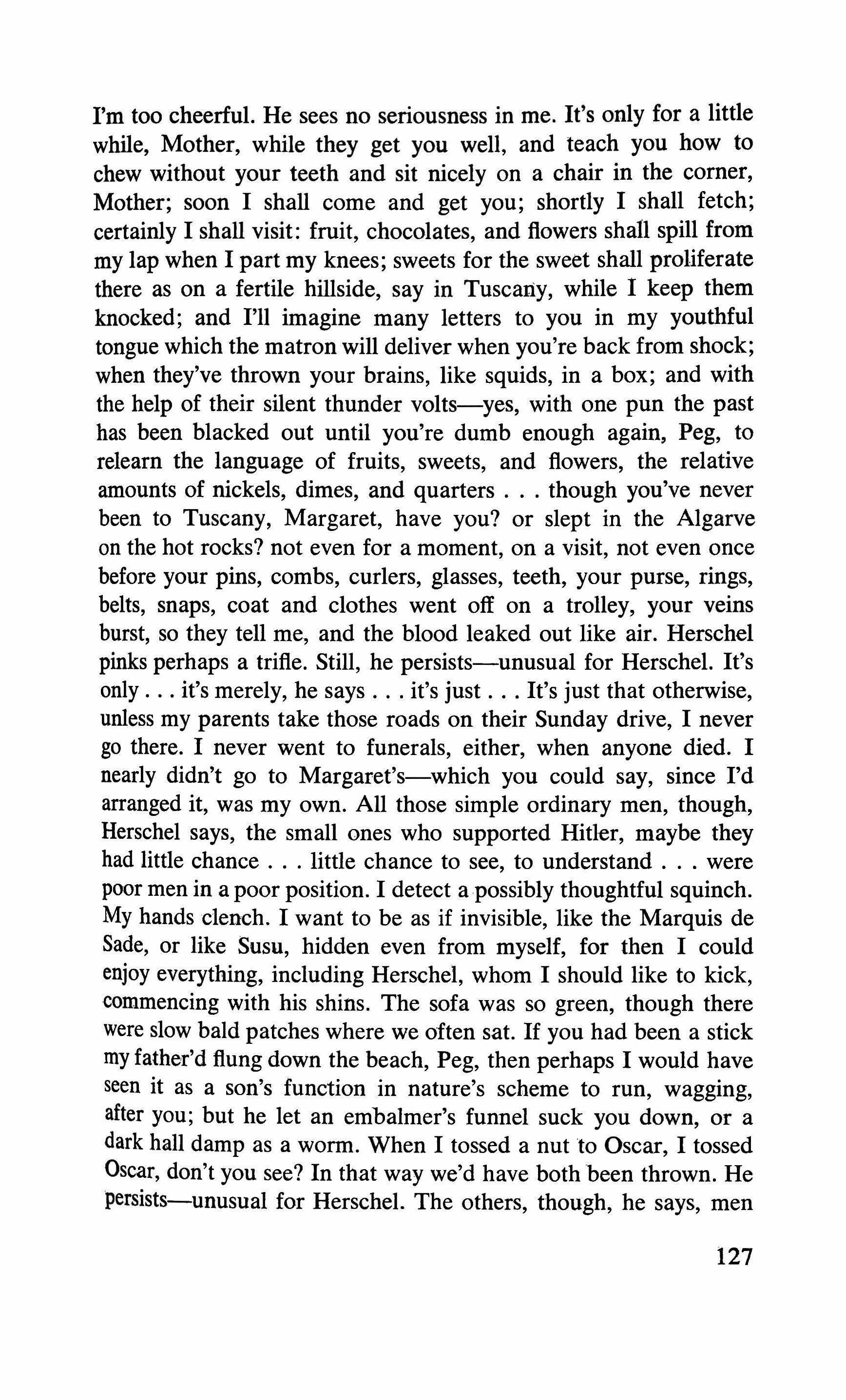
I'm too cheerful. He sees no seriousness in me. It's only for a little while, Mother, while they get you well, and teach you how to chew without your teeth and sit nicely on a chair in the corner, Mother; soon I shall come and get you; shortly I shall fetch; certainly I shall visit: fruit, chocolates, and flowers shall spill from my lap when I part my knees; sweets for the sweet shall proliferate there as on a fertile hillside, say in Tuscany, while I keep them knocked; and I'll imagine many letters to you in my youthful tongue which the matron will deliver when you're back from shock; when they've thrown your brains, like squids, in a box; and with the help of their silent thunder volts-yes, with one pun the past has been blacked out until you're dumb enough again, Peg, to relearn the language of fruits, sweets, and flowers, the relative amounts of nickels, dimes, and quarters though you've never been to Tuscany, Margaret, have you? or slept in the Algarve on the hot rocks? not even for a moment, on a visit, not even once before your pins, combs, curlers, glasses, teeth, your purse, rings, belts, snaps, coat and clothes went off on a trolley, your veins burst, so they tell me, and the blood leaked out like air. Herschel pinks perhaps a trifle. Still, he persists-unusual for Herschel. It's only it's merely, he says it's just It's just that otherwise, unless my parents take those roads on their Sunday drive, I never go there. I never went to funerals, either, when anyone died. I nearly didn't go to Margaret's-which you could say, since I'd arranged it, was my own. All those simple ordinary men, though, Herschel says, the small ones who supported Hitler, maybe they had little chance little chance to see, to understand were poor men in a poor position. I detect a possibly thoughtful squinch. My hands clench. I want to be as if invisible, like the Marquis de Sade, or like Susu, hidden even from myself, for then I could enjoy everything, including Herschel, whom I should like to kick, commencing with his shins. The sofa was so green, though there were slow bald patches where we often sat. If you had been a stick my father'd flung down the beach, Peg, then perhaps I would have seen it as a son's function in nature's scheme to run, wagging, after you; but he let an embalmer's funnel suck you down, or a dark hall damp as a worm. When I tossed a nut to Oscar, I tossed Oscar, don't you see? In that way we'd have both been thrown. He persists-unusual for Herschel. The others, though, he says, men
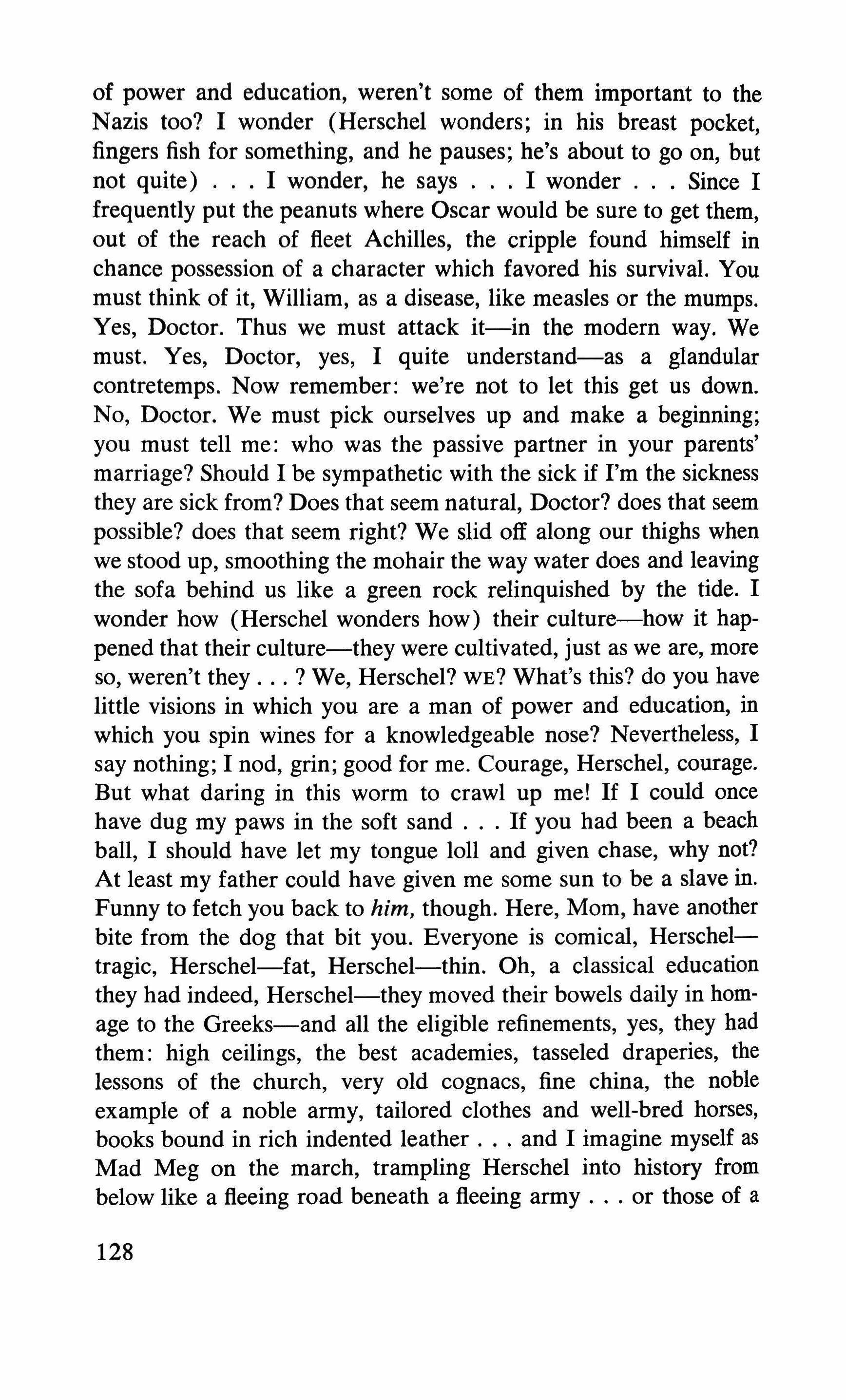
of power and education, weren't some of them important to the Nazis too? I wonder (Herschel wonders; in his breast pocket, fingers fish for something, and he pauses; he's about to go on, but not quite) I wonder, he says I wonder Since I frequently put the peanuts where Oscar would be sure to get them, out of the reach of fleet Achilles, the cripple found himself in chance possession of a character which favored his survival. You must think of it, William, as a disease, like measles or the mumps. Yes, Doctor. Thus we must attack it-in the modern way. We must. Yes, Doctor, yes, I quite understand-as a glandular contretemps. Now remember: we're not to let this get us down. No, Doctor. We must pick ourselves up and make a beginning; you must tell me: who was the passive partner in your parents' marriage? Should I be sympathetic with the sick if I'm the sickness they are sick from? Does that seem natural, Doctor? does that seem possible? does that seem right? We slid off along our thighs when we stood up, smoothing the mohair the way water does and leaving the sofa behind us like a green rock relinquished by the tide. I wonder how (Herschel wonders how) their culture-how it happened that their culture-they were cultivated, just as we are, more so, weren't they ? We, Herschel? WE? What's this? do you have little visions in which you are a man of power and education, in which you spin wines for a knowledgeable nose? Nevertheless, I say nothing; I nod, grin; good for me. Courage, Herschel, courage. But what daring in this worm to crawl up me! If I could once have dug my paws in the soft sand If you had been a beach ball, I should have let my tongue loll and given chase, why not? At least my father could have given me some sun to be a slave in. Funny to fetch you back to him, though. Here, Mom, have another bite from the dog that bit you. Everyone is comical, Herscheltragic, Herschel-fat, Herschel-thin. Oh, a classical education they had indeed, Herschel-they moved their bowels daily in homage to the Greeks-and all the eligible refinements, yes, they had them: high ceilings, the best academies, tasseled draperies, the lessons of the church, very old cognacs, fine china, the noble example of a noble army, tailored clothes and well-bred horses, books bound in rich indented leather and I imagine myself as Mad Meg on the march, trampling Herschel into history from below like a fleeing road beneath a fleeing army or those of a
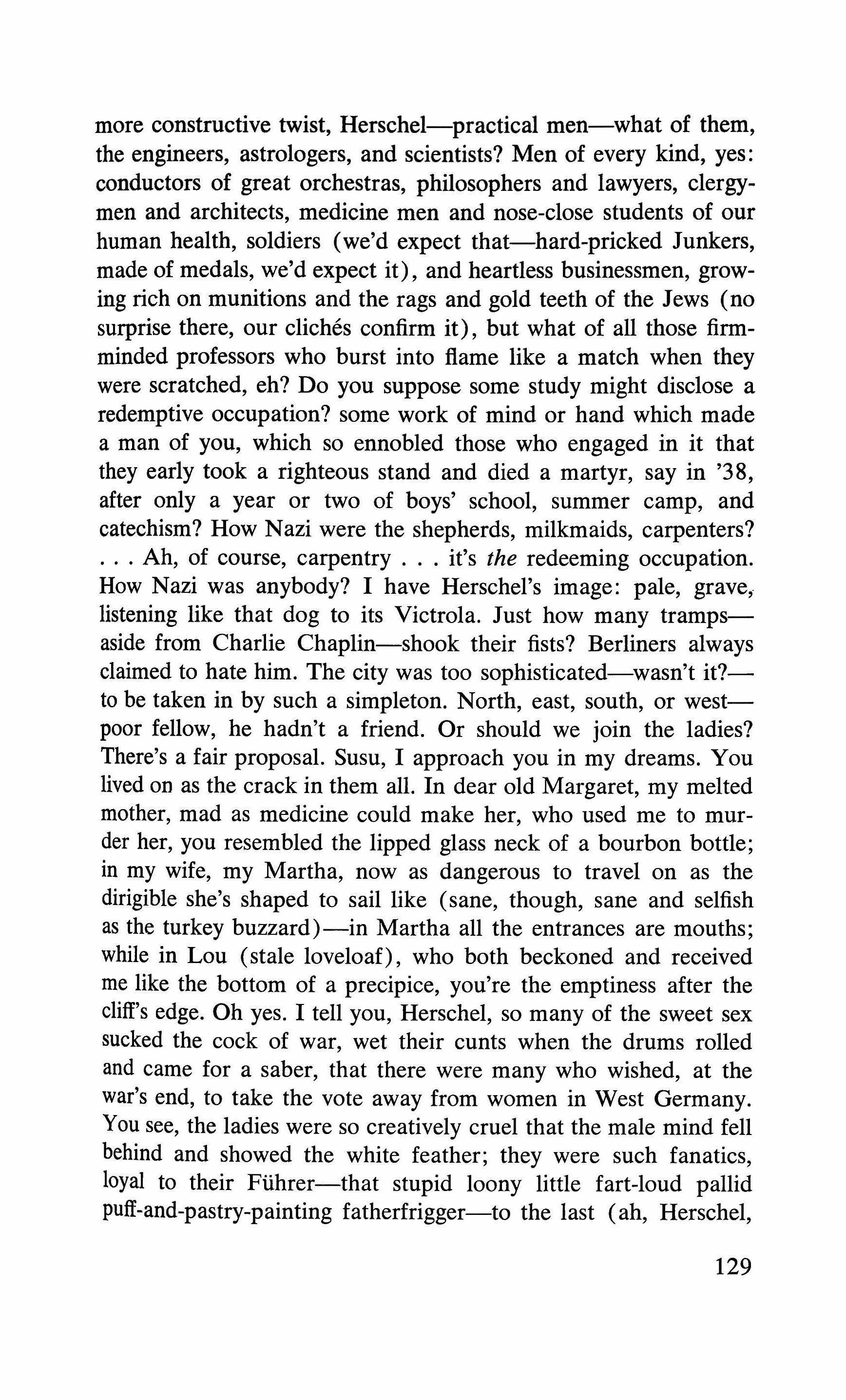
more constructive twist, Herschel-practical men-what of them, the engineers, astrologers, and scientists? Men of every kind, yes: conductors of great orchestras, philosophers and lawyers, clergymen and architects, medicine men and nose-close students of our human health, soldiers (we'd expect that-hard-pricked Junkers, made of medals, we'd expect it), and heartless businessmen, growing rich on munitions and the rags and gold teeth of the Jews (no surprise there, our cliches confirm it), but what of all those firmminded professors who burst into flame like a match when they were scratched, eh? Do you suppose some study might disclose a redemptive occupation? some work of mind or hand which made a man of you, which so ennobled those who engaged in it that they early took a righteous stand and died a martyr, say in '38, after only a year or two of boys' school, summer camp, and catechism? How Nazi were the shepherds, milkmaids, carpenters? Ah, of course, carpentry it's the redeeming occupation. How Nazi was anybody? I have Herschel's image: pale, grave, listening like that dog to its Victrola. Just how many trampsaside from Charlie Chaplin-shook their fists? Berliners always claimed to hate him. The city was too sophisticated-wasn't it?to be taken in by such a simpleton. North, east, south, or westpoor fellow, he hadn't a friend. Or should we join the ladies? There's a fair proposal. Susu, I approach you in my dreams. You lived on as the crack in them all. In dear old Margaret, my melted mother, mad as medicine could make her, who used me to murder her, you resembled the lipped glass neck of a bourbon bottle; in my wife, my Martha, now as dangerous to travel on as the dirigible she's shaped to sail like (sane, though, sane and selfish as the turkey buzzard)-in Martha all the entrances are mouths; while in Lou (stale loveloaf), who both beckoned and received me like the bottom of a precipice, you're the emptiness after the cliff's edge. Oh yes. I tell you, Herschel, so many of the sweet sex sucked the cock of war, wet their cunts when the drums rolled and came for a saber, that there were many who wished, at the war's end, to take the vote away from women in West Germany. You see, the ladies were so creatively cruel that the male mind fell behind and showed the white feather; they were such fanatics, loyal to their Fuhrer-that stupid loony little fart-loud pallid puff-and-pastry-painting fatherfrigger-to the last (ah, Herschel,
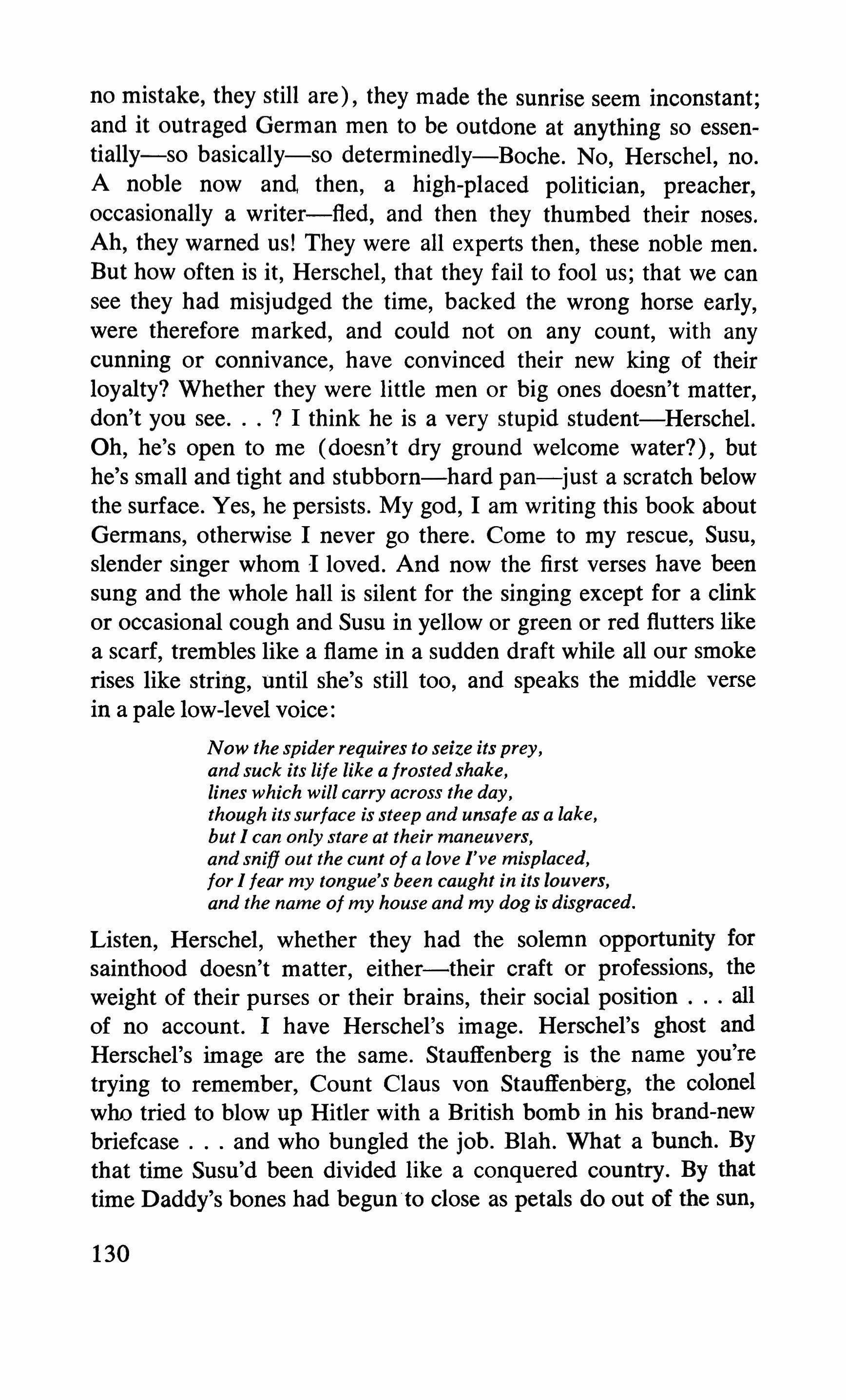
no mistake, they still are), they made the sunrise seem inconstant; and it outraged German men to be outdone at anything so essentially-so basically-so determinedly-Boche. No, Herschel, no. A noble now and then, a high-placed politician, preacher, occasionally a writer-fled, and then they thumbed their noses. Ah, they warned us! They were all experts then, these noble men. But how often is it, Herschel, that they fail to fool us; that we can see they had misjudged the time, backed the wrong horse early, were therefore marked, and could not on any count, with any cunning or connivance, have convinced their new king of their loyalty? Whether they were little men or big ones doesn't matter, don't you see ? I think he is a very stupid student-Herschel. Oh, he's open to me (doesn't dry ground welcome water?), but he's small and tight and stubborn-hard pan-just a scratch below the surface. Yes, he persists. My god, I am writing this book about Germans, otherwise I never go there. Come to my rescue, Susu, slender singer whom I loved. And now the first verses have been sung and the whole hall is silent for the singing except for a clink or occasional cough and Susu in yellow or green or red flutters like a scarf, trembles like a flame in a sudden draft while all our smoke rises like string, until she's still too, and speaks the middle verse in a pale low-level voice:
Now the spiderrequires to seize its prey, and suck its life like a frostedshake, lines which will carry across the day, though its surface is steep and unsafe as a lake, but I can only stare at their maneuvers, and sniff out the cunt of a love I've misplaced, for I fear my tongue's been caught in its louvers, and the name of my house and my dog is disgraced. Listen, Herschel, whether they had the solemn opportunity for sainthood doesn't matter, either-their craft or professions, the weight of their purses or their brains, their social position all of no account. I have Herschel's image. Herschel's ghost and Herschel's image are the same. Stauffenberg is the name you're trying to remember, Count Claus von Stauffenberg, the colonel who tried to blow up Hitler with a British bomb in his brand-new briefcase and who bungled the job. Blah. What a bunch. By that time Susu'd been divided like a conquered country. By that time Daddy's bones had begun to close as petals do out of the sun,
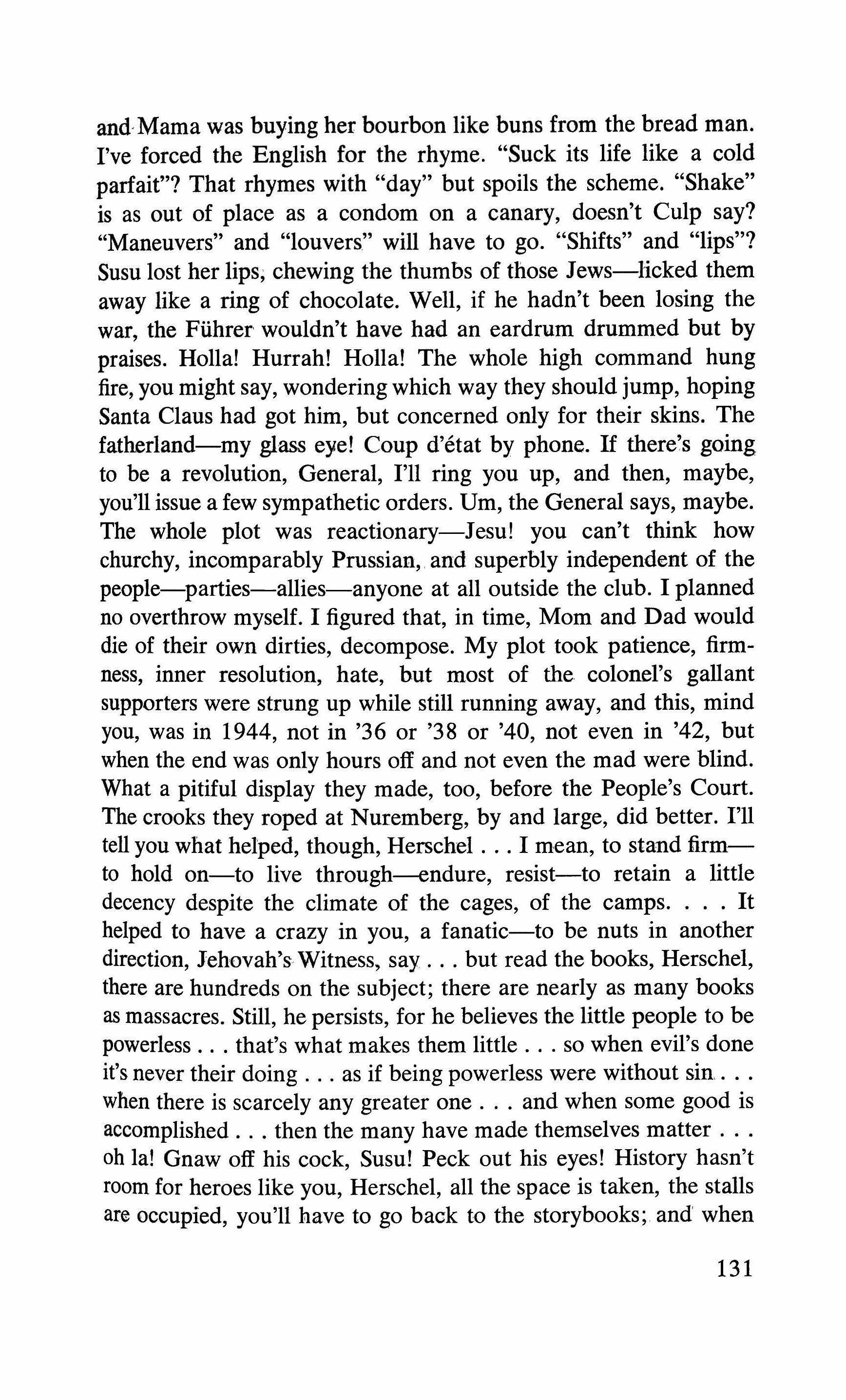
and-Mama was buying her bourbon like buns from the bread man. I've forced the English for the rhyme. "Suck its life like a cold parfait"? That rhymes with "day" but spoils the scheme. "Shake" is as out of place as a condom on a canary, doesn't Culp say? "Maneuvers" and "louvers" will have to go. "Shifts" and "lips"? Susu lost her lips; chewing the thumbs of those Jews-s-licked them away like a ring of chocolate. Well, if he hadn't been losing the war, the FUhrer wouldn't have had an eardrum drummed but by praises. Halla! Hurrah! Halla! The whole high command hung fire, you might say, wondering which way they should jump, hoping Santa Claus had got him, but concerned only for their skins. The fatherland-my glass eye! Coup d'etat by phone. If there's going to be a revolution, General, I'll ring you up, and then, maybe, you'll issue a few sympathetic orders. Urn, the General says, maybe. The whole plot was reactionary-lesu! you can't think how churchy, incomparably Prussian; and superbly independent of the people-parties-allies-anyone at all outside the club. I planned no overthrow myself. I figured that, in time, Mom and Dad would die of their own dirties, decompose. My plot took patience, firmness, inner resolution, hate, but most of the colonel's gallant supporters were strung up while still running away, and this, mind you, was in 1944, not in '36 or '38 or '40, not even in '42, but when the end was only hours off and not even the mad were blind. What a pitiful display they made, too, before the People's Court. The crooks they roped at Nuremberg, by and large, did better. I'll tell you what helped, though, Herschel I mean, to stand firmto hold on-to live through--endure, resist-to retain a little decency despite the climate of the cages, of the camps. It helped to have a crazy in you, a fanatic-to be nuts in another direction, Jehovah'sWitness, say but read the books, Herschel, there are hundreds on the subject; there are nearly as many books as massacres. Still, he persists, for he believes the little people to be powerless that's what makes them little so when evil's done it's never their doing as if being powerless were without sin when there is scarcely any greater one and when some good is accomplished then the many have made themselves matter oh la! Gnaw off his cock, Susu! Peck out his eyes! History hasn't room for heroes like you, Herschel, all the space is taken, the stalls are occupied, you'll have to go back to the storybooks; and when
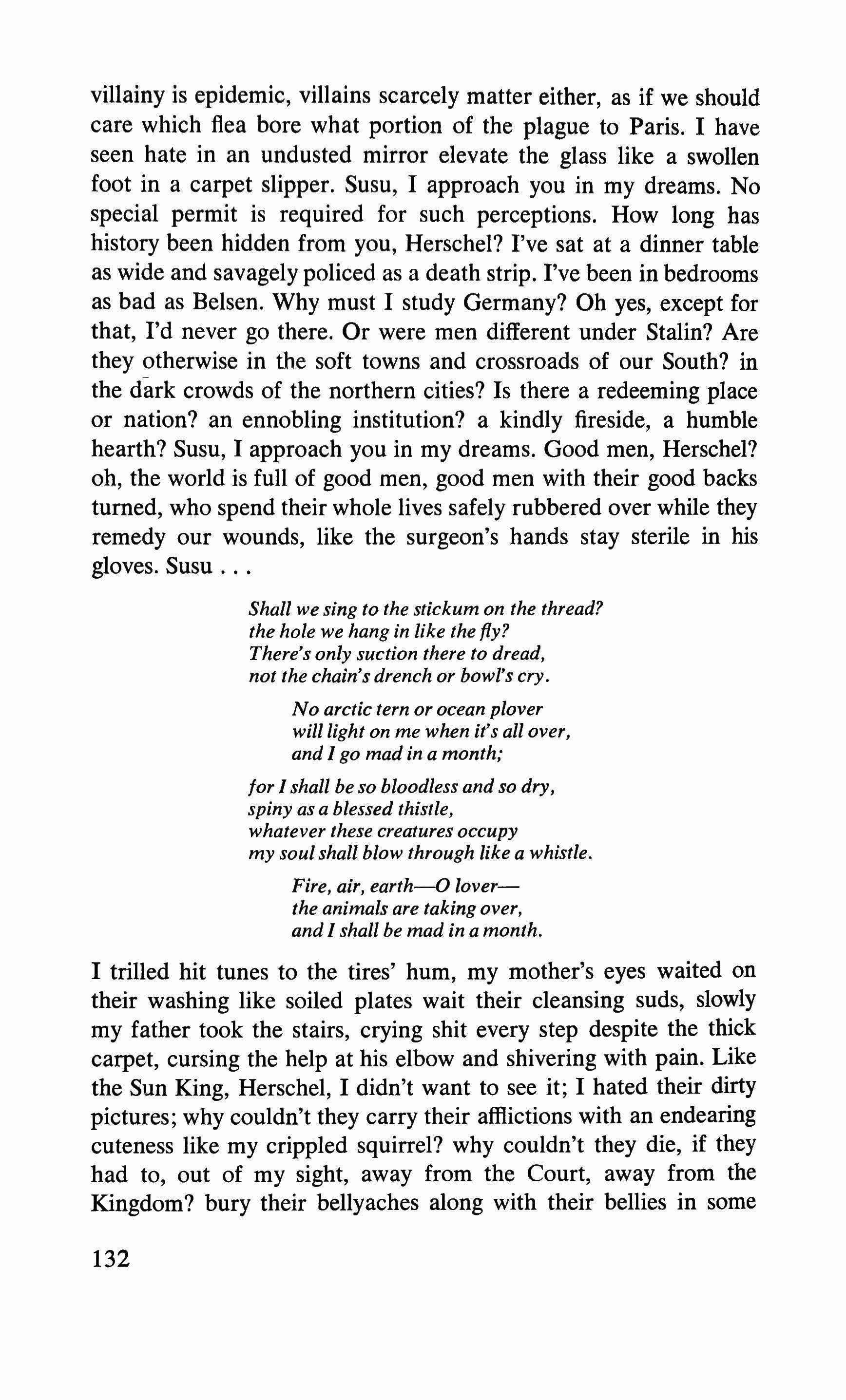
villainy is epidemic, villains scarcely matter either, as if we should care which flea bore what portion of the plague to Paris. I have seen hate in an undusted mirror elevate the glass like a swollen foot in a carpet slipper. Susu, I approach you in my dreams. No special permit is required for such perceptions. How long has history been hidden from you, Herschel? I've sat at a dinner table as wide and savagely policed as a death strip. I've been in bedrooms as bad as Belsen. Why must I study Germany? Oh yes, except for that, I'd never go there. Or were men different under Stalin? Are they otherwise in the soft towns and crossroads of our South? in the dark crowds of the northern cities? Is there a redeeming place or nation? an ennobling institution? a kindly fireside, a humble hearth? Susu, I approach you in my dreams. Good men, Herschel? oh, the world is full of good men, good men with their good backs turned, who spend their whole lives safely rubbered over while they remedy our wounds, like the surgeon's hands stay sterile in his gloves. Susu
Shall we sing to the stickum on the thread? the hole we hang in like the fly? There's only suction there to dread, not the chain's drench or bowl's cry.
No arctic tern or ocean plover will light on me when it's all over, and I go mad in a month; for I shall be so bloodless and so dry, spiny as a blessed thistle, whatever these creatures occupy my soul shall blow through like a whistle.
Fire, air, earth-O loverthe animals are taking over, and I shall be mad in a month.
I trilled hit tunes to the tires' hum, my mother's eyes waited on their washing like soiled plates wait their cleansing suds, slowly my father took the stairs, crying shit every step despite the thick carpet, cursing the help at his elbow and shivering with pain. Like the Sun King, Herschel, I didn't want to see it; I hated their dirty pictures; why couldn't they carry their afflictions with an endearing cuteness like my crippled squirrel? why couldn't they die, if they had to, out of my sight, away from the Court, away from the Kingdom? bury their bellyaches along with their bellies in some
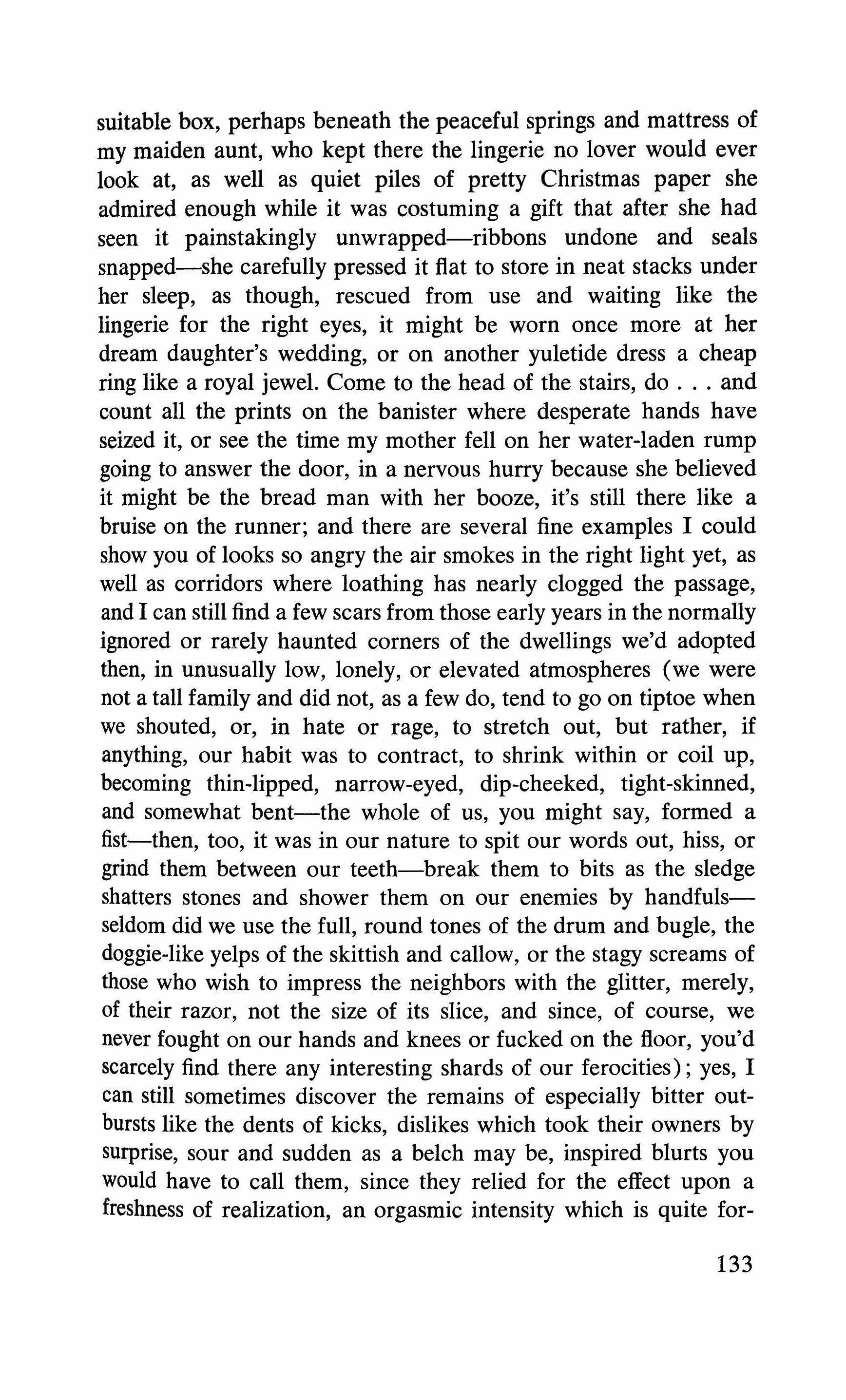
suitable box, perhaps beneath the peaceful springs and mattress of my maiden aunt, who kept there the lingerie no lover would ever look at, as well as quiet piles of pretty Christmas paper she admired enough while it was costuming a gift that after she had seen it painstakingly unwrapped-ribbons undone and seals snapped-she carefully pressed it flat to store in neat stacks under her sleep, as though, rescued from use and waiting like the lingerie for the right eyes, it might be worn once more at her dream daughter's wedding, or on another yuletide dress a cheap ring like a royal jewel. Come to the head of the stairs, do and count all the prints on the banister where desperate hands have seized it, or see the time my mother fell on her water-laden rump going to answer the door, in a nervous hurry because she believed it might be the bread man with her booze, it's still there like a bruise on the runner; and there are several fine examples I could show you of looks so angry the air smokes in the right light yet, as well as corridors where loathing has nearly clogged the passage, and I can still find a few scars from those early years in the normally ignored or rarely haunted corners of the dwellings we'd adopted then, in unusually low, lonely, or elevated atmospheres (we were not a tall family and did not, as a few do, tend to go on tiptoe when we shouted, or, in hate or rage, to stretch out, but rather, if anything, our habit was to contract, to shrink within or coil up, becoming thin-lipped, narrow-eyed, dip-cheeked, tight-skinned, and somewhat bent-the whole of us, you might say, formed a fist-then, too, it was in our nature to spit our words out, hiss, or grind them between our teeth-break them to bits as the sledge shatters stones and shower them on our enemies by handfulsseldom did we use the full, round tones of the drum and bugle, the doggie-like yelps of the skittish and callow, or the stagy screams of those who wish to impress the neighbors with the glitter, merely, of their razor, not the size of its slice, and since, of course, we never fought on our hands and knees or fucked on the floor, you'd scarcely find there any interesting shards of our ferocities) ; yes, I can still sometimes discover the remains of especially bitter outbursts like the dents of kicks, dislikes which took their owners by surprise, sour and sudden as a belch may be, inspired blurts you would have to call them, since they relied for the effect upon a freshness of realization, an orgasmic intensity which is quite for-
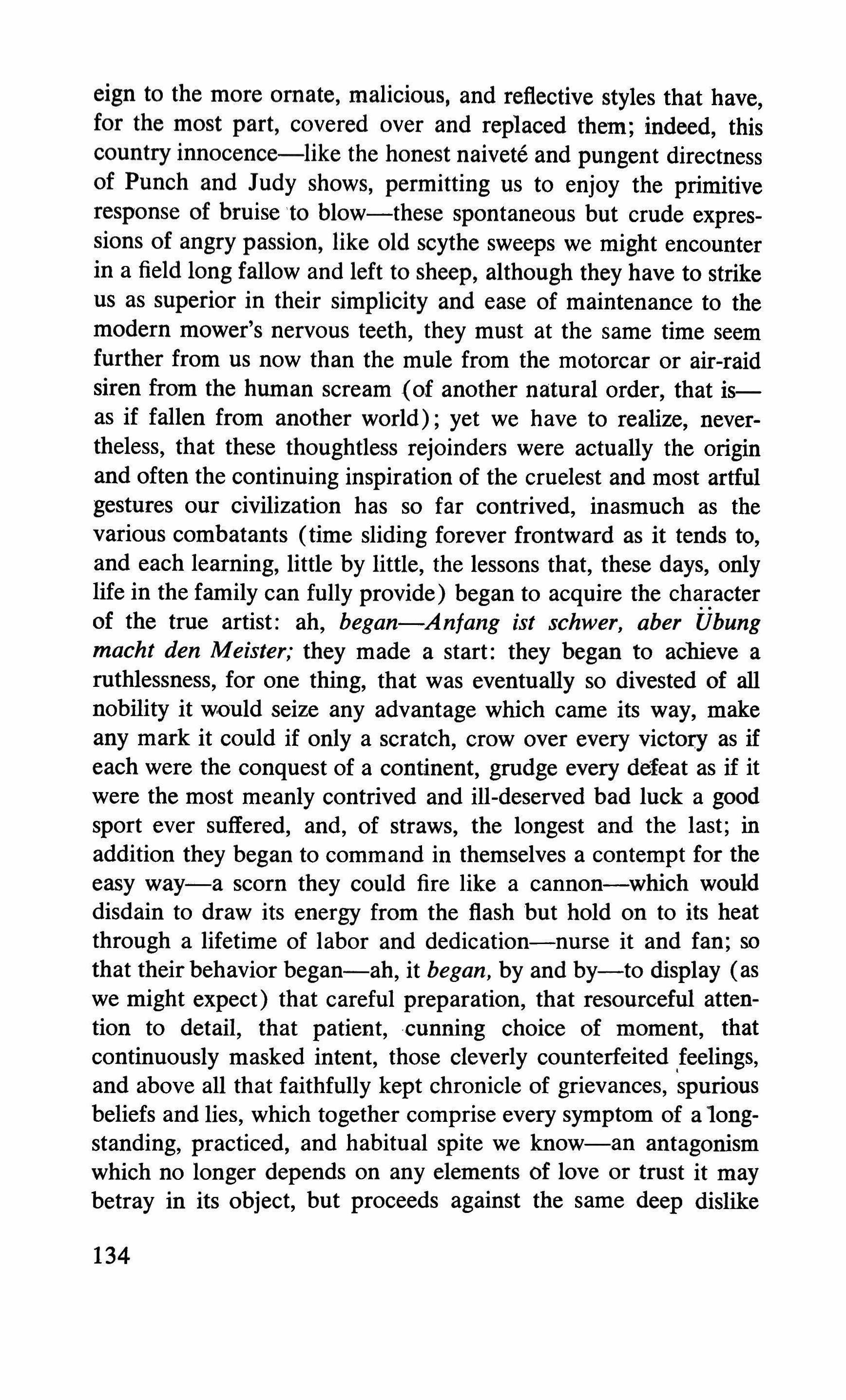
eign to the more ornate, malicious, and reflective styles that have, for the most part, covered over and replaced them; indeed, this country innocence-like the honest naivete and pungent directness of Punch and Judy shows, permitting us to enjoy the primitive response of bruise to blow-these spontaneous but crude expressions of angry passion, like old scythe sweeps we might encounter in a field long fallow and left to sheep, although they have to strike us as superior in their simplicity and ease of maintenance to the modern mower's nervous teeth, they must at the same time seem further from us now than the mule from the motorcar or air-raid siren from the human scream {of another natural order, that isas if fallen from another world); yet we have to realize, nevertheless, that these thoughtless rejoinders were actually the origin and often the continuing inspiration of the cruelest and most artful gestures our civilization has so far contrived, inasmuch as the various combatants (time sliding forever frontward as it tends to, and each learning, little by little, the lessons that, these days, only life in the family can fully provide) began to acquire the character of the true artist: ah, began-Anfang ist schwer, aber Ubung macht den Meister; they made a start: they began to achieve a ruthlessness, for one thing, that was eventually so divested of all nobility it would seize any advantage which came its way, make any mark it could if only a scratch, crow over every victory as if each were the conquest of a continent, grudge every defeat as if it were the most meanly contrived and ill-deserved bad luck a good sport ever suffered, and, of straws, the longest and the last; in addition they began to command in themselves a contempt for the easy way-a scorn they could fire like a cannon-which would disdain to draw its energy from the flash but hold on to its heat through a lifetime of labor and dedication-nurse it and fan; so that their behavior began-ah, it began, by and by-to display (as we might expect) that careful preparation, that resourceful attention to detail, that patient, cunning choice of moment, that continuously masked intent, those cleverly counterfeited feelings, and above all that faithfully kept chronicle of grievances, spurious beliefs and lies, which together comprise every symptom of a longstanding, practiced, and habitual spite we know-an antagonism which no longer depends on any elements of love or trust it may betray in its object, but proceeds against the same deep dislike
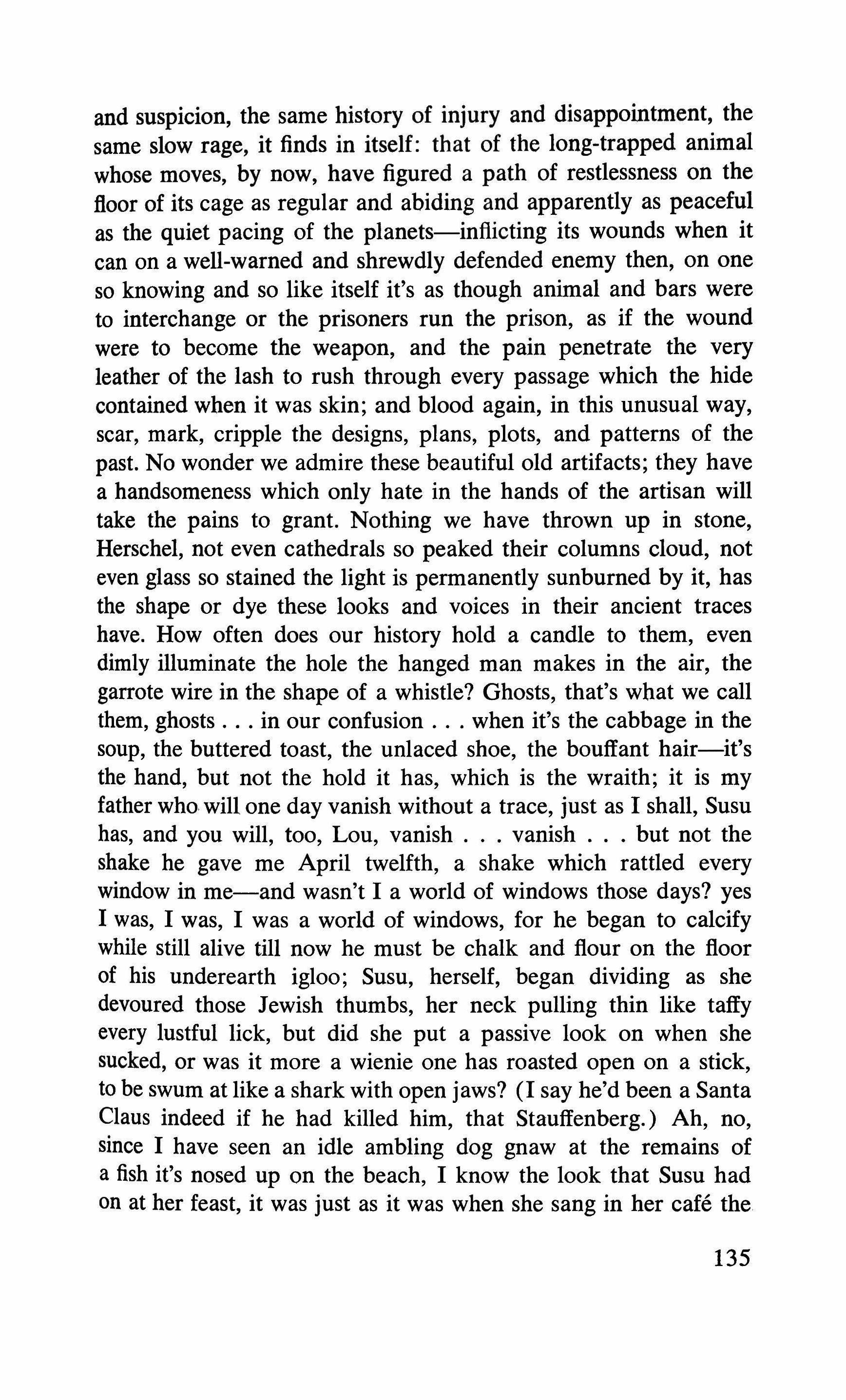
and suspicion, the same history of injury and disappointment, the same slow rage, it finds in itself: that of the long-trapped animal whose moves, by now, have figured a path of restlessness on the floor of its cage as regular and abiding and apparently as peaceful as the quiet pacing of the planets-inflicting its wounds when it can on a well-warned and shrewdly defended enemy then, on one so knowing and so like itself it's as though animal and bars were to interchange or the prisoners run the prison, as if the wound were to become the weapon, and the pain penetrate the very leather of the lash to rush through every passage which the hide contained when it was skin; and blood again, in this unusual way, scar, mark, cripple the designs, plans, plots, and patterns of the past. No wonder we admire these beautiful old artifacts; they have a handsomeness which only hate in the hands of the artisan will take the pains to grant. Nothing we have thrown up in stone, Herschel, not even cathedrals so peaked their columns cloud, not even glass so stained the light is permanently sunburned by it, has the shape or dye these looks and voices in their ancient traces have. How often does our history hold a candle to them, even dimly illuminate the hole the hanged man makes in the air, the garrote wire in the shape of a whistle? Ghosts, that's what we call them, ghosts in our confusion when it's the cabbage in the soup, the buttered toast, the unlaced shoe, the bouffant hair-it's the hand, but not the hold it has, which is the wraith; it is my father who will one day vanish without a trace, just as 1 shall, Susu has, and you will, too, Lou, vanish vanish but not the shake he gave me April twelfth, a shake which rattled every window in me-and wasn't 1 a world of windows those days? yes 1 was, 1 was, 1 was a world of windows, for he began to calcify while still alive till now he must be chalk and flour on the floor of his underearth igloo; Susu, herself, began dividing as she devoured those Jewish thumbs, her neck pulling thin like taffy every lustful lick, but did she put a passive look on when she sucked, or was it more a wienie one has roasted open on a stick, to be swum at like a shark with open jaws? (I say he'd been a Santa Claus indeed if he had killed him, that Stauffenberg.) Ah, no, since 1 have seen an idle ambling dog gnaw at the remains of a fish it's nosed up on the beach, 1 know the look that Susu had on at her feast, it was just as it was when she sang in her cafe the
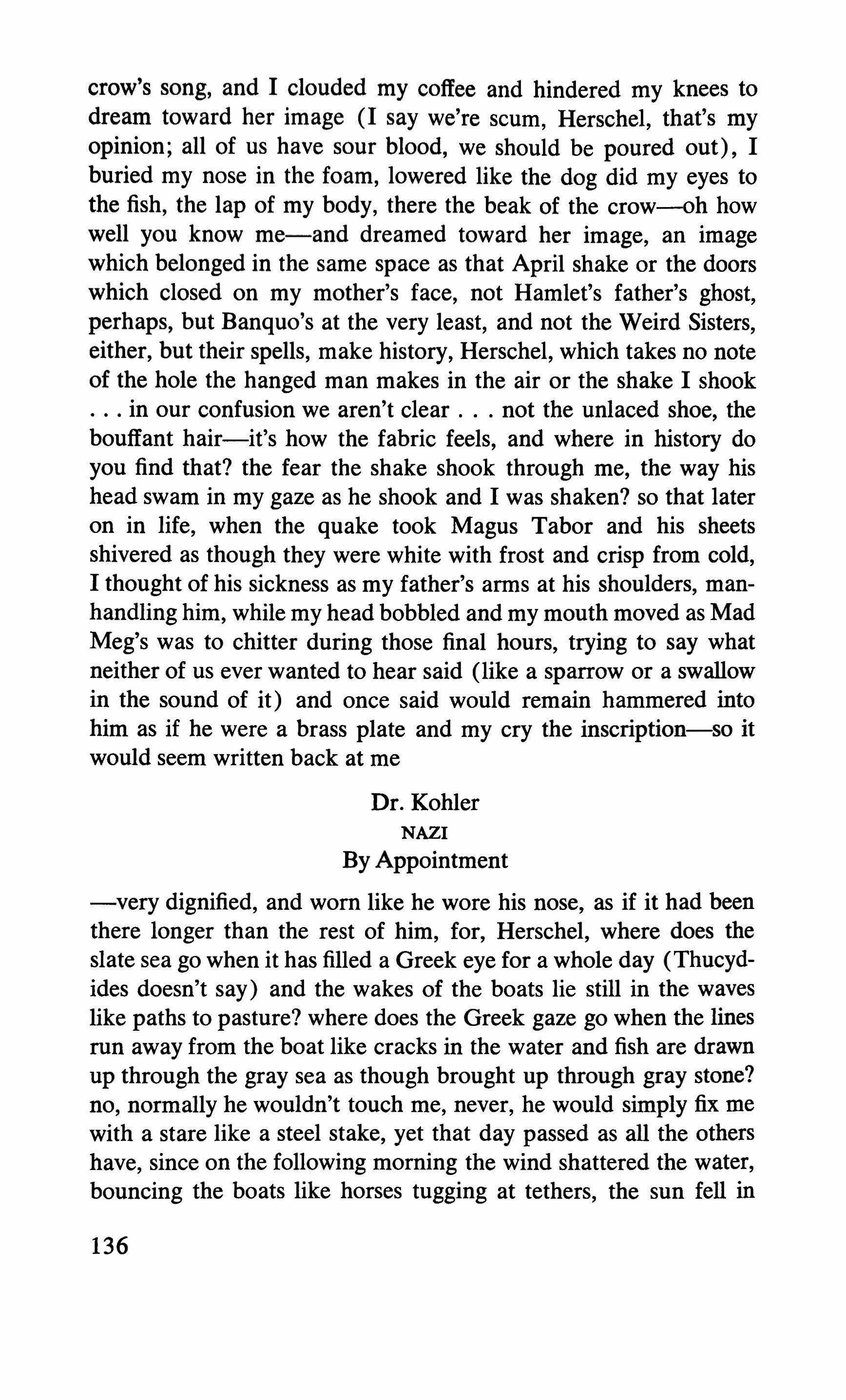
crow's song, and I clouded my coffee and hindered my knees to dream toward her image (I say we're scum, Herschel, that's my opinion; all of us have sour blood, we should be poured out), I buried my nose in the foam, lowered like the dog did my eyes to the fish, the lap of my body, there the beak of the crow-oh how well you know me-and dreamed toward her image, an image which belonged in the same space as that April shake or the doors which closed on my mother's face, not Hamlet's father's ghost, perhaps, but Banquo's at the very least, and not the Weird Sisters, either, but their spells, make history, Herschel, which takes no note of the hole the hanged man makes in the air or the shake I shook in our confusion we aren't clear not the unlaced shoe, the bouffant hair-it's how the fabric feels, and where in history do you find that? the fear the shake shook through me, the way his head swam in my gaze as he shook and I was shaken? so that later on in life, when the quake took Magus Tabor and his sheets shivered as though they were white with frost and crisp from cold, I thought of his sickness as my father's arms at his shoulders, manhandling him, while my head bobbled and my mouth moved as Mad Meg's was to chitter during those final hours, trying to say what neither of us ever wanted to hear said (like a sparrow or a swallow in the sound of it) and once said would remain hammered into him as if he were a brass plate and my cry the inscription-so it would seem written back at me
Dr. Kohler NAZI-very dignified, and worn like he wore his nose, as if it had been there longer than the rest of him, for, Herschel, where does the slate sea go when it has filled a Greek eye for a whole day (Thucydides doesn't say) and the wakes of the boats lie still in the waves like paths to pasture? where does the Greek gaze go when the lines run away from the boat like cracks in the water and fish are drawn up through the gray sea as though brought up through gray stone? no, normally he wouldn't touch me, never, he would simply fix me with a stare like a steel stake, yet that day passed as all the others have, since on the following morning the wind shattered the water, bouncing the boats like horses tugging at tethers, the sun fell in
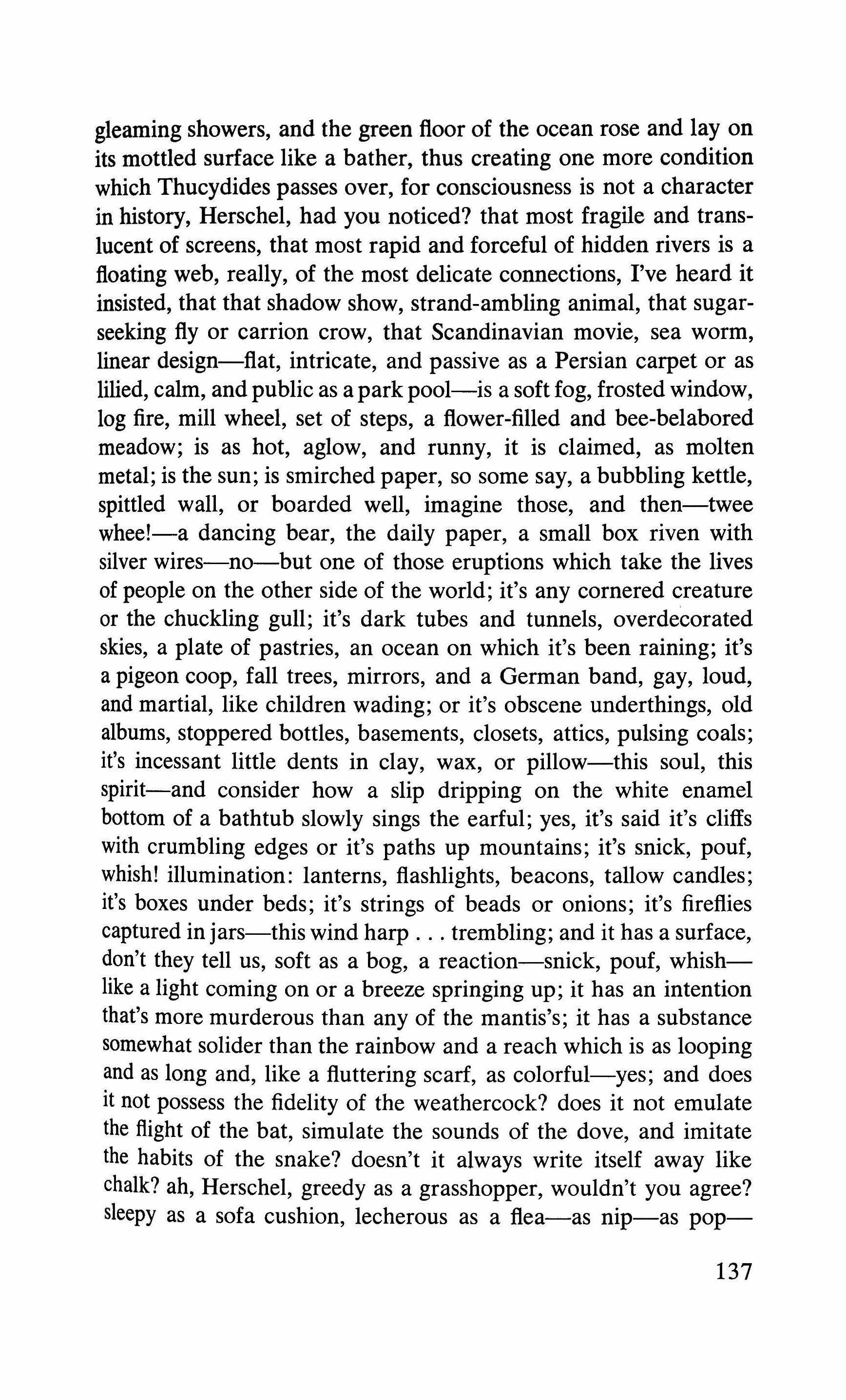
gleaming showers, and the green floor of the ocean rose and lay on its mottled surface like a bather, thus creating one more condition which Thucydides passes over, for consciousness is not a character in history, Herschel, had you noticed? that most fragile and translucent of screens, that most rapid and forceful of hidden rivers is a floating web, really, of the most delicate connections, I've heard it insisted, that that shadow show, strand-ambling animal, that sugarseeking fly or carrion crow, that Scandinavian movie, sea worm, linear design-flat, intricate, and passive as a Persian carpet or as lilied, calm, and public as a parkpool-is a soft fog, frosted window, log fire, mill wheel, set of steps, a flower-filled and bee-belabored meadow; is as hot, aglow, and runny, it is claimed, as molten metal; is the sun; is smirched paper, so some say, a bubbling kettle, spittled wall, or boarded well, imagine those, and then-twee whee!-a dancing bear, the daily paper, a small box riven with silver wires-no-but one of those eruptions which take the lives of people on the other side of the world; it's any cornered creature or the chuckling gull; it's dark tubes and tunnels, overdecorated skies, a plate of pastries, an ocean on which it's been raining; it's a pigeon coop, fall trees, mirrors, and a German band, gay, loud, and martial, like children wading; or it's obscene underthings, old albums, stoppered bottles, basements, closets, attics, pulsing coals; it's incessant little dents in clay, wax, or pillow-this soul, this spirit-and consider how a slip dripping on the white enamel bottom of a bathtub slowly sings the earful; yes, it's said it's cliffs with crumbling edges or it's paths up mountains; it's snick, pouf, whish! illumination: lanterns, flashlights, beacons, tallow candles; it's boxes under beds; it's strings of beads or onions; it's fireflies captured in jars-this wind harp trembling; and it has a surface, don't they tell us, soft as a bog, a reaction-snick, pouf, whishlike a light coming on or a breeze springing up; it has an intention that's more murderous than any of the mantis's; it has a substance somewhat solider than the rainbow and a reach which is as looping and as long and, like a fluttering scarf, as colorful-yes; and does it not possess the fidelity of the weathercock? does it not emulate the flight of the bat, simulate the sounds of the dove, and imitate the habits of the snake? doesn't it always write itself away like chalk? ah, Herschel, greedy as a grasshopper, wouldn't you agree? sleepy as a sofa cushion, lecherous as a flea-as nip-as pop-

this paradise of dreams and pharmacy of poisons, this veritable hail-rattle of events, Herschel, is not a character in history, no one considers how the wonder of our consciousness came about or is composed (a melting fresco gets a better press and more money can be collected to feed homeless cats); yet what have we made throughout our time together but just this, and haven't you frequently felt your cock, bursting with juice like a grape, strain toward its barrel? so my father would drive his swollen eyes into me and in a low cold voice, a voice so steady it must have taken all his energy, like a leaping fish, to hold it, in a slow monotonous voice so level it rocked, he would move in and out of me the way a knife cuts pie or a clock divvies silence, item by item, describing my worthless nature, tock-tock till he came, and the hairs of his nose waved like the feelers of a carnivorous plant, tick, and what have we heard from Herodotus on this point? ha, Herschel, you have already vanished, even now you leave no trace, yet I can see my own steps in the Woodbine Street house where I left them burning in the linoleum, and the closet where I hid from my father, crooked like an arm at the elbow, while he called out: don't hide from me, you little snot! bang bang bang bang bang bang bang bang bang bang bang bang bang bang bang bang the Jews were shot and how was any Jew alive to feel about a German or perhaps a gentile after bang bang bang bang and all that rot most were starved or gassed or shot, Planmantee said, we shall solve that, we are able, we shall create an international ghetto--Zion-we shall surround it with Muslims, we shall sic the Jews on the Arabs, bang they may bang all they like at one another bangedy bangbang, who will care? not my father who felt they were filthy as a South German should, not my mother who was suspicious, as a Swede should be, because they didn't drink enough to be normal, since normally he wouldn't touch me, but this time he said I'm not going to hurt you whatever you answer, bang, he said, hanging on to my shoulders for dear life, just as Mad Meg beckoned to me though he shook like a town in Anatolia, saying son, my son, bang, he said I'm not going to hurt you however you hurt me but you have never liked me, have you, you've never loved me the least bit (Tacitus, Herschel? he left it all out), and now you believe I hate you, don't you, bang you bastard, son he said, his words disassembled as fast as he spoke them, lettered up as if our anagrams were
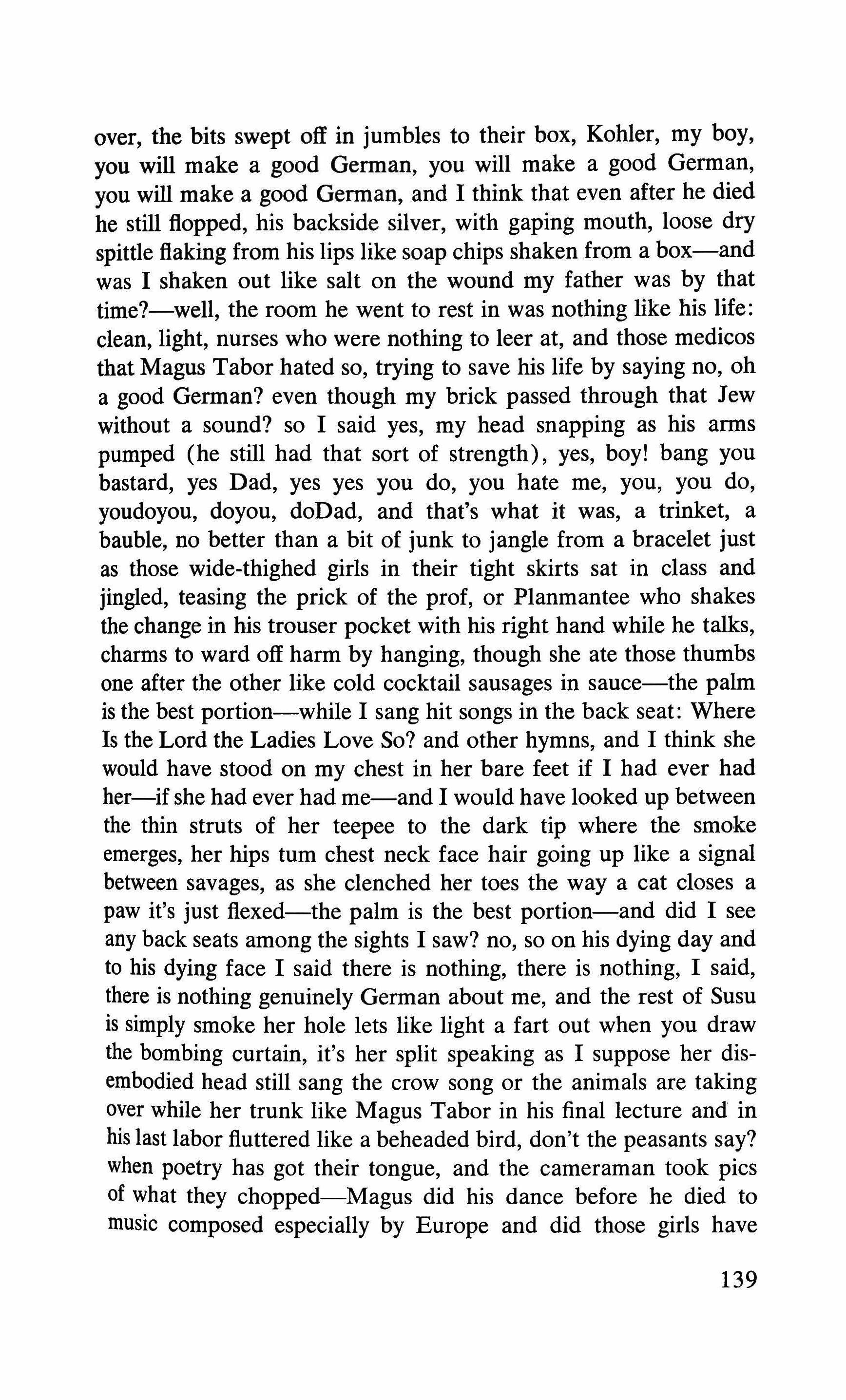
over, the bits swept off in jumbles to their box, Kohler, my boy, you will make a good German, you will make a good German, you will make a good German, and I think that even after he died he still flopped, his backside silver, with gaping mouth, loose dry spittle flaking from his lips like soap chips shaken from a box-and was I shaken out like salt on the wound my father was by that time?-well, the room he went to rest in was nothing like his life: clean, light, nurses who were nothing to leer at, and those medicos that Magus Tabor hated so, trying to save his life by saying no, oh a good German? even though my brick passed through that Jew without a sound? so I said yes, my head snapping as his arms pumped (he still had that sort of strength), yes, boy! bang you bastard, yes Dad, yes yes you do, you hate me, you, you do, youdoyou, doyou, doDad, and that's what it was, a trinket, a bauble, no better than a bit of junk to jangle from a bracelet just as those wide-thighed girls in their tight skirts sat in class and jingled, teasing the prick of the prof, or Planmantee who shakes the change in his trouser pocket with his right hand while he talks, charms to ward off harm by hanging, though she ate those thumbs one after the other like cold cocktail sausages in sauce-the palm is the best portion-while I sang hit songs in the back seat: Where Is the Lord the Ladies Love So? and other hymns, and I think she would have stood on my chest in her bare feet if I had ever had her-if she had ever had me-and I would have looked up between the thin struts of her teepee to the dark tip where the smoke emerges, her hips tum chest neck face hair going up like a signal between savages, as she clenched her toes the way a cat closes a paw it's just flexed-the palm is the best portion-and did I see any back seats among the sights I saw? no, so on his dying day and to his dying face I said there is nothing, there is nothing, I said, there is nothing genuinely German about me, and the rest of Susu is simply smoke her hole lets like light a fart out when you draw the bombing curtain, it's her split speaking as I suppose her disembodied head still sang the crow song or the animals are taking over while her trunk like Magus Tabor in his final lecture and in his last labor fluttered like a beheaded bird, don't the peasants say? When poetry has got their tongue, and the cameraman took pies of what they chopped-Magus did his dance before he died to music composed especially by Europe and did those girls have

castanets for cunts? there was such a clang and rattle in my classhow dare!-their twots would tweet, bums bang-how dare!bang bang bang bang bang bang the holes in them would hiss, my love, it was a bullet's kiss, until you couldn't hear myself speakand I've one such snap in its smart blue gold-embossed travel case slid flat between sheets of burial data in my desk, otherwise I never go there, for didn't I do (since he had dubbed me sir, made me his heir) the right thing finally? pursue and overtake his chair to have it shipped from Germany, to carry on his work in the same seat of learning, and even nearly dedicate my book to him before on second and a better thought I crossed the dedication out? ho, by all the gods of history, what possessed me?
The Lord Is Where the Ladies Love It, therefore, Herschel-if so, Herschel-then let him smite us all, march everyone to the ovens or tum us under to fertilize the onions, yes, Susu's where I bum, a naked worm I go to her hole to be consumed (to shit shave shower, weren't they sent?) and so compose her jaws lips tongue teeth (the gullet of the gull is a good place, gulls, I have heard them, bleat like sheep), the crow's tune, Herschel,
I once went to bed with a nun by pointing a pistol at one; saidshe, with a quaver, that's a good bigpersuader, but what is the point of the gun?
how well, you know, you know it knows me, aren't you my spitting image? and that is how I see things, as history should, certainly, as though it were a dog's nose, time a beach, because when I double back upon myself, I find these doubles--don't you? -the way a dog discovers his owner in his owner's clothes, sees itself in the clear mirror of its pee, for it catches a sniff as I might catch a glimpse, and there I am like a hard word or a blow, perhaps a little paler, stiff, and there is my father banging on the door of the closet with his still fistable fist (don't you see, Herschel, in that fist already is the claw it will cripple to, so his hand will one day nevermore lie flat again but curl constantly like burning paper), and there my sentence is, my life stretch, hammered to him like a revolutionary placard to a tree-for good-to hang there: you
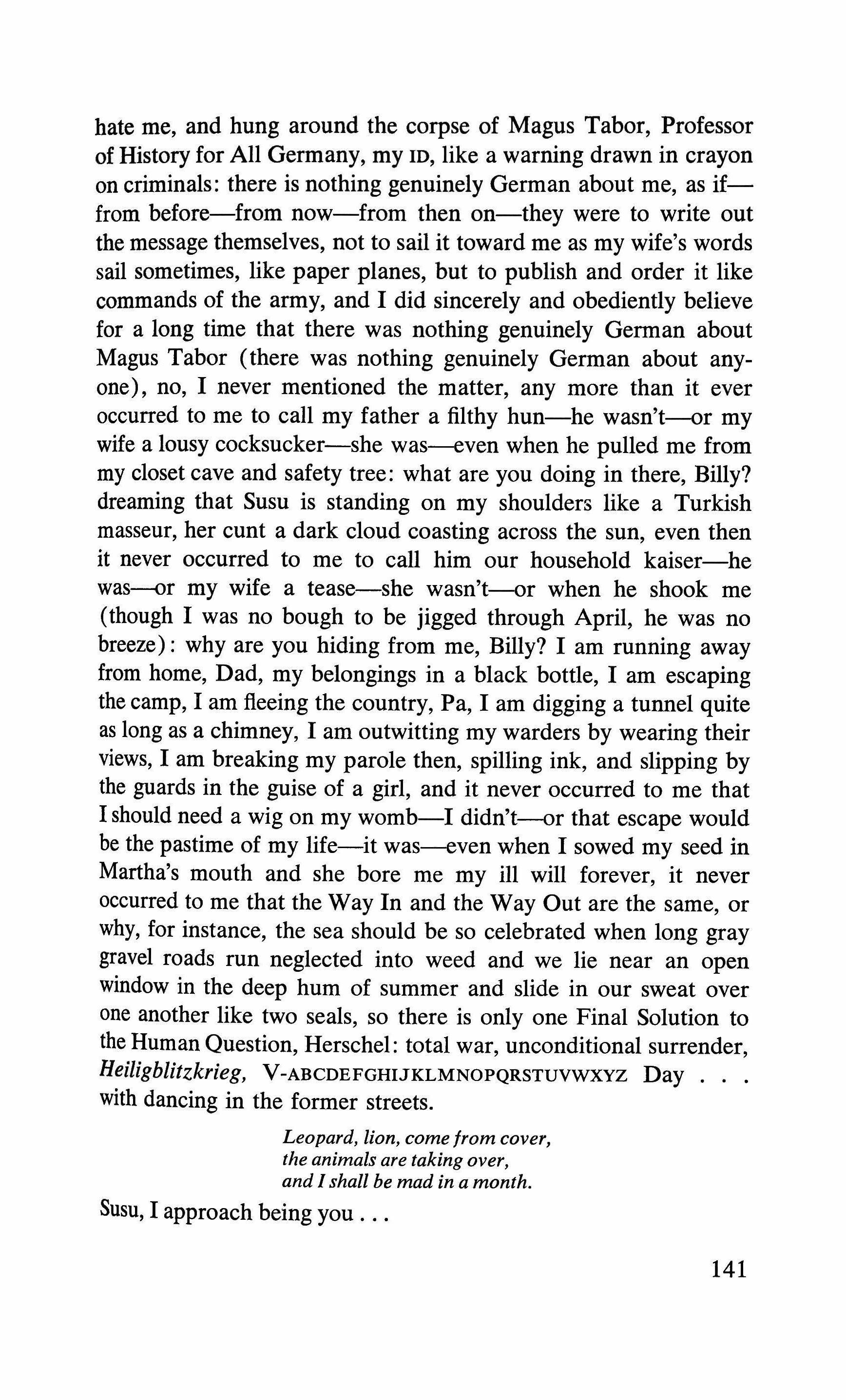
hate me, and hung around the corpse of Magus Tabor, Professor of History for All Germany, my ID, like a warning drawn in crayon on criminals: there is nothing genuinely German about me, as iffrom before-from now-from then on-they were to write out the message themselves, not to sail it toward me as my wife's words sail sometimes, like paper planes, but to publish and order it like commands of the army, and I did sincerely and obediently believe for a long time that there was nothing genuinely German about Magus Tabor (there was nothing genuinely German about anyone), no, I never mentioned the matter, any more than it ever occurred to me to call my father a filthy hun-he wasn't-or my wife a lousy cocksucker-she was--even when he pulled me from my closet cave and safety tree: what are you doing in there, Billy? dreaming that Susu is standing on my shoulders like a Turkish masseur, her cunt a dark cloud coasting across the sun, even then it never occurred to me to call him our household kaiser-he was--or my wife a tease-she wasn't-or when he shook me (though I was no bough to be jigged through April, he was no breeze): why are you hiding from me, Billy? I am running away from home, Dad, my belongings in a black bottle, I am escaping the camp, I am fleeing the country, Pa, I am digging a tunnel quite as long as a chimney, I am outwitting my warders by wearing their views, I am breaking my parole then, spilling ink, and slipping by the guards in the guise of a girl, and it never occurred to me that I should need a wig on my womb-I didn't-or that escape would be the pastime of my life-it was--even when I sowed my seed in Martha's mouth and she bore me my ill will forever, it never occurred to me that the Way In and the Way Out are the same, or why, for instance, the sea should be so celebrated when long gray gravel roads run neglected into weed and we lie near an open window in the deep hum of summer and slide in our sweat over one another like two seals, so there is only one Final Solution to the Human Question, Herschel: total war, unconditional surrender, Heiligblitzkrieg, V-ABCDEFGHIJKLMNOPQRSTUVWXYZ Day with dancing in the former streets.
Leopard, lion, come from cover, the animals are taking over, and I shall be mad in a month.
Susu, I approach being you
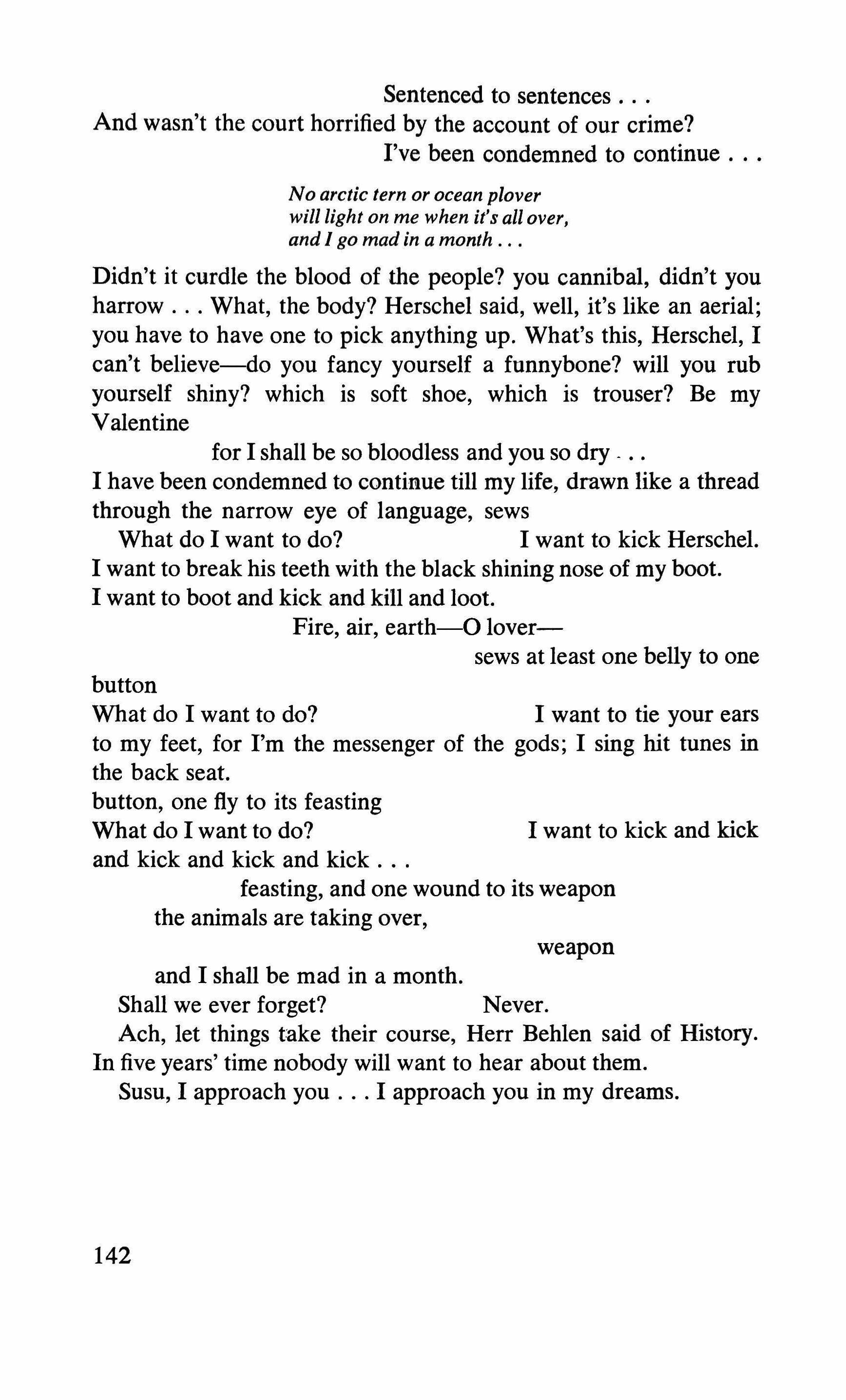
Sentenced to sentences
And wasn't the court horrified by the account of our crime? I've been condemned to continue
No arctic tern or ocean plover will light on me when it's all over, and I go mad in a month
Didn't it curdle the blood of the people? you cannibal, didn't you harrow What, the body? Herschel said, well, it's like an aerial; you have to have one to pick anything up. What's this, Herschel, I can't believe-do you fancy yourself a funnybone? will you rub yourself shiny? which is soft shoe, which is trouser? Be my Valentine
for I shall be so bloodless and you so dryI have been condemned to continue till my life, drawn like a thread through the narrow eye of language, sews What do I want to do? I want to kick Herschel. I want to break his teeth with the black shining nose of my boot. I want to boot and kick and kill and loot.
Fire, air, earth-O loversews at least one belly to one button
What do I want to do? I want to tie your ears to my feet, for I'm the messenger of the gods; I sing hit tunes in the back seat.
button, one fly to its feasting
What do I want to do? and kick and kick and kick I want to kick and kick feasting, and one wound to its weapon the animals are taking over, weapon and I shall be mad in a month. Shall we ever forget? Never. Ach, let things take their course, Herr Behlen said of History. In five years' time nobody will want to hear about them. Susu, I approach you I approach you in my dreams.

We was some 500 Leagues W of the Mayne, when we spy'd the Island, alreddy almost to farr to the S for us to pick up in the suddenlie Contrarie Winds. We spent 4 Dais beeting doun to it. It seemd to us fixt in 1 Spott, & we fixt in another, but almost inperceptiblie it grew higher & higher, standing strai't out of the See, cappt by giant Thunder Hedds, lush thick Forrest below, & as we came up on't, we saw the long line of Surf braking over the proteckting outer Reefs, & Co-Co Palms lining the white inner Strand.
't Is like a Vision of Paradise unfolding, Davey said; & when I turnd to him in a Moment, I saw large round Teers falling from his Eys. What is it so moves thee in the thou't of Paradise, Man? & then: Mayhap I know; is it the thou't of who awaits thee there? Debra was onelie 17, he said. We marri'd of Love, wch is why 1m a poor Man to this Dai, for my Father had rich Prospecks pickt out for me. The very Ist Babe got bound up in her somehow, & was onelie borne after 3 hellish Dais, & I said, hoping to cheer her, Debra, 't is a bonnie Girl, & she said: Lord God that means 1 Dai she must suffer as I am suffring Now. What does a Man, answer to that, George? I said in my Hart, if she survive, I shall
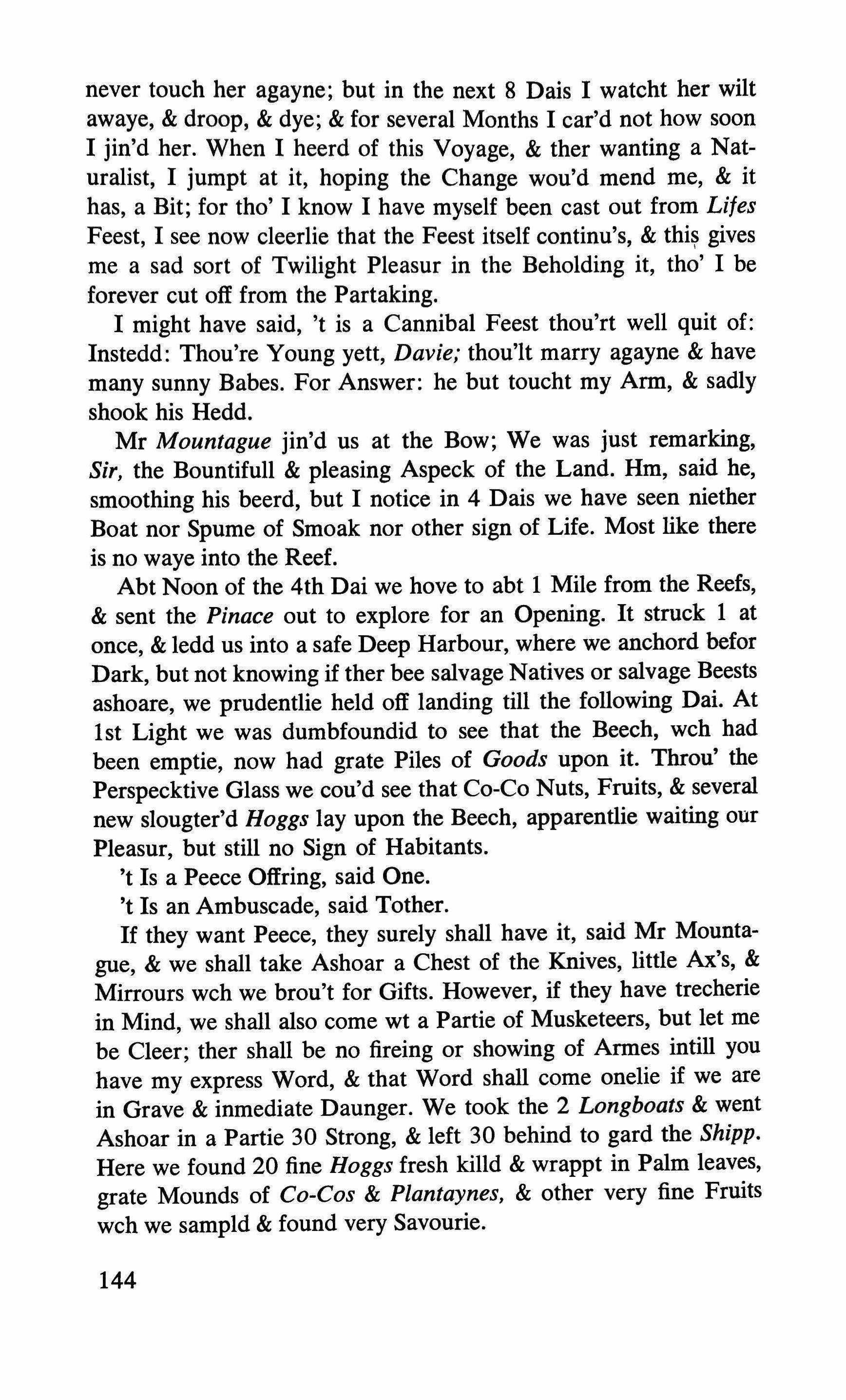
never touch her agayne; but in the next 8 Dais I watcht her wilt awaye, & droop, & dye; & for several Months I car'd not how soon I jin'd her. When I heerd of this Voyage, & ther wanting a Naturalist, I jumpt at it, hoping the Change wou'd mend me, & it has, a Bit; for tho' I know I have myself been cast out from Lites Feest, I see now cleerlie that the Feest itself continu's, & this gives me a sad sort of Twilight Pleasur in the Beholding it, tho' I be forever cut off from the Partaking.
I might have said, 't is a Cannibal Feest thou'rt well quit of: Instedd: Thou're Young yett, Davie; thou'lt marry agayne & have many sunny Babes. For Answer: he but toucht my Arm, & sadly shook his Hedd.
Mr Mountague jin'd us at the Bow; We was just remarking, Sir, the Bountifull & pleasing Aspeck of the Land. Hm, said he, smoothing his beerd, but I notice in 4 Dais we have seen niether Boat nor Spume of Smoak nor other sign of Life. Most like there is no waye into the Reef.
Abt Noon of the 4th Dai we hove to abt 1 Mile from the Reefs, & sent the Pinace out to explore for an Opening. It struck 1 at once, & ledd us into a safe Deep Harbour, where we anchord befor Dark, but not knowing if ther bee salvage Natives or salvage Beests ashoare, we prudentlie held off landing till the following Dai. At 1st Light we was dumbfoundid to see that the Beech, wch had been emptie, now had grate Piles of Goods upon it. Throu' the Perspecktive Glass we cou'd see that Co-Co Nuts, Fruits, & several new slougter'd Hoggs lay upon the Beech, apparentlie waiting our Pleasur, but still no Sign of Habitants.
't Is a Peece Offring, said One.
't Is an Ambuscade, said Tother.
If they want Peece, they surely shall have it, said Mr Mountague, & we shall take Ashoar a Chest of the Knives, little Ax's, & Mirrours wch we brou't for Gifts. However, if they have trecherie in Mind, we shall also come wt a Partie of Musketeers, but let me be Cleer; ther shall be no fireing or showing of Armes intill you have my express Word, & that Word shall come onelie if we are in Grave & inmediate Daunger. We took the 2 Longboats & went Ashoar in a Partie 30 Strong, & left 30 behind to gard the Shipp. Here we found 20 fine Hoggs fresh killd & wrappt in Palm leaves, grate Mounds of Co-Cos & Plantaynes, & other very fine Fruits weh we sampld & found very Savourie.

Then the Boys commenct Hooping & Wisling, then 1, then 4, then 4 & 20 Native Wommen, stark Nakid, emergd from the Forrest Edg smiling & laughing & thro'ing up there Armes in Greeting. 'Ware of Trecherie, my Boys, the Cpt. said, but was heeded onelie a Moment, for there was no mistaking the Intentions of the Dusky Vahines, giggling & rolling on the Ground & obscenlie exposing there Partes before the Gloating Men, who befor all our Eys was soon coupling wt em like so many Cattel, guffawing back to ther Comrads at this unexpectid Boon. I remonstratid wt Mr Mountague, but that sober Religious Man said Nay, I know 't is unseemlie, but 1m convinct the Lord has suppli'd us these Dark Races to give the Boys a chaunce to Relieve themselves, & emptie themselves out. I think ther can be no Harm in 't, for I have seen it often to bee on past Voyages, that we shall see less fighting & bickring Aboard. As a Chirurgian ye must know, 't is a necessitie to Health-& as I continu'd to look at him: Come, Man, we are all humane Beeings together. 't Is not like they are Christian Women, & he lookt upon me so impatiently for me to betake myself elsewhere, that I at last realiz'd my judging Eys was preventing his own disporting; so I rather sharplie took Davey by the Arme, Let us explore Inland a Wayes, said I.
We passt thro' the thin line of Palms back of the Beech, but cou'd ascertayne no Trayles into the interior, or Sign any where of human Habitatation, but yet the Countrie was open, softlie rounded & smiling, wt none of the harsh Grittiness some times on Tropick Isles, & all growing things o'er burdnd wt Fruit, Co-Co Nuts, Bananas, Papayas, Mango's, the going Easy, along the mossy Bank of a slender pure Spring, meandring thro' a deep Valley, whilst the denser Forrest crawld up the steep Slopes to Mountayne Tops lost in the Cascading white Mists above us.
I think you was quite right Davie, if Paradise exist, it must bee in terms very like these. He had stoppt & turnd, for 3 of the Native Girls was running wt all there Might to catch us up. Ignore em, I said, there as Forward as Covent Garden Fireships, & carry Lord kno's what Jungle Blights & Cankers. But they- cleverlie chang'd there Stratigy, (once they puffingly reacht us,) & as it were, cover'd themselves over wt Blushes & Bashfullness, especially a very yong plump Thing, barely Sproutid, who hid behind the others, & cover'd her Eys, & peept out at Davey. This shyness is the oldest, most pracktist Trick of all, Davey, think on "The Bowre
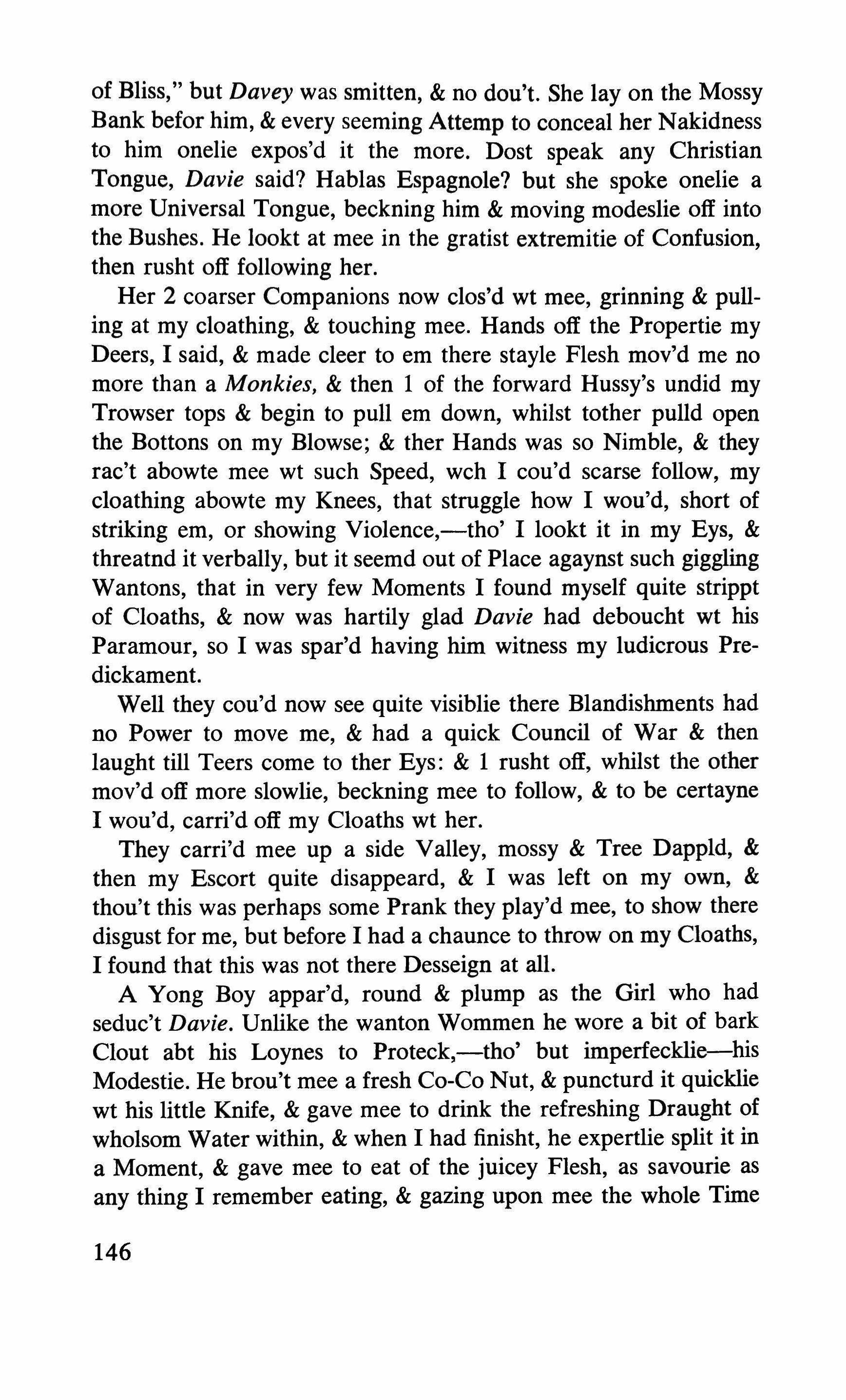
of Bliss," but Davey was smitten, & no dou't. She lay on the Mossy Bank befor him, & every seeming Attemp to conceal her Nakidness to him onelie expos'd it the more. Dost speak any Christian Tongue, Davie said? Hablas Espagnole? but she spoke onelie a more Universal Tongue, beckning him & moving modeslie off into the Bushes. He lookt at mee in the gratist extremitie of Confusion, then rusht off following her.
Her 2 coarser Companions now clos'd wt mee, grinning & pulling at my cloathing, & touching mee. Hands off the Propertie my Deers, I said, & made cleer to em there stayle Flesh mov'd me no more than a Monkies, & then 1 of the forward Hussy's undid my Trowser tops & begin to pull em down, whilst tother pulld open the Bottons on my Blowse; & ther Hands was so Nimble, & they rac't abowte mee wt such Speed, wch I cou'd scarse follow, my cloathing abowte my Knees, that struggle how I wou'd, short of striking em, or showing Violence,-tho' I lookt it in my Eys, & threatnd it verbally, but it seemd out of Place agaynst such giggling Wantons, that in very few Moments I found myself quite strippt of Cloaths, & now was hartily glad Davie had deboucht wt his Paramour, so I was spar'd having him witness my ludicrous Predickament.
Well they cou'd now see quite visiblie there Blandishments had no Power to move me, & had a quick Council of War & then laught till Teers come to ther Eys: & 1 rusht off, whilst the other mov'd off more slowlie, beckning mee to follow, & to be certayne I wou'd, carri'd off my Cloaths wt her.
They carri'd mee up a side Valley, mossy & Tree Dappld, & then my Escort quite disappeard, & I was left on my own, & thou't this was perhaps some Prank they play'd mee, to show there disgust for me, but before I had a chaunce to throw on my Cloaths, I found that this was not there Desseign at all.
A Yong Boy appar'd, round & plump as the Girl who had seduc't Davie. Unlike the wanton Wommen he wore a bit of bark Clout abt his Loynes to Proteck,-tho' but imperfecklie-his Modestie. He brou't mee a fresh Co-Co Nut, & puncturd it quicklie wt his little Knife, & gave mee to drink the refreshing Draught of wholsom Water within, & when I had finisht, he expertlie split it in a Moment, & gave mee to eat of the juicey Flesh, as savourie as any thing I remember eating, & gazing upon mee the whole Time
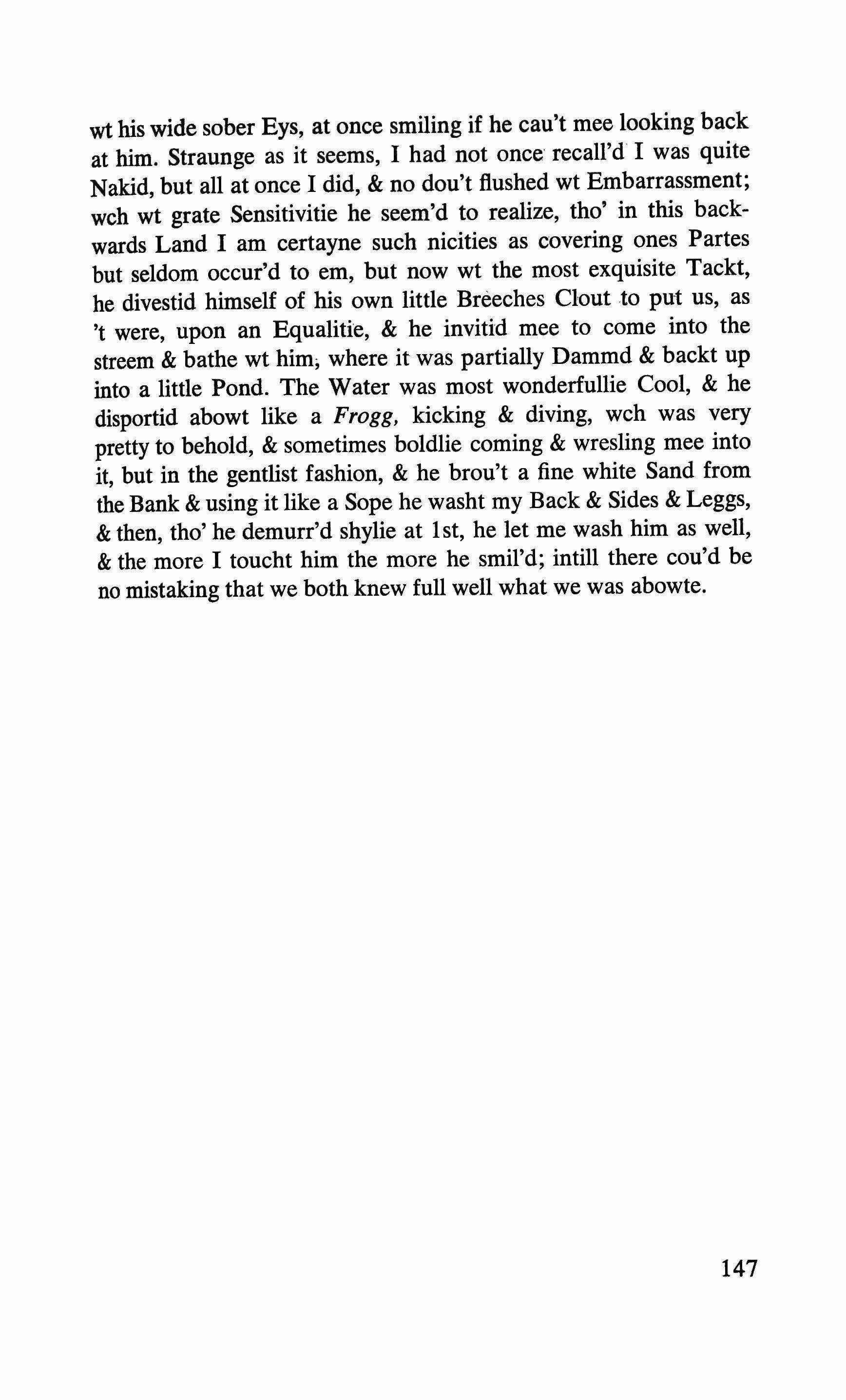
wt his wide sober Eys, at once smiling if he cau't mee looking back at him. Straunge as it seems, I had not once recall'd I was quite Nakid, but all at once I did, & no dou't flushed wt Embarrassment; weh wt grate Sensitivitie he seem'd to realize, tho' in this backwards Land I am certayne such nicities as covering ones Partes but seldom occur'd to em, but now wt the most exquisite Tackt, he divestid himself of his own little Breeches Clout to put us, as 't were, upon an Equalitie, & he invitid mee to come into the streem & bathe wt him; where it was partially Dammd & backt up into a little Pond. The Water was most wonderfullie Cool, & he disportid abowt like a Frogg, kicking & diving, wch was very pretty to behold, & sometimes boldlie coming & wresling mee into it, but in the gentlist fashion, & he brou't a fine white Sand from the Bank & using it like a Sope he washt my Back & Sides & Leggs, & then, tho' he demurr'd shylie at 1st, he let me wash him as well, & the more I toucht him the more he smil'd; intill there cou'd be no mistaking that we both knew full well what we was abowte.
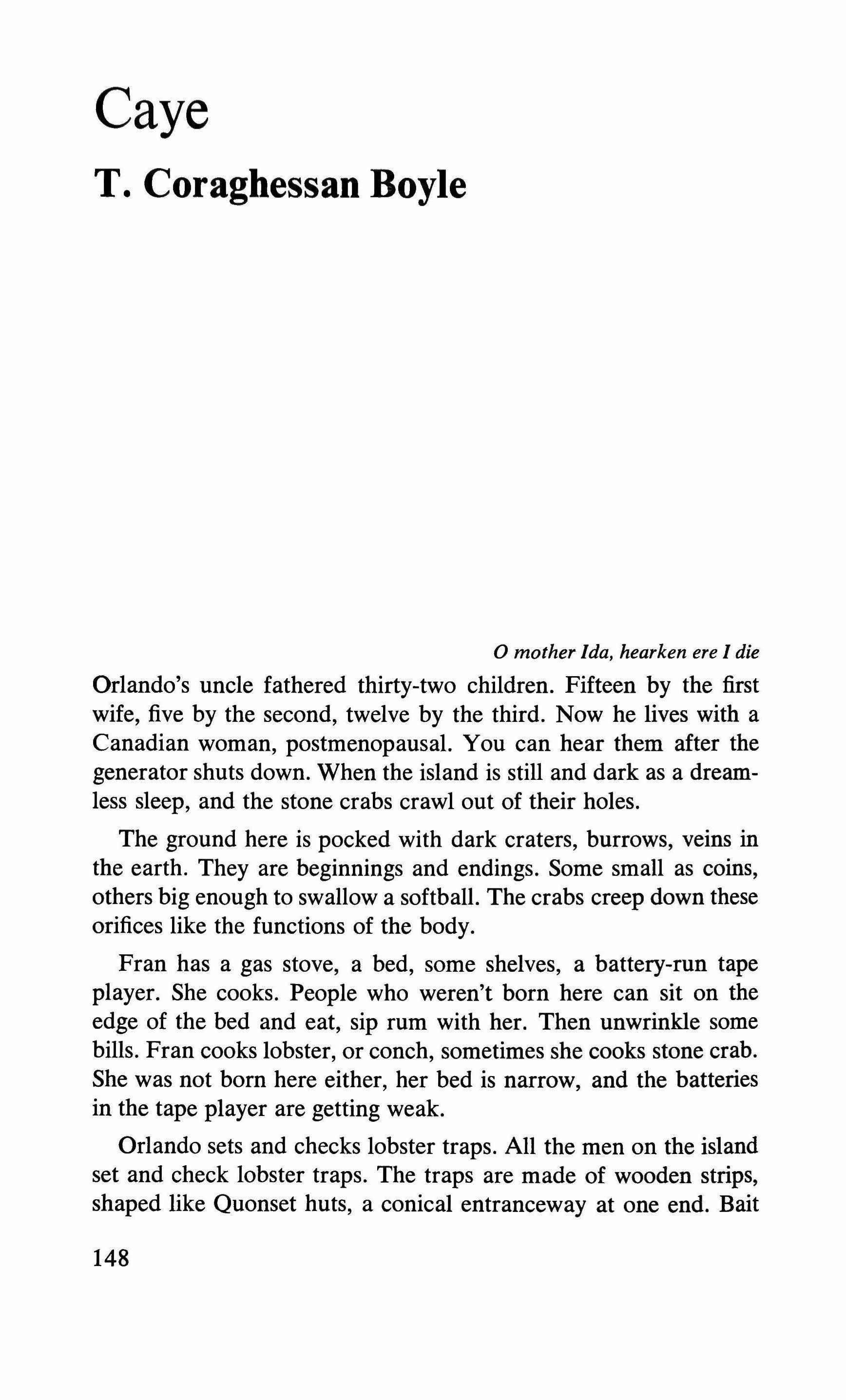
o mother Ida, hearken ere I die
Orlando's uncle fathered thirty-two children. Fifteen by the first wife, five by the second, twelve by the third. Now he lives with a Canadian woman, postmenopausal. You can hear them after the generator shuts down. When the island is still and dark as a dreamless sleep, and the stone crabs crawl out of their holes.
The ground here is pocked with dark craters, burrows, veins in the earth. They are beginnings and endings. Some small as coins, others big enough to swallow a softball. The crabs creep down these orifices like the functions of the body.
Fran has a gas stove, a bed, some shelves, a battery-run tape player. She cooks. People who weren't born here can sit on the edge of the bed and eat, sip rum with her. Then unwrinkle some bills. Fran cooks lobster, or conch, sometimes she cooks stone crab. She was not born here either, her bed is narrow, and the batteries in the tape player are getting weak.
Orlando sets and checks lobster traps. All the men on the island set and check lobster traps. The traps are made of wooden strips, shaped like Quonset huts, a conical entranceway at one end. Bait
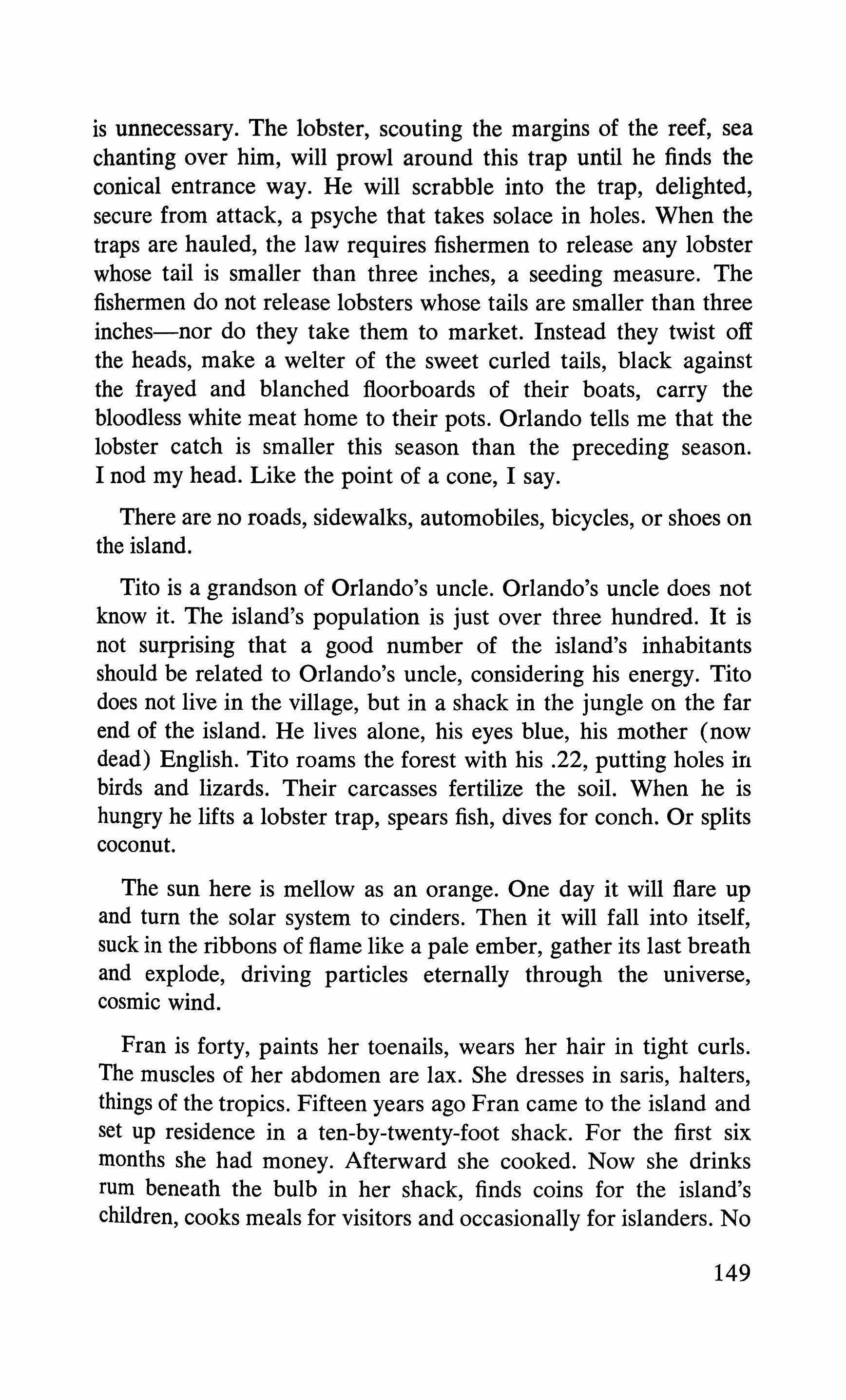
is unnecessary. The lobster, scouting the margins of the reef, sea chanting over him, will prowl around this trap until he finds the conical entrance way. He will scrabble into the trap, delighted, secure from attack, a psyche that takes solace in holes. When the traps are hauled, the law requires fishermen to release any lobster whose tail is smaller than three inches, a seeding measure. The fishermen do not release lobsters whose tails are smaller than three inches-nor do they take them to market. Instead they twist off the heads, make a welter of the sweet curled tails, black against the frayed and blanched floorboards of their boats, carry the bloodless white meat home to their pots. Orlando tells me that the lobster catch is smaller this season than the preceding season. I nod my head. Like the point of a cone, I say.
There are no roads, sidewalks, automobiles, bicycles, or shoes on the island.
Tito is a grandson of Orlando's uncle. Orlando's uncle does not know it. The island's population is just over three hundred. It is not surprising that a good number of the island's inhabitants should be related to Orlando's uncle, considering his energy. Tito does not live in the village, but in a shack in the jungle on the far end of the island. He lives alone, his eyes blue, his mother (now dead) English. Tito roams the forest with his .22, putting holes in birds and lizards. Their carcasses fertilize the soil. When he is hungry he lifts a lobster trap, spears fish, dives for conch. Or splits coconut.
The sun here is mellow as an orange. One day it will flare up and turn the solar system to cinders. Then it will fall into itself, suck in the ribbons of flame like a pale ember, gather its last breath and explode, driving particles eternally through the universe, cosmic wind.
Fran is forty, paints her toenails, wears her hair in tight curls. The muscles of her abdomen are lax. She dresses in saris, halters, things of the tropics. Fifteen years ago Fran came to the island and set up residence in a ten-by-twenty-foot shack. For the first six months she had money. Afterward she cooked. Now she drinks rum beneath the bulb in her shack, finds coins for the island's children, cooks meals for visitors and occasionally for islanders. No
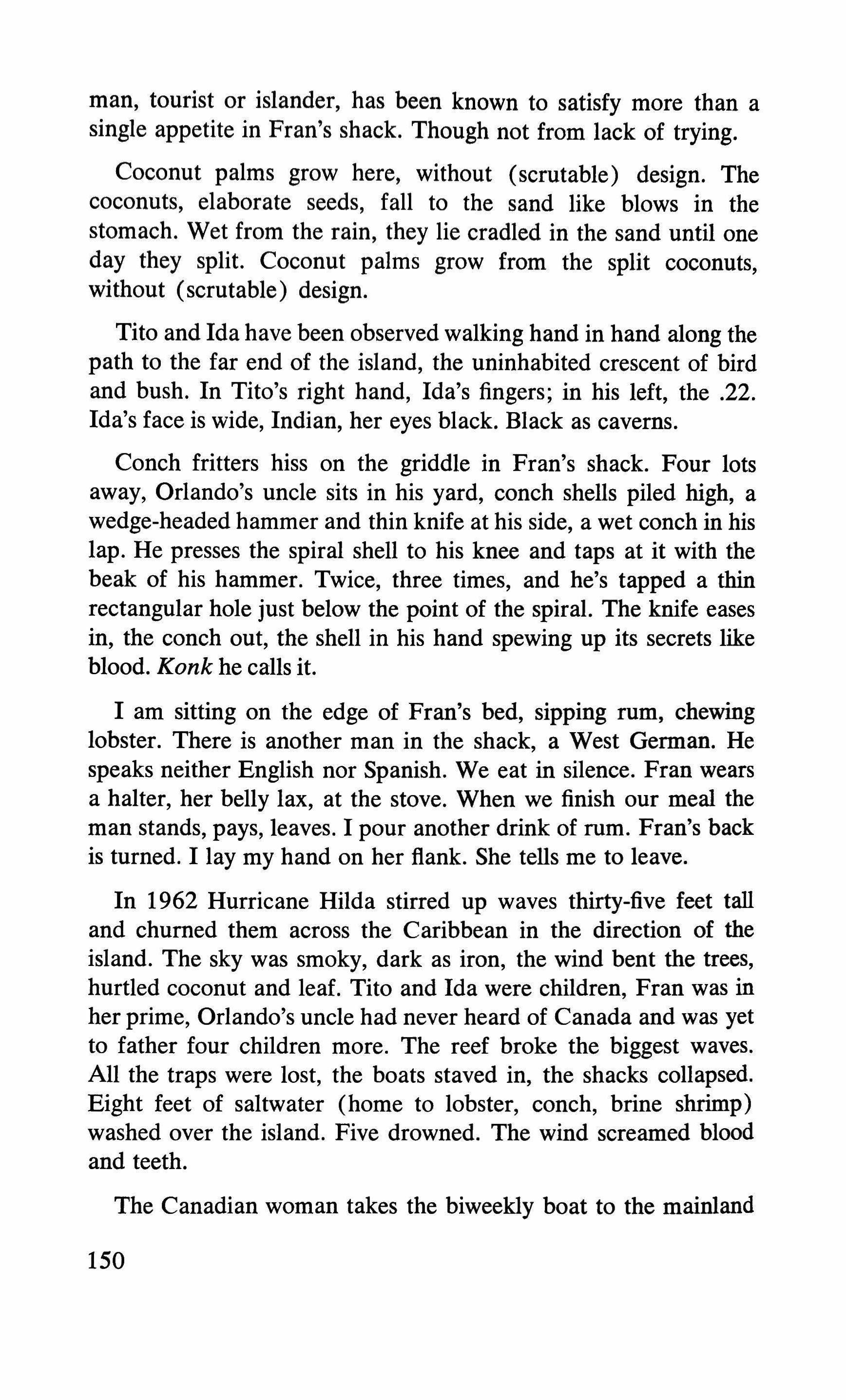
man, tourist or islander, has been known to satisfy more than a single appetite in Fran's shack. Though not from lack of trying.
Coconut palms grow here, without (scrutable) design. The coconuts, elaborate seeds, fall to the sand like blows in the stomach. Wet from the rain, they lie cradled in the sand until one day they split. Coconut palms grow from the split coconuts, without (scrutable) design.
Tito and Ida have been observed walking hand in hand along the path to the far end of the island, the uninhabited crescent of bird and bush. In Tito's right hand, Ida's fingers; in his left, the .22. Ida's face is wide, Indian, her eyes black. Black as caverns.
Conch fritters hiss on the griddle in Fran's shack. Four lots away, Orlando's uncle sits in his yard, conch shells piled high, a wedge-headed hammer and thin knife at his side, a wet conch in his lap. He presses the spiral shell to his knee and taps at it with the beak of his hammer. Twice, three times, and he's tapped a thin rectangular hole just below the point of the spiral. The knife eases in, the conch out, the shell in his hand spewing up its secrets like blood. Konk he calls it.
I am sitting on the edge of Fran's bed, sipping rum, chewing lobster. There is another man in the shack, a West German. He speaks neither English nor Spanish. We eat in silence. Fran wears a halter, her belly lax, at the stove. When we finish our meal the man stands, pays, leaves. I pour another drink of rum. Fran's back is turned. I lay my hand on her flank. She tells me to leave.
In 1962 Hurricane Hilda stirred up waves thirty-five feet tall and churned them across the Caribbean in the direction of the island. The sky was smoky, dark as iron, the wind bent the trees, hurtled coconut and leaf. Tito and Ida were children, Fran was in her prime, Orlando's uncle had never heard of Canada and was yet to father four children more. The reef broke the biggest waves. All the traps were lost, the boats staved in, the shacks collapsed. Eight feet of saltwater (home to lobster, conch, brine shrimp) washed over the island. Five drowned. The wind screamed blood and teeth.
The Canadian woman takes the biweekly boat to the mainland
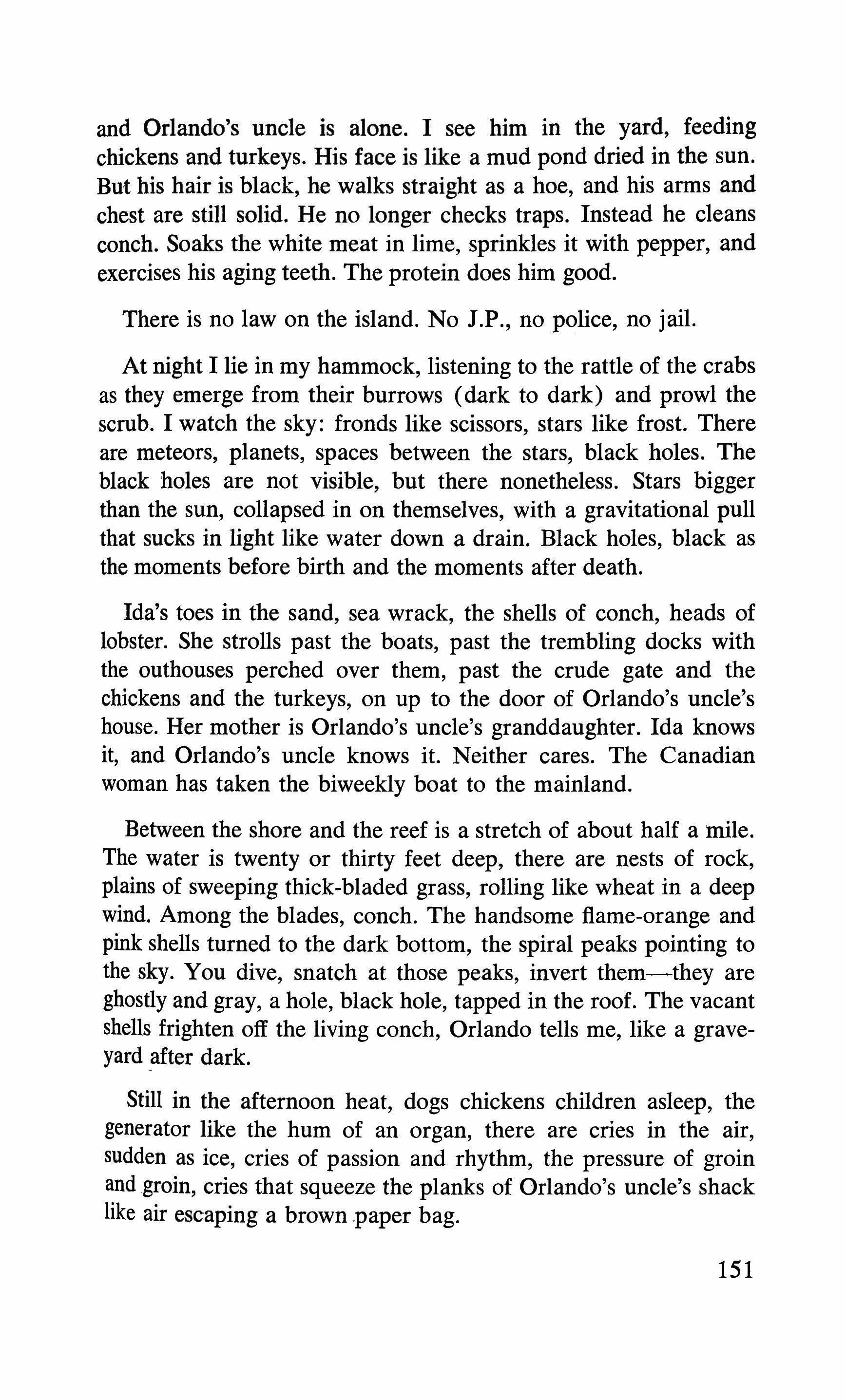
and Orlando's uncle is alone. I see him in the yard, feeding chickens and turkeys. His face is like a mud pond dried in the sun. But his hair is black, he walks straight as a hoe, and his arms and chest are still solid. He no longer checks traps. Instead he cleans conch. Soaks the white meat in lime, sprinkles it with pepper, and exercises his aging teeth. The protein does him good.
There is no law on the island. No J.P., no police, no jail.
At night I lie in my hammock, listening to the rattle of the crabs as they emerge from their burrows (dark to dark) and prowl the scrub. I watch the sky: fronds like scissors, stars like frost. There are meteors, planets, spaces between the stars, black holes. The black holes are not visible, but there nonetheless. Stars bigger than the sun, collapsed in on themselves, with a gravitational pull that sucks in light like water down a drain. Black holes, black as the moments before birth and the moments after death.
Ida's toes in the sand, sea wrack, the shells of conch, heads of lobster. She strolls past the boats, past the trembling docks with the outhouses perched over them, past the crude gate and the chickens and the turkeys, on up to the door of Orlando's uncle's house. Her mother is Orlando's uncle's granddaughter. Ida knows it, and Orlando's uncle knows it. Neither cares. The Canadian woman has taken the biweekly boat to the mainland.
Between the shore and the reef is a stretch of about half a mile. The water is twenty or thirty feet deep, there are nests of rock, plains of sweeping thick-bladed grass, rolling like wheat in a deep wind. Among the blades, conch. The handsome flame-orange and pink shells turned to the dark bottom, the spiral peaks pointing to the sky. You dive, snatch at those peaks, invert them-they are ghostly and gray, a hole, black hole, tapped in the roof. The vacant shells frighten off the living conch, Orlando tells me, like a graveyard after dark.
Still in the afternoon heat, dogs chickens children asleep, the generator like the hum of an organ, there are cries in the air, SUdden as ice, cries of passion and rhythm, the pressure of groin and groin, cries that squeeze the planks of Orlando's uncle's shack like air escaping a brown paper bag.
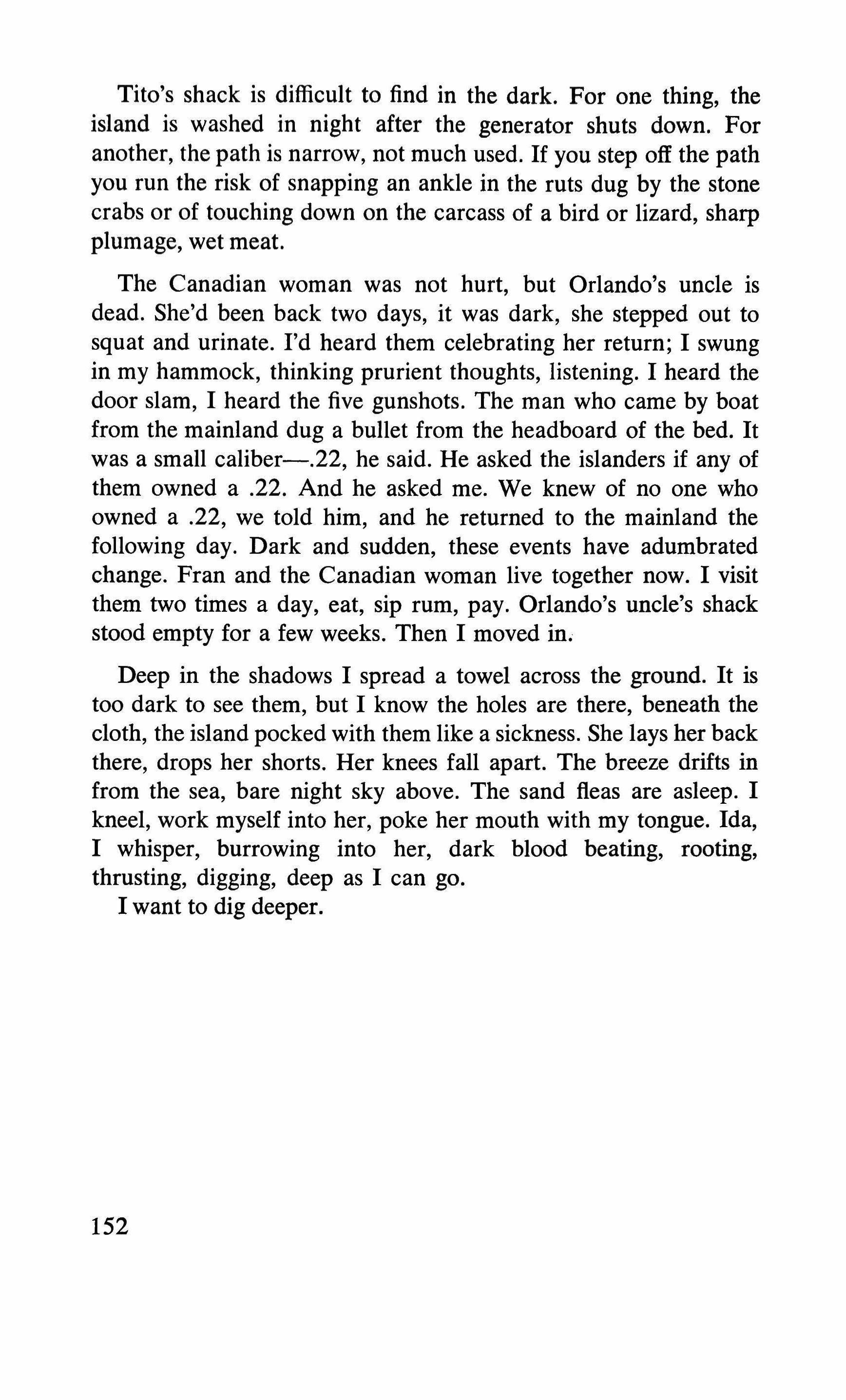
Tito's shack is difficult to find in the dark. For one thing, the island is washed in night after the generator shuts down. For another, the path is narrow, not much used. If you step off the path you run the risk of snapping an ankle in the ruts dug by the stone crabs or of touching down on the carcass of a bird or lizard, sharp plumage, wet meat.
The Canadian woman was not hurt, but Orlando's uncle is dead. She'd been back two days, it was dark, she stepped out to squat and urinate. I'd heard them celebrating her return; I swung in my hammock, thinking prurient thoughts, listening. I heard the door slam, I heard the five gunshots. The man who came by boat from the mainland dug a bullet from the headboard of the bed. It was a small caliber-.22, he said. He asked the islanders if any of them owned a .22. And he asked me. We knew of no one who owned a .22, we told him, and he returned to the mainland the following day. Dark and sudden, these events have adumbrated change. Fran and the Canadian woman live together now. I visit them two times a day, eat, sip rum, pay. Orlando's uncle's shack stood empty for a few weeks. Then I moved in.
Deep in the shadows I spread a towel across the ground. It is too dark to see them, but I know the holes are there, beneath the cloth, the island pocked with them like a sickness. She lays her back there, drops her shorts. Her knees fall apart. The breeze drifts in from the sea, bare night sky above. The sand fleas are asleep. I kneel, work myself into her, poke her mouth with my tongue. Ida, I whisper, burrowing into her, dark blood beating, rooting, thrusting, digging, deep as I can go.
I want to dig deeper.
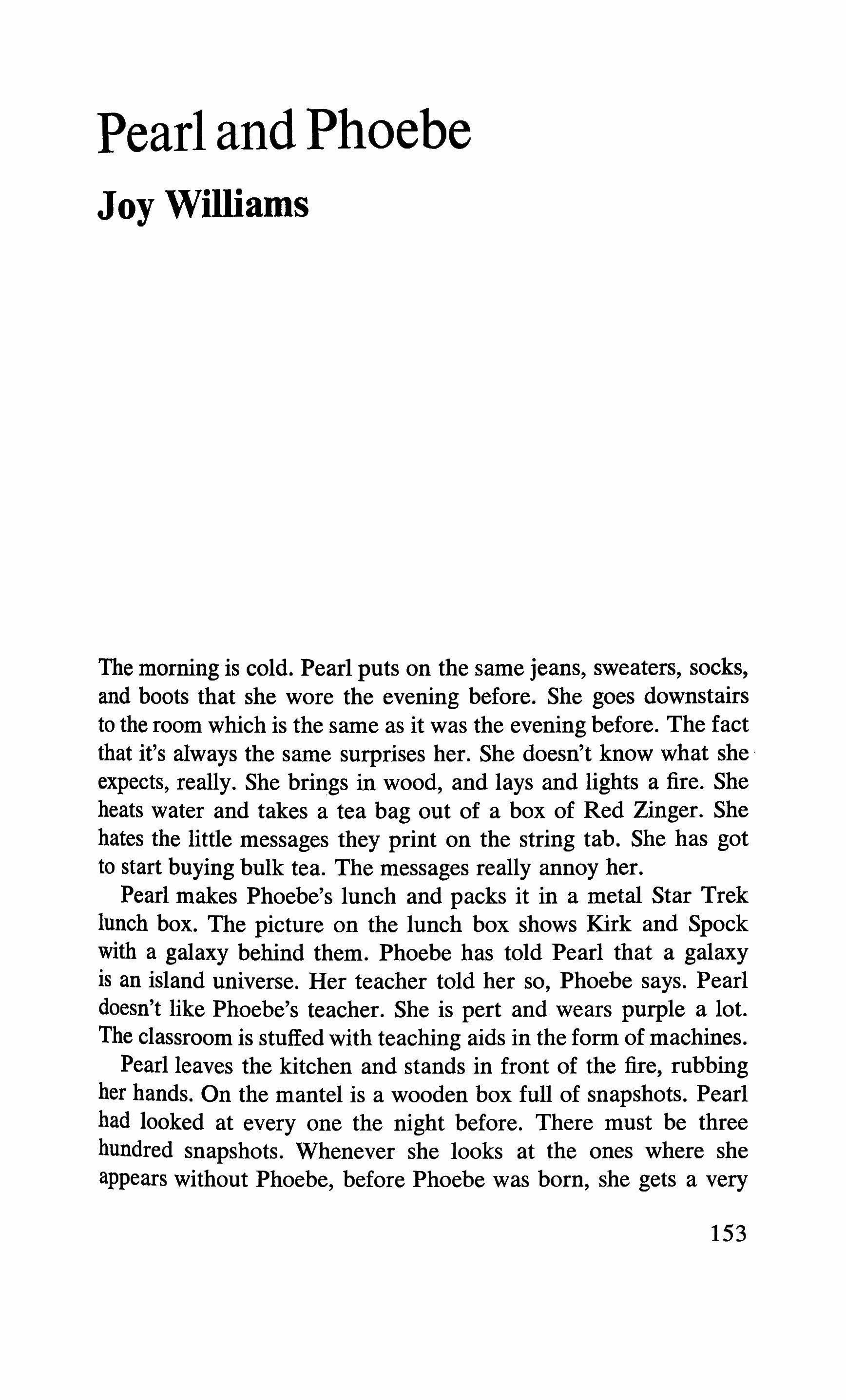
The morning is cold. Pearl puts on the same jeans, sweaters, socks, and boots that she wore the evening before. She goes downstairs to the room which is the same as it was the evening before. The fact that it's always the same surprises her. She doesn't know what she expects, really. She brings in wood, and lays and lights a fire. She heats water and takes a tea bag out of a box of Red Zinger. She hates the little messages they print on the string tab. She has got to start buying bulk tea. The messages really annoy her.
Pearl makes Phoebe's lunch and packs it in a metal Star Trek lunch box. The picture on the lunch box shows Kirk and Spock with a galaxy behind them. Phoebe has told Pearl that a galaxy is an island universe. Her teacher told her so, Phoebe says. Pearl doesn't like Phoebe's teacher. She is pert and wears purple a lot. The classroom is stuffed with teaching aids in the form of machines.
Pearl leaves the kitchen and stands in front of the fire, rubbing her hands. On the mantel is a wooden box full of snapshots. Pearl had looked at everyone the night before. There must be three hundred snapshots. Whenever she looks at the ones where she appears without Phoebe, before Phoebe was born, she gets a very
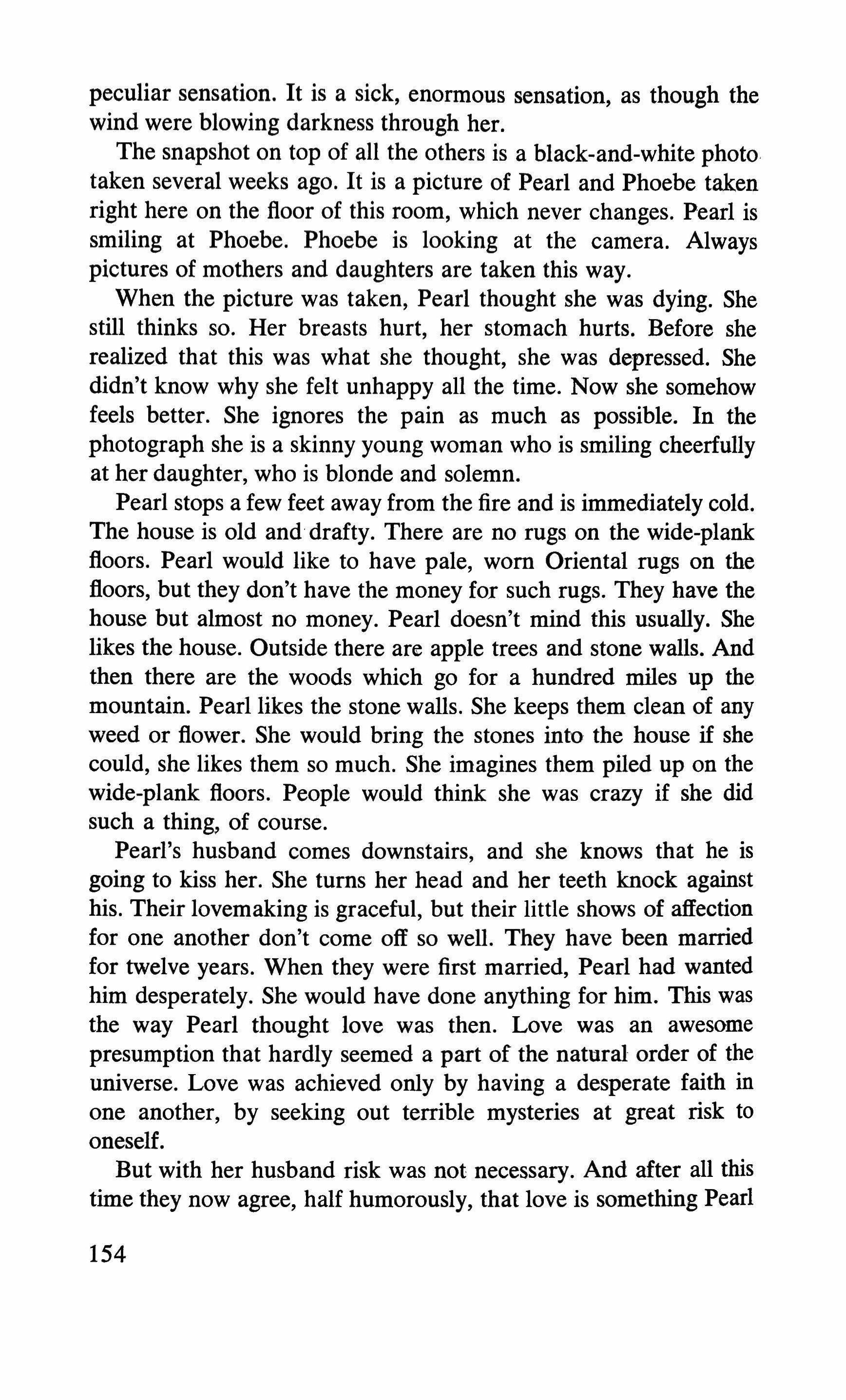
peculiar sensation. It is a sick, enormous sensation, as though the wind were blowing darkness through her.
The snapshot on top of all the others is a black-and-white photo taken several weeks ago. It is a picture of Pearl and Phoebe taken right here on the floor of this room, which never changes. Pearl is smiling at Phoebe. Phoebe is looking at the camera. Always pictures of mothers and daughters are taken this way.
When the picture was taken, Pearl thought she was dying. She still thinks so. Her breasts hurt, her stomach hurts. Before she realized that this was what she thought, she was depressed. She didn't know why she felt unhappy all the time. Now she somehow feels better. She ignores the pain as much as possible. In the photograph she is a skinny young woman who is smiling cheerfully at her daughter, who is blonde and solemn.
Pearl stops a few feet away from the fire and is immediately cold. The house is old and drafty. There are no rugs on the wide-plank floors. Pearl would like to have pale, worn Oriental rugs on the floors, but they don't have the money for such rugs. They have the house but almost no money. Pearl doesn't mind this usually. She likes the house. Outside there are apple trees and stone walls. And then there are the woods which go for a hundred miles up the mountain. Pearl likes the stone walls. She keeps them clean of any weed or flower. She would bring the stones into the house if she could, she likes them so much. She imagines them piled up on the wide-plank floors. People would think she was crazy if she did such a thing, of course.
Pearl's husband comes downstairs, and she knows that he is going to kiss her. She turns her head and her teeth knock against his. Their lovemaking is graceful, but their little shows of affection for one another don't come off so well. They have been married for twelve years. When they were first married, Pearl had wanted him desperately. She would have done anything for him. This was the way Pearl thought love was then. Love was an awesome presumption that hardly seemed a part of the natural order of the universe. Love was achieved only by having a desperate faith in one another, by seeking out terrible mysteries at great risk to oneself.
But with her husband risk was not necessary. And after all this time they now agree, half humorously, that love is something Pearl
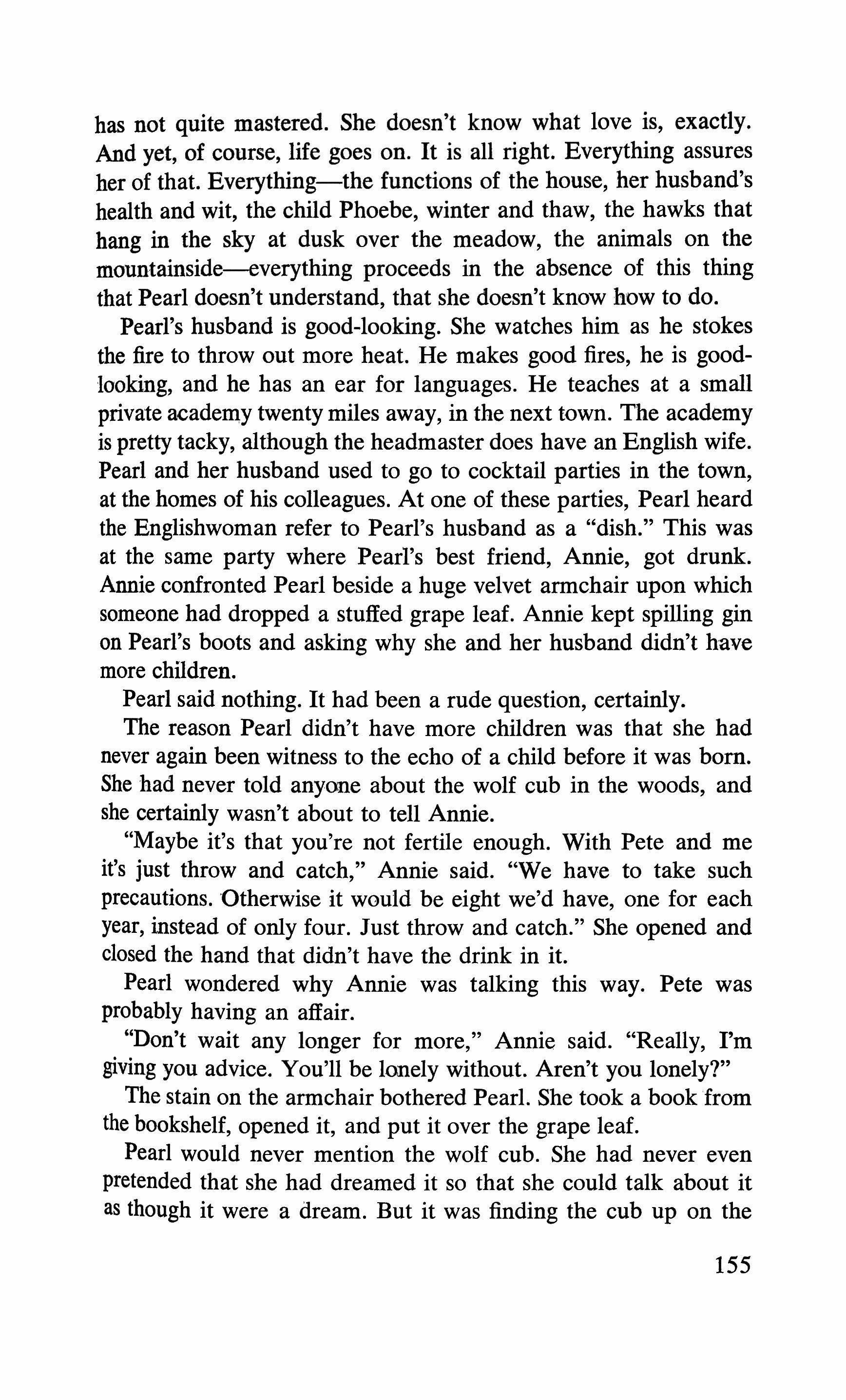
has not quite mastered. She doesn't know what love is, exactly. And yet, of course, life goes on. It is all right. Everything assures her of that. Everything-the functions of the house, her husband's health and wit, the child Phoebe, winter and thaw, the hawks that hang in the sky at dusk over the meadow, the animals on the mountainside--everything proceeds in the absence of this thing that Pearl doesn't understand, that she doesn't know how to do.
Pearl's husband is good-looking. She watches him as he stokes the fire to throw out more heat. He makes good fires, he is goodlooking, and he has an ear for languages. He teaches at a small private academy twenty miles away, in the next town. The academy is pretty tacky, although the headmaster does have an English wife. Pearl and her husband used to go to cocktail parties in the town, at the homes of his colleagues. At one of these parties, Pearl heard the Englishwoman refer to Pearl's husband as a "dish." This was at the same party where Pearl's best friend, Annie, got drunk. Annie confronted Pearl beside a huge velvet armchair upon which someone had dropped a stuffed grape leaf. Annie kept spilling gin on Pearl's boots and asking why she and her husband didn't have more children.
Pearl said nothing. It had been a rude question, certainly.
The reason Pearl didn't have more children was that she had never again been witness to the echo of a child before it was born. She had never told anyone about the wolf cub in the woods, and she certainly wasn't about to tell Annie.
"Maybe it's that you're not fertile enough. With Pete and me it's just throw and catch," Annie said. "We have to take such precautions. Otherwise it would be eight we'd have, one for each year, instead of only four. Just throw and catch." She opened and closed the hand that didn't have the drink in it.
Pearl wondered why Annie was talking this way. Pete was probably having an affair.
"Don't wait any longer for more," Annie said. "Really, I'm giving you advice. You'll be lonely without. Aren't you lonely?"
The stain on the armchair bothered Pearl. She took a book from the bookshelf, opened it, and put it over the grape leaf.
Pearl would never mention the wolf cub. She had never even pretended that she had dreamed it so that she could talk about it as though it were a dream. But it was finding the cub up on the
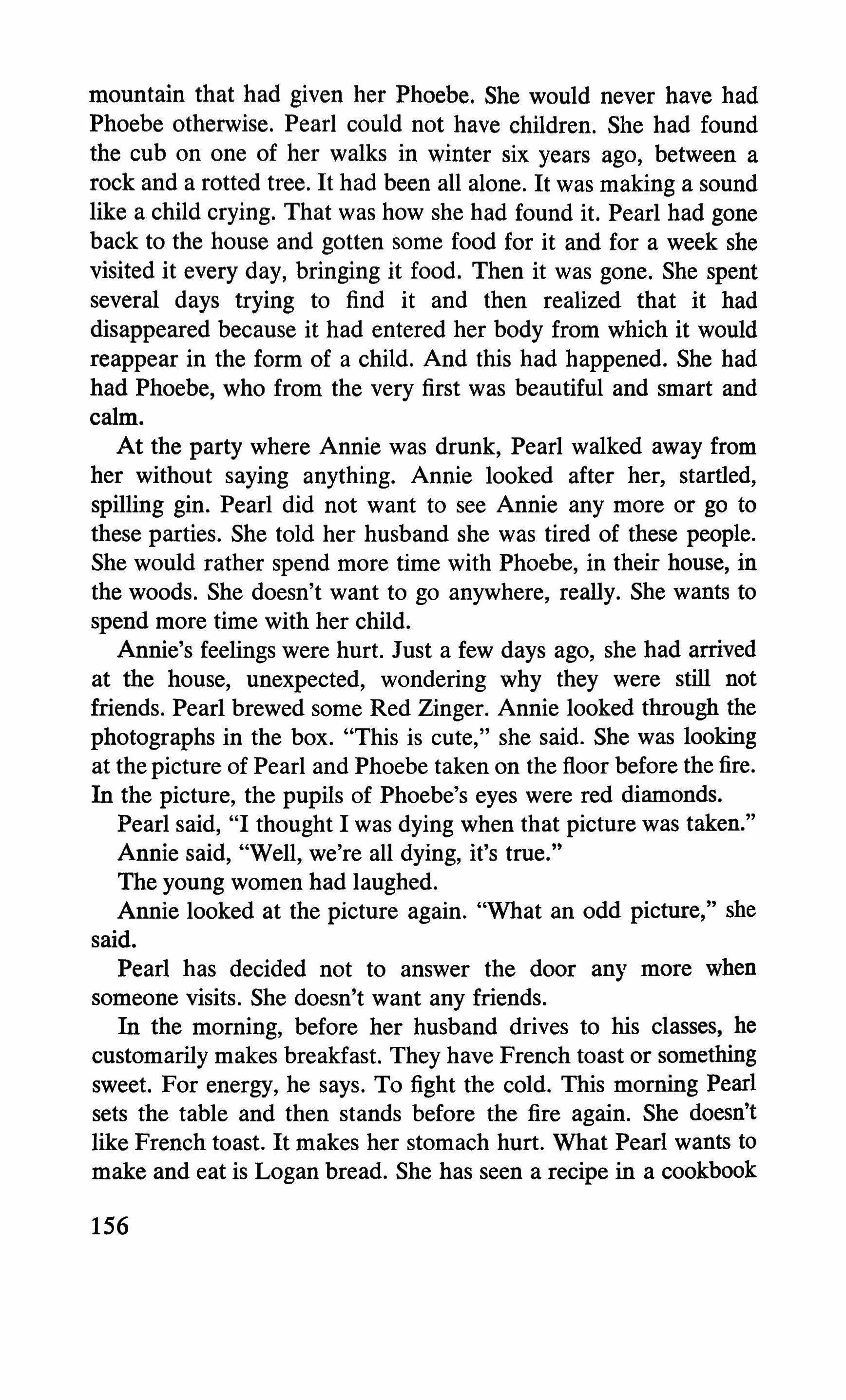
mountain that had given her Phoebe. She would never have had Phoebe otherwise. Pearl could not have children. She had found the cub on one of her walks in winter six years ago, between a rock and a rotted tree. It had been all alone. It was making a sound like a child crying. That was how she had found it. Pearl had gone back to the house and gotten some food for it and for a week she visited it every day, bringing it food. Then it was gone. She spent several days trying to find it and then realized that it had disappeared because it had entered her body from which it would reappear in the form of a child. And this had happened. She had had Phoebe, who from the very first was beautiful and smart and calm.
At the party where Annie was drunk, Pearl walked away from her without saying anything. Annie looked after her, startled, spilling gin. Pearl did not want to see Annie any more or go to these parties. She told her husband she was tired of these people. She would rather spend more time with Phoebe, in their house, in the woods. She doesn't want to go anywhere, really. She wants to spend more time with her child.
Annie's feelings were hurt. Just a few days ago, she had arrived at the house, unexpected, wondering why they were still not friends. Pearl brewed some Red Zinger. Annie looked through the photographs in the box. "This is cute," she said. She was looking at the picture of Pearl and Phoebe taken on the floor before the fire. In the picture, the pupils of Phoebe's eyes were red diamonds.
Pearl said, "I thought I was dying when that picture was taken."
Annie said, "Well, we're all dying, it's true."
The young women had laughed.
Annie looked at the picture again. "What an odd picture," she said.
Pearl has decided not to answer the door any more when someone visits. She doesn't want any friends.
In the morning, before her husband drives to his classes, he customarily makes breakfast. They have French toast or something sweet. For energy, he says. To fight the cold. This morning Pearl sets the table and then stands before the fire again. She doesn't like French toast. It makes her stomach hurt. What Pearl wants to make and eat is Logan bread. She has seen a recipe in a cookbook

for this bread, which is named after a mountain in Canada. A two-by-two-inch square of this bread is supposed to sustain a person for an entire day. The bread contains whole wheat flour, raw sugar, honey, molasses, oil, wheat germ, dry milk solids, water, and salt. Pearl is going to make this bread. She and Phoebe will take it with them when they go up into the woods on their own mountain.
Phoebe appears. She is five. Her pale hair is in a tangle. Her golden eyes are blurred. She sits at the table and says nothing until she finishes eating. Then she begins to hum, then to sing. Then she tells her dreams, which are stolid and bewildering. Phoebe has been going to school for several months, but she does not like it. She would prefer to be at home, playing at school. From the kitchen window Pearl can see the orange school bus miles away winding down the white mountain to get Phoebe.
This afternoon, after his classes, Pearl's husband will fly to Montreal for a week of modem language seminars. Pearl is looking forward to being here just with Phoebe, alone.
Phoebe sees the bus descending and sighs.
"Dress warm," her father says. It's eighteen out this morning." He points to a large, old-fashioned thermometer nailed to a cedar that grows against the house. The thermometer has large numbers and a painted goose upon it. Beyond the cedar, the sky is swollen with snow about to fall.
"I don't want to go to school," Phoebe says. "You must," her father says.
Pearl puts her hand on Phoebe's forehead. "She's very warm," Pearl says. "Perhaps it's a fever. Perhaps she should stay home."
Pearl's husband looks at her in surprise. Phoebe sits quietly in the chair, not moving, waiting. He goes over to Phoebe and holds her head in his hands. He kisses her hair. She is a pretty little girl. She is well mannered and intelligent.
He says to Pearl, "You shouldn't encourage this."
"I don't like that school," Pearl says. "I could teach her better at home."
He doesn't want to quarrel. He wants to make love with Pearl before he goes off for a week. "You would just play games," he says kindly.
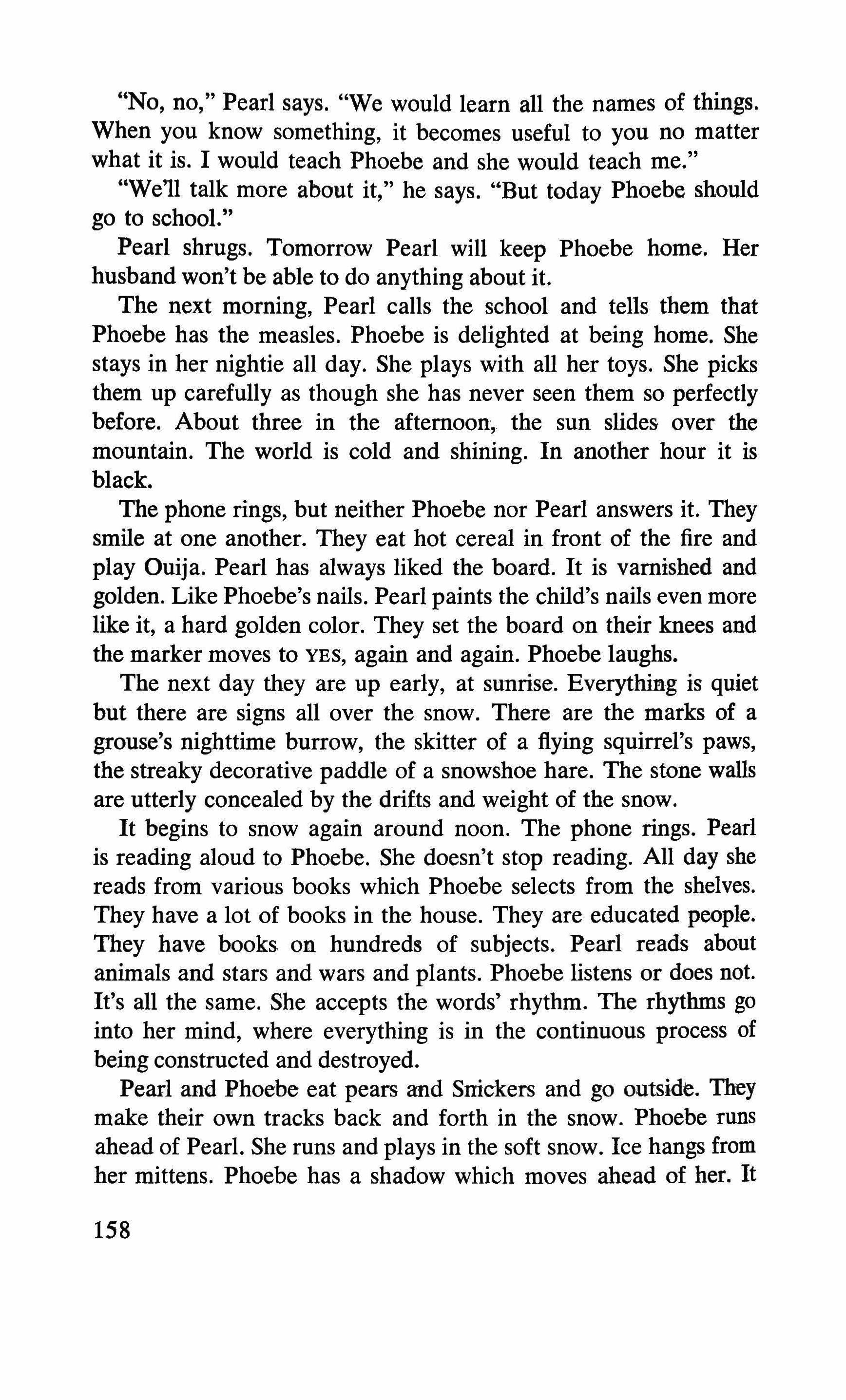
"No, no," Pearl says. "We would learn all the names of things. When you know something, it becomes useful to you no matter what it is. I would teach Phoebe and she would teach me."
"We'll talk more about it," he says. "But today Phoebe should go to school."
Pearl shrugs. Tomorrow Pearl will keep Phoebe home. Her husband won't be able to do anything about it.
The next morning, Pearl calls the school and tells them that Phoebe has the measles. Phoebe is delighted at being home. She stays in her nightie all day. She plays with all her toys. She picks them up carefully as though she has never seen them so perfectly before. About three in the afternoon, the sun slides over the mountain. The world is cold and shining. In another hour it is black.
The phone rings, but neither Phoebe nor Pearl answers it. They smile at one another. They eat hot cereal in front of the fire and play Ouija. Pearl has always liked the board. It is varnished and golden. Like Phoebe's nails. Pearl paints the child's nails even more like it, a hard golden color. They set the board on their knees and the marker moves to YES, again and again. Phoebe laughs.
The next day they are up early, at sunrise. Everything is quiet but there are signs all over the snow. There are the marks of a grouse's nighttime burrow, the skitter of a flying squirrel's paws, the streaky decorative paddle of a snowshoe hare. The stone walls are utterly concealed by the drifts and weight of the snow.
It begins to snow again around noon. The phone rings. Pearl is reading aloud to Phoebe. She doesn't stop reading. All day she reads from various books which Phoebe selects from the shelves. They have a lot of books in the house. They are educated people. They have books on hundreds of subjects. Pearl reads about animals and stars and wars and plants. Phoebe listens or does not. It's all the same. She accepts the words' rhythm. The rhythms go into her mind, where everything is in the continuous process of being constructed and destroyed.
Pearl and Phoebe eat pears and Snickers and go outside. They make their own tracks back and forth in the snow. Phoebe runs ahead of Pearl. She runs and plays in the soft snow. Ice hangs from her mittens. Phoebe has a shadow which moves ahead of her. It
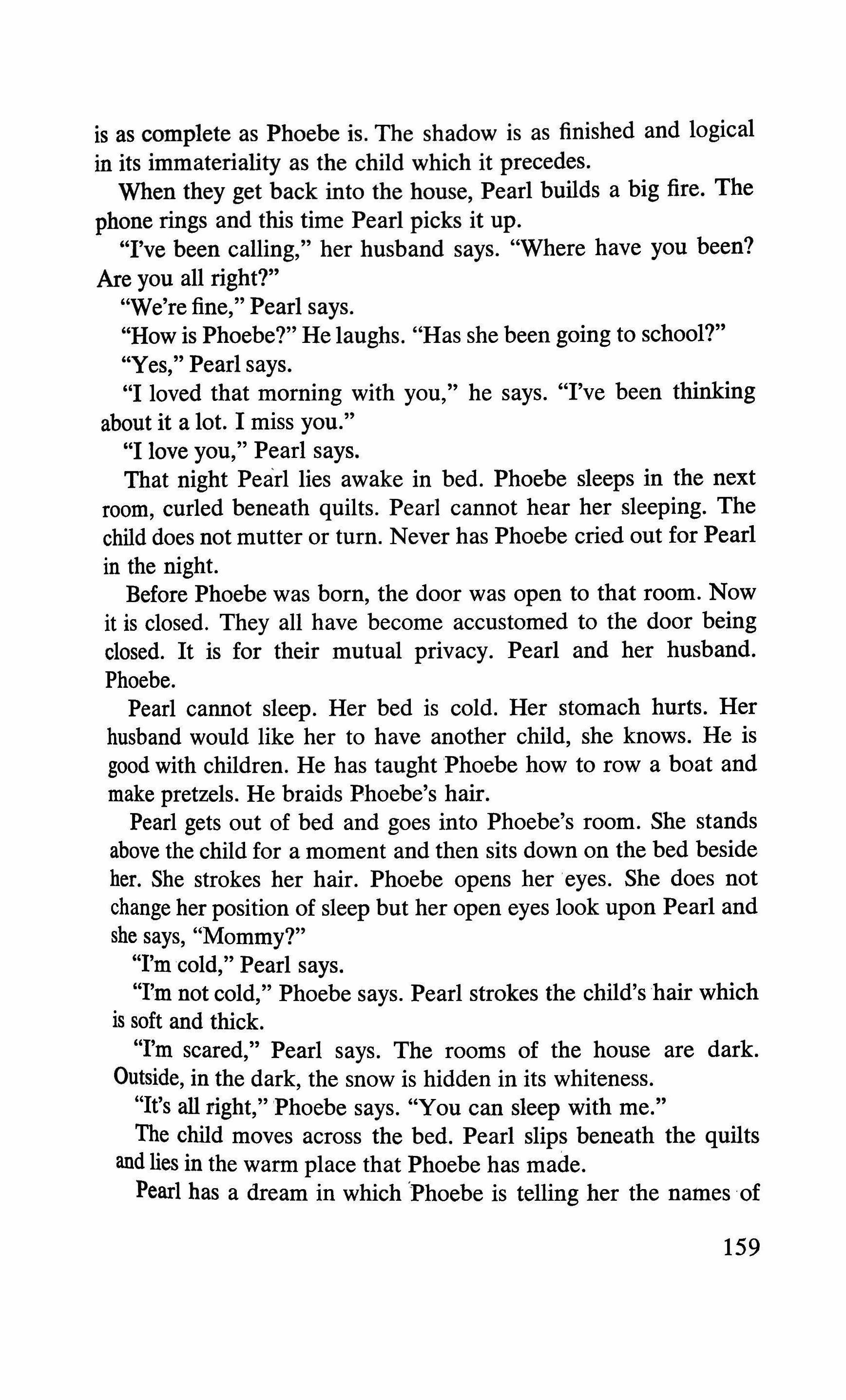
is as complete as Phoebe is. The shadow is as finished and logical in its immateriality as the child which it precedes.
When they get back into the house, Pearl builds a big fire. The phone rings and this time Pearl picks it up.
"I've been calling," her husband says. "Where have you been? Are you all right?"
"We're fine," Pearl says.
"How is Phoebe?" He laughs. "Has she been going to school?"
"Yes," Pearl says.
"I loved that morning with you," he says. "I've been thinking about it a lot. I miss you."
"I love you," Pearl says.
That night Pearl lies awake in bed. Phoebe sleeps in the next room, curled beneath quilts. Pearl cannot hear her sleeping. The child does not mutter or turn. Never has Phoebe cried out for Pearl in the night.
Before Phoebe was born, the door was open to that room. Now it is closed. They all have become accustomed to the door being closed. It is for their mutual privacy. Pearl and her husband. Phoebe.
Pearl cannot sleep. Her bed is cold. Her stomach hurts. Her husband would like her to have another child, she knows. He is good with children. He has taught Phoebe how to row a boat and make pretzels. He braids Phoebe's hair.
Pearl gets out of bed and goes into Phoebe's room. She stands above the child for a moment and then sits down on the bed beside her. She strokes her hair. Phoebe opens her eyes. She does not change her position of sleep but her open eyes look upon Pearl and she says, "Mommy?"
"I'm cold," Pearl says.
"I'm not cold," Phoebe says. Pearl strokes the child's hair which is soft and thick.
"I'm scared," Pearl says. The rooms of the house are dark. Outside, in the dark, the snow is hidden in its whiteness.
"It's all right," 'Phoebe says. "You can sleep with me."
The child moves across the bed. Pearl slips beneath the quilts and lies in the warm place that Phoebe has made.
Pearl has a dream in which 'Phoebe is telling her the names of
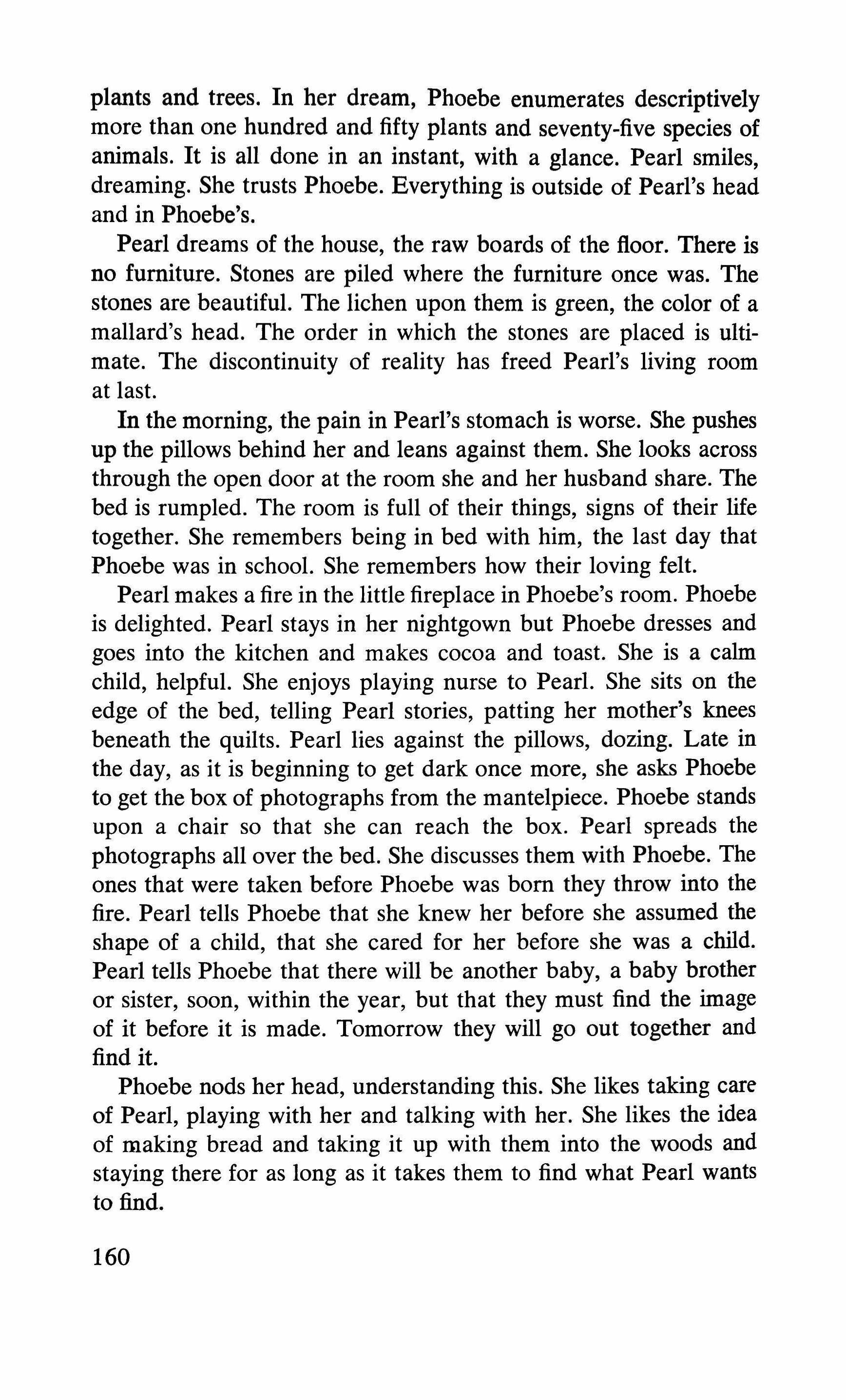
plants and trees. In her dream, Phoebe enumerates descriptively more than one hundred and fifty plants and seventy-five species of animals. It is all done in an instant, with a glance. Pearl smiles, dreaming. She trusts Phoebe. Everything is outside of Pearl's head and in Phoebe's.
Pearl dreams of the house, the raw boards of the floor. There is no furniture. Stones are piled where the furniture once was. The stones are beautiful. The lichen upon them is green, the color of a mallard's head. The order in which the stones are placed is ultimate. The discontinuity of reality has freed Pearl's living room at last.
In the morning, the pain in Pearl's stomach is worse. She pushes up the pillows behind her and leans against them. She looks across through the open door at the room she and her husband share. The bed is rumpled. The room is full of their things, signs of their life together. She remembers being in bed with him, the last day that Phoebe was in school. She remembers how their loving felt.
Pearl makes a fire in the little fireplace in Phoebe's room. Phoebe is delighted. Pearl stays in her nightgown but Phoebe dresses and goes into the kitchen and makes cocoa and toast. She is a calm child, helpful. She enjoys playing nurse to Pearl. She sits on the edge of the bed, telling Pearl stories, patting her mother's knees beneath the quilts. Pearl lies against the pillows, dozing. Late in the day, as it is beginning to get dark once more, she asks Phoebe to get the box of photographs from the mantelpiece. Phoebe stands upon a chair so that she can reach the box. Pearl spreads the photographs all over the bed. She discusses them with Phoebe. The ones that were taken before Phoebe was born they throw into the fire. Pearl tells Phoebe that she knew her before she assumed the shape of a child, that she cared for her before she was a child. Pearl tells Phoebe that there will be another baby, a baby brother or sister, soon, within the year, but that they must find the image of it before it is made. Tomorrow they will go out together and find it.
Phoebe nods her head, understanding this. She likes taking care of Pearl, playing with her and talking with her. She likes the idea of making bread and taking it up with them into the woods and staying there for as long as it takes them to find what Pearl wants to find.

The fire goes out. Pearl and Phoebe sleep. Phoebe dreams of the snow, of making a little burrow in the snow and sleeping there when it gets dark and cold.
Pearl dreams. It is Phoebe that she dreams of. A child is a will of love unknown. Phoebe understands. In the woods, they begin with Pearl leading, but soon Phoebe is ahead and Pearl follows her. Phoebe is dressed in a white parka with fur trim. Her weight upon the hard snow barely makes a mark. They walk for a long time. The woods are monotonous. They see no sign, nothing. Then Pearl looks up into the branches of the trees they pass beneath. She sees the dried sacs of tent caterpillars. They are in the gray, full-bodied shape of a woman. Pearl lowers her eyes. She is frightened. The sacs are horrible, an illness clinging to the clean white branches of the trees. She calls out to Phoebe, who turns, understanding, pretending she has not seen them.
It is snowing when they wake in the morning. Pearl has made enough bread for several days. She packs it in a knapsack which she will carry. Phoebe eats her breakfast, dressed in her snowsuit. Her mittens have butterflies knitted upon them and are attached to the cuffs of her snowsuit by little clips. They swing against her milk cup as she eats. Phoebe is excited about Pearl's adventure. Tomorrow her father will be home and she will have to go to school again. She laughs and smiles at Pearl.
They leave the house and start across the meadow toward the woods. Phoebe makes a snowball and throws it at Pearl's legs. Pearl looks back at the house, which is already blurred by the falling snow. Even so, she can see that the door has not been latched and is wide open. The snow will drift into the house. Already the house looks as though it has been deserted for a long time.
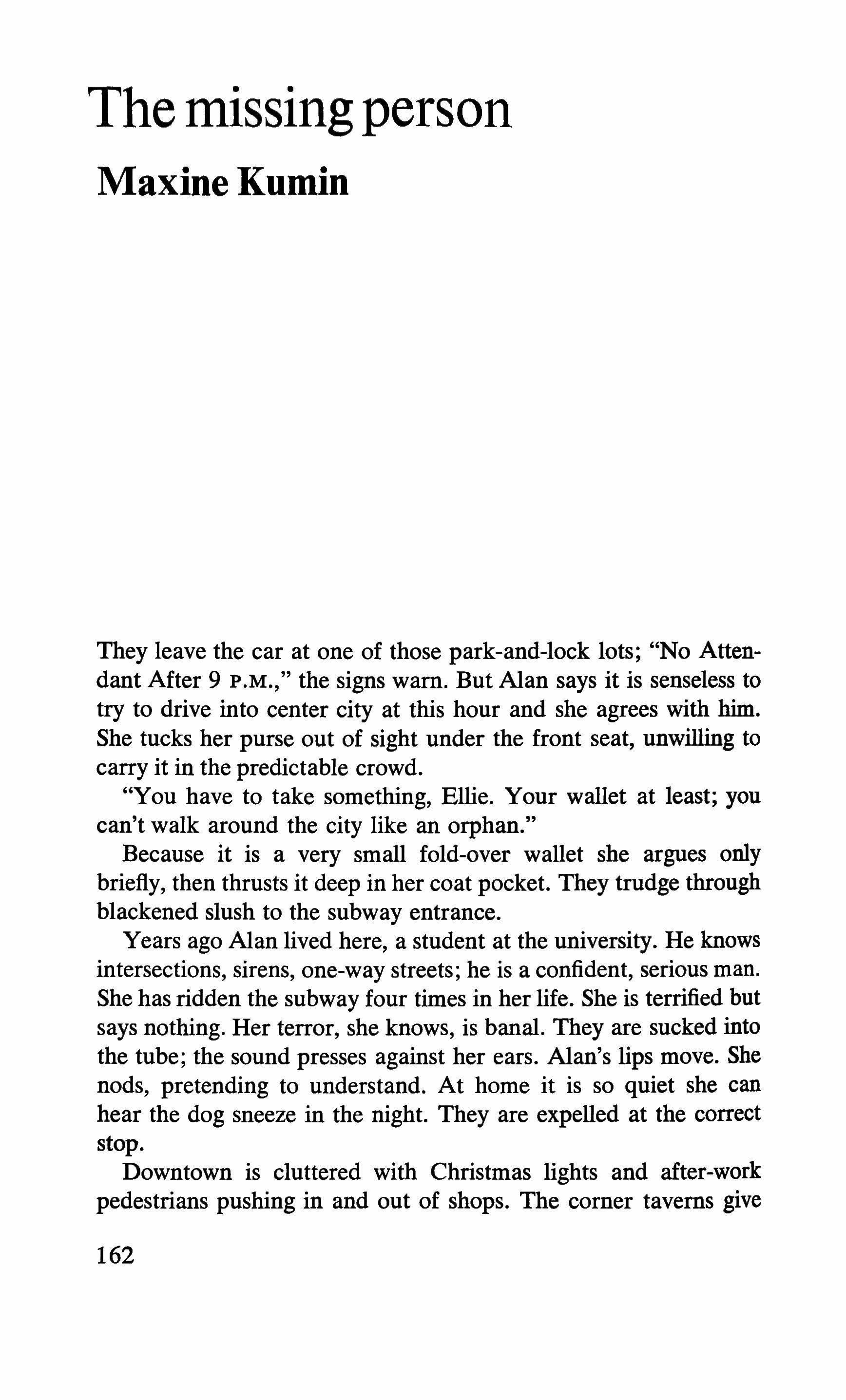
They leave the car at one of those park-and-lock lots; "No Attendant After 9 P.M.," the signs warn. But Alan says it is senseless to try to drive into center city at this hour and she agrees with him. She tucks her purse out of sight under the front seat, unwilling to carry it in the predictable crowd.
"You have to take something, Ellie. Your wallet at least; you can't walk around the city like an orphan."
Because it is a very small fold-over wallet she argues only briefly, then thrusts it deep in her coat pocket. They trudge through blackened slush to the subway entrance.
Years ago Alan lived here, a student at the university. He knows intersections, sirens, one-way streets; he is a confident, serious mao. She has ridden the subway four times in her life. She is terrified but says nothing. Her terror, she knows, is banal. They are sucked into the tube; the sound presses against her ears. Alan's lips move. She nods, pretending to understand. At home it is so quiet she can hear the dog sneeze in the night. They are expelled at the correct stop.
Downtown is cluttered with Christmas lights and after-work pedestrians pushing in and out of shops. The comer taverns give
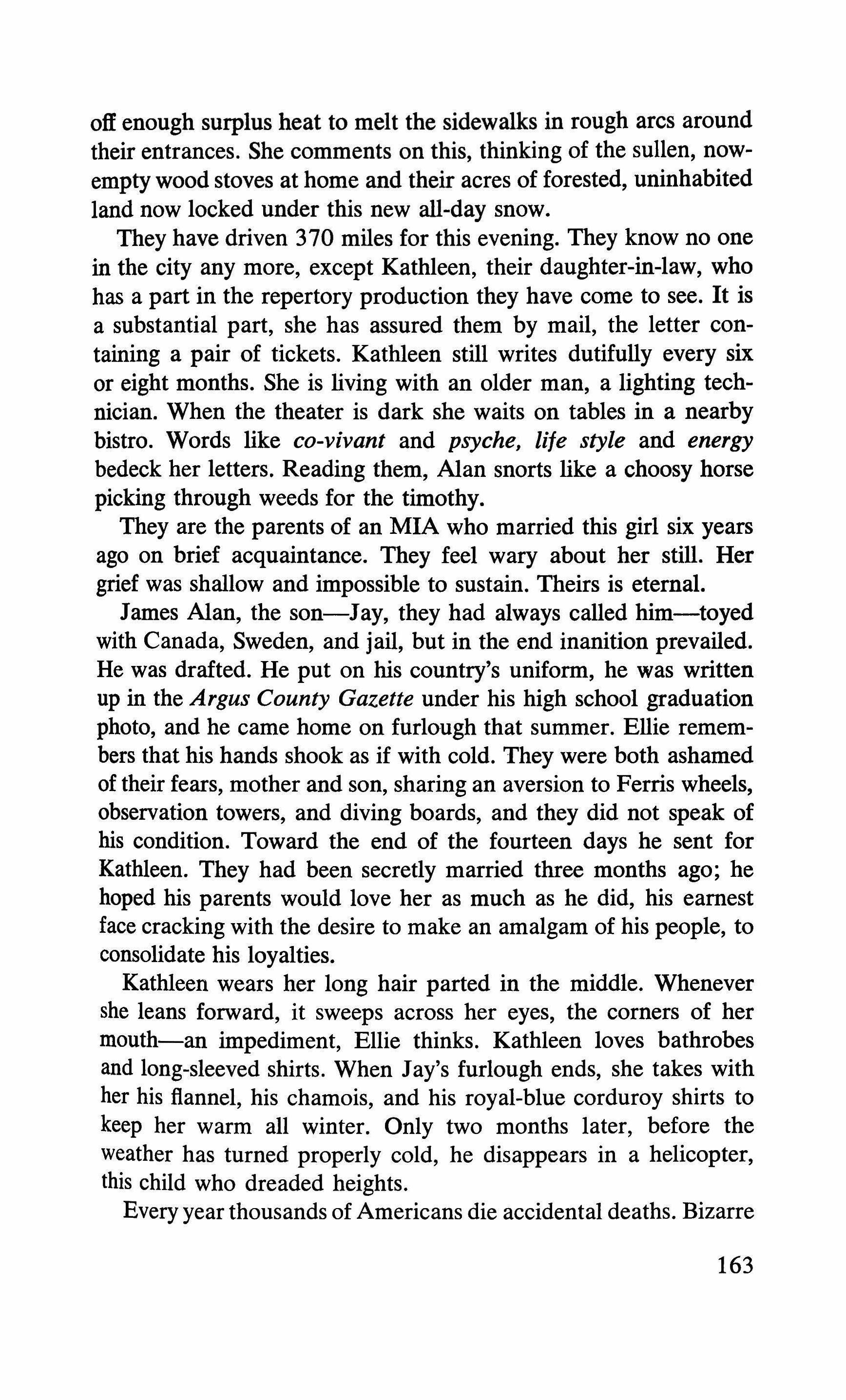
off enough surplus heat to melt the sidewalks in rough arcs around their entrances. She comments on this, thinking of the sullen, nowempty wood stoves at home and their acres of forested, uninhabited land now locked under this newall-day snow.
They have driven 370 miles for this evening. They know no one in the city any more, except Kathleen, their daughter-in-law, who has a part in the repertory production they have come to see. It is a substantial part, she has assured them by mail, the letter containing a pair of tickets. Kathleen still writes dutifully every six or eight months. She is living with an older man, a lighting technician. When the theater is dark she waits on tables in a nearby bistro. Words like co-vivant and psyche, life style and energy bedeck her letters. Reading them, Alan snorts like a choosy horse picking through weeds for the timothy.
They are the parents of an MIA who married this girl six years ago on brief acquaintance. They feel wary about her still. Her grief was shallow and impossible to sustain. Theirs is eternal.
James Alan, the son-Jay, they had always called him-toyed with Canada, Sweden, and jail, but in the end inanition prevailed. He was drafted. He put on his country's uniform, he was written up in the Argus County Gazette under his high school graduation photo, and he came home on furlough that summer. Ellie remembers that his hands shook as if with cold. They were both ashamed of their fears, mother and son, sharing an aversion to Ferris wheels, observation towers, and diving boards, and they did not speak of his condition. Toward the end of the fourteen days he sent for Kathleen. They had been secretly married three months ago; he hoped his parents would love her as much as he did, his earnest face cracking with the desire to make an amalgam of his people, to consolidate his loyalties.
Kathleen wears her long hair parted in the middle. Whenever she leans forward, it sweeps across her eyes, the corners of her mouth-an impediment, Ellie thinks. Kathleen loves bathrobes and long-sleeved shirts. When Jay's furlough ends, she takes with her his flannel, his chamois, and his royal-blue corduroy shirts to keep her warm all winter. Only two months later, before the weather has turned properly cold, he disappears in a helicopter, this child who dreaded heights.
Every year thousands of Americans die accidental deaths. Bizarre
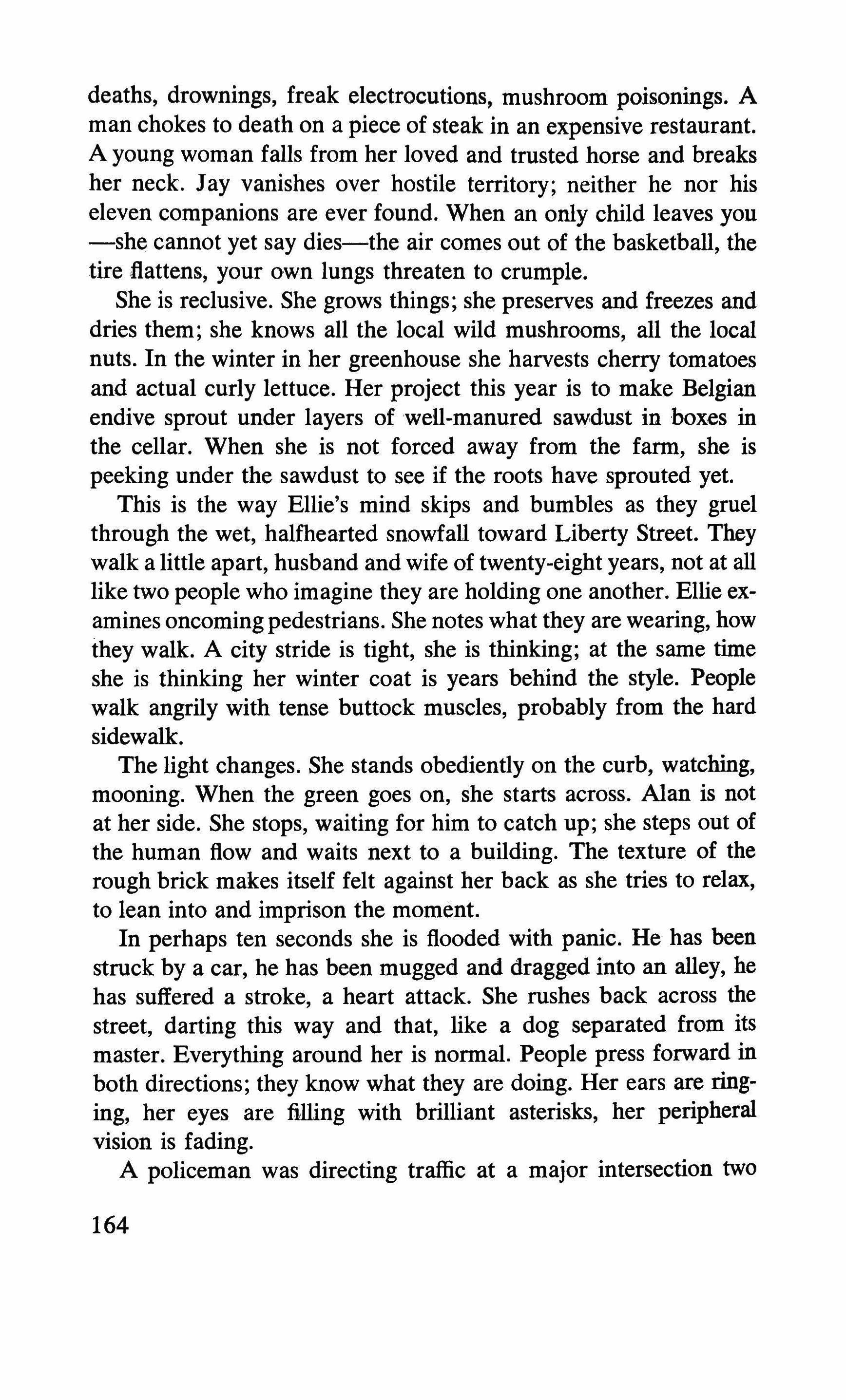
deaths, drownings, freak electrocutions, mushroom poisonings. A man chokes to death on a piece of steak in an expensive restaurant. A young woman falls from her loved and trusted horse and breaks her neck. Jay vanishes over hostile territory; neither he nor his eleven companions are ever found. When an only child leaves you =-she cannot yet say dies-the air comes out of the basketball, the tire flattens, your own lungs threaten to crumple.
She is reclusive. She grows things; she preserves and freezes and dries them; she knows all the local wild mushrooms, all the local nuts. In the winter in her greenhouse she harvests cherry tomatoes and actual curly lettuce. Her project this year is to make Belgian endive sprout under layers of well-manured sawdust in boxes in the cellar. When she is not forced away from the farm, she is peeking under the sawdust to see if the roots have sprouted yet.
This is the way Ellie's mind skips and bumbles as they gruel through the wet, halfhearted snowfall toward Liberty Street. They walk a little apart, husband and wife of twenty-eight years, not at all like two people who imagine they are holding one another. Ellie examines oncomingpedestrians. She notes what they are wearing, how they walk. A city stride is tight, she is thinking; at the same time she is thinking her winter coat is years behind the style. People walk angrily with tense buttock muscles, probably from the hard sidewalk.
The light changes. She stands obediently on the curb, watching, mooning. When the green goes on, she starts across. Alan is not at her side. She stops, waiting for him to catch up; she steps out of the human flow and waits next to a building. The texture of the rough brick makes itself felt against her back as she tries to relax, to lean into and imprison the moment.
In perhaps ten seconds she is flooded with panic. He has been struck by a car, he has been mugged and dragged into an alley, he has suffered a stroke, a heart attack. She rushes back across the street, darting this way and that, like a dog separated from its master. Everything around her is normal. People press forward in both directions; they know what they are doing. Her ears are ringing, her eyes are filling with brilliant asterisks, her peripheral vision is fading.
A policeman was directing traffic at a major intersection two
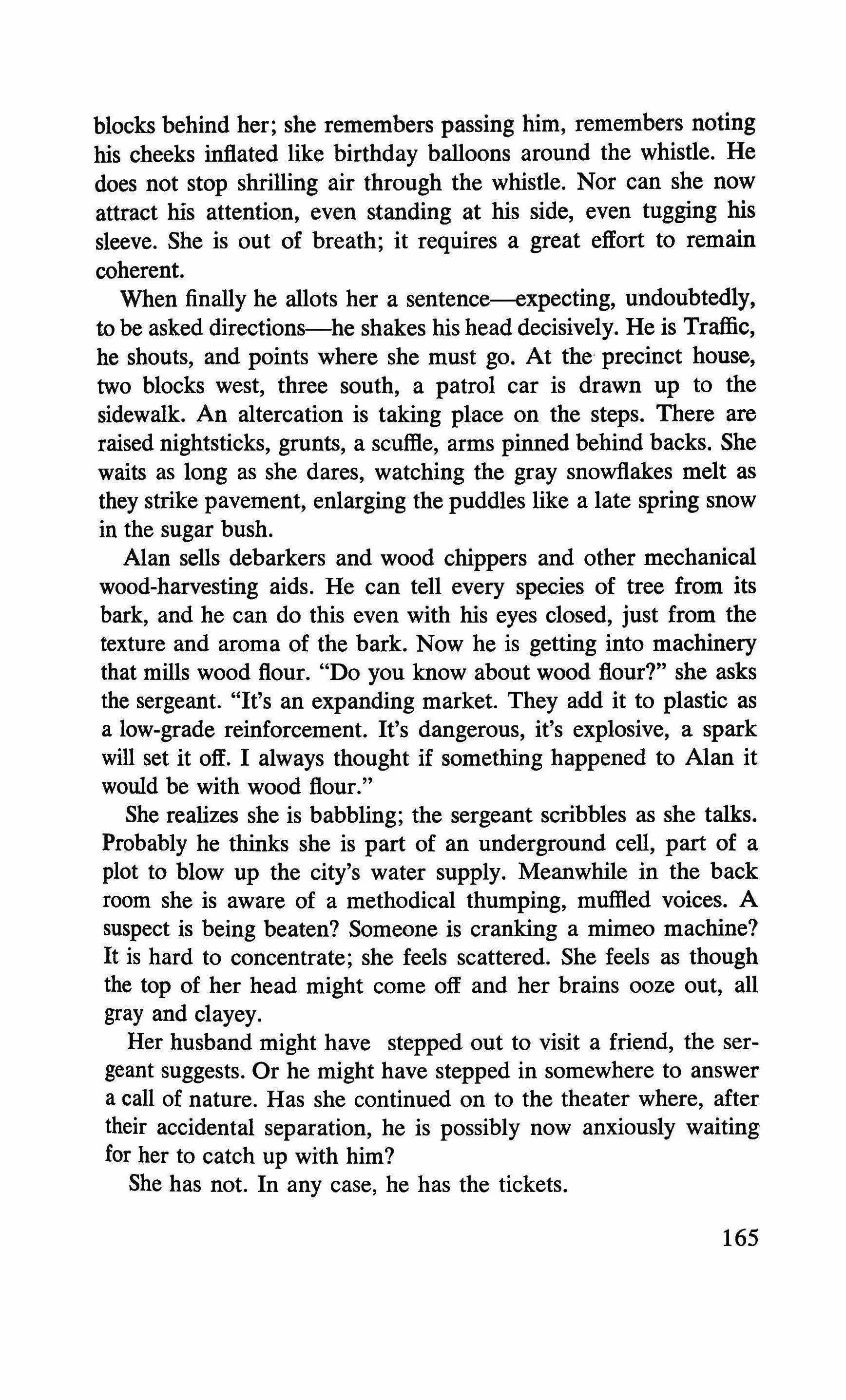
blocks behind her; she remembers passing him, remembers noting his cheeks inflated like birthday balloons around the whistle. He does not stop shrilling air through the whistle. Nor can she now attract his attention, even standing at his side, even tugging his sleeve. She is out of breath; it requires a great effort to remain coherent.
When finally he allots her a sentence---expecting, undoubtedly, to be asked directions-he shakes his head decisively. He is Traffic, he shouts, and points where she must go. At the precinct house, two blocks west, three south, a patrol car is drawn up to the sidewalk. An altercation is taking place on the steps. There are raised nightsticks, grunts, a scuffle, arms pinned behind backs. She waits as long as she dares, watching the gray snowflakes melt as they strike pavement, enlarging the puddles like a late spring snow in the sugar bush.
Alan sells debarkers and wood chippers and other mechanical wood-harvesting aids. He can tell every species of tree from its bark, and he can do this even with his eyes closed, just from the texture and aroma of the bark. Now he is getting into machinery that mills wood flour. "Do you know about wood flour?" she asks the sergeant. "It's an expanding market. They add it to plastic as a low-grade reinforcement. It's dangerous, it's explosive, a spark will set it off. I always thought if something happened to Alan it would be with wood flour."
She realizes she is babbling; the sergeant scribbles as she talks. Probably he thinks she is part of an underground cell, part of a plot to blow up the city's water supply. Meanwhile in the back room she is aware of a methodical thumping, muffled voices. A suspect is being beaten? Someone is cranking a mimeo machine? It is hard to concentrate; she feels scattered. She feels as though the top of her head might come off and her brains ooze out, all gray and clayey.
Her husband might have stepped out to visit a friend, the sergeant suggests. Or he might have stepped in somewhere to answer a call of nature. Has she continued on to the theater where, after their accidental separation, he is possibly now anxiously waiting for her to catch up with him?
She has not. In any case, he has the tickets.

Has she thought of returning to the parking lot to see if he is waiting at the car for her, having become accidentally separated from her and realizing that she might grow confused about the location of the theater but would remember where they have parked the car?
No, she has not thought of that. Besides, he has the car keys. Hers are in her purse. Which is locked in the car.
Any history of mental disorder?
Wordlessly she shakes her head.
Maybe-this hangs on the air although it is not actually voiced -maybe he has grown tired of her and has elected this admittedly uncommon method of deserting her. Does she remember any unusual incident that transpired between them today?
She resolves not to mention the incident of the wallet. After all, Alan is practical. She ought not to wander around a big city without her name and address and a few dollars. This is not Argus County, where the doors of households are left open and only stall latches are shut. No, nothing. Nothing!
Hundreds of people are reported missing every day, it is explained to her patiently, but with an air of lassitude. Of every hundred persons who are reported missing by their loved ones, 99 and 99/1OOths of them are deliberately missing. They have dropped out, taken a powder, vamoosed, they don't want to be found. And 99 percent of the 99 and 99/1OOths undergo a change of heart within the first twenty-four hours. They get over their bad feeling, they experience remorse, they return. This is the reason for the Police Department's regulation: a missing persons bulletin cannot be issued on her husband until approximately this time tomorrow.
No, he is genuinely sorry, he is not empowered to take down a description of the, ah, possibly missing person until tomorrow evening at approximately
She gets up finally, fumbling, realizing that she is not carrying the pocketbook a woman may fumble to retrieve from her lap as she rises. She has no will. She is directionless. She cannot see beyond the passage of twenty-four hours so that she may return to this varnished brown office and describe her vanished husband to an officer of the law. For surely if they know what he looks like, they can find him?
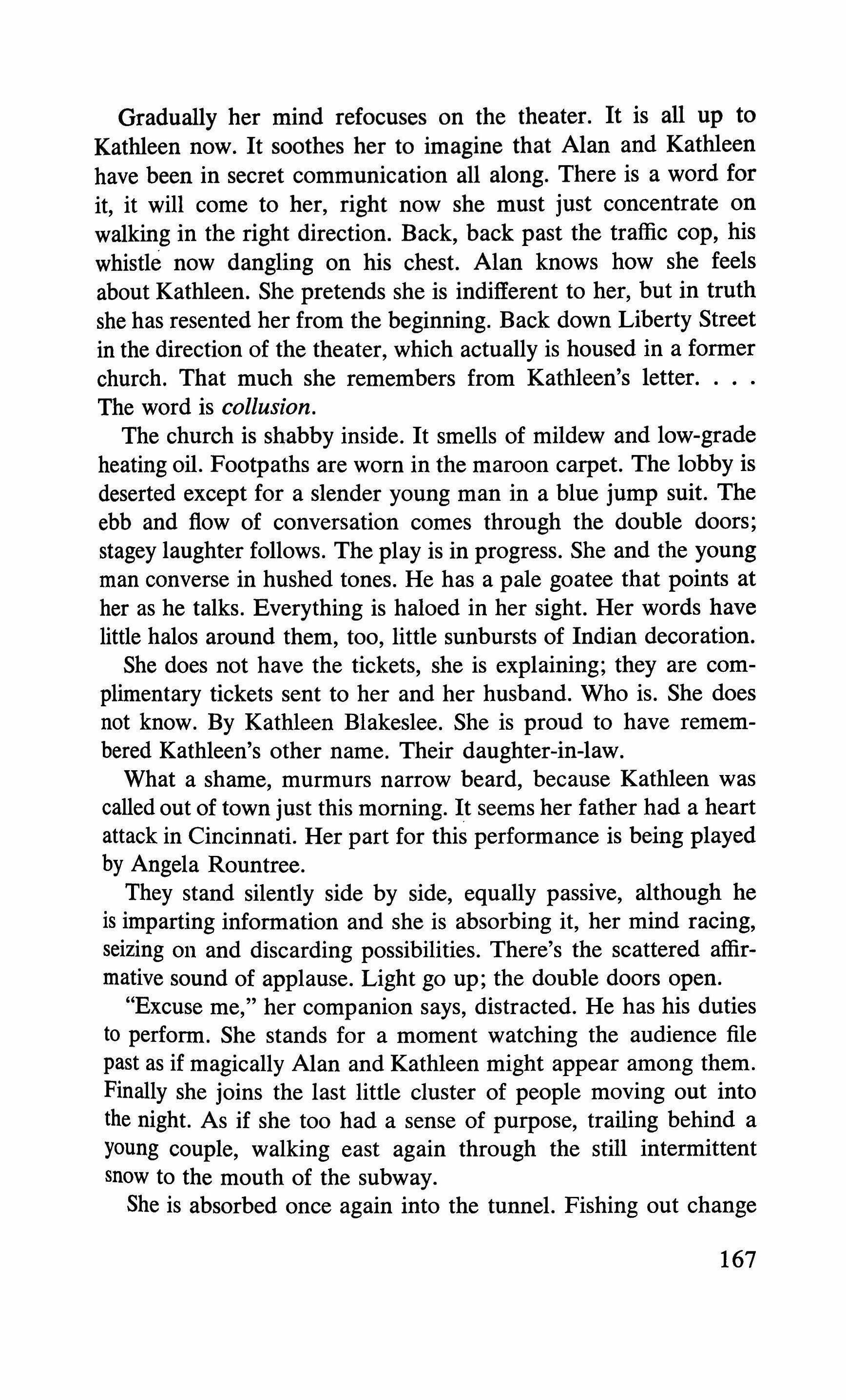
Gradually her mind refocuses on the theater. It is all up to Kathleen now. It soothes her to imagine that Alan and Kathleen have been in secret communication all along. There is a word for it, it will come to her, right now she must just concentrate on walking in the right direction. Back, back past the traffic cop, his whistle now dangling on his chest. Alan knows how she feels about Kathleen. She pretends she is indifferent to her, but in truth she has resented her from the beginning. Back down Liberty Street in the direction of the theater, which actually is housed in a former church. That much she remembers from Kathleen's letter The word is collusion.
The church is shabby inside. It smells of mildew and low-grade heating oil. Footpaths are worn in the maroon carpet. The lobby is deserted except for a slender young man in a blue jump suit. The ebb and flow of conversation comes through the double doors; stagey laughter follows. The play is in progress. She and the young man converse in hushed tones. He has a pale goatee that points at her as he talks. Everything is haloed in her sight. Her words have little halos around them, too, little sunbursts of Indian decoration. She does not have the tickets, she is explaining; they are complimentary tickets sent to her and her husband. Who is. She does not know. By Kathleen Blakeslee. She is proud to have remembered Kathleen's other name. Their daughter-in-law.
What a shame, murmurs narrow beard, because Kathleen was called out of town just this morning. It seems her father had a heart attack in Cincinnati. Her part for this performance is being played by Angela Rountree.
They stand silently side by side, equally passive, although he is imparting information and she is absorbing it, her mind racing, seizing on and discarding possibilities. There's the scattered affirmative sound of applause. Light go up; the double doors open.
"Excuse me," her companion says, distracted. He has his duties to perform. She stands for a moment watching the audience file past as if magically Alan and Kathleen might appear among them. Finally she joins the last little cluster of people moving out into the night. As if she too had a sense of purpose, trailing behind a young couple, walking east again through the still intermittent snow to the mouth of the subway. She is absorbed once again into the tunnel. Fishing out change
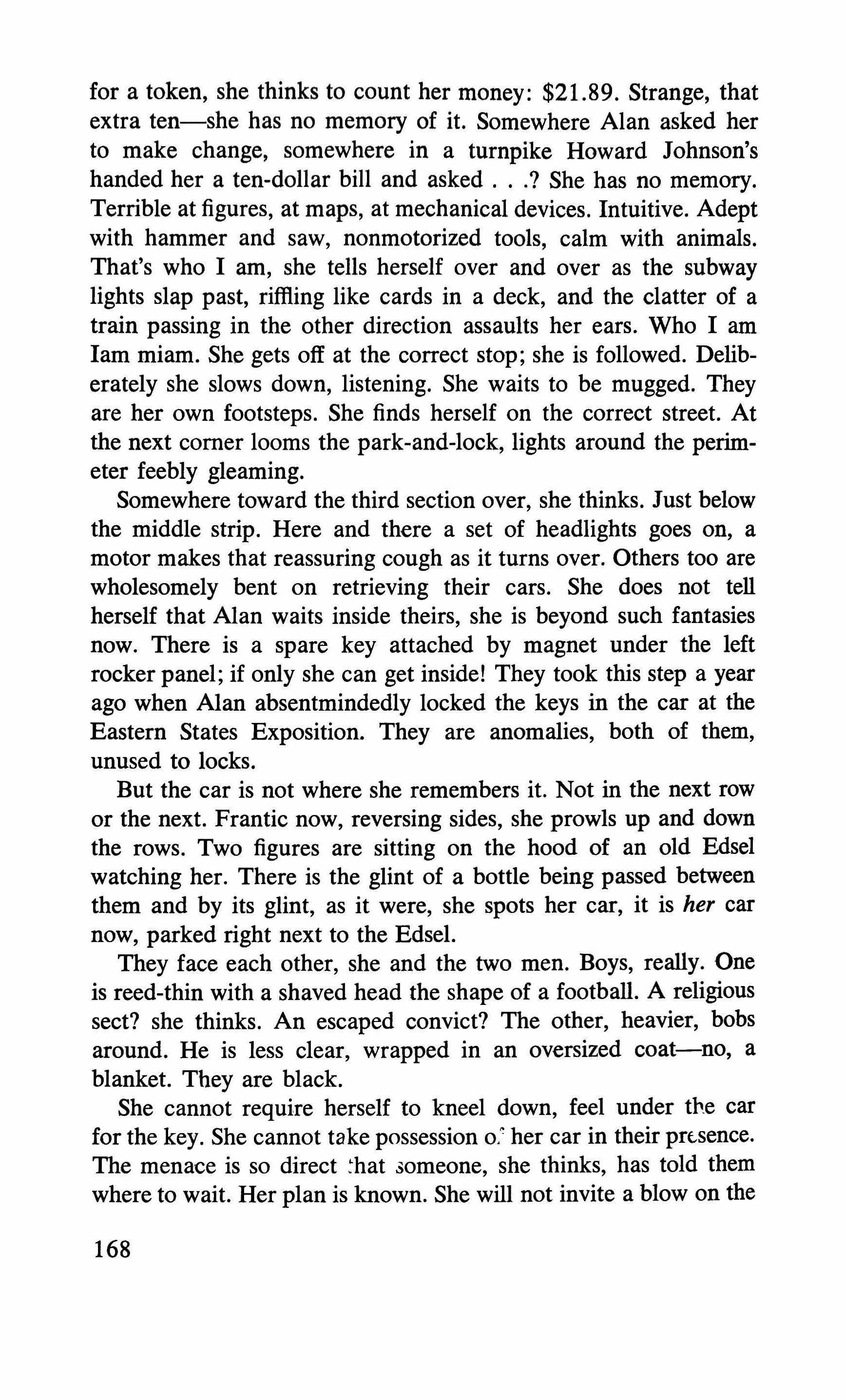
for a token, she thinks to count her money: $21.89. Strange, that extra ten-she has no memory of it. Somewhere Alan asked her to make change, somewhere in a turnpike Howard Johnson's handed her a ten-dollar bill and asked .? She has no memory. Terrible at figures, at maps, at mechanical devices. Intuitive. Adept with hammer and saw, nonmotorized tools, calm with animals. That's who I am, she tells herself over and over as the subway lights slap past, riffling like cards in a deck, and the clatter of a train passing in the other direction assaults her ears. Who I am lam miam. She gets off at the correct stop; she is followed. Deliberately she slows down, listening. She waits to be mugged. They are her own footsteps. She finds herself on the correct street. At the next comer looms the park-and-lock, lights around the perimeter feebly gleaming.
Somewhere toward the third section over, she thinks. Just below the middle strip. Here and there a set of headlights goes on, a motor makes that reassuring cough as it turns over. Others too are wholesomely bent on retrieving their cars. She does not tell herself that Alan waits inside theirs, she is beyond such fantasies now. There is a spare key attached by magnet under the left rocker panel; if only she can get inside! They took this step a year ago when Alan absentmindedly locked the keys in the car at the Eastern States Exposition. They are anomalies, both of them, unused to locks.
But the car is not where she remembers it. Not in the next row or the next. Frantic now, reversing sides, she prowls up and down the rows. Two figures are sitting on the hood of an old Edsel watching her. There is the glint of a bottle being passed between them and by its glint, as it were, she spots her car, it is her car now, parked right next to the Edsel.
They face each other, she and the two men. Boys, really. One is reed-thin with a shaved head the shape of a football. A religious sect? she thinks. An escaped convict? The other, heavier, bobs around. He is less clear, wrapped in an oversized coat-no, a blanket. They are black.
She cannot require herself to kneel down, feel under the car for the key. She cannot take possession 0; her car in their pn sence. The menace is so direct .hat someone, she thinks, has told them where to wait. Her plan is known. She will not invite a blow on the
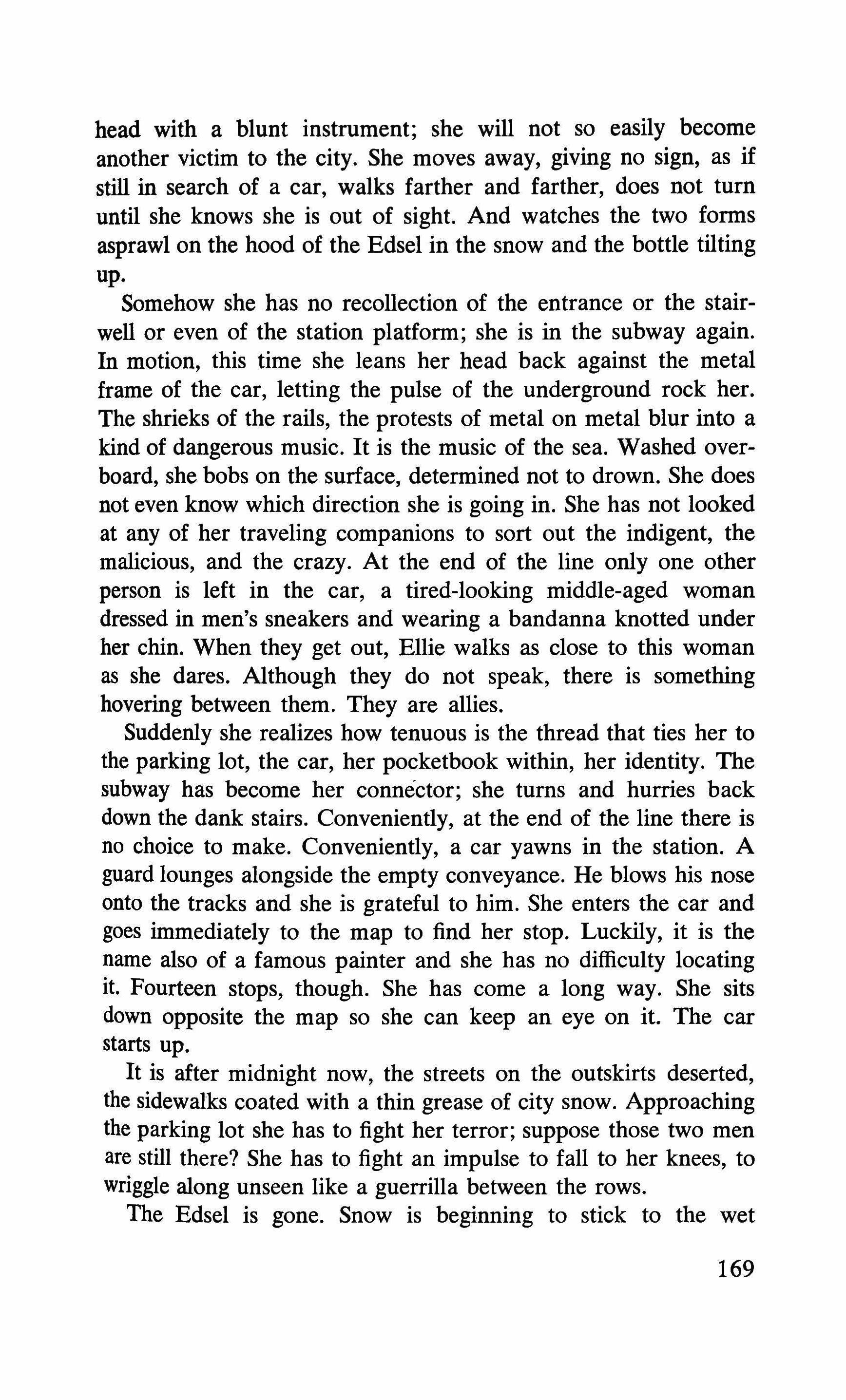
head with a blunt instrument; she will not so easily become another victim to the city. She moves away, giving no sign, as if still in search of a car, walks farther and farther, does not turn until she knows she is out of sight. And watches the two forms asprawl on the hood of the Edsel in the snow and the bottle tilting up.
Somehow she has no recollection of the entrance or the stairwell or even of the station platform; she is in the subway again. In motion, this time she leans her head back against the metal frame of the car, letting the pulse of the underground rock her. The shrieks of the rails, the protests of metal on metal blur into a kind of dangerous music. It is the music of the sea. Washed overboard, she bobs on the surface, determined not to drown. She does not even know which direction she is going in. She has not looked at any of her traveling companions to sort out the indigent, the malicious, and the crazy. At the end of the line only one other person is left in the car, a tired-looking middle-aged woman dressed in men's sneakers and wearing a bandanna knotted under her chin. When they get out, Ellie walks as close to this woman as she dares. Although they do not speak, there is something hovering between them. They are allies.
Suddenly she realizes how tenuous is the thread that ties her to the parking lot, the car, her pocketbook within, her identity. The subway has become her connector; she turns and hurries back down the dank stairs. Conveniently, at the end of the line there is no choice to make. Conveniently, a car yawns in the station. A guard lounges alongside the empty conveyance. He blows his nose onto the tracks and she is grateful to him. She enters the car and goes immediately to the map to find her stop. Luckily, it is the name also of a famous painter and she has no difficulty locating it. Fourteen stops, though. She has come a long way. She sits down opposite the map so she can keep an eye on it. The car starts up.
It is after midnight now, the streets on the outskirts deserted, the sidewalks coated with a thin grease of city snow. Approaching the parking lot she has to fight her terror; suppose those two men are still there? She has to fight an impulse to fall to her knees, to wriggle along unseen like a guerrilla between the rows.
The Edsel is gone. Snow is beginning to stick to the wet

lozenge of asphalt it covered. She can hear her heart. It makes explosive thumps of relief in her ears. Now she falls to her knees, groping under the car for the little magnetic cup. Her hand fastens on it immediately. What luck! She withdraws the key. She opens the door and drops onto the front seat, has barely the presence of mind to pull the door closed and press down the lock before great waves of trembling overtake her. It is a shivering fit, the kind she endured during frequent childhood bouts of fever. Her body trembles, chattering like aspen leaves in a light wind. From time to time the quaking subsides. She takes a cautious calming breath as one does after the hiccups. Two breaths, three; then some subliminal thought racks her anew with tremors.
Little by little she sleeps, shakes, sleeps again. When she comes fully awake there is a line of light in the sky and her purse lies heavy in her lap like a cold animal. Somehow she has pulled it out from under the seat. She recognizes that she has been hugging it.
As soon as it is light enough to navigate without headlights, she takes out her own set of car keys and eases out of the lot. Except for the trucks, there is no traffic on the main artery into center city. Despite her normal panic at the multiple signs full of proscriptions, she has no trouble finding Liberty Street. After Liberty Street, the precinct house.
A new sergeant is on duty. It has not occurred to her that last night's man is off duty, has gone home for breakfast, is already safely asleep. She is surprised by her anger. This morning's sergeant respects her account of the night that has passed. He notes down carefully a description of Alan. She gives him a snapshot from her wallet, four years old now, but accurate enough. In it Alan stands by the barn, stiffly posed, squinting into the sun. The head of one horse, the rump of another are visible on the left. Alan is holding a sledge. He looks boyish and capable. And most of all, he looks startingly like Jay.
Finally she begins the long drive home. Oddly peaceful, she ascribes the serenity to her extreme fatigue. Also to shock. You're in shock, she tells herself sternly, waiting to grieve. Think how you miss him. Think how you love, loved him.
But she cannot. The main thing now, the thing that is flooding
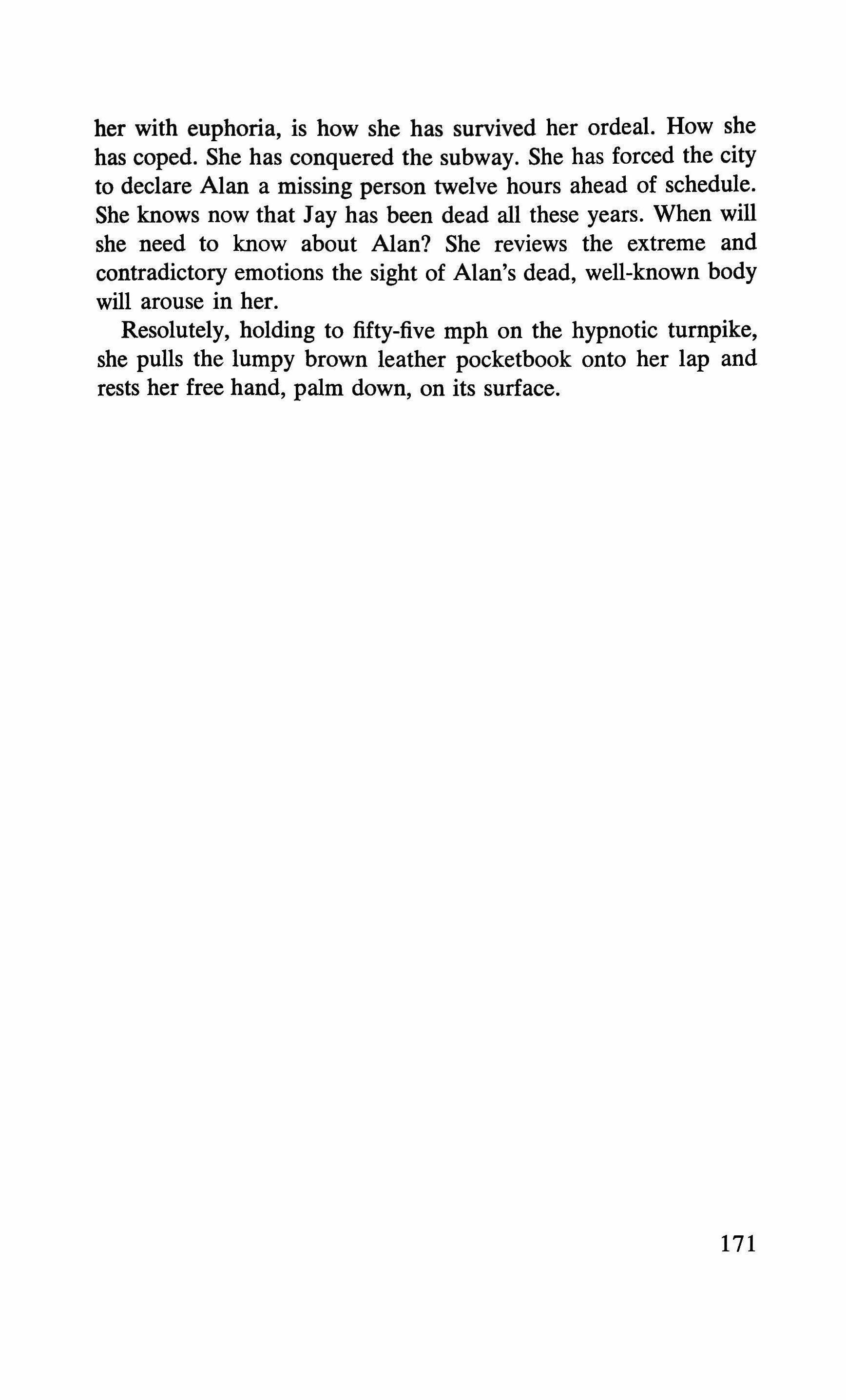
her with euphoria, is how she has survived her ordeal. How she has coped. She has conquered the subway. She has forced the city to declare Alan a missing person twelve hours ahead of schedule. She knows now that Jay has been dead all these years. When will she need to know about Alan? She reviews the extreme and contradictory emotions the sight of Alan's dead, well-known body will arouse in her.
Resolutely, holding to fifty-five mph on the hypnotic turnpike, she pulls the lumpy brown leather pocketbook onto her lap and rests her free hand, palm down, on its surface.
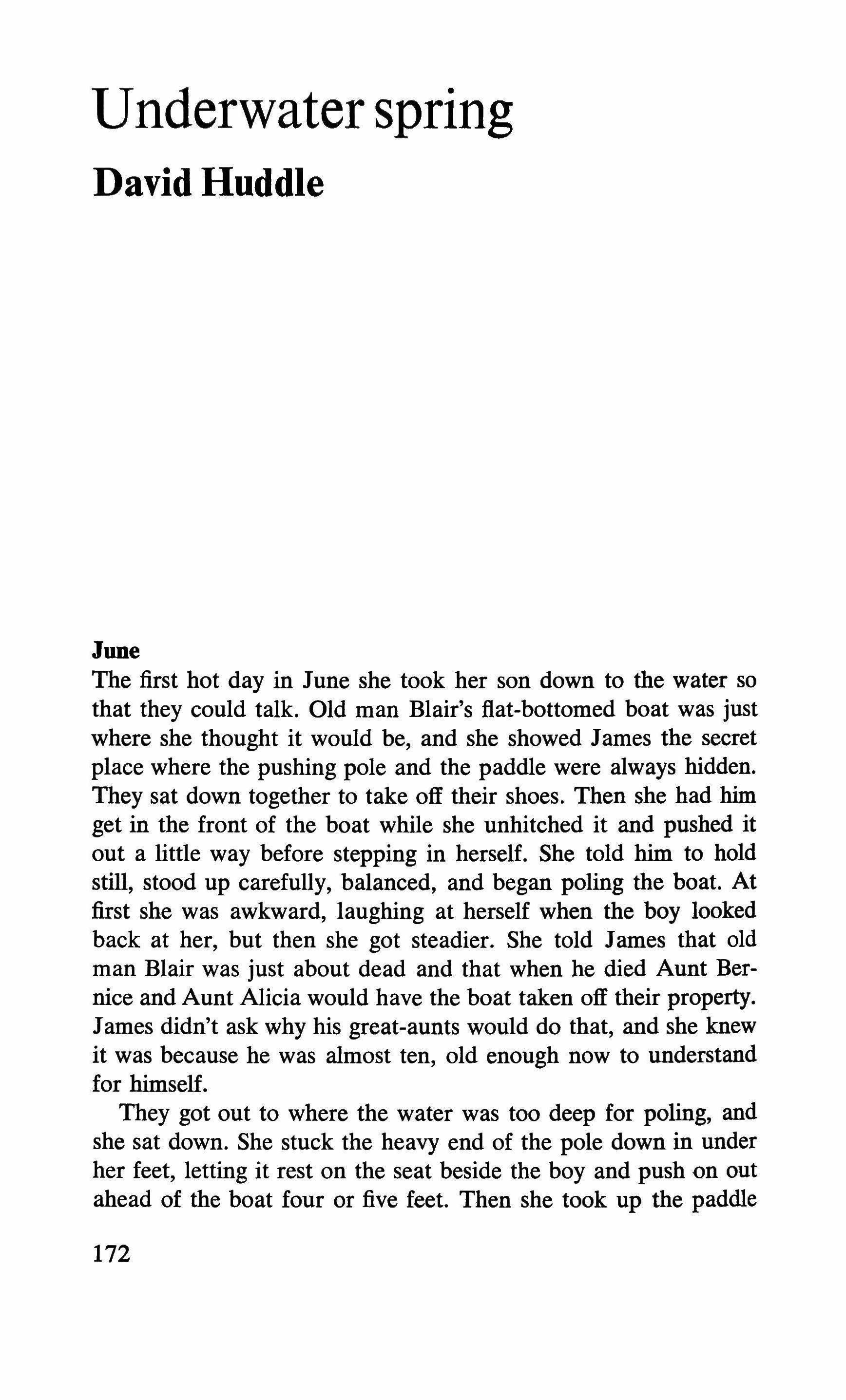
The first hot day in June she took her son down to the water so that they could talk. Old man Blair's flat-bottomed boat was just where she thought it would be, and she showed James the secret place where the pushing pole and the paddle were always hidden. They sat down together to take off their shoes. Then she had him get in the front of the boat while she unhitched it and pushed it out a little way before stepping in herself. She told him to hold still, stood up carefully, balanced, and began poling the boat. At first she was awkward, laughing at herself when the boy looked back at her, but then she got steadier. She told James that old man Blair was just about dead and that when he died Aunt Bernice and Aunt Alicia would have the boat taken off their property. James didn't ask why his great-aunts would do that, and she knew it was because he was almost ten, old enough now to understand for himself.
They got out to where the water was too deep for poling, and she sat down. She stuck the heavy end of the pole down in under her feet, letting it rest on the seat beside the boy and push on out ahead of the boat four or five feet. Then she took up the paddle
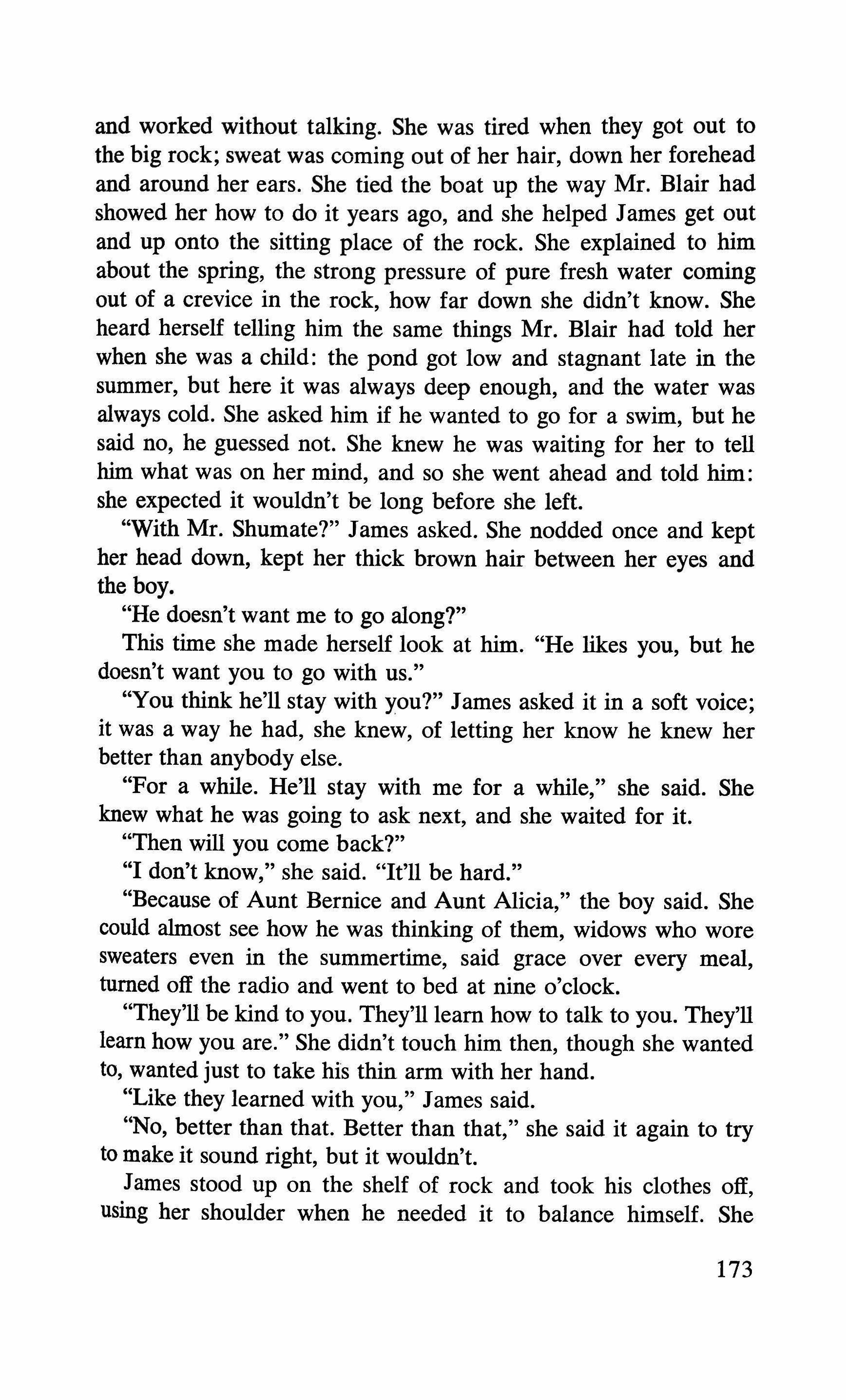
and worked without talking. She was tired when they got out to the big rock; sweat was coming out of her hair, down her forehead and around her ears. She tied the boat up the way Mr. Blair had showed her how to do it years ago, and she helped James get out and up onto the sitting place of the rock. She explained to him about the spring, the strong pressure of pure fresh water coming out of a crevice in the rock, how far down she didn't know. She heard herself telling him the same things Mr. Blair had told her when she was a child: the pond got low and stagnant late in the summer, but here it was always deep enough, and the water was always cold. She asked him if he wanted to go for a swim, but he said no, he guessed not. She knew he was waiting for her to tell him what was on her mind, and so she went ahead and told him: she expected it wouldn't be long before she left.
"With Mr. Shumate?" James asked. She nodded once and kept her head down, kept her thick brown hair between her eyes and the boy.
"He doesn't want me to go along?"
This time she made herself look at him. "He likes you, but he doesn't want you to go with us."
"You think he'll stay with you?" James asked it in a soft voice; it was a way he had, she knew, of letting her know he knew her better than anybody else.
"For a while. He'll stay with me for a while," she said. She knew what he was going to ask next, and she waited for it.
"Then will you come back?"
"I don't know," she said. "It'll be hard."
"Because of Aunt Bernice and Aunt Alicia," the boy said. She could almost see how he was thinking of them, widows who wore sweaters even in the summertime, said grace over every meal, turned off the radio and went to bed at nine o'clock.
"They'll be kind to you. They'll learn how to talk to you. They'll learn how you are." She didn't touch him then, though she wanted to, wanted just to take his thin arm with her hand.
"Like they learned with you," James said.
"No, better than that. Better than that," she said it again to try to make it sound right, but it wouldn't.
James stood up on the shelf of rock and took his clothes off, using her shoulder when he needed it to balance himself. She
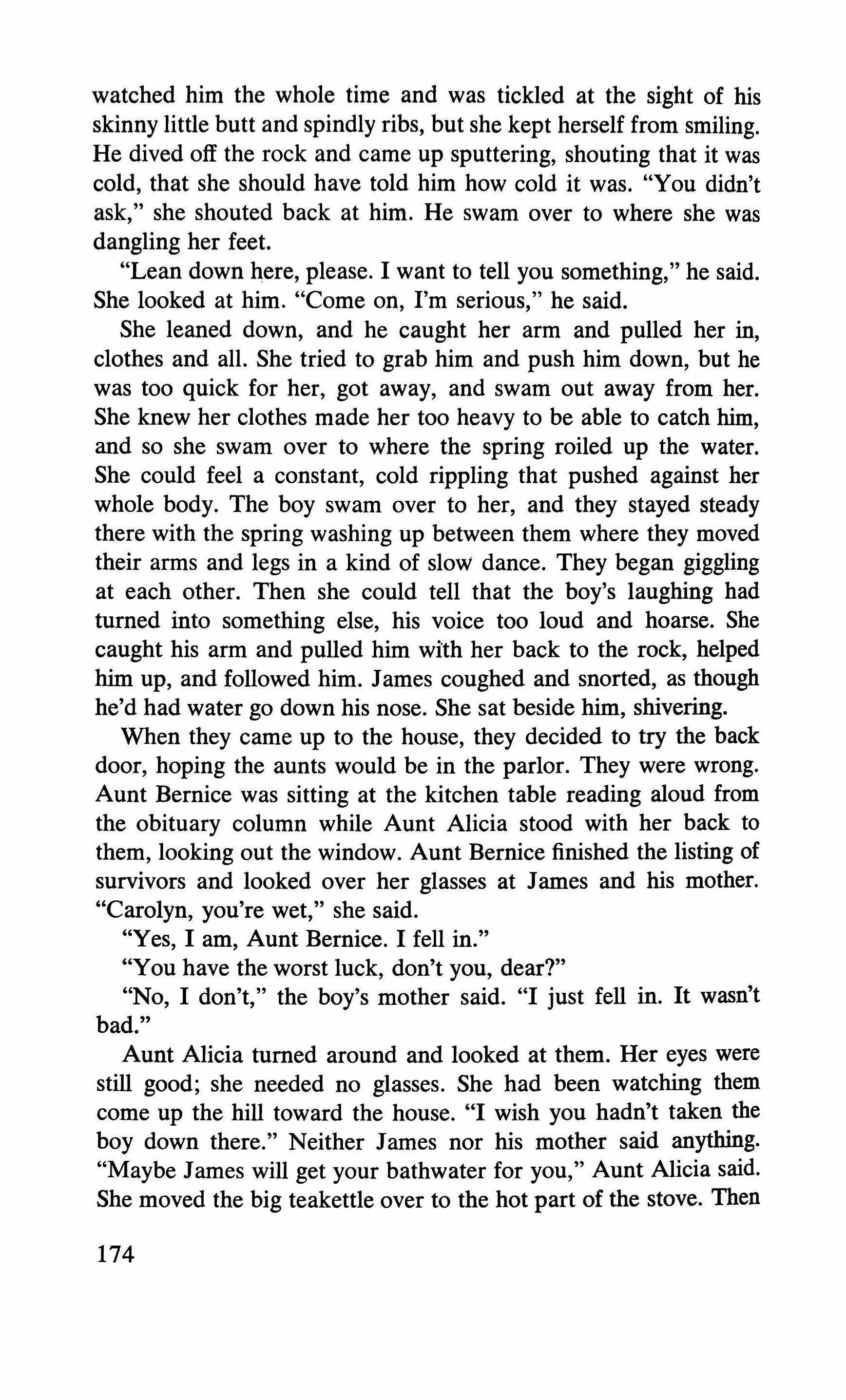
watched him the whole time and was tickled at the sight of his skinny little butt and spindly ribs, but she kept herself from smiling. He dived off the rock and came up sputtering, shouting that it was cold, that she should have told him how cold it was. "You didn't ask," she shouted back at him. He swam over to where she was dangling her feet.
"Lean down here, please. 1 want to tell you something," he said. She looked at him. "Come on, I'm serious," he said.
She leaned down, and he caught her arm and pulled her in, clothes and all. She tried to grab him and push him down, but he was too quick for her, got away, and swam out away from her. She knew her clothes made her too heavy to be able to catch him, and so she swam over to where the spring roiled up the water. She could feel a constant, cold rippling that pushed against her whole body. The boy swam over to her, and they stayed steady there with the spring washing up between them where they moved their arms and legs in a kind of slow dance. They began giggling at each other. Then she could tell that the boy's laughing had turned into something else, his voice too loud and hoarse. She caught his arm and pulled him with her back to the rock, helped him up, and followed him. James coughed and snorted, as though he'd had water go down his nose. She sat beside him, shivering. When they came up to the house, they decided to try the back door, hoping the aunts would be in the parlor. They were wrong. Aunt Bernice was sitting at the kitchen table reading aloud from the obituary column while Aunt Alicia stood with her back to them, looking out the window. Aunt Bernice finished the listing of survivors and looked over her glasses at James and his mother.
"Carolyn, you're wet," she said.
"Yes, 1 am, Aunt Bernice. 1 fell in."
"You have the worst luck, don't you, dear?"
"No, 1 don't," the boy's mother said. "I just fell in. It wasn't bad."
Aunt Alicia turned around and looked at them. Her eyes were still good; she needed no glasses. She had been watching them come up the hill toward the house. "I wish you hadn't taken the boy down there." Neither James nor his mother said anything. "Maybe James will get your bathwater for you," Aunt Alicia said. She moved the big teakettle over to the hot part of the stove. Then

she went out of the kitchen, and Aunt Bernice trailed along behind, carrying the paper with her.
James fixed his mother a tub of bathwater in the kitchen while she was upstairs finding dry clothes for herself. Then he went into the parlor and sat with Aunt Bernice and Aunt Alicia. Soon his mother came in, smelling like soap, looking pretty and fresh in her clean clothes. Later that afternoon, Mr. Shumate came to visit, wearing a tie that he loosened almost as soon as he had sat down. Aunt Alicia fixed iced tea with fresh mint leaves for them all. James and his mother carried on a cheerful conversation, but it was hard for them to get Aunt Bernice or Aunt Alicia or Mr. Shumate, who was sweating, to say very much.
James knew she was going that day when he saw her coming down the steps, in her yellow dress and carrying a suitcase. She asked him to take the suitcase and go wait for her outside on the front porch. It wasn't very heavy. Outside it was cool, and the day smelled damp and new. He put the suitcase down at the top of the steps. He decided not to sit on the glider, which would squeak even if he sat still. Instead, he stood with his hands in his pockets and watched the trucks pass by on the little road that ran no more than seven good paces from Aunt Bernice's and Aunt Alicia's house. This was July; later in the day heat would come up in shimmering waves off the road, and it would be slick with patches of melted tar. James guessed his mother was in the kitchen talking to them now, but he couldn't hear any voices through the screen door. They would talk about it quietly, he knew that; they wouldn't raise their voices.
The trucks made a lot of noise and shook the house when they went by, but they had done that for as long as he could remember. He was used to it. When he'd been a little boy, he'd tried to make them stop by standing beside the road with his thumb out. Usually they'd just pass on by him, the drivers lifting their hands to wave to him, or else one of them would toot its blatting air hom at him and make him jump with the noise. One day, though, he'd been standing there with his thumb out, and a huge gray and red Purina truck had put on its brakes, shrieking and clattering to a stop. He'd been very scared, had run inside, found his mother in the kitchen,
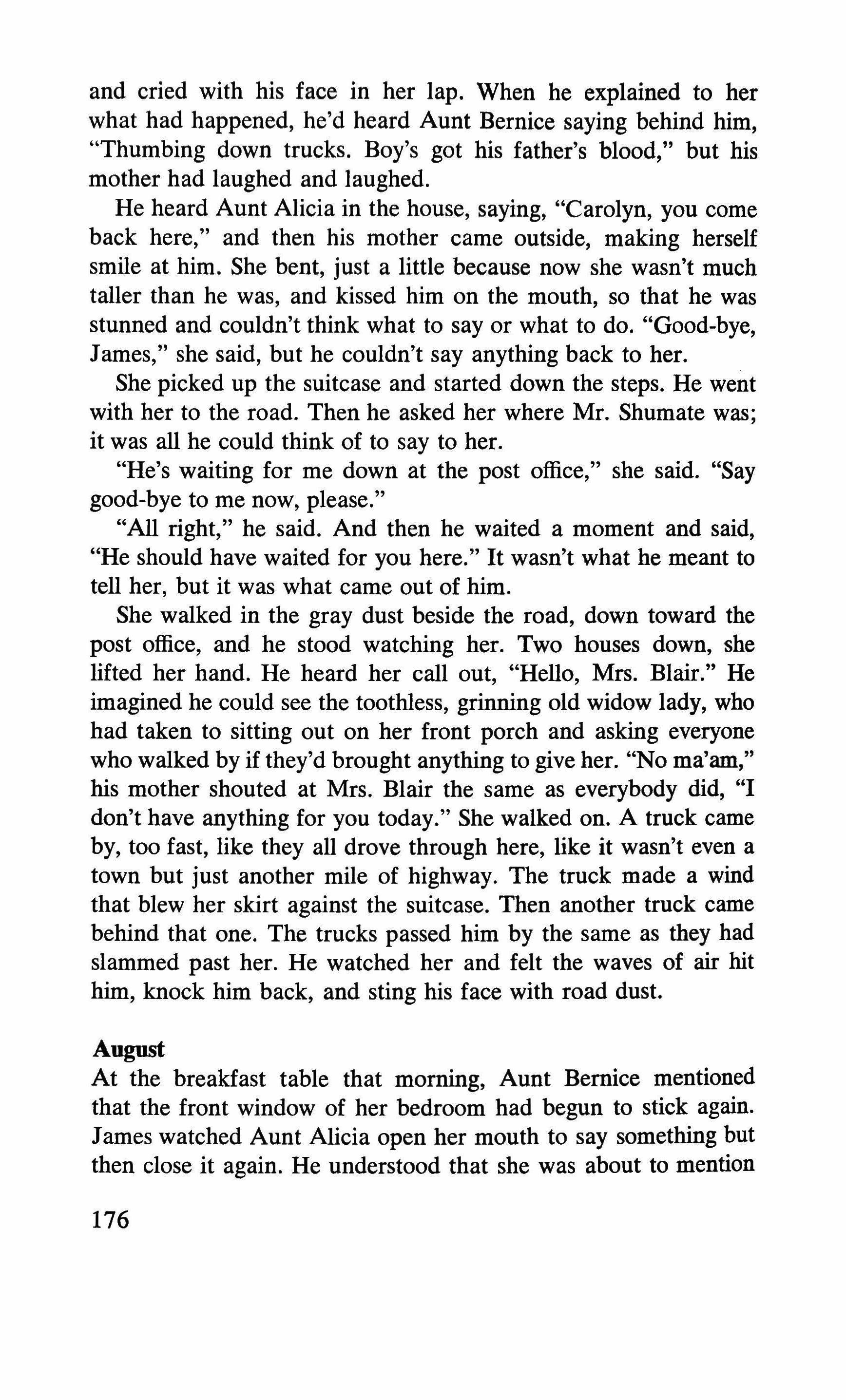
and cried with his face in her lap. When he explained to her what had happened, he'd heard Aunt Bernice saying behind him, "Thumbing down trucks. Boy's got his father's blood," but his mother had laughed and laughed.
He heard Aunt Alicia in the house, saying, "Carolyn, you come back here," and then his mother came outside, making herself smile at him. She bent, just a little because now she wasn't much taller than he was, and kissed him on the mouth, so that he was stunned and couldn't think what to say or what to do. "Good-bye, James," she said, but he couldn't say anything back to her.
She picked up the suitcase and started down the steps. He went with her to the road. Then he asked her where Mr. Shumate was; it was all he could think of to say to her.
"He's waiting for me down at the post office," she said. "Say good-bye to me now, please."
"All right," he said. And then he waited a moment and said, "He should have waited for you here." It wasn't what he meant to tell her, but it was what came out of him.
She walked in the gray dust beside the road, down toward the post office, and he stood watching her. Two houses down, she lifted her hand. He heard her call out, "Hello, Mrs. Blair." He imagined he could see the toothless, grinning old widow lady, who had taken to sitting out on her front porch and asking everyone who walked by if they'd brought anything to give her. "No ma'am," his mother shouted at Mrs. Blair the same as everybody did, "I don't have anything for you today." She walked on. A truck came by, too fast, like they all drove through here, like it wasn't even a town but just another mile of highway. The truck made a wind that blew her skirt against the suitcase. Then another truck came behind that one. The trucks passed him by the same as they had slammed past her. He watched her and felt the waves of air hit him, knock him back, and sting his face with road dust.
At the breakfast table that morning, Aunt Bernice mentioned that the front window of her bedroom had begun to stick again. James watched Aunt Alicia open her mouth to say something but then close it again. He understood that she was about to mention
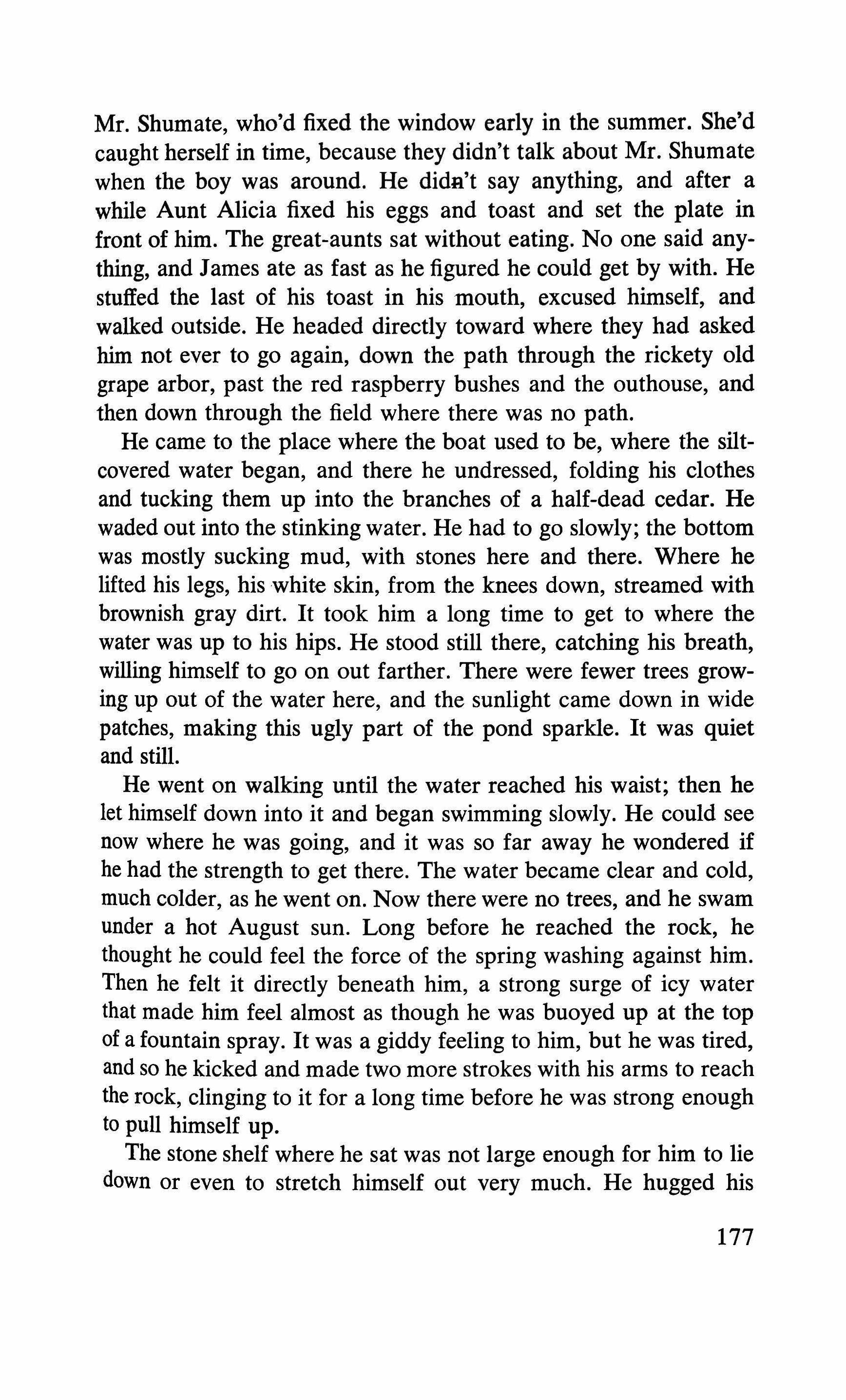
Mr. Shumate, who'd fixed the window early in the summer. She'd caught herself in time, because they didn't talk about Mr. Shumate when the boy was around. He dida't say anything, and after a while Aunt Alicia fixed his eggs and toast and set the plate in front of him. The great-aunts sat without eating. No one said anything, and James ate as fast as he figured he could get by with. He stuffed the last of his toast in his mouth, excused himself, and walked outside. He headed directly toward where they had asked him not ever to go again, down the path through the rickety old grape arbor, past the red raspberry bushes and the outhouse, and then down through the field where there was no path.
He came to the place where the boat used to be, where the siltcovered water began, and there he undressed, folding his clothes and tucking them up into the branches of a half-dead cedar. He waded out into the stinking water. He had to go slowly; the bottom was mostly sucking mud, with stones here and there. Where he lifted his legs, his white skin, from the knees down, streamed with brownish gray dirt. It took him a long time to get to where the water was up to his hips. He stood still there, catching his breath, willing himself to go on out farther. There were fewer trees growing up out of the water here, and the sunlight came down in wide patches, making this ugly part of the pond sparkle. It was quiet and still.
He went on walking until the water reached his waist; then he let himself down into it and began swimming slowly. He could see now where he was going, and it was so far away he wondered if he had the strength to get there. The water became clear and cold, much colder, as he went on. Now there were no trees, and he swam under a hot August sun. Long before he reached the rock, he thought he could feel the force of the spring washing against him. Then he felt it directly beneath him, a strong surge of icy water that made him feel almost as though he was buoyed up at the top of a fountain spray. It was a giddy feeling to him, but he was tired, and so he kicked and made two more strokes with his arms to reach the rock, clinging to it for a long time before he was strong enough to pull himself up.
The stone shelf where he sat was not large enough for him to lie down or even to stretch himself out very much. He hugged his
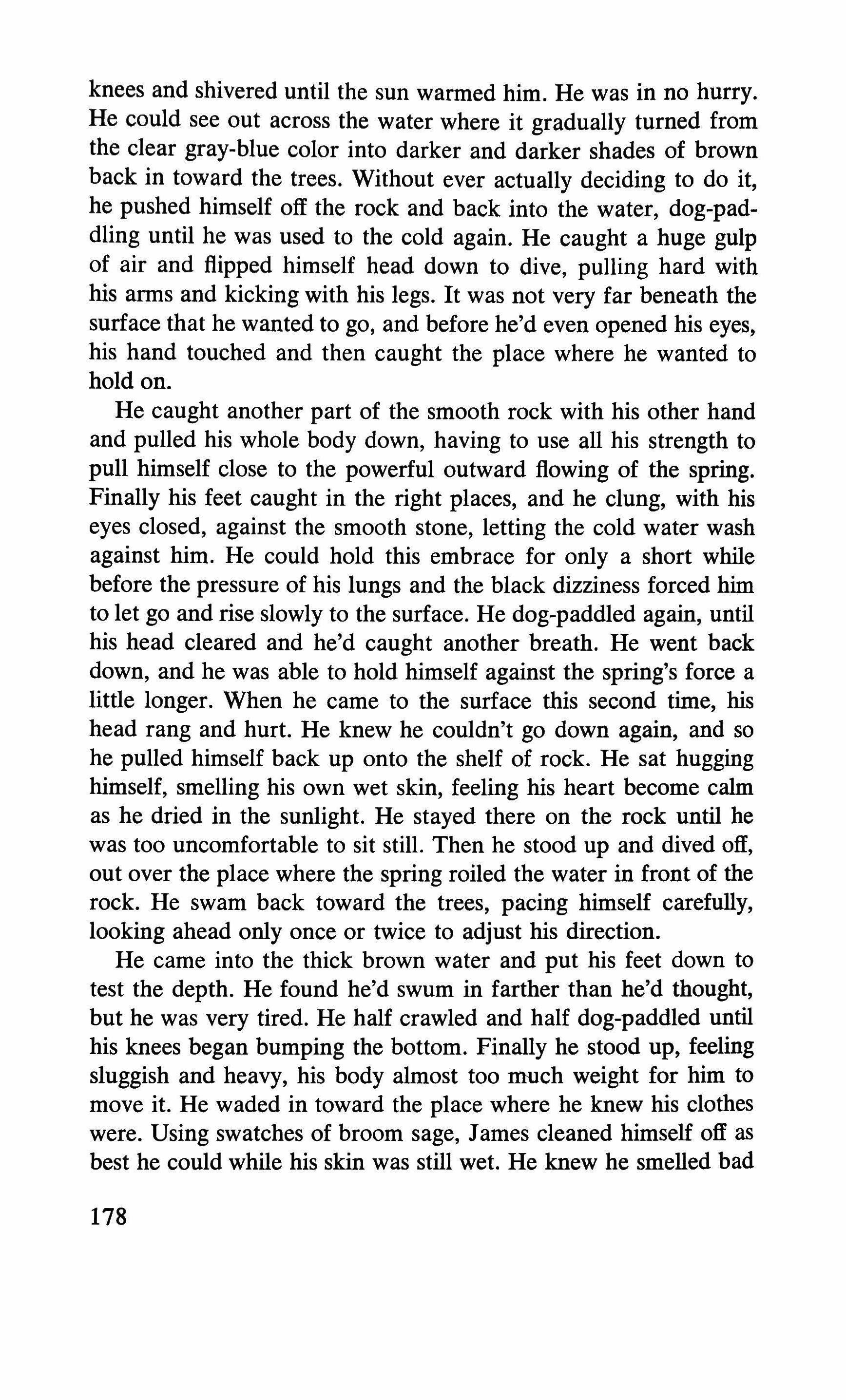
knees and shivered until the sun warmed him. He was in no hurry. He could see out across the water where it gradually turned from the clear gray-blue color into darker and darker shades of brown back in toward the trees. Without ever actually deciding to do it, he pushed himself off the rock and back into the water, dog-paddling until he was used to the cold again. He caught a huge gulp of air and flipped himself head down to dive, pulling hard with his arms and kicking with his legs. It was not very far beneath the surface that he wanted to go, and before he'd even opened his eyes, his hand touched and then caught the place where he wanted to hold on.
He caught another part of the smooth rock with his other hand and pulled his whole body down, having to use all his strength to pull himself close to the powerful outward flowing of the spring. Finally his feet caught in the right places, and he clung, with his eyes closed, against the smooth stone, letting the cold water wash against him. He could hold this embrace for only a short while before the pressure of his lungs and the black dizziness forced him to let go and rise slowly to the surface. He dog-paddled again, until his head cleared and he'd caught another breath. He went back down, and he was able to hold himself against the spring's force a little longer. When he came to the surface this second time, his head rang and hurt. He knew he couldn't go down again, and so he pulled himself back up onto the shelf of rock. He sat hugging himself, smelling his own wet skin, feeling his heart become calm as he dried in the sunlight. He stayed there on the rock until he was too uncomfortable to sit still. Then he stood up and dived off, out over the place where the spring roiled the water in front of the rock. He swam back toward the trees, pacing himself carefully, looking ahead only once or twice to adjust his direction. He came into the thick brown water and put his feet down to test the depth. He found he'd swum in farther than he'd thought, but he was very tired. He half crawled and half dog-paddled until his knees began bumping the bottom. Finally he stood up, feeling sluggish and heavy, his body almost too much weight for him to move it. He waded in toward the place where he knew his clothes were. Using swatches of broom sage, James cleaned himself off as best he could while his skin was still wet. He knew he smelled bad
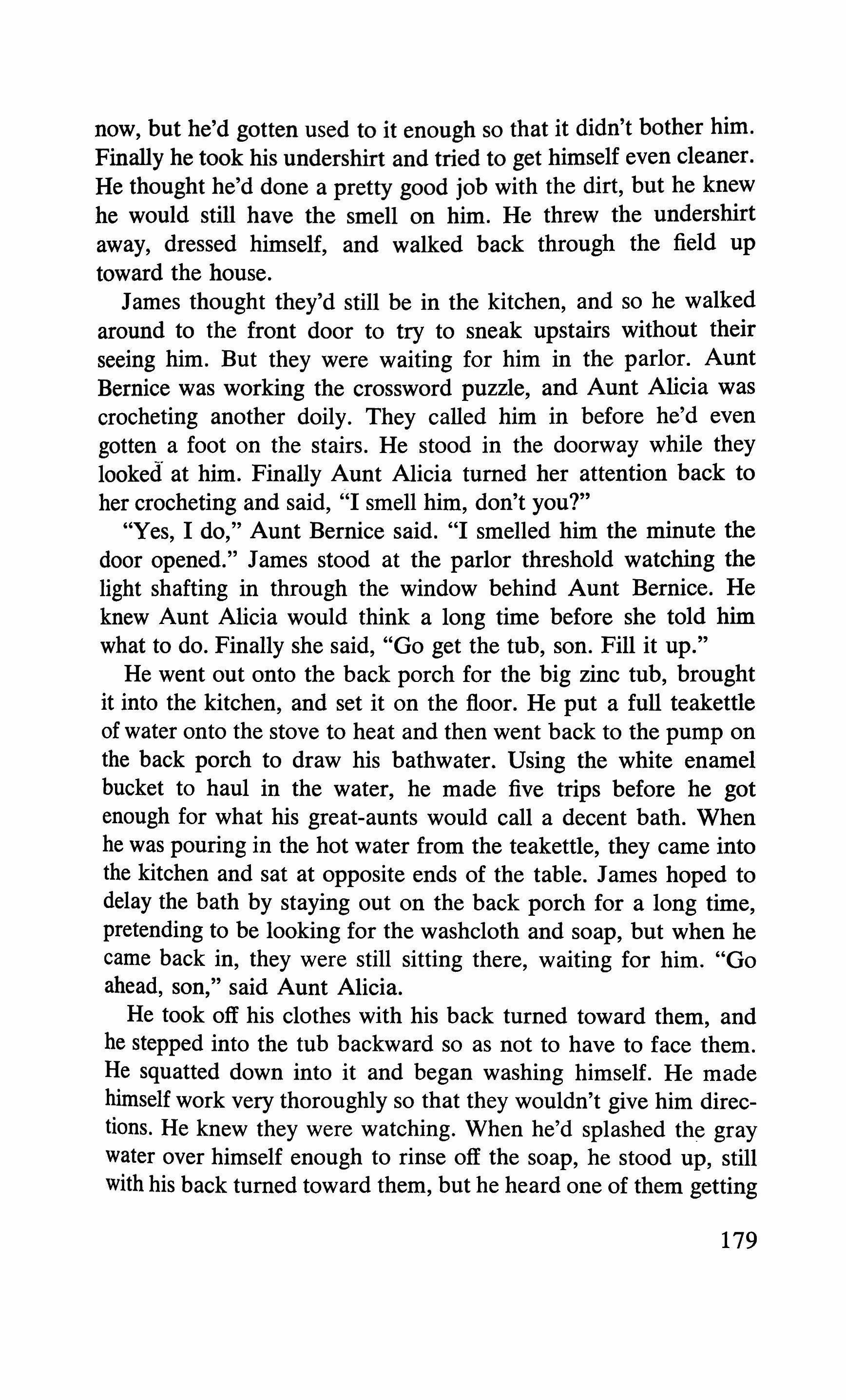
now, but he'd gotten used to it enough so that it didn't bother him. Finally he took his undershirt and tried to get himself even cleaner. He thought he'd done a pretty good job with the dirt, but he knew he would still have the smell on him. He threw the undershirt away, dressed himself, and walked back through the field up toward the house.
James thought they'd still be in the kitchen, and so he walked around to the front door to try to sneak upstairs without their seeing him. But they were waiting for him in the parlor. Aunt Bernice was working the crossword puzzle, and Aunt Alicia was crocheting another doily. They called him in before he'd even gotten a foot on the stairs. He stood in the doorway while they looked at him. Finally Aunt Alicia turned her attention back to her crocheting and said, "I smell him, don't you?"
"Yes, 1 do," Aunt Bernice said. "I smelled him the minute the door opened." James stood at the parlor threshold watching the light shafting in through the window behind Aunt Bernice. He knew Aunt Alicia would think a long time before she told him what to do. Finally she said, "Go get the tub, son. Fill it up."
He went out onto the back porch for the big zinc tub, brought it into the kitchen, and set it on the floor. He put a full teakettle of water onto the stove to heat and then went back to the pump on the back porch to draw his bathwater. Using the white enamel bucket to haul in the water, he made five trips before he got enough for what his great-aunts would call a decent bath. When he was pouring in the hot water from the teakettle, they came into the kitchen and sat at opposite ends of the table. James hoped to delay the bath by staying out on the back porch for a long time, pretending to be looking for the washcloth and soap, but when he came back in, they were still sitting there, waiting for him. "Go ahead, son," said Aunt Alicia.
He took off his clothes with his back turned toward them, and he stepped into the tub backward so as not to have to face them. He squatted down into it and began washing himself. He made himself work very thoroughly so that they wouldn't give him directions. He knew they were watching. When he'd splashed the gray water over himself enough to rinse off the soap, he stood up, still with his back turned toward them, but he heard one of them getting
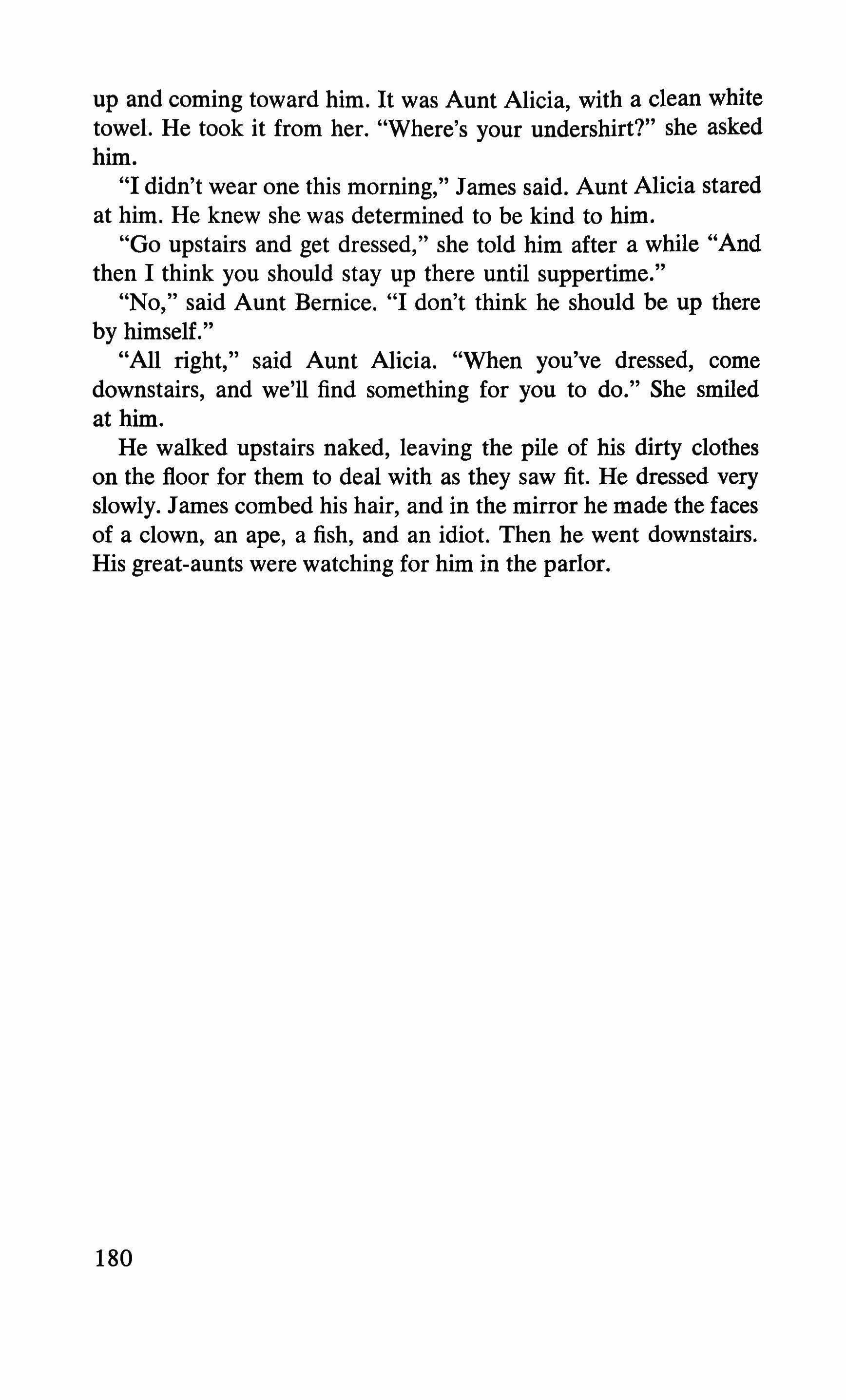
up and coming toward him. It was Aunt Alicia, with a clean white towel. He took it from her. "Where's your undershirt?" she asked him.
"I didn't wear one this morning," James said. Aunt Alicia stared at him. He knew she was determined to be kind to him.
"Go upstairs and get dressed," she told him after a while "And then I think you should stay up there until suppertime."
"No," said Aunt Bernice. "I don't think he should be up there by himself."
"All right," said Aunt Alicia. "When you've dressed, come downstairs, and we'll find something for you to do." She smiled at him.
He walked upstairs naked, leaving the pile of his dirty clothes on the floor for them to deal with as they saw fit. He dressed very slowly. James combed his hair, and in the mirror he made the faces of a clown, an ape, a fish, and an idiot. Then he went downstairs. His great-aunts were watching for him in the parlor.
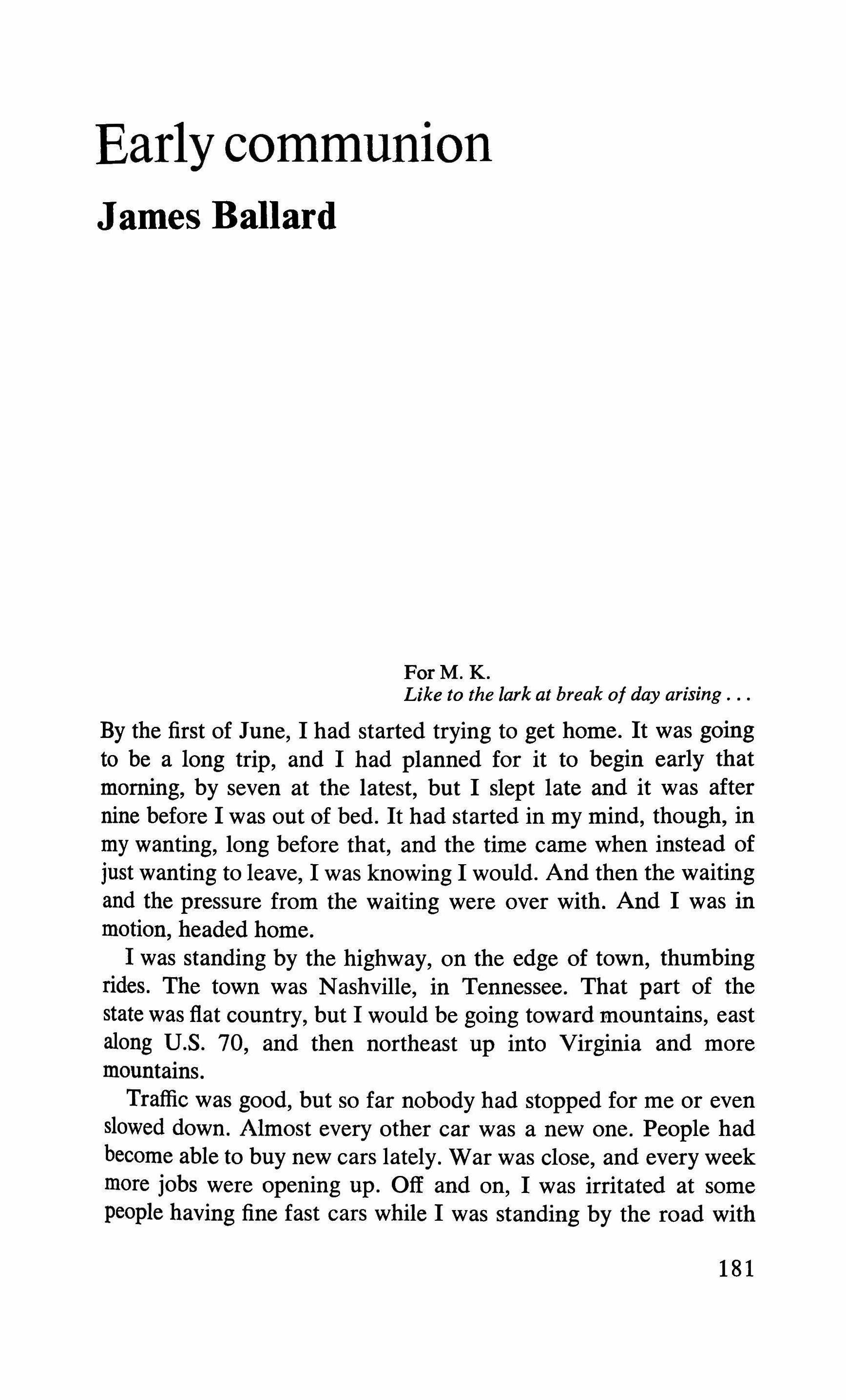
ForM. K.
Like to the lark at break 0/ day arising
By the first of June, I had started trying to get home. It was going to be a long trip, and I had planned for it to begin early that morning, by seven at the latest, but I slept late and it was after nine before I was out of bed. It had started in my mind, though, in my wanting, long before that, and the time came when instead of just wanting to leave, I was knowing I would. And then the waiting and the pressure from the waiting were over with. And I was in motion, headed home.
I was standing by the highway, on the edge of town, thumbing rides. The town was Nashville, in Tennessee. That part of the state was flat country, but I would be going toward mountains, east along U.S. 70, and then northeast up into Virginia and more mountains.
Traffic was good, but so far nobody had stopped for me or even slowed down. Almost every other car was a new one. People had become able to buy new cars lately. War was close, and every week more jobs were opening up. Off and on, I was irritated at some people having fine fast cars while I was standing by the road with
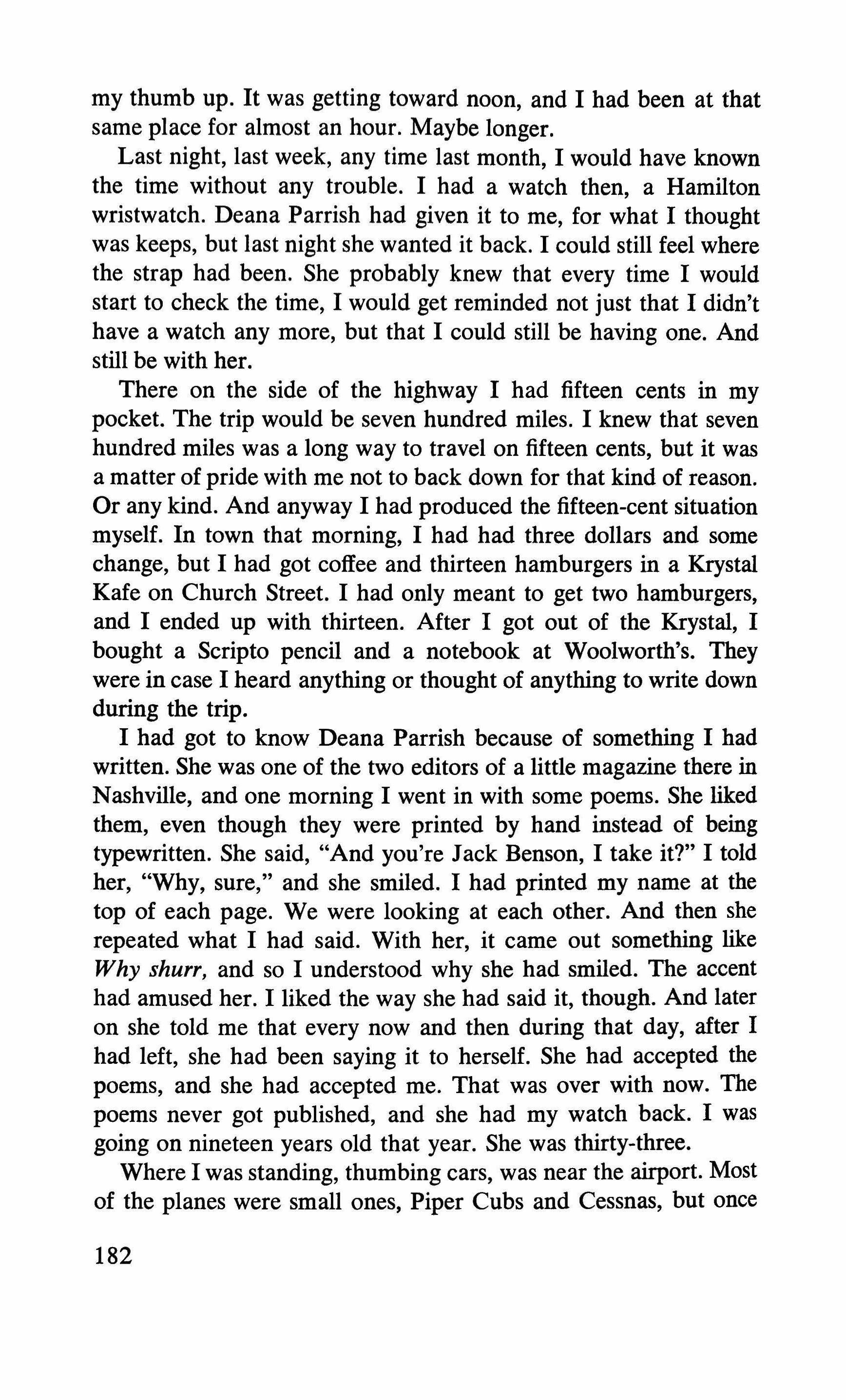
my thumb up. It was getting toward noon, and I had been at that same place for almost an hour. Maybe longer.
Last night, last week, any time last month, I would have known the time without any trouble. I had a watch then, a Hamilton wristwatch. Deana Parrish had given it to me, for what I thought was keeps, but last night she wanted it back. I could still feel where the strap had been. She probably knew that every time I would start to check the time, I would get reminded not just that I didn't have a watch any more, but that I could still be having one. And still be with her.
There on the side of the highway I had fifteen cents in my pocket. The trip would be seven hundred miles. I knew that seven hundred miles was a long way to travel on fifteen cents, but it was a matter of pride with me not to back down for that kind of reason. Or any kind. And anyway I had produced the fifteen-cent situation myself. In town that morning, I had had three dollars and some change, but I had got coffee and thirteen hamburgers in a Krystal Kafe on Church Street. I had only meant to get two hamburgers, and I ended up with thirteen. After I got out of the Krystal, I bought a Scripto pencil and a notebook at Woolworth's. They were in case I heard anything or thought of anything to write down during the trip.
I had got to know Deana Parrish because of something I had written. She was one of the two editors of a little magazine there in Nashville, and one morning I went in with some poems. She liked them, even though they were printed by hand instead of being typewritten. She said, "And you're Jack Benson, I take it?" I told her, "Why, sure," and she smiled. I had printed my name at the top of each page. We were looking at each other. And then she repeated what I had said. With her, it came out something like Why shurr, and so I understood why she had smiled. The accent had amused her. I liked the way she had said it, though. And later on she told me that every now and then during that day, after I had left, she had been saying it to herself. She had accepted the poems, and she had accepted me. That was over with now. The poems never got published, and she had my watch back. I was going on nineteen years old that year. She was thirty-three. Where I was standing, thumbing cars, was near the airport. Most of the planes were small ones, Piper Cubs and Cessnas, but once

in a while there would be a DC-3. The DC-3s were passenger planes, big ones for their time, and it was dramatic to see one lift off. I did not want an airplane myself, but I would have liked to be in control of one. I could not see why the man at the controls of one of those, even one of the Cubs, was entitled to be any luckier than I was.
Watching the planes passed the time, but what I wanted was to be moving down the road. Eventually I did get a ride. A man in a gray Plymouth stopped for me. When I asked him the time, he said twelve sharp, and he told me to be quiet. The radio in his car was going, and a news flash was on, telling about panzer divisions and dive-bombers and the blitzkrieg in France. It was 1940, and the war that had been getting ready for so long was finally going. Almost the same news flash had been coming in for several days now. That was part of the reason I wanted to get home. It was most of the reason. I thought we were going to be in the war almost any time, and I wanted to be with my family before I went.
I had another reason for making the trip. I wanted to get clear of a person and a situation I had got too much of. He was a.sort of relative, without being any blood kin or obligation kin. He worked in an office. He was plump, and he had a thin tight little mouth. For a time there in Nashville I had been a freight handler on the dock of a truck terminal. The work was loading trucks and unloading them and stacking crates in the storage area. He had said to me three or four times, "Is that the best you can do?" Once he had said, "I know very well, Jack, that somebody has to do manual labor. But after all, now." I had been staying at his house because of the way things had come to be with my real family. I had said something to him about wanting to get home. There had not been any money for a ticket, or he said there was not-the truck terminal job was over by then-and he said he would not use any for that, even if there had been any "You're not going to go anywhere, you might as well let it stop with that. You're not going to be a hardhead around me, boy. You're going to stay here, and you might as well get adjusted to it." Having what I had come to have with Deana Parrish had made it easy to stand him off, and I had been getting a kind of enjoyment out of hearing him call me boy. He had said, "May I ask you how you come to be in possession of a watch?" and I had winked at him. I might have stayed on
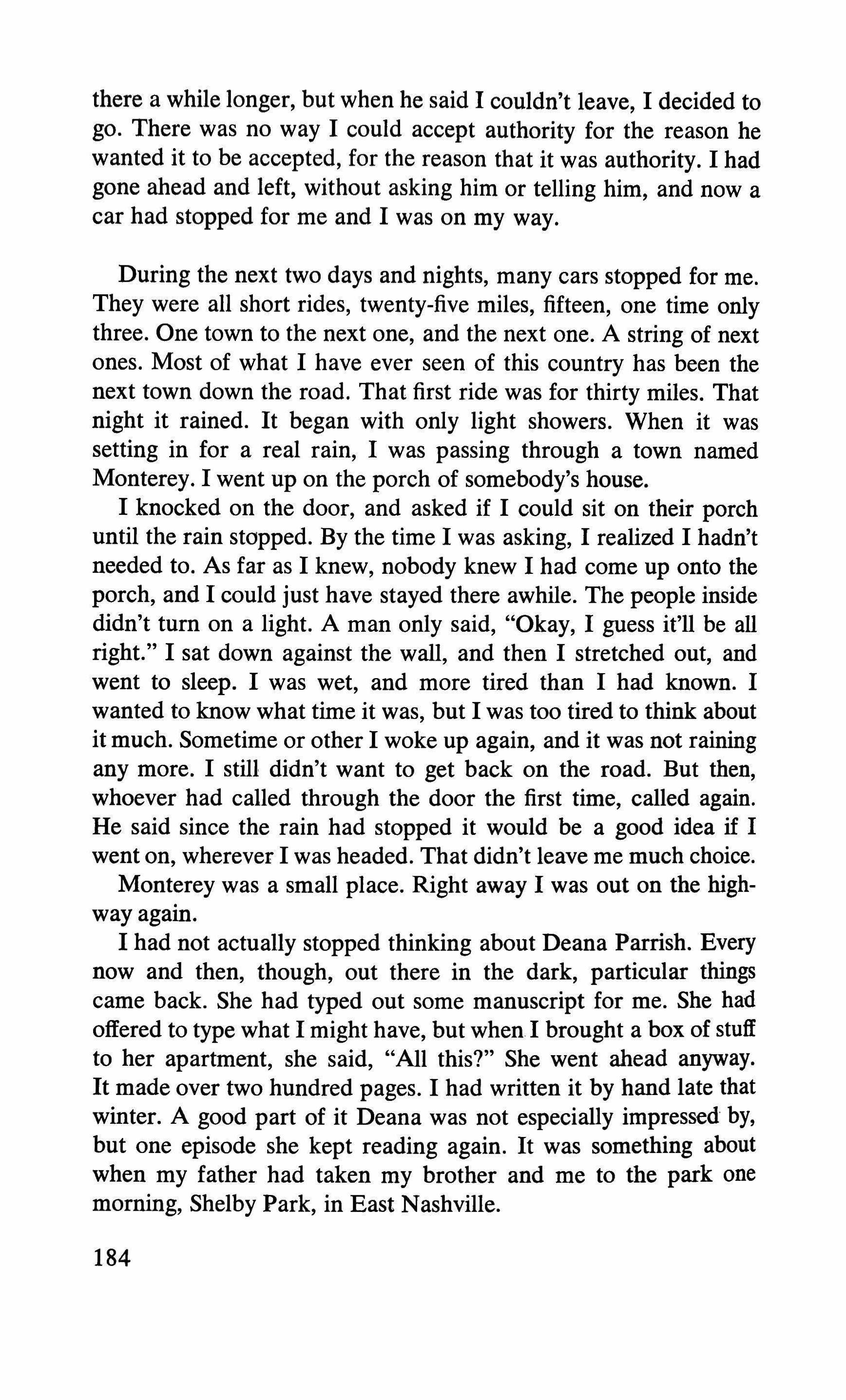
there a while longer, but when he said I couldn't leave, I decided to go. There was no way I could accept authority for the reason he wanted it to be accepted, for the reason that it was authority. I had gone ahead and left, without asking him or telling him, and now a car had stopped for me and I was on my way.
During the next two days and nights, many cars stopped for me. They were all short rides, twenty-five miles, fifteen, one time only three. One town to the next one, and the next one. A string of next ones. Most of what I have ever seen of this country has been the next town down the road. That first ride was for thirty miles. That night it rained. It began with only light showers. When it was setting in for a real rain, I was passing through a town named Monterey. I went up on the porch of somebody's house.
I knocked on the door, and asked if I could sit on their porch until the rain stopped. By the time I was asking, I realized I hadn't needed to. As far as I knew, nobody knew I had come up onto the porch, and I could just have stayed there awhile. The people inside didn't turn on a light. A man only said, "Okay, I guess it'll be all right." I sat down against the wall, and then I stretched out, and went to sleep. I was wet, and more tired than I had known. I wanted to know what time it was, but I was too tired to think about it much. Sometime or other I woke up again, and it was not raining any more. I still didn't want to get back on the road. But then, whoever had called through the door the first time, called again. He said since the rain had stopped it would be a good idea if I went on, wherever I was headed. That didn't leave me much choice.
Monterey was a small place. Right away I was out on the highway again.
I had not actually stopped thinking about Deana Parrish. Every now and then, though, out there in the dark, particular things came back. She had typed out some manuscript for me. She had offered to type what I might have, but when I brought a box of stuff to her apartment, she said, "All this?" She went ahead anyway. It made over two hundred pages. I had written it by hand late that winter. A good part of it Deana was not especially impressed by, but one episode she kept reading again. It was something about when my father had taken my brother and me to the park one morning, Shelby Park, in East Nashville.
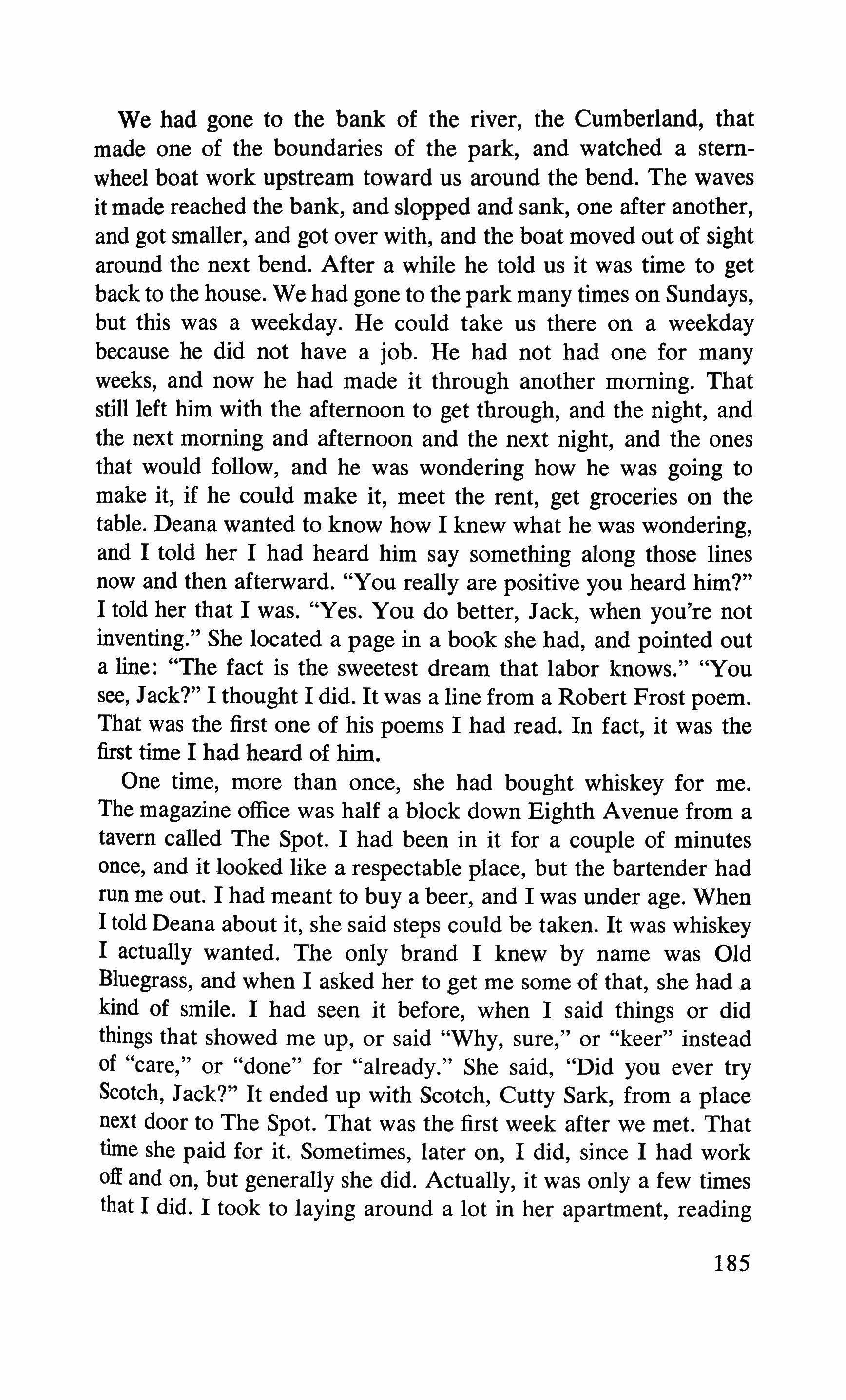
We had gone to the bank of the river, the Cumberland, that made one of the boundaries of the park, and watched a stemwheel boat work upstream toward us around the bend. The waves it made reached the bank, and slopped and sank, one after another, and got smaller, and got over with, and the boat moved out of sight around the next bend. After a while he told us it was time to get back to the house. We had gone to the park many times on Sundays, but this was a weekday. He could take us there on a weekday because he did not have a job. He had not had one for many weeks, and now he had made it through another morning. That still left him with the afternoon to get through, and the night, and the next morning and afternoon and the next night, and the ones that would follow, and he was wondering how he was going to make it, if he could make it, meet the rent, get groceries on the table. Deana wanted to know how I knew what he was wondering, and I told her I had heard him say something along those lines now and then afterward. "You really are positive you heard him?" I told her that I was. "Yes. You do better, Jack, when you're not inventing." She located a page in a book she had, and pointed out a line: "The fact is the sweetest dream that labor knows." "You see, Jack?" I thought I did. It was a line from a Robert Frost poem. That was the first one of his poems I had read. In fact, it was the first time I had heard of him.
One time, more than once, she had bought whiskey for me. The magazine office was half a block down Eighth Avenue from a tavern called The Spot. I had been in it for a couple of minutes once, and it looked like a respectable place, but the bartender had run me out. I had meant to buy a beer, and I was under age. When I told Deana about it, she said steps could be taken. It was whiskey I actually wanted. The only brand I knew by name was Old Bluegrass, and when I asked her to get me some of that, she had .a kind of smile. I had seen it before, when I said things or did things that showed me up, or said "Why, sure," or "keer" instead of "care," or "done" for "already." She said, "Did you ever try Scotch, Jack?" It ended up with Scotch, Cutty Sark, from a place next door to The Spot. That was the first week after we met. That time she paid for it. Sometimes, later on, I did, since I had work off and on, but generally she did. Actually, it was only a few times that I did. I took to laying around a lot in her apartment, reading
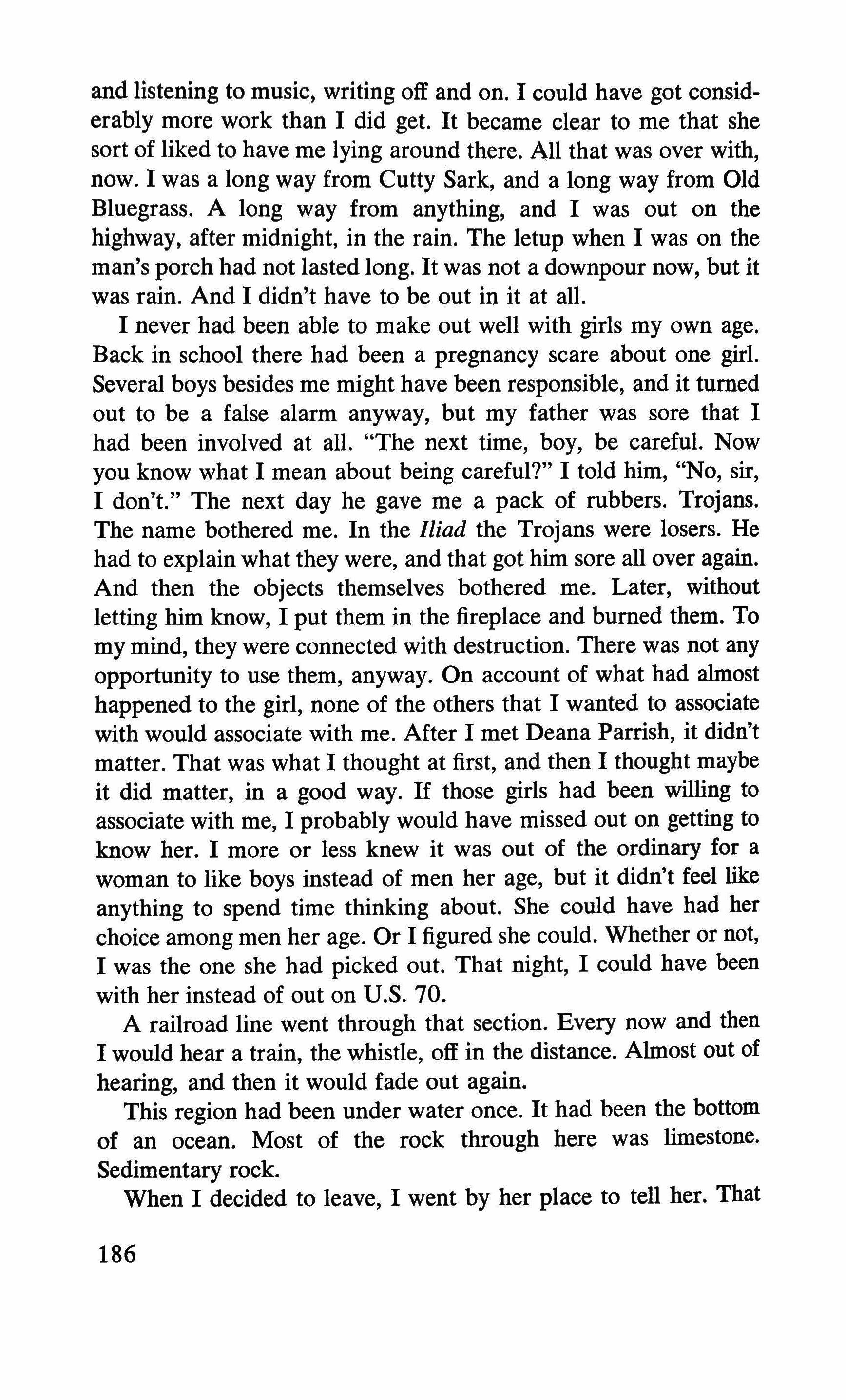
and listening to music, writing off and on. I could have got considerably more work than I did get. It became clear to me that she sort of liked to have me lying around there. All that was over with, now. I was a long way from Cutty Sark, and a long way from Old Bluegrass. A long way from anything, and I was out on the highway, after midnight, in the rain. The letup when I was on the man's porch had not lasted long. It was not a downpour now, but it was rain. And I didn't have to be out in it at all.
I never had been able to make out well with girls my own age. Back in school there had been a pregnancy scare about one girl. Several boys besides me might have been responsible, and it turned out to be a false alarm anyway, but my father was sore that I had been involved at all. "The next time, boy, be careful. Now you know what I mean about being careful?" I told him, "No, sir, I don't." The next day he gave me a pack of rubbers. Trojans. The name bothered me. In the Iliad the Trojans were losers. He had to explain what they were, and that got him sore all over again. And then the objects themselves bothered me. Later, without letting him know, I put them in the fireplace and burned them. To my mind, they were connected with destruction. There was not any opportunity to use them, anyway. On account of what had almost happened to the girl, none of the others that I wanted to associate with would associate with me. After I met Deana Parrish, it didn't matter. That was what I thought at first, and then I thought maybe it did matter, in a good way. If those girls had been willing to associate with me, I probably would have missed out on getting to know her. I more or less knew it was out of the ordinary for a woman to like boys instead of men her age, but it didn't feel like anything to spend time thinking about. She could have had her choice among men her age. Or I figured she could. Whether or not, I was the one she had picked out. That night, I could have been with her instead of out on U.S. 70.
A railroad line went through that section. Every now and then I would hear a train, the whistle, off in the distance. Almost out of hearing, and then it would fade out again.
This region had been under water once. It had been the bottom of an ocean. Most of the rock through here was limestone. Sedimentary rock.
When I decided to leave, I went by her place to tell her. That
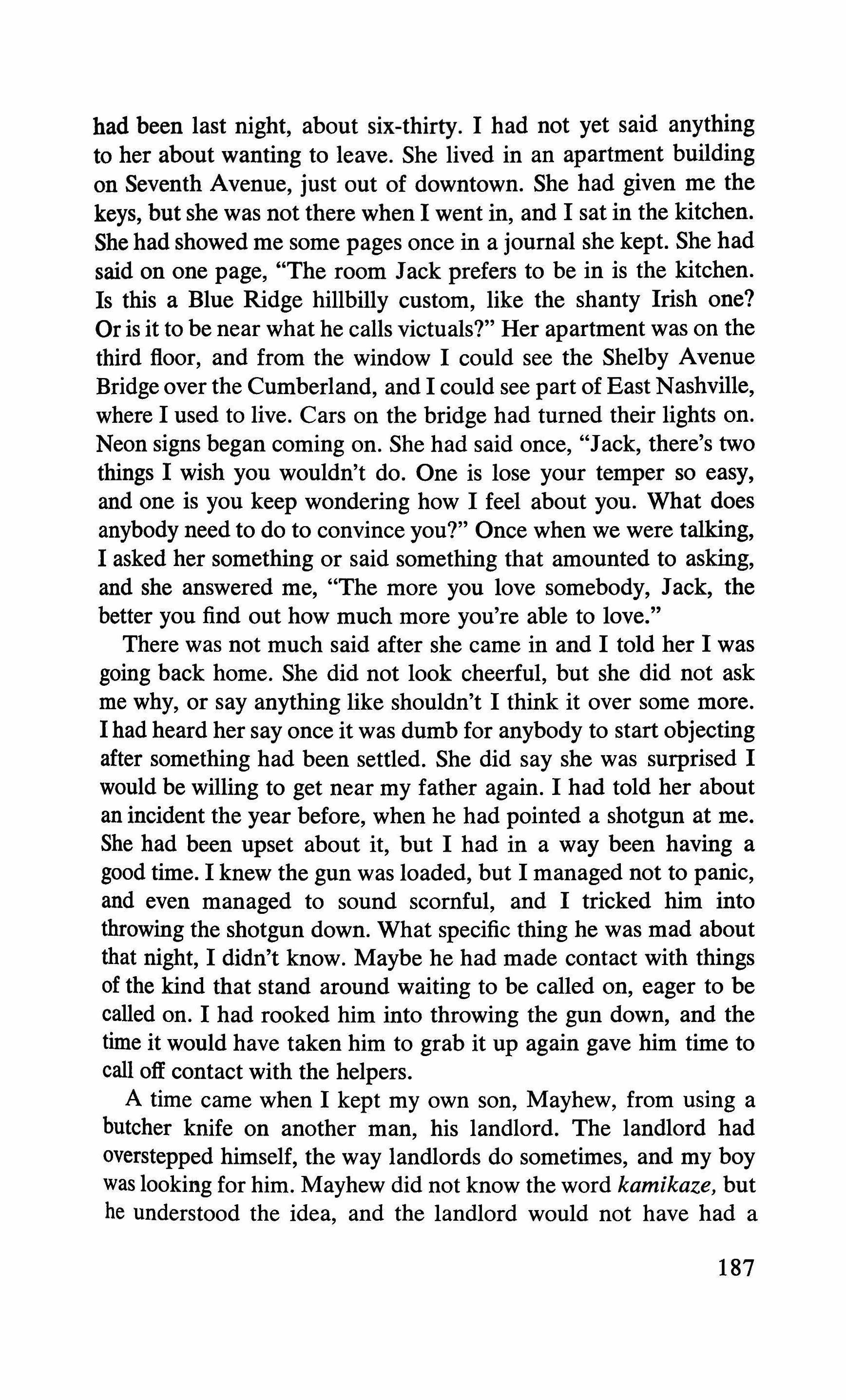
had been last night, about six-thirty. I had not yet said anything to her about wanting to leave. She lived in an apartment building on Seventh Avenue, just out of downtown. She had given me the keys, but she was not there when I went in, and I sat in the kitchen. She had showed me some pages once in a journal she kept. She had said on one page, "The room Jack prefers to be in is the kitchen. Is this a Blue Ridge hillbilly custom, like the shanty Irish one? Or is it to be near what he calls victuals?" Her apartment was on the third floor, and from the window I could see the Shelby Avenue Bridge over the Cumberland, and I could see part of East Nashville, where I used to live. Cars on the bridge had turned their lights on. Neon signs began coming on. She had said once, "Jack, there's two things I wish you wouldn't do. One is lose your temper so easy, and one is you keep wondering how I feel about you. What does anybody need to do to convince you?" Once when we were talking, I asked her something or said something that amounted to asking, and she answered me, "The more you love somebody, Jack, the better you find out how much more you're able to love."
There was not much said after she came in and I told her I was going back home. She did not look cheerful, but she did not ask me why, or say anything like shouldn't I think it over some more. I had heard her say once it was dumb for anybody to start objecting after something had been settled. She did say she was surprised I would be willing to get near my father again. I had told her about an incident the year before, when he had pointed a shotgun at me. She had been upset about it, but I had in a way been having a good time. I knew the gun was loaded, but I managed not to panic, and even managed to sound scornful, and I tricked him into throwing the shotgun down. What specific thing he was mad about that night, I didn't know. Maybe he had made contact with things of the kind that stand around waiting to be called on, eager to be called on. I had rooked him into throwing the gun down, and the time it would have taken him to grab it up again gave him time to call off contact with the helpers.
A time came when I kept my own son, Mayhew, from using a butcher knife on another man, his landlord. The landlord had overstepped himself, the way landlords do sometimes, and my boy was looking for him. Mayhew did not know the word kamikaze, but he understood the idea, and the landlord would not have had a
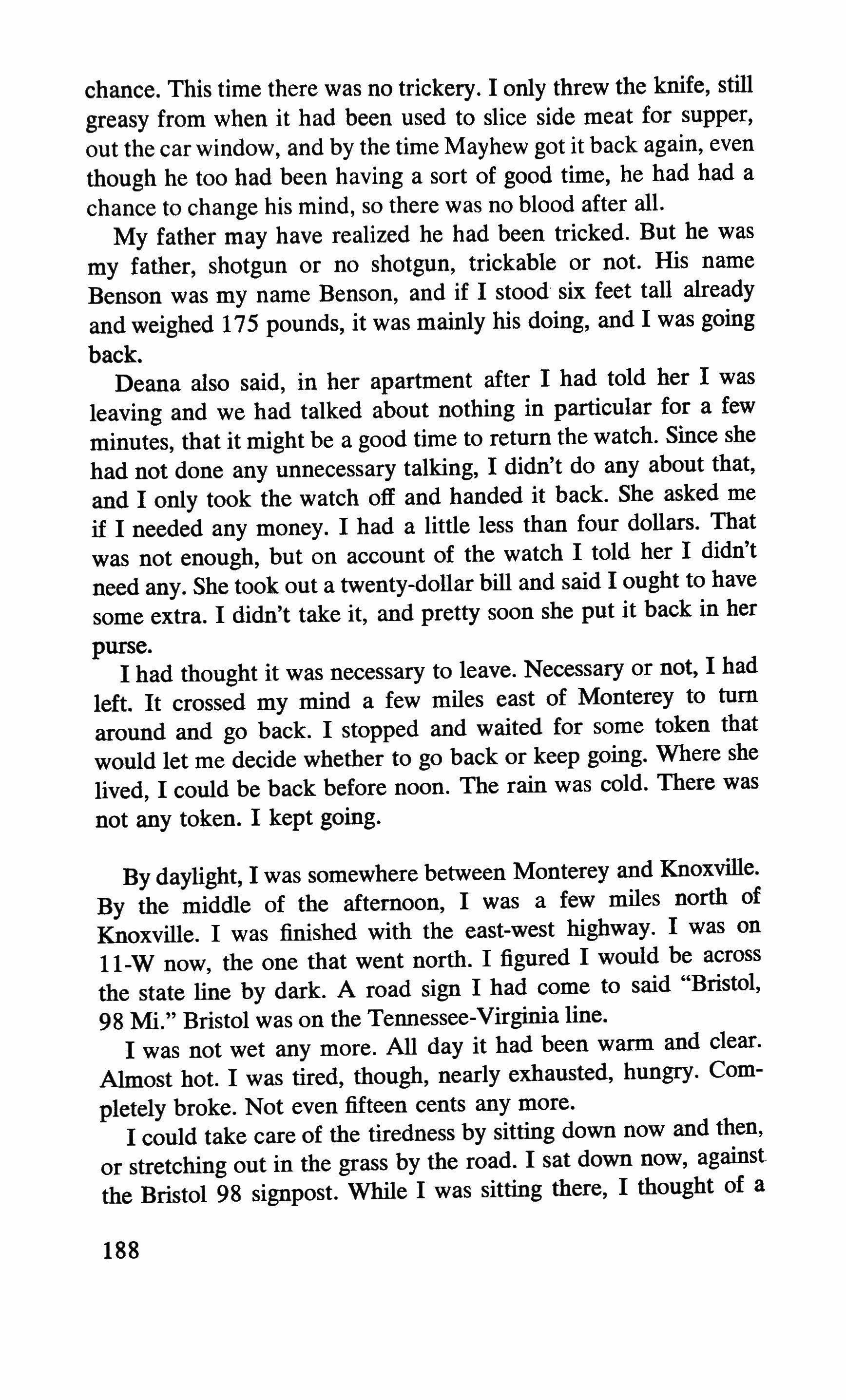
chance. This time there was no trickery. I only threw the knife, still greasy from when it had been used to slice side meat for supper, out the car window, and by the time Mayhew got it back again, even though he too had been having a sort of good time, he had had a chance to change his mind, so there was no blood after all.
My father may have realized he had been tricked. But he was my father, shotgun or no shotgun, trickable or not. His name Benson was my name Benson, and if I stood six feet tall already and weighed 175 pounds, it was mainly his doing, and I was going back.
Deana also said, in her apartment after I had told her I was leaving and we had talked about nothing in particular for a few minutes, that it might be a good time to return the watch. Since she had not done any unnecessary talking, I didn't do any about that, and I only took the watch off and handed it back. She asked me if I needed any money. I had a little less than four dollars. That was not enough, but on account of the watch I told her I didn't need any. She took out a twenty-dollar bill and said I ought to have some extra. I didn't take it, and pretty soon she put it back in her purse.
I had thought it was necessary to leave. Necessary or not, I had left. It crossed my mind a few miles east of Monterey to tum around and go back. I stopped and waited for some token that would let me decide whether to go back or keep going. Where she lived, I could be back before noon. The rain was cold. There was not any token. I kept going.
By daylight, I was somewhere between Monterey and Knoxville. By the middle of the afternoon, I was a few miles north of Knoxville. I was finished with the east-west highway. I was on l1-W now, the one that went north. I figured I would be across the state line by dark. A road sign I had come to said "Bristol, 98 Mi." Bristol was on the Tennessee-Virginia line.
I was not wet any more. All day it had been warm and clear. Almost hot. I was tired, though, nearly exhausted, hungry. Completely broke. Not even fifteen cents any more.
I could take care of the tiredness by sitting down now and then, or stretching out in the grass by the road. I sat down now, against the Bristol 98 signpost. While I was sitting there, I thought of a
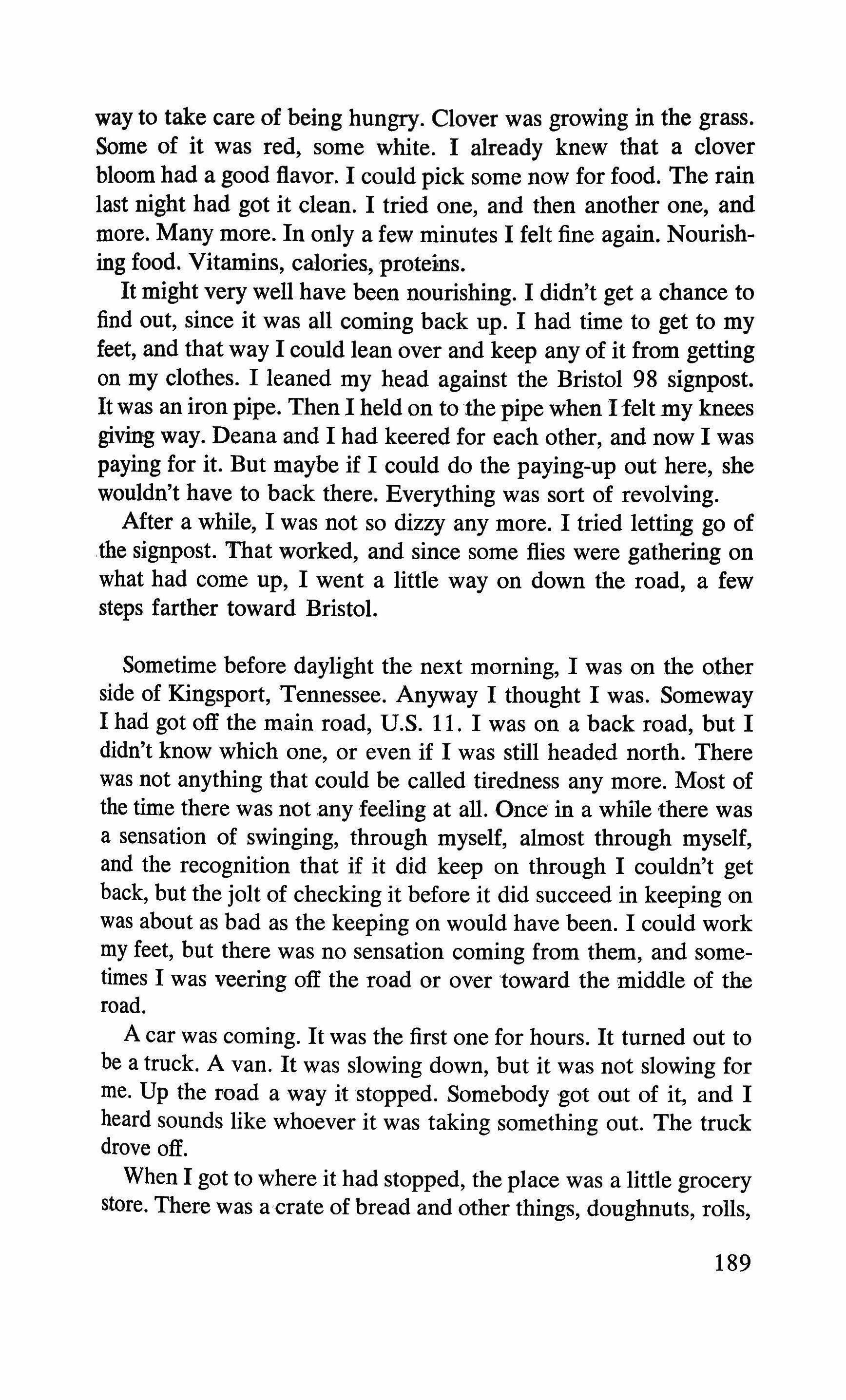
way to take care of being hungry. Clover was growing in the grass. Some of it was red, some white. I already knew that a clover bloom had a good flavor. I could pick some now for food. The rain last night had got it clean. I tried one, and then another one, and more. Many more. In only a few minutes I felt fine again. Nourishing food. Vitamins, calories, proteins. It might very well have been nourishing. I didn't get a chance to find out, since it was all coming back up. I had time to get to my feet, and that way I could lean over and keep any of it from getting on my clothes. I leaned my head against the Bristol 98 signpost. It was an iron pipe. Then I held on to the pipe when 1 felt my knees giving way. Deana and I had keered for each other, and now I was paying for it. But maybe if I could do the paying-up out here, she wouldn't have to back there. Everything was sort of revolving. After a while, I was not so dizzy any more. I tried letting go of the signpost. That worked, and since some flies were gathering on what had come up, I went a little wayan down the road, a few steps farther toward Bristol.
Sometime before daylight the next morning, I was on the other side of Kingsport, Tennessee. Anyway I thought I was. Someway I had got off the main road, U.S. 11. I was on a back road, but I didn't know which one, or even if I was still headed north. There was not anything that could be called tiredness any more. Most of the time there was not any feeling at all. Once in a while there was a sensation of swinging, through myself, almost through myself, and the recognition that if it did keep on through I couldn't get back, but the jolt of checking it before it did succeed in keeping on was about as bad as the keeping on would have been. I could work my feet, but there was no sensation coming from them, and sometimes I was veering off the road or over toward the middle of the road.
A car was coming. It was the first one for hours. It turned out to be a truck. A van. It was slowing down, but it was not slowing for me. Up the road a way it stopped. Somebody 'got out of it, and I heard sounds like whoever it was taking something out. The truck drove off.
When I got to where it had stopped, the place was a little grocery store. There was a crate of bread and other things, doughnuts, rolls,
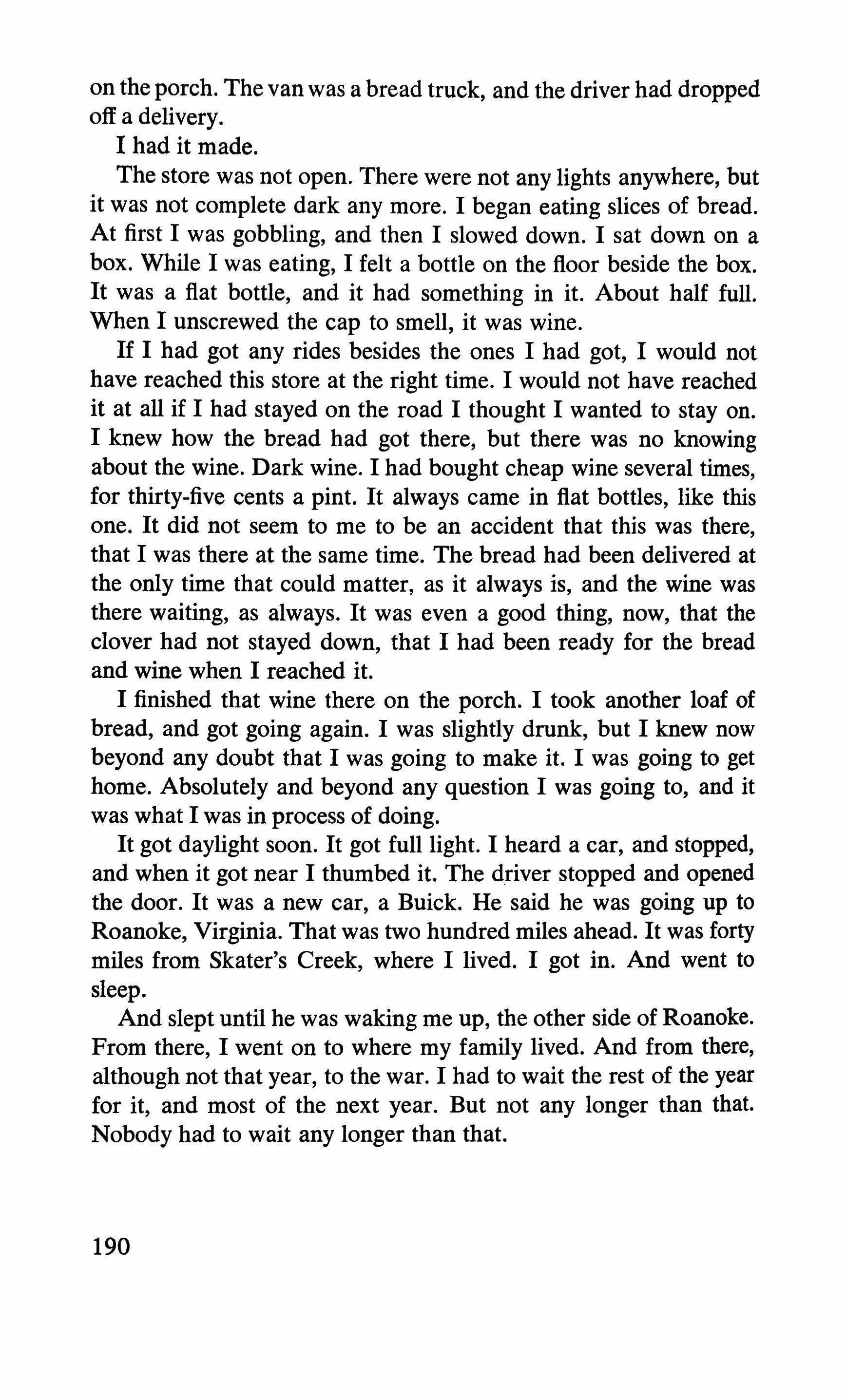
on the porch. The van was a bread truck, and the driver had dropped off a delivery. I had it made.
The store was not open. There were not any lights anywhere, but it was not complete dark any more. I began eating slices of bread. At first I was gobbling, and then I slowed down. I sat down on a box. While I was eating, I felt a bottle on the floor beside the box. It was a flat bottle, and it had something in it. About half full. When I unscrewed the cap to smell, it was wine.
If I had got any rides besides the ones I had got, I would not have reached this store at the right time. I would not have reached it at all if I had stayed on the road I thought I wanted to stay on. I knew how the bread had got there, but there was no knowing about the wine. Dark wine. I had bought cheap wine several times, for thirty-five cents a pint. It always came in flat bottles, like this one. It did not seem to me to be an accident that this was there, that I was there at the same time. The bread had been delivered at the only time that could matter, as it always is, and the wine was there waiting, as always. It was even a good thing, now, that the clover had not stayed down, that I had been ready for the bread and wine when I reached it.
I finished that wine there on the porch. I took another loaf of bread, and got going again. I was slightly drunk, but I knew now beyond any doubt that I was going to make it. I was going to get home. Absolutely and beyond any question I was going to, and it was what I was in process of doing.
It got daylight soon. It got full light. I heard a car, and stopped, and when it got near I thumbed it. The driver stopped and opened the door. It was a new car, a Buick. He said he was going up to Roanoke, Virginia. That was two hundred miles ahead. It was forty miles from Skater's Creek, where I lived. I got in. And went to sleep.
And slept until he was waking me up, the other side of Roanoke. From there, I went on to where my family lived. And from there, although not that year, to the war. I had to wait the rest of the year for it, and most of the next year. But not any longer than that. Nobody had to wait any longer than that.
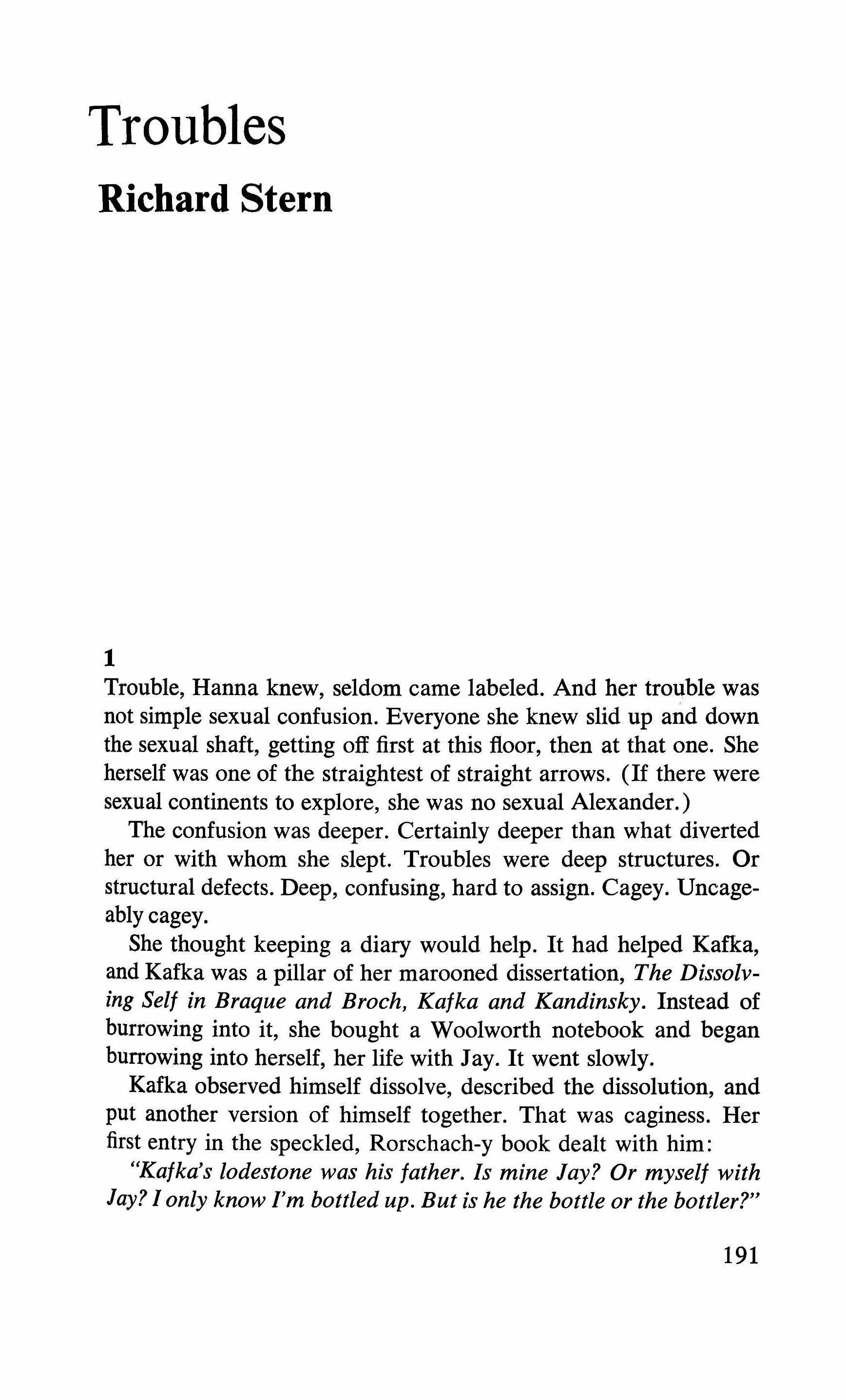
1
Trouble, Hanna knew, seldom came labeled. And her trouble was not simple sexual confusion. Everyone she knew slid up and down the sexual shaft, getting off first at this floor, then at that one. She herself was one of the straightest of straight arrows. (If there were sexual continents to explore, she was no sexual Alexander.)
The confusion was deeper. Certainly deeper than what diverted her or with whom she slept. Troubles were deep structures. Or structural defects. Deep, confusing, hard to assign. Cagey. Uncageably cagey.
She thought keeping a diary would help. It had helped Kafka, and Kafka was a pillar of her marooned dissertation, The Dissolving Self in Braque and Broch, Kafka and Kandinsky. Instead of burrowing into it, she bought a Woolworth notebook and began burrowing into herself, her life with Jay. It went slowly.
Kafka observed himself dissolve, described the dissolution, and put another version of himself together. That was caginess. Her first entry in the speckled, Rorschach-y book dealt with him: "Kafka's lodestone was his father. Is mine Jay? Or myself with Jay? I only know I'm bottled up. But is he the bottle or the bottler?"
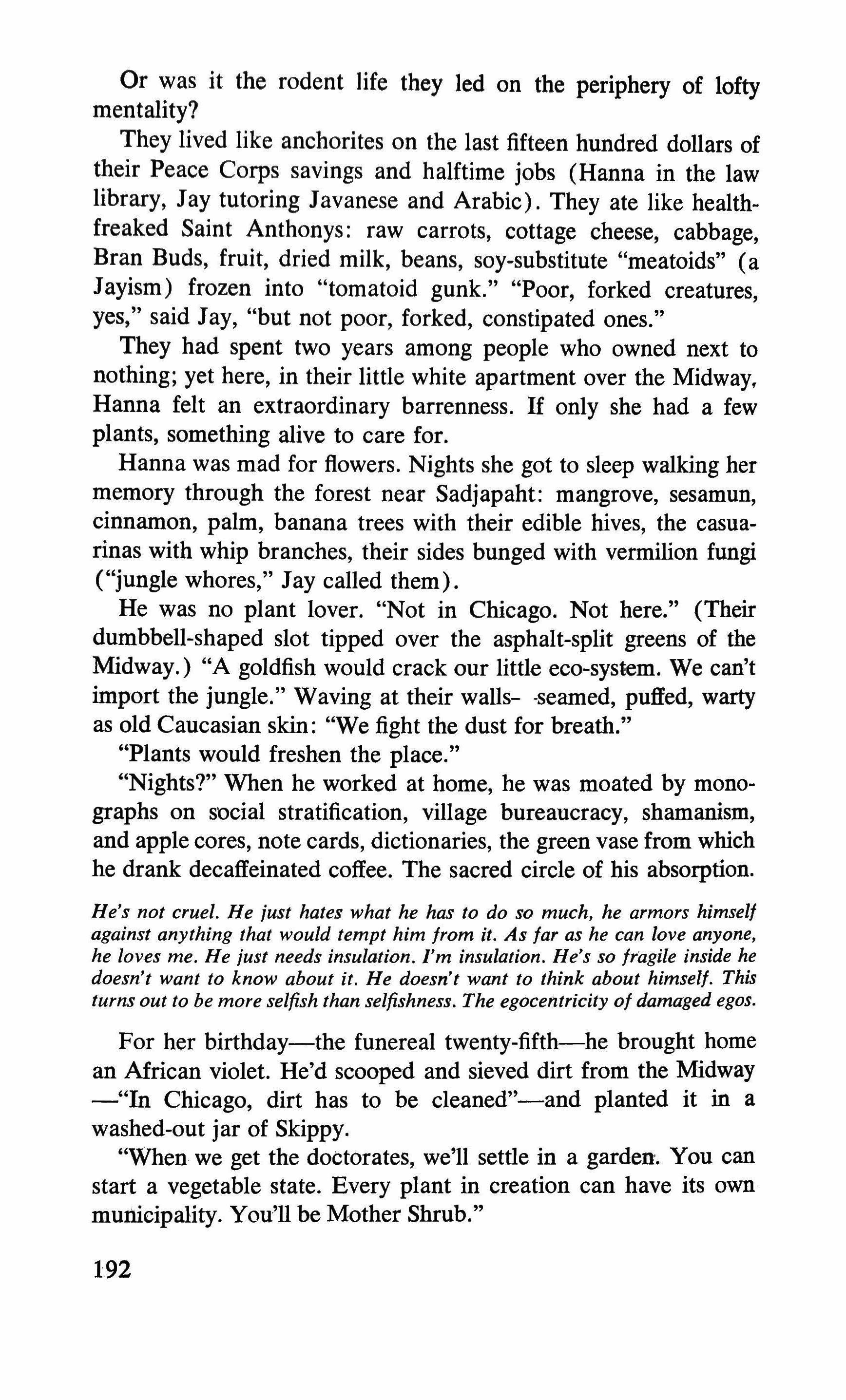
Or was it the rodent life they led on the periphery of lofty mentality?
They lived like anchorites on the last fifteen hundred dollars of their Peace Corps savings and halftime jobs (Hanna in the law library, Jay tutoring Javanese and Arabic). They ate like healthfreaked Saint Anthonys: raw carrots, cottage cheese, cabbage, Bran Buds, fruit, dried milk, beans, soy-substitute "meatoids" (a Jayism) frozen into "tomatoid gunk." "Poor, forked creatures, yes," said Jay, "but not poor, forked, constipated ones."
They had spent two years among people who owned next to nothing; yet here, in their little white apartment over the Midway. Hanna felt an extraordinary barrenness. If only she had a few plants, something alive to care for.
Hanna was mad for flowers. Nights she got to sleep walking her memory through the forest near Sadjapaht: mangrove, sesamun, cinnamon, palm, banana trees with their edible hives, the casuarinas with whip branches, their sides bunged with vermilion fungi ("jungle whores," Jay called them).
He was no plant lover. "Not in Chicago. Not here." (Their dumbbell-shaped slot tipped over the asphalt-split greens of the Midway.) "A goldfish would crack our little eco-system. We can't import the jungle." Waving at their walls- -seamed, puffed, warty as old Caucasian skin: "We fight the dust for breath."
"Plants would freshen the place."
"Nights?" When he worked at home, he was moated by monographs on social stratification, village bureaucracy, shamanism, and apple cores, note cards, dictionaries, the green vase from which he drank decaffeinated coffee. The sacred circle of his absorption.
He's not cruel. He just hates what he has to do so much, he armors himself against anything that would tempt him from it. As far as he can love anyone, he loves me. He just needs insulation. I'm insulation. He's so fragile inside he doesn't want to know about it. He doesn't want to think about himself. This turns out to be more selfish than selfishness. The egocentricity of damaged egos.
For her birthday-the funereal twenty-fifth-he brought home an African violet. He'd scooped and sieved dirt from the Midway -"In Chicago, dirt has to be cleaned"-and planted it in a washed-out jar of Skippy.
"When we get the doctorates, we'll settle in a garden. You can start a vegetable state. Every plant in creation can have its own municipality. You'll be Mother Shrub."
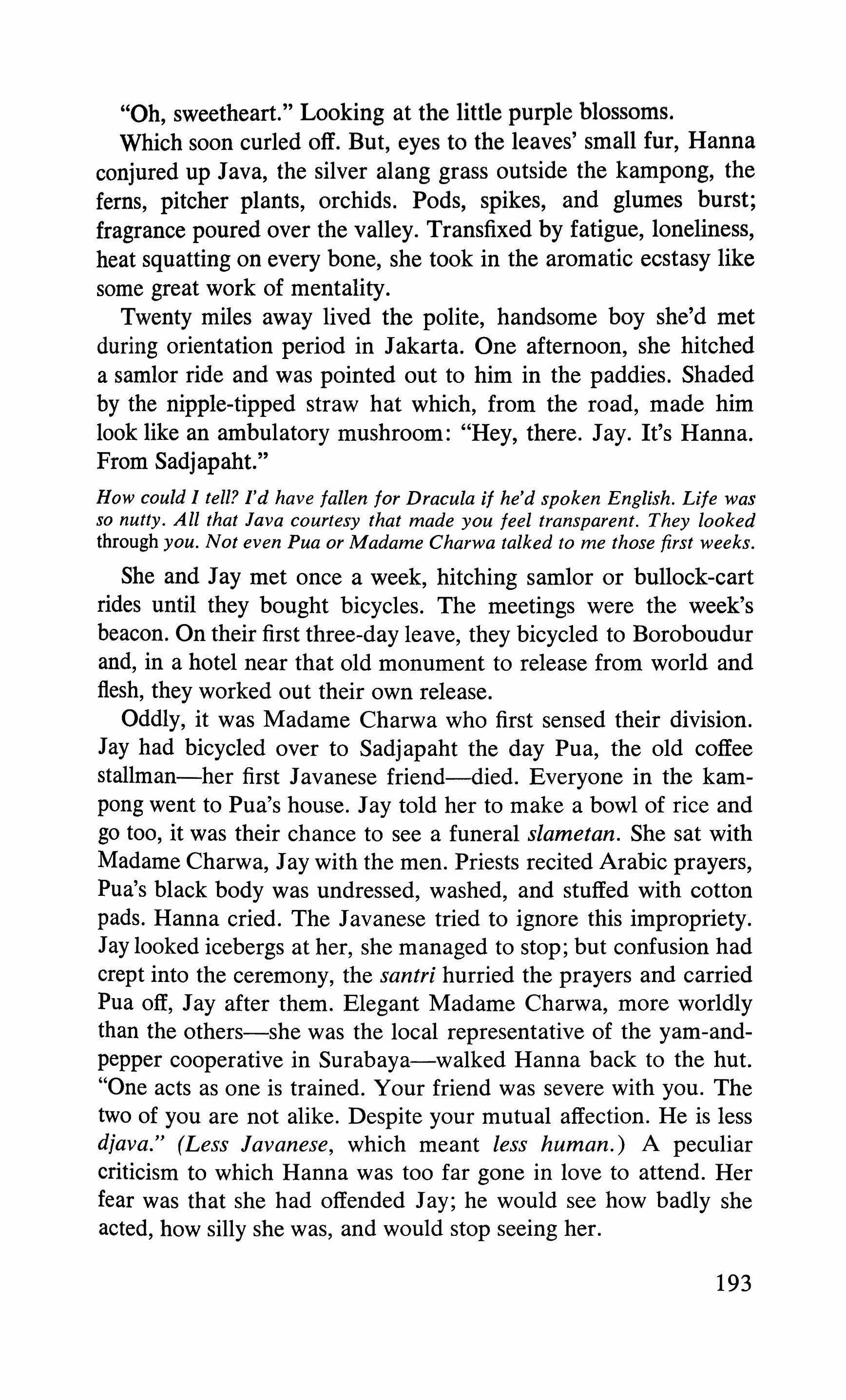
"Oh, sweetheart." Looking at the little purple blossoms. Which soon curled off. But, eyes to the leaves' small fur, Hanna conjured up Java, the silver alang grass outside the kampong, the ferns, pitcher plants, orchids. Pods, spikes, and glumes burst; fragrance poured over the valley. Transfixed by fatigue, loneliness, heat squatting on every bone, she took in the aromatic ecstasy like some great work of mentality.
Twenty miles away lived the polite, handsome boy she'd met during orientation period in Jakarta. One afternoon, she hitched a samlor ride and was pointed out to him in the paddies. Shaded by the nipple-tipped straw hat which, from the road, made him look like an ambulatory mushroom: "Hey, there. Jay. It's Hanna. From Sadjapaht."
How could I tell? I'd have fallen for Dracula if he'd spoken English. Life was so nutty. All that Java courtesy that made you feel transparent. They looked through you. Not even Pua or Madame Charwa talked to me those first weeks.
She and Jay met once a week, hitching samlor or bullock-cart rides until they bought bicycles. The meetings were the week's beacon. On their first three-day leave, they bicycled to Boroboudur and, in a hotel near that old monument to release from world and flesh, they worked out their own release.
Oddly, it was Madame Charwa who first sensed their division. Jay had bicycled over to Sadjapaht the day Pua, the old coffee stallman-her first Javanese friend-died. Everyone in the kampong went to Pua's house. Jay told her to make a bowl of rice and go too, it was their chance to see a funeral slametan. She sat with Madame Charwa, Jay with the men. Priests recited Arabic prayers, Pua's black body was undressed, washed, and stuffed with cotton pads. Hanna cried. The Javanese tried to ignore this impropriety. Jay looked icebergs at her, she managed to stop; but confusion had crept into the ceremony, the santri hurried the prayers and carried Pua off, Jay after them. Elegant Madame Charwa, more worldly than the others-she was the local representative of the yam-andpepper cooperative in Surabaya-walked Hanna back to the hut. "One acts as one is trained. Your friend was severe with you. The two of you are not alike. Despite your mutual affection. He is less djava:" (Less Javanese, which meant less human.) A peculiar criticism to which Hanna was too far gone in love to attend. Her fear was that she had offended Jay; he would see how badly she acted, how silly she was, and would stop seeing her.
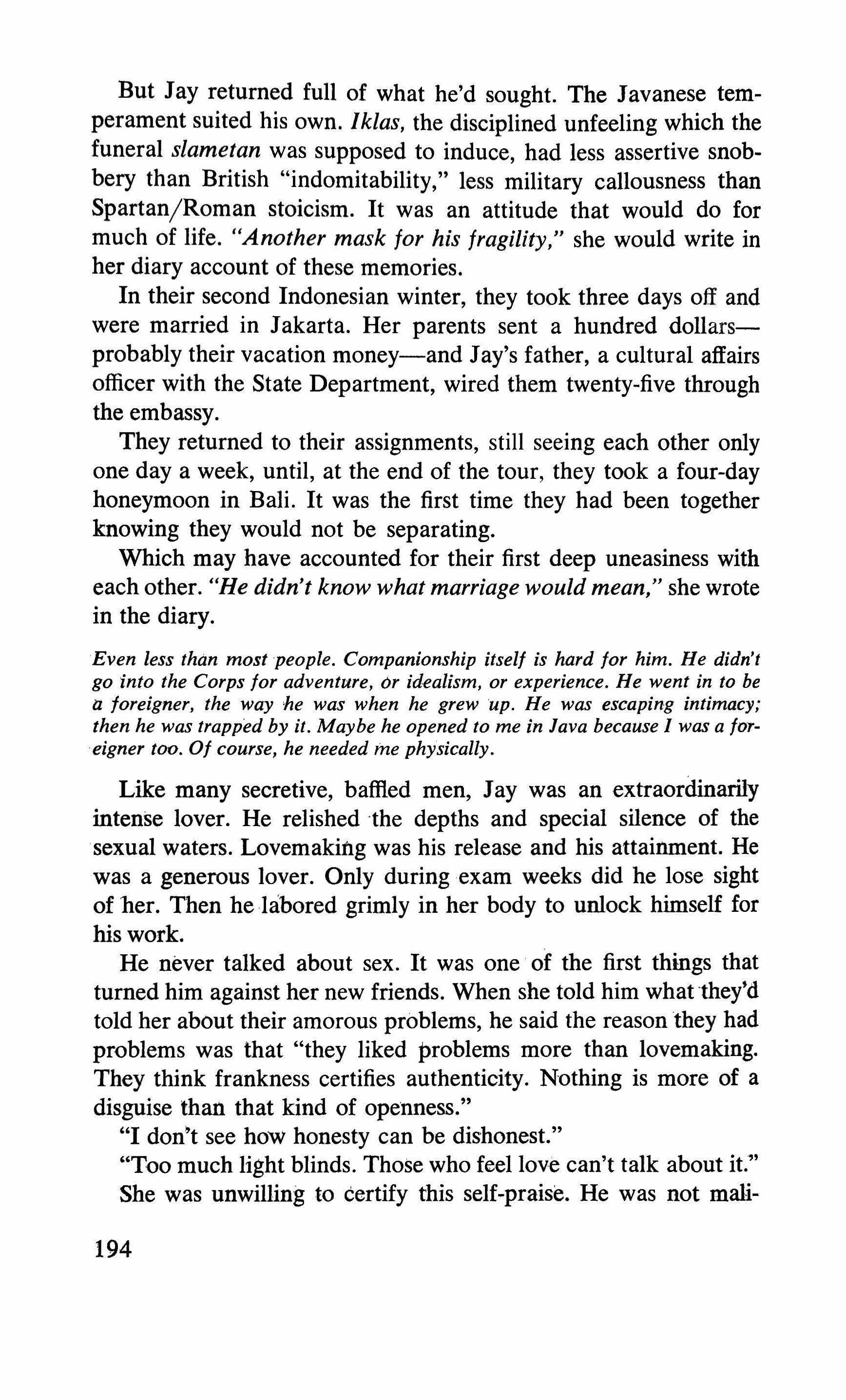
But Jay returned full of what he'd sought. The Javanese temperament suited his own. Iklas, the disciplined unfeeling which the funeral slametan was supposed to induce, had less assertive snobbery than British "indomitability," less military callousness than Spartan/Roman stoicism. It was an attitude that would do for much of life. "Another mask for his fragility," she would write in her diary account of these memories.
In their second Indonesian winter, they took three days off and were married in Jakarta. Her parents sent a hundred dollarsprobably their vacation money-and Jay's father, a cultural affairs officer with the State Department, wired them twenty-five through the embassy.
They returned to their assignments, still seeing each other only one day a week, until, at the end of the tour, they took a four-day honeymoon in Bali. It was the first time they had been together knowing they would not be separating.
Which may have accounted for their first deep uneasiness with each other. "He didn't know what marriage would mean," she wrote in the diary.
Even less than most people. Companionship itself is hard for him. He didn't go into the Corps for adventure, or idealism, or experience. He went in to be a foreigner, the way he was when he grew up. He was escaping intimacy; then he was trapped by it. Maybe he opened to me in Java because I was a foreigner too. Of course, he needed me physically.
Like many secretive, baffled men, Jay was an extraordinarily intense lover. He relished the depths and special silence of the sexual waters. Lovemaking was his release and his attainment. He was a generous lover. Only during exam weeks did he lose sight of her. Then he labored grimly in her body to unlock himself for his work.
He never talked about sex. It was one of the first things that turned him against her new friends. When she told him what 'they'd told her about their amorous problems, he said the reason they had problems was that "they liked problems more than lovemaking. They think frankness certifies authenticity. Nothing is more of a disguise than that kind of openness."
"I don't see how honesty can be dishonest."
"Too much light blinds. Those who feel love can't talk about it."
She was unwilling to certify this self-praise. He was not mali-
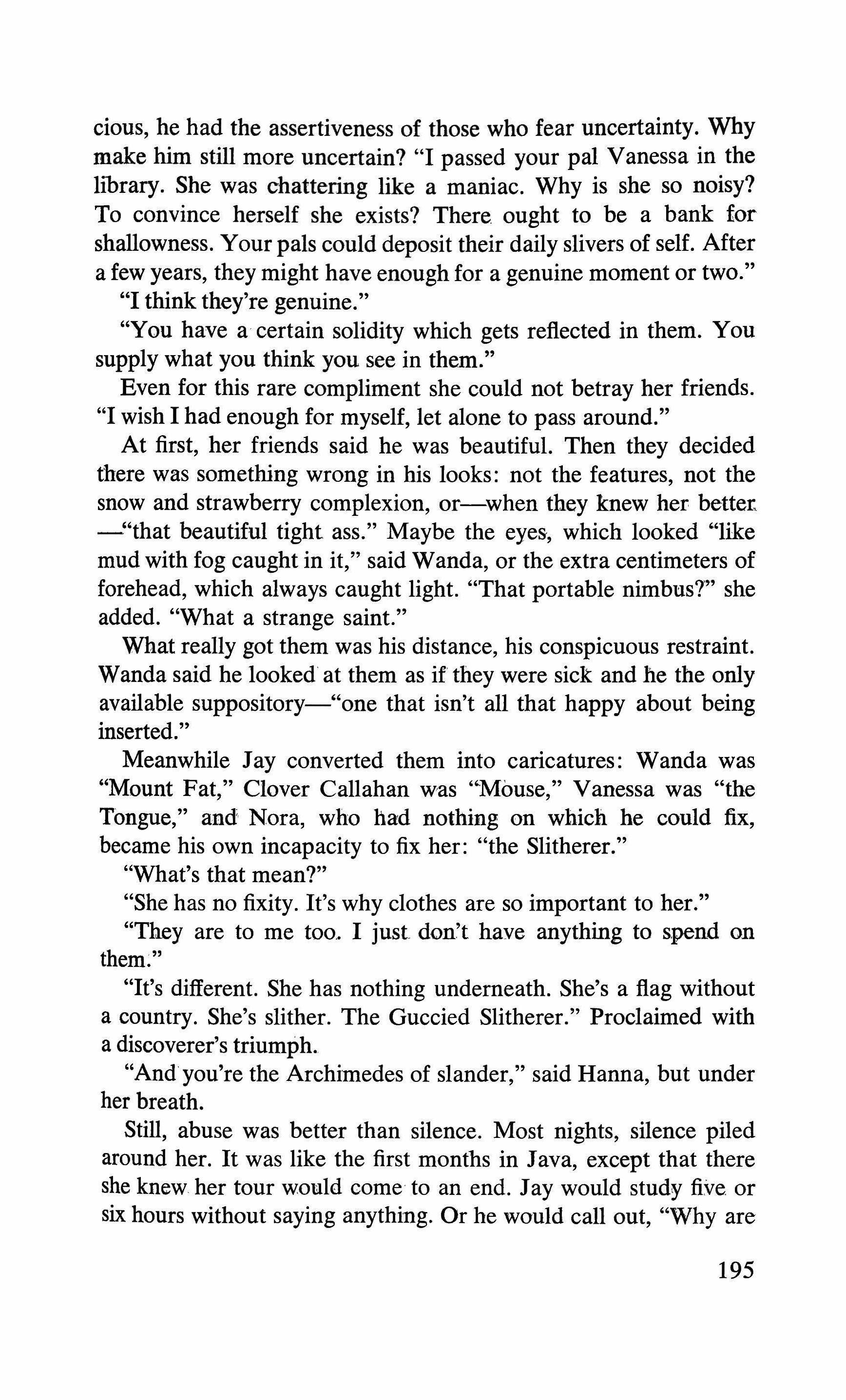
cious, he had the assertiveness of those who fear uncertainty. Why make him still more uncertain? "I passed your pal Vanessa in the library. She was chattering like a maniac. Why is she so noisy? To convince herself she exists? There ought to be a bank for shallowness. Your pals could deposit their daily slivers of self. After a few years, they might have enough for a genuine moment or two."
"I think they're genuine."
"You have a certain solidity which gets reflected in them. You supply what you think you see in them."
Even for this rare compliment she could not betray her friends. "I wish 1 had enough for myself, let alone to pass around."
At first, her friends said he was beautiful. Then they decided there was something wrong in his looks: not the features, not the snow and strawberry complexion, or-when they knew her better. -"that beautiful tight ass." Maybe the eyes, which looked "like mud with fog caught in it," said Wanda, or the extra centimeters of forehead, which always caught light. "That portable nimbus?" she added. "What a strange saint."
What really got them was his distance, his conspicuous restraint. Wanda said he looked at them as if they were sick and he the only available suppository-"one that isn't all that happy about being inserted."
Meanwhile Jay converted them into caricatures: Wanda was "Mount Fat," Clover Callahan was "Mouse," Vanessa was "the Tongue," and Nora, who had nothing on which he could fix, became his own incapacity to fix her: "the Slitherer."
"What's that mean?"
"She has no fixity. It's why clothes are so important to her."
"They are to me too. 1 just don't have anything to spend on them."
"It's different. She has nothing underneath. She's a flag without a country. She's slither. The Guccied Slitherer." Proclaimed with a discoverer's triumph.
"Andyou're the Archimedes of slander," said Hanna, but under her breath.
Still, abuse was better than silence. Most nights, silence piled around her. It was like the first months in Java, except that there she knew her tour would come to an end. Jay would study five or six hours without saying anything. Or he would call out, "Why are
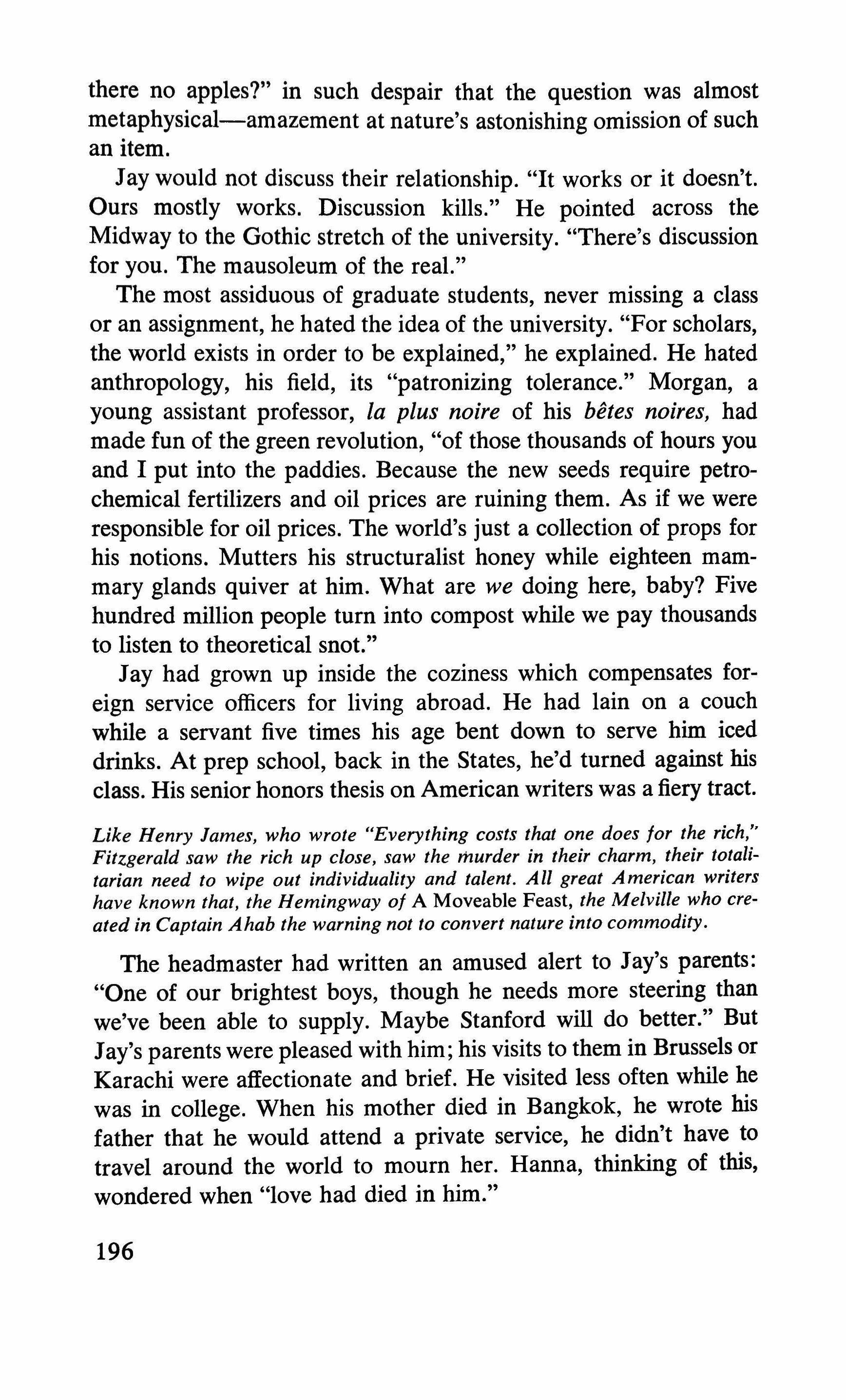
there no apples?" in such despair that the question was almost metaphysical-amazement at nature's astonishing omission of such an item.
Jay would not discuss their relationship. "It works or it doesn't. Ours mostly works. Discussion kills." He pointed across the Midway to the Gothic stretch of the university. "There's discussion for you. The mausoleum of the real."
The most assiduous of graduate students, never missing a class or an assignment, he hated the idea of the university. "For scholars, the world exists in order to be explained," he explained. He hated anthropology, his field, its "patronizing tolerance." Morgan, a young assistant professor, la plus noire of his betes noires, had made fun of the green revolution, "of those thousands of hours you and I put into the paddies. Because the new seeds require petrochemical fertilizers and oil prices are ruining them. As if we were responsible for oil prices. The world's just a collection of props for his notions. Mutters his structuralist honey while eighteen mammary glands quiver at him. What are we doing here, baby? Five hundred million people turn into compost while we pay thousands to listen to theoretical snot."
Jay had grown up inside the coziness which compensates foreign service officers for living abroad. He had lain on a couch while a servant five times his age bent down to serve him iced drinks. At prep school, back in the States, he'd turned against his class. His senior honors thesis on American writers was a fiery tract.
Like Henry James, who wrote "Everything costs that one does for the rich," Fitzgerald saw the rich up close, saw the murder in their charm, their totalitarian need to wipe out individuality and talent. All great American writers have known that, the Hemingway of A Moveable Feast, the Melville who created in Captain Ahab the warning not to convert nature into commodity.
The headmaster had written an amused alert to Jay's parents: "One of our brightest boys, though he needs more steering than we've been able to supply. Maybe Stanford will do better." But Jay's parents were pleased with him; his visits to them in Brussels or Karachi were affectionate and brief. He visited less often while he was in college. When his mother died in Bangkok, he wrote his father that he would attend a private service, he didn't have to travel around the world to mourn her. Hanna, thinking of this, wondered when "love had died in him."
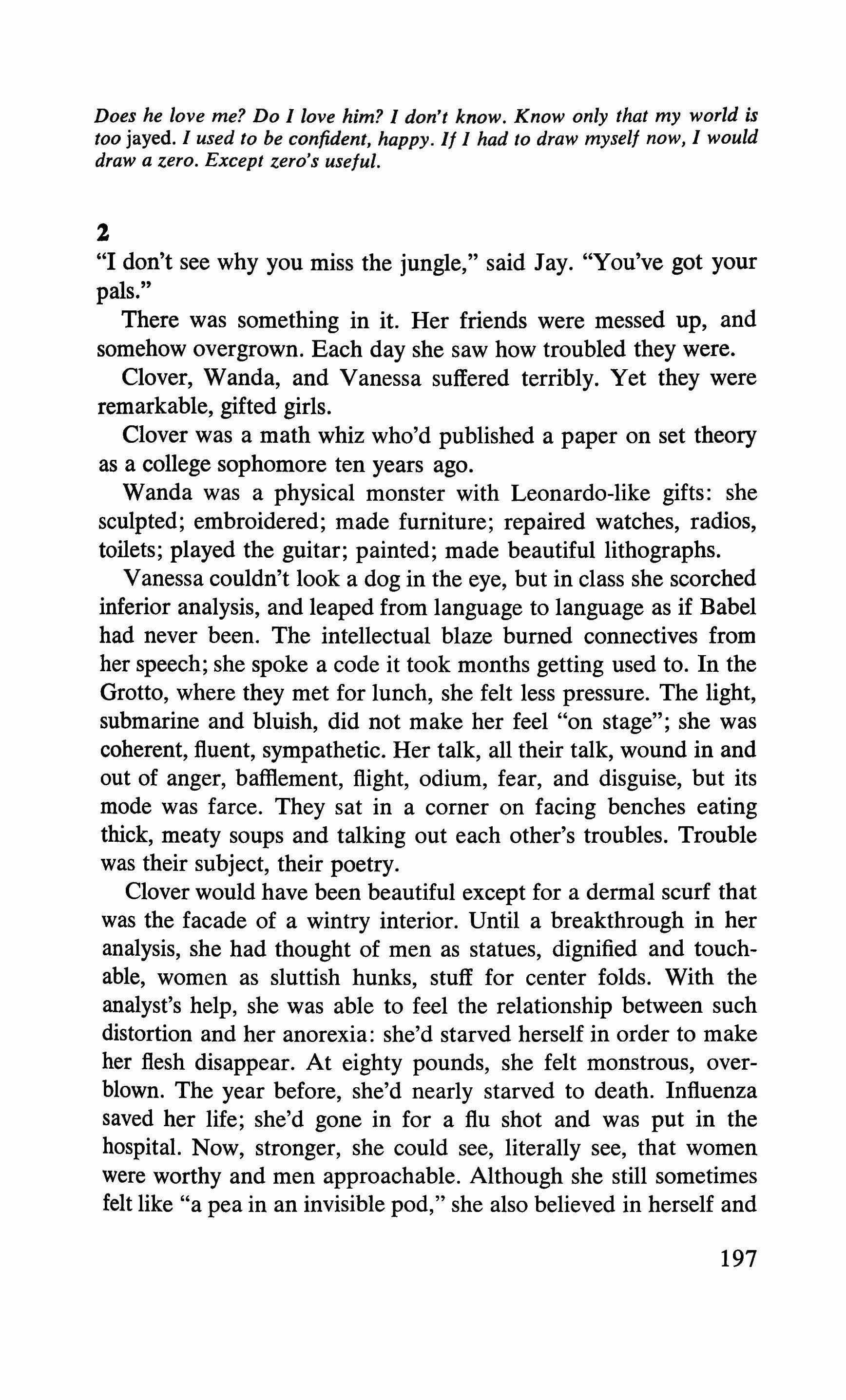
Does he love me? Do I love him? I don't know. Know only that my world is too jayed. I used to be confident, happy. If I had to draw myself now, I would draw a zero. Except zero's useful.
"I don't see why you miss the jungle," said Jay. "You've got your pals."
There was something in it. Her friends were messed up, and somehow overgrown. Each day she saw how troubled they were.
Clover, Wanda, and Vanessa suffered terribly. Yet they were remarkable, gifted girls.
Clover was a math whiz who'd published a paper on set theory as a college sophomore ten years ago.
Wanda was a physical monster with Leonardo-like gifts: she sculpted; embroidered; made furniture; repaired watches, radios, toilets; played the guitar; painted; made beautiful lithographs.
Vanessa couldn't look a dog in the eye, but in class she scorched inferior analysis, and leaped from language to language as if Babel had never been. The intellectual blaze burned connectives from her speech; she spoke a code it took months getting used to. In the Grotto, where they met for lunch, she felt less pressure. The light, submarine and bluish, did not make her feel "on stage"; she was coherent, fluent, sympathetic. Her talk, all their talk, wound in and out of anger, bafflement, flight, odium, fear, and disguise, but its mode was farce. They sat in a corner on facing benches eating thick, meaty soups and talking out each other's troubles. Trouble was their subject, their poetry.
Clover would have been beautiful except for a dermal scurf that was the facade of a wintry interior. Until a breakthrough in her analysis, she had thought of men as statues, dignified and touchable, women as sluttish hunks, stuff for center folds. With the analyst's help, she was able to feel the relationship between such distortion and her anorexia: she'd starved herself in order to make her flesh disappear. At eighty pounds, she felt monstrous, overblown. The year before, she'd nearly starved to death. Influenza saved her life; she'd gone in for a flu shot and was put in the hospital. Now, stronger, she could see, literally see, that women were worthy and men approachable. Although she still sometimes felt like "a pea in an invisible pod," she also believed in herself and 197
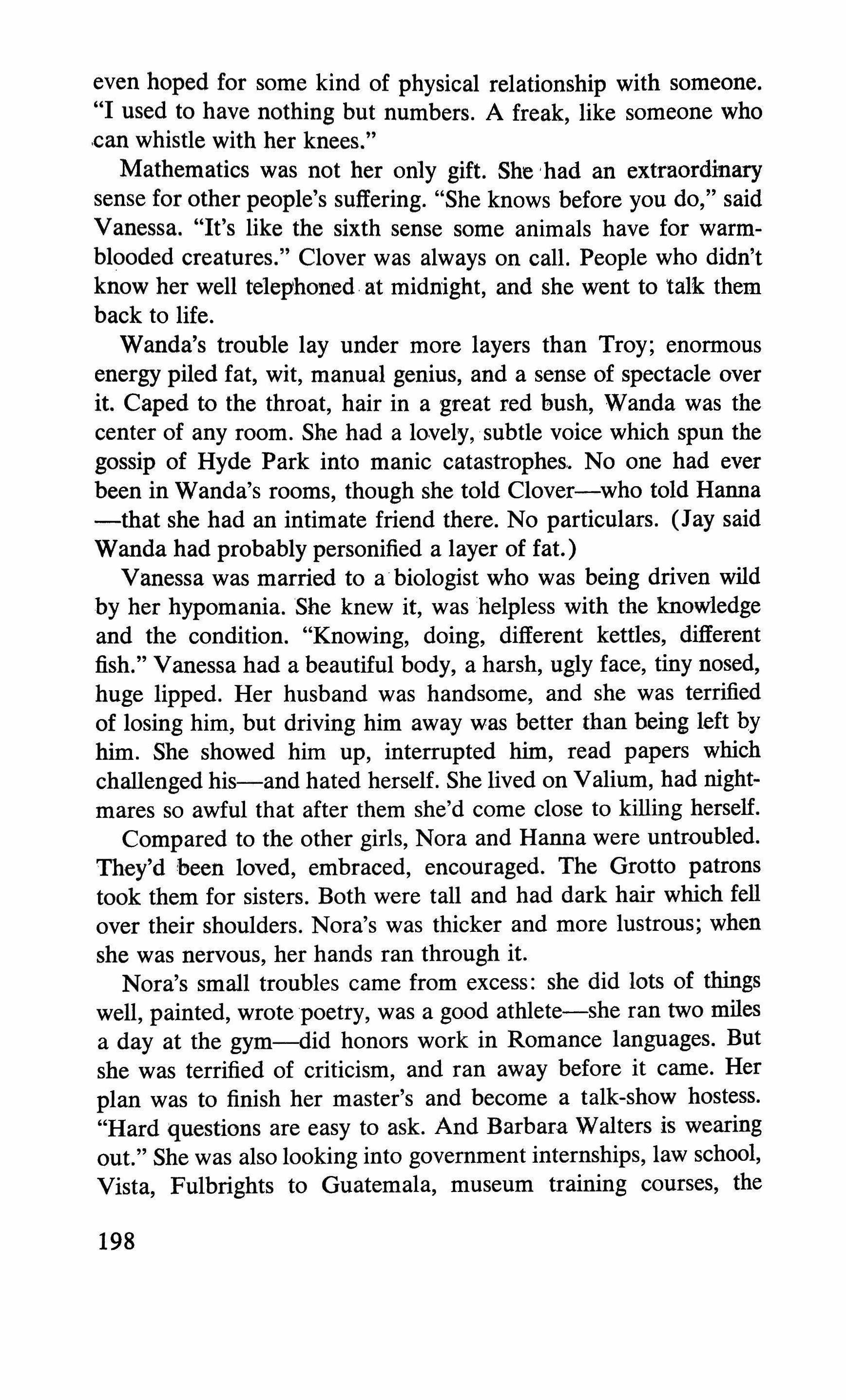
even hoped for some kind of physical relationship with someone. "I used to have nothing but numbers. A freak, like someone who can whistle with her knees."
Mathematics was not her only gift. She'had an extraordinary sense for other people's suffering. "She knows before you do," said Vanessa. "It's like the sixth sense some animals have for warmblooded creatures." Clover was always on call. People who didn't know her well telephoned. at midnight, and she went to talk them back to life.
Wanda's trouble lay under more layers than Troy; enormous energy piled fat, wit, manual genius, and a sense of spectacle over it. Caped to the throat, hair in a great red bush, Wanda was the center of any room. She had a lovely, subtle voice which spun the gossip of Hyde Park into manic catastrophes No one had ever been in Wanda's rooms, though she told Clover-who told Hanna -that she had an intimate friend there. No particulars. (Jay said Wanda had probably personified a layer of fat.)
Vanessa was married to a biologist who was being driven wild by her hypomania. She knew it, was helpless with the knowledge and the condition. "Knowing, doing, different kettles, different fish." Vanessa had a beautiful body, a harsh, ugly face, tiny nosed, huge lipped. Her husband was handsome, and she was terrified of losing him, but driving him away was better than being left by him. She showed him up, interrupted him, read papers which challenged his-and hated herself. She lived on Valium, had nightmares so awful that after them she'd come close to killing herself.
Compared to the other girls, Nora and Hanna were untroubled. They'd been loved, embraced, encouraged. The Grotto patrons took them for sisters. Both were tall and had dark hair which fell over their shoulders. Nora's was thicker and more lustrous; when she was nervous, her hands ran through it.
Nora's small troubles came from excess: she did lots of things well, painted, wrote poetry, was a good athlete-she ran two miles a day at the gym-did honors work in Romance languages. But she was terrified of criticism, and ran away before it came. Her plan was to finish her master's and become a talk-show hostess. "Hard questions are easy to ask. And Barbara Walters is wearing out." She was also looking into government internships, law school, Vista, Fulbrights to Guatemala, museum training courses, the
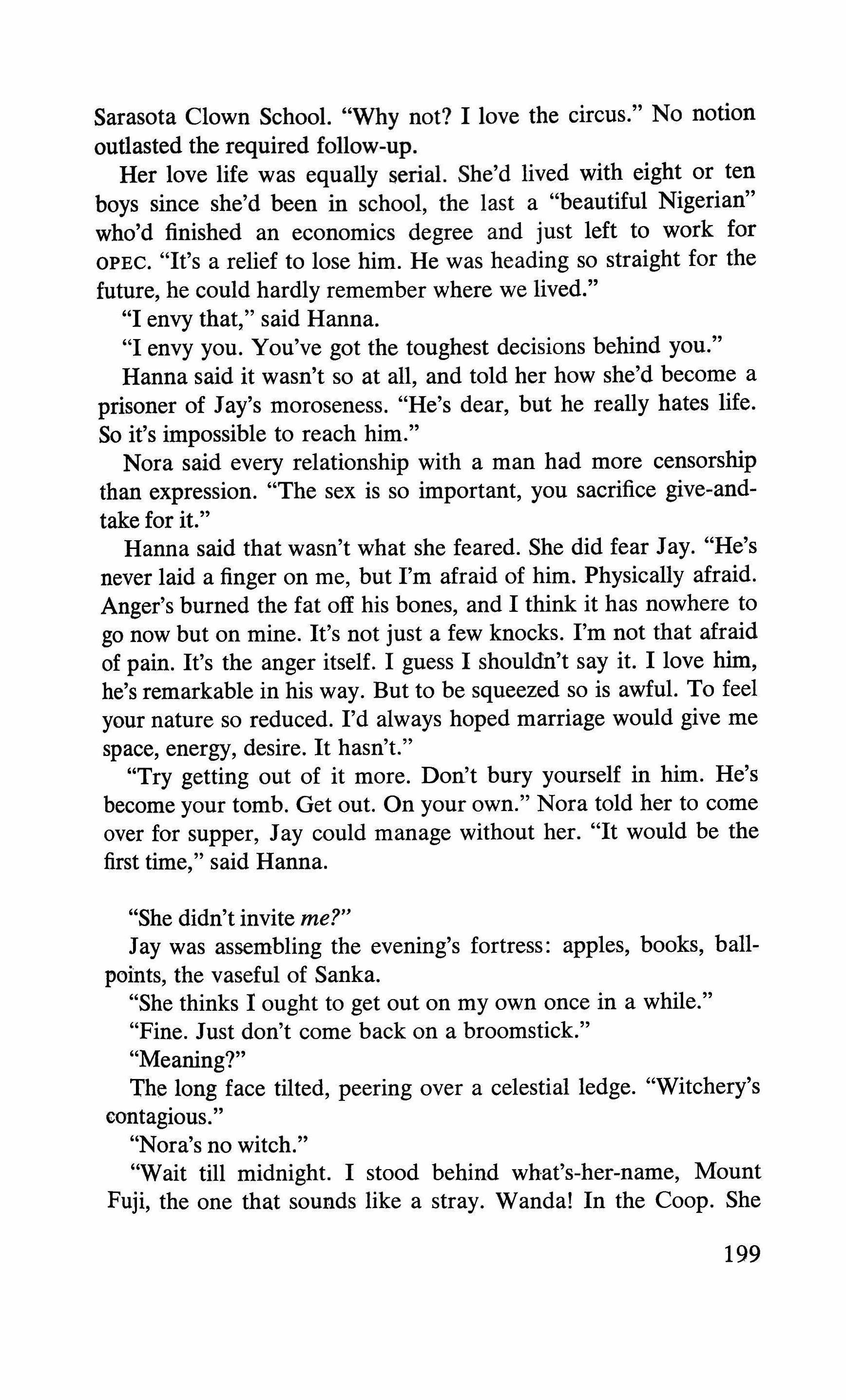
Sarasota Clown School. "Why not? I love the circus." No notion outlasted the required follow-up.
Her love life was equally serial. She'd lived with eight or ten boys since she'd been in school, the last a "beautiful Nigerian" who'd finished an economics degree and just left to work for OPEC. "It's a relief to lose him. He was heading so straight for the future, he could hardly remember where we lived."
"I envy that," said Hanna.
"I envy you. You've got the toughest decisions behind you."
Hanna said it wasn't so at all, and told her how she'd become a prisoner of Jay's moroseness. "He's dear, but he really hates life. So it's impossible to reach him."
Nora said every relationship with a man had more censorship than expression. "The sex is so important, you sacrifice give-andtake for it."
Hanna said that wasn't what she feared. She did fear Jay. "He's never laid a finger on me, but I'm afraid of him. Physically afraid. Anger's burned the fat off his bones, and I think it has nowhere to go now but on mine. It's not just a few knocks. I'm not that afraid of pain. It's the anger itself. I guess I shouldn't say it. I love him, he's remarkable in his way. But to be squeezed so is awful. To feel your nature so reduced. I'd always hoped marriage would give me space, energy, desire. It hasn't."
"Try getting out of it more. Don't bury yourself in him. He's become your tomb. Get out. On your own." Nora told her to come over for supper, Jay could manage without her. "It would be the first time," said Hanna.
"She didn't invite me?"
Jay was assembling the evening's fortress: apples, books, ballpoints, the vaseful of Sanka.
"She thinks I ought to get out on my own once in a while."
"Fine. Just don't come back on a broomstick."
"Meaning?"
The long face tilted, peering over a celestial ledge. "Witchery's contagious.
"Nora's no witch."
"Wait till midnight. I stood behind what's-her-name, Mount Fuji, the one that sounds like a stray. Wanda! In the Coop. She
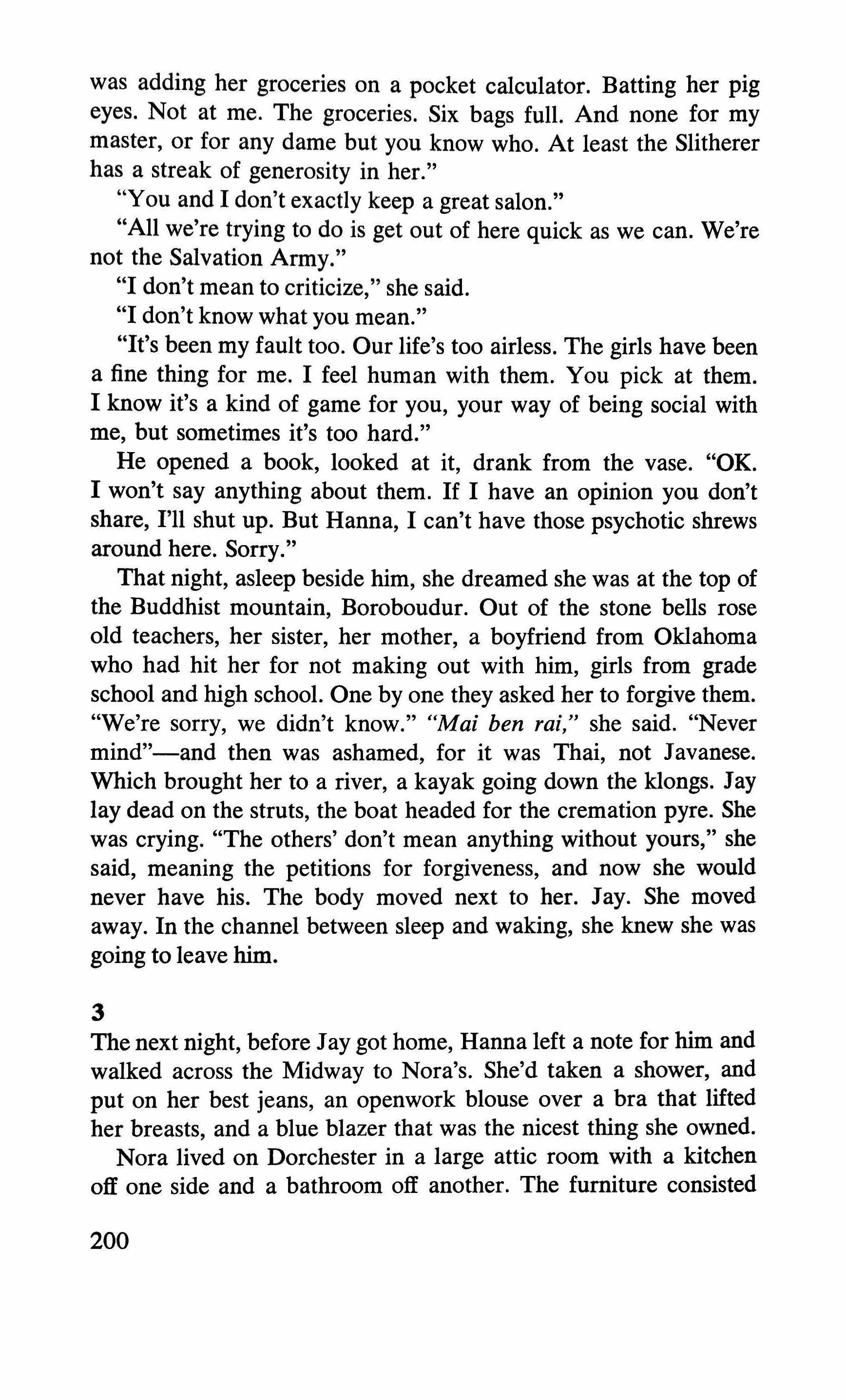
was adding her groceries on a pocket calculator. Batting her pig eyes. Not at me. The groceries. Six bags full. And none for my master, or for any dame but you know who. At least the Slitherer has a streak of generosity in her."
"You and I don't exactly keep a great salon."
"All we're trying to do is get out of here quick as we can. We're not the Salvation Army."
"I don't mean to criticize," she said.
"I don't know what you mean."
"It's been my fault too. Our life's too airless. The girls have been a fine thing for me. I feel human with them. You pick at them. I know it's a kind of game for you, your way of being social with me, but sometimes it's too hard."
He opened a book, looked at it, drank from the vase. "OK. I won't say anything about them. If I have an opinion you don't share, I'll shut up. But Hanna, I can't have those psychotic shrews around here. Sorry."
That night, asleep beside him, she dreamed she was at the top of the Buddhist mountain, Boroboudur. Out of the stone bells rose old teachers, her sister, her mother, a boyfriend from Oklahoma who had hit her for not making out with him, girls from grade school and high school. One by one they asked her to forgive them. "We're sorry, we didn't know." "Mai ben rai," she said. "Never mind"-and then was ashamed, for it was Thai, not Javanese. Which brought her to a river, a kayak going down the klongs. Jay lay dead on the struts, the boat headed for the cremation pyre. She was crying. "The others' don't mean anything without yours," she said, meaning the petitions for forgiveness, and now she would never have his. The body moved next to her. Jay. She moved away. In the channel between sleep and waking, she knew she was going to leave him.
The next night, before Jay got home, Hanna left a note for him and walked across the Midway to Nora's. She'd taken a shower, and put on her best jeans, an openwork blouse over a bra that lifted her breasts, and a blue blazer that was the nicest thing she owned. Nora lived on Dorchester in a large attic room with a kitchen off one side and a bathroom off another. The furniture consisted 200
of mattresses covered with shawls and cushions. There were lots of plants, books, a stereo, and knickknacks. The walls were covered with prints of Matisse flowers and dancers.
Nora, barefoot, wore old jeans and a sweater.
"You look terrific," she said. "Like someone on vacation."
"Going out to dinner is vacation. Without Jay."
They had jasmine tea, and faced each other on the mattresses. Through old blinds, sun dusted the room.
"Are you on probation?" Nora's hands ran in and out of her hair.
"It's more like I've dug my way out of a cell. Blind. Through muck."
"No mud shows."
"The mud's in here," said Hanna, touching her left breast.
"That's nice mud," said Nora.
There was something both tense and easy in this pillowed room, a Turkish air. Hanna felt airy, afloat, yet cloistered, marooned.
"I feel high."
"Free," said Nora. "Or maybe hungry. You hungry?"
"Just for air."
"It'll have to be tea."
Hanna brought her cup to the stove. Nora looked at her, her eyes, then her blouse, and put an arm around her waist. Hanna put hers around Nora's shoulder. They leaned forward and kissed.
Nora undid Hanna's blouse and bra. Undressed, they lay down, looked at and stroked each other, then, aroused, became more intimate.
It was, thought Hanna, like making love to oneself. There was the sense that Nora knew her body from inside. It wasn't especially exciting. It was almost a form of reconnaissance. Nora, no stranger in this country, was able to go further.
To be companionable, Hanna pretended thorough satisfaction.

4
It was midnight when Nora drove her back. Jay had read her note, which told him to read her diary so that he could understand how troubled she was by their marriage.
"I don't think I can live with you," said the note. "Not now. It doesn't mean I don't love you. Whatever that big word means."
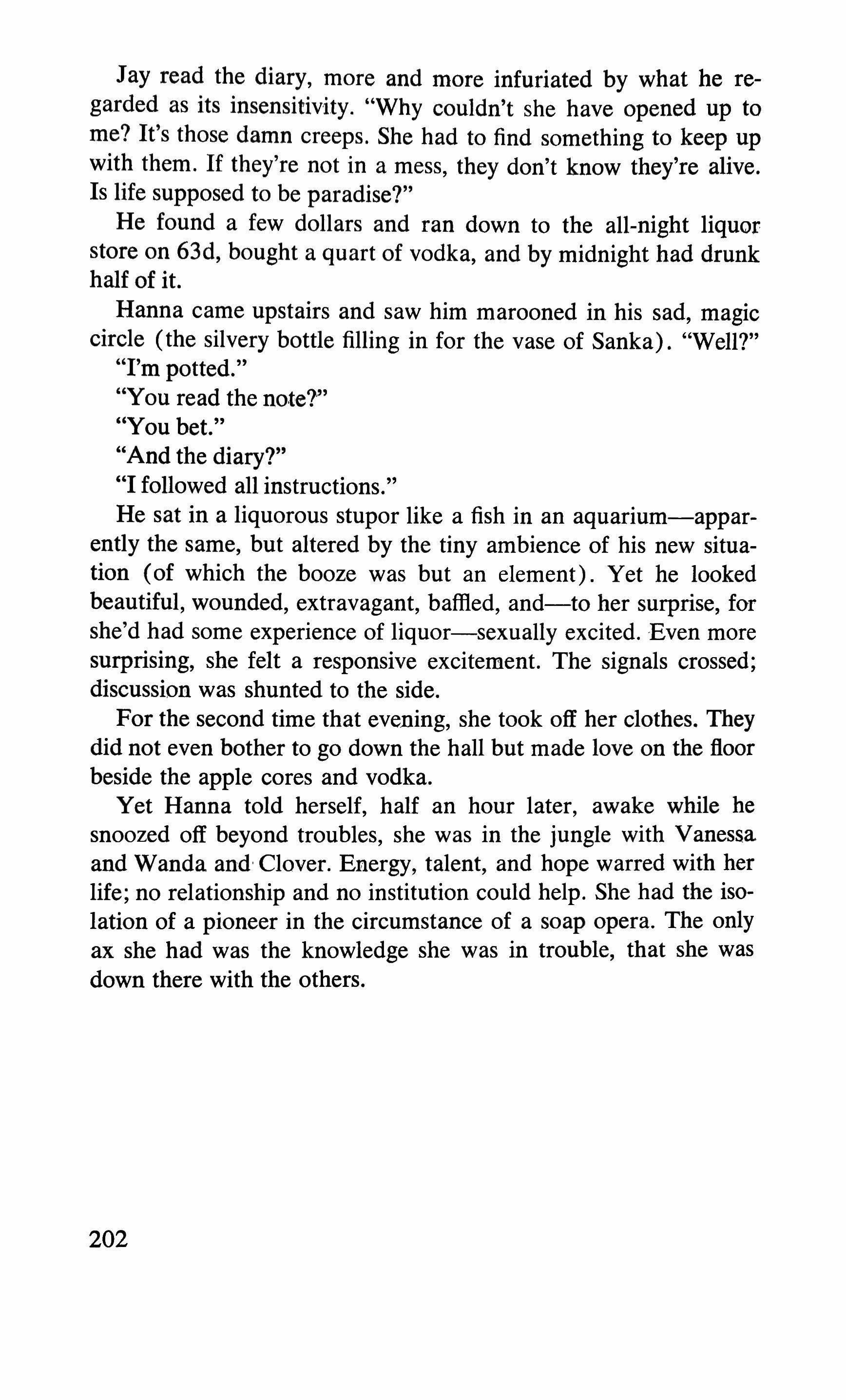
Jay read the diary, more and more infuriated by what he regarded as its insensitivity. "Why couldn't she have opened up to me? It's those damn creeps. She had to find something to keep up with them. If they're not in a mess, they don't know they're alive. Is life supposed to be paradise?"
He found a few dollars and ran down to the all-night liquor store on 63d, bought a quart of vodka, and by midnight had drunk half of it.
Hanna came upstairs and saw him marooned in his sad, magic circle (the silvery bottle filling in for the vase of Sanka). "Well?"
"I'm potted."
"You read the note?"
"You bet."
"And the diary?"
"I followed all instructions."
He sat in a liquorous stupor like a fish in an aquarium-apparently the same, but altered by the tiny ambience of his new situation (of which the booze was but an element). Yet he looked beautiful, wounded, extravagant, baffled, and-to her surprise, for she'd had some experience of liquor-sexually excited. Even more surprising, she felt a responsive excitement. The signals crossed; discussion was shunted to the side.
For the second time that evening, she took off her clothes. They did not even bother to go down the hall but made love on the floor beside the apple cores and vodka.
Yet Hanna told herself, half an hour later, awake while he snoozed off beyond troubles, she was in the jungle with Vanessa and Wanda and, Clover. Energy, talent, and hope warred with her life; no relationship and no institution could help. She had the isolation of a pioneer in the circumstance of a soap opera. The only ax she had was the knowledge she was in trouble, that she was down there with the others.
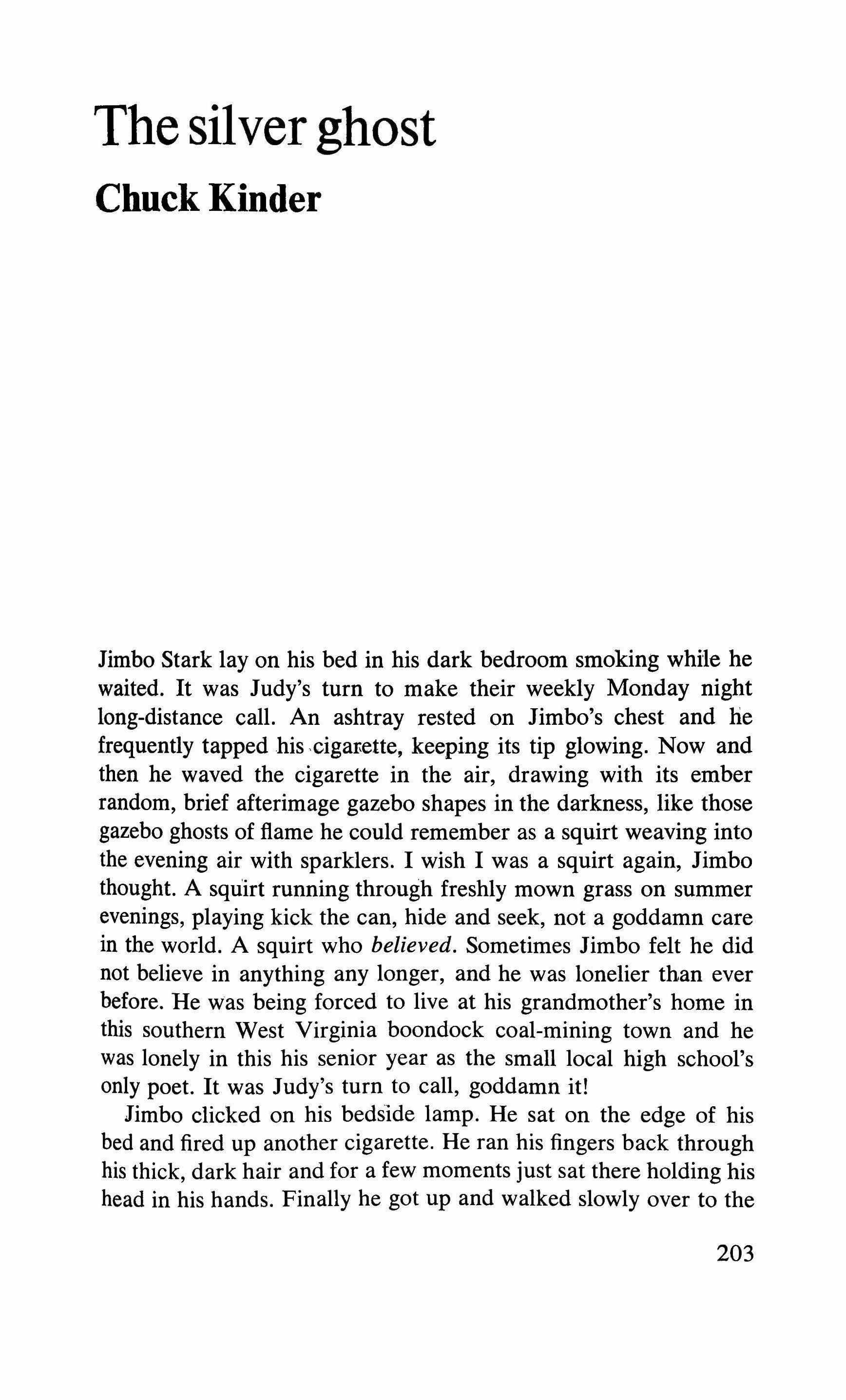
Jimbo Stark lay on his bed in his dark bedroom smoking while he waited. It was Judy's turn to make their weekly Monday night long-distance call. An ashtray rested on limbo's chest and he frequently tapped his .cigarette, keeping its tip glowing. Now and then he waved the cigarette in the air, drawing with its ember random, brief afterimage gazebo shapes in the darkness, like those gazebo ghosts of flame he could remember as a squirt weaving into the evening air with sparklers. I wish I was a squirt again, Jimbo thought. A squirt running through freshly mown grass on summer evenings, playing kick the can, hide and seek, not a goddamn care in the world. A squirt who believed. Sometimes Jimbo felt he did not believe in anything any longer, and he was lonelier than ever before. He was being forced to live at his grandmother's home in this southern West Virginia boondock coal-mining town and he was lonely in this his senior year as the small local high school's only poet. It was Judy's turn to call, goddamn it!
Jimbo clicked on his bedside lamp. He sat on the edge of his bed and fired up another cigarette. He ran his fingers back through his thick, dark hair and for a few moments just sat there holding his head in his hands. Finally he got up and walked slowly over to the
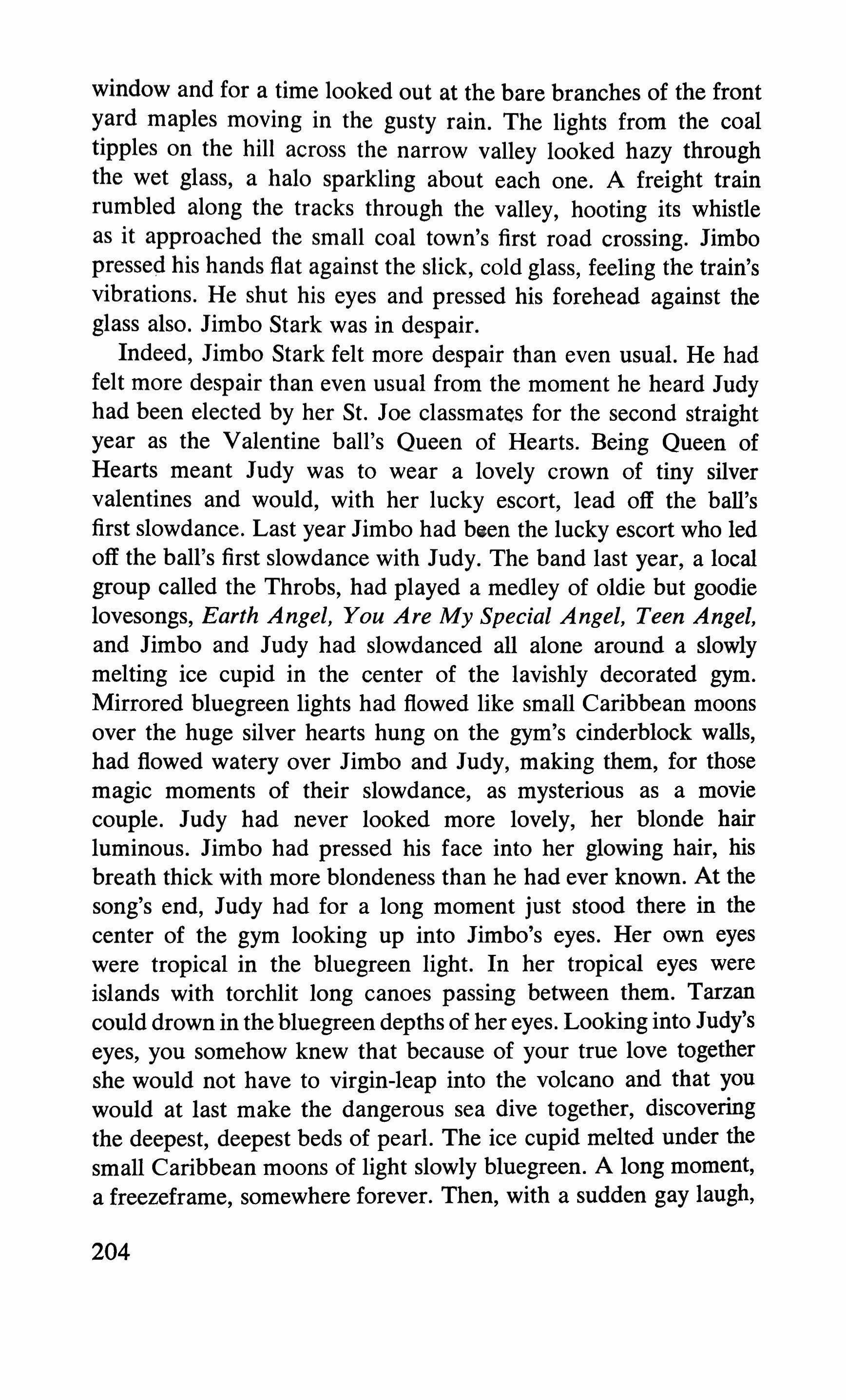
window and for a time looked out at the bare branches of the front yard maples moving in the gusty rain. The lights from the coal tipples on the hill across the narrow valley looked hazy through the wet glass, a halo sparkling about each one. A freight train rumbled along the tracks through the valley, hooting its whistle as it approached the small coal town's first road crossing. Jimbo pressed his hands flat against the slick, cold glass, feeling the train's vibrations. He shut his eyes and pressed his forehead against the glass also. Jimbo Stark was in despair.
Indeed, Jimbo Stark felt more despair than even usual. He had felt more despair than even usual from the moment he heard Judy had been elected by her St. Joe classmates for the second straight year as the Valentine ball's Queen of Hearts. Being Queen of Hearts meant Judy was to wear a lovely crown of tiny silver valentines and would, with her lucky escort, lead off the ball's first slowdance. Last year Jimbo had been the lucky escort who led off the ball's first slowdance with Judy. The band last year, a local group called the Throbs, had played a medley of oldie but goodie lovesongs, Earth Angel, You Are My Special Angel, Teen Angel, and Jimbo and Judy had slowdanced all alone around a slowly melting ice cupid in the center of the lavishly decorated gym. Mirrored bluegreen lights had flowed like small Caribbean moons over the huge silver hearts hung on the gym's cinderblock walls, had flowed watery over Jimbo and Judy, making them, for those magic moments of their slowdance, as mysterious as a movie couple. Judy had never looked more lovely, her blonde hair luminous. Jimbo had pressed his face into her glowing hair, his breath thick with more blondeness than he had ever known. At the song's end, Judy had for a long moment just stood there in the center of the gym looking up into Jimbo's eyes. Her own eyes were tropical in the bluegreen light. In her tropical eyes were islands with torchlit long canoes passing between them. Tarzan could drown in the bluegreen depths of her eyes. Looking into Judy's eyes, you somehow knew that because of your true love together she would not have to virgin-leap into the volcano and that you would at last make the dangerous sea dive together, discovering the deepest, deepest beds of pearl. The ice cupid melted under the small Caribbean moons of light slowly bluegreen. A long moment, a freezeframe, somewhere forever. Then, with a sudden gay laugh,
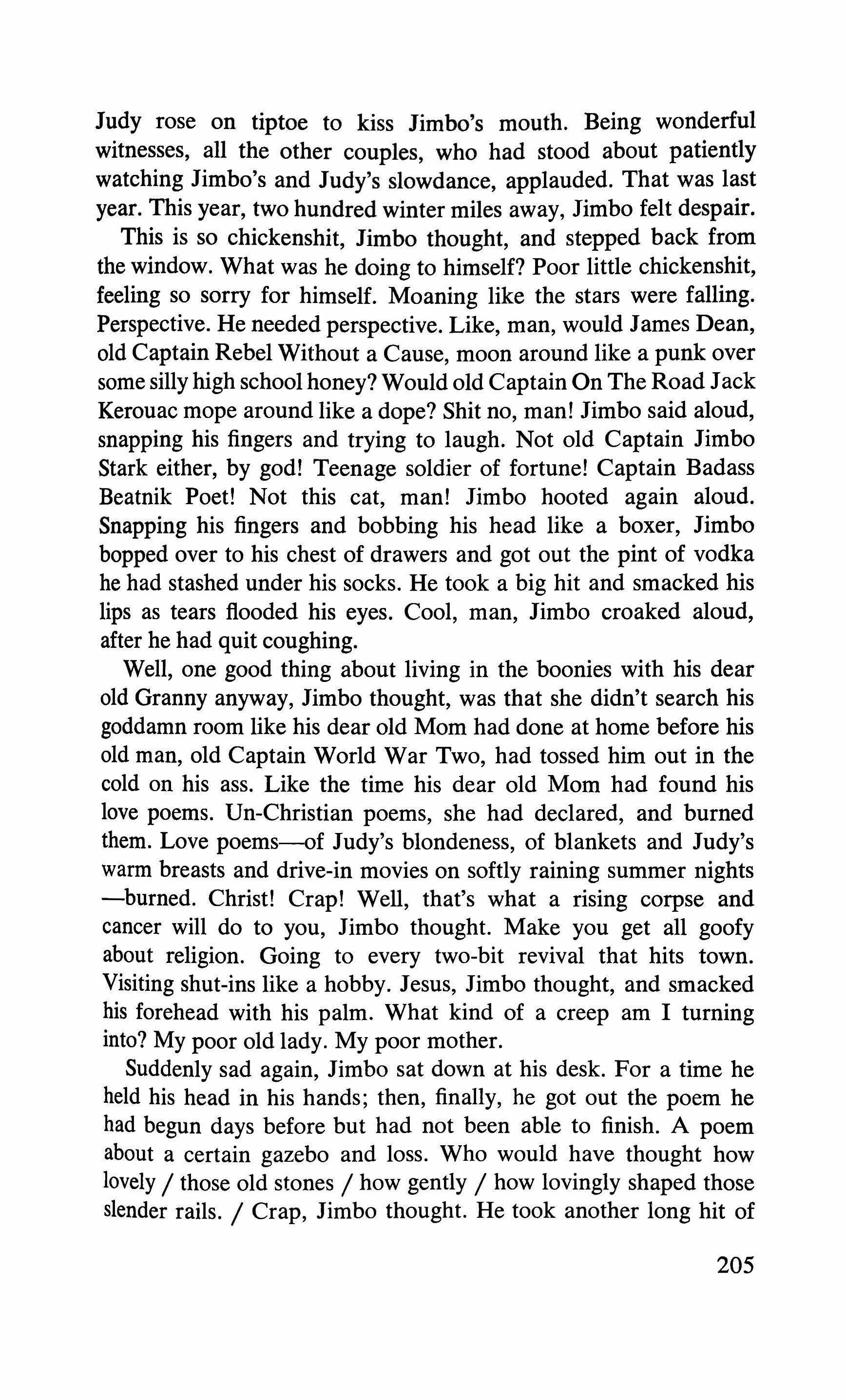
Judy rose on tiptoe to kiss Jimbo's mouth. Being wonderful witnesses, all the other couples, who had stood about patiently watching Jimbo's and Judy's slowdance, applauded. That was last year. This year, two hundred winter miles away, limbo felt despair. This is so chickenshit, limbo thought, and stepped back from the window. What was he doing to himself? Poor little chickenshit, feeling so sorry for himself. Moaning like the stars were falling. Perspective. He needed perspective. Like, man, would Iames Dean, old Captain Rebel Without a Cause, moon around like a punk over some sillyhigh school honey? Would old Captain On The Road Jack Kerouac mope around like a dope? Shit no, man! limbo said aloud, snapping his fingers and trying to laugh. Not old Captain limbo Stark either, by god! Teenage soldier of fortune! Captain Badass Beatnik Poet! Not this cat, man! limbo hooted again aloud. Snapping his fingers and bobbing his head like a boxer, limbo bopped over to his chest of drawers and got out the pint of vodka he had stashed under his socks. He took a big hit and smacked his lips as tears flooded his eyes. Cool, man, Jimbo croaked aloud, after he had quit coughing.
Well, one good thing about living in the boonies with his dear old Granny anyway, limbo thought, was that she didn't search his goddamn room like his dear old Mom had done at home before his old man, old Captain World War Two, had tossed him out in the cold on his ass. Like the time his dear old Mom had found his love poems. Un-Christian poems, she had declared, and burned them. Love poems--of Judy's blondeness, of blankets and Judy's warm breasts and drive-in movies on softly raining summer nights -burned. Christ! Crap! Well, that's what a rising corpse and cancer will do to you, limbo thought. Make you get all goofy about religion. Going to every two-bit revival that hits town. Visiting shut-ins like a hobby. Jesus, limbo thought, and smacked his forehead with his palm. What kind of a creep am I turning into? My poor old lady. My poor mother. Suddenly sad again, limbo sat down at his desk. For a time he held his head in his hands; then, finally, he got out the poem he had begun days before but had not been able to finish. A poem about a certain gazebo and loss. Who would have thought how lovely / those old stones / how gently / how lovingly shaped those slender rails. / Crap, limbo thought. He took another long hit of
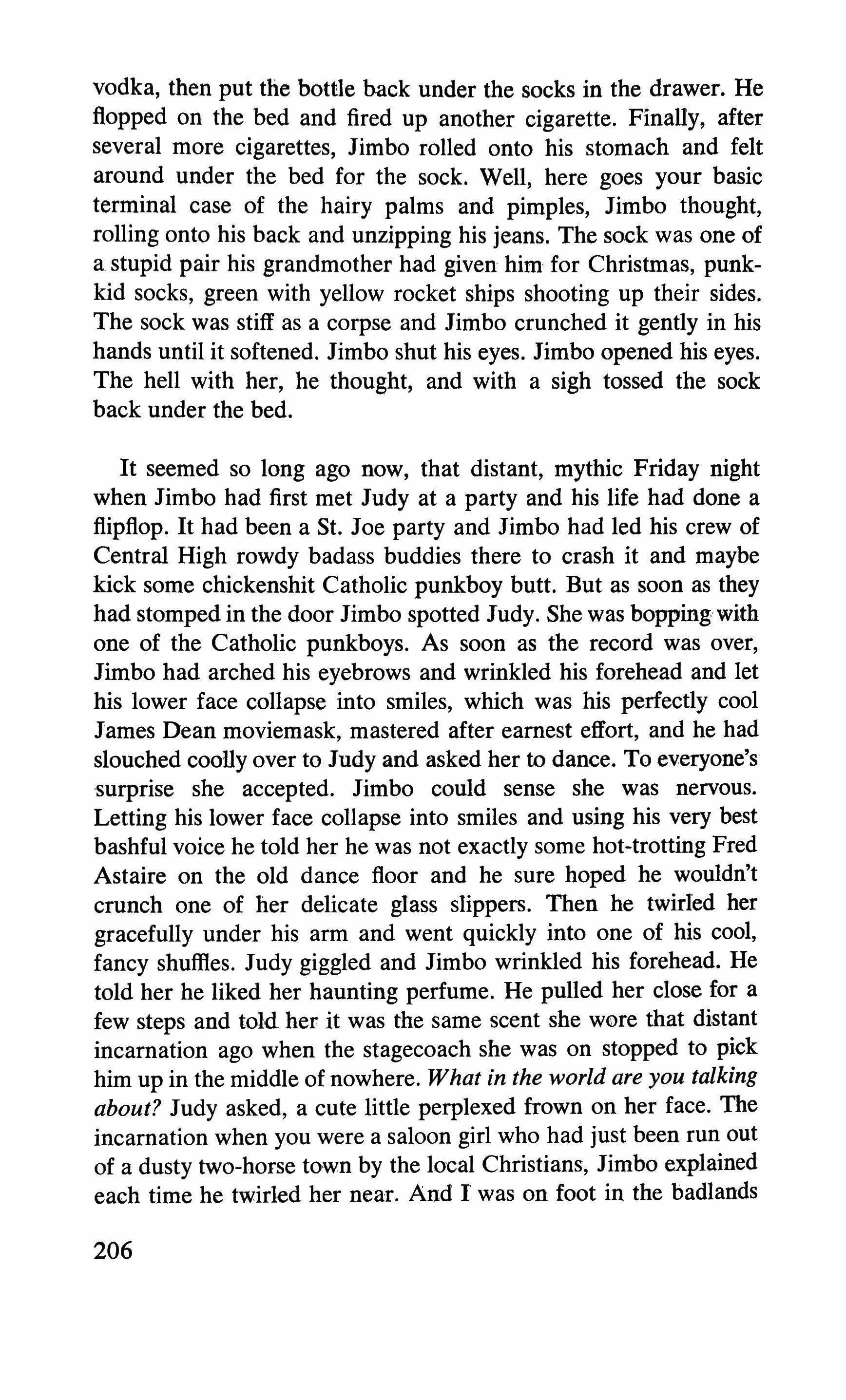
vodka, then put the bottle back under the socks in the drawer. He flopped on the bed and fired up another cigarette. Finally, after several more cigarettes, Jimbo rolled onto his stomach and felt around under the bed for the sock. Well, here goes your basic terminal case of the hairy palms and pimples, Jimbo thought, rolling onto his back and unzipping his jeans. The sock was one of a stupid pair his grandmother had given him for Christmas, punkkid socks, green with yellow rocket ships shooting up their sides. The sock was stiff as a corpse and Jimbo crunched it gently in his hands until it softened. Jimbo shut his eyes. Jimbo opened his eyes. The hell with her, he thought, and with a sigh tossed the sock back under the bed.
It seemed so long ago now, that distant, mythic Friday night when Jimbo had first met Judy at a party and his life had done a flipflop. It had been a St. Joe party and Jimbo had led his crew of Central High rowdy badass buddies there to crash it and maybe kick some chickenshit Catholic punkboy butt. But as soon as they had stomped in the door Jimbo spotted Judy. She was bopping with one of the Catholic punkboys. As soon as the record was over, Jimbo had arched his eyebrows and wrinkled his forehead and let his lower face collapse into smiles, which was his perfectly cool James Dean moviemask, mastered after earnest effort, and he had slouched coolly over to Judy and asked her to dance. To everyone's surprise she accepted. Jimbo could sense she was nervous. Letting his lower face collapse into smiles and using his very best bashful voice he told her he was not exactly some hot-trotting Fred Astaire on the old dance floor and he sure hoped he wouldn't crunch one of her delicate glass slippers. Then he twirled her gracefully under his arm and went quickly into one of his cool, fancy shuffles. Judy giggled and Jimbo wrinkled his forehead. He told her he liked her haunting perfume. He pulled her close for a few steps and told her it was the same scent she wore that distant incarnation ago when the stagecoach she was on stopped to pick him up in the middle of nowhere. What in the world are you talking about? Judy asked, a cute little perplexed frown on her face. The incarnation when you were a saloon girl who had just been run out of a dusty two-horse town by the local Christians, Jimbo explained each time he twirled her near. And I was on foot in the badlands

because I had had to shoot my lame horse. And your stagecoach stopped for me. And like you I too had a past. For years I had been running with a wild bunch all through the Old West. My hobby was shooting up saloons. My fast gun had become famous far and wide. I was known only as Ringo. My picture was on posters I'd often come across tacked to cottonwoods down by the stream. I wasn't all bad, though. I'd never drilled a cowpoke who hadn't thrown down on me first. I'd never ridden a horse into the ground. I was always polite to saloon girls. It was love at first sight between us. You had big orange feathers in your fancy saloon-girl hat and your wrists looked just as delicate as glass and you were wearing this same haunting perfume. You are a nut! Judy said and laughed, and Jimbo twirled her again and again, her blonde ponytail bouncing, bouncing. Then, while his rowdy badass buddies glowered drunkenly from a corner, Judy and Jimbo danced the night away. The room was awash with babble about them. Judy told Jimbo she had heard a lot about him. He explained to her that he was misunderstood. She told him he had a pretty wild reputation. He confessed to her that he secretly wrote poetry. She told him that he didn't seem as wild as everyone said. Jimbo asked Judy to run off with him to Asia where in a hidden valley he had a shimmering magic palace of silver. Judy giggled. When one of Jimbo's rowdy badass buddies tried to pick a fight with one of the Catholic punkboys, Jimbo broke itup and saved the party from shambles. Two weeks later Jimbo and Judy were going steady.
'It 'is the late 1950s and America is a lush, electric, song-filled garden for teenage love, and Jimbo and Judy fully expect that their own love will grow and grow until the end of time, until the twelfth of never. And all their best friends, all the other couples in their crowd-'Pace and Penny who by that time have gone all the 'way eleven times, Bob and Sally who have gone only to second base, Boots and Peggy Sue who fingerfuck relentlessly-they all believe also that Jimbo's and Judy's love will grow and grow until the end of time, until the twelfth of never. A:fter all, they make such a cute couple, Jimbo tall, 'thin, dark, and Judy petite, blonde. And they dance together so perfectly. Indeed, being teenagers in true love, they are romantic perfectly. They make plans for the future. They design and redesign the shimmering dreamhome of their

future. They spend hours deciding on the names for their twelve children, their six boys and six girls. They speculate about their twelve children's glorious futures. We'll need at least one major leaguer in this old family, Jimbo says. And how's about a scientist or two? And a covergirl who will go on to break into the movies and become a big big star, Judy suggests. And a doctor and a lawyer, they readily agree. And maybe a college professor. And maybe one of the girls will marry a senator, or, better yet, maybe one of the boys will actually be a senator who just might go on all the way to the White House. It could happen. Anything could happen in America.
Because they go to different high schools-Judy to Catholic St. Joe's, Jimbo to Central High-limbo each lunch hour and every day after school without fail hops slow freights in the trainyard for rides across town to St. Joe's-and Judy's waiting arms. When she sees limbo walking up the hill from the tracks, Judy runs to hug him, her blonde ponytail bouncing relentlessly. With a cute gesture of slight reproach she takes the cigarette from behind Jimbo's ear, then kisses him tenderly and for a long time they look lovingly into the depths of one another's eyes.
Some afternoons after school limbo and Judy walk around downtown hand in hand, windowshopping. Through the shining membrane of glass they look at china, at silver, at their own reflections. They select patterns. They study the trays of rings. There, that's it, Judy says one afternoon. That's our ring. They have been standing in front of Goldstein's jewelry display window for what seems to Jimbo hours. Judy's blue eyes have been grazing the glittering points of light within. Jimbo has been rather absently observing the watery reflection in the glass of the traffic flowing behind them, and thinking vaguely of fish. The ring is a diamond with a heart of small perfect pearls shaped about it. That's the only ring in the whole wide world, Judy says, her voice husky. The only ring in the whole wide world costs three hundred bucks. Three hundred buckeroos, limbo thinks to himself, studying his reflection in the glass. Three hundred fish. He arches his eyebrows. He wrinkles his forehead.
Three hundred bucks, Jimbo thought. Sure thing. Sure, the only ring in the whole wide world cost three hundred bucks. It had cost
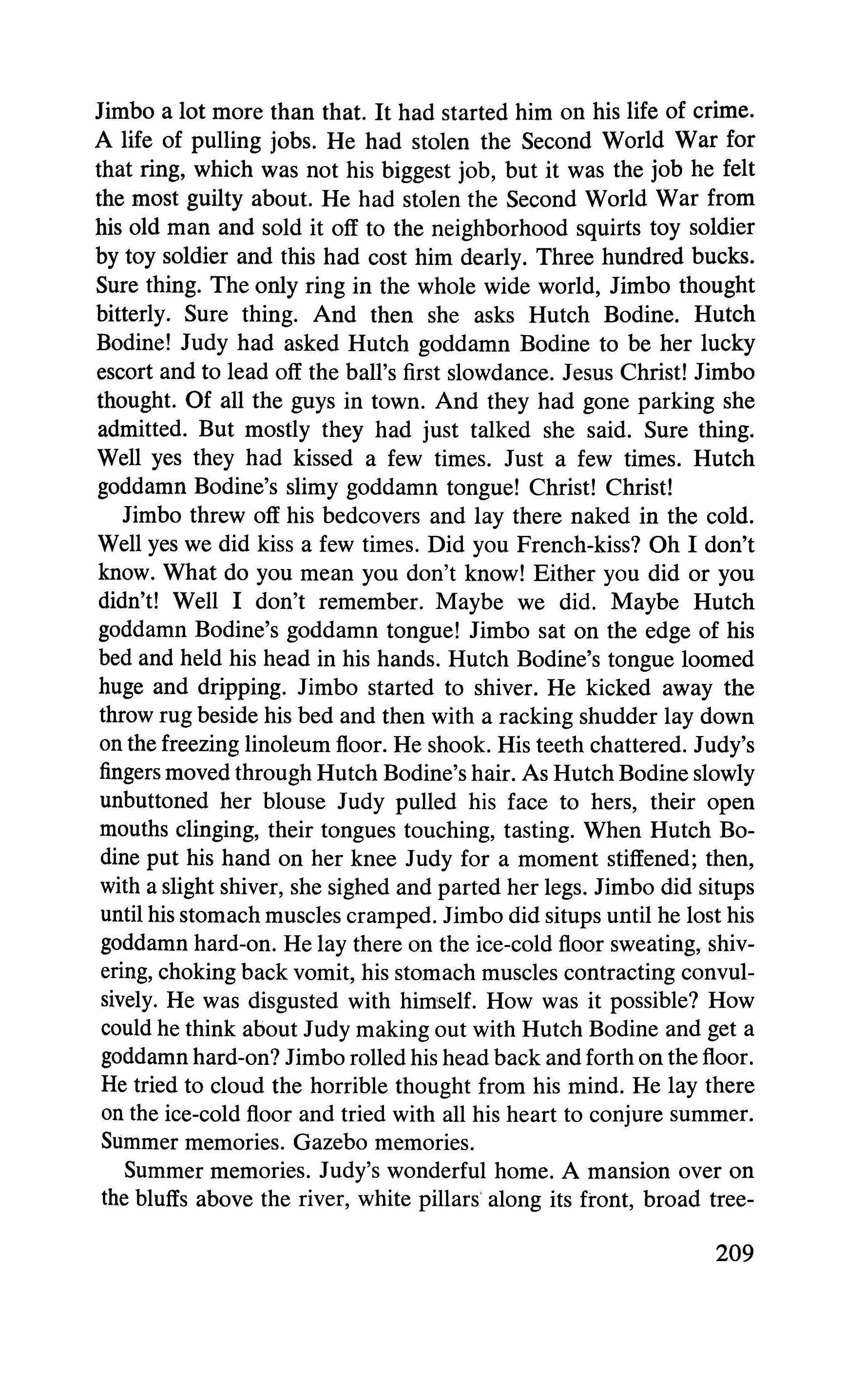
Jimbo a lot more than that. It had started him on his life of crime. A life of pulling jobs. He had stolen the Second World War for that ring, which was not his biggest job, but it was the job he felt the most guilty about. He had stolen the Second World War from his old man and sold it off to the neighborhood squirts toy soldier by toy soldier and this had cost him dearly. Three hundred bucks. Sure thing. The only ring in the whole wide world, Jimbo thought bitterly. Sure thing. And then she asks Hutch Bodine. Hutch Bodine! Judy had asked Hutch goddamn Bodine to be her lucky escort and to lead off the ball's first slowdance. Jesus Christ! Jimbo thought. Of all the guys in town. And they had gone parking she admitted. But mostly they had just talked she said. Sure thing. Well yes they had kissed a few times. Just a few times. Hutch goddamn Bodine's slimy goddamn tongue! Christ! Christ!
Jimbo threw off his bedcovers and lay there naked in the cold. Well yes we did kiss a few times. Did you French-kiss? Oh I don't know. What do you mean you don't know! Either you did or you didn't! Well I don't remember. Maybe we did. Maybe Hutch goddamn Bodine's goddamn tongue! Jimbo sat on the edge of his bed and held his head in his hands. Hutch Bodine's tongue loomed huge and dripping. Jimbo started to shiver. He kicked away the throw rug beside his bed and then with a racking shudder lay down on the freezing linoleum floor. He shook. His teeth chattered. Judy's fingers moved through Hutch Bodine's hair. As Hutch Bodine slowly unbuttoned her blouse Judy pulled his face to hers, their open mouths clinging, their tongues touching, tasting. When Hutch Bodine put his hand on her knee Judy for a moment stiffened; then, with a slight shiver, she sighed and parted her legs. Jimbo did situps until his stomach muscles cramped. Jimbo did situps until he lost his goddamn hard-on. He lay there on the ice-cold floor sweating, shivering, choking back vomit, his stomach muscles contracting convulsively. He was disgusted with himself. How was it possible? How could he think about Judy making out with Hutch Bodine and get a goddamn hard-on? Jimbo rolled his head back and forth on the floor. He tried to cloud the horrible thought from his mind. He lay there on the ice-cold floor and tried with all his heart to conjure summer. Summer memories. Gazebo memories.
Summer memories. Judy's wonderful home. A mansion over on the bluffs above the river, white pillars' along its front, broad tree-
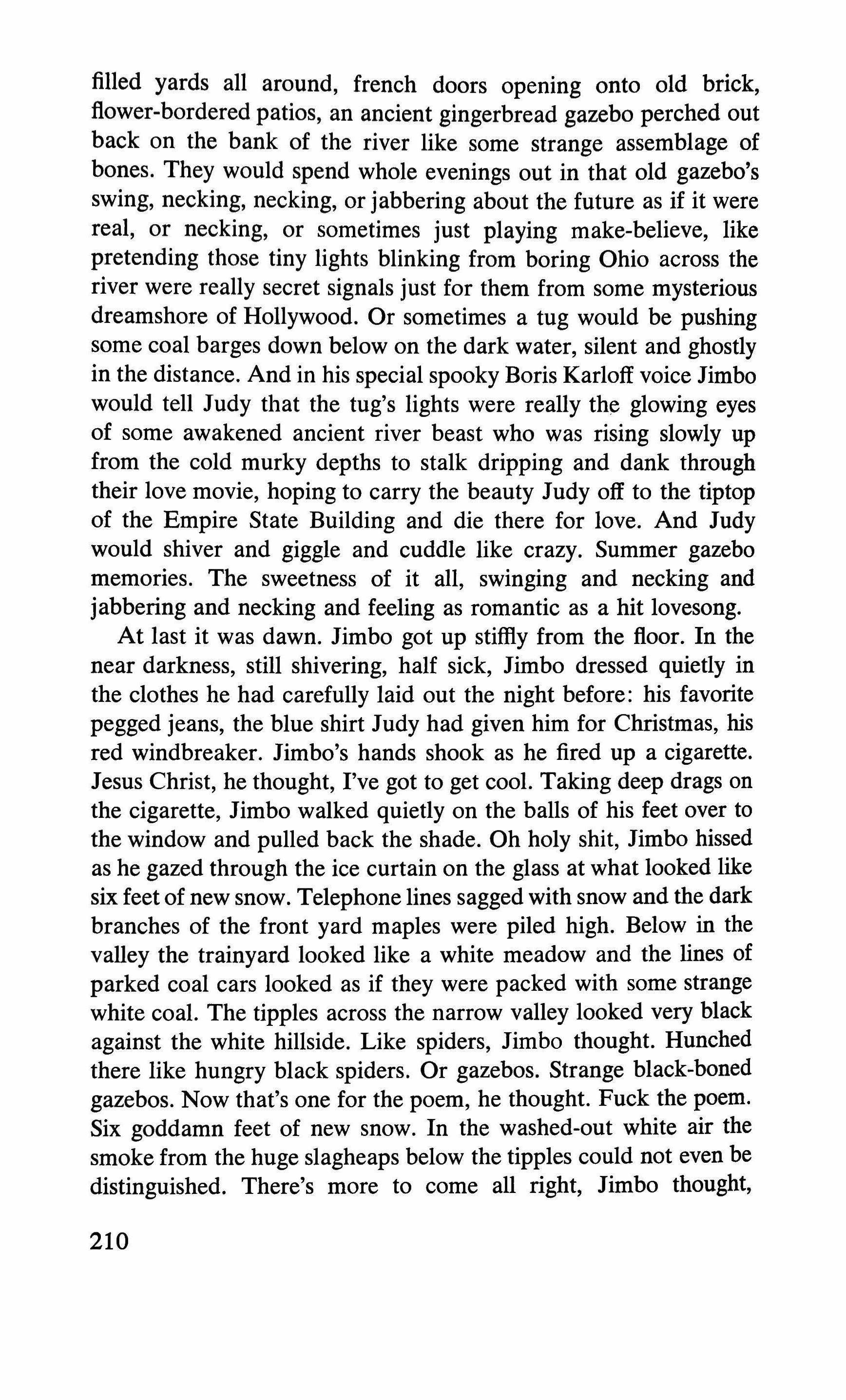
filled yards all around, french doors opening onto old brick, flower-bordered patios, an ancient gingerbread gazebo perched out back on the bank of the river like some strange assemblage of bones. They would spend whole evenings out in that old gazebo's swing, necking, necking, or jabbering about the future as if it were real, or necking, or sometimes just playing make-believe, like pretending those tiny lights blinking from boring Ohio across the river were really secret signals just for them from some mysterious dreamshore of Hollywood. Or sometimes a tug would be pushing some coal barges down below on the dark water, silent and ghostly in the distance. And in his special spooky Boris Karloff voice Jimbo would tell Judy that the tug's lights were really the glowing eyes of some awakened ancient river beast who was rising slowly up from the cold murky depths to stalk dripping and dank through their love movie, hoping to carry the beauty Judy off to the tiptop of the Empire State Building and die there for love. And Judy would shiver and giggle and cuddle like crazy. Summer gazebo memories. The sweetness of it all, swinging and necking and jabbering and necking and feeling as romantic as a hit lovesong. At last it was dawn. Jimbo got up stiffly from the floor. In the near darkness, still shivering, half sick, Jimbo dressed quietly in the clothes he had carefully laid out the night before: his favorite pegged jeans, the blue shirt Judy had given him for Christmas, his red windbreaker. Jimbo's hands shook as he fired up a cigarette. Jesus Christ, he thought, I've got to get cool. Taking deep drags on the cigarette, Jimbo walked quietly on the balls of his feet over to the window and pulled back the shade. Oh holy shit, Jimbo hissed as he gazed through the ice curtain on the glass at what looked like six feet of new snow. Telephone lines sagged with snow and the dark branches of the front yard maples were piled high. Below in the valley the trainyard looked like a white meadow and the lines of parked coal cars looked as if they were packed with some strange white coal. The tipples across the narrow valley looked very black against the white hillside. Like spiders, Jimbo thought. Hunched there like hungry black spiders. Or gazebos. Strange black-boned gazebos. Now that's one for the poem, he thought. Fuck the poem. Six goddamn feet of new snow. In the washed-out white air the smoke from the huge slagheaps below the tipples could not even be distinguished. There's more to come all right, Jimbo thought,
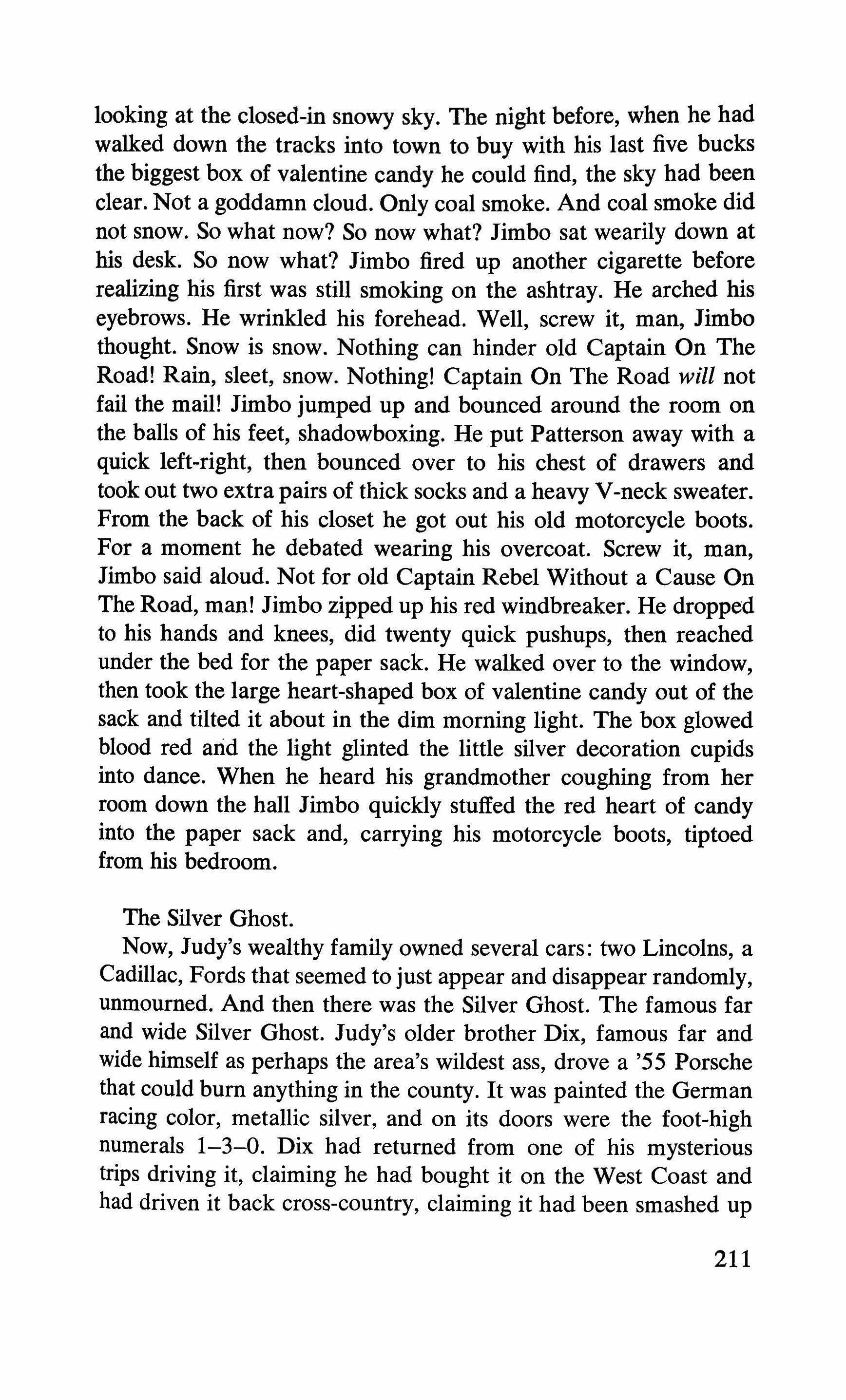
looking at the closed-in snowy sky. The night before, when he had walked down the tracks into town to buy with his last five bucks the biggest box of valentine candy he could find, the sky had been clear. Not a goddamn cloud. Only coal smoke. And coal smoke did not snow. So what now? So now what? Jimbo sat wearily down at his desk. So now what? Jimbo fired up another cigarette before realizing his first was still smoking on the ashtray. He arched his eyebrows. He wrinkled his forehead. Well, screw it, man, Jimbo thought. Snow is snow. Nothing can hinder old Captain On The Road! Rain, sleet, snow. Nothing! Captain On The Road will not fail the mail! Jimbo jumped up and bounced around the room on the balls of his feet, shadowboxing. He put Patterson away with a quick left-right, then bounced over to his chest of drawers and took out two extra pairs of thick socks and a heavy V-neck sweater. From the back of his closet he got out his old motorcycle boots. For a moment he debated wearing his overcoat. Screw it, man, Jimbo said aloud. Not for old Captain Rebel Without a Cause On The Road, man! Jimbo zipped up his red windbreaker. He dropped to his hands and knees, did twenty quick pushups, then reached under the bed for the paper sack. He walked over to the window, then took the large heart-shaped box of valentine candy out of the sack and tilted it about in the dim morning light. The box glowed blood red arid the light glinted the little silver decoration cupids into dance. When he heard his grandmother coughing from her room down the hall Jimbo quickly stuffed the red heart of candy into the paper sack and, carrying his motorcycle boots, tiptoed from his bedroom.
The Silver Ghost.
Now, Judy's wealthy family owned several cars: two Lincolns, a Cadillac, Fords that seemed to just appear and disappear randomly, unmourned. And then there was the Silver Ghost. The famous far and wide Silver Ghost. Judy's older brother Dix, famous far and wide himself as perhaps the area's wildest ass, drove a '55 Porsche that could burn anything in the county. It was painted the German racing color, metallic silver, and on its doors were the foot-high numerals 1-3-0. Dix had returned from one of his mysterious trips driving it, claiming he had bought it on the West Coast and had driven it back cross-country, claiming it had been smashed up
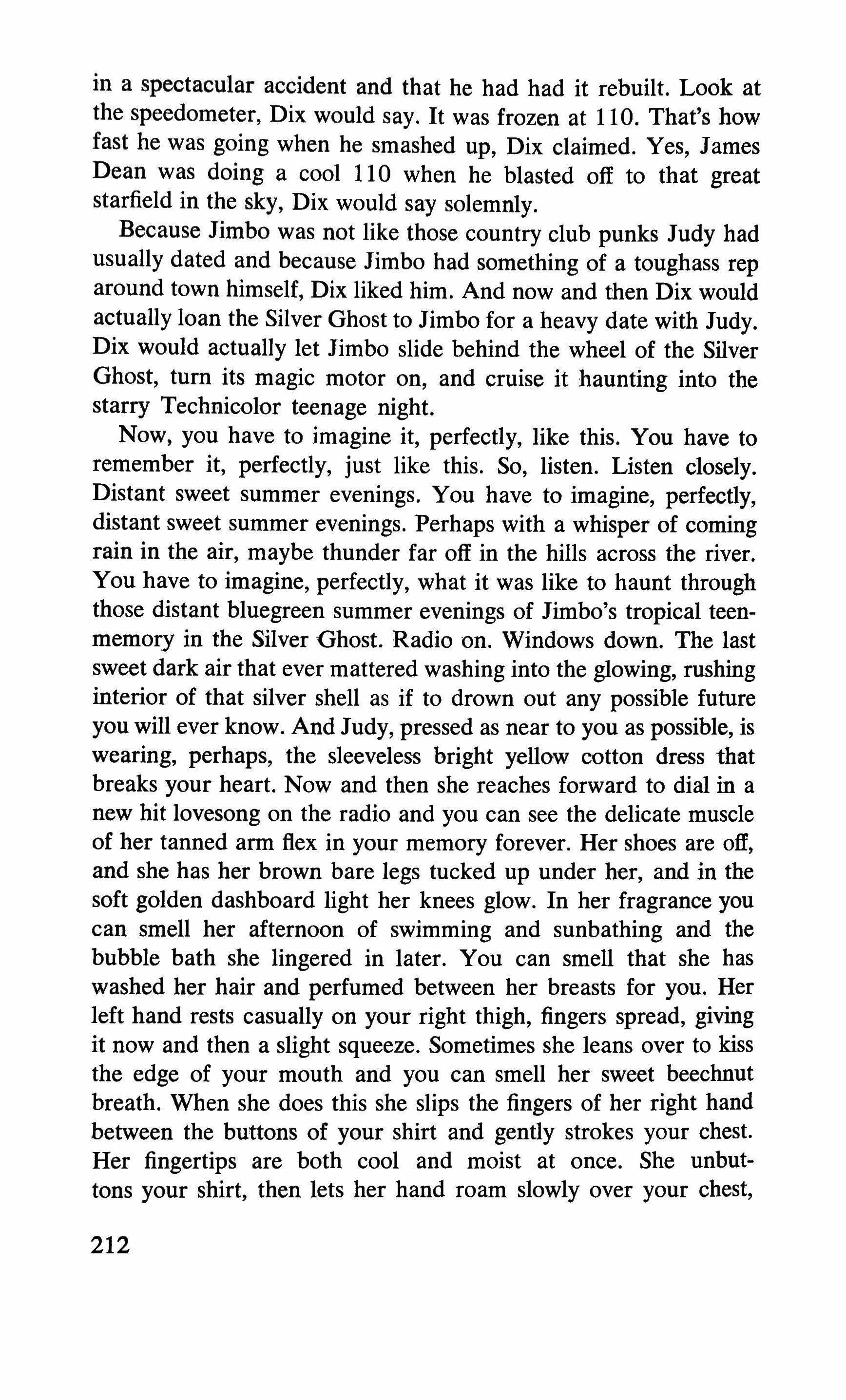
in a spectacular accident and that he had had it rebuilt. Look at the speedometer, Dix would say. It was frozen at 110. That's how fast he was going when he smashed up, Dix claimed. Yes, James Dean was doing a cool 110 when he blasted off to that great starfield in the sky, Dix would say solemnly.
Because Jimbo was not like those country club punks Judy had usually dated and because Jimbo had something of a toughass rep around town himself, Dix liked him. And now and then Dix would actually loan the Silver Ghost to Jimbo for a heavy date with Judy. Dix would actual1y let Jimbo slide behind the wheel of the Silver Ghost, turn its magic motor on, and cruise it haunting into the starry Technicolor teenage night.
Now, you have to imagine it, perfectly, like this. You have to remember it, perfectly, just like this. So, listen. Listen closely. Distant sweet summer evenings. You have to imagine, perfectly, distant sweet summer evenings. Perhaps with a whisper of coming rain in the air, maybe thunder far off in the hills across the river. You have to imagine, perfectly, what it was like to haunt through those distant bluegreen summer evenings of Jimbo's tropical teenmemory in the Silver Ghost. Radio on. Windows down. The last sweet dark air that ever mattered washing into the glowing, rushing interior of that silver shell as if to drown out any possible future you will ever know. And Judy, pressed as near to you as possible, is wearing, perhaps, the sleeveless bright yellow cotton dress that breaks your heart. Now and then she reaches forward to dial in a new hit lovesong on the radio and you can see the delicate muscle of her tanned arm flex in your memory forever. Her shoes are off, and she has her brown bare legs tucked up under her, and in the soft golden dashboard light her knees glow. In her fragrance you can smell her afternoon of swimming and sunbathing and the bubble bath she lingered in later. You can smell that she has washed her hair and perfumed between her breasts for you. Her left hand rests casually on your right thigh, fingers spread, giving it now and then a slight squeeze. Sometimes she leans over to kiss the edge of your mouth and you can smell her sweet beechnut breath. When she does this she slips the fingers of her right hand between the buttons of your shirt and gently strokes your chest. Her fingertips are both cool and moist at once. She unbuttons your shirt, then lets her hand roam slowly over your chest,
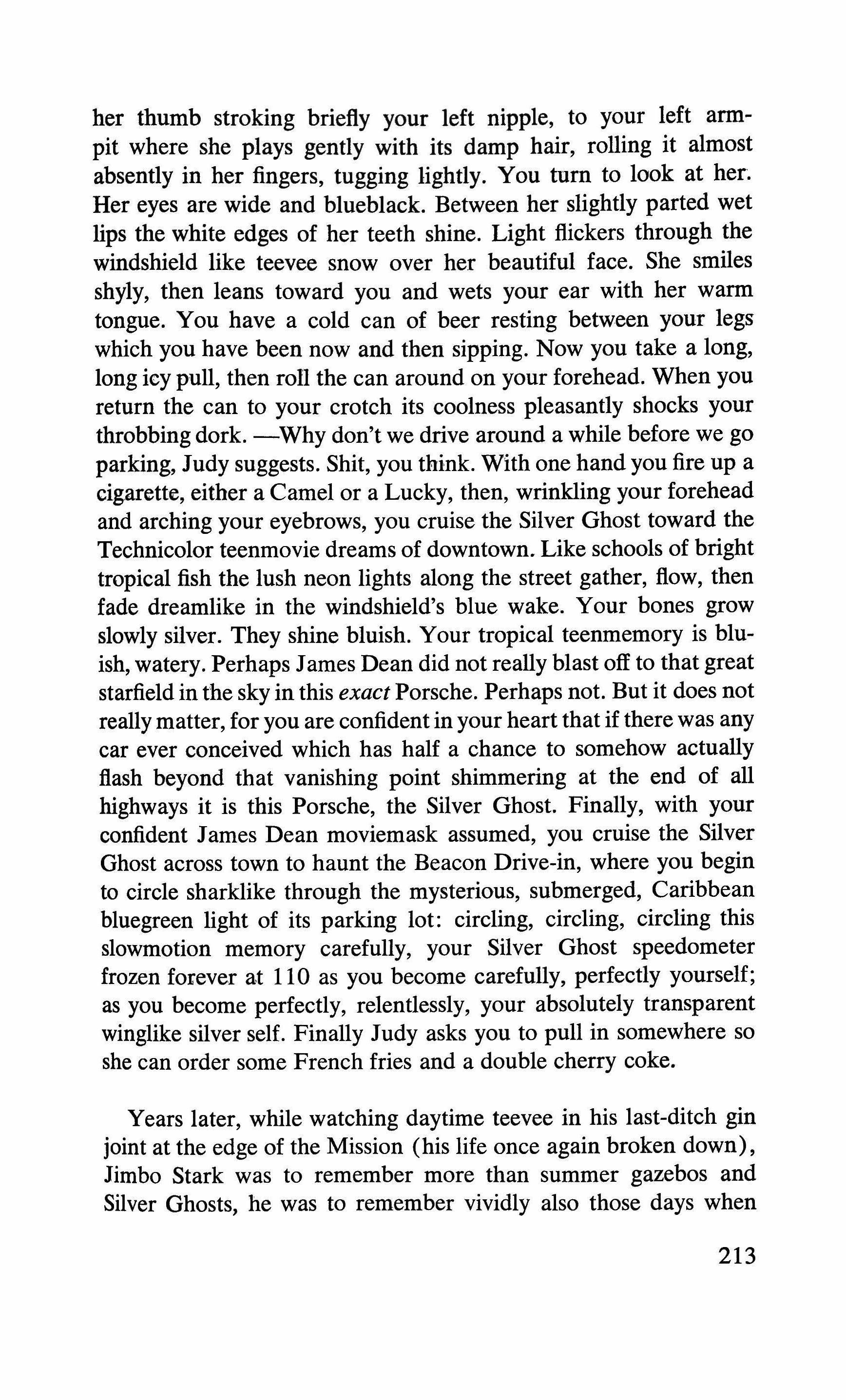
her thumb stroking briefly your left nipple, to your left armpit where she plays gently with its damp hair, rolling it almost absently in her fingers, tugging lightly. You tum to look at her. Her eyes are wide and blueblack. Between her slightly parted wet lips the white edges of her teeth shine. Light flickers through the windshield like teevee snow over her beautiful face. She smiles shyly, then leans toward you and wets your ear with her warm tongue. You have a cold can of beer resting between your legs which you have been now and then sipping. Now you take a long, long icy pull, then roll the can around on your forehead. When you return the can to your crotch its coolness pleasantly shocks your throbbing dork. -Why don't we drive around a while before we go parking, Judy suggests. Shit, you think. With one hand you fire up a cigarette, either a Camel or a Lucky, then, wrinkling your forehead and arching your eyebrows, you cruise the Silver Ghost toward the Technicolor teenmovie dreams of downtown. Like schools of bright tropical fish the lush neon lights along the street gather, flow, then fade dreamlike in the windshield's blue wake. Your bones grow slowly silver. They shine bluish. Your tropical teenmemory is bluish, watery. Perhaps James Dean did not really blast off to that great starfield in the sky in this exact Porsche. Perhaps not. But it does not really matter, for you are confident in your heart that if there was any car ever conceived which has half a chance to somehow actually flash beyond that vanishing point shimmering at the end of all highways it is this Porsche, the Silver Ghost. Finally, with your confident James Dean moviemask assumed, you cruise the Silver Ghost across town to haunt the Beacon Drive-in, where you begin to circle sharklike through the mysterious, submerged, Caribbean bluegreen light of its parking lot: circling, circling, circling this slowmotion memory carefully, your Silver Ghost speedometer frozen forever at 110 as you become carefully, perfectly yourself; as you become perfectly, relentlessly, your absolutely transparent winglike silver self. Finally Judy asks you to pull in somewhere so she can order some French fries and a double cherry coke.
Years later, while watching daytime teevee in his last-ditch gin joint at the edge of the Mission (his life once again broken down), Jimbo Stark was to remember more than summer gazebos and Silver Ghosts, he was to remember vividly also those days when
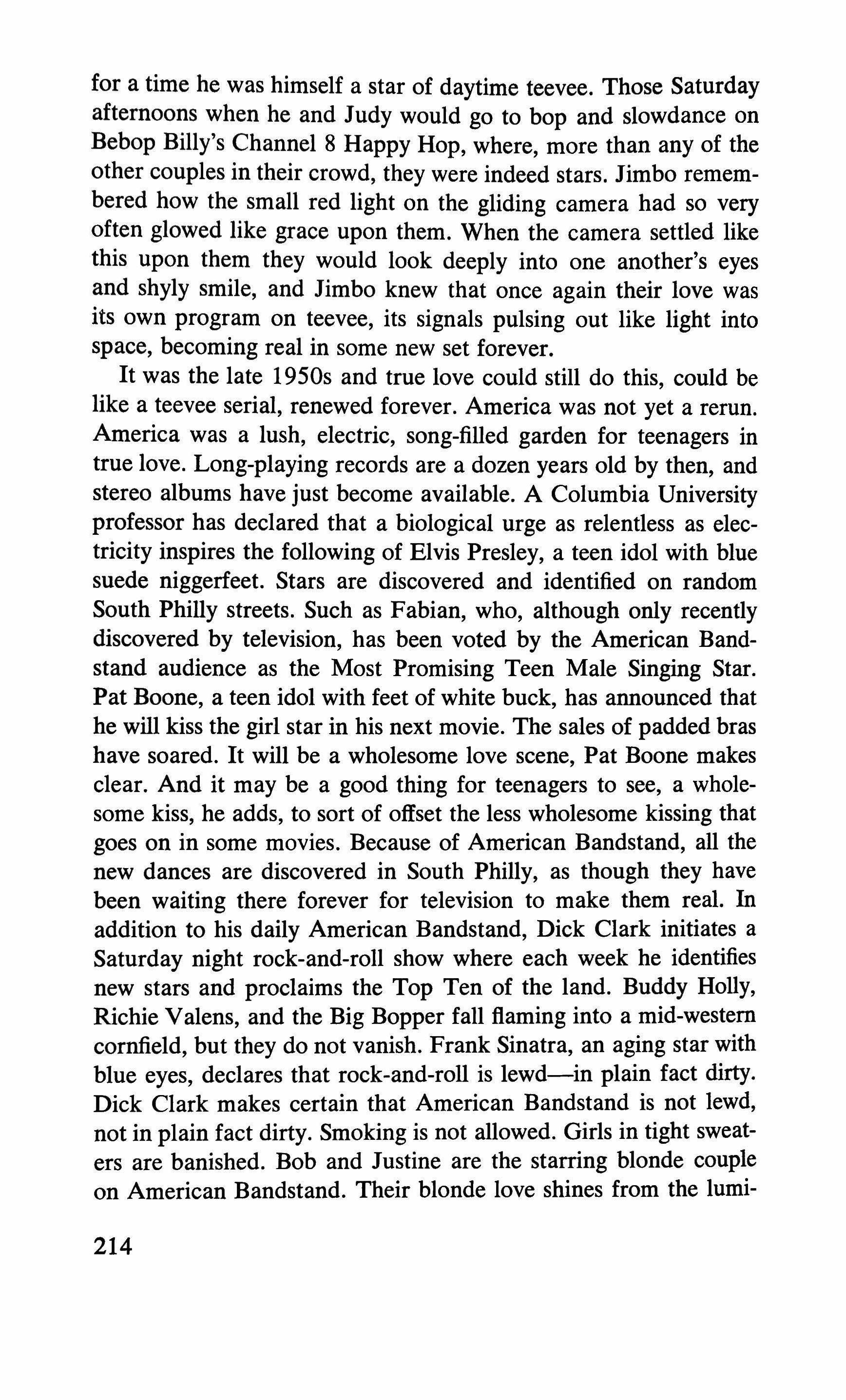
for a time he was himself a star of daytime teevee. Those Saturday afternoons when he and Judy would go to bop and slowdance on Bebop Billy's Channel 8 Happy Hop, where, more than any of the other couples in their crowd, they were indeed stars. Jimbo remembered how the small red light on the gliding camera had so very often glowed like grace upon them. When the camera settled like this upon them they would look deeply into one another's eyes and shyly smile, and Jimbo knew that once again their love was its own program on teevee, its signals pulsing out like light into space, becoming real in some new set forever. It was the late 1950s and true love could still do this, could be like a teevee serial, renewed forever. America was not yet a rerun. America was a lush, electric, song-filled garden for teenagers in true love. Long-playing records are a dozen years old by then, and stereo albums have just become available. A Columbia University professor has declared that a biological urge as relentless as electricity inspires the following of Elvis Presley, a teen idol with blue suede niggerfeet. Stars are discovered and identified on random South Philly streets. Such as Fabian, who, although only recently discovered by television, has been voted by the American Bandstand audience as the Most Promising Teen Male Singing Star. Pat Boone, a teen idol with feet of white buck, has announced that he will kiss the girl star in his next movie. The sales of padded bras have soared. It will be a wholesome love scene, Pat Boone makes clear. And it may be a good thing for teenagers to see, a wholesome kiss, he adds, to sort of offset the less wholesome kissing that goes on in some movies. Because of American Bandstand, all the new dances are discovered in South Philly, as though they have been waiting there forever for television to make them real. In addition to his daily American Bandstand, Dick Clark initiates a Saturday night rock-and-roll show where each week he identifies new stars and proclaims the Top Ten of the land. Buddy Holly, Richie Valens, and the Big Bopper fall flaming into a mid-western cornfield, but they do not vanish. Frank Sinatra, an aging star with blue eyes, declares that rock-and-roll is lewd-in plain fact dirty. Dick Clark makes certain that American Bandstand is not lewd, not in plain fact dirty. Smoking is not allowed. Girls in tight sweaters are banished. Bob and Justine are the starring blonde couple on American Bandstand. Their blonde love shines from the lumi-
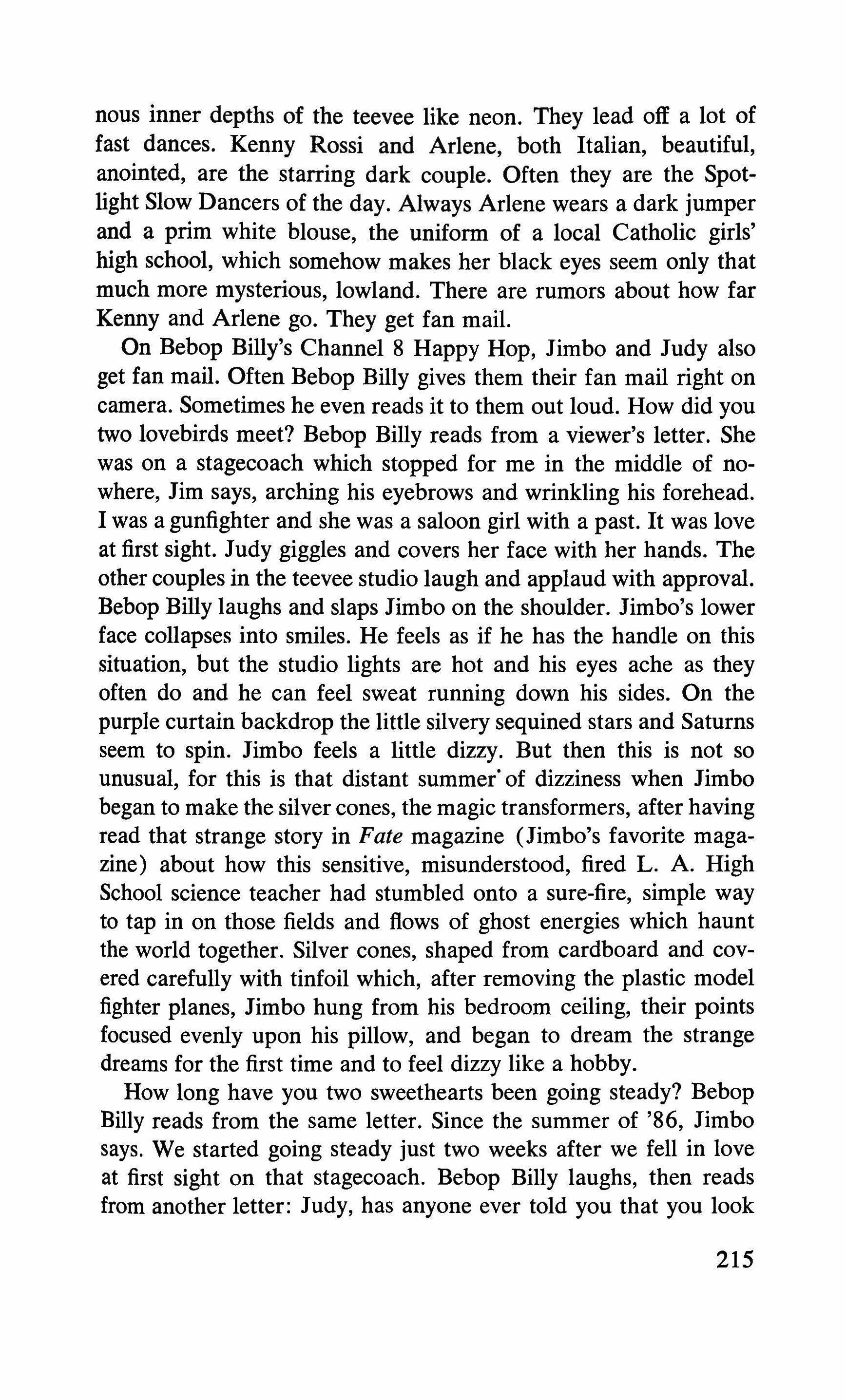
nous inner depths of the teevee like neon. They lead off a lot of fast dances. Kenny Rossi and Arlene, both Italian, beautiful, anointed, are the starring dark couple. Often they are the Spotlight Slow Dancers of the day. Always Arlene wears a dark jumper and a prim white blouse, the uniform of a local Catholic girls' high school, which somehow makes her black eyes seem only that much more mysterious, lowland. There are rumors about how far Kenny and Arlene go. They get fan mail.
On Bebop Billy's Channel 8 Happy Hop, Jimbo and Judy also get fan mail. Often Bebop Billy gives them their fan mail right on camera. Sometimes he even reads it to them out loud. How did you two lovebirds meet? Bebop Billy reads from a viewer's letter. She was on a stagecoach which stopped for me in the middle of nowhere, Jim says, arching his eyebrows and wrinkling his forehead. I was a gunfighter and she was a saloon girl with a past. It was love at first sight. Judy giggles and covers her face with her hands. The other couples in the teevee studio laugh and applaud with approval. Bebop Billy laughs and slaps Jimbo on the shoulder. Jimbo's lower face collapses into smiles. He feels as if he has the handle on this situation, but the studio lights are hot and his eyes ache as they often do and he can feel sweat running down his sides. On the purple curtain backdrop the little silvery sequined stars and Saturns seem to spin. Jimbo feels a little dizzy. But then this is not so unusual, for this is that distant summer' of dizziness when Jimbo began to make the silver cones, the magic transformers, after having read that strange story in Fate magazine (Jimbo's favorite magazine) about how this sensitive, misunderstood, fired L. A. High School science teacher had stumbled onto a sure-fire, simple way to tap in on those fields and flows of ghost energies which haunt the world together. Silver cones, shaped from cardboard and covered carefully with tinfoil which, after removing the plastic model fighter planes, Jimbo hung from his bedroom ceiling, their points focused evenly upon his pillow, and began to dream the strange dreams for the first time and to feel dizzy like a hobby. How long have you two sweethearts been going steady? Bebop Billy reads from the same letter. Since the summer of '86, Jimbo says. We started going steady just two weeks after we fell in love at first sight on that stagecoach. Bebop Billy laughs, then reads from another letter: Judy, has anyone ever told you that you look

just like Sandra Dee? Oh no, never, Judy says, again covering her face with her hands. Jimbo smiles, thinking of Judy's secret scrapbook, starring Sandra Dee, with its glossy collection of Sandra Dee movie magazine covers. And what about you? Bebop Billy asks Jimbo. Our viewer here writes that you are a deadringer for Tony Perkins: has anyone ever told you that? Well now now, Jimbo says, wrinkling his forehead, at one time or another I've had honeys tell me I was a deadringer for about every handsome hunk of star who ever hit Hollywood, by golly. But usually they tell me I look like the late, great James Dean. Jimbo flexes his muscles for the camera. Judy giggles. All the other couples, being swell witnesses, laugh. Bebop Billy laughs. Indeed Bebop Billy beams, beams. Always beaming, Jimbo thinks, and in spite of it old Bebop Billy looks, up close, whipped out as hell. Almost sad somehow. His sports coat, although pink and in style, is slightly rumpled. His handsome host face is red and puffy and he is sweating profusely. Being in television must take a lot of juice out of you, Jimbo thinks. And old Bebop Billy does bust his ass for teevee's sake. Besides Happy Hop, Bebop Billy also hosts the weekday Matinee Movie Machine, and each night on the late news he plays the wisecracking weatherman; then, to top it all off, every Saturday night at 11:30 sharp, decked out in a long black cape and sporting plastic vampire fangs, he rises up right there alive on camera from a coffin as Chilly Billllllly to sell used Chevrolets and to host Creature Features Till Dawn. You'd never catch my ass trying to make a living in teevee, Jimbo thinks to himself, confident at this time in his life of many avenues to stardom.
Well, here's one last fan letter, Bebop Billy says, and this video viewer wants to know if you two teenagers in love plan to be married someday. Yes and we plan to have twelve beautiful children too, Judy says, sucking her breath in as she talks, the way she does sometimes, more heartbreakingly cute than Sandra Dee would ever in any movie of her life dare to be. Jimbo's unruly dork begins to stiffen. Shit, he thinks, trying to concentrate on the Saturns and stars spinning silvery. Well, Bebop Billy says, I understand that today is a very very special day for you, little lady. Right? The big big day. Your birthday, right? And what's more it's not just any old birthday. Gang, our little Judy here is today Sweet Sixteen! Right, honey, Sweet Sixteen! Judy giggles. Jimbo's lower
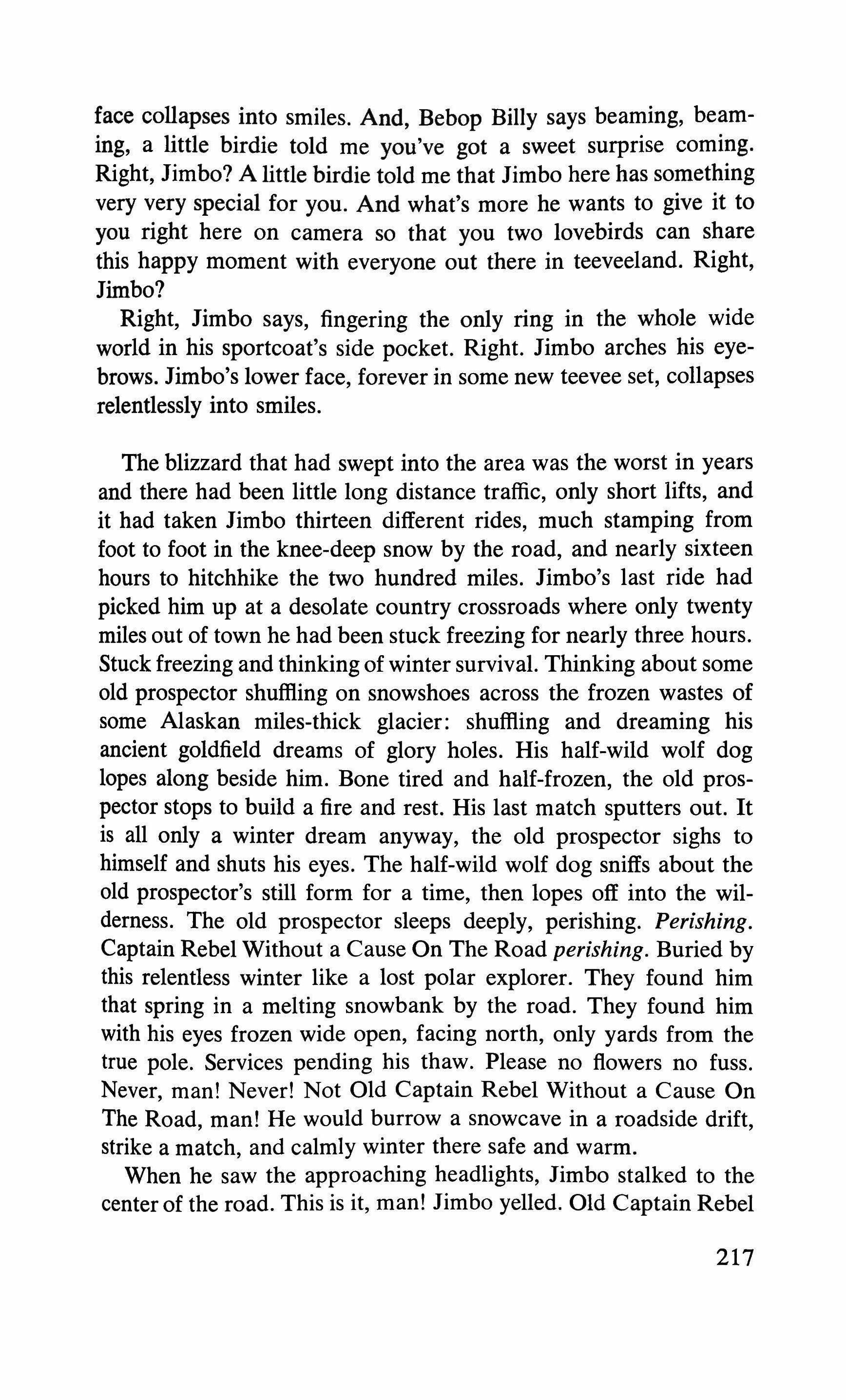
face collapses into smiles. And, Bebop Billy says beaming, beaming, a little birdie told me you've got a sweet surprise coming. Right, limbo? A little birdie told me that limbo here has something very very special for you. And what's more he wants to give it to you right here on camera so that you two lovebirds can share this happy moment with everyone out there in teeveeland. Right, limbo?
Right, limbo says, fingering the only ring in the whole wide world in his sportcoat's side pocket. Right. limbo arches his eyebrows. limbo's lower face, forever in some new teevee set, collapses relentlessly into smiles.
The blizzard that had swept into the area was the worst in years and there had been little long distance traffic, only short lifts, and it had taken limbo thirteen different rides, much stamping from foot to foot in the knee-deep snow by the road, and nearly sixteen hours to hitchhike the two hundred miles. limbo's last ride had picked him up at a desolate country crossroads where only twenty miles out of town he had been stuck freezing for nearly three hours. Stuck freezing and thinking of winter survival. Thinking about some old prospector shuffling on snowshoes across the frozen wastes of some Alaskan miles-thick glacier: shuffling and dreaming his ancient goldfield dreams of glory holes. His half-wild wolf dog lopes along beside him. Bone tired and half-frozen, the old prospector stops to build a fire and rest. His last match sputters out. It is all only a winter dream anyway, the old prospector sighs to himself and shuts his eyes. The half-wild wolf dog sniffs about the old prospector's still form for a time, then lopes off into the wilderness. The old prospector sleeps deeply, perishing. Perishing. Captain Rebel Without a Cause On The Road perishing. Buried by this relentless winter like a lost polar explorer. They found him that spring in a melting snowbank by the road. They found him with his eyes frozen wide open, facing north, only yards from the true pole. Services pending his thaw. Please no flowers no fuss. Never, man! Never! Not Old Captain Rebel Without a Cause On The Road, man! He would burrow a snowcave in a roadside drift, strike a match, and calmly winter there safe and warm.
When he saw the approaching headlights, limbo stalked to the center of the road. This is it, man! limbo yelled. Old Captain Rebel
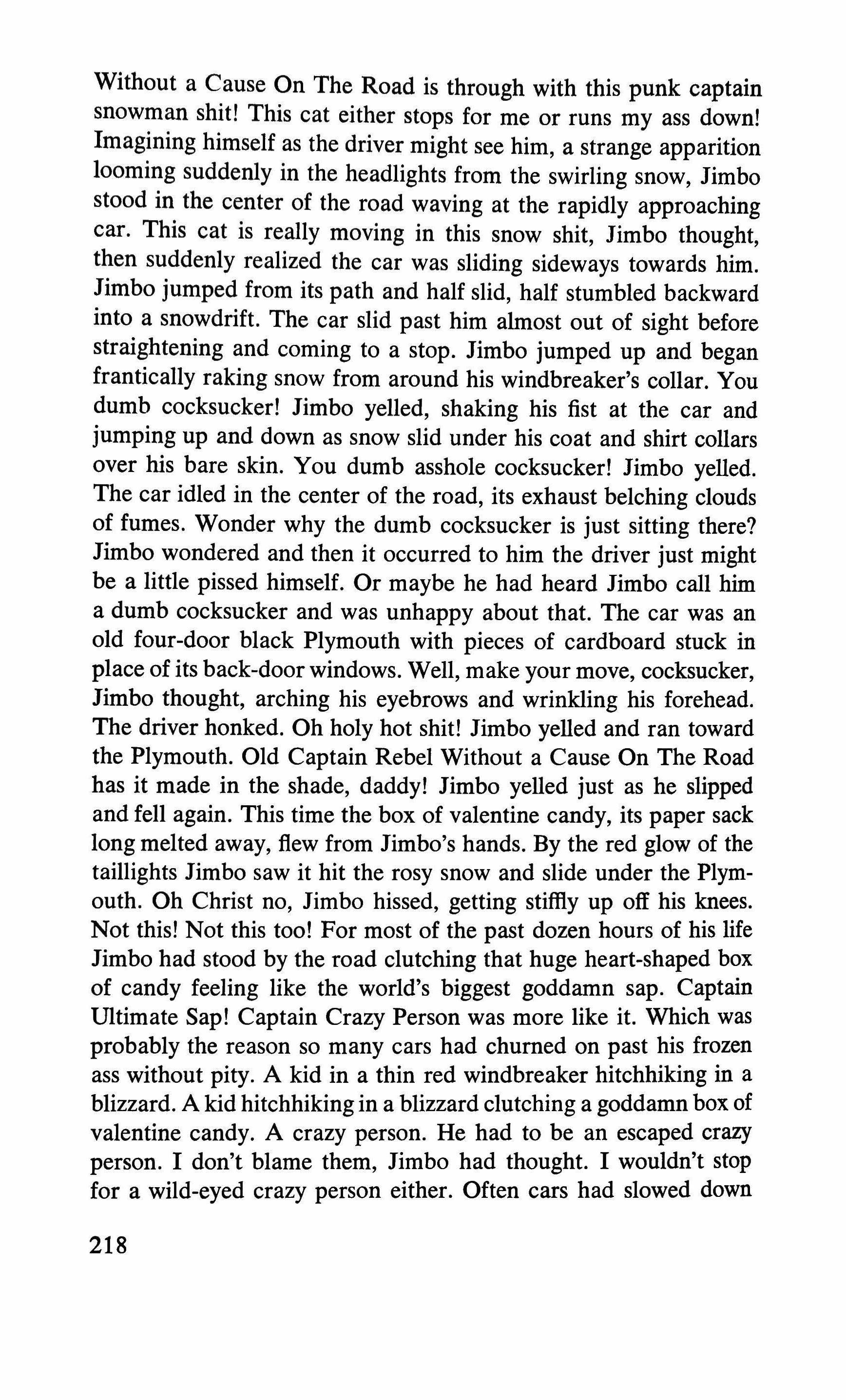
Without a Cause On The Road is through with this punk captain snowman shit! This cat either stops for me or runs my ass down! Imagining himself as the driver might see him, a strange apparition looming suddenly in the headlights from the swirling snow, limbo stood in the center of the road waving at the rapidly approaching car. This cat is really moving in this snow shit, limbo thought, then suddenly realized the car was sliding sideways towards him. limbo jumped from its path and half slid, half stumbled backward into a snowdrift. The car slid past him almost out of sight before straightening and coming to a stop. limbo jumped up and began frantically raking snow from around his windbreaker's collar. You dumb cocksucker! limbo yelled, shaking his fist at the car and jumping up and down as snow slid under his coat and shirt collars over his bare skin. You dumb asshole cocksucker! limbo yelled. The car idled in the center of the road, its exhaust belching clouds of fumes. Wonder why the dumb cocksucker is just sitting there? limbo wondered and then it occurred to him the driver just might be a little pissed himself. Or maybe he had heard limbo call him a dumb cocksucker and was unhappy about that. The car was an old four-door black Plymouth with pieces of cardboard stuck in place of its back-door windows. Well, make your move, cocksucker, limbo thought, arching his eyebrows and wrinkling his forehead. The driver honked. Oh holy hot shit! limbo yelled and ran toward the Plymouth. Old Captain Rebel Without a Cause On The Road has it made in the shade, daddy! limbo yelled just as he slipped and fell again. This time the box of valentine candy, its paper sack long melted away, flew from limbo's hands. By the red glow of the taillights limbo saw it hit the rosy snow and slide under the Plymouth. Oh Christ no, limbo hissed, getting stiffly up off his knees. Not this! Not this too! For most of the past dozen hours of his life limbo had stood by the road clutching that huge heart-shaped box of candy feeling like the world's biggest goddamn sap. Captain Ultimate Sap! Captain Crazy Person was more like it. Which was probably the reason so many cars had churned on past his frozen ass without pity. A kid in a thin red windbreaker hitchhiking in a blizzard. A kid hitchhiking in a blizzard clutching a goddamn box of valentine candy. A crazy person. He had to be an escaped crazy person. I don't blame them, limbo had thought. I wouldn't stop for a wild-eyed crazy person either. Often cars had slowed down

as they approached him only to get a closer look and speed up again. He had witnessed gawking, laughing faces through retreating rear windows all day. Kids had pointed at him and stuck out their tongues. One pimply-faced, fat teenage girl had given him the finger. Jimbo had stomped with dignity to the center of the road and returned the favor, holding his middle finger high in the snowy air at the fat, pimply face laughing in the retreating rear window. He had stood there in the center of the road yelling to her over and over, What does a fat, pimply cunt know about love! I know about love all right, Jimbo had said quietly to himself after the car disappeared in the blank, white distance. Sure thing. Captain Crazy Person knows all about goddamn love.
When he stumbled up to the waiting Plymouth Jimbo knocked on the side window and grinned so hard it hurt. It's under the car, Jimbo called to the driver, pointing under the car and shrugging his shoulders over and over. The driver, his gaunt whiskery face yellow in the dashboard light, scrutinized Jimbo with narrowed eyes. What's that? he called, making no move to roll down the window. It's under the car, Jimbo called, flapping his arms like helpless, foolish wings. It rolled under the car when I fell down. What did, boy? the driver called, his eyes now slits of suspicion. My box. The box I was carrying, Jimbo called. The driver blinked his wet eyes several times at Jimbo as though trying to focus them, then looked ahead up the snowy road illuminated in the headlights. He took a drink of some cloudy-looking liquid from a mason jar he had been holding between his thighs. Well, boy, he said at last, after reaching over and rolling down the window, you want me to pull her up? No. No thanks, Jimbo said. It might be under a wheel or something. It might get squashed. I'll have to crawl under and get it I guess, Jimbo said, and arching his eyebrows and wrinkling his forehead he dropped to his knees in the snow beside the car.
The old Plymouth was unheated and cold wind whipped in about the cardboard stuck in the back windows, hitting Jimbo's neck. He had not been dry for hours and he could not stop shivering. He studied his raw, bloody knuckles in the dashboard light. He had had to smash the dirty, frozen snow under the car with his fists before he could crawl beneath it to grope around for the candy box.
Some candy box. It rested on Jimbo's lap, and now and then he
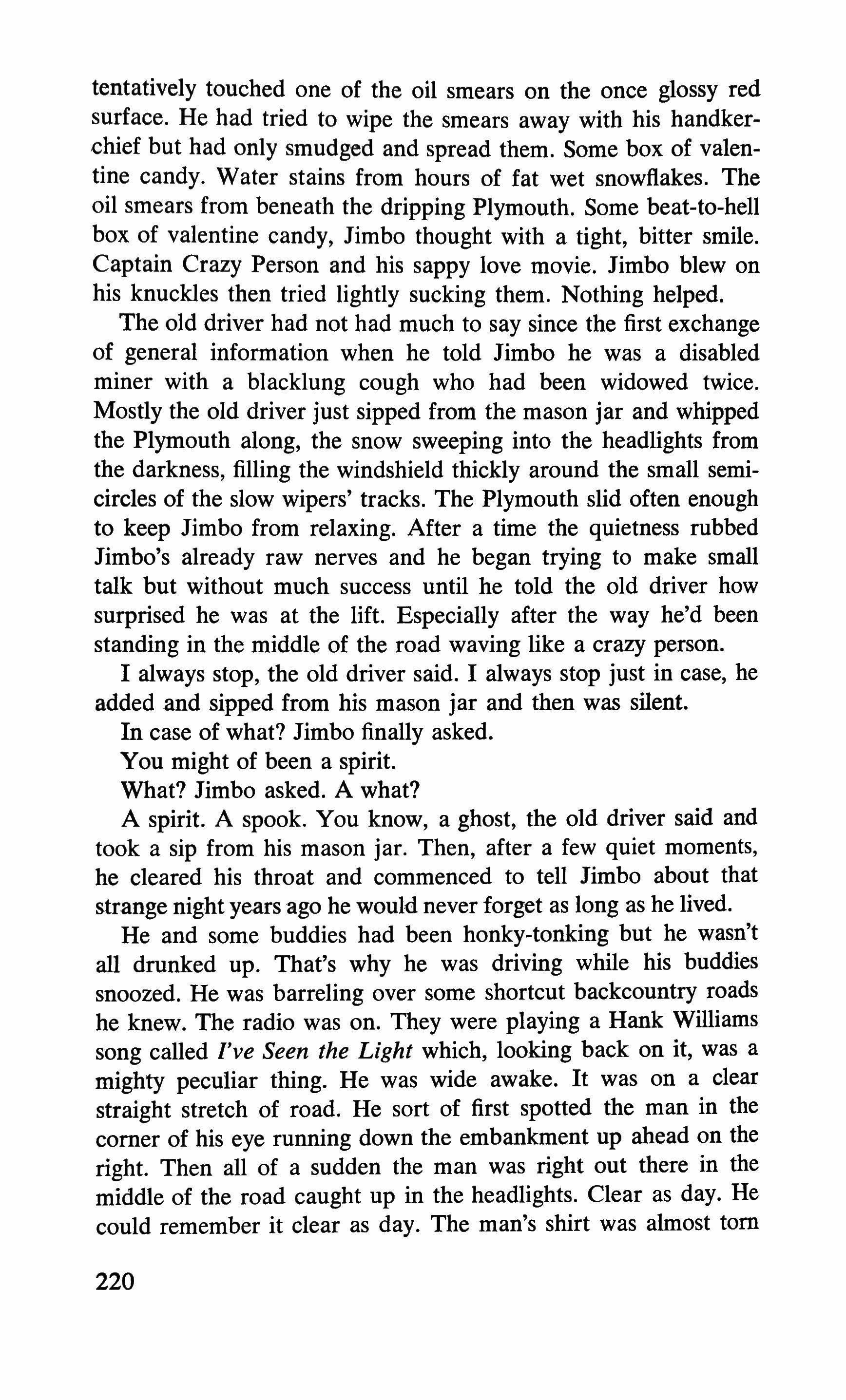
tentatively touched one of the oil smears on the once glossy red surface. He had tried to wipe the smears away with his handkerchief but had only smudged and spread them. Some box of valentine candy. Water stains from hours of fat wet snowflakes. The oil smears from beneath the dripping Plymouth. Some beat-to-hell box of valentine candy, limbo thought with a tight, bitter smile. Captain Crazy Person and his sappy love movie. limbo blew on his knuckles then tried lightly sucking them. Nothing helped. The old driver had not had much to say since the first exchange of general information when he told limbo he was a disabled miner with a blacklung cough who had been widowed twice. Mostly the old driver just sipped from the mason jar and whipped the Plymouth along, the snow sweeping into the headlights from the darkness, filling the windshield thickly around the small semicircles of the slow wipers' tracks. The Plymouth slid often enough to keep limbo from relaxing. After a time the quietness rubbed limbo's already raw nerves and he began trying to make small talk but without much success until he told the old driver how surprised he was at the lift. Especially after the way he'd been standing in the middle of the road waving like a crazy person. I always stop, the old driver said. I always stop just in case, he added and sipped from his mason jar and then was silent. In case of what? limbo finally asked.
You might of been a spirit. What? limbo asked. A what?
A spirit. A spook. You know, a ghost, the old driver said and took a sip from his mason jar. Then, after a few quiet moments, he cleared his throat and commenced to tell limbo about that strange night years ago he would never forget as long as he lived.
He and some buddies had been honky-tonking but he wasn't all drunked up. That's why he was driving while his buddies snoozed. He was barreling over some shortcut backcountry roads he knew. The radio was on. They were playing a Hank Williams song called I've Seen the Light which, looking back on it, was a mighty peculiar thing. He was wide awake. It was on a clear straight stretch of road. He sort of first spotted the man in the comer of his eye running down the embankment up ahead on the right. Then all of a sudden the man was right out there in the middle of the road caught up in the headlights. Clear as day. He could remember it clear as day. The man's shirt was almost tom
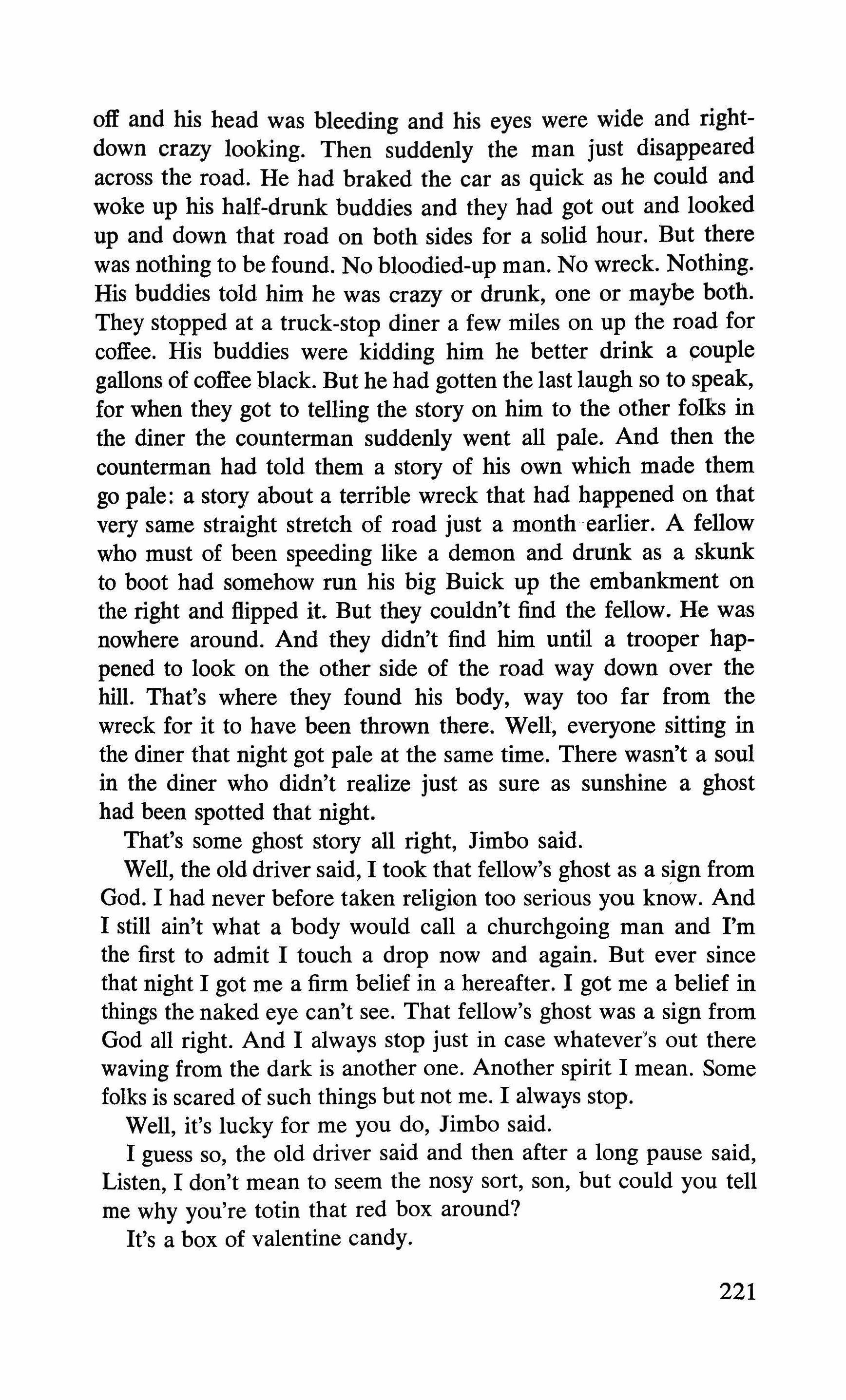
off and his head was bleeding and his eyes were wide and rightdown crazy looking. Then suddenly the man just disappeared across the road. He had braked the car as quick as he could and woke up his half-drunk buddies and they had got out and looked up and down that road on both sides for a solid hour. But there was nothing to be found. No bloodied-up man. No wreck. Nothing. His buddies told him he was crazy or drunk, one or maybe both. They stopped at a truck-stop diner a few miles on up the road for coffee. His buddies were kidding him he better drink a couple gallons of coffee black. But he had gotten the last laugh so to speak, for when they got to telling the story on him to the other folks in the diner the counterman suddenly went all pale. And then the counterman had told them a story of his own which made them go pale: a story about a terrible wreck that had happened on that very same straight stretch of road just a month -earlier. A fellow who must of been speeding like a demon and drunk as a skunk to boot had somehow run his big Buick up the embankment on the right and flipped it. But they couldn't find the fellow. He was nowhere around. And they didn't find him until a trooper happened to look on the other side of the road way down over the hill. That's where they found his body, way too far from the wreck for it to have been thrown there. Wen, everyone sitting in the diner that night got pale at the same time. There wasn't a soul in the diner who didn't realize just as sure as sunshine a ghost had been spotted that night.
That's some ghost story all right, Jimbo said.
Well, the old driver said, I took that fellow's ghost as a sign from God. I had never before taken religion too serious you know. And I still ain't what a body would call a churchgoing man and I'm the first to admit I touch a drop now and again. But ever since that night I got me a firm belief in a hereafter. I got me a belief in things the naked eye can't see. That fellow's ghost was a sign from God all right. And I always stop just in case whatever's out there waving from the dark is another one. Another spirit I mean. Some folks is scared of such things but not me. I always stop.
Well, it's lucky for me you do, Jimbo said.
I guess so, the old driver said and then after a long pause said, Listen, I don't mean to seem the nosy sort, son, but could you tell me why you're totin that red box around?
It's a box of valentine candy.
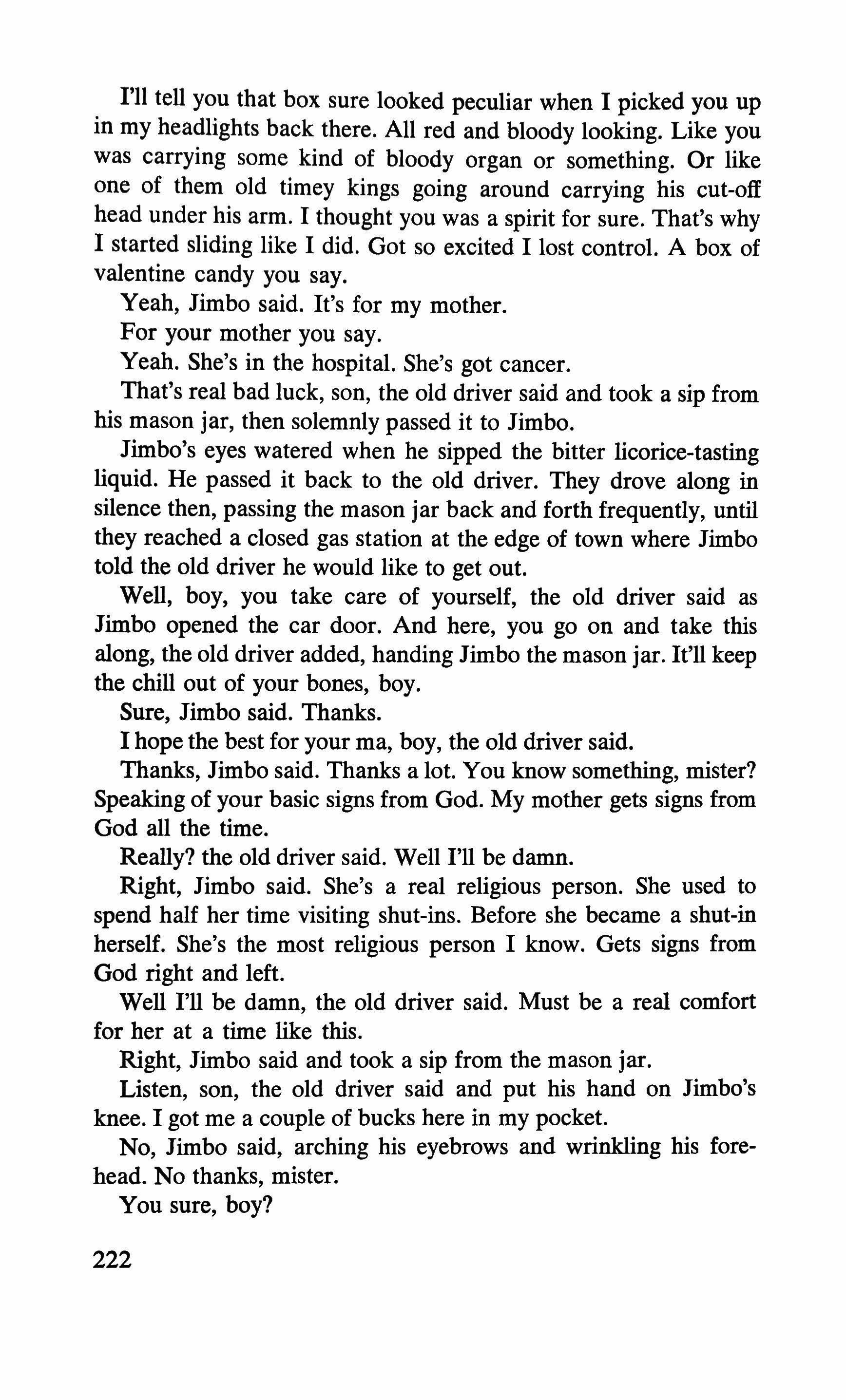
I'll tell you that box sure looked peculiar when I picked you up in my headlights back there. All red and bloody looking. Like you was carrying some kind of bloody organ or something. Or like one of them old timey kings going around carrying his cut-off head under his arm. I thought you was a spirit for sure. That's why I started sliding like I did. Got so excited I lost control. A box of valentine candy you say.
Yeah, limbo said. It's for my mother.
For your mother you say.
Yeah. She's in the hospital. She's got cancer.
That's real bad luck, son, the old driver said and took a sip from his mason jar, then solemnly passed it to limbo.
limbo's eyes watered when he sipped the bitter licorice-tasting liquid. He passed it back to the old driver. They drove along in silence then, passing the mason jar back and forth frequently, until they reached a closed gas station at the edge of town where limbo told the old driver he would like to get out.
Well, boy, you take care of yourself, the old driver said as limbo opened the car door. And here, you go on and take this along, the old driver added, handing limbo the mason jar. It'll keep the chill out of your bones, boy.
Sure, limbo said. Thanks.
I hope the best for your rna, boy, the old driver said. Thanks, limbo said. Thanks a lot. You know something, mister? Speaking of your basic signs from God. My mother gets signs from God all the time.
Really? the old driver said. Well I'll be damn.
Right, limbo said. She's a real religious person. She used to spend half her time visiting shut-ins. Before she became a shut-in herself. She's the most religious person I know. Gets signs from God right and left.
Well I'll be damn, the old driver said. Must be a real comfort for her at a time like this.
Right, limbo said and took a sip from the mason jar.
Listen, son, the old driver said and put his hand on limbo's knee. I got me a couple of bucks here in my pocket.
No, limbo said, arching his eyebrows and wrinkling his forehead. No thanks, mister.
You sure, boy?

I'm sure, Jimbo said and climbed out of the car.
Oh, hell, boy, the old driver said leaning across the seat. I don't mean to embarrass you or nothing. If you can use a couple of bucks go and take them. No strings.
No, Jimbo said. No thanks. I'm all right. I only have a few blocks to go to get where I'm going.
Well, don't piss against the wind, boy.
Jimbo stood in the now lightly falling snow and watched the old Plymouth until its taillights disappeared into the distance. Old Captain Rebel Without a Cause On The Road has an adventure, Jimbo said aloud and laughed. Well, almost an adventure anyway. He took a long pull from the mason jar. Jesus Christ, Jimbo thought, old Captain done got himself bout half shitfaced. They found old Captain that spring bobbing still shitfaced on the surface of the thawed glacier. Services pending de-pickling. Please no flowers no fuss. Jimbo laughed and took another long hit. Suddenly at the edge of his vision a polar bear moved. Or maybe it was a ghost. Who could tell for sure? Or maybe, just maybe, it was a gazebo. A gazebo ghost shuffling out there in the snow. Or maybe it was a whole ghost herd of gazebos. Who could be sure? A whole ghost herd of gazebos snorting clouds of desperate winter breath as they struggled relentlessly south. Jimbo polished off the moonshine in a final bigpull, then tossed the mason jar out into the dark hoping to hit a polar bear or ghost or gazebo. To hit whatever was out there. To show whatever was out there beyond the edge of his vision that old Captain Rebel Without a Cause On The Road was still armed and dangerous.
Jimbo stood in the dark street looking up at Judy's house through the trees of the expansive front yard. From the tall windows, all along the house's front, lights flared out brightly over the snow. Jimbo stood there in the dark street, wet, cold, totally exhausted, and he had never been happier. Well my ass has done arrived, Jimbo thought, arching his eyebrows and wrinkling his forehead. Old Captain Polar Explorer has done found the Ice Palace of the true north. Jimbo laughed quietly. The snow had stopped falling just as he had reached Judy's neighborhood. Talk about your basic signs from God! Old winter had just thrown in the towel, whipped. He had licked winter single-handed, by god! A thousand miles of
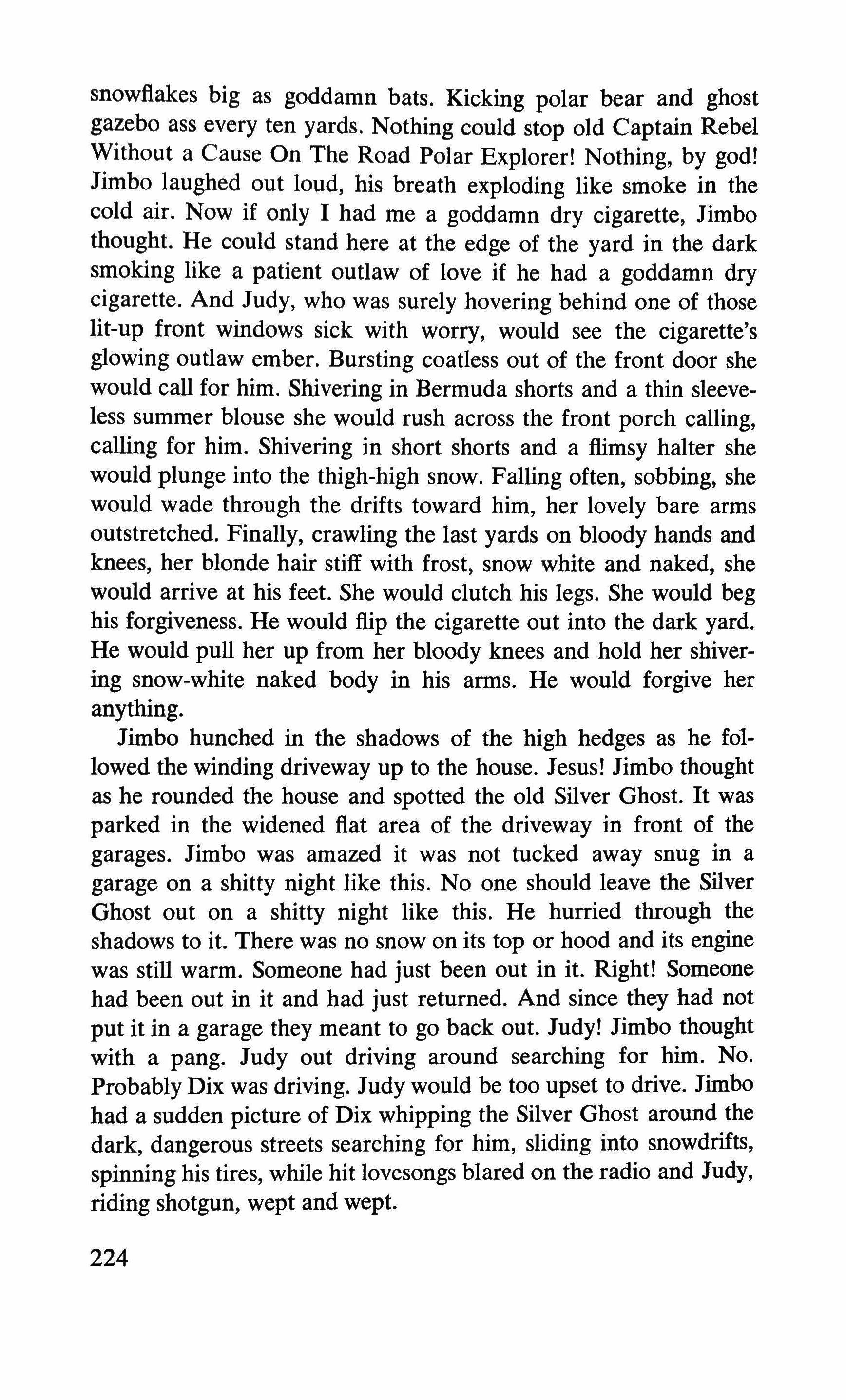
snowflakes big as goddamn bats. Kicking polar bear and ghost gazebo ass every ten yards. Nothing could stop old Captain Rebel Without a Cause On The Road Polar Explorer! Nothing, by god! Jimbo laughed out loud, his breath exploding like smoke in the cold air. Now if only I had me a goddamn dry cigarette, Jimbo thought. He could stand here at the edge of the yard in the dark smoking like a patient outlaw of love if he had a goddamn dry cigarette. And Judy, who was surely hovering behind one of those lit-up front windows sick with worry, would see the cigarette's glowing outlaw ember. Bursting coatless out of the front door she would call for him. Shivering in Bermuda shorts and a thin sleeveless summer blouse she would rush across the front porch calling, calling for him. Shivering in short shorts and a flimsy halter she would plunge into the thigh-high snow. Falling often, sobbing, she would wade through the drifts toward him, her lovely bare arms outstretched. Finally, crawling the last yards on bloody hands and knees, her blonde hair stiff with frost, snow white and naked, she would arrive at his feet. She would clutch his legs. She would beg his forgiveness. He would flip the cigarette out into the dark yard. He would pull her up from her bloody knees and hold her shivering snow-white naked body in his arms. He would forgive her anything.
Jimbo hunched in the shadows of the high hedges as he followed the winding driveway up to the house. Jesus! Jimbo thought as he rounded the house and spotted the old Silver Ghost. It was parked in the widened flat area of the driveway in front of the garages. Jimbo was amazed it was not tucked away snug in a garage on a shitty night like this. No one should leave the Silver Ghost out on a shitty night like this. He hurried through the shadows to it. There was no snow on its top or hood and its engine was still warm. Someone had just been out in it. Right! Someone had been out in it and had just returned. And since they had not put it in a garage they meant to go back out. Judy! Jimbo thought with a pang. Judy out driving around searching for him. No. Probably Dix was driving. Judy would be too upset to drive. Jimbo had a sudden picture of Dix whipping the Silver Ghost around the dark, dangerous streets searching for him, sliding into snowdrifts, spinning his tires, while hit lovesongs blared on the radio and Judy, riding shotgun, wept and wept.
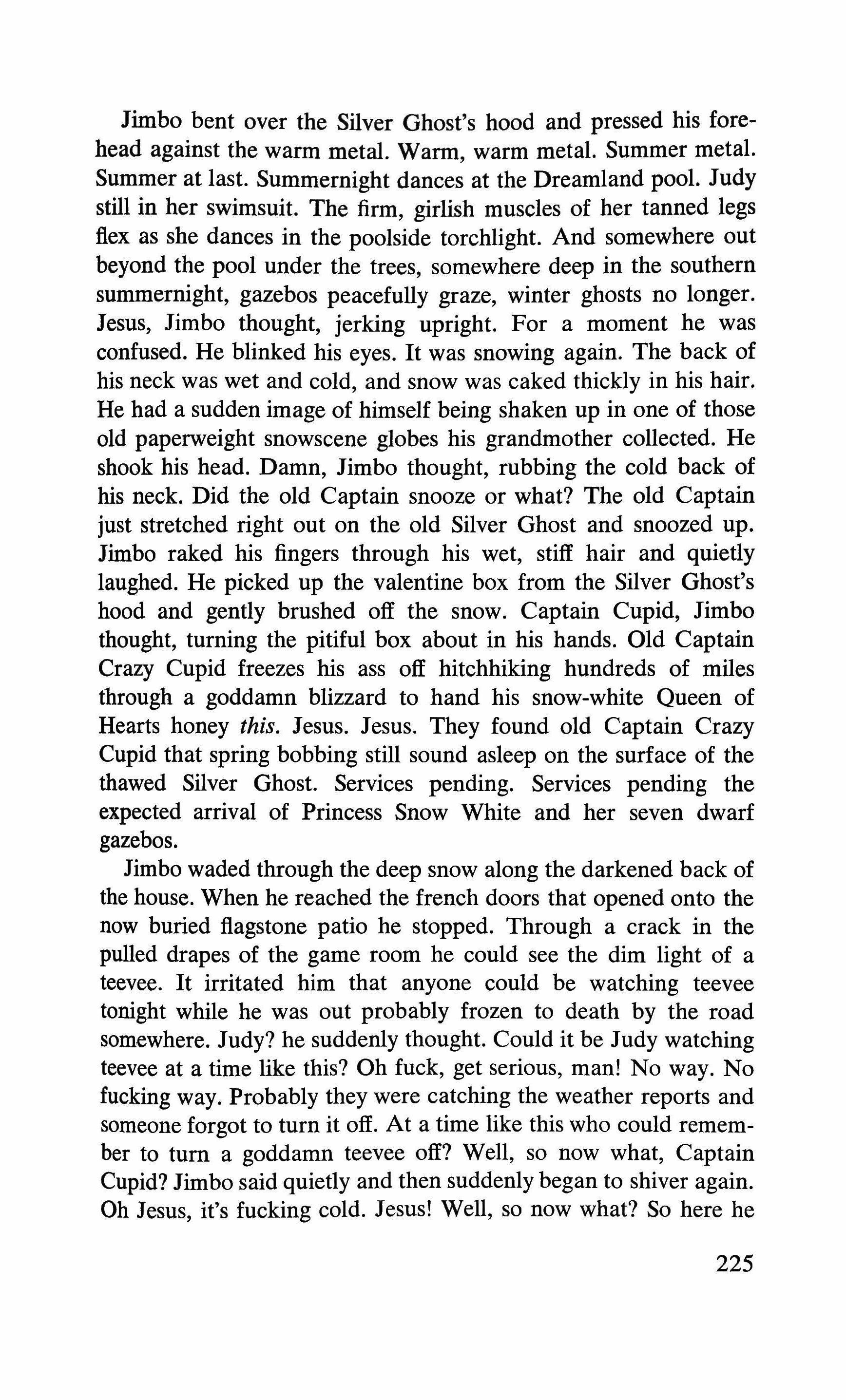
Jimbo bent over the Silver Ghost's hood and pressed his forehead against the warm metal. Warm, warm metal. Summer metal. Summer at last. Summernight dances at the Dreamland pool. Judy still in her swimsuit. The firm, girlish muscles of her tanned legs flex as she dances in the poolside torchlight. And somewhere out beyond the pool under the trees, somewhere deep in the southern summernight, gazebos peacefully graze, winter ghosts no longer. Jesus, Jimbo thought, jerking upright. For a moment he was confused. He blinked his eyes. It was snowing again. The back of his neck was wet and cold, and snow was caked thickly in his hair. He had a sudden image of himself being shaken up in one of those old paperweight snowscene globes his grandmother collected. He shook his head. Damn, Jimbo thought, rubbing the cold back of his neck. Did the old Captain snooze or what? The old Captain just stretched right out on the old Silver Ghost and snoozed up. Jimbo raked his fingers through his wet, stiff hair and quietly laughed. He picked up the valentine box from the Silver Ghost's hood and gently brushed off the snow. Captain Cupid, Jimbo thought, turning the pitiful box about in his hands. Old Captain Crazy Cupid freezes his ass off hitchhiking hundreds of miles through a goddamn blizzard to hand his snow-white Queen of Hearts honey this. Jesus. Jesus. They found old Captain Crazy Cupid that spring bobbing still sound asleep on the surface of the thawed Silver Ghost. Services pending. Services pending the expected arrival of Princess Snow White and her seven dwarf gazebos.
Jimbo waded through the deep snow along the darkened back of the house. When he reached the french doors that opened onto the now buried flagstone patio he stopped. Through a crack in the pulled drapes of the game room he could see the dim light of a teevee. It irritated him that anyone could be watching teevee tonight while he was out probably frozen to death by the road somewhere. Judy? he suddenly thought. Could it be Judy watching teevee at a time like this? Oh fuck, get serious, man! No way. No fucking way. Probably they were catching the weather reports and someone forgot to turn it off. At a time like this who could remember to turn a goddamn teevee off? Well, so now what, Captain Cupid? Jimbo said quietly and then suddenlybegan to shiver again. Oh Jesus, it's fucking cold. Jesus! Well, so now what? So here he
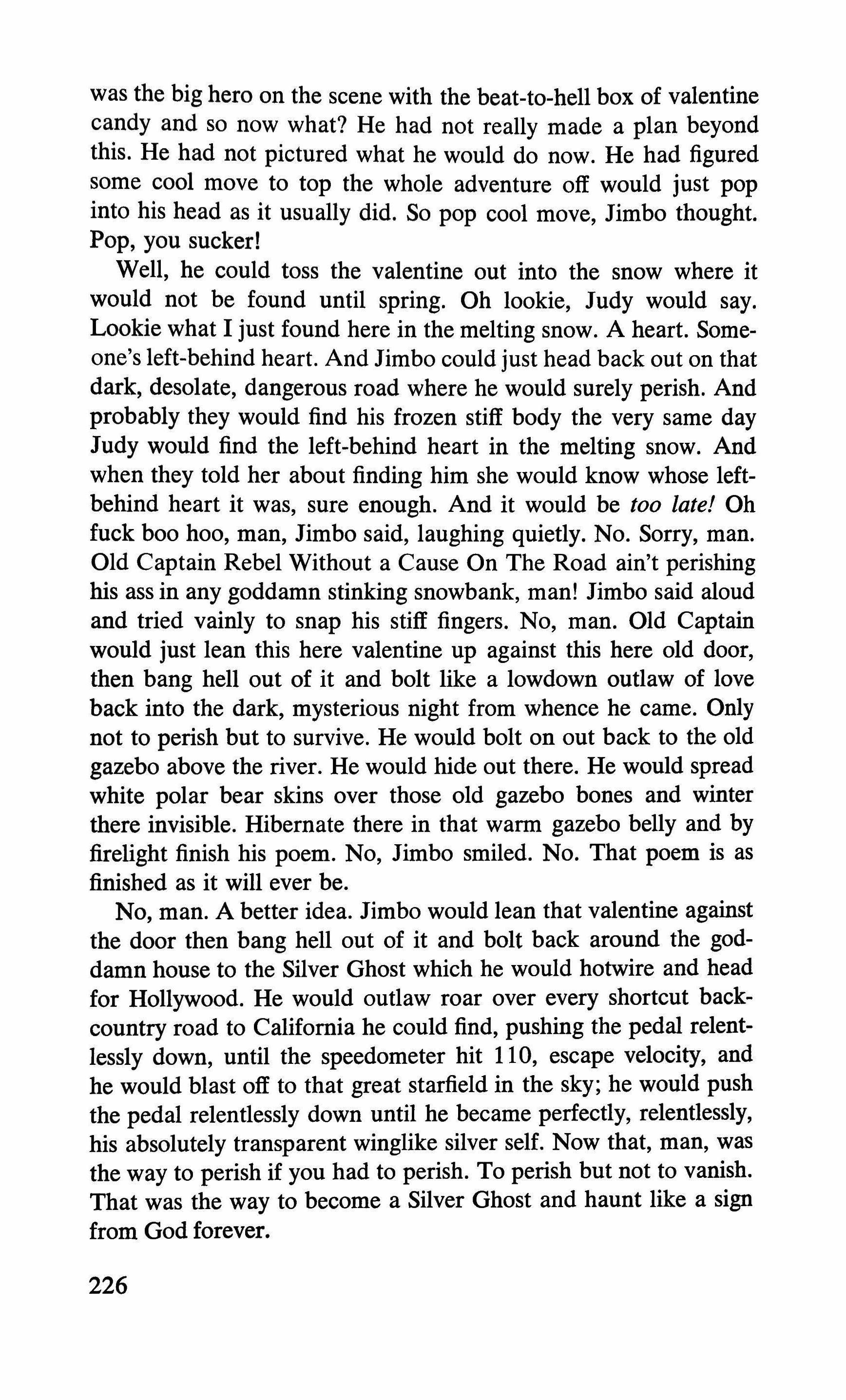
was the big hero on the scene with the beat-to-hell box of valentine candy and so now what? He had not really made a plan beyond this. He had not pictured what he would do now. He had figured some cool move to top the whole adventure off would just pop into his head as it usually did. So pop cool move, Jimbo thought. Pop, you sucker!
Well, he could toss the valentine out into the snow where it would not be found until spring. Oh lookie, Judy would say. Lookie what I just found here in the melting snow. A heart. Someone's left-behind heart. And Jimbo could just head back out on that dark, desolate, dangerous road where he would surely perish. And probably they would find his frozen stiff body the very same day Judy would find the left-behind heart in the melting snow. And when they told her about finding him she would know whose leftbehind heart it was, sure enough. And it would be too late! Oh fuck boo hoo, man, Jimbo said, laughing quietly. No. Sorry, man. Old Captain Rebel Without a Cause On The Road ain't perishing his ass in any goddamn stinking snowbank, man! Jimbo said aloud and tried vainly to snap his stiff fingers. No, man. Old Captain would just lean this here valentine up against this here old door, then bang hell out of it and bolt like a lowdown outlaw of love back into the dark, mysterious night from whence he came. Only not to perish but to survive. He would bolt on out back to the old gazebo above the river. He would hide out there. He would spread white polar bear skins over those old gazebo bones and winter there invisible. Hibernate there in that warm gazebo belly and by firelight finish his poem. No, Jimbo smiled. No. That poem is as finished as it will ever be.
No, man. A better idea. Jimbo would lean that valentine against the door then bang hell out of it and bolt back around the goddamn house to the Silver Ghost which he would hotwire and head for Hollywood. He would outlaw roar over every shortcut backcountry road to California he could find, pushing the pedal relentlessly down, until the speedometer hit 110, escape velocity, and he would blast off to that great starfield in the sky; he would push the pedal relentlessly down until he became perfectly, relentlessly, his absolutely transparent winglike silver self. Now that, man, was the way to perish if you had to perish. To perish but not to vanish. That was the way to become a Silver Ghost and haunt like a sign from God forever.
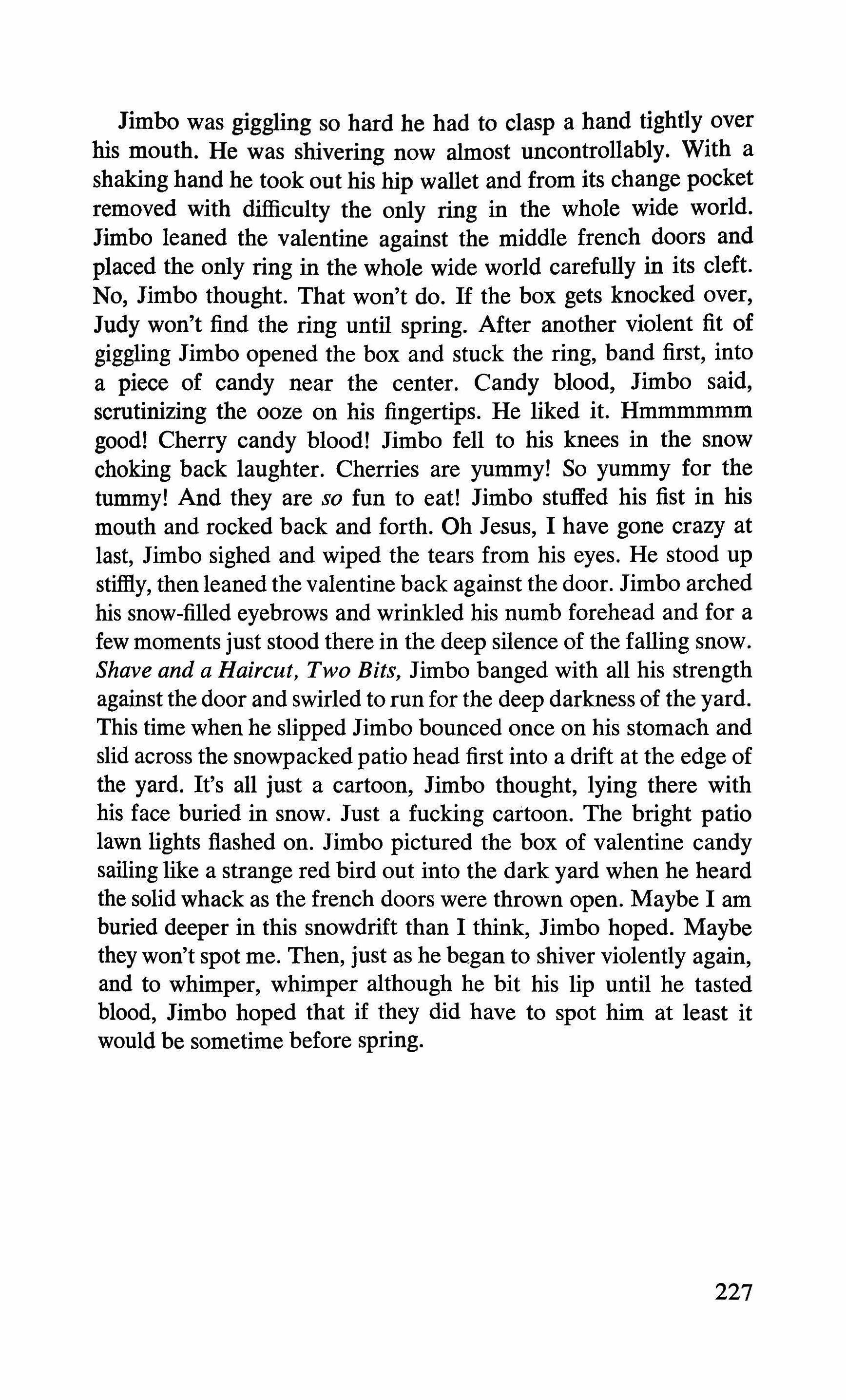
limbo was giggling so hard he had to clasp a hand tightly over his mouth. He was shivering now almost uncontrollably. With a shaking hand he took out his hip wallet and from its change pocket removed with difficulty the only ring in the whole wide world. Jimbo leaned the valentine against the middle french doors and placed the only ring in the whole wide world carefully in its cleft. No, Jimbo thought. That won't do. If the box gets knocked over, Judy won't find the ring until spring. After another violent fit of giggling Jimbo opened the box and stuck the ring, band first, into a piece of candy near the center. Candy blood, limbo said, scrutinizing the ooze on his fingertips. He liked it. Hmmmmmm good! Cherry candy blood! Jimbo fell to his knees in the snow choking back laughter. Cherries are yummy! So yummy for the tummy! And they are so fun to eat! Jimbo stuffed his fist in his mouth and rocked back and forth. Oh Jesus, I have gone crazy at last, Jimbo sighed and wiped the tears from his eyes. He stood up stiffly, then leaned the valentine back against the door. Jimbo arched his snow-filled eyebrows and wrinkled his numb forehead and for a few moments just stood there in the deep silence of the falling snow. Shave and a Haircut, Two Bits, Jimbo banged with all his strength against the door and swirled to run for the deep darkness of the yard. This time when he slipped Jimbo bounced once on his stomach and slid across the snowpackedpatio head first into a drift at the edge of the yard. It's all just a cartoon, Jimbo thought, lying there with his face buried in snow. lust a fucking cartoon. The bright patio lawn lights flashed on. Jimbo pictured the box of valentine candy sailing like a strange red bird out into the dark yard when he heard the solid whack as the french doors were thrown open. Maybe I am buried deeper in this snowdrift than I think, Jimbo hoped. Maybe they won't spot me. Then, just as he began to shiver violently again, and to whimper, whimper although he bit his lip until he tasted blood, Jimbo hoped that if they did have to spot him at least it would be sometime before spring.
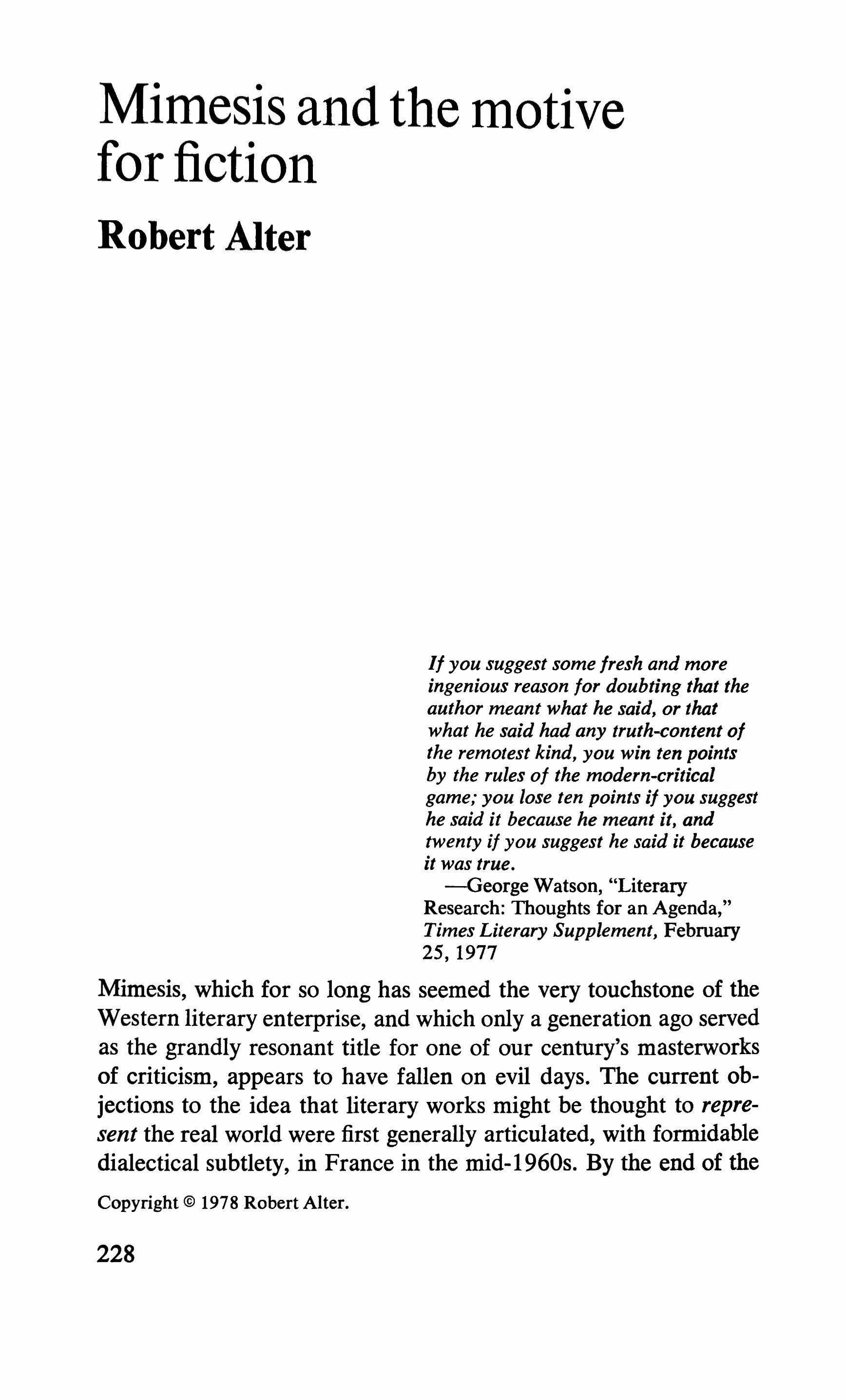
If you suggest some fresh and more ingenious reason for doubting that the author meant what he said, or that what he said had any truth-content of the remotest kind, you win ten points by the rules of the modern-critical game; you lose ten points if you suggest he said it because he meant it, and twenty if you suggest he said it because it was true.
-George Watson, "Literary Research: Thoughts for an Agenda," Times Literary Supplement, February 25, 1977
Mimesis, which for so long has seemed the very touchstone of the Western literary enterprise, and which only a generation ago served as the grandly resonant title for one of our century's masterworks of criticism, appears to have fallen on evil days. The current objections to the idea that literary works might be thought to represent the real world were first generally articulated, with formidable dialectical subtlety, in France in the mid-1960s. By the end of the
Copyright © 1978 Robert Alter.
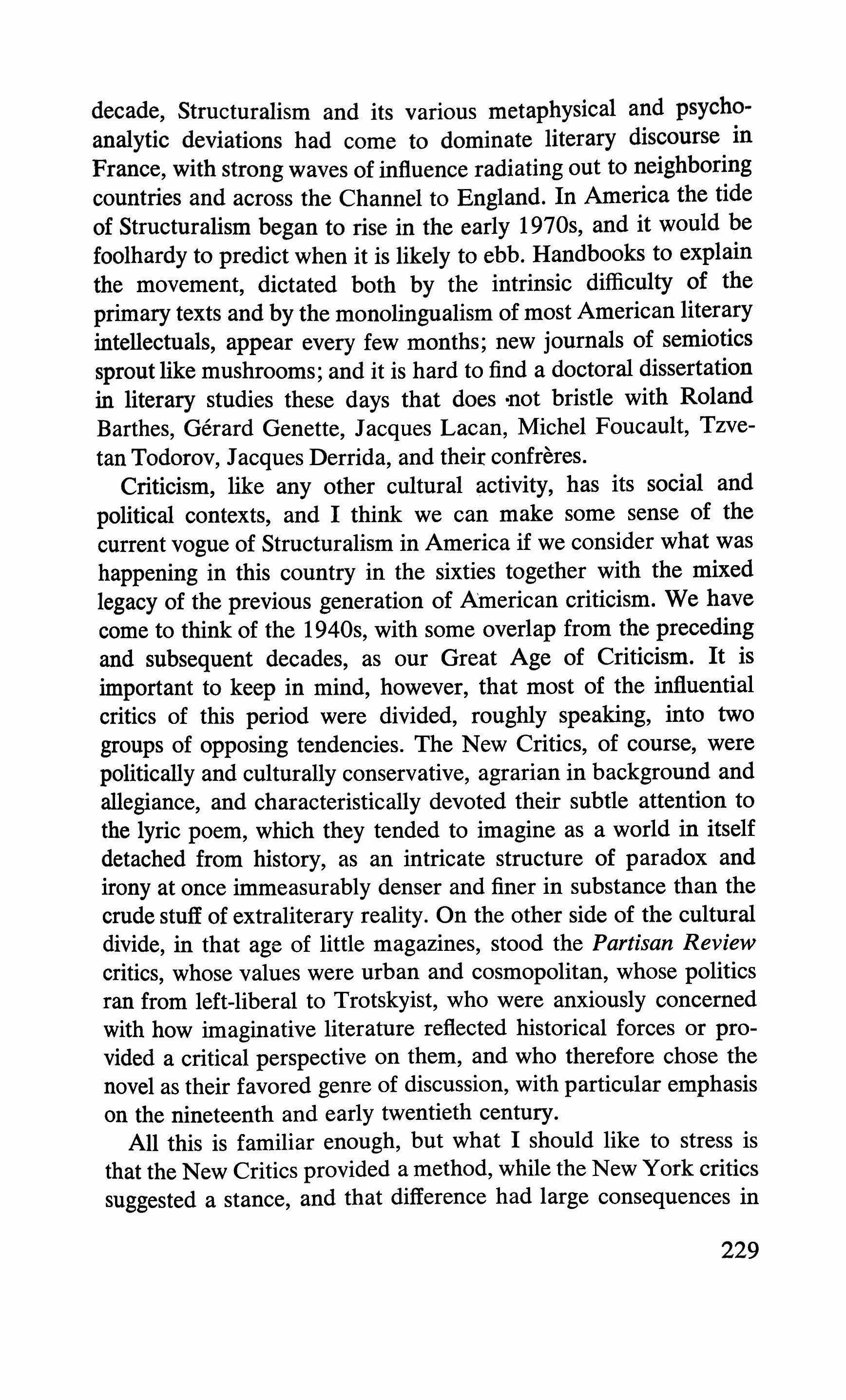
decade, Structuralism and its various metaphysical and psychoanalytic deviations had come to dominate literary discourse in France, with strong waves of influence radiating out to neighboring countries and across the Channel to England. In America the tide of Structuralism began to rise in the early 1970s, and it would be foolhardy to predict when it is likely to ebb. Handbooks to explain the movement, dictated both by the intrinsic difficulty of the primary texts and by the monolingualism of most American literary intellectuals, appear every few months; new journals of semiotics sprout like mushrooms; and it is hard to find a doctoral dissertation in literary studies these days that does -not bristle with Roland Barthes, Gerard Genette, Jacques Lacan, Michel Foucault, Tzvetan Todorov, Jacques Derrida, and their confreres.
Criticism, like any other cultural activity, has its social and political contexts, and I think we can make some sense of the current vogue of Structuralism in America if we consider what was happening in this country in the sixties together with the mixed legacy of the previous generation of American criticism. We have come to think of the 1940s, with some overlap from the preceding and subsequent decades, as our Great Age of Criticism. It is important to keep in mind, however, that most of the influential critics of this period were divided, roughly speaking, into two groups of opposing tendencies. The New Critics, of course, were politically and culturally conservative, agrarian in background and allegiance, and characteristically devoted their subtle attention to the lyric poem, which they tended to imagine as a world in itself detached from history, as an intricate structure of paradox and irony at once immeasurably denser and finer in substance than the crude stuff of extraliterary reality. On the other side of the cultural divide, in that age of little magazines, stood the Partisan Review critics, whose values were urban and cosmopolitan, whose politics ran from left-liberal to Trotskyist, who were anxiously concerned with how imaginative literature reflected historical forces or provided a critical perspective on them, and who therefore chose the novel as their favored genre of discussion, with particular emphasis on the nineteenth and early twentieth century.
All this is familiar enough, but what I should like to stress is that the New Critics provided a method, while the New York critics suggested a stance, and that difference had large consequences in 229
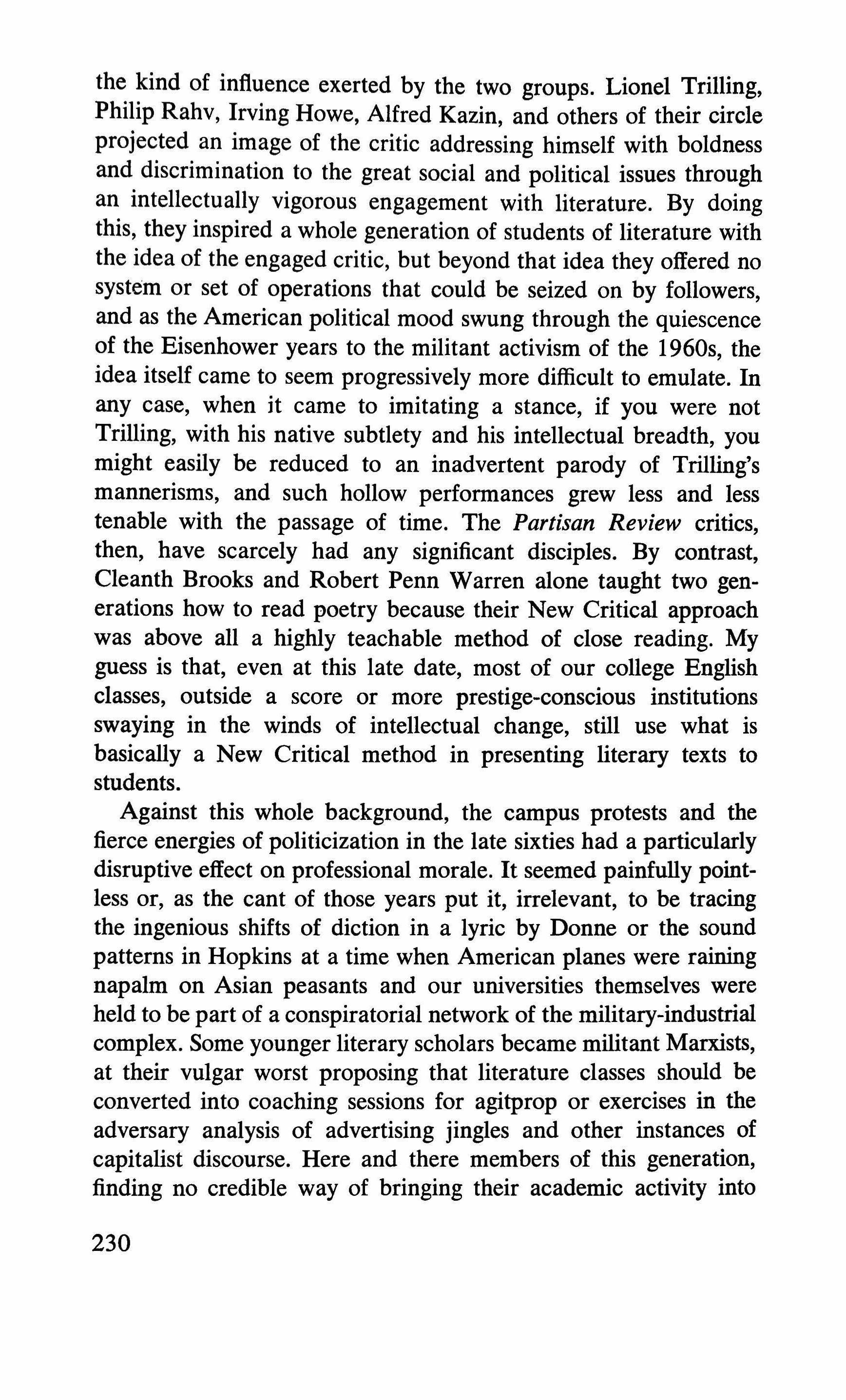
the kind of influence exerted by the two groups. Lionel Trilling, Philip Rahv, Irving Howe, Alfred Kazin, and others of their circle projected an image of the critic addressing himself with boldness and discrimination to the great social and political issues through an intellectually vigorous engagement with literature. By doing this, they inspired a whole generation of students of literature with the idea of the engaged critic, but beyond that idea they offered no system or set of operations that could be seized on by followers, and as the American political mood swung through the quiescence of the Eisenhower years to the militant activism of the 1960s, the idea itself came to seem progressively more difficult to emulate. In any case, when it came to imitating a stance, if you were not Trilling, with his native subtlety and his intellectual breadth, you might easily be reduced to an inadvertent parody of Trilling's mannerisms, and such hollow performances grew less and less tenable with the passage of time. The Partisan Review critics, then, have scarcely had any significant disciples. By contrast, Cleanth Brooks and Robert Penn Warren alone taught two generations how to read poetry because their New Critical approach was above all a highly teachable method of close reading. My guess is that, even at this late date, most of our college English classes, outside a score or more prestige-conscious institutions swaying in the winds of intellectual change, still use what is basically a New Critical method in presenting literary texts to students.
Against this whole background, the campus protests and the fierce energies of politicization in the late sixties had a particularly disruptive effect on professional morale. It seemed painfully pointless or, as the cant of those years put it, irrelevant, to be tracing the ingenious shifts of diction in a lyric by Donne or the sound patterns in Hopkins at a time when American planes were raining napalm on Asian peasants and our universities themselves were held to be part of a conspiratorial network of the military-industrial complex. Some younger literary scholars became militant Marxists, at their vulgar worst proposing that literature classes should be converted into coaching sessions for agitprop or exercises in the adversary analysis of advertising jingles and other instances of capitalist discourse. Here and there members of this generation, finding no credible way of bringing their academic activity into

phase with the disturbing realm of history in the making, simply dropped out of the profession.
By the early seventies, of course, the waves of political turbulence had generally subsided, and most of the literary scholars who had been at all caught up in this experience now found themselves high and dry, still drawing their university paychecks but without much sense of purpose in what they were doing. It was then that the Nouvelle Critique, or whatever could be gleaned of it from the immense cultural distance of an American vantage point, seemed to many to open up new vistas. Despite the Marxism or Maoism of some of its French proponents, it was as disengaged from history as the New Criticism had been, though on "scientific" rather than aestheticist grounds; and so it provided an attractive retreat from history after the disorienting involvements of the Vietnam years. By insisting, moreover, on the place of literary studies among the "human sciences," concerned with the structuring functions of the mind and with the interlocking systems of communication that constitute culture, it appeared to be offering the gravely challenged discipline an objective grounding. Concentrating on a series of complex taxonomic operations and on the definition of formal relations within literary works and in the corpus of literary discourse, with linguistics as its model, it swept away all the "essayistic" concerns of the New York critics-like politics, history, ethics, even psychology (in any guise except a metaphysicalized, Lacanian one which displaces discussion from individual personages to abstract systems).
This general approach, precisely because it is so alien to the customary Anglo-American habits of thinking about literature, seems to have a magnetic appeal for many American intellectuals at this moment in history. Disappointed with the inherited notions of literature as uniquely privileged discourse or as a profound expression of social and moral values, they are braced by the Cartesian spirit of the new French criticism. There is something satisfying in the idea that literature, for which such excessive claims had been made, can be pulled down to the level of all other modes of discourse; and, even more important, the prospect of a valuefree study of literature is positively consoling after the apparent failure of engaged criticism as an ideal. The formidable intellectual apparatus of Structuralism, moreover, lends it a particularly pow-
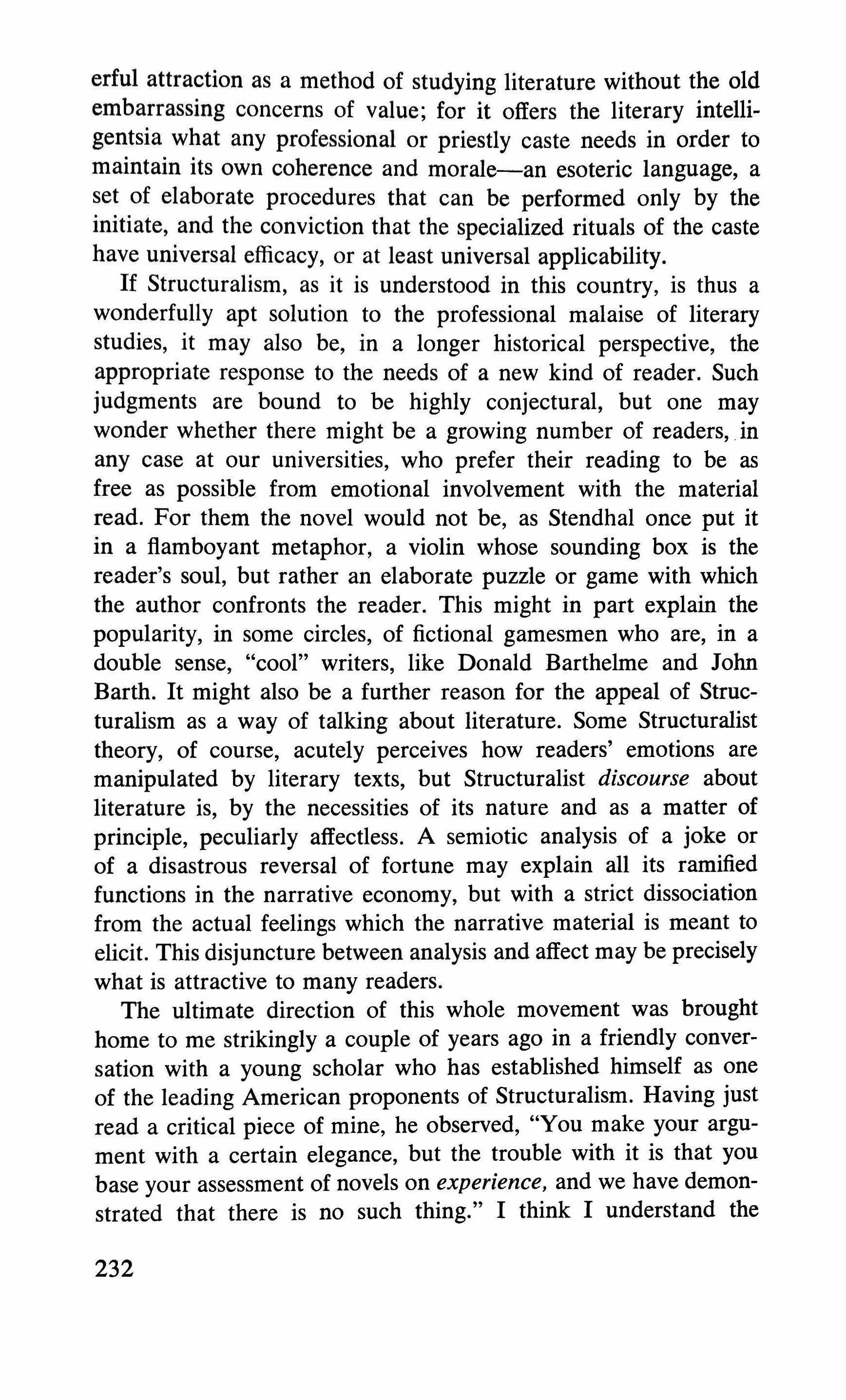
erful attraction as a method of studying literature without the old embarrassing concerns of value; for it offers the literary intelligentsia what any professional or priestly caste needs in order to maintain its own coherence and morale-an esoteric language, a set of elaborate procedures that can be performed only by the initiate, and the conviction that the specialized rituals of the caste have universal efficacy, or at least universal applicability.
If Structuralism, as it is understood in this country, is thus a wonderfully apt solution to the professional malaise of literary studies, it may also be, in a longer historical perspective, the appropriate response to the needs of a new kind of reader. Such judgments are bound to be highly conjectural, but one may wonder whether there might be a growing number of readers.. in any case at our universities, who prefer their reading to be as free as possible from emotional involvement with the material read. For them the novel would not be, as Stendhal once put it in a flamboyant metaphor, a violin whose sounding box is the reader's soul, but rather an elaborate puzzle or game with which the author confronts the reader. This might in part explain the popularity, in some circles, of fictional gamesmen who are, in a double sense, "cool" writers, like Donald Barthelme and John Barth. It might also be a further reason for the appeal of Structuralism as a way of talking about literature. Some Structuralist theory, of course, acutely perceives how readers' emotions are manipulated by literary texts, but Structuralist discourse about literature is, by the necessities of its nature and as a matter of principle, peculiarly affectless. A semiotic analysis of a joke or of a disastrous reversal of fortune may explain all its ramified functions in the narrative economy, but with a strict dissociation from the actual feelings which the narrative material is meant to elicit. This disjuncture between analysis and affect may be precisely what is attractive to many readers.
The ultimate direction of this whole movement was brought home to me strikingly a couple of years ago in a friendly conversation with a young scholar who has established himself as one of the leading American proponents of Structuralism. Having just read a critical piece of mine, he observed, "You make your argument with a certain elegance, but the trouble with it is that you base your assessment of novels on experience, and we have demonstrated that there is no such thing." I think I understand the
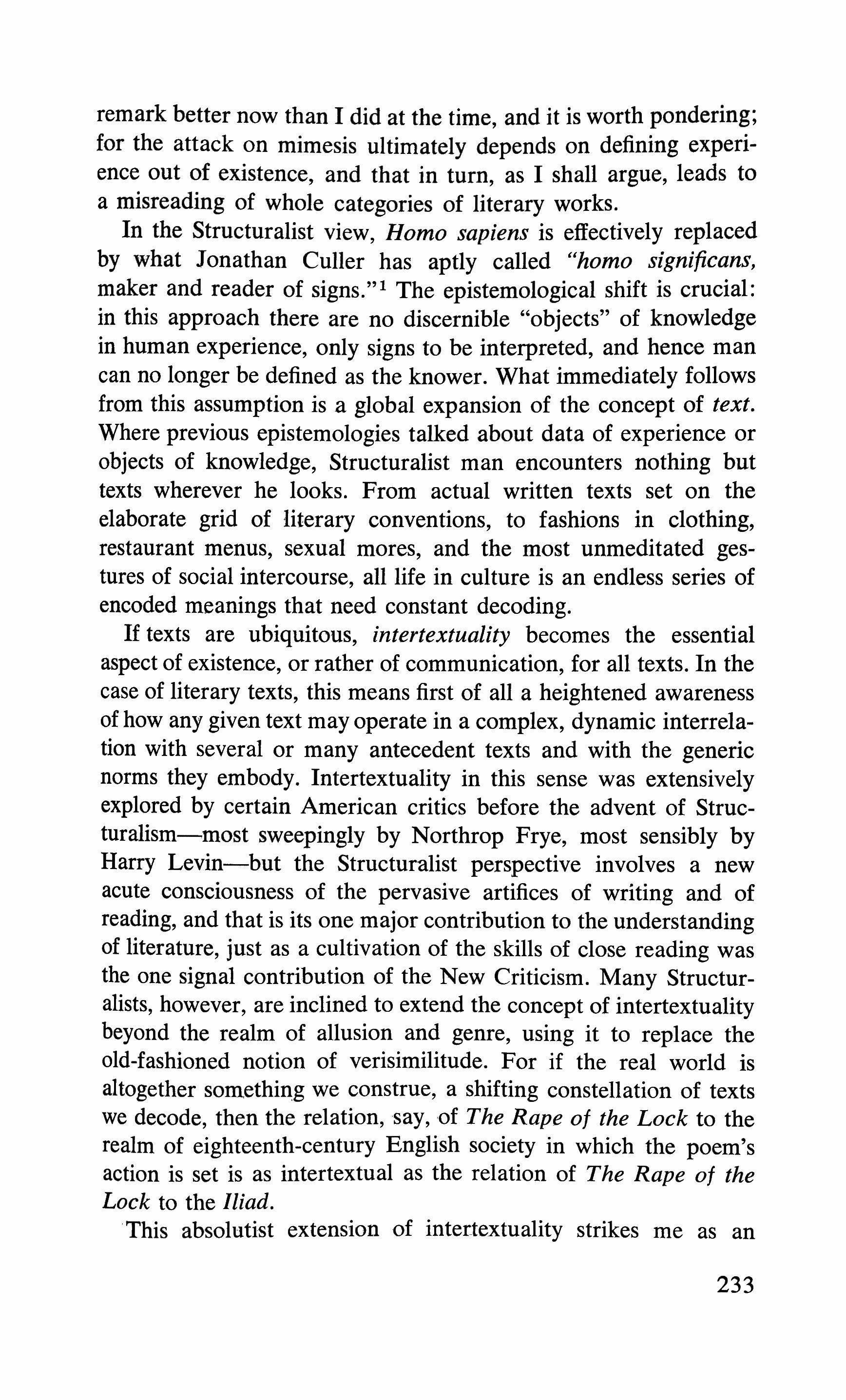
remark better now than I did at the time, and it is worth pondering; for the attack on mimesis ultimately depends on defining experience out of existence, and that in turn, as I shall argue, leads to a misreading of whole categories of literary works.
In the Structuralist view, Homo sapiens is effectively replaced by what Jonathan Culler has aptly called "homo significans, maker and reader of signs."! The epistemological shift is crucial: in this approach there are no discernible "objects" of knowledge in human experience, only signs to be interpreted, and hence man can no longer be defined as the knower. What immediately follows from this assumption is a global expansion of the concept of text. Where previous epistemologies talked about data of experience or objects of knowledge, Structuralist man encounters nothing but texts wherever he looks. From actual written texts set on the elaborate grid of literary conventions, to fashions in clothing, restaurant menus, sexual mores, and the most unmeditated gestures of social intercourse, all life in culture is an endless series of encoded meanings that need constant decoding. If texts are ubiquitous, intertextuality becomes the essential aspect of existence, or rather of communication, for all texts. In the case of literary texts, this means first of all a heightened awareness of how any given text may operate in a complex, dynamic interrelation with several or many antecedent texts and with the generic norms they embody. Intertextuality in this sense was extensively explored by certain American critics before the advent of Structuralism-most sweepingly by Northrop Frye, most sensibly by Harry Levin-but the Structuralist perspective involves a new acute consciousness of the pervasive artifices of writing and of reading, and that is its one major contribution to the understanding of literature, just as a cultivation of the skills of close reading was the one signal contribution of the New Criticism. Many Structuralists, however, are inclined to extend the concept of intertextuality beyond the realm of allusion and genre, using it to replace the old-fashioned notion of verisimilitude. For if the real world is altogether something we construe, a shifting constellation of texts we decode, then the relation, say, of The Rape of the Lock to the realm of eighteenth-century English society in which the poem's action is set is as intertextual as the relation of The Rape of the Lock to the Iliad.
This absolutist extension of intertextuality strikes me as an
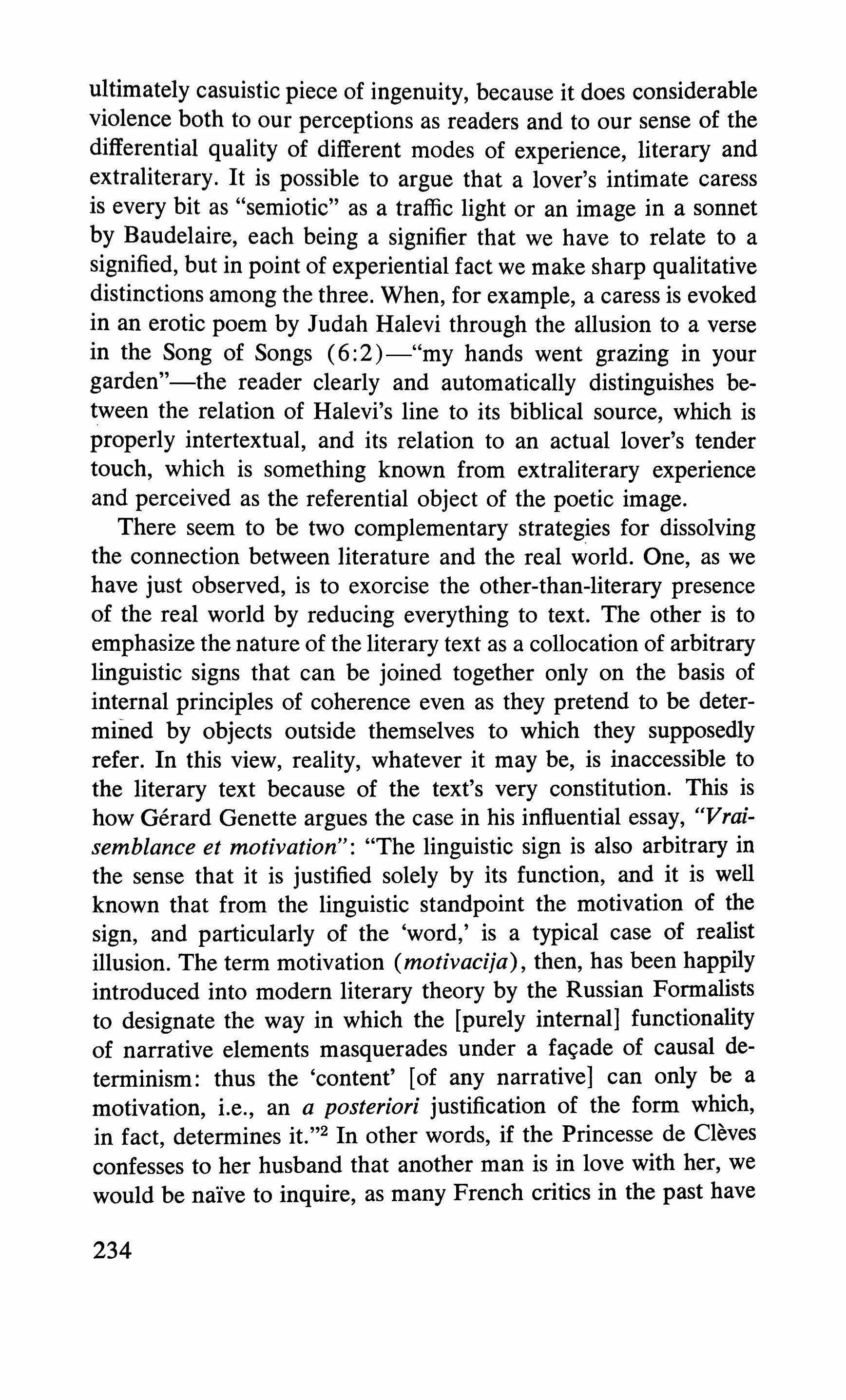
ultimately casuistic piece of ingenuity, because it does considerable violence both to our perceptions as readers and to our sense of the differential quality of different modes of experience, literary and extraliterary. It is possible to argue that a lover's intimate caress is every bit as "semiotic" as a traffic light or an image in a sonnet by Baudelaire, each being a signifier that we have to relate to a signified, but in point of experiential fact we make sharp qualitative distinctions among the three. When, for example, a caress is evoked in an erotic poem by Judah Halevi through the allusion to a verse in the Song of Songs (6:2)-"my hands went grazing in your garden"-the reader clearly and automatically distinguishes between the relation of Halevi's line to its biblical source, which is properly intertextual, and its relation to an actual lover's tender touch, which is something known from extraliterary experience and perceived as the referential object of the poetic image. There seem to be two complementary strategies for dissolving the connection between literature and the real world. One, as we have just observed, is to exorcise the other-than-literary presence of the real world by reducing everything to text. The other is to emphasize the nature of the literary text as a collocation of arbitrary linguistic signs that can be joined together only on the basis of internal principles of coherence even as they pretend to be determined by objects outside themselves to which they supposedly refer. In this view, reality, whatever it may be, is inaccessible to the literary text because of the text's very constitution. This is how Gerard Genette argues the case in his influential essay, "Vraisemblance et motivation": "The linguistic sign is also arbitrary in the sense that it is justified solely by its function, and it is well known that from the linguistic standpoint the motivation of the sign, and particularly of the 'word,' is a typical case of realist illusion. The term motivation (motivacija), then, has been happily introduced into modern literary theory by the Russian Formalists to designate the way in which the [purely internal] functionality of narrative elements masquerades under a facade of causal determinism: thus the 'content' [of any narrative] can only be a motivation, i.e., an a posteriori justification of the form which, in fact, determines it."? In other words, if the Princesse de Cleves confesses to her husband that another man is in love with her, we would be naive to inquire, as many French critics in the past have
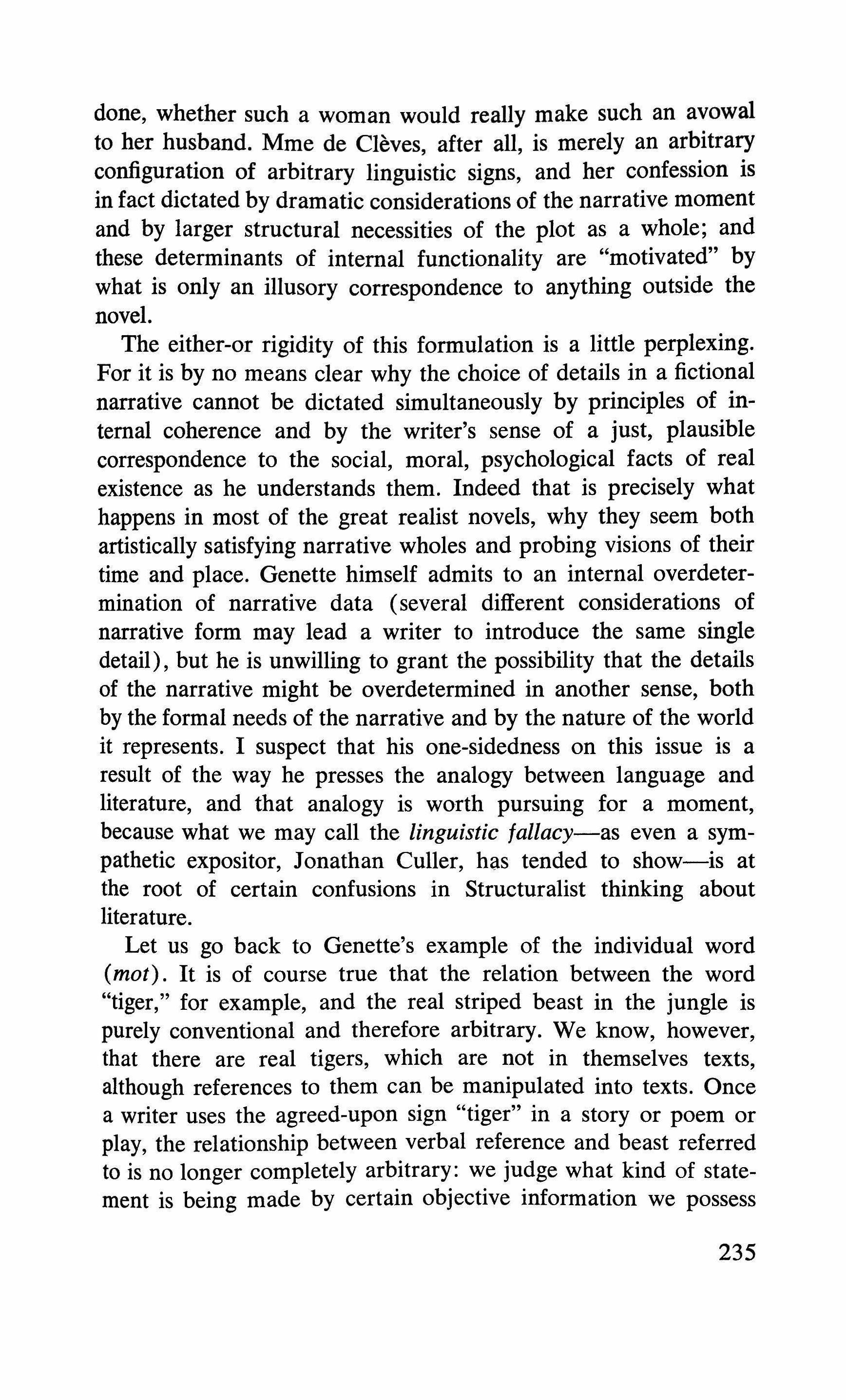
done, whether such a woman would really make such an avowal to her husband. Mme de Cleves, after all, is merely an arbitrary configuration of arbitrary linguistic signs, and her confession is in fact dictated by dramatic considerations of the narrative moment and by larger structural necessities of the plot as a whole; and these determinants of internal functionality are "motivated" by what is only an illusory correspondence to anything outside the novel.
The either-or rigidity of this formulation is a little perplexing. For it is by no means clear why the choice of details in a fictional narrative cannot be dictated simultaneously by principles of internal coherence and by the writer's sense of a just, plausible correspondence to the social, moral, psychological facts of real existence as he understands them. Indeed that is precisely what happens in most of the great realist novels, why they seem both artistically satisfying narrative wholes and probing visions of their time and place. Genette himself admits to an internal overdetermination of narrative data (several different considerations of narrative form may lead a writer to introduce the same single detail), but he is unwilling to grant the possibility that the details of the narrative might be overdetermined in another sense, both by the formal needs of the narrative and by the nature of the world it represents. I suspect that his one-sidedness on this issue is a result of the way he presses the analogy between language and literature, and that analogy is worth pursuing for a moment, because what we may call the linguistic fallacy-as even a sympathetic expositor, Jonathan Culler, has tended to show-is at the root of certain confusions in Structuralist thinking about literature.
Let us go back to Genette's example of the individual word (mot). It is of course true that the relation between the word "tiger," for example, and the real striped beast in the jungle is purely conventional and therefore arbitrary. We know, however, that there are real tigers, which are not in themselves texts, although references to them can be manipulated into texts. Once a writer uses the agreed-upon sign "tiger" in a story or poem or play, the relationship between verbal reference and beast referred to is no longer completely arbitrary: we judge what kind of statement is being made by certain objective information we possess
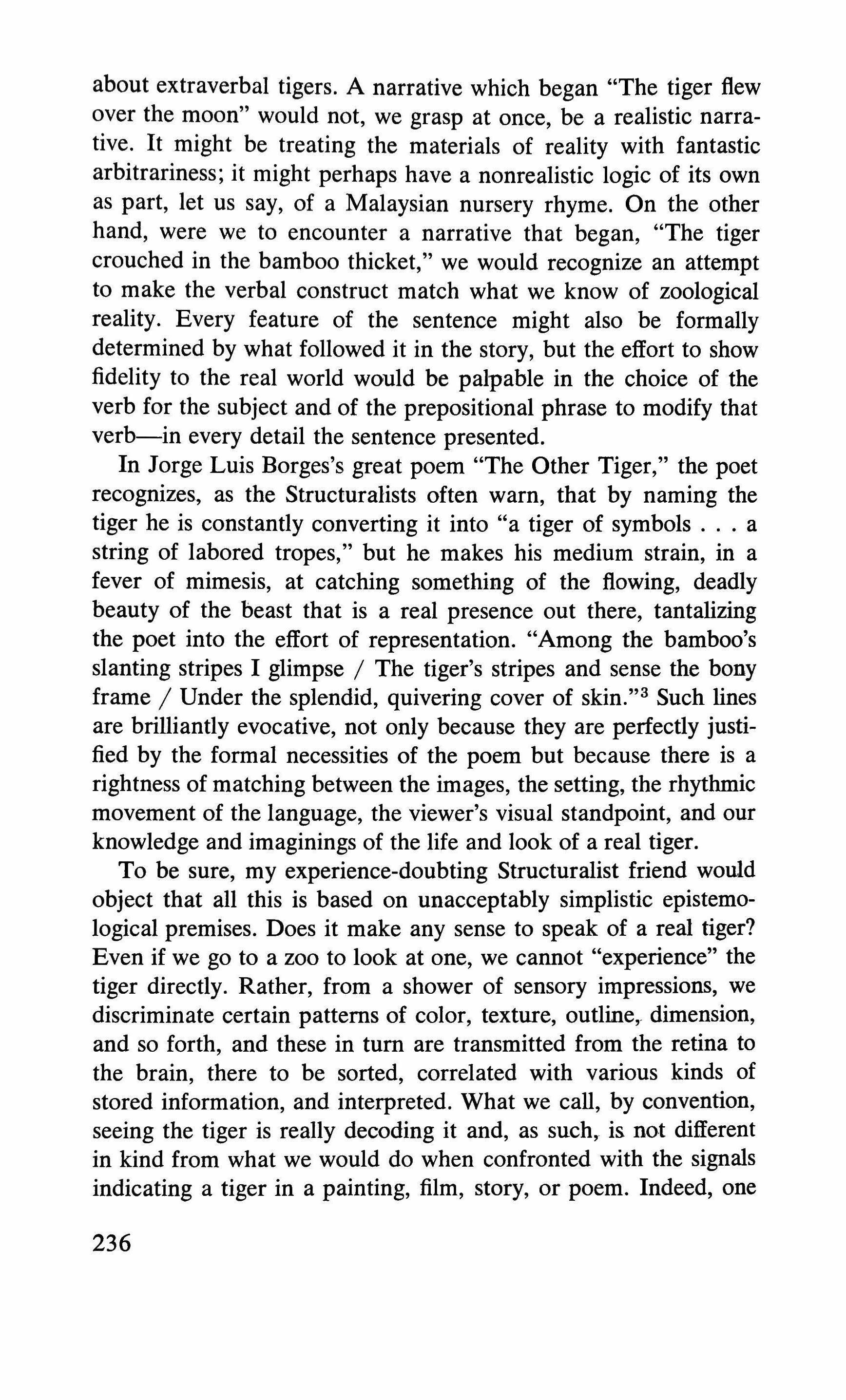
about extraverbal tigers. A narrative which began "The tiger flew over the moon" would not, we grasp at once, be a realistic narrative. It might be treating the materials of reality with fantastic arbitrariness; it might perhaps have a nonrealistic logic of its own as part, let us say, of a Malaysian nursery rhyme. On the other hand, were we to encounter a narrative that began, "The tiger crouched in the bamboo thicket," we would recognize an attempt to make the verbal construct match what we know of zoological reality. Every feature of the sentence might also be formally determined by what followed it in the story, but the effort to show fidelity to the real world would be palpable in the choice of the verb for the subject and of the prepositional phrase to modify that verb-in every detail the sentence presented.
In Jorge Luis Borges's great poem "The Other Tiger," the poet recognizes, as the Structuralists often warn, that by naming the tiger he is constantly converting it into "a tiger of symbols a string of labored tropes," but he makes his medium strain, in a fever of mimesis, at catching something of the flowing, deadly beauty of the beast that is a real presence out there, tantalizing the poet into the effort of representation. "Among the bamboo's slanting stripes I glimpse / The tiger's stripes and sense the bony frame / Under the splendid, quivering cover of skin.'?' Such lines are brilliantly evocative, not only because they are perfectly justified by the formal necessities of the poem but because there is a rightness of matching between the images, the setting, the rhythmic movement of the language, the viewer's visual standpoint, and our knowledge and imaginings of the life and look of a real tiger.
To be sure, my experience-doubting Structuralist friend would object that all this is based on unacceptably simplistic epistemological premises. Does it make any sense to speak of a real tiger? Even if we go to a zoo to look at one, we cannot "experience" the tiger directly. Rather, from a shower of sensory impressions, we discriminate certain patterns of color, texture, outline, dimension, and so forth, and these in tum are transmitted from the retina to the brain, there to be sorted, correlated with various kinds of stored information, and interpreted. What we call, by convention, seeing the tiger is really decoding it and, as such, is. not different in kind from what we would do when confronted with the signals indicating a tiger in a painting, film, story, or poem. Indeed, one
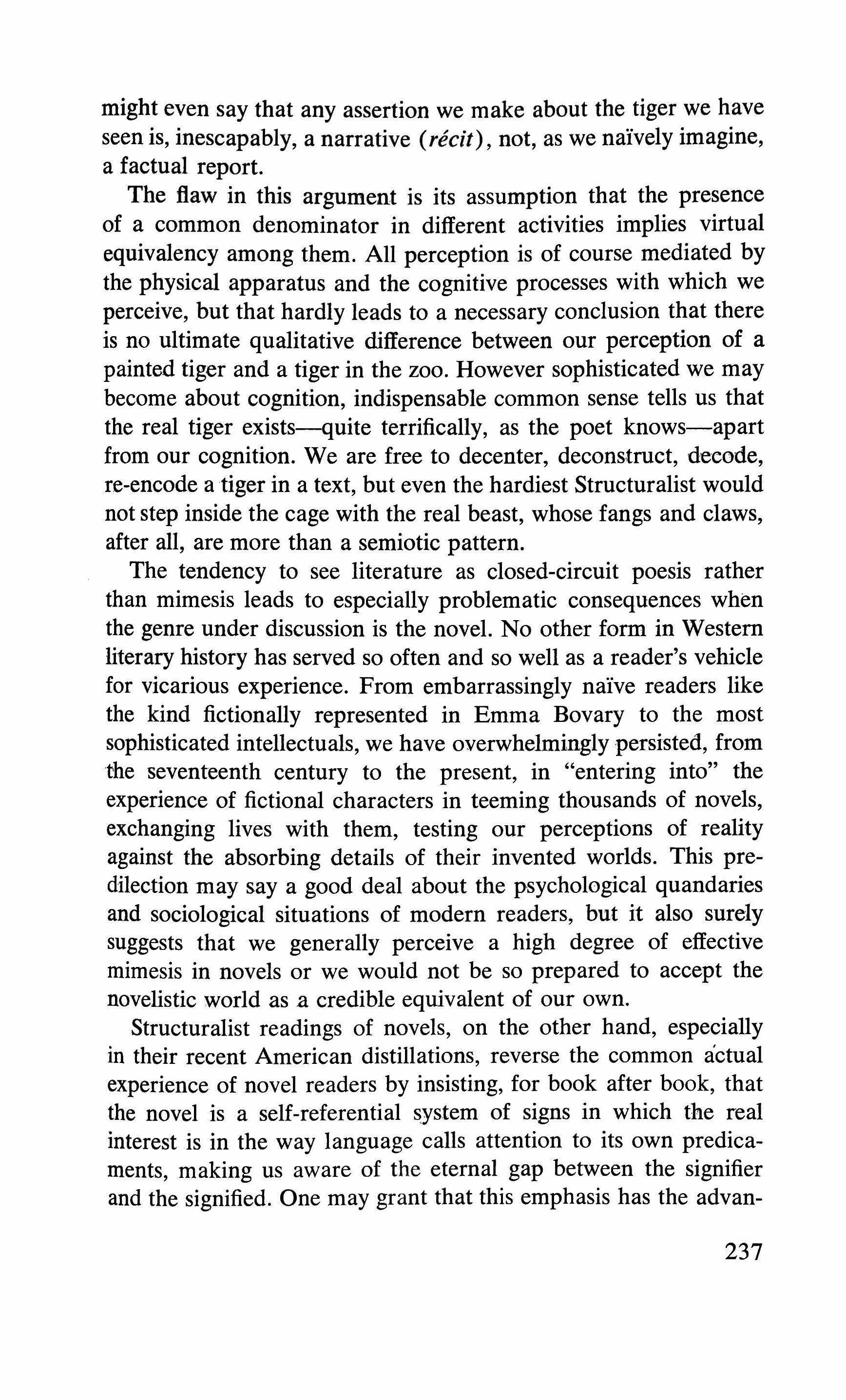
might even say that any assertion we make about the tiger we have seen is, inescapably, a narrative (recit), not, as we naively imagine, a factual report.
The flaw in this argument is its assumption that the presence of a common denominator in different activities implies virtual equivalency among them. All perception is of course mediated by the physical apparatus and the cognitive processes with which we perceive, but that hardly leads to a necessary conclusion that there is no ultimate qualitative difference between our perception of a painted tiger and a tiger in the zoo. However sophisticated we may become about cognition, indispensable common sense tells us that the real tiger exists-quite terrifically, as the poet knows-apart from our cognition. We are free to decenter, deconstruct, decode, re-encode a tiger in a text, but even the hardiest Structuralist would not step inside the cage with the real beast, whose fangs and claws, after all, are more than a semiotic pattern.
The tendency to see literature as closed-circuit poesis rather than mimesis leads to especially problematic consequences when the genre under discussion is the novel. No other form in Western literary history has served so often and so well as a reader's vehicle for vicarious experience. From embarrassingly naive readers like the kind fictionally represented in Emma Bovary to the most sophisticated intellectuals, we have overwhelmingly persisted, from the seventeenth century to the present, in "entering into" the experience of fictional characters in teeming thousands of novels, exchanging lives with them, testing our perceptions of reality against the absorbing details of their invented worlds. This predilection may say a good deal about the psychological quandaries and sociological situations of modern readers, but it also surely suggests that we generally perceive a high degree of effective mimesis in novels or we would not be so prepared to accept the novelistic world as a credible equivalent of our own.
Structuralist readings of novels, on the other hand, especially in their recent American distillations, reverse the common actual experience of novel readers by insisting, for book after book, that the novel is a self-referential system of signs in which the real interest is in the way language calls attention to its own predicaments, making us aware of the eternal gap between the signifier and the signified. One may grant that this emphasis has the advan-
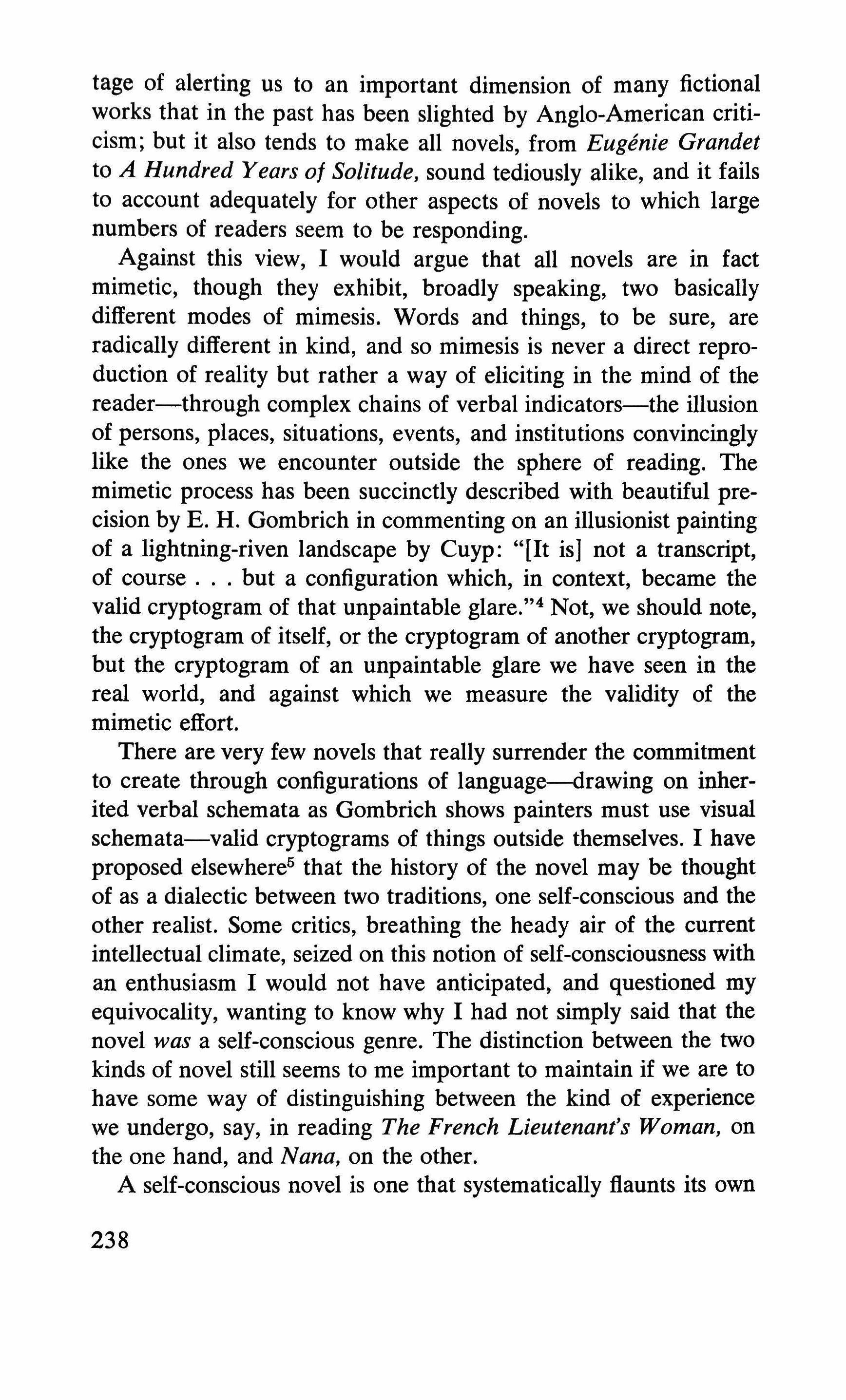
tage of alerting us to an important dimension of many fictional works that in the past has been slighted by Anglo-American criticism; but it also tends to make all novels, from Eugenie Grandet to A Hundred Years of Solitude, sound tediously alike, and it fails to account adequately for other aspects of novels to which large numbers of readers seem to be responding.
Against this view, I would argue that all novels are in fact mimetic, though they exhibit, broadly speaking, two basically different modes of mimesis. Words and things, to be sure, are radically different in kind, and so mimesis is never a direct reproduction of reality but rather a way of eliciting in the mind of the reader-through complex chains of verbal indicators-the illusion of persons, places, situations, events, and institutions convincingly like the ones we encounter outside the sphere of reading. The mimetic process has been succinctly described with beautiful precision by E. H. Gombrich in commenting on an illusionist painting of a lightning-riven landscape by Cuyp: "[It is] not a transcript, of course but a configuration which, in context, became the valid cryptogram of that unpaintable glare."! Not, we should note, the cryptogram of itself, or the cryptogram of another cryptogram, but the cryptogram of an unpaintable glare we have seen in the real world, and against which we measure the validity of the mimetic effort.
There are very few novels that really surrender the commitment to create through configurations of language-drawing on inherited verbal schemata as Gombrich shows painters must use visual schemata-valid cryptograms of things outside themselves. I have proposed elsewhere" that the history of the novel may be thought of as a dialectic between two traditions, one self-conscious and the other realist. Some critics, breathing the heady air of the current intellectual climate, seized on this notion of self-consciousness with an enthusiasm I would not have anticipated, and questioned my equivocality, wanting to know why I had not simply said that the novel was a self-conscious genre. The distinction between the two kinds of novel still seems to me important to maintain if we are to have some way of distinguishing between the kind of experience we undergo, say, in reading The French Lieutenant's Woman, on the one hand, and Nana, on the other.
A self-conscious novel is one that systematically flaunts its own
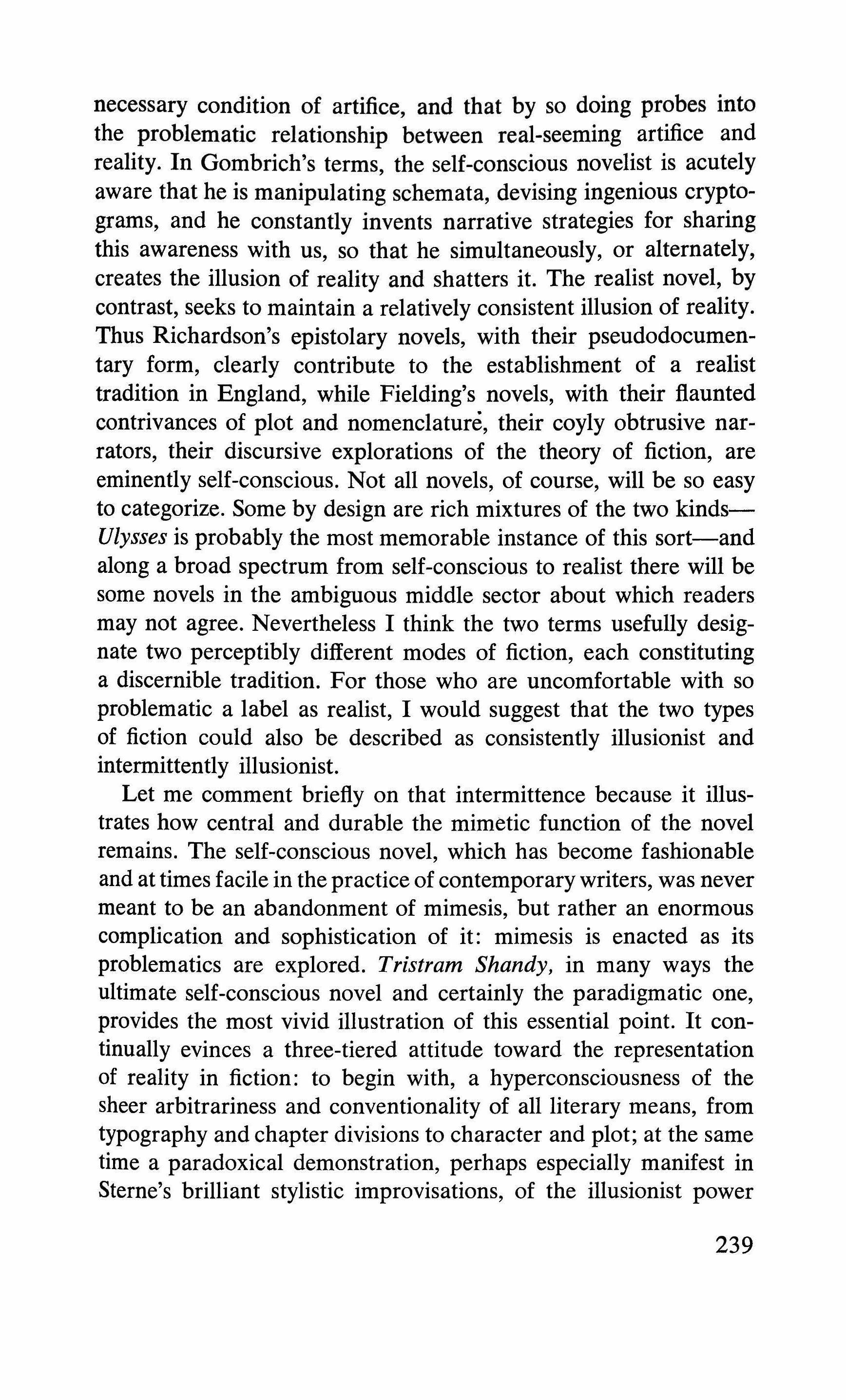
necessary condition of artifice, and that by so doing probes into the problematic relationship between real-seeming artifice and reality. In Gombrich's terms, the self-conscious novelist is acutely aware that he is manipulating schemata, devising ingenious cryptograms, and he constantly invents narrative strategies for sharing this awareness with us, so that he simultaneously, or alternately, creates the illusion of reality and shatters it. The realist novel, by contrast, seeks to maintain a relatively consistent illusion of reality. Thus Richardson's epistolary novels, with their pseudodocumentary form, clearly contribute to the establishment of a realist tradition in England, while Fielding's novels, with their flaunted contrivances of plot and nomenclature, their coyly obtrusive narrators, their discursive explorations of the theory of fiction, are eminently self-conscious. Not all novels, of course, will be so easy to categorize. Some by design are rich mixtures of the two kindsUlysses is probably the most memorable instance of this sort-and along a broad spectrum from self-conscious to realist there will be some novels in the ambiguous middle sector about which readers may not agree. Nevertheless I think the two terms usefully designate two perceptibly different modes of fiction, each constituting a discernible tradition. For those who are uncomfortable with so problematic a label as realist, I would suggest that the two types of fiction could also be described as consistently illusionist and intermittently illusionist.
Let me comment briefly on that intermittence because it illustrates how central and durable the mimetic function of the novel remains. The self-conscious novel, which has become fashionable and at times facile in the practice of contemporarywriters, was never meant to be an abandonment of mimesis, but rather an enormous complication and sophistication of it: mimesis is enacted as its problematics are explored. Tristram Shandy, in many ways the ultimate self-conscious novel and certainly the paradigmatic one, provides the most vivid illustration of this essential point. It continually evinces a three-tiered attitude toward the representation of reality in fiction: to begin with, a hyperconsciousness of the sheer arbitrariness and conventionality of all literary means, from typography and chapter divisions to character and plot; at the same time a paradoxical demonstration, perhaps especially manifest in Sterne's brilliant stylistic improvisations, of the illusionist power

of fictional representations of reality; and, finally, a constant implication of the reader in the arbitrary structure-making functions of the mind, which themselves, as our most intimately familiar mental experience, become part of the reality represented in the novel. It will be seen that the third tier is only the mimetic obverse of the critical exposure of mimesis observable on the first tier. As modern readers, we are of course closely attuned to all the cunning convolutions of Sterne's fictional self-consciousness, but it is well to keep in mind that his novel managed to enjoy considerable popularity throughout the age of realism of the nineteenth century -where its sexual indecencies did not shock-because of the convincing mimesis it produces through its maze of flaunted artifice (the bizarre, touching character of the two Shandy brothers, Trim's tender sensibilities, the vivid comic images of domestic and provincial life, and so forth).
In order to make the validity of these two categories of fiction clearer, and to demonstrate the persistent power of mimesis even in "postmodern" writing, I would like to juxtapose two striking novels of the early seventies, both involving elaborate artifice but one clearly a self-conscious fiction and the other a realist one. The two novels I have in mind are Nabokov's Transparent Things ( 1972) and the third novel of the gifted new Argentine writer, Manuel Puig, The Buenos Aires Affair (1973).
Transparent Things is a beautifully controlled short novel in which Nabokov develops new modalities of self-consciousness for new expressive purposes--exactly the opposite of what happens in his subsequent book, Look at the Harlequins (1974), where he tends to do what his detractors often accuse him of: slipping into coy self-citation and a facile rehearsal of old themes, situations, and devices. The self-conscious mode is pervasive and systematic, from the very title of the novel to the naming of its characters and places, the narrative technique that constantly comments on itself, and the deployment of fictions within fictions. Things tum transparent as they become objects of the narrator's "act of attention": consciousness dissolves the seeming solidity of surfaces and the bounded determinacy of objects, plunging into the history of things, their transformation through time, the myriad filaments of causation, analogy, and metonymy that bind any given object to a swarm of other objects. The title, then, explicated by a brilliant set piece
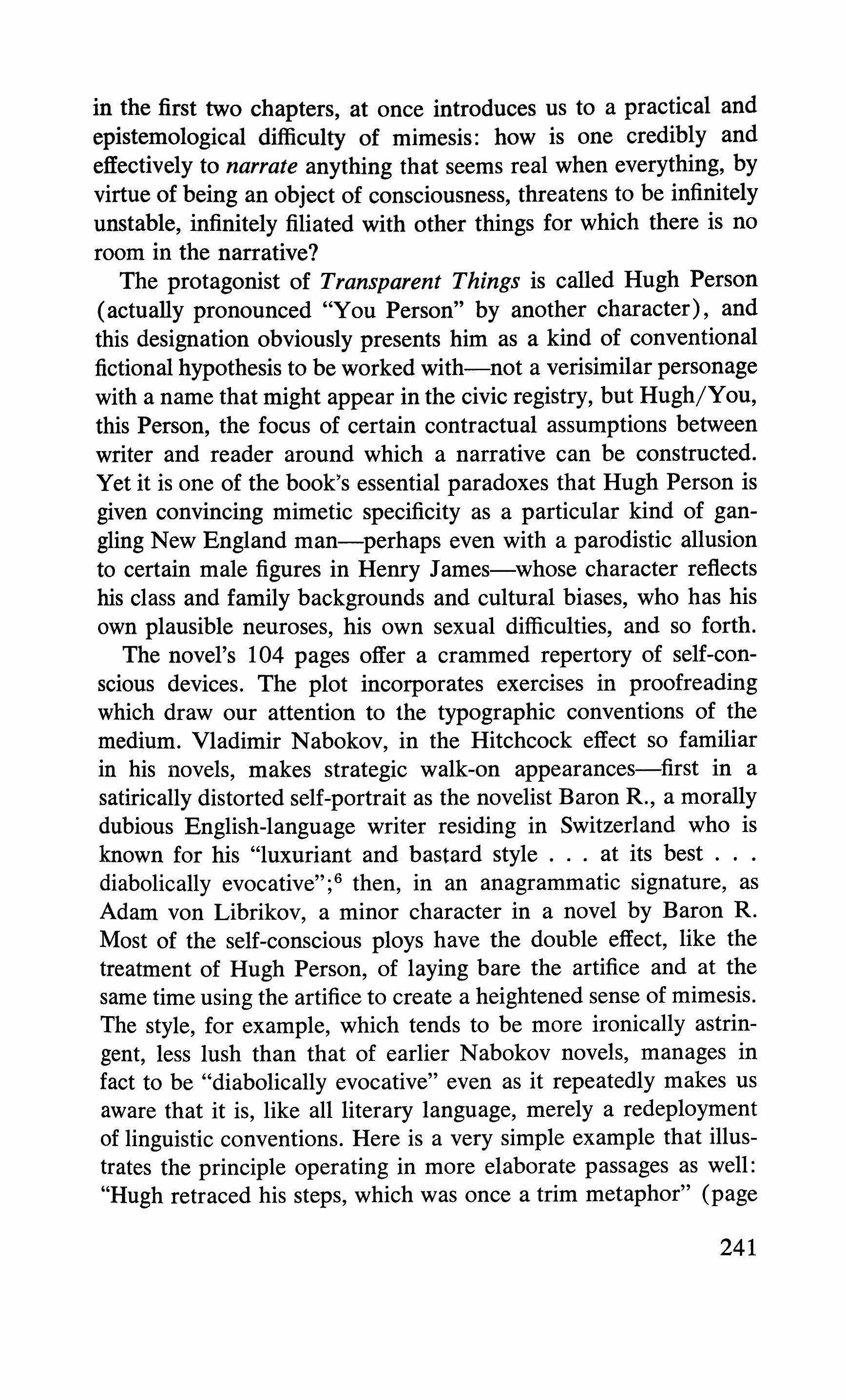
in the first two chapters, at once introduces us to a practical and epistemological difficulty of mimesis: how is one credibly and effectively to narrate anything that seems real when everything, by virtue of being an object of consciousness, threatens to be infinitely unstable, infinitely filiated with other things for which there is no room in the narrative?
The protagonist of Transparent Things is called Hugh Person (actually pronounced "You Person" by another character), and this designation obviously presents him as a kind of conventional fictional hypothesis to be worked with-not a verisimilar personage with a name that might appear in the civic registry, but Hugh/You, this Person, the focus of certain contractual assumptions between writer and reader around which a narrative can be constructed. Yet it is one of the book's essential paradoxes that Hugh Person is given convincing mimetic specificity as a particular kind of gangling New England man-perhaps even with a parodistic allusion to certain male figures in Henry James-whose character reflects his class and family backgrounds and cultural biases, who has his own plausible neuroses, his own sexual difficulties, and so forth.
The novel's 104 pages offer a crammed repertory of self-conscious devices. The plot incorporates exercises in proofreading which draw our attention to the typographic conventions of the medium. Vladimir Nabokov, in the Hitchcock effect so familiar in his novels, makes strategic walk-on appearances-first in a satirically distorted self-portrait as the novelist Baron R., a morally dubious English-language writer residing in Switzerland who is known for his "luxuriant and bastard style at its best diabolically evocative";" then, in an anagrammatic signature, as Adam von Librikov, a minor character in a novel by Baron R. Most of the self-conscious ploys have the double effect, like the treatment of Hugh Person, of laying bare the artifice and at the same time using the artifice to create a heightened sense of mimesis. The style, for example, which tends to be more ironically astringent, less lush than that of earlier Nabokov novels, manages in fact to be "diabolically evocative" even as it repeatedly makes us aware that it is, like all literary language, merely a redeployment of linguistic conventions. Here is a very simple example that illustrates the principle operating in more elaborate passages as well: "Hugh retraced his steps, which was once a trim metaphor" (page 241
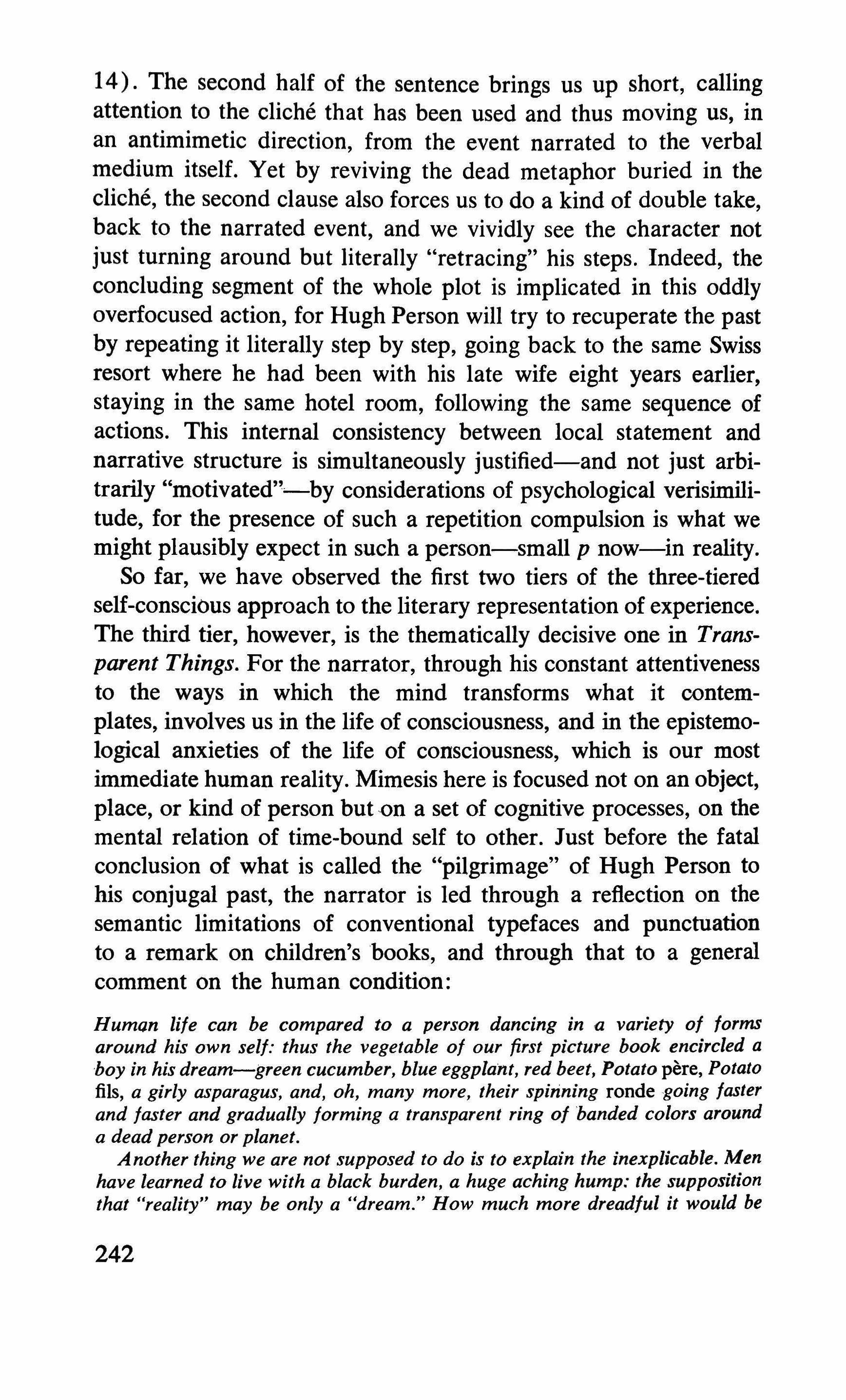
14). The second half of the sentence brings us up short, calling attention to the cliche that has been used and thus moving us, in an antimimetic direction, from the event narrated to the verbal medium itself. Yet by reviving the dead metaphor buried in the cliche, the second clause also forces us to do a kind of double take, back to the narrated event, and we vividly see the character not just turning around but literally "retracing" his steps. Indeed, the concluding segment of the whole plot is implicated in this oddly overfocused action, for Hugh Person will try to recuperate the past by repeating it literally step by step, going back to the same Swiss resort where he had been with his late wife eight years earlier, staying in the same hotel room, following the same sequence of actions. This internal consistency between local statement and narrative structure is simultaneously justified-and not just arbitrarily "motivated"--by considerations of psychological verisimilitude, for the presence of such a repetition compulsion is what we might plausibly expect in such a person-small p now-in reality. So far, we have observed the first two tiers of the three-tiered self-conscious approach to the literary representation of experience. The third tier, however, is the thematically decisive one in Transparent Things. For the narrator, through his constant attentiveness to the ways in which the mind transforms what it contemplates, involves us in the life of consciousness, and in the epistemological anxieties of the life of consciousness, which is our most immediate human reality. Mimesis here is focused not on an object, place, or kind of person but -on a set of cognitive processes, on the mental relation of time-bound self to other. Just before the fatal conclusion of what is called the "pilgrimage" of Hugh Person to his conjugal past, the narrator is led through a reflection on the semantic limitations of conventional typefaces and punctuation to a remark on children's books, and through that to a general comment on the human condition:
Human life can be compared to a person dancing in a variety of forms around his own self: thus the vegetable of our first picture book encircled a boy in his dream-green cucumber, blue eggplant, red beet, Potato pere, Potato fils, a girly asparagus, and, oh, many more, their spinning ronde going faster and faster and gradually forming a transparent ring of banded colors around a dead person or planet.
Another thing we are not supposed to do is to explain the inexplicable. Men have learned to live with a black burden, a huge aching hump: the supposition that "reality" may be only a "dream." How much more dreadful it would be
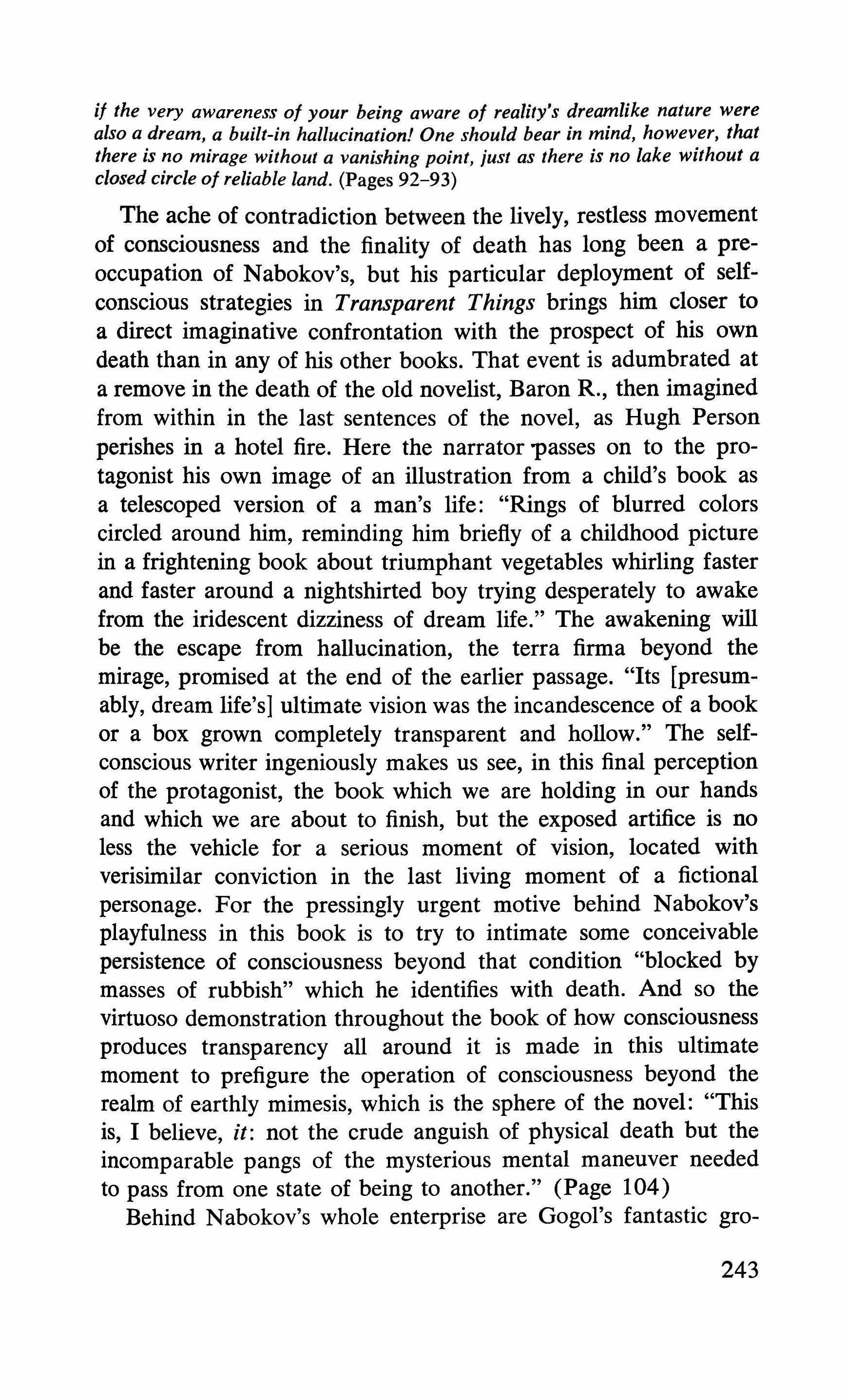
if the very awareness of your being aware of reality's dreamlike nature were also a dream, a built-in hallucination! One should bear in mind, however, that there is no mirage without a vanishing point, just as there is no lake without a closed circle of reliable land. (Pages 92-93)
The ache of contradiction between the lively, restless movement of consciousness and the finality of death has long been a preoccupation of Nabokov's, but his particular deployment of selfconscious strategies in Transparent Things brings him closer to a direct imaginative confrontation with the prospect of his own death than in any of his other books. That event is adumbrated at a remove in the death of the old novelist, Baron R., then imagined from within in the last sentences of the novel, as Hugh Person perishes in a hotel fire. Here the narrator "Passes on to the protagonist his own image of an illustration from a child's book as a telescoped version of a man's life: "Rings of blurred colors circled around him, reminding him briefly of a childhood picture in a frightening book about triumphant vegetables whirling faster and faster around a nightshirted boy trying desperately to awake from the iridescent dizziness of dream life." The awakening will be the escape from hallucination, the terra firma beyond the mirage, promised at the end of the earlier passage. "Its [presumably, dream life's] ultimate vision was the incandescence of a book or a box grown completely transparent and hollow." The selfconscious writer ingeniously makes us see, in this final perception of the protagonist, the book which we are holding in our hands and which we are about to finish, but the exposed artifice is no less the vehicle for a serious moment of vision, located with verisimilar conviction in the last living moment of a fictional personage. For the pressingly urgent motive behind Nabokov's playfulness in this book is to try to intimate some conceivable persistence of consciousness beyond that condition "blocked by masses of rubbish" which he identifies with death. And so the virtuoso demonstration throughout the book of how consciousness produces transparency all around it is made in this ultimate moment to prefigure the operation of consciousness beyond the realm of earthly mimesis, which is the sphere of the novel: "This is, I believe, it: not the crude anguish of physical death but the incomparable pangs of the mysterious mental maneuver needed to pass from one state of being to another." (Page 104)
Behind Nabokov's whole enterprise are Gogol's fantastic gro-
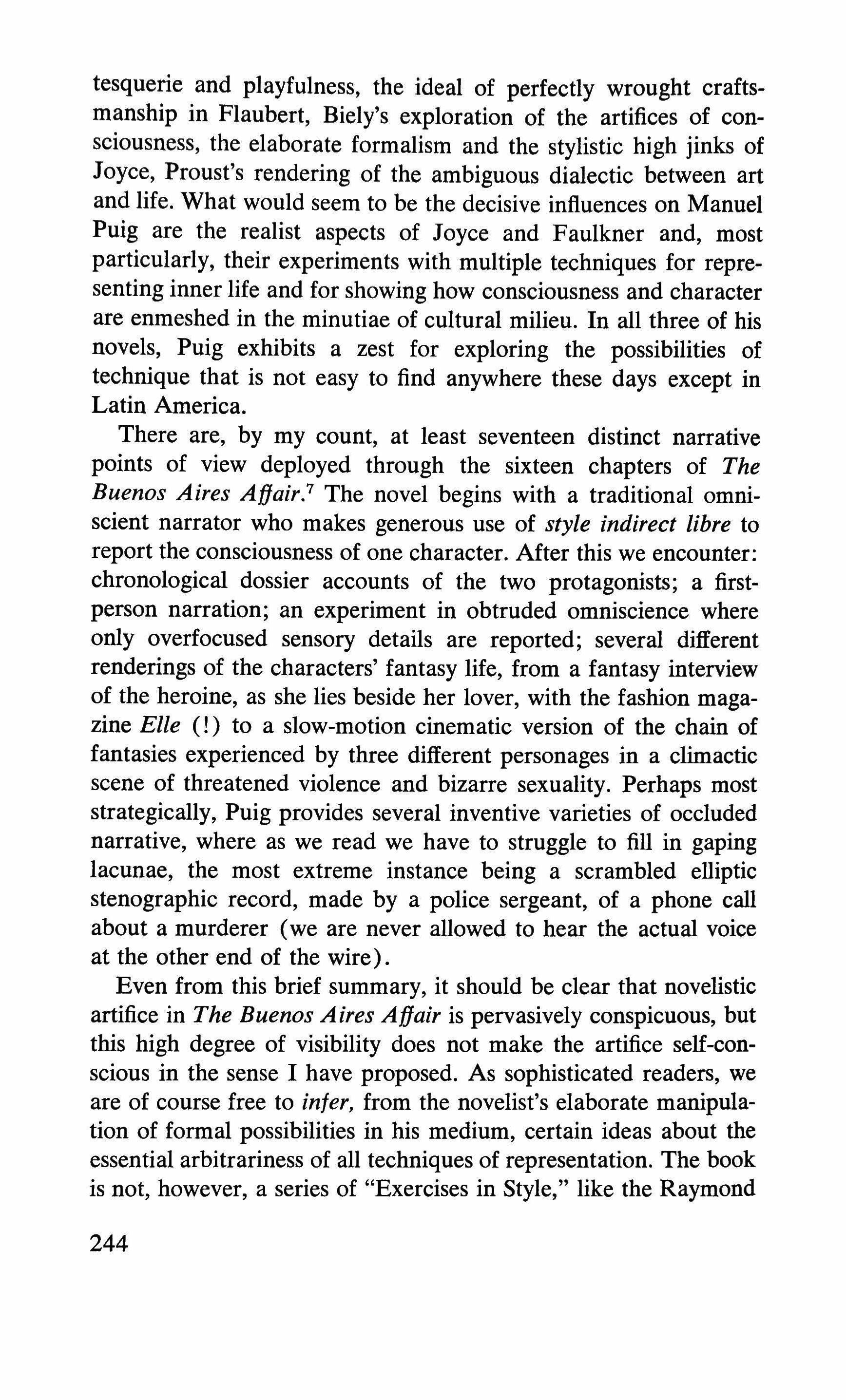
tesquerie and playfulness, the ideal of perfectly wrought craftsmanship in Flaubert, Biely's exploration of the artifices of consciousness, the elaborate formalism and the stylistic high jinks of Joyce, Proust's rendering of the ambiguous dialectic between art and life. What would seem to be the decisive influences on Manuel Puig are the realist aspects of Joyce and Faulkner and, most particularly, their experiments with multiple techniques for representing inner life and for showing how consciousness and character are enmeshed in the minutiae of cultural milieu. In all three of his novels, Puig exhibits a zest for exploring the possibilities of technique that is not easy to find anywhere these days except in Latin America.
There are, by my count, at least seventeen distinct narrative points of view deployed through the sixteen chapters of The Buenos Aires Afjair.7 The novel begins with a traditional omniscient narrator who makes generous use of style indirect fibre to report the consciousness of one character. After this we encounter: chronological dossier accounts of the two protagonists; a firstperson narration; an experiment in obtruded omniscience where only overfocused sensory details are reported; several different renderings of the characters' fantasy life, from a fantasy interview of the heroine, as she lies beside her lover, with the fashion magazine Elle (!) to a slow-motion cinematic version of the chain of fantasies experienced by three different personages in a climactic scene of threatened violence and bizarre sexuality. Perhaps most strategically, Puig provides several inventive varieties of occluded narrative, where as we read we have to struggle to fill in gaping lacunae, the most extreme instance being a scrambled elliptic stenographic record, made by a police sergeant, of a phone call about a murderer (we are never allowed to hear the actual voice at the other end of the wire).
Even from this brief summary, it should be clear that novelistic artifice in The Buenos Aires Afjair is pervasively conspicuous, but this high degree of visibility does not make the artifice self-conscious in the sense I have proposed. As sophisticated readers, we are of course free to infer, from the novelist's elaborate manipulation of formal possibilities in his medium, certain ideas about the essential arbitrariness of all techniques of representation. The book is not, however, a series of "Exercises in Style," like the Raymond
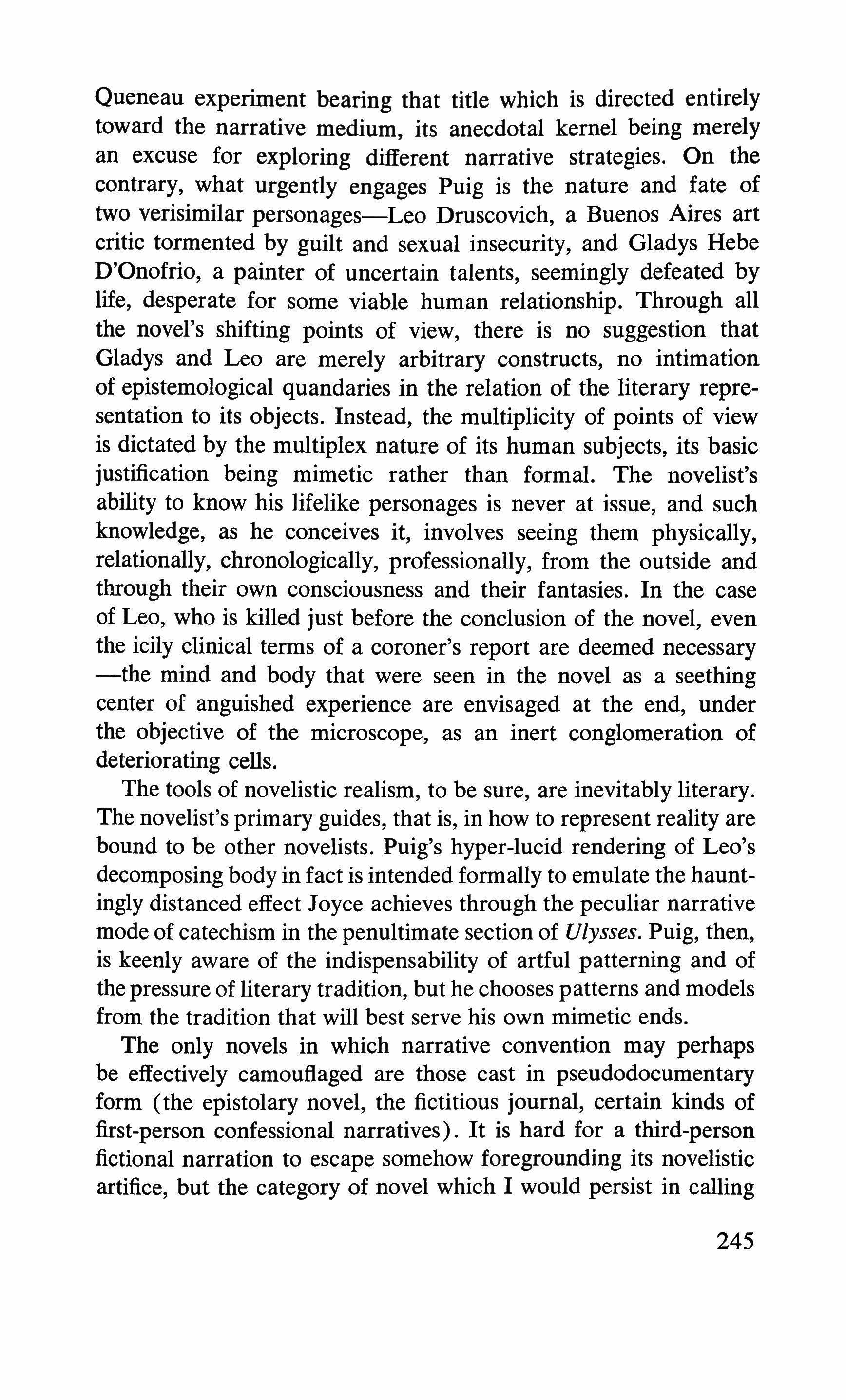
Queneau experiment bearing that title which is directed entirely toward the narrative medium, its anecdotal kernel being merely an excuse for exploring different narrative strategies. On the contrary, what urgently engages Puig is the nature and fate of two verisimilar personages-Leo Druscovich, a Buenos Aires art critic tormented by guilt and sexual insecurity, and Gladys Hebe D'Onofrio, a painter of uncertain talents, seemingly defeated by life, desperate for some viable human relationship. Through all the novel's shifting points of view, there is no suggestion that Gladys and Leo are merely arbitrary constructs, no intimation of epistemological quandaries in the relation of the literary representation to its objects. Instead, the multiplicity of points of view is dictated by the multiplex nature of its human subjects, its basic justification being mimetic rather than formal. The novelist's ability to know his lifelike personages is never at issue, and such knowledge, as he conceives it, involves seeing them physically, relationally, chronologically, professionally, from the outside and through their own consciousness and their fantasies. In the case of Leo, who is killed just before the conclusion of the novel, even the icily clinical terms of a coroner's report are deemed necessary -the mind and body that were seen in the novel as a seething center of anguished experience are envisaged at the end, under the objective of the microscope, as an inert conglomeration of deteriorating cells.
The tools of novelistic realism, to be sure, are inevitably literary. The novelist's primary guides, that is, in how to represent reality are bound to be other novelists. Puig's hyper-lucid rendering of Leo's decomposing body in fact is intended formally to emulate the hauntingly distanced effect Joyce achieves through the peculiar narrative mode of catechism in the penultimate section of Ulysses. Puig, then, is keenly aware of the indispensability of artful patterning and of the pressure of literary tradition, but he chooses patterns and models from the tradition that will best serve his own mimetic ends.
The only novels in which narrative convention may perhaps be effectively camouflaged are those cast in pseudodocumentary form (the epistolary novel, the fictitious journal, certain kinds of first-person confessional narratives). It is hard for a third-person fictional narration to escape somehow foregrounding its novelistic artifice, but the category of novel which I would persist in calling
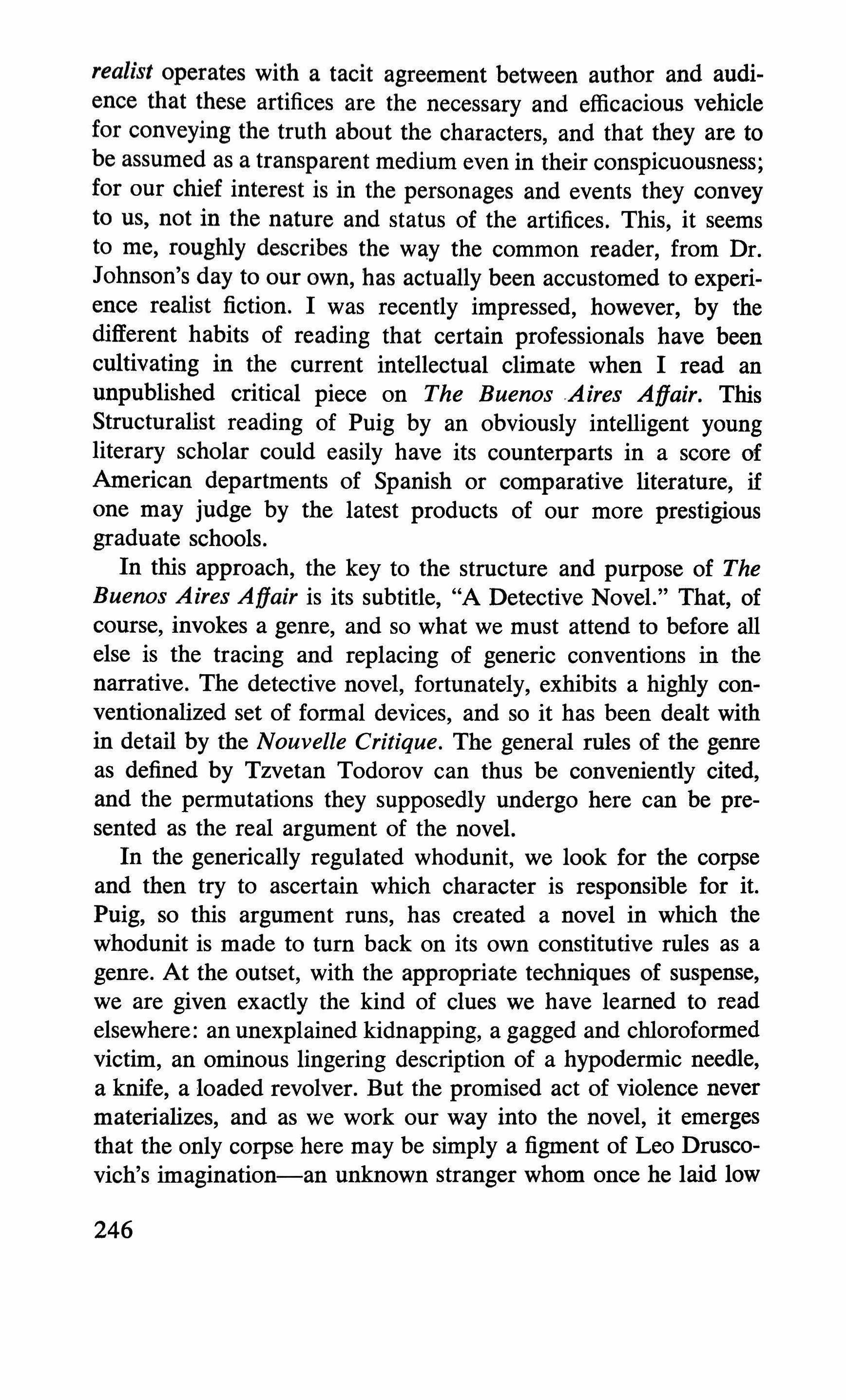
realist operates with a tacit agreement between author and audience that these artifices are the necessary and efficacious vehicle for conveying the truth about the characters, and that they are to be assumed as a transparent medium even in their conspicuousness; for our chief interest is in the personages and events they convey to us, not in the nature and status of the artifices. This, it seems to me, roughly describes the way the common reader, from Dr. Johnson's day to our own, has actually been accustomed to experience realist fiction. I was recently impressed, however, by the different habits of reading that certain professionals have been cultivating in the current intellectual climate when I read an unpublished critical piece on The Buenos .Aires Affair. This Structuralist reading of Puig by an obviously intelligent young literary scholar could easily have its counterparts in a score of American departments of Spanish or comparative literature, if one may judge by the latest products of our more prestigious graduate schools.
In this approach, the key to the structure and purpose of The Buenos Aires Affair is its subtitle, "A Detective Novel." That, of course, invokes a genre, and so what we must attend to before all else is the tracing and replacing of generic conventions in the narrative. The detective novel, fortunately, exhibits a highly conventionalized set of formal devices, and so it has been dealt with in detail by the Nouvelle Critique. The general rules of the genre as defined by Tzvetan Todorov can thus be conveniently cited, and the permutations they supposedly undergo here can be presented as the real argument of the novel.
In the generically regulated whodunit, we look for the corpse and then try to ascertain which character is responsible for it. Puig, so this argument runs, has created a novel in which the whodunit is made to turn back on its own constitutive rules as a genre. At the outset, with the appropriate techniques of suspense, we are given exactly the kind of clues we have learned to read elsewhere: an unexplained kidnapping, a gagged and chloroformed victim, an ominous lingering description of a hypodermic needle, a knife, a loaded revolver. But the promised act of violence never materializes, and as we work our way into the novel, it emerges that the only corpse here may be simply a figment of Leo Druscovich's imagination-an unknown stranger whom once he laid low
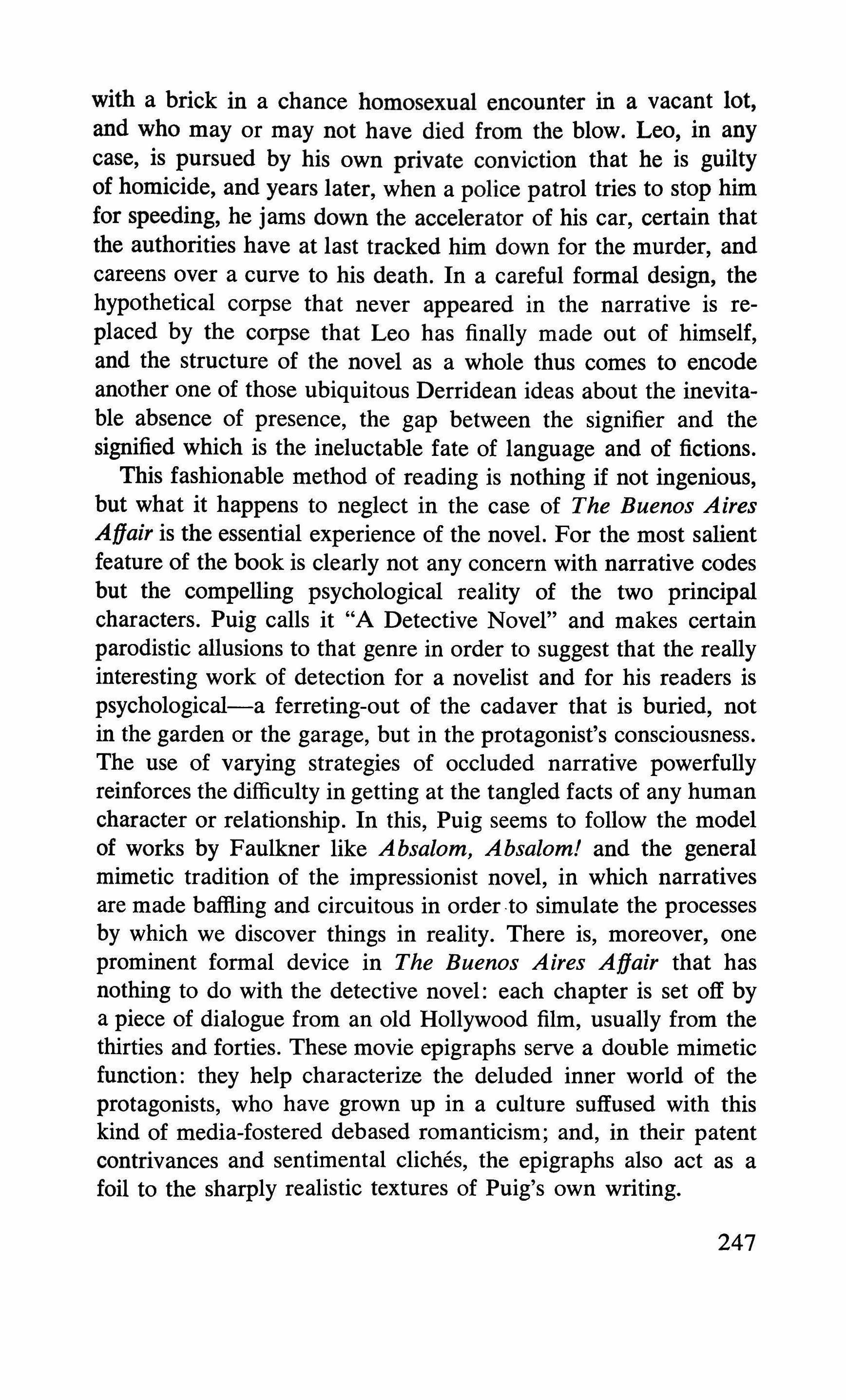
with a brick in a chance homosexual encounter in a vacant lot, and who mayor may not have died from the blow. Leo, in any case, is pursued by his own private conviction that he is guilty of homicide, and years later, when a police patrol tries to stop him for speeding, he jams down the accelerator of his car, certain that the authorities have at last tracked him down for the murder, and careens over a curve to his death. In a careful formal design, the hypothetical corpse that never appeared in the narrative is replaced by the corpse that Leo has finally made out of himself, and the structure of the novel as a whole thus comes to encode another one of those ubiquitous Derridean ideas about the inevitable absence of presence, the gap between the signifier and the signified which is the ineluctable fate of language and of fictions. This fashionable method of reading is nothing if not ingenious, but what it happens to neglect in the case of The Buenos Aires ADair is the essential experience of the novel. For the most salient feature of the book is clearly not any concern with narrative codes but the compelling psychological reality of the two principal characters. Puig calls it "A Detective Novel" and makes certain parodistic allusions to that genre in order to suggest that the really interesting work of detection for a novelist and for his readers is psychological-a ferreting-out of the cadaver that is buried, not in the garden or the garage, but in the protagonist's consciousness. The use of varying strategies of occluded narrative powerfully reinforces the difficulty in getting at the tangled facts of any human character or relationship. In this, Puig seems to follow the model of works by Faulkner like Absalom, Absalom! and the general mimetic tradition of the impressionist novel, in which narratives are made baffling and circuitous in order ·to simulate the processes by which we discover things in reality. There is, moreover, one prominent formal device in The Buenos Aires Affair that has nothing to do with the detective novel: each chapter is set off by a piece of dialogue from an old Hollywood film, usually from the thirties and forties. These movie epigraphs serve a double mimetic function: they help characterize the deluded inner world of the protagonists, who have grown up in a culture suffused with this kind of media-fostered debased romanticism; and, in their patent contrivances and sentimental cliches, the epigraphs also act as a foil to the sharply realistic textures of Puig's own writing.
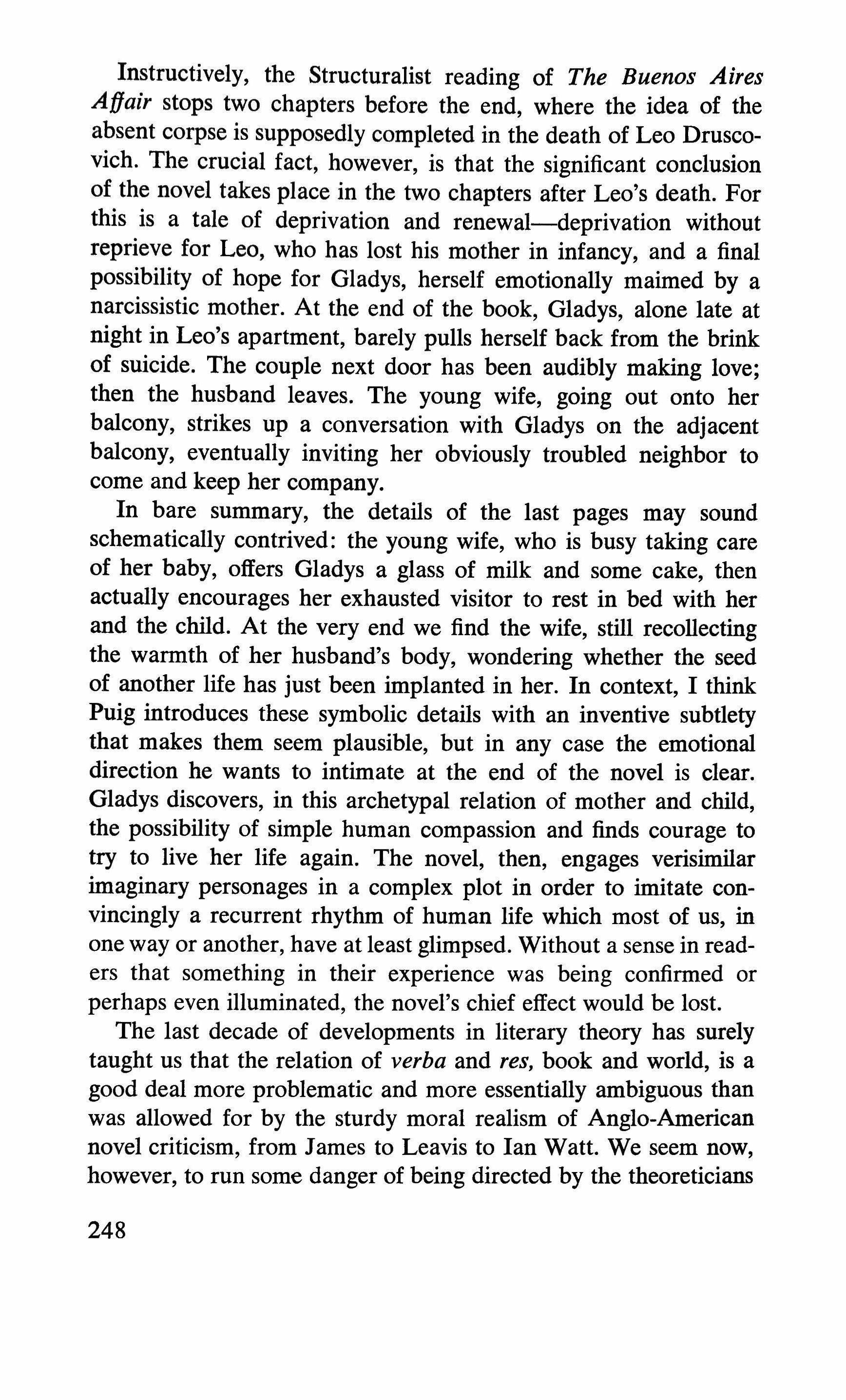
Instructively, the Structuralist reading of The Buenos Aires Affair stops two chapters before the end, where the idea of the absent corpse is supposedly completed in the death of Leo Druscovich. The crucial fact, however, is that the significant conclusion of the novel takes place in the two chapters after Leo's death. For this is a tale of deprivation and renewal-deprivation without reprieve for Leo, who has lost his mother in infancy, and a final possibility of hope for Gladys, herself emotionally maimed by a narcissistic mother. At the end of the book, Gladys, alone late at night in Leo's apartment, barely pulls herself back from the brink of suicide. The couple next door has been audibly making love; then the husband leaves. The young wife, going out onto her balcony, strikes up a conversation with Gladys on the adjacent balcony, eventually inviting her obviously troubled neighbor to come and keep her company.
In bare summary, the details of the last pages may sound schematically contrived: the young wife, who is busy taking care of her baby, offers Gladys a glass of milk and some cake, then actually encourages her exhausted visitor to rest in bed with her and the child. At the very end we find the wife, still recollecting the warmth of her husband's body, wondering whether the seed of another life has just been implanted in her. In context, I think Puig introduces these symbolic details with an inventive subtlety that makes them seem plausible, but in any case the emotional direction he wants to intimate at the end of the novel is clear. Gladys discovers, in this archetypal relation of mother and child, the possibility of simple human compassion and finds courage to try to live her life again. The novel, then, engages verisimilar imaginary personages in a complex plot in order to imitate convincingly a recurrent rhythm of human life which most of us, in one way or another, have at least glimpsed. Without a sense in readers that something in their experience was being confirmed or perhaps even illuminated, the novel's chief effect would be lost.
The last decade of developments in literary theory has surely taught us that the relation of verba and res, book and world, is a good deal more problematic and more essentially ambiguous than was allowed for by the sturdy moral realism of Anglo-American novel criticism, from James to Leavis to Ian Watt. We seem now, however, to run some danger of being directed by the theoreticians
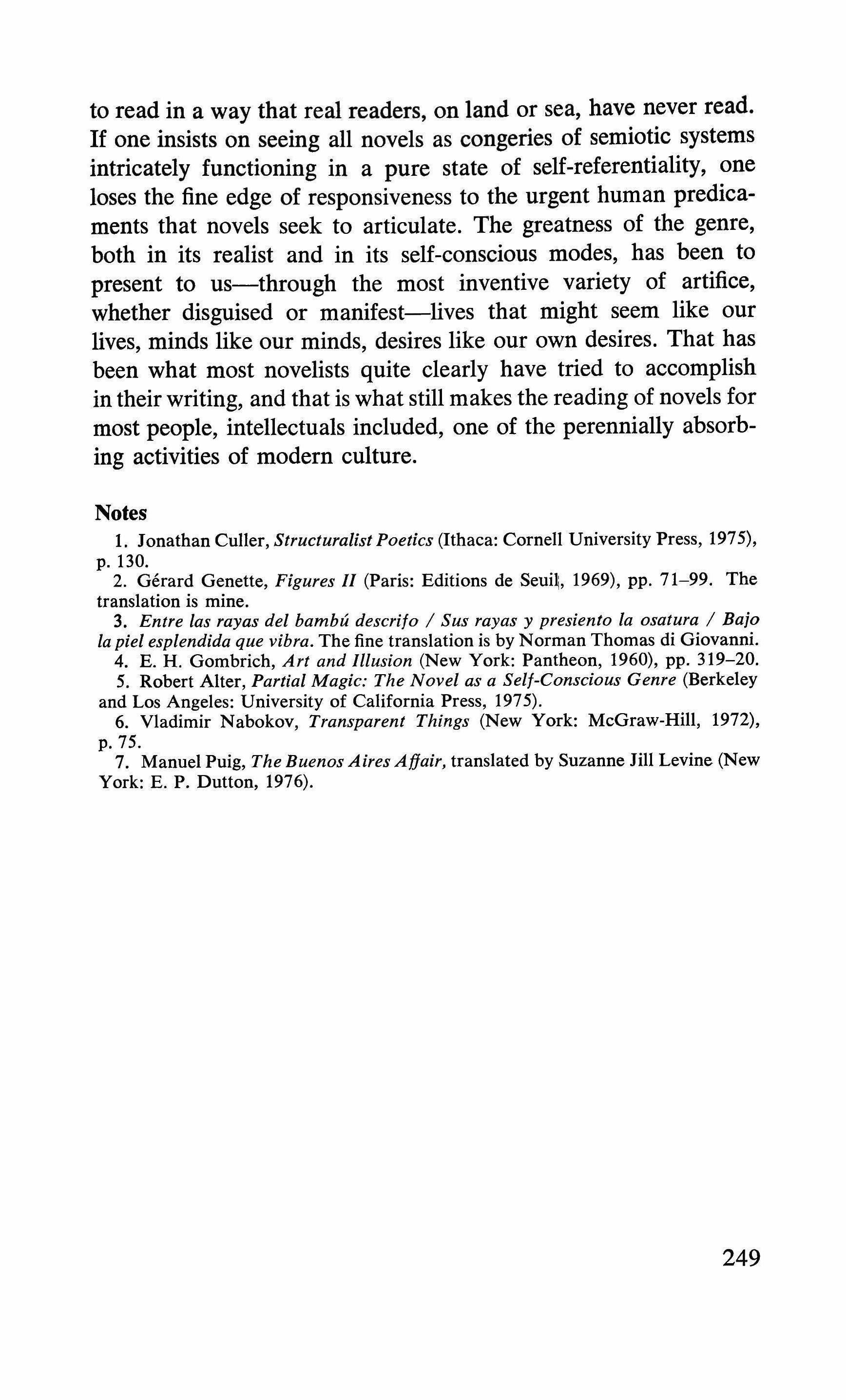
to read in a way that real readers, on land or sea, have never read. If one insists on seeing all novels as congeries of semiotic systems intricately functioning in a pure state of self-referentiality, one loses the fine edge of responsiveness to the urgent human predicaments that novels seek to articulate. The greatness of the genre, both in its realist and in its self-conscious modes, has been to present to us-through the most inventive variety of artifice, whether disguised or manifest-lives that might seem like our lives, minds like our minds, desires like our own desires. That has been what most novelists quite clearly have tried to accomplish in their writing, and that is what still makes the reading of novels for most people, intellectuals included, one of the perennially absorbing activities of modern culture.
Notes
1. Jonathan Culler, Structuralist Poetics (Ithaca: Cornell University Press, 1975), p.130.
2. Gerard Genette, Figures II (Paris: Editions de Seuil; 1969), pp. 71-99. The translation is mine.
3. Entre las rayas del bambu descrijo / Sus rayas y presiento la osatura / Bajo la piel esplendida que vibra. The fine translation is by Norman Thomas di Giovanni.
4. E. H. Gombrich, Art and Illusion (New York: Pantheon, 1960), pp. 319-20.
5. Robert Alter, Partial Magic: The Novel as a Self-Conscious Genre (Berkeley and Los Angeles: University of California Press, 1975).
6. Vladimir Nabokov, Transparent Things (New York: McGraw-Hill, 1972), p.75.
7. Manuel Puig, The Buenos Aires Affair, translated by Suzanne Jill Levine (New York: E. P. Dutton, 1976).
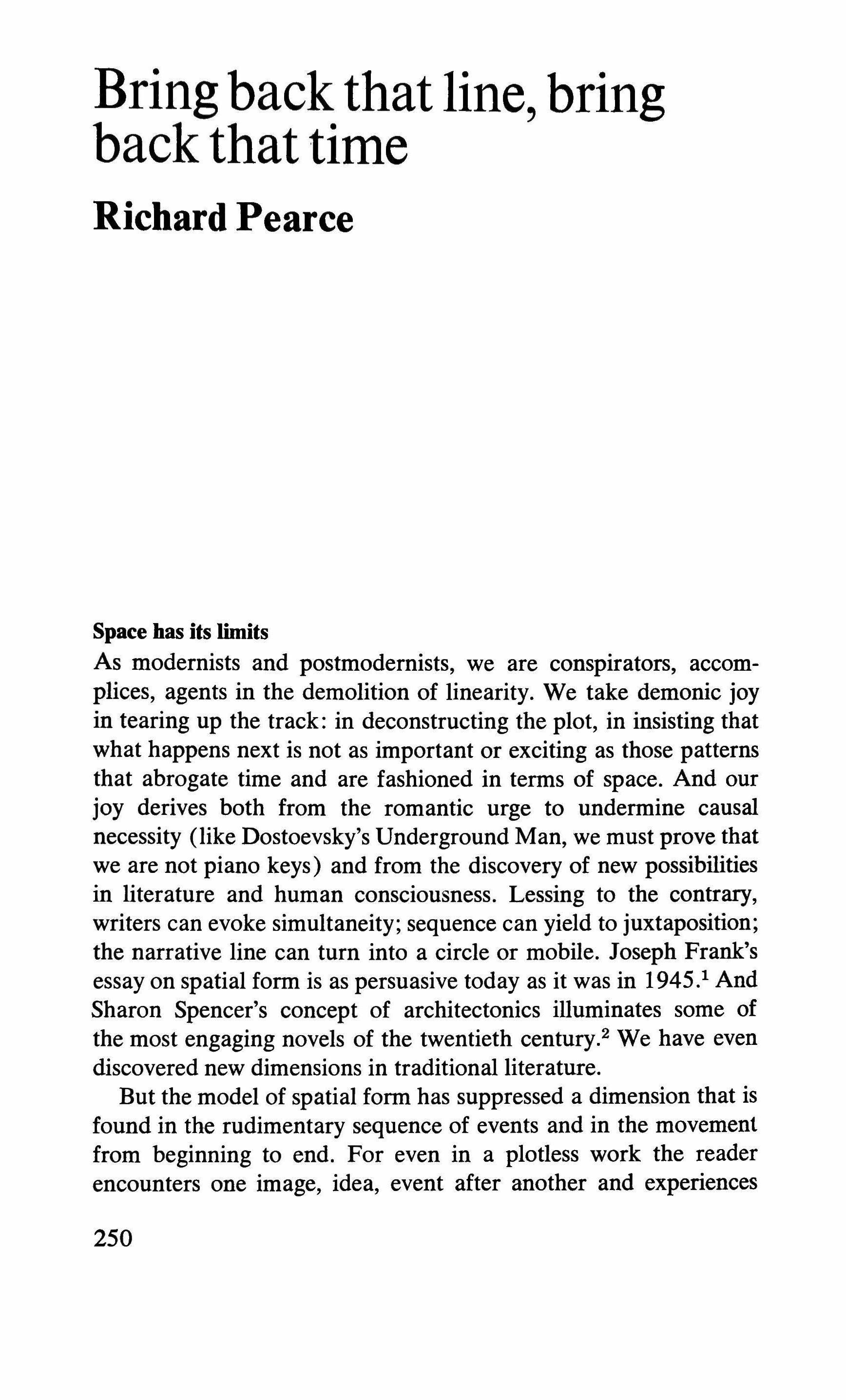
Space has its limits
As modernists and postmodernists, we are conspirators, accomplices, agents in the demolition of linearity. We take demonic joy in tearing up the track: in deconstructing the plot, in insisting that what happens next is not as important or exciting as those patterns that abrogate time and are fashioned in terms of space. And our joy derives both from the romantic urge to undermine causal necessity (like Dostoevsky's Underground Man, we must prove that we are not piano keys) and from the discovery of new possibilities in literature and human consciousness. Lessing to the contrary, writers can evoke simultaneity; sequence can yield to juxtaposition; the narrative line can turn into a circle or mobile. Joseph Frank's essay on spatial form is as persuasive today as it was in 1945.1 And Sharon Spencer's concept of architectonics illuminates some of the most engaging novels of the twentieth century.' We have even discovered new dimensions in traditional literature.
But the model of spatial form has suppressed a dimension that is found in the rudimentary sequence of events and in the movement from beginning to end. For even in a plotless work the reader encounters one image, idea, event after another and experiences 250
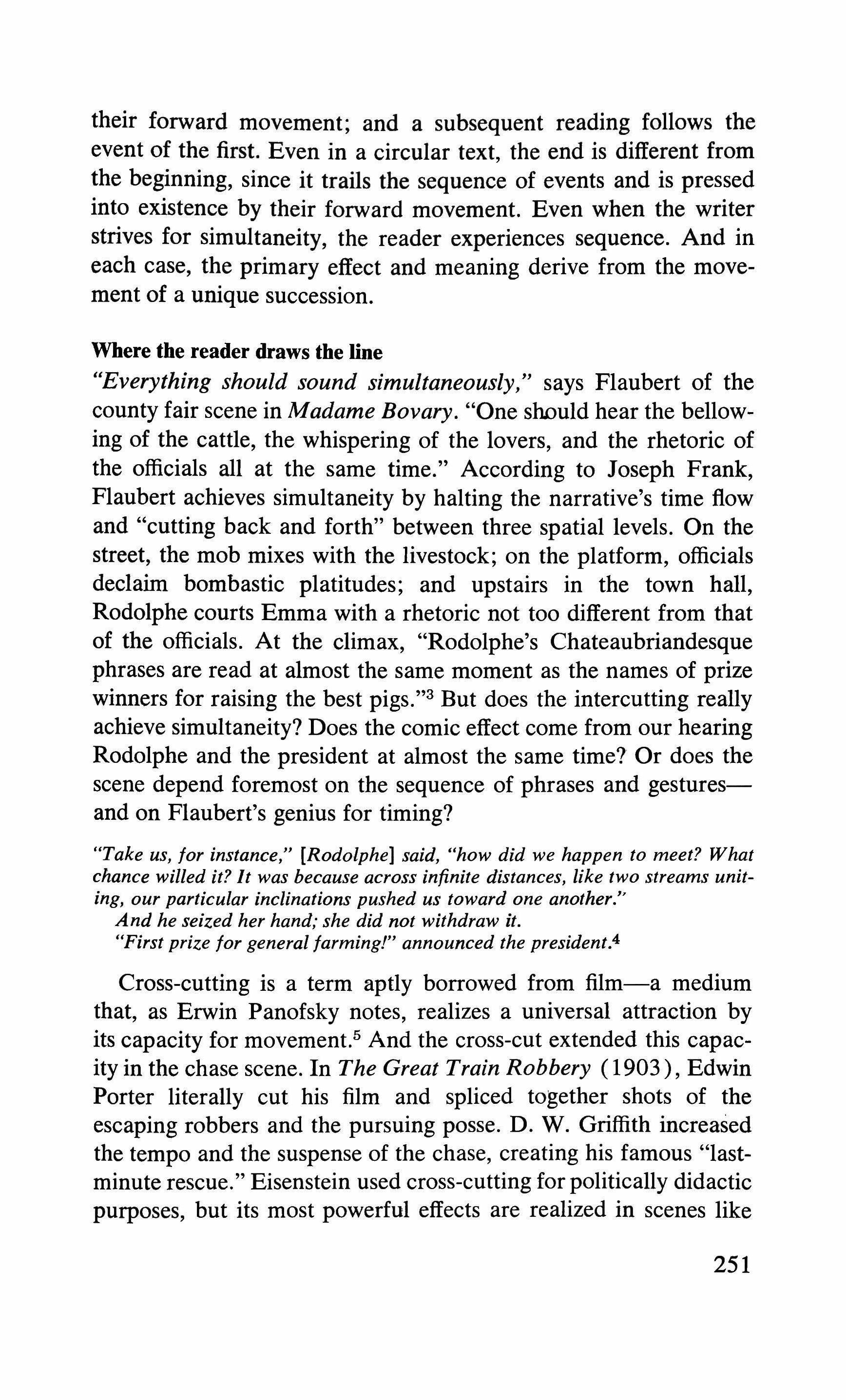
their forward movement; and a subsequent reading follows the event of the first. Even in a circular text, the end is different from the beginning, since it trails the sequence of events and is pressed into existence by their forward movement. Even when the writer strives for simultaneity, the reader experiences sequence. And in each case, the primary effect and meaning derive from the movement of a unique succession.
Where the reader draws the line
"Everything should sound simultaneously," says Flaubert of the county fair scene in Madame Bovary. "One should hear the bellowing of the cattle, the whispering of the lovers, and the rhetoric of the officials all at the same time." According to Joseph Frank, Flaubert achieves simultaneity by halting the narrative's time flow and "cutting back and forth" between three spatial levels. On the street, the mob mixes with the livestock; on the platform, officials declaim bombastic platitudes; and upstairs in the town hall, Rodolphe courts Emma with a rhetoric not too different from that of the officials. At the climax, "Rodolphe's Chateaubriandesque phrases are read at almost the same moment as the names of prize winners for raising the best pigs.?" But does the intercutting really achieve simultaneity? Does the comic effect come from our hearing Rodolphe and the president at almost the same time? Or does the scene depend foremost on the sequence of phrases and gesturesand on Flaubert's genius for timing?
"Take us, for instance," [Rodolphe] said, "how did we happen to meet? What chance willed it? It was because across infinite distances, like two streams uniting, our particular inclinations pushed us toward one another." And he seized her hand; she did not withdraw it.
"First prize for general farming!" announced the president+
Cross-cutting is a term aptly borrowed from film-a medium that, as Erwin Panofsky notes, realizes a universal attraction by its capacity for movement," And the cross-cut extended this capacity in the chase scene. In The Great Train Robbery (1903), Edwin Porter literally cut his film and spliced together shots of the escaping robbers and the pursuing posse. D. W. Griffith increased the tempo and the suspense of the chase, creating his famous "lastminute rescue." Eisenstein used cross-cutting for politically didactic purposes, but its most powerful effects are realized in scenes like
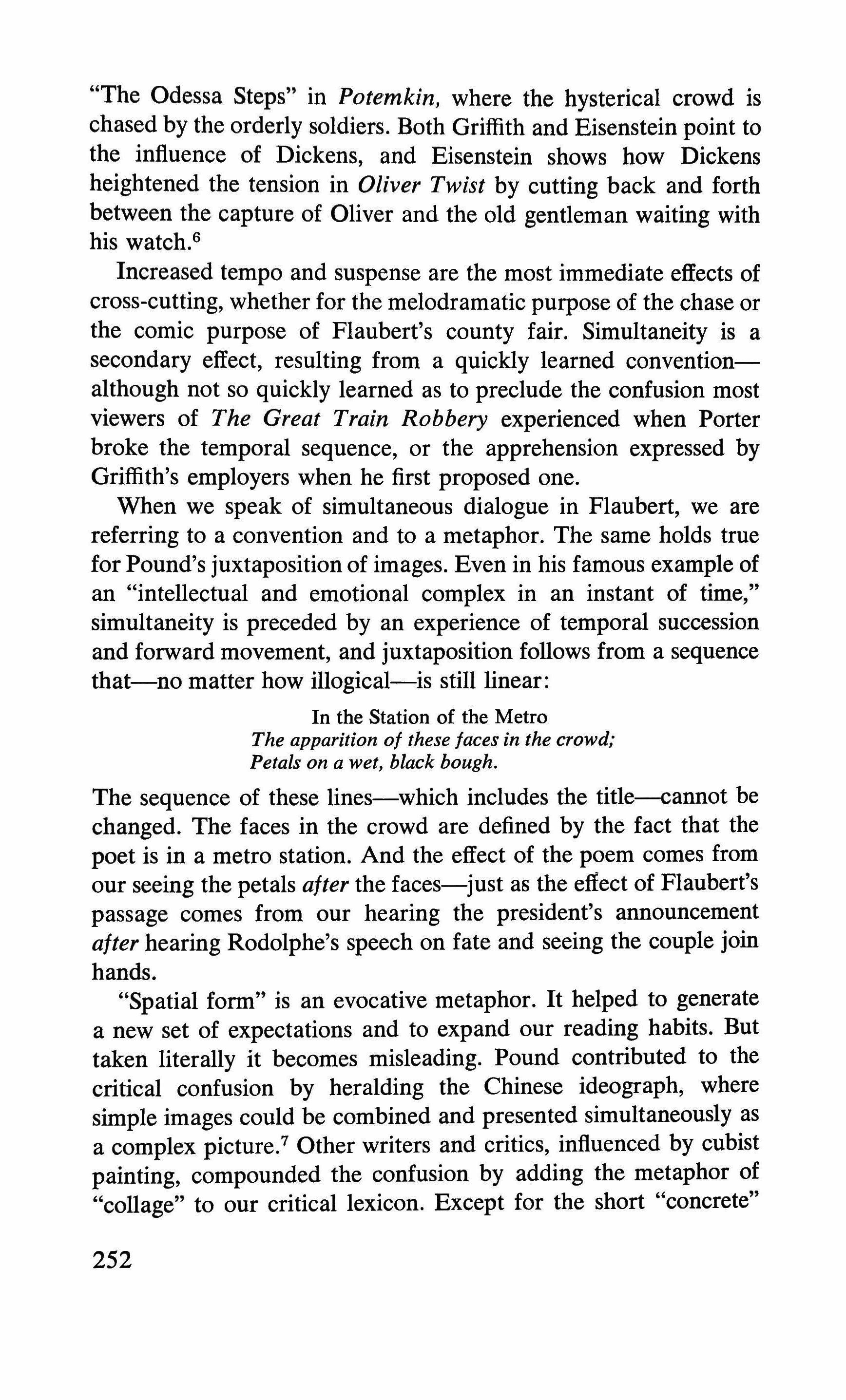
"The Odessa Steps" in Potemkin, where the hysterical crowd is chased by the orderly soldiers. Both Griffith and Eisenstein point to the influence of Dickens, and Eisenstein shows how Dickens heightened the tension in Oliver Twist by cutting back and forth between the capture of Oliver and the old gentleman waiting with his watch."
Increased tempo and suspense are the most immediate effects of cross-cutting, whether for the melodramatic purpose of the chase or the comic purpose of Flaubert's county fair. Simultaneity is a secondary effect, resulting from a quickly learned conventionalthough not so quickly learned as to preclude the confusion most viewers of The Great Train Robbery experienced when Porter broke the temporal sequence, or the apprehension expressed by Griffith's employers when he first proposed one.
When we speak of simultaneous dialogue in Flaubert, we are referring to a convention and to a metaphor. The same holds true for Pound's juxtaposition of images. Even in his famous example of an "intellectual and emotional complex in an instant of time," simultaneity is preceded by an experience of temporal succession and forward movement, and juxtaposition follows from a sequence that-no matter how illogical-is still linear:
In the Station of the Metro
The apparition of these faces in the crowd; Petals on a wet, black bough.
The sequence of these lines-which includes the title-cannot be changed. The faces in the crowd are defined by the fact that the poet is in a metro station. And the effect of the poem comes from our seeing the petals after the faces-just as the effect of Flaubert's passage comes from our hearing the president's announcement after hearing Rodolphe's speech on fate and seeing the couple join hands.
"Spatial form" is an evocative metaphor. It helped to generate a new set of expectations and to expand our reading habits. But taken literally it becomes misleading. Pound contributed to the critical confusion by heralding the Chinese ideograph, where simple images could be combined and presented simultaneously as a complex picture." Other writers and critics, influenced by cubist painting, compounded the confusion by adding the metaphor of "collage" to our critical lexicon. Except for the short "concrete"
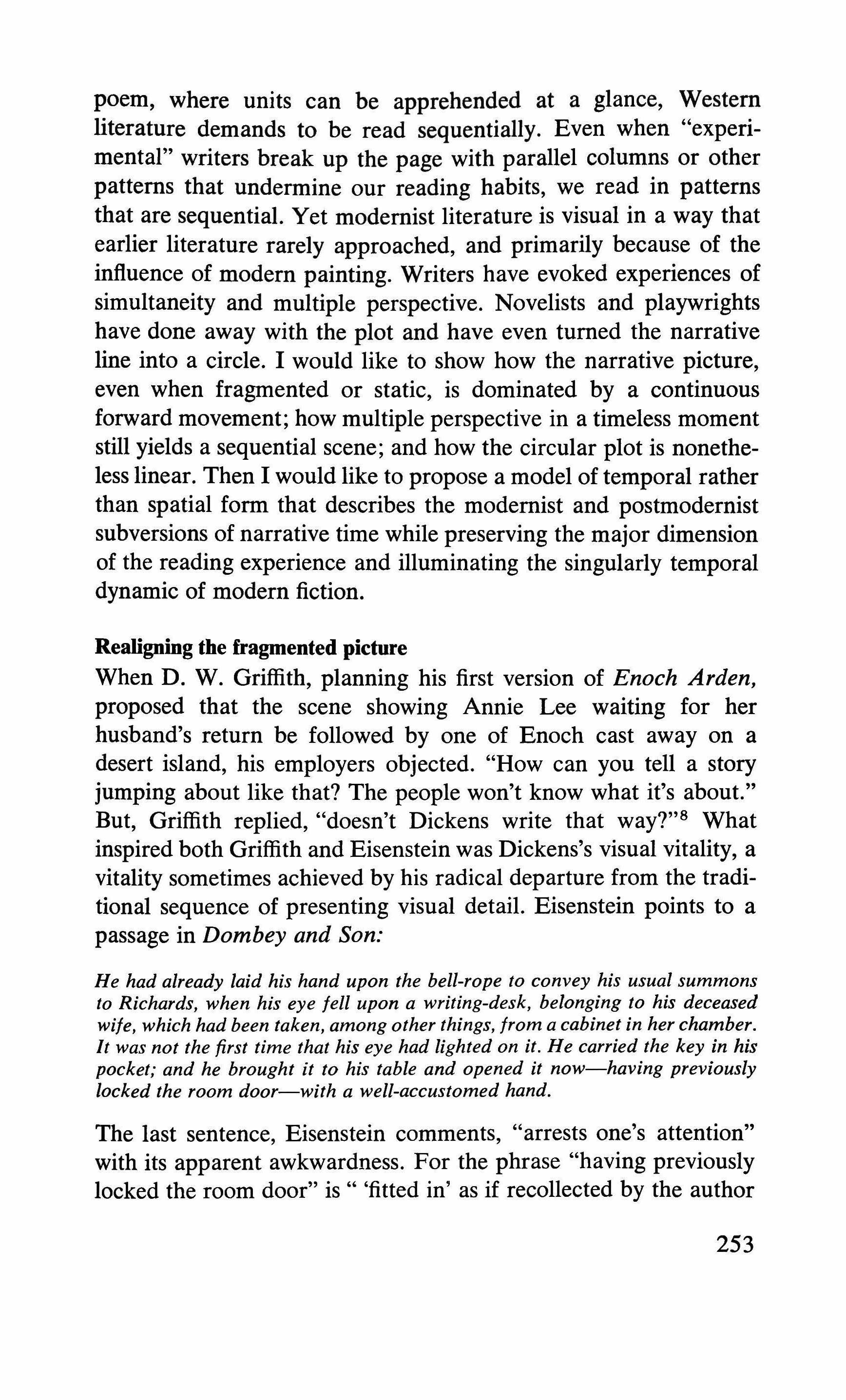
poem, where units can be apprehended at a glance, Western literature demands to be read sequentially. Even when "experimental" writers break up the page with parallel columns or other patterns that undermine our reading habits, we read in patterns that are sequential. Yet modernist literature is visual in a way that earlier literature rarely approached, and primarily because of the influence of modern painting. Writers have evoked experiences of simultaneity and multiple perspective. Novelists and playwrights have done away with the plot and have even turned the narrative line into a circle. I would like to show how the narrative picture, even when fragmented or static, is dominated by a continuous forward movement; how multiple perspective in a timeless moment still yields a sequential scene; and how the circular plot is nonetheless linear. Then I would like to propose a model of temporal rather than spatial form that describes the modernist and postmodernist subversions of narrative time while preserving the major dimension of the reading experience and illuminating the singularly temporal dynamic of modern fiction.
When D. W. Griffith, planning his first version of Enoch Arden, proposed that the scene showing Annie Lee waiting for her husband's return be followed by one of Enoch cast away on a desert island, his employers objected. "How can you tell a story jumping about like that? The people won't know what it's about." But, Griffith replied, "doesn't Dickens write that way?"B What inspired both Griffith and Eisenstein was Dickens's visual vitality, a vitality sometimes achieved by his radical departure from the traditional sequence of presenting visual detail. Eisenstein points to a passage in Dombey and Son:
He had already laid his hand upon the bell-rope to convey his usual summons to Richards, when his eye fell upon a writing-desk, belonging to his deceased wife, which had been taken, among other things, from a cabinet in her chamber. It was not the first time that his eye had lighted on it. He carried the key in his pocket; and he brought it to his table and opened it now-having previously locked the room door-with a well-accustomed hand.
The last sentence, Eisenstein comments, "arrests one's attention" with its apparent awkwardness. For the phrase "having previously locked the room door" is 'fitted in' as if recollected by the author

in the middle of a later phrase, instead of being placed where it apparently should have been, in the consecutive order of the description, that is, before the words, and he brought it to his table." And Dickens's choice was not fortuitous. "In this deliberate 'montage' displacement of the time-continuity of the description there is a brilliantly caught rendering of the transient thievery of the action, slipped between the preliminary action and the act of reading another's letter, carried out with absolute 'correctness' of gentlemanly dignity.?" By fragmenting the narrative picture of Mr. Dombey and creating a new sequence, Dickens causes us to see his character in surprising depth.
"My task which I am trying to achieve," wrote Joseph Conrad in words that D. W. Griffith would repeat ten years later and that might be used as an epigraph to modernism, "is, by the power of the written word to make you hear, to make you feel-it is, before all, to make you see. That-and no more, and it is everything." The Nigger of the Narcissus (1897), to which this declaration is prefaced, opens with a narrative picture that also gains its vividness from fragmentation.'? Here the fragmentation is achieved, not by breaking into the line of action, but by a flashing of the narrative eye from one part of the ship to another, back and forth in time, now focusing on the patterns of light, now cutting in a new image by way of a simile, now cutting into a close-up of parts of dress and body. I will emphasize the visual fragments.
The main deck was dark aft, but halfway from forward, through the open doors of the forecastle, two streaks of brilliant light cut the shadow A hum of voices was heard there, while port and starboard, in the illuminated doorways, silhouettes of moving men appeared for a moment, very black, without relief, like figures cut out of sheet tin. The ship was ready for sea. The carpenter had driven in the last wedge of the main-hatch battens, and, throwing down his maul, had wiped his face with great deliberation, just on the stroke of five. The decks had been swept, the windlass oiled the big tow-rope lay in long bights along one side of the main deck, with one end carried up and hung over the bows, in readiness for the tug that would come paddling and hissing noisily, hot and smoky, in the limpid cool quietness of the early morning The two forecastle lamps were turned up high, and shed an intense hard glare; shoregoing round hats were pushed far on the backs of heads, or rolled about on the deck amongst the chain-cables; white collars, undone, stuck out on each side of red faces; big arms in white sleeves gesticulated.
We could transcribe Conrad's narrative picture into a film scenario, as Eisenstein did to a sequence in Oliver Twist, to emphasize the fragmentation even further. Here is the last section:
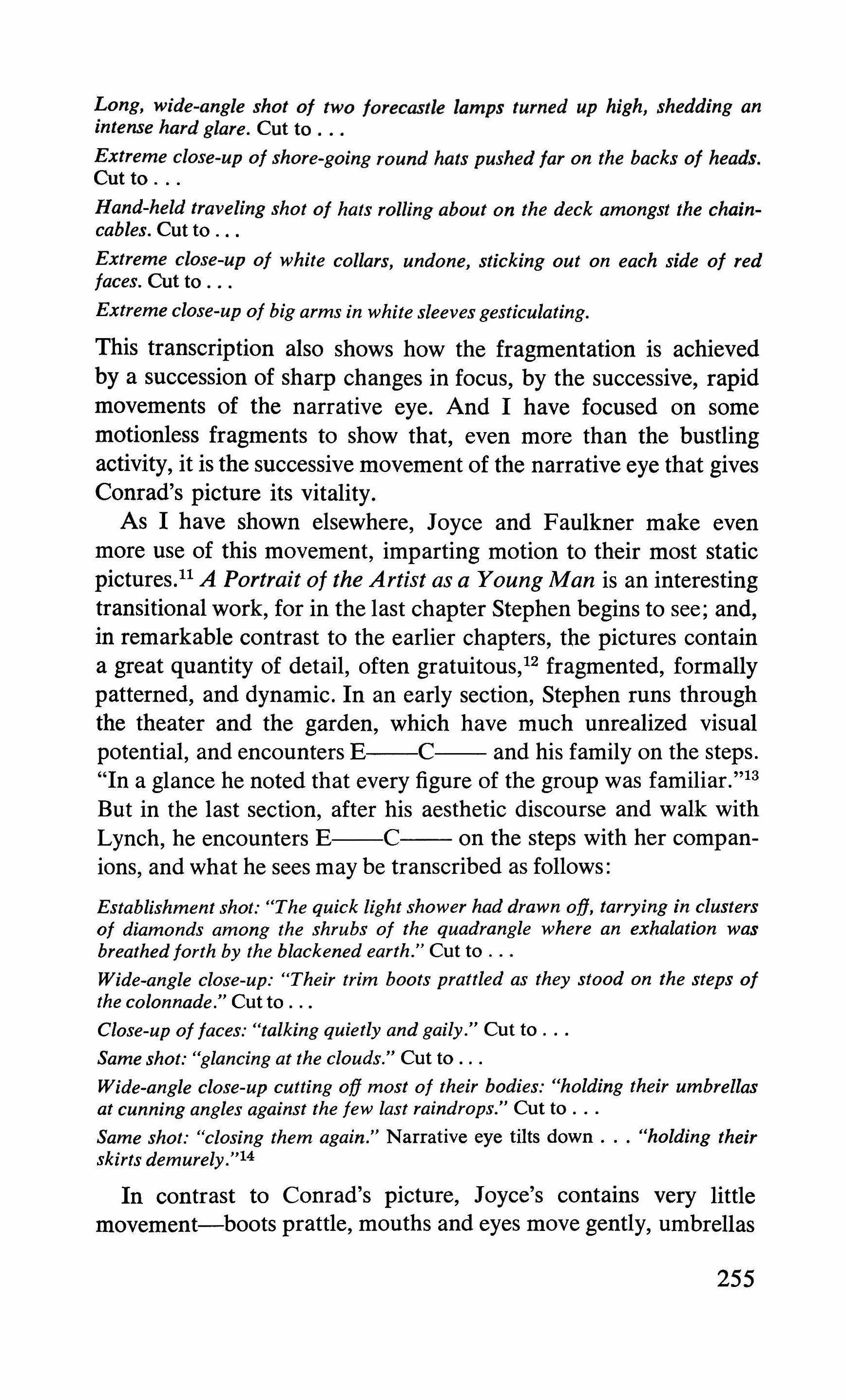
Long, wide-angle shot of two forecastle lamps turned up high, shedding an intense hard glare. Cut to
Extreme close-up of shore-going round hats pushed far on the backs of heads. Cut to
Hand-held traveling shot of hats rolling about on the deck amongst the chaincables. Cut to
Extreme close-up of white collars, undone, sticking out on each side of red faces. Cut to
Extreme close-up of big arms in white sleeves gesticulating.
This transcription also shows how the fragmentation is achieved by a succession of sharp changes in focus, by the successive, rapid movements of the narrative eye. And I have focused on some motionless fragments to show that, even more than the bustling activity, it is the successive movement of the narrative eye that gives Conrad's picture its vitality.
As I have shown elsewhere, Joyce and Faulkner make even more use of this movement, imparting motion to their most static pictures.'! A Portrait of the Artist as a Young Man is an interesting transitional work, for in the last chapter Stephen begins to see; and, in remarkable contrast to the earlier chapters, the pictures contain a great quantity of detail, often gratuitous.P fragmented, formally patterned, and dynamic. In an early section, Stephen runs through the theater and the garden, which have much unrealized visual potential, and encounters E--C-- and his family on the steps. "In a glance he noted that every figure of the group was familiar. "13 But in the last section, after his aesthetic discourse and walk with Lynch, he encounters E--C-- on the steps with her companions, and what he sees may be transcribed as follows:
Establishment shot: "The quick light shower had drawn oti. tarrying in clusters of diamonds among the shrubs of the quadrangle where an exhalation was breathed forth by the blackened earth." Cut to Wide-angle close-up: "Their trim boots prattled as they stood on the steps of the colonnade." Cut to
Close-up of faces: "talking quietly and gaily." Cut to Same shot: "glancing at the clouds." Cut to Wide-angle close-up cutting oD most of their bodies: "holding their umbrellas at cunning angles against the few last raindrops." Cut to Same shot: "closing them again." Narrative eye tilts down "holding their skirts demurely."14
In contrast to Conrad's picture, Joyce's contains very little movement-boots prattle, mouths and eyes move gently, umbrellas

are closed. But the narrative eye, flashing successively from one fragment to another, imparts a motion that engages the reader, making the act of seeing palpable-so that we see both what and how Stephen sees. Joyce brings this kind of visual movement to the forefront in Ulysses, especially in "Wandering Rocks," "Sirens," and "Circe," where the movement of the narrative eye dominates its subject. It overwhelms the subject of Faulkner's most static scene in the most stable section of The Sound and the Fury, where the narrator-trying to apprehend, comprehend, hold on to an experience that is both outrageous and amazing-continually changes his focus on Dilsey as she stands in the doorway, the "moving wall of grey light dissolving disintegrat[ing] into minute and venomous particles like dust," and "needl[ing] laterally into her flesh "15
A signal mark of modernist literature, then, is to engage the reader in the act of seeing. What the reader sees is often fragmented, and the separate fragments may be still. But what creates the fragmentation is the erratic though successive movement of a narrative eye, and this movement may dominate or overwhelm the narrative picture. I have used the term "narrative picture" instead of "description" to emphasize the fact that in literature one detail succeeds another. The film scenario, designed to transcribe the succession of visual elements, therefore serves as an ideal model and instrument with which to define the narrative dimension of literary description. It shows, not only the movement of the narrative eye as it fragments the whole and changes focus, but the successive character of this movement. For no matter how erratic the scanning in space, one pictorial event succeeds another in time, creating the primary dimension of the reading experience.
Realigning the fractured scene
"What a lark! What a plunge!" Virginia Woolf's Mrs. Dalloway has plunged into the morning air." She has also plunged from London of 1918 to Bourton of 1884. Her thoughts as well as her body in continual motion, she has walked across Victoria Street, through the park, and along Bond Street-thinking of tonight'S party, recalling her girlhood at Bourton, meeting an old Bourton friend, looking in the store windows, thinking of her daughter and of her tutor, the poor, embittered Miss Kilman, who has aroused a
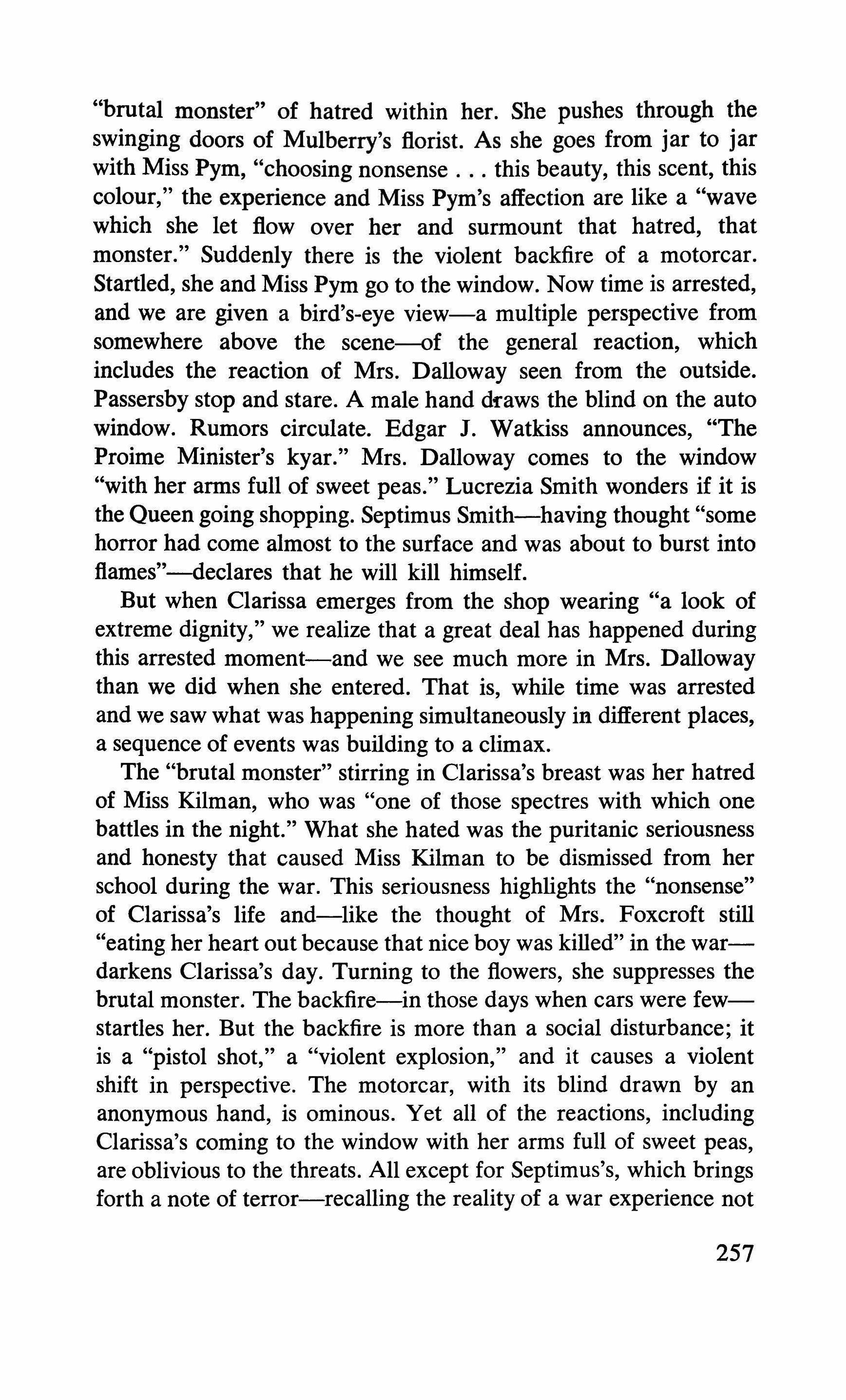
"brutal monster" of hatred within her. She pushes through the swinging doors of Mulberry's florist. As she goes from jar to jar with Miss Pym, "choosing nonsense this beauty, this scent, this colour," the experience and Miss Pym's affection are like a "wave which she let flow over her and surmount that hatred, that monster." Suddenly there is the violent backfire of a motorcar. Startled, she and Miss Pym go to the window. Now time is arrested, and we are given a bird's-eye view-a multiple perspective from somewhere above the scene--of the general reaction, which includes the reaction of Mrs. Dalloway seen from the outside. Passersby stop and stare. A male hand draws the blind on the auto window. Rumors circulate. Edgar J. Watkiss announces, "The Proime Minister's kyar." Mrs. Dalloway comes to the window "with her arms full of sweet peas." Lucrezia Smith wonders if it is the Queen going shopping. Septimus Smith-having thought "some horror had come almost to the surface and was about to burst into flames"-declares that he will kill himself.
But when Clarissa emerges from the shop wearing "a look of extreme dignity," we realize that a great deal has happened during this arrested moment-and we see much more in Mrs. Dalloway than we did when she entered. That is, while time was arrested and we saw what was happening simultaneously in. different places, a sequence of events was building to a climax.
The "brutal monster" stirring in Clarissa's breast was her hatred of Miss Kilman, who was "one of those spectres with which one battles in the night." What she hated was the puritanic seriousness and honesty that caused Miss Kilman to be dismissed from her school during the war. This seriousness highlights the "nonsense" of Clarissa's life and-like the thought of Mrs. Foxcroft still "eating her heart out because that nice boy was killed" in the wardarkens Clarissa's day. Turning to the flowers, she suppresses the brutal monster. The backfire-in those days when cars were fewstartles her. But the backfire is more than a social disturbance; it is a "pistol shot," a "violent explosion," and it causes a violent shift in perspective. The motorcar, with its blind drawn by an anonymous hand, is ominous. Yet all of the reactions, including Clarissa's coming to the window with her arms full of sweet peas, are oblivious to the threats. All except for Septimus's, which brings forth a note of terror-recalling the reality of a war experience not
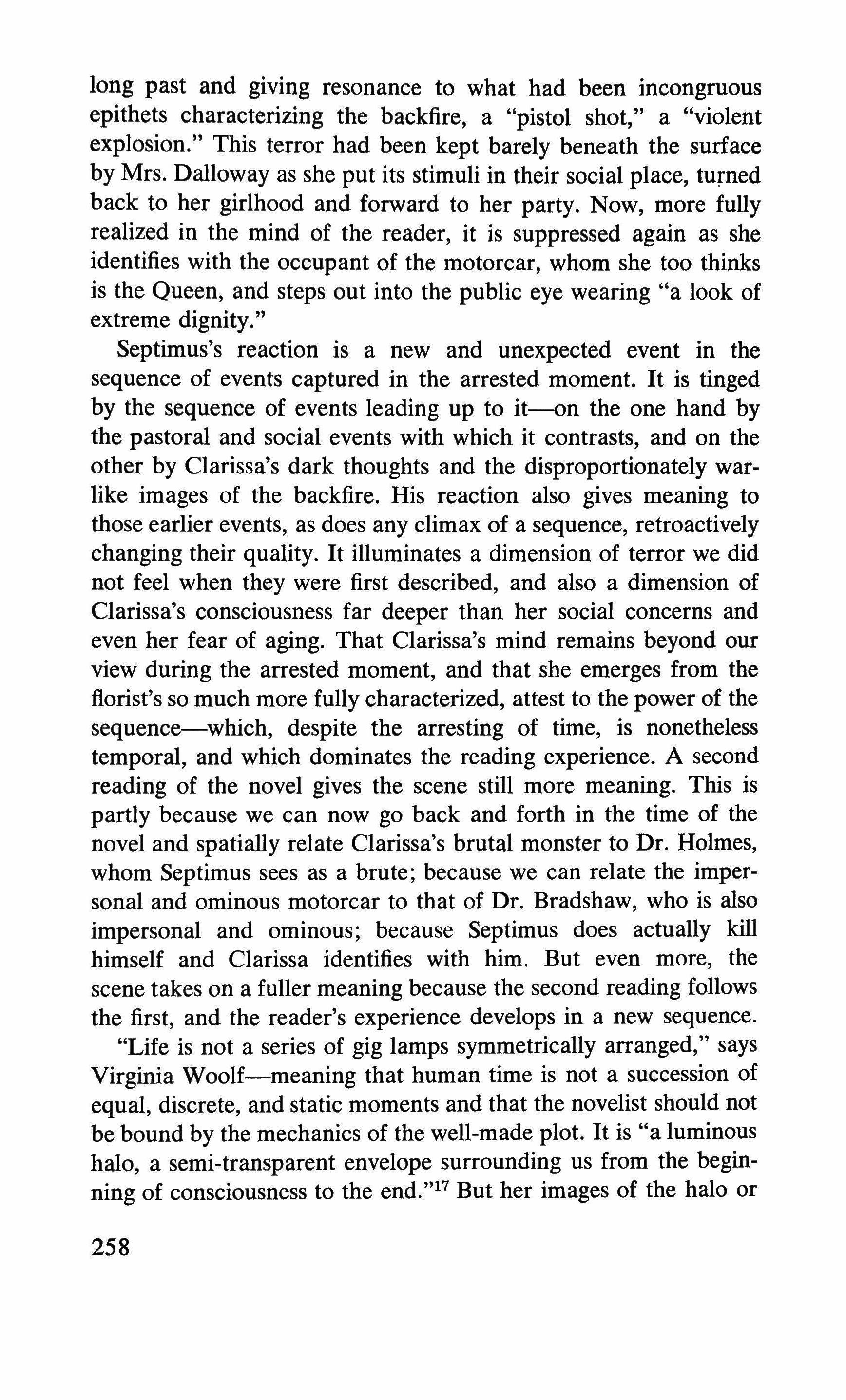
long past and giving resonance to what had been incongruous epithets characterizing the backfire, a "pistol shot," a "violent explosion." This terror had been kept barely beneath the surface by Mrs. Dalloway as she put its stimuli in their social place, turned back to her girlhood and forward to her party. Now, more fully realized in the mind of the reader, it is suppressed again as she identifies with the occupant of the motorcar, whom she too thinks is the Queen, and steps out into the public eye wearing "a look of extreme dignity."
Septimus's reaction is a new and unexpected event in the sequence of events captured in the arrested moment. It is tinged by the sequence of events leading up to it-on the one hand by the pastoral and social events with which it contrasts, and on the other by Clarissa's dark thoughts and the disproportionately warlike images of the backfire. His reaction also gives meaning to those earlier events, as does any climax of a sequence, retroactively changing their quality. It illuminates a dimension of terror we did not feel when they were first described, and also a dimension of Clarissa's consciousness far deeper than her social concerns and even her fear of aging. That Clarissa's mind remains beyond our view during the arrested moment, and that she emerges from the florist's so much more fully characterized, attest to the power of the sequence-which, despite the arresting of time, is nonetheless temporal, and which dominates the reading experience. A second reading of the novel gives the scene still more meaning. This is partly because we can now go back and forth in the time of the novel and spatially relate Clarissa's brutal monster to Dr. Holmes, whom Septimus sees as a brute; because we can relate the impersonal and ominous motorcar to that of Dr. Bradshaw, who is also impersonal and ominous; because Septimus does actually kill himself and Clarissa identifies with him. But even more, the scene takes on a fuller meaning because the second reading follows the first, and the reader's experience develops in a new sequence.
"Life is not a series of gig lamps symmetrically arranged," says Virginia Woolf-meaning that human time is not a succession of equal, discrete, and static moments and that the novelist should not be bound by the mechanics of the well-made plot. It is "a luminous halo, a semi-transparent envelope surrounding us from the beginning of consciousness to the end."?" But her images of the halo or
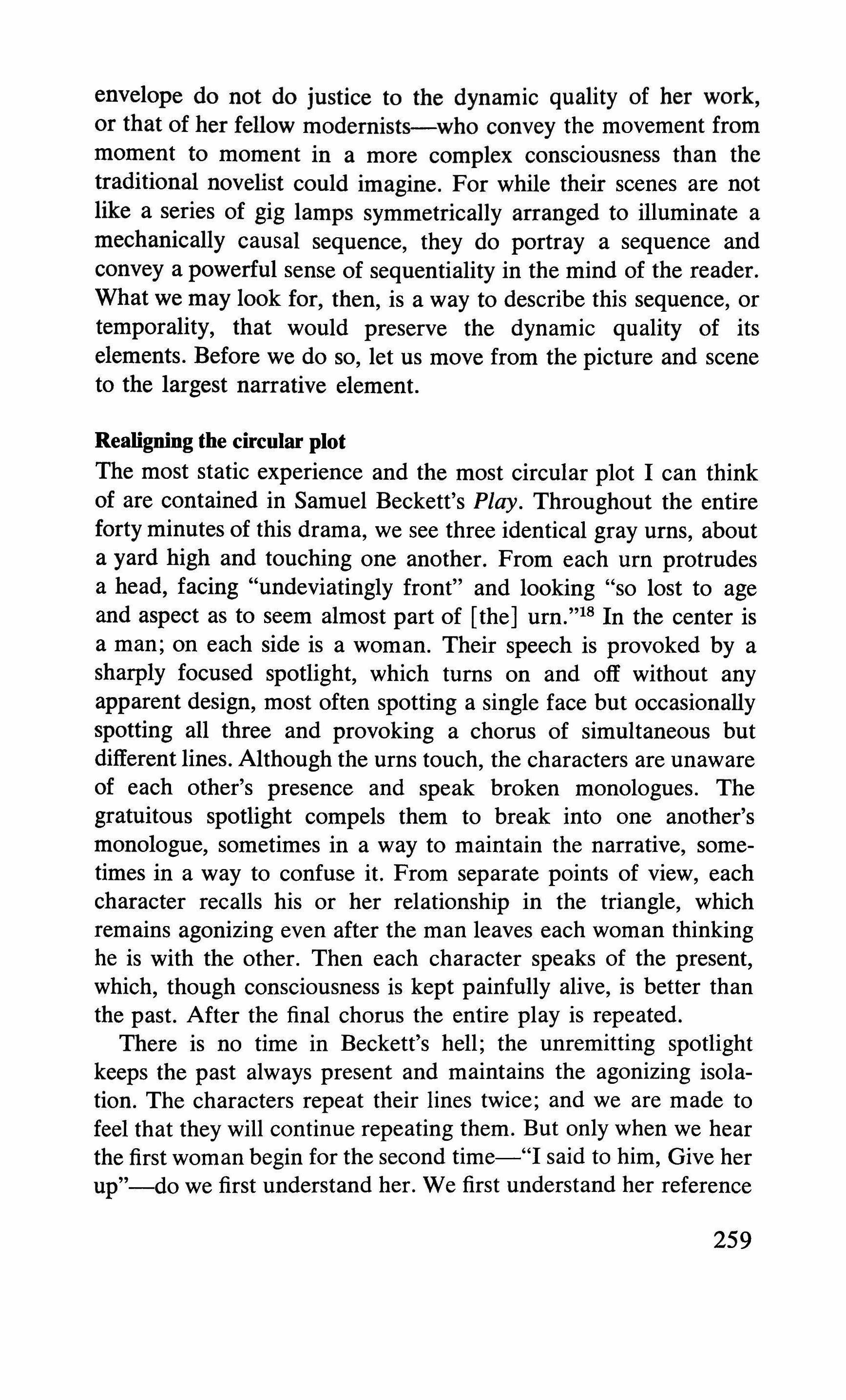
envelope do not do justice to the dynamic quality of her work, or that of her fellow modernists-who convey the movement from moment to moment in a more complex consciousness than the traditional novelist could imagine. For while their scenes are not like a series of gig lamps symmetrically arranged to illuminate a mechanically causal sequence, they do portray a sequence and convey a powerful sense of sequentiality in the mind of the reader. What we may look for, then, is a way to describe this sequence, or temporality, that would preserve the dynamic quality of its elements. Before we do so, let us move from the picture and scene to the largest narrative element.
The most static experience and the most circular plot I can think of are contained in Samuel Beckett's Play. Throughout the entire forty minutes of this drama, we see three identical gray urns, about a yard high and touching one another. From each urn protrudes a head, facing "undeviatingly front" and looking "so lost to age and aspect as to seem almost part of [the] um.'?" In the center is a man; on each side is a woman. Their speech is provoked by a sharply focused spotlight, which turns on and off without any apparent design, most often spotting a single face but occasionally spotting all three and provoking a chorus of simultaneous but different lines. Although the urns touch, the characters are unaware of each other's presence and speak broken monologues. The gratuitous spotlight compels them to break into one another's monologue, sometimes in a way to maintain the narrative, sometimes in a way to confuse it. From separate points of view, each character recalls his or her relationship in the triangle, which remains agonizing even after the man leaves each woman thinking he is with the other. Then each character speaks of the present, which, though consciousness is kept painfully alive, is better than the past. After the final chorus the entire play is repeated. There is no time in Beckett's hell; the unremitting spotlight keeps the past always present and maintains the agonizing isolation. The characters repeat their lines twice; and we are made to feel that they will continue repeating them. But only when we hear the first woman begin for the second time-"I said to him, Give her up"-do we first understand her. We first understand her reference
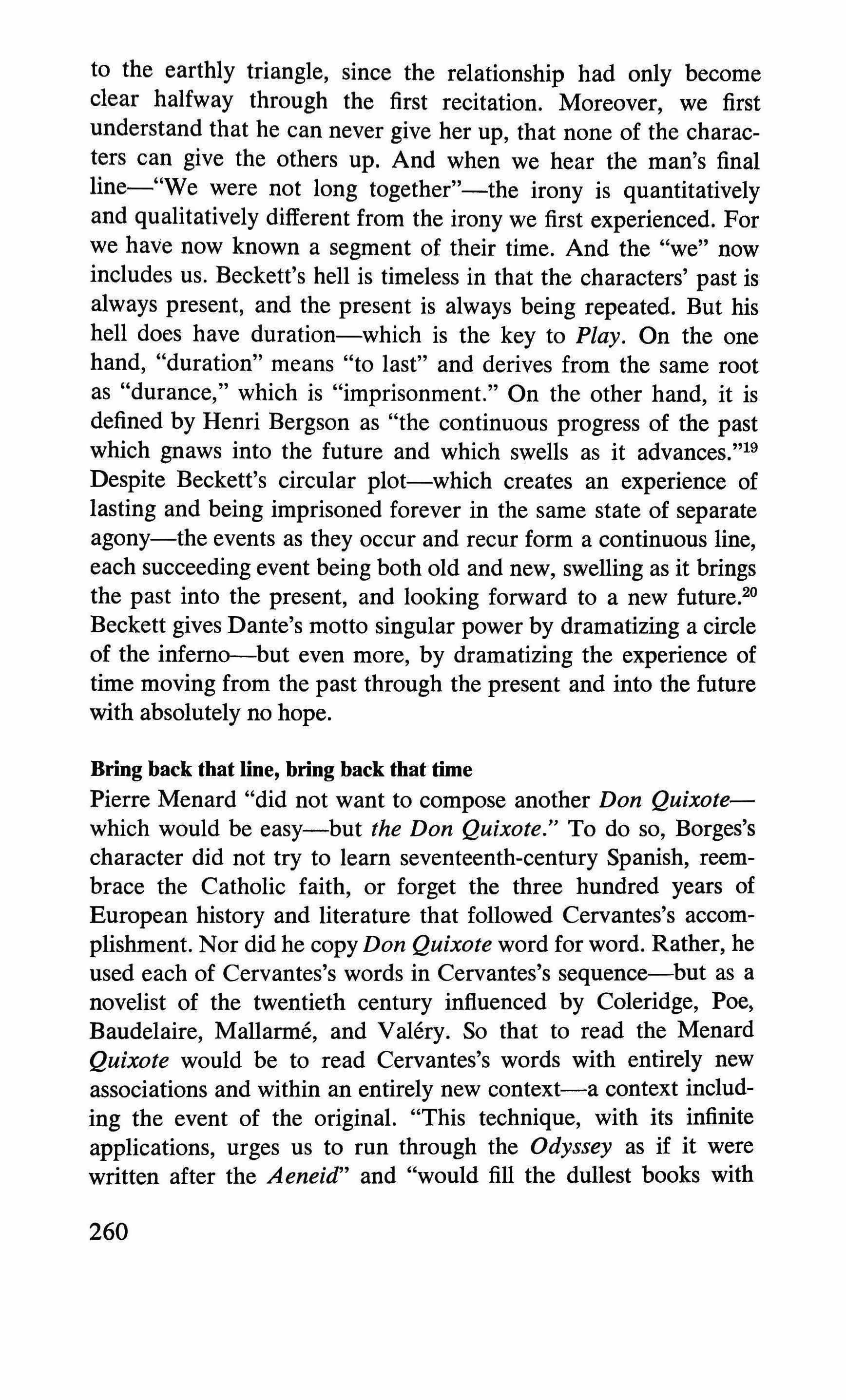
to the earthly triangle, since the relationship had only become clear halfway through the first recitation. Moreover, we first understand that he can never give her up, that none of the characters can give the others up. And when we hear the man's final line-"We were not long together"-the irony is quantitatively and qualitatively different from the irony we first experienced. For we have now known a segment of their time. And the "we" now includes us. Beckett's hell is timeless in that the characters' past is always present, and the present is always being repeated. But his hell does have duration-which is the key to Play. On the one hand, "duration" means "to last" and derives from the same root as "durance," which is "imprisonment." On the other hand, it is defined by Henri Bergson as "the continuous progress of the past which gnaws into the future and which swells as it advances.Y'?
Despite Beckett's circular plot-which creates an experience of lasting and being imprisoned forever in the same state of separate agony-the events as they occur and recur form a continuous line, each succeeding event being both old and new, swelling as it brings the past into the present, and looking forward to a new future." Beckett gives Dante's motto singular power by dramatizing a circle of the inferno-but even more, by dramatizing the experience of time moving from the past through the present and into the future with absolutely no hope.
Bring back that line, bring back that time
Pierre Menard "did not want to compose another Don Quixotewhich would be easy-but the Don Quixote." To do so, Borges's character did not try to learn seventeenth-century Spanish, reembrace the Catholic faith, or forget the three hundred years of European history and literature that followed Cervantes's accomplishment. Nor did he copy Don Quixote word for word. Rather, he used each of Cervantes's words in Cervantes's sequence-but as a novelist of the twentieth century influenced by Coleridge, Poe, Baudelaire, Mallarme, and Valery. So that to read the Menard Quixote would be to read Cervantes's words with entirely new associations and within an entirely new context-a context including the event of the original. "This technique, with its infinite applications, urges us to run through the Odyssey as if it were written after the Aeneid" and "would fill the dullest books with
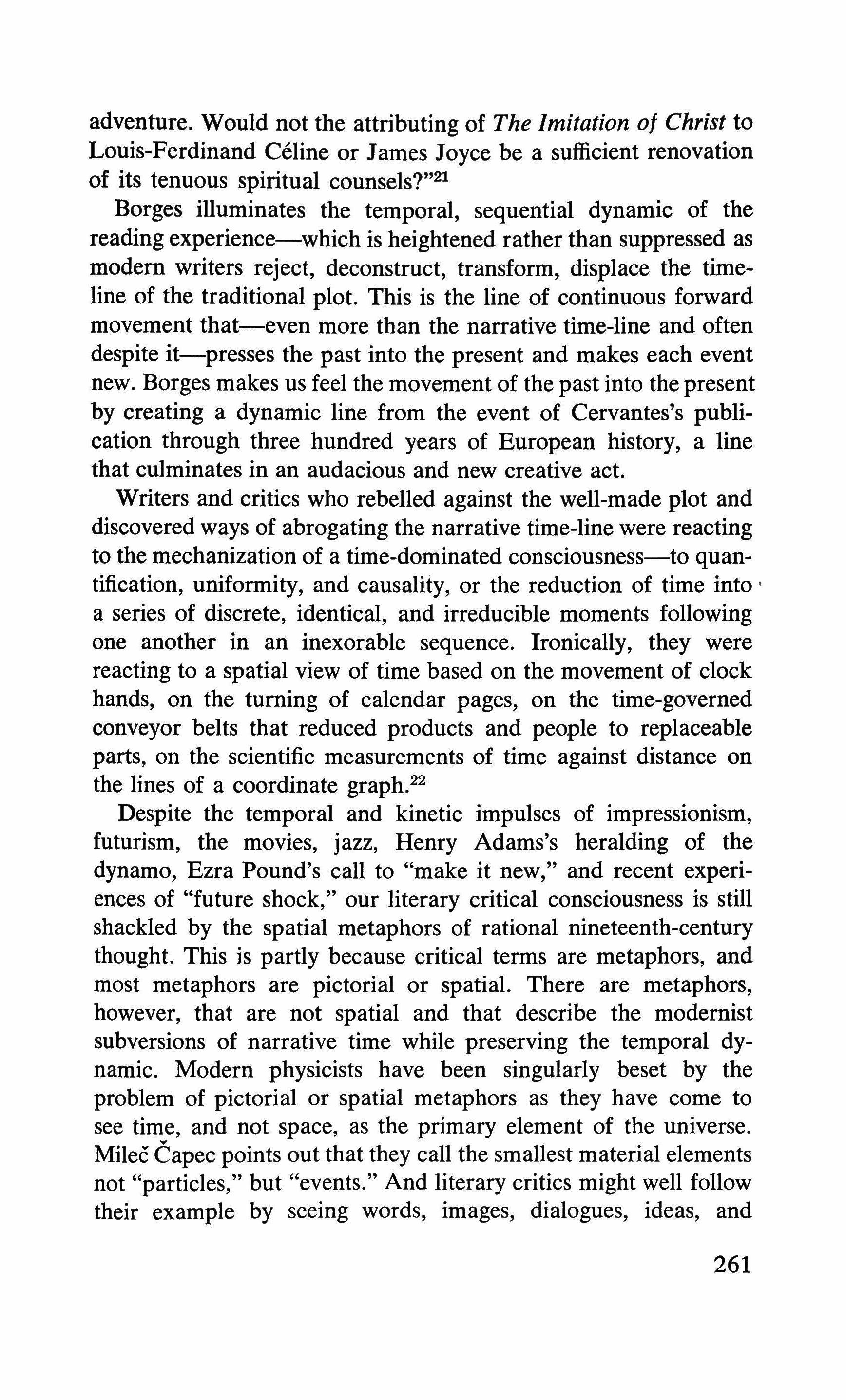
adventure. Would not the attributing of The Imitation of Christ to Louis-Ferdinand Celine or James Joyce be a sufficient renovation of its tenuous spiritual counsels?"21
Borges illuminates the temporal, sequential dynamic of the reading experience-which is heightened rather than suppressed as modern writers reject, deconstruct, transform, displace the timeline of the traditional plot. This is the line of continuous forward movement that-even more than the narrative time-line and often despite it-presses the past into the present and makes each event new. Borges makes us feel the movement of the past into the present by creating a dynamic line from the event of Cervantes's publication through three hundred years of European history, a line that culminates in an audacious and new creative act.
Writers and critics who rebelled against the well-made plot and discovered ways of abrogating the narrative time-line were reacting to the mechanization of a time-dominated consciousness-to quantification, uniformity, and causality, or the reduction of time into' a series of discrete, identical, and irreducible moments following one another in an inexorable sequence. Ironically, they were reacting to a spatial view of time based on the movement of clock hands, on the turning of calendar pages, on the time-governed conveyor belts that reduced products and people to replaceable parts, on the scientific measurements of time against distance on the lines of a coordinate graph."
Despite the temporal and kinetic impulses of impressionism, futurism, the movies, jazz, Henry Adams's heralding of the dynamo, Ezra Pound's call to "make it new," and recent experiences of "future shock," our literary critical consciousness is still shackled by the spatial metaphors of rational nineteenth-century thought. This is partly because critical terms are metaphors, and most metaphors are pictorial or spatial. There are metaphors, however, that are not spatial and that describe the modernist subversions of narrative time while preserving the temporal dynamic. Modern physicists have been singularly beset by the problem of pictorial or spatial metaphors as they have come to see time, and not space, as the primary element of the universe. Milec Capec points out that they call the smallest material elements not "particles," but "events." And literary critics might well follow their example by seeing words, images, dialogues, ideas, and
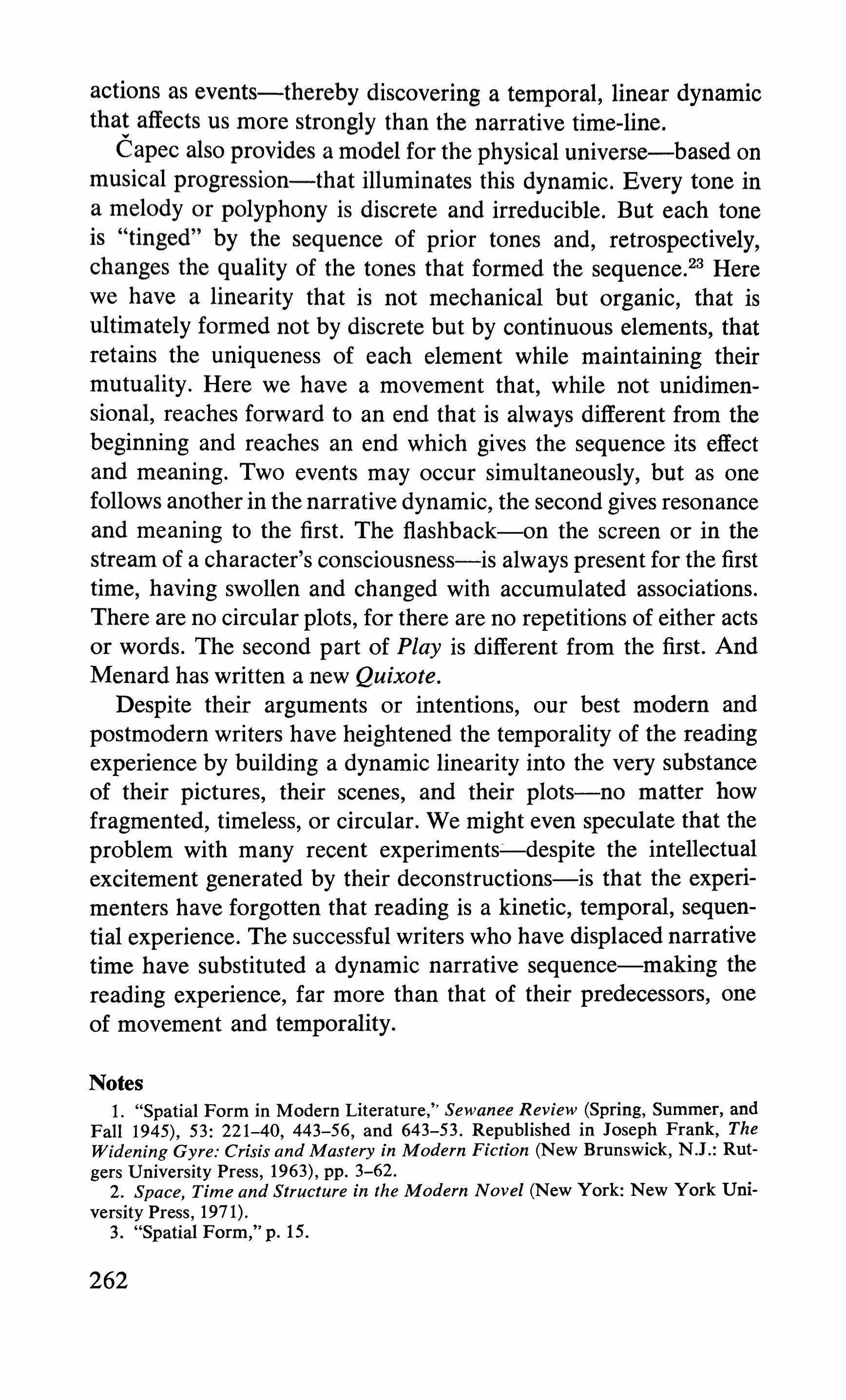
actions as events-thereby discovering a temporal, linear dynamic that affects us more strongly than the narrative time-line.
Capec also provides a model for the physical universe-based on musical progression-that illuminates this dynamic. Every tone in a melody or polyphony is discrete and irreducible. But each tone is "tinged" by the sequence of prior tones and, retrospectively, changes the quality of the tones that formed the sequence." Here we have a linearity that is not mechanical but organic, that is ultimately formed not by discrete but by continuous elements, that retains the uniqueness of each element while maintaining their mutuality. Here we have a movement that, while not unidimensional, reaches forward to an end that is always different from the beginning and reaches an end which gives the sequence its effect and meaning. Two events may occur simultaneously, but as one follows another in the narrative dynamic, the second gives resonance and meaning to the first. The flashback-on the screen or in the stream of a character's consciousness-is always present for the first time, having swollen and changed with accumulated associations. There are no circular plots, for there are no repetitions of either acts or words. The second part of Play is different from the first. And Menard has written a new Quixote.
Despite their arguments or intentions, our best modern and postmodern writers have heightened the temporality of the reading experience by building a dynamic linearity into the very substance of their pictures, their scenes, and their plots-no matter how fragmented, timeless, or circular. We might even speculate that the problem with many recent experiments-e-despite the intellectual excitement generated by their deconstructions-is that the experimenters have forgotten that reading is a kinetic, temporal, sequential experience. The successful writers who have displaced narrative time have substituted a dynamic narrative sequence-making the reading experience, far more than that of their predecessors, one of movement and temporality.
Notes
1. "Spatial Form in Modern Literature," Sewanee Review (Spring, Summer, and Fall 1945), 53: 221-40, 443-56, and 643-53. Republished in Joseph Frank, The Widening Gyre: Crisis and Mastery in Modern Fiction (New Brunswick, N.J.: Rutgers University Press, 1963), pp. 3-62.
2. Space, Time and Structure in the Modern Novel (New York: New York University Press, 1971).
3. "Spatial Form," p. 15.
262

4. Tr. Paul de Man (New York: Norton, 1965), p. 107.
5. "Style and Medium in the Motion Pictures," Film Theory and Criticism, ed. Gerald Mast and Marshall Cohen (New York: Oxford, 1974), pp. 151-69.
6. Sergei Eisenstein, "Dickens, Griffith, and the Film Today," Film Form, ed. and tr. Jay Leyda (New York: Harcourt, Brace and World, 1949), pp. 218-24.
7. Eisenstein was also influenced by the Chinese ideograph; see "The Cinematographic Principle and the Ideogram" in Film Form. And Eisenstein also misrepresented the effect of montage in his argument with Kuleshov and Pudovkin. He argues that the key to montage is not linking but collision, ignoring the fact that (except for montage within the shot, collisions of lines, volumes, etc.) montage is successive, the power and meaning being generated by the unique sequence.
8. Quoted by Eisenstein in "Dickens, Griffith, and the Film Today," p. 204.
9. P.211.
10. (Garden City, N.Y.: Doubleday, 1914), p. 14. The passage below is taken from pp. 17-19.
11. "Two Pictures in Joyce's Portrait," read to the Modern Language Association, 1976, and still in progress. "Reeling Through Faulkner: Pictures of Motion, Pictures in Motion," to be published in Modern Fiction Studies.
12. Alan Spiegel uses the term "adventitious" for a similar effect in his excellent study Fiction and the Camera Eye: Visual Consciousness in Film and the Modern Novel (Charlottesville: University of Virginia Press, 1976), pp. 90-108.
13. A Portrait of the Artist as a Young Man (New York: Viking, 1968), p. 86.
14. P.2-16.
15. For a detailed analysis of this two-page passage, see my "Reeling Through Faulkner."
16. Virginia Woolf, Mrs. Dalloway (New York: Harcourt, Brace and World, 1953), p. 3. Subsequent references are from pp. 3-24.
17. "Modern Fiction," The Common Reader, First Series (New York: Harcourt, Brace and World, 1953), p. 154.
18. Play, in Cascando and Other Short Dramatic Pieces (New York: Grove Press, 1968), p. 45.
19. Creative Evolution. tr. Arthur Mitchell (New York: Random House, 1944), p.7.
20. After the London production, Beckett suggested that the order of "interrogation" be varied in the second part. According to Ruby Cohn, "this radical change is in harmony with the play's timeless setting. Chronology was vitally important in earthly affairs, but chronology is already transcended in the replay of what was 'just play.' There can be no earthly reason to insist upon it or upon any temporal order. The speeches come to us in time, but it does not matter what time." Back to Beckett (Princeton: Princeton University Press, 1973), p. 200. While this change is in harmony with the timeless setting, it also accentuates the temporal movement that the audience experiences. A practical dramatist involved in his productions, Beckett may have added the change to sustain the audience's interest-which is an interest in what happens next.
21. Jorge Luis Borges, "Pierre Menard, Author of Don Quixote," tr. Anthony Bonner, Ficciones (London: Weidenfeld and Nicolson, 1962), pp. 54-55.
22. For further discussion of the coordinate graph, see my "Enter the Frame," TriQuarterly 30 (Spring 1974), pp. 71-82.
23. The Philosophical Impact of Contemporary Physics (New York: Van Nostrand, 1961), pp. 276ff. and 371-72.
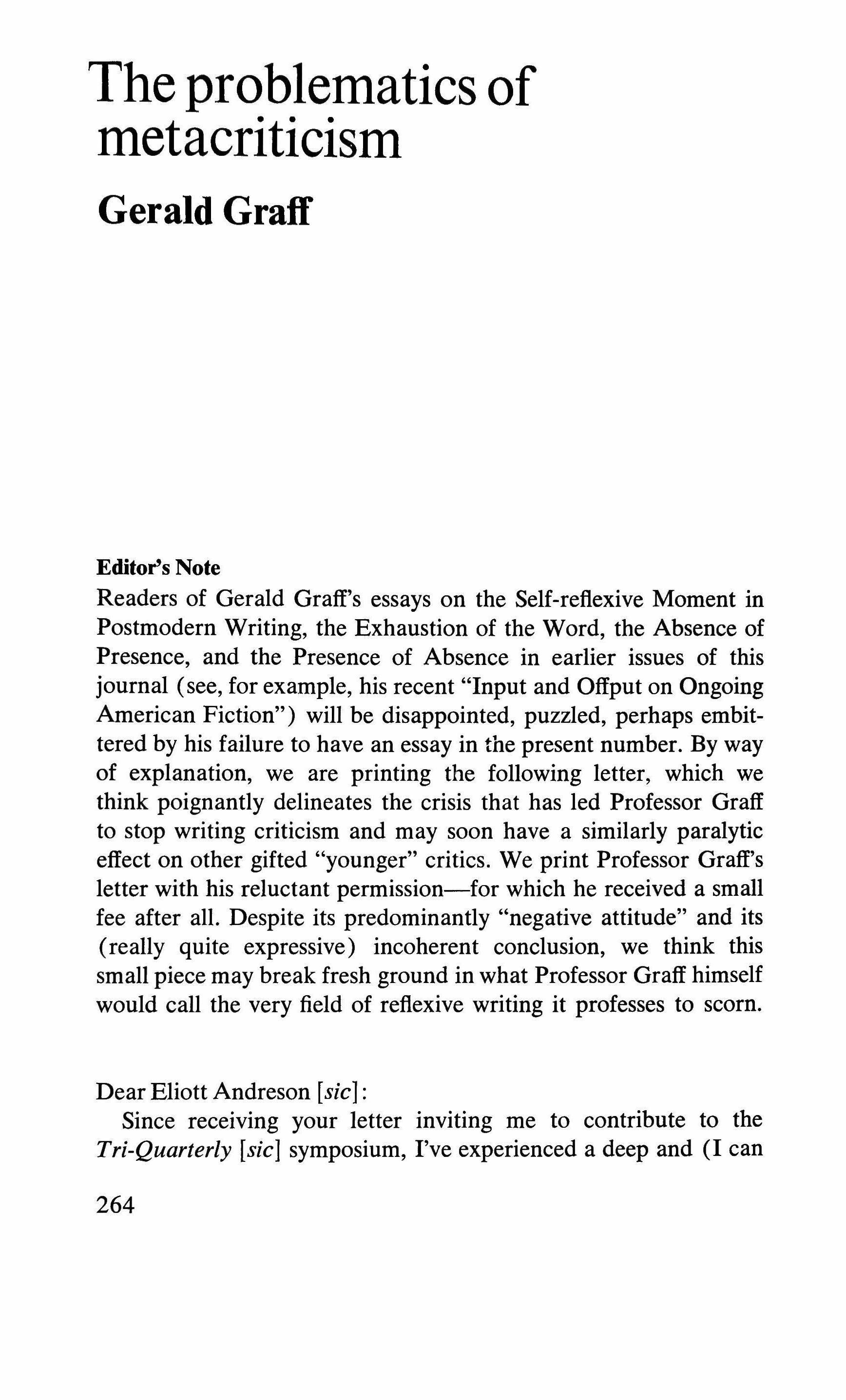
Editor's Note
Readers of Gerald Graff's essays on the Self-reflexive Moment in Postmodern Writing, the Exhaustion of the Word, the Absence of Presence, and the Presence of Absence in earlier issues of this journal (see, for example, his recent "Input and Offput on Ongoing American Fiction") will be disappointed, puzzled, perhaps embittered by his failure to have an essay in the present number. By way of explanation, we are printing the following letter, which we think poignantly delineates the crisis that has led Professor Graff to stop writing criticism and may soon have a similarly paralytic effect on other gifted "younger" critics. We print Professor Graff's letter with his reluctant permission-for which he received a small fee after all. Despite its predominantly "negative attitude" and its (really quite expressive) incoherent conclusion, we think this small piece may break fresh ground in what Professor Graff himself would call the very field of reflexive writing it professes to scorn.
Dear Eliott Andreson [sic] :
Since receiving your letter inviting me to contribute to the Tri-Quarterly [sic] symposium, I've experienced a deep and (I can 264

say it without exaggeration or self-pity) profoundly disturbing ambivalence. What, I've asked myself, could 1 conceivably have to "say" in response to your questions about "realism" and "antirealism" and the rest-if 1 remember your phrases correctly? Supposing 1 did find something to say (it's not all that hard), what would be the point?
1 don't of course propose to bore the two of us with an elaborate show of "reasons" why it seems to me such statements right now, flat in the middle of this Sudden-Death Overtime of Western Civilization, would be useless. I'm taking it for granted that you and 1 have read our Saussure, our Derrida, our Foucault, etc., etc., well enough to have no need of whining about the fact that we're all prisoners of our sign systems and epistemes and paradigms, etc., that whatever efforts we make at "authentic" response are themselves "already written," already quoted and encoded and syntactified and linguified, already inserted someplace in the epistemological locker room between the signifier and the signified and all the rest of that kind of crap. I'm figuring that "you" and "I" (and 1 use those terms with a full sense of just how problematical they are) have moved beyond those puerile experiments in "the aesthetics of silence," "the literature of exhaustion," the "anti-story," the postanti-story, etc., etc.-experiments which in their very pretense of innocence and withdrawal only add another layer to the rubbish heap of exhausted talk-talk-talk. Yet now, as if there wasn't already enough completely jejune racket, you seem to want to produce more. Why? To what end?
Please don't misunderstand me. Or rather, if you must misunderstand me-since misunderstanding is just the true name for that act of solipsism and solecism that we call "understanding"please try to misunderstand me in a more interesting way than your invitation seems to me to suggest you are doing. Not that I'd claim that my misunderstanding of you is any less inevitable, not to say any less banal, than your misunderstanding of my misunderstanding of you. What 1 mean is, please don't think I'm making some kind of a refusal. Don't put me in that bag, for Chrissakes! 1 mean it's not just a case of my not wanting to do yet another exposition of yet another author's confession (as if somebody cared!) of his inability to "write"; not just a case of my not wanting

to plead my inability to interpret that chimerical "reality" in which not even the stockbrokers continue any longer to believe. No, I would hope it's a little more than something that obvious. It's that I have no intention of making solemn gestures of refusal either, as if the act of not writing were somehow less a form of nauseating complicity than the act of writing itself. I'm far too stupefyingly bored with the human pretense of Communicationthough I'm not without appreciation of the existential Safety Blitz that's implicit in this very pretense-to get caught up in all that again. Nor could I hope to deceive myself into supposing that you yourself or your readers-who the hell are they, anyway?-could be taken in by such gestures even for a moment.
Lest any of this look like some kind of equivocation, let me add that I don't intend to be persuaded to change my mind by any further coaxing on Triquarterly's [sic] part, whatever form it may take. Uh-uh, baby, no way. You know perfectly well that my means are modest, that insofar as I make my practical way through this trite and tasteless metafiction I call my "life," I do it on what trivial leavings our culture condescends to grant to supernumerary academic "humanists" like me. You also know with what scorn and indifference I regard the question of my Market Value as a publishing Commodity. It has been at least six months since I last went through the Periodical Room in search of journal references to me. What difference could it make to me that I got only pittances, or nothing at all, for those earlier attempts at "criticism" which Tri-Quarter [sic] saw fit to publish and which I now look back on (or, rather, avoid looking back on) with a contempt that I couldn't hope to express adequately? Were I still capable of taking seriously that naive conception of the unity of the "ego" that's presupposed by the concept of insult, I suppose I'd be insulted by your apology for not, as you put it, "being able to compensate me for my contribution." I would be, that is, if it mattered to me in the slightest that-as I've heard recently-you promised to pay Bob Alter something in the ball park of $500 for his contribution. That Alter should get five C's (which I should think he hardly needs) while I get zip is one of those Hegelian Ironies of History that to me are so profoundly meaningless that the very propositions in which I attempt to formulate them seem nonsensical-though
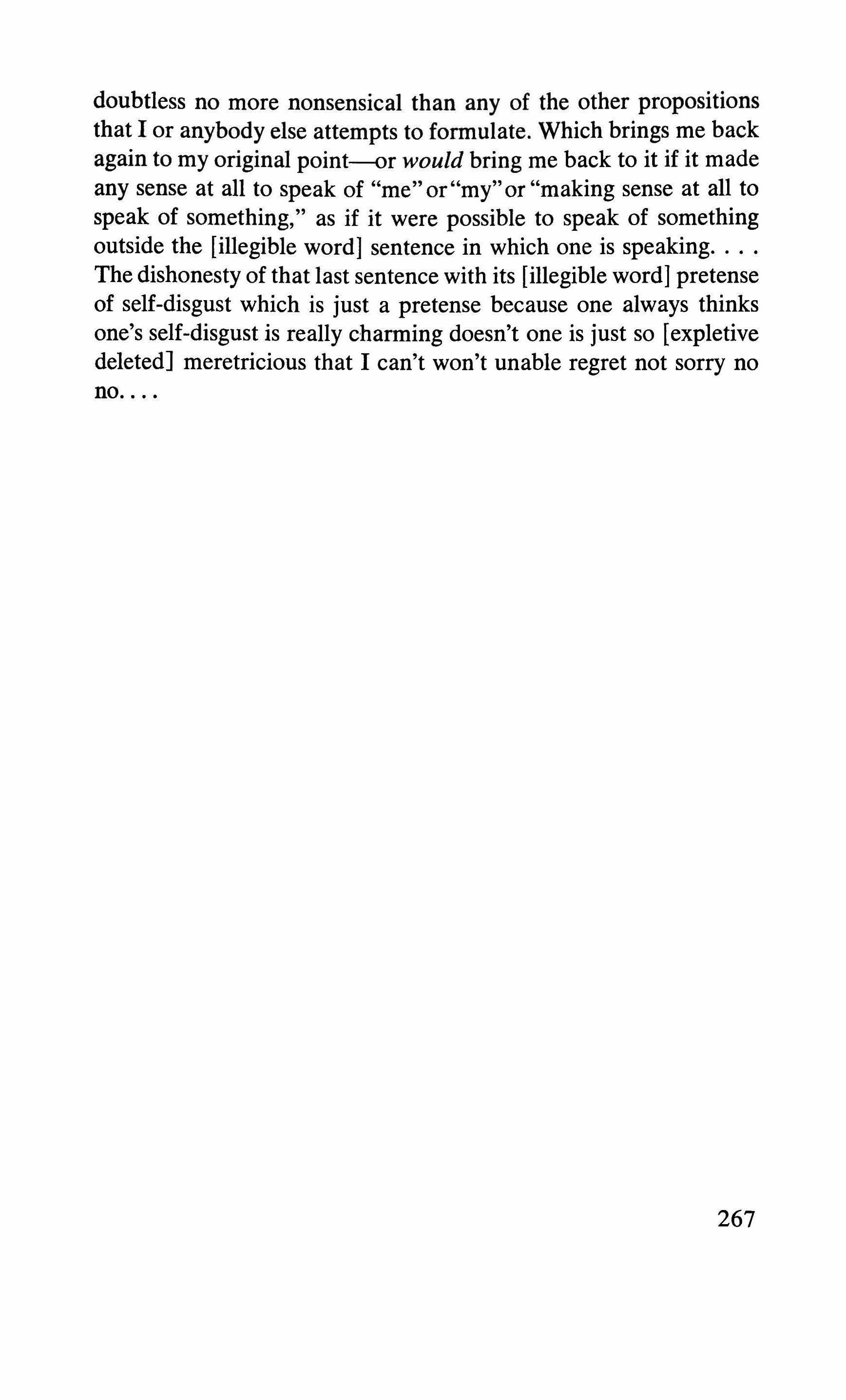
doubtless no more nonsensical than any of the other propositions that I or anybody else attempts to formulate. Which brings me back again to my original point--or would bring me back to it if it made any sense at all to speak of "me" or "my" or "making sense at all to speak of something," as if it were possible to speak of something outside the [illegible word] sentence in which one is speaking The dishonesty of that last sentence with its [illegible word] pretense of self-disgust which is just a pretense because one always thinks one's self-disgust is really charming doesn't one is just so [expletive deleted] meretricious that I can't won't unable regret not sorry no no
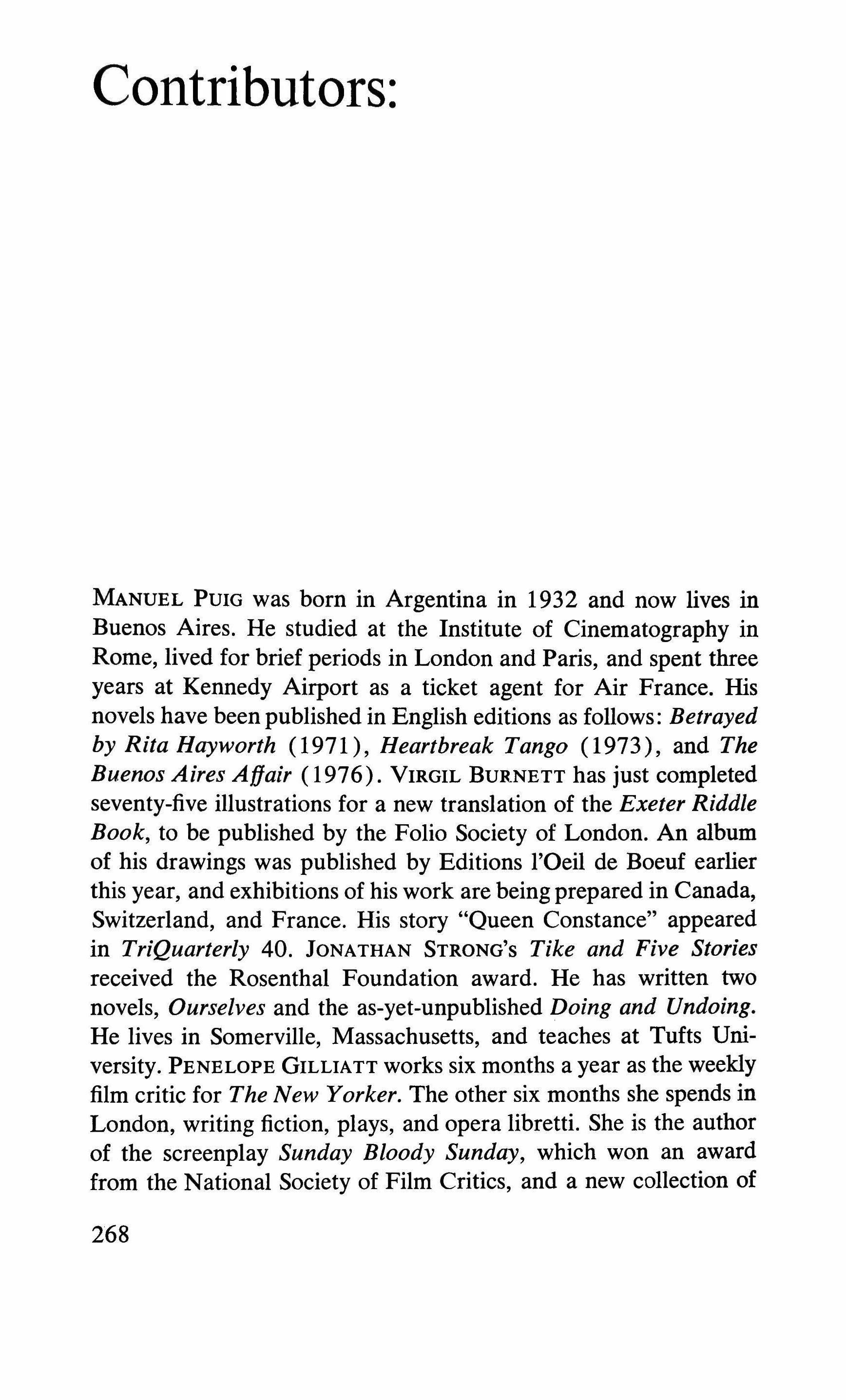
MANUEL PUIG was born in Argentina in 1932 and now lives in Buenos Aires. He studied at the Institute of Cinematography in Rome, lived for brief periods in London and Paris, and spent three years at Kennedy Airport as a ticket agent for Air France. His novels have been published in English editions as follows: Betrayed by Rita Hayworth (1971), Heartbreak Tango (1973), and The Buenos Aires Affair (1976). VIRGIL BURNETT has just completed seventy-five illustrations for a new translation of the Exeter Riddle Book, to be published by the Folio Society of London. An album of his drawings was published by Editions l'Oeil de Boeuf earlier this year, and exhibitions of his work are beingprepared in Canada, Switzerland, and France. His story "Queen Constance" appeared in TriQuarterly 40. JONATHAN STRONG'S Tike and Five Stories received the Rosenthal Foundation award. He has written two novels, Ourselves and the as-yet-unpublished Doing and Undoing. He lives in Somerville, Massachusetts, and teaches at Tufts University. PENELOPE GILLIATT works six months a year as the weekly film critic for The New Yorker. The other six months she spends in London, writing fiction, plays, and opera libretti. She is the author of the screenplay Sunday Bloody Sunday, which won an award from the National Society of Film Critics, and a new collection of 268
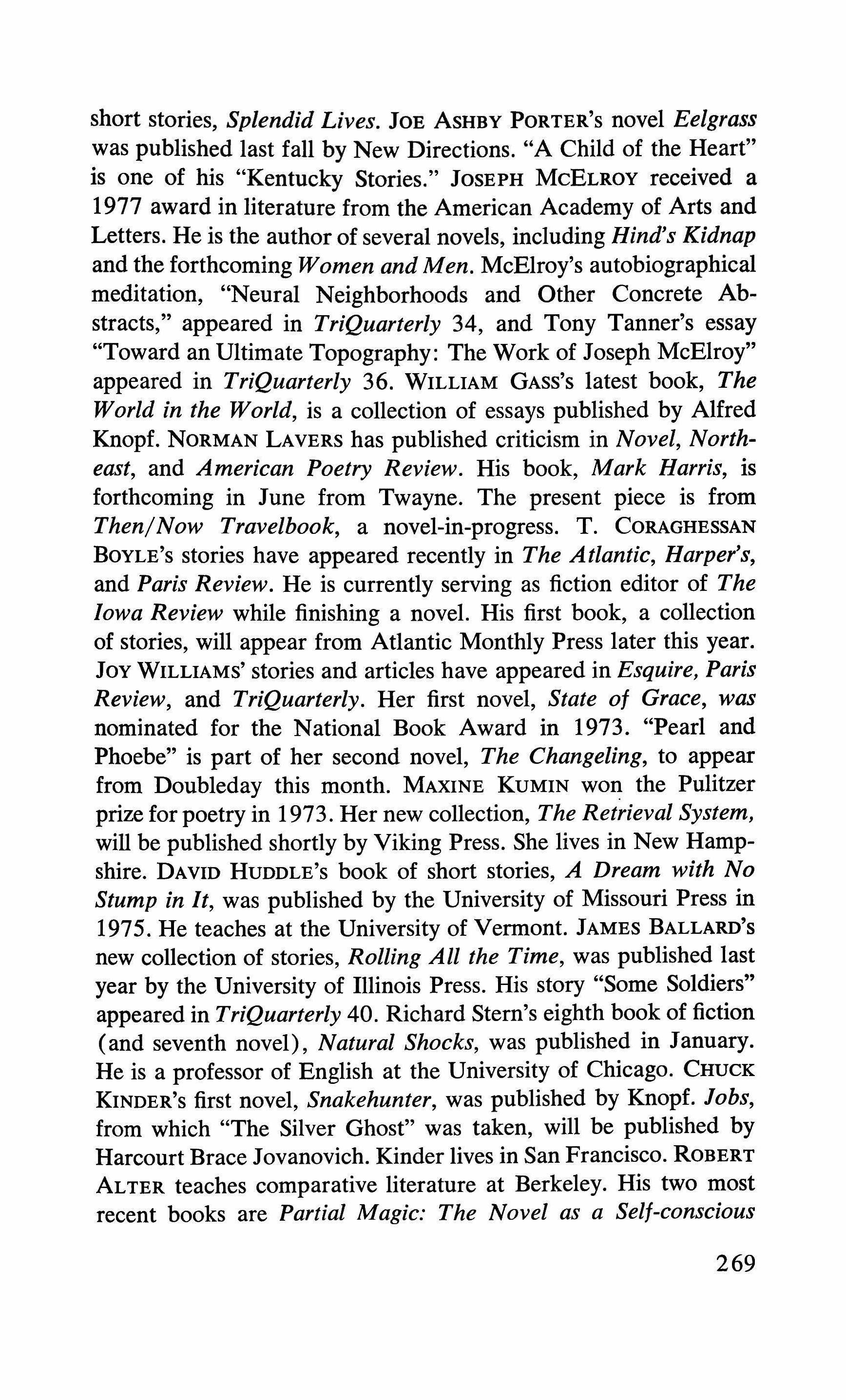
short stories, Splendid Lives. JOE ASHBY PORTER'S novel Eelgrass was published last fall by New Directions. "A Child of the Heart" is one of his "Kentucky Stories." JOSEPH McELROY received a 1977 award in literature from the American Academy of Arts and Letters. He is the author of several novels, including Hind's Kidnap and the forthcoming Women and Men. McElroy's autobiographical meditation, "Neural Neighborhoods and Other Concrete Abstracts," appeared in TriQuarterly 34, and Tony Tanner's essay "Toward an Ultimate Topography: The Work of Joseph McElroy" appeared in TriQuarterly 36. WILLIAM GASS'S latest book, The World in the World, is a collection of essays published by Alfred Knopf. NORMAN LAVERS has published criticism in Novel, Northeast, and American Poetry Review. His book, Mark Harris, is forthcoming in June from Twayne. The present piece is from Then/Now Travelbook, a novel-in-progress. T. CORAGHESSAN BOYLE'S stories have appeared recently in The Atlantic, Harper's, and Paris Review. He is currently serving as fiction editor of The Iowa Review while finishing a novel. His first book, a collection of stories, will appear from Atlantic Monthly Press later this year. JOY WILLIAMS' stories and articles have appeared in Esquire, Paris Review, and TriQuarterly. Her first novel, State of Grace, was nominated for the National Book Award in 1973. "Pearl and Phoebe" is part of her second novel, The Changeling, to appear from Doubleday this month. MAXINE KUMIN won the Pulitzer prize for poetry in 1973. Her new collection, The Retrieval System, will be published shortly by Viking Press. She lives in New Hampshire. DAVID HUDDLE'S book of short stories, A Dream with No Stump in It, was published by the University of Missouri Press in 1975. He teaches at the University of Vermont. JAMES BALLARD'S new collection of stories, Rolling All the Time, was published last year by the University of Illinois Press. His story "Some Soldiers" appeared in TriQuarterly 40. Richard Stern's eighth book of fiction (and seventh novel), Natural Shocks, was published in January. He is a professor of English at the University of Chicago. CHUCK KINDER's first novel, Snakehunter, was published by Knopf. Jobs, from which "The Silver Ghost" was taken, will be published by Harcourt Brace Jovanovich. Kinder lives in San Francisco. ROBERT ALTER teaches comparative literature at Berkeley. His two most recent books are Partial Magic: The Novel as a Self-conscious
Genre (University of California Press, 1975) and Defenses of the Imagination (Jewish Publication Society, 1978). RICHARD PEARCE, professor of English at Wheaton College in Norton, Massachusetts, is the author of Stages of the Clown: Perspectives on Modern Fiction from Dostoyevsky to Beckett and William Styron. He is now completing The Novel in Motion: An Approach to Modern Fiction, from which the present essay is taken. GERALD GRAFF'S book on contemporary culture and criticism will be published by the end of this year. He is chairman of the English department at Northwestern. Shortly after high school, BRAD HOLLAND left Arkansas for Chicago, where he worked as a tattooer and later as an illustrator. Since 1967 he has lived in New York City, illustrating for major book publishers, Playboy, and the New York Times. A book of his drawings, Human Scandals, was published by Crowell in 1977. Holland's work has been exhibited at the Musee des Beaux-Arts (Bordeaux) and the Louvre.
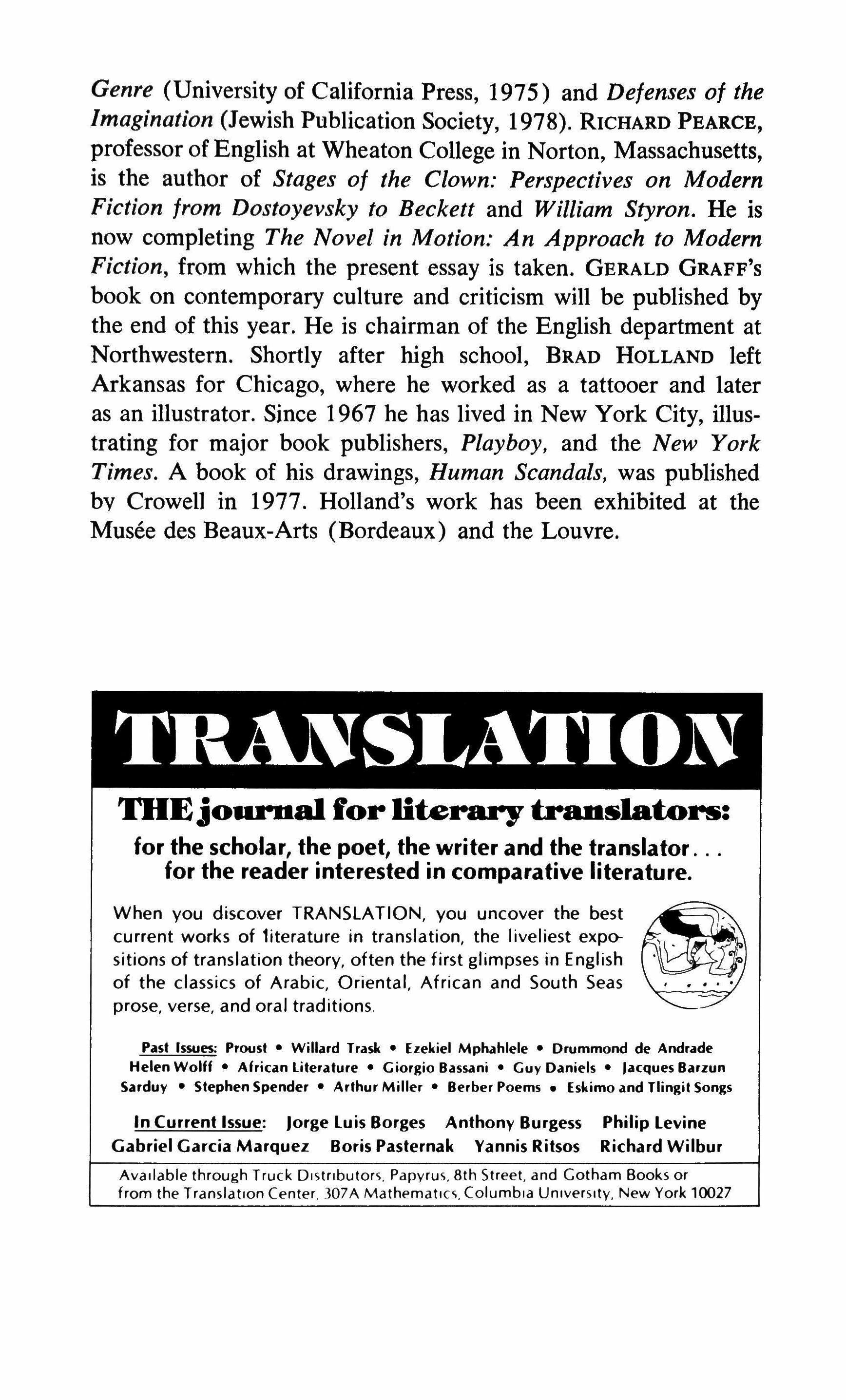
for the scholar, the poet, the writer and the translator for the reader interested in comparative literature.
When you discover TRANSLATION, you uncover the best
current works of 1iterature in translation, the liveliest expo- '. "' sitions of translation theory, often the first glimpses in English of the classics of Arabic, Oriental, African and South Seas '.' prose, verse, and oral traditions.
Past Issues: Proust Willard Trasl< Ezekiel Mphahlele Drummond de Andrade Helen Wolff African Literature Giorgio Bassani Guy Daniels Jacques Barzun Sarduy Stephen Spender Arthur Miller • Berber Poems Eskimo and Tlingit Songs
In Current Issue: Jorge Luis Borges Anthony Burgess Philip Levine Gabriel Garcia Marquez Boris Pasternak Yannis Ritsos Richard Wilbur
Available through Truck Distributors. Papyrus. 8th Street. and Gotham Books or from the Translation Center, 307A MathematICs, Columbia University, New York 10027
4/2. ed. Rosellen Brown; men portrayed by women/women portrayed by men; introduction by the editor; fiction by T. Alan Broughton. Frederick Busch. Lew McCreary. John Bovey. Ira Sadoff. Jayne Anne Phillips. Pamela Richards. Ellen Wilbur. Mary Peterson; poetry by Ruth Whitman. Michael Benedikt. Askold Melnyczuk, Richard Harteis, Lloyd Schwartz. Deborah Pease. Sharon Bryan. Elaine Epstein. more Due April 1978. $2.95. 184pp.
4/3. ed. DeWitt Henry; special criticism issue; poetry by Anthony Hecht. Mona Van Duyn; fiction by Alice Munro. George Garrett; Ashley Brown on Hecht. Lorrie Goldensohn on Van Duyn, Hallvard Dahlieon Munro. William Peden on Garrett. Christopher Ricks on Major/Minor. Brendan Galvin on Mumblers. Roger Sale on the '70s Novel. Linda Bamber on Martin Green. Martin Green onPhilip Roth; plus first book critiques by Robert Pinsky. Fred Chappell. Carter Wilson. Gary Miranda. more expected Summer 1978
palpably exciting its art and production are excellent; the whole operation exudesprofessionalism. -Anne Bernays, The Washington Post
admirablefor its scope, its diversity, and its quality demands only that a reader browse in the confidence that the work has been measured against a standard ofcraf] that Ploughshares has helped shape for the contemporary audience. -David Eberly. New Boston Review
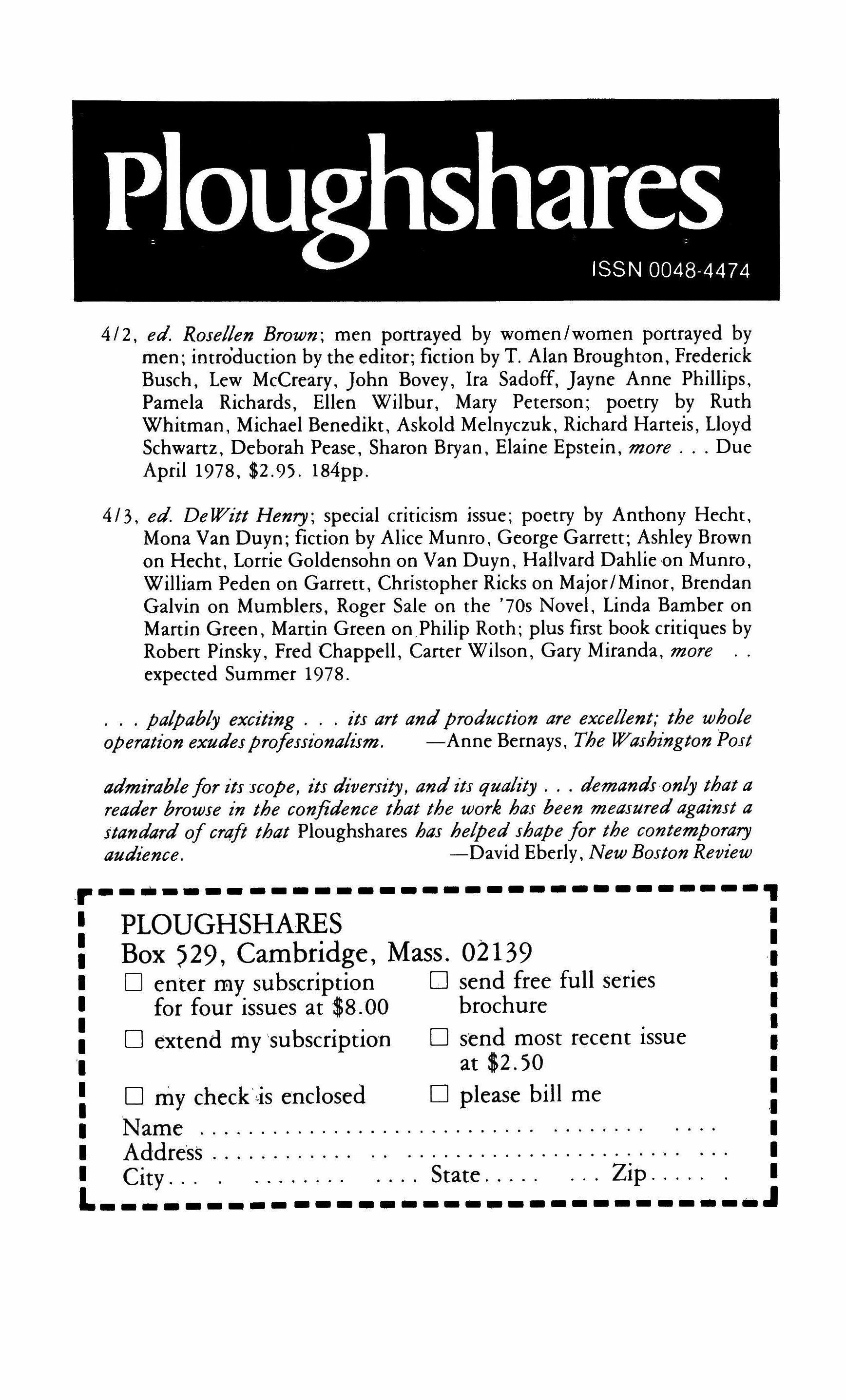
o enter my subscription D send free full series for four issues at $8.00 brochure
o send most recent issue at $2.50
o extend my subscription I City. State..... Zip.. I
o my check-is enclosed 0 please bill me
'Name Address
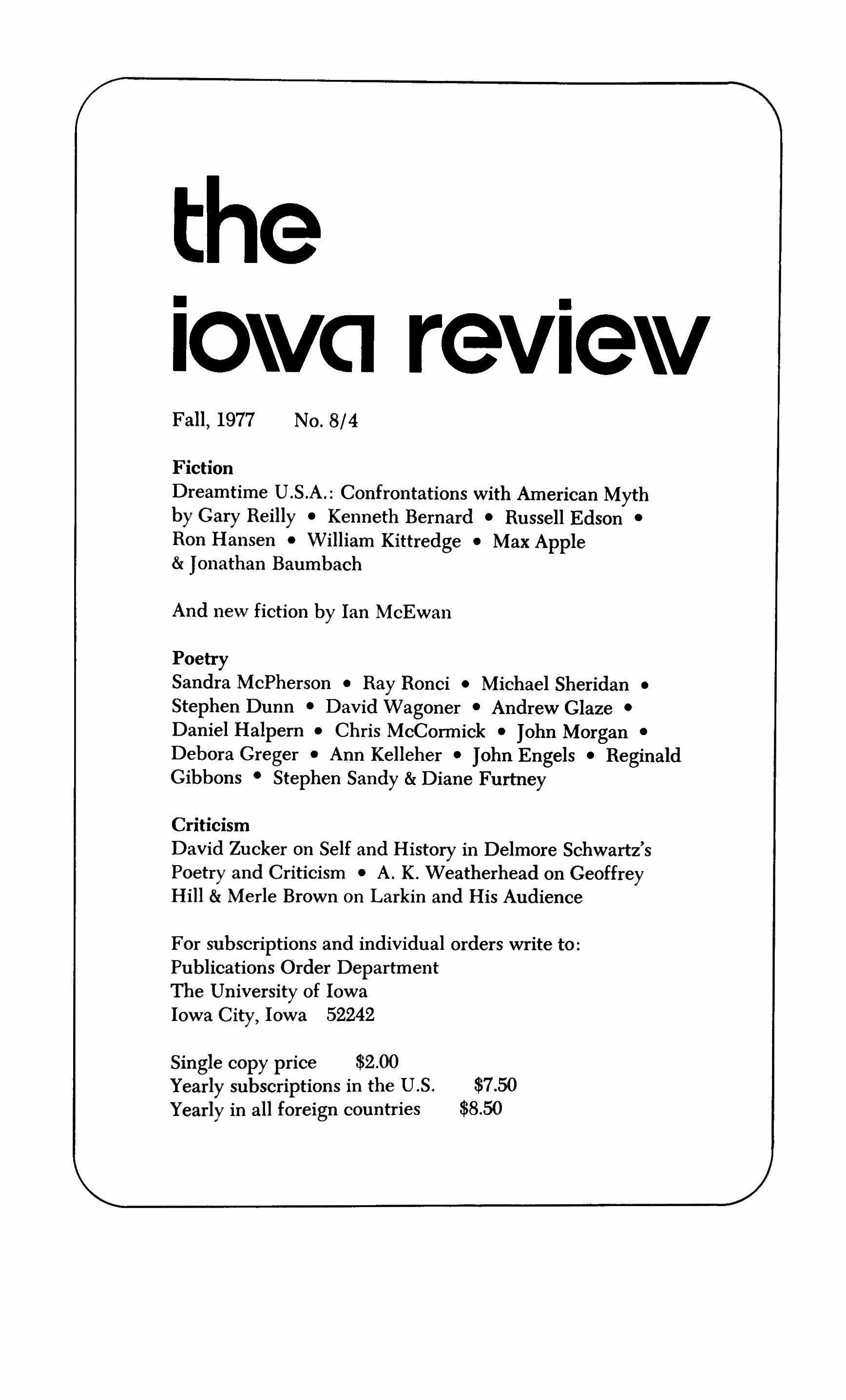
Fall, 1977 No. 8/4
Fiction
Dreamtime U.S.A.: Confrontations with American Myth by Gary Reilly • Kenneth Bernard Russell Edson Ron Hansen • William Kittredge • Max Apple & Jonathan Baumbach
And new fiction by Ian McEwan
Poetry
Sandra McPherson Ray Ronci • Michael Sheridan
Stephen Dunn David Wagoner • Andrew Glaze. Daniel Halpern. Chris McCormick. John Morgan. Debora Greger. Ann Kelleher. John Engels. Reginald Gibbons • Stephen Sandy & Diane Furtney
Criticism
David Zucker on Self and History in Delmore Schwartz's Poetry and Criticism A. K. Weatherhead on Geoffrey Hill & Merle Brown on Larkin and His Audience
For subscriptions and individual orders write to: Publications Order Department
The University of Iowa Iowa City, Iowa 52242
The 1977 collections are published in cloth at $7.50 each and
in paperback at $3.45 each. Order them from your bookseller or from the University of Illinois Press.
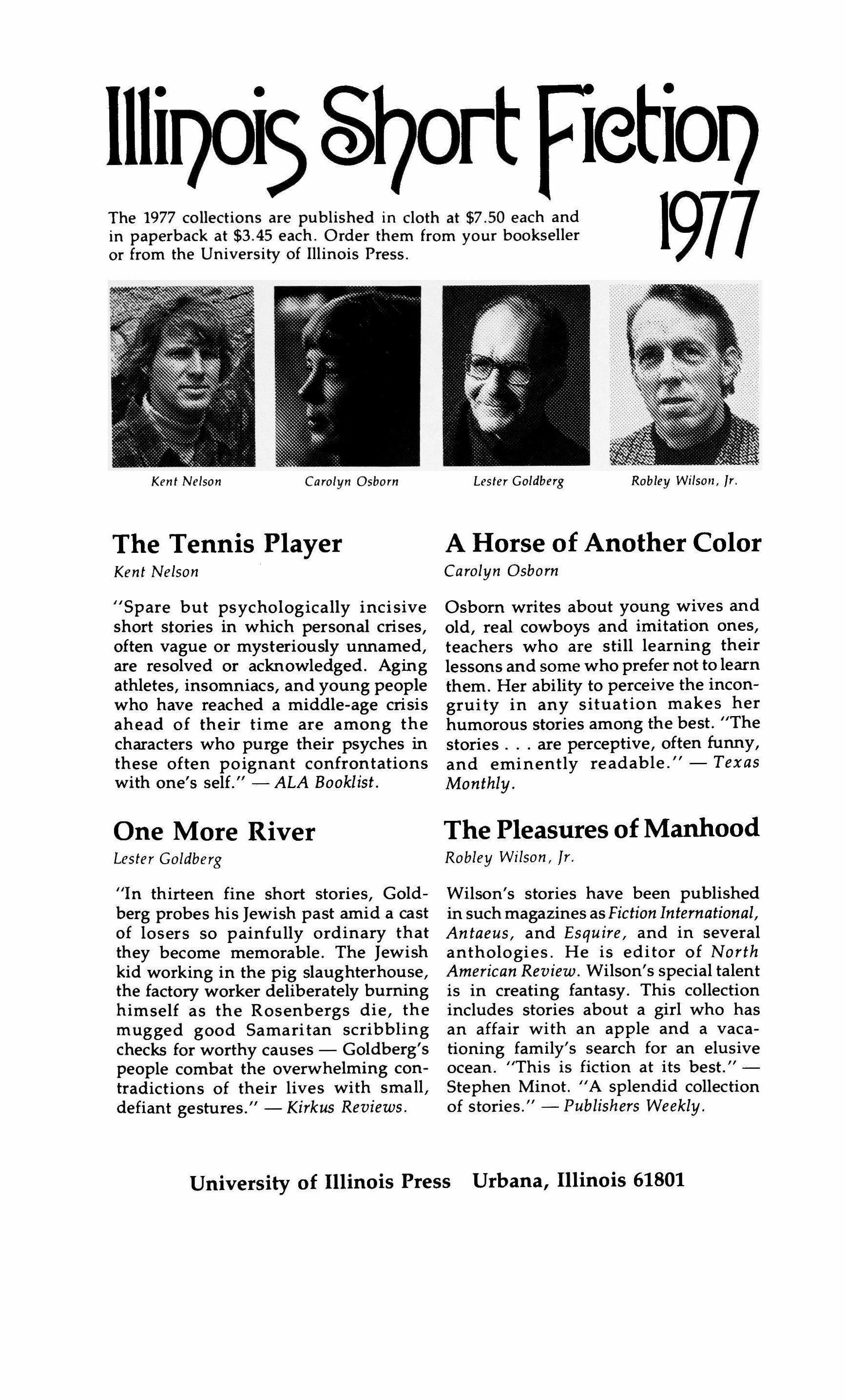
Kent Nelson
"Spare but psychologically incisive short stories in which personal crises, often vague or mysteriously unnamed, are resolved or acknowledged. Aging athletes, insomniacs, and young people who have reached a middle-age crisis ahead of their time are among the characters who purge their psyches in these often poignant confrontations with one's self." - ALA Booklist.
Lester Goldberg
"In thirteen fine short stories, Goldberg probes his Jewish past amid a cast of losers so painfully ordinary that they become memorable. The Jewish kid working in the pig slaughterhouse, the factory worker deliberately burning himself as the Rosenbergs die, the mugged good Samaritan scribbling checks for worthy causes - Goldberg's people combat the overwhelming contradictions of their lives with small, defiant gestures." - Kirkus Reviews.
Carolyn Osborn
Osborn writes about young wives and old, real cowboys and imitation ones, teachers who are still learning their lessons and some who prefer not to learn them. Her ability to perceive the incongruity in any situation makes her humorous stories among the best. "The stories are perceptive, often funny, and eminently readable." - Texas Monthly.
Robley Wilson, Jr.
Wilson's stories have been published in such magazines as Fiction International, Antaeus, and Esquire, and in several anthologies. He is editor of North American Review. Wilson's special talent is in creating fantasy. This collection includes stories about a girl who has an affair with an apple and a vacationing family'S search for an elusive ocean. "This is fiction at its best."Stephen Minot. "A splendid collection of stories." - Publishers Weekly.
University of Illinois Press Urbana, Illinois 61801
